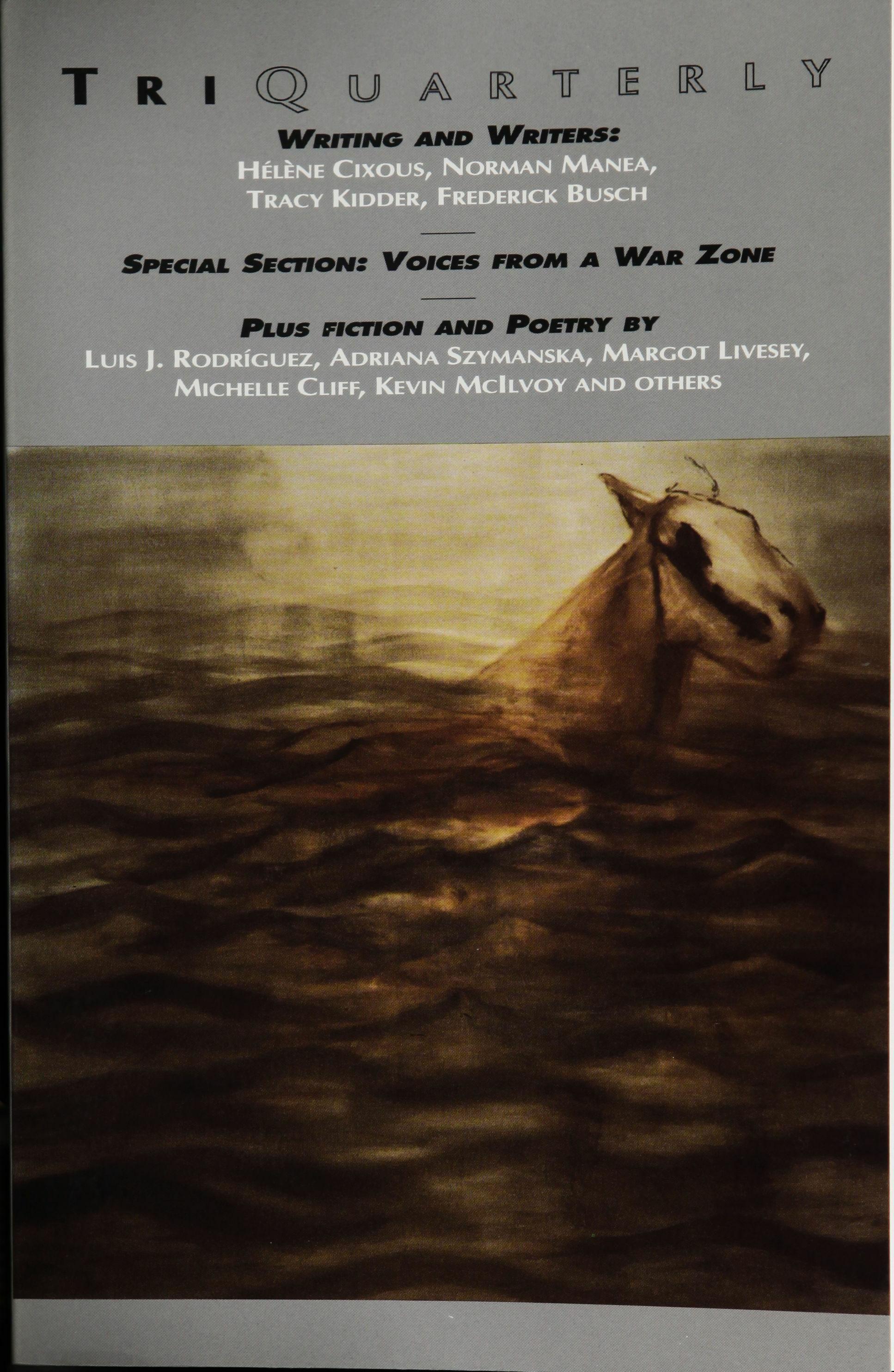
WIU7'ING AND WIUl'ERS:
SPECIAl. SlEenON: VO'CIES IFROM A WAR ZONE
PJ.US "enON AND POI/ETRY BY
TRICQ(1JA�u[E�[LV
Publication of TriQuarterly is made possible in part by the donors of gifts and grants to the magazine. For their recent and continuing support, we are very pleased to thank The Illinois Arts Council, The Lannan Foundation, The John D. and Catherine T. MacArthur Foundation, The National Endow, ment for the Arts, The Sara Lee Foundation, The Chicago Community Trust, and individual donors.
TriQuarterly also thanks the following recent donors and life subscribers:
Simon J. Blattner, Jr.
Louise Blosten
Paul Brownfield
Robert Creamer
Eleanore Devine
W. S. Di Piero
John B. Elliott
Mr. and Mrs. H. Bernard Firestone
C. Dwight Foster
Amy Godine
Jay Harkey
Mr. and Mrs. David C. Hilliard
Irwin T. Holtzman
Helen Jacob
Loy E. Knapp
Greg Kuzma
Patrick Mangan

Charles T. Martin
Florence D. McMillan
Mr. and Mrs. Andrew McNally
Dorothy J. Mikuska
Michal Miller
William T. Morgan, Jr.
Alicia Ostriker
Linda Pastan
Fran Podulka
Mark Rudman
Gilaine Shindelman
Allen R. Smart
Gary Soto
Susan A. Stewart
Lawrence Stewart
Dorothy H. Taylor
Scott Turow
NOTE: TriQuarterly welcomes financial support in the form of donations, bequests and planned gifts. Please write to Reginald Gibbons, editor. Please see the last page and the inside back cover for names of individual donors to TriQuarterly.
Fall 1996

Editor
Reginald Gibbons
Managing Editor Kirstie Felland
Executive Editor Bob Perlongo
Special Projects Editor Fred Shafer
Reader
James Lang
Advisory Editors
Co-Editor Susan Hahn
Assistant Editor Gwenan Wilbur
Design Director Gini Kondziolka
Editorial Assistants
Deanna Kreisel, Hans Holsen, Kemba Johnson, Jacob Harrell, Dylan Rice
Hugo Achugar, Michael Anania, Stanislaw Baranczak, Cyrus Colter, Rita Dove, Richard Ford, George Garrett, Michael S. Harper, Bill Henderson, Maxine Kumin, Grace Paley, John Peck, Michael Ryan, Alan Shapiro, Ellen Bryant Voigt
TRIQUARTERLY IS AN INTERNATIONAL JOURNAL OF WRITING, ART AND CULTURAL INQUIRY PUBLISHED AT NORTHWESTERN UNIVERSITY.
Subscription rates (three issues a year) - Individuals: one year $24; two years $44; life $600. Institutions: one year $36; two years $68. Foreign subscriptions $5 per year additional. Price of back issues varies. Sample copies $5. Correspondence and subscriptions should be addressed to TriQuarterly, NORTHWESTERN UNIVERSITY, 2020 Ridge Avenue, Evanston, IL 60208. Phone: (847) 491-7614. The editors invite submissions offiction, poetry and literary essays, which must be postmarked between October 1 and March 31; manuscripts postmarked between April 1 and September 30 will not be read. No manuscripts will be returned unless accompanied by a stamped, self-addressed envelope. All manuscripts accepted for publication become the property of TriQuarterly, unless otherwise indicated. Copyright © 1996 by TriQuarterly. No part of this volume may be reproduced in any manner without written permission. The views expressed in this magazine are to be attributed to the writers, not the editors or sponsors. Printed in the United States of America by Thomson-Shore; typeset by TriQuarterly. ISSN: 0041-3097.
National distributors to retail trade: Ingram Periodicals (La Vergne, TN); B. DeBoer (Nutley, NJ): Ubiquity (Brooklyn, NY): Armadillo (Los Angeles, CAl: Fine Print (Austin, TX).
Reprints of issues #1-15 of TriQuarterly are available in full format from Kraus Reprint Company, Route 100, Millwood, NY 10546, and all issues in microfilm from University Microfilms International, 300 North Zeeb Road, Ann Arbor, MI 48106. TriQuarterly is indexed in the Humanities Index (H.W.Wilson Co.), the American Humanities Index (Whitson Publishing Co.), Historical Abstracts, MLA, EBSCO Publishing (Peabody, MA) and Information Access Co. (Foster City, CAl.
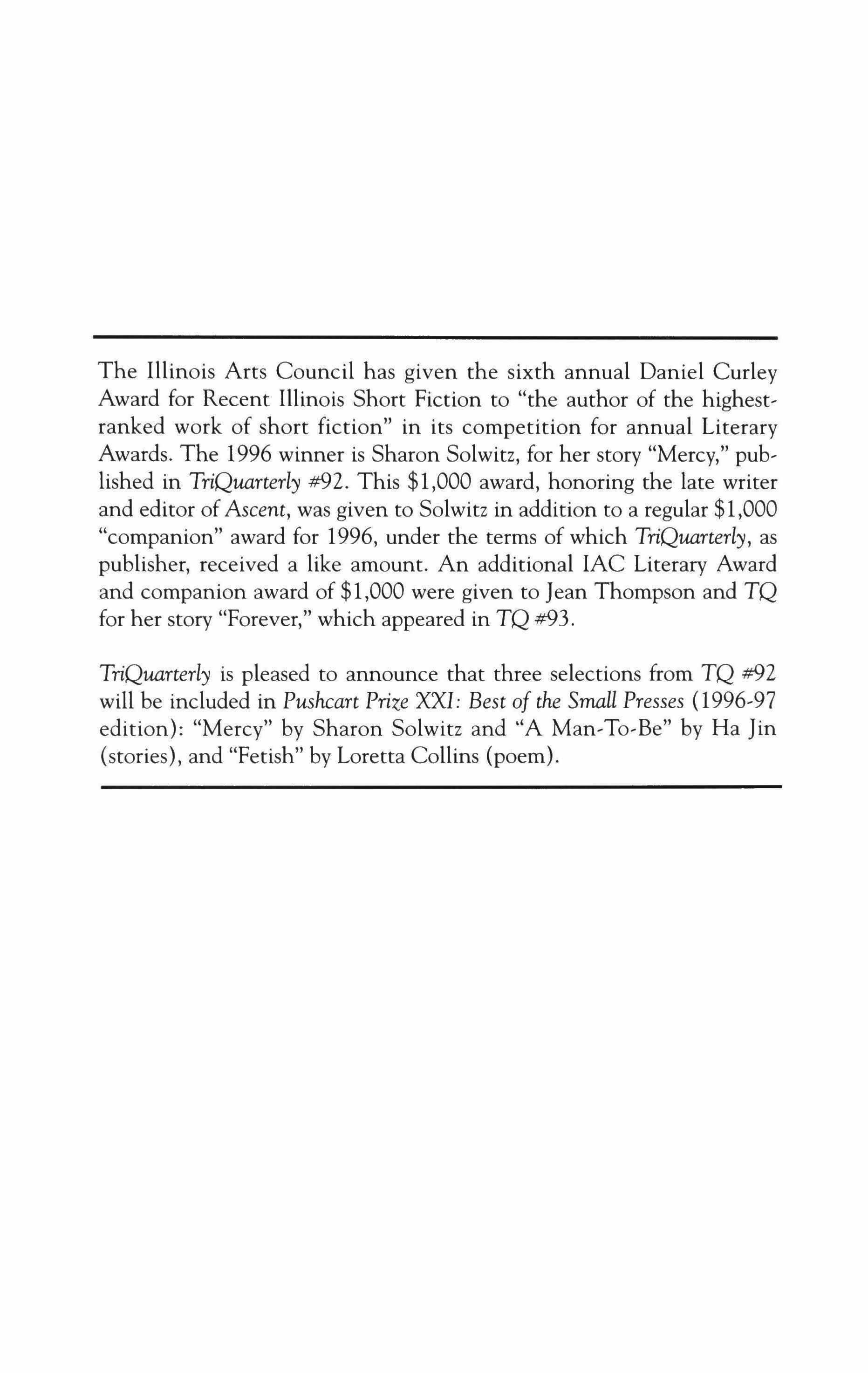
The Illinois Arts Council has given the sixth annual Daniel Curley Award for Recent Illinois Short Fiction to "the author of the highestranked work of short fiction" in its competition for annual Literary Awards. The 1996 winner is Sharon Solwitz, for her story "Mercy," published in TriQuarterly #92. This $1,000 award, honoring the late writer and editor ofAscent, was given to Solwitz in addition to a regular $1,000 "companion" award for 1996, under the terms of which TriQuarterly, as publisher, received a like amount. An additional lAC Literary Award and companion award of $1,000 were given to Jean Thompson and TQ for her story "Forever," which appeared in TQ #93.
TriQuarterly is pleased to announce that three selections from TQ #92 will be included in Pushcart Prize XXI: Best of the Small Presses (1996�97 edition): "Mercy" by Sharon Solwitz and "A Man-To-Be" by Ha jin (stories), and "Fetish" by Loretta Collins (poem).
Editor ofthis issue: Reginald Gibbons
WRITING AND WRITERS
Writing Blind
Helene Cixous
Translated from the French by Eric Prenowitz, revised by Reginald Gibbons
Interview with Norman Manea 21 Marco Cugno
Translated from the Romanian by Patrick Camiller
Courting the Approval of the Dead .43 Tracy Kidder
Terrence Des Pres 60 Frederick Busch SPECIAL
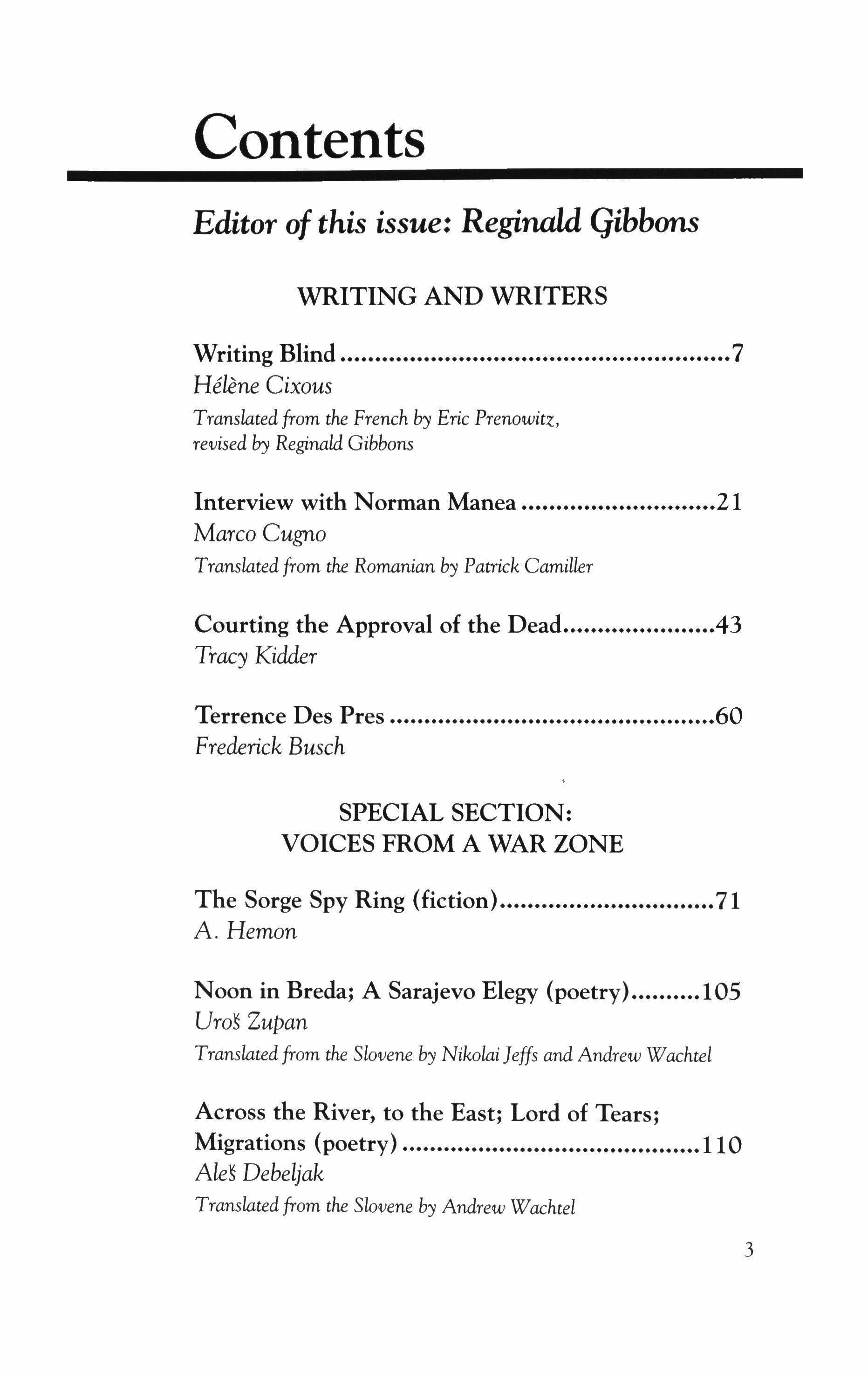
The Sorge Spy Ring (fiction)
A. Hernon
Noon in Breda; A Sarajevo Elegy (poetry)
Uro� Zupan
Translated from the Slovene by Nikolai]effs and Andrew Wachtel
Across the River, to the East; Lord of Tears; Migrations (poetry) 110 Ald Debeljak
Translatedfrom the Slovene by Andrew Wachtel
Contents
7
VOICES FROM A WAR ZONE
SECTION:
71
105
3
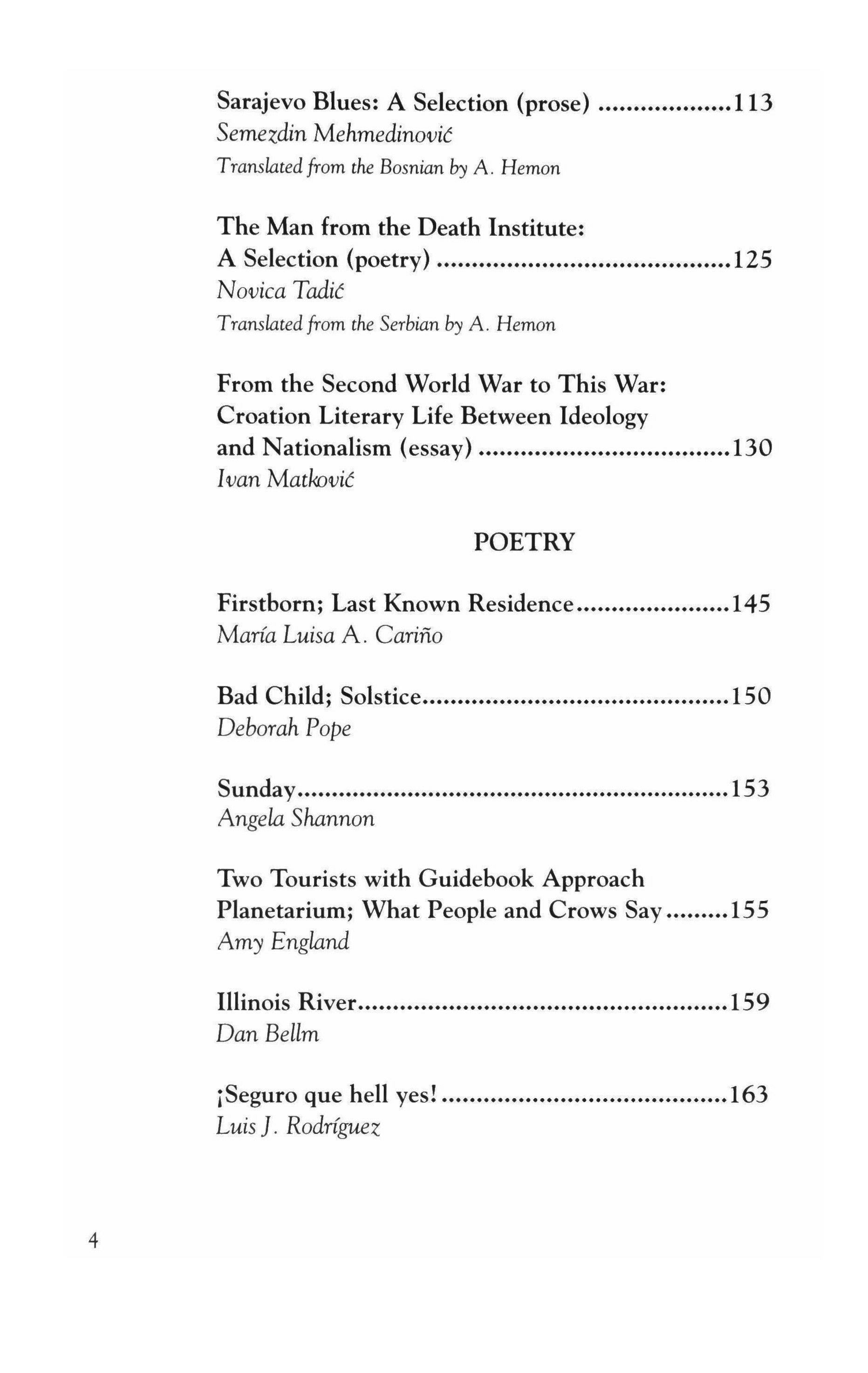
Sarajevo Blues: A Selection (prose) .........••...••••• 113 Semezdin Mehmedinovit Translated from the Bosnian by A. Heman The Man from the Death Institute: A Selection (poetry) .......••..•.....•..••......••............ 125 Novica Tadit Translated from the Serbian by A. Hemon From the Second World War to This War: Croation Literary Life Between Ideology and Nationalism (essay) •••....•..••..•..............•••.... 130 Ivan Matkovit
Firstborn; Last Known Residence 145 Mana Luisa A. Carino Bad Child; Solstice 150 Deborah Pope Sunday 153 Angela Shannon Two Tourists with Guidebook Approach Planetarium; What People and Crows Say 155 Amy England Illinois River 159 Dan Bellm iSeguro que hell yes! 163 Luis]. Rodnguez 4
POETRY
The Hole; Regulations; Barbarian; Yesterday in Elsinore; In a Second Class Compartment ...•••
Adriana Szymanska
Translated from the Polish by Ewa Hryniewicz�Yarbrough Tempo Rubato 1; Fall Recurrence; Swim;
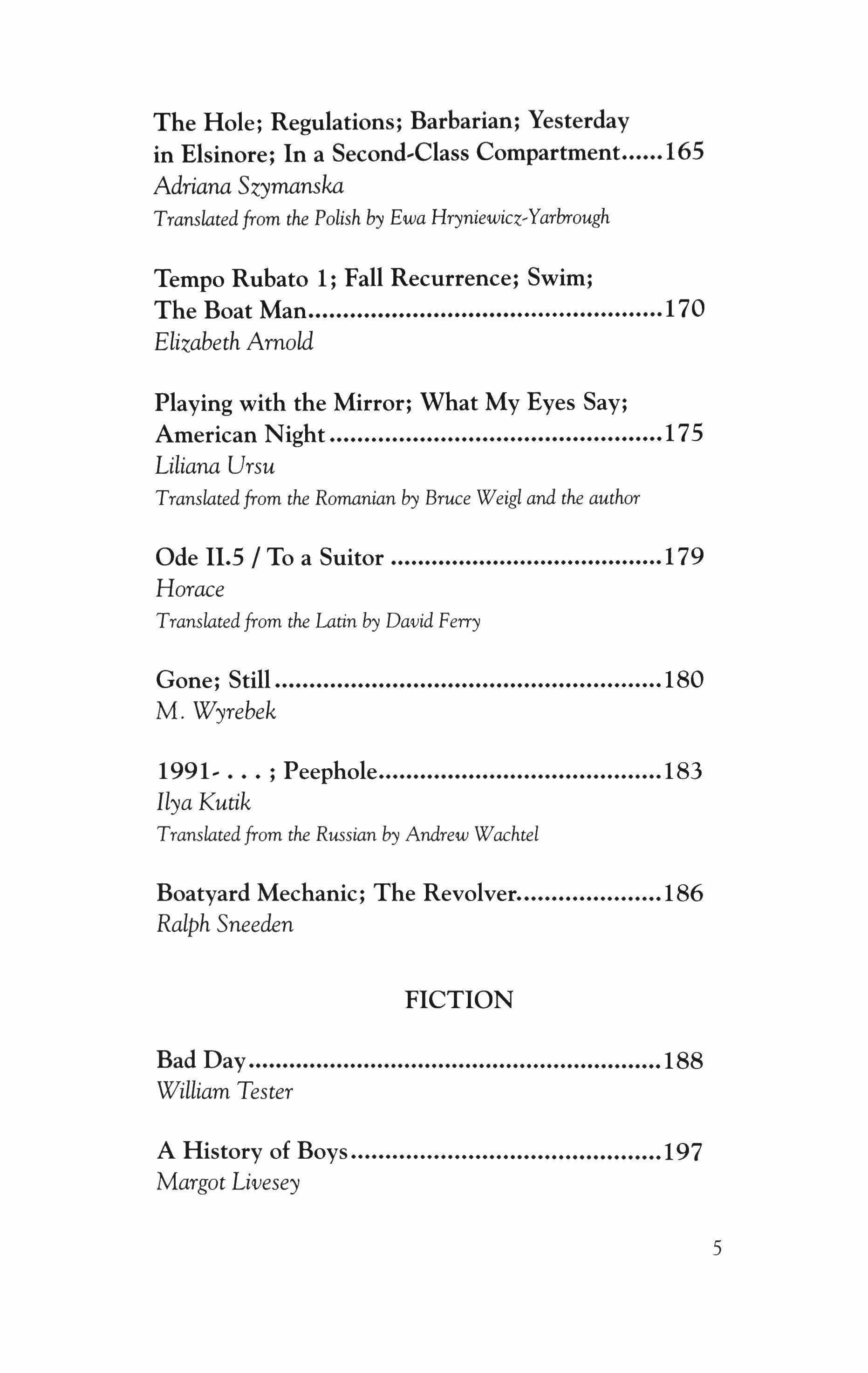
Liliana Ursu
Translated from the Romanian by Bruce Weigl and the author
165
•••.................•.••••••••..................... 170 Elizabeth
Playing
Say; American Night 1 75
The Boat Man
Arnold
with the Mirror; What My Eyes
Ode 11.5 / To a Suitor 179 Horace
from
David Ferry Gone; Still 180 M. Wyrebek 1991 ; Peephole ........••.••..•••....••.•............... 183 Ilya Kutik Translated
Boatyard Mechanic; The Revolver......•.............. 186 Ralph Sneeden FICTION Bad Day 188 William Tester A History of Boys 197 Margot Livesey 5
Translated
the Latin by
from the Russian by Andrew Wachtel
Michelle Cliff
Portrait of Pancho Villa's Lieutenant, Manuel Hernandez Galvan, Shooting a Peso at Fifty Paces
Kevin McIlvoy CONTRIBUTORS

Cover painting, Bay ofFundy, by Kate Javens
Cover design by Gini Kondziolka
TRIQUARTERLY 6
226
Transactions
237
249
Writing Blind
Helene Cixous
Translatedfrom the French by Eric Prenowitz, revised by Reginald
Gibbons
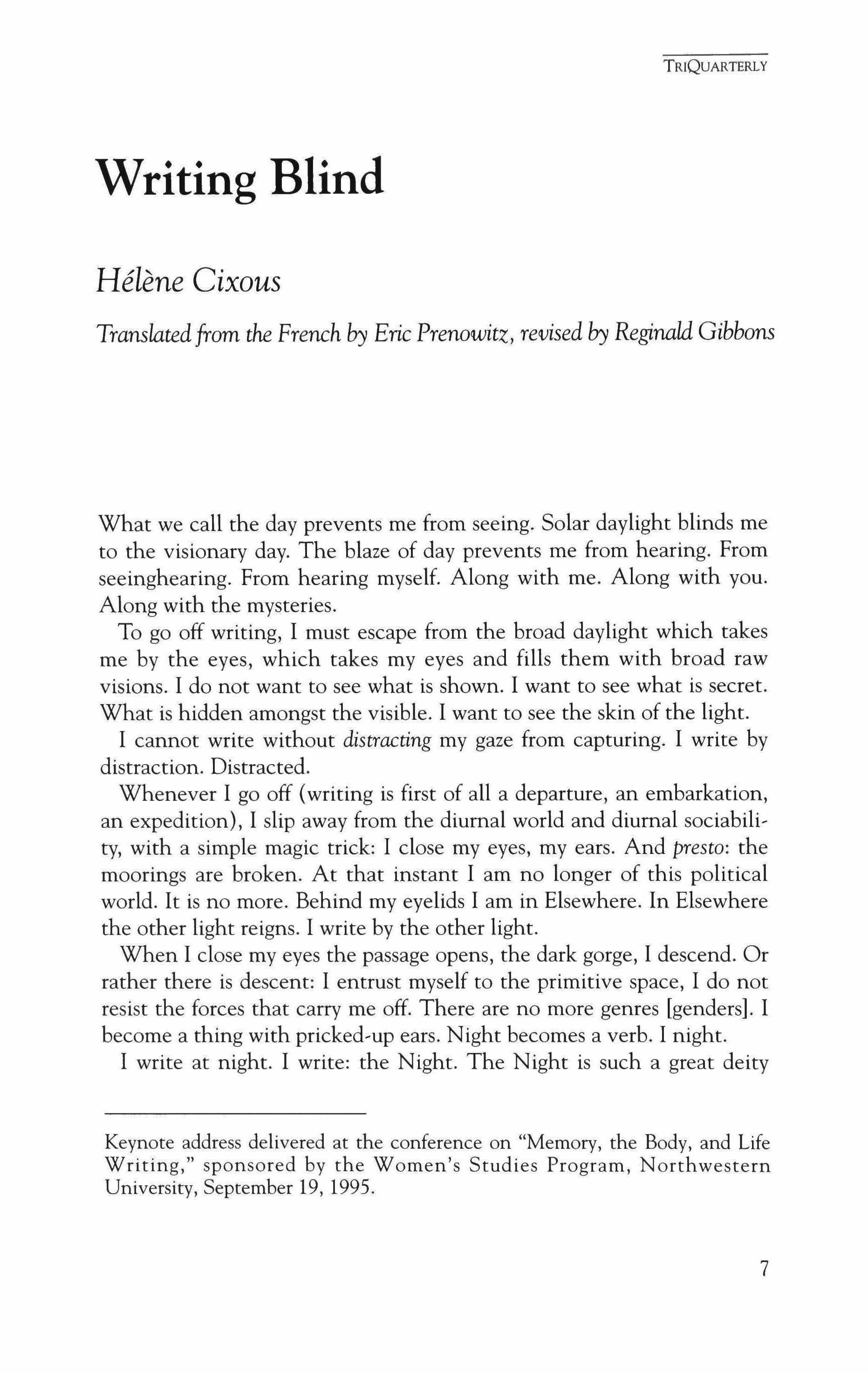
What we call the day prevents me from seeing. Solar daylight blinds me to the visionary day. The blaze of day prevents me from hearing. From seeinghearing. From hearing myself. Along with me. Along with you. Along with the mysteries.
To go off writing, I must escape from the broad daylight which takes me by the eyes, which takes my eyes and fills them with broad raw visions. I do not want to see what is shown. I want to see what is secret. What is hidden amongst the visible. I want to see the skin of the light.
I cannot write without distracting my gaze from capturing. I write by distraction. Distracted.
Whenever I go off (writing is first of all a departure, an embarkation, an expedition), I slip away from the diurnal world and diurnal sociabilitv, with a simple magic trick: I close my eyes, my ears. And presto: the moorings are broken. At that instant I am no longer of this political world. It is no more. Behind my eyelids I am in Elsewhere. In Elsewhere the other light reigns. I write by the other light.
When I close my eyes the passage opens, the dark gorge, I descend. Or rather there is descent: I entrust myself to the primitive space, I do not resist the forces that carry me off. There are no more genres [genders]. I become a thing with pricked-up ears. Night becomes a verb. I night.
I write at night. I write: the Night. The Night is such a great deity
Keynote address delivered at the conference on "Memory, the Body, and Life Writing," sponsored by the Women's Studies Program, Northwestern University, September 19,1995.
TRIQUARTERLY
7
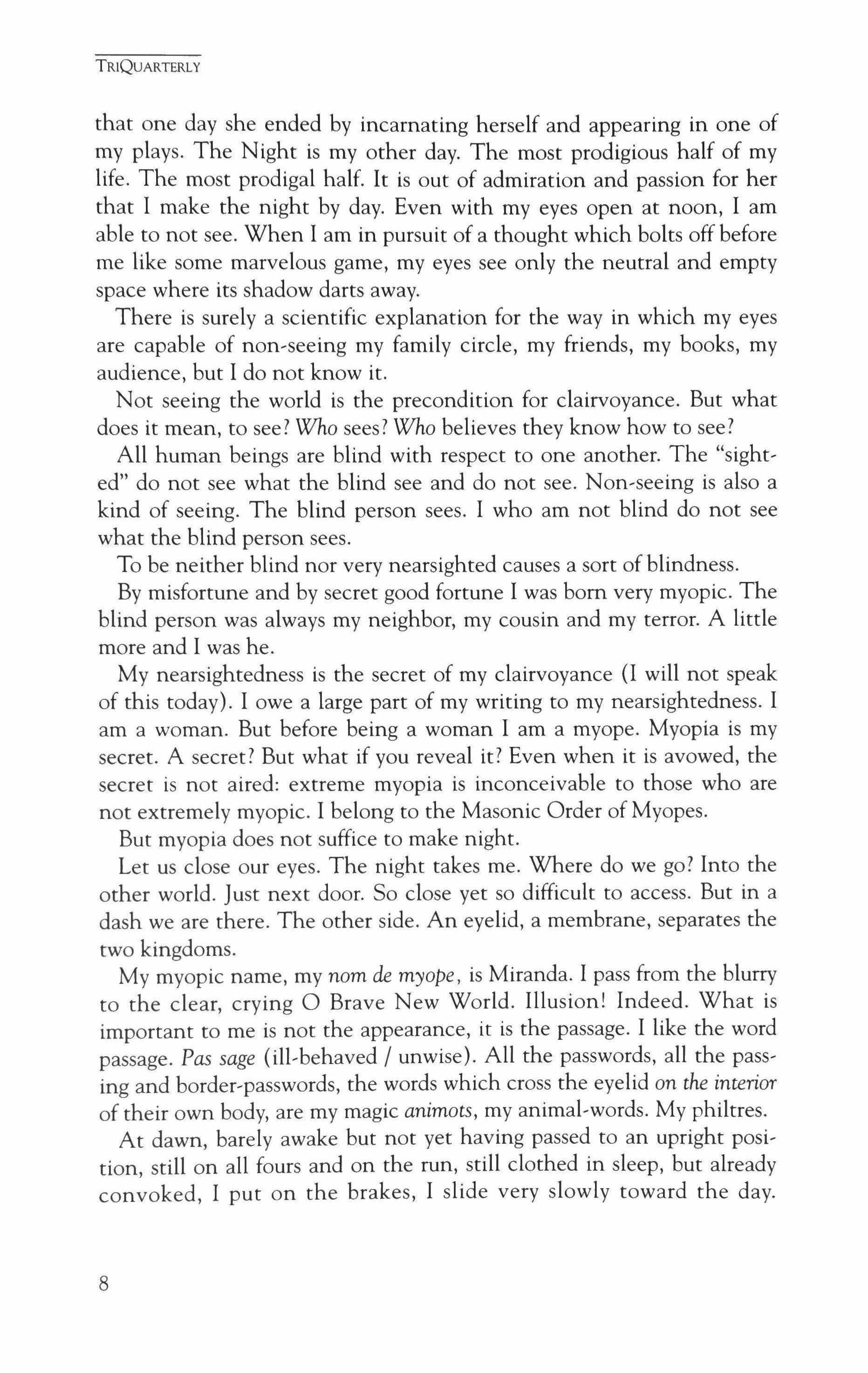
that one day she ended by incarnating herself and appearing in one of my plays. The Night is my other day. The most prodigious half of my life. The most prodigal half. It is out of admiration and passion for her that I make the night by day. Even with my eyes open at noon, I am able to not see. When I am in pursuit of a thought which bolts off before me like some marvelous game, my eyes see only the neutral and empty space where its shadow darts away.
There is surely a scientific explanation for the way in which my eyes are capable of non-seeing my family circle, my friends, my books, my audience, but I do not know it.
Not seeing the world is the precondition for clairvoyance. But what does it mean, to see? Who sees? Who believes they know how to see?
All human beings are blind with respect to one another. The "sighted" do not see what the blind see and do not see. Non-seeing is also a kind of seeing. The blind person sees. I who am not blind do not see what the blind person sees.
To be neither blind nor very nearsighted causes a sort of blindness.
By misfortune and by secret good fortune I was born very myopic. The blind person was always my neighbor, my cousin and my terror. A little more and I was he.
My nearsightedness is the secret of my clairvoyance (I will not speak of this today). lowe a large part of my writing to my nearsightedness. I am a woman. But before being a woman I am a myope. Myopia is my secret. A secret? But what if you reveal it? Even when it is avowed, the secret is not aired: extreme myopia is inconceivable to those who are not extremely myopic. I belong to the Masonic Order of Myopes.
But myopia does not suffice to make night.
Let us close our eyes. The night takes me. Where do we go? Into the other world. Just next door. So close yet so difficult to access. But in a dash we are there. The other side. An eyelid, a membrane, separates the two kingdoms.
My myopic name, my nom de myope, is Miranda. I pass from the blurry to the clear, crying 0 Brave New World. Illusion! Indeed. What is important to me is not the appearance, it is the passage. I like the word passage. Pas sage (ill-behaved / unwise). All the passwords, all the passing and border-passwords, the words which cross the eyelid on the interior of their own body, are my magic animots, my animal-words. My philtres.
At dawn, barely awake but not yet having passed to an upright position, still on all fours and on the run, still clothed in sleep, but already convoked, I put on the brakes, I slide very slowly toward the day.
TRIQUARTERLY
8
Between the night and the day there is a long vivacious but precarious region where one can sleep even while being awake, where even standing on two legs one is still a phantom, where the doors do not yet exist between the two kingdoms, where what will be past survives, lingers, stays.
It is a fragile region that can be shattered by too brusque a gesture, a magic hour that can be chased off by too brusque an encounter with an inhabitant of the day.
What I write then knows neither limit nor hesitation. Without censorship. Between night and day. I receive the message.

Then I raise the visor, I tum my naked eyes toward the world. And I see. I see! with the naked eye, and it is exaltation itself. I pass from non-seeing to seeing-the-world. The features of the world's face rise, emerge, pass from the unperceived into presence. It is a sudden, dazzling, engendering passage. I feel myself see. Eyes are the most delicate, most powerful hands, imponderably touching the over-there. I feel a self return to me from the over-there.
Me is thus the meeting place between my seeing [sighted] soul and you. I raised the visor and behold: the world rises for me. Is given to me. The gift of the world. What is given to me in this sudden rising is at once the world and giving. I say world: its face: the physical world. Its landscape.
Now I write. That is to say that in my black interior softness, the rapid footsteps of an arriving book print themselves.
My book writes itself. Creates itself. In French [se cree]: secret. With jubilation and play. With French. Within French, riding French. Afrenching itself from French.
It amuses itself in creating itself. This also is my secret: the proof of creation is laughter. It is a marvel to feel the innumerable vibrations of the soul make themselves, collect themselves, crystallize themselves into words, to witness the rain of atoms of which Lucretius made us dream. Millions of signs rain down and in their flood they stick to one another, they kiss.
I want to write before, at the time still in fusion before the cooled-off
TRIQUARTERLY
* * *
* * *
9
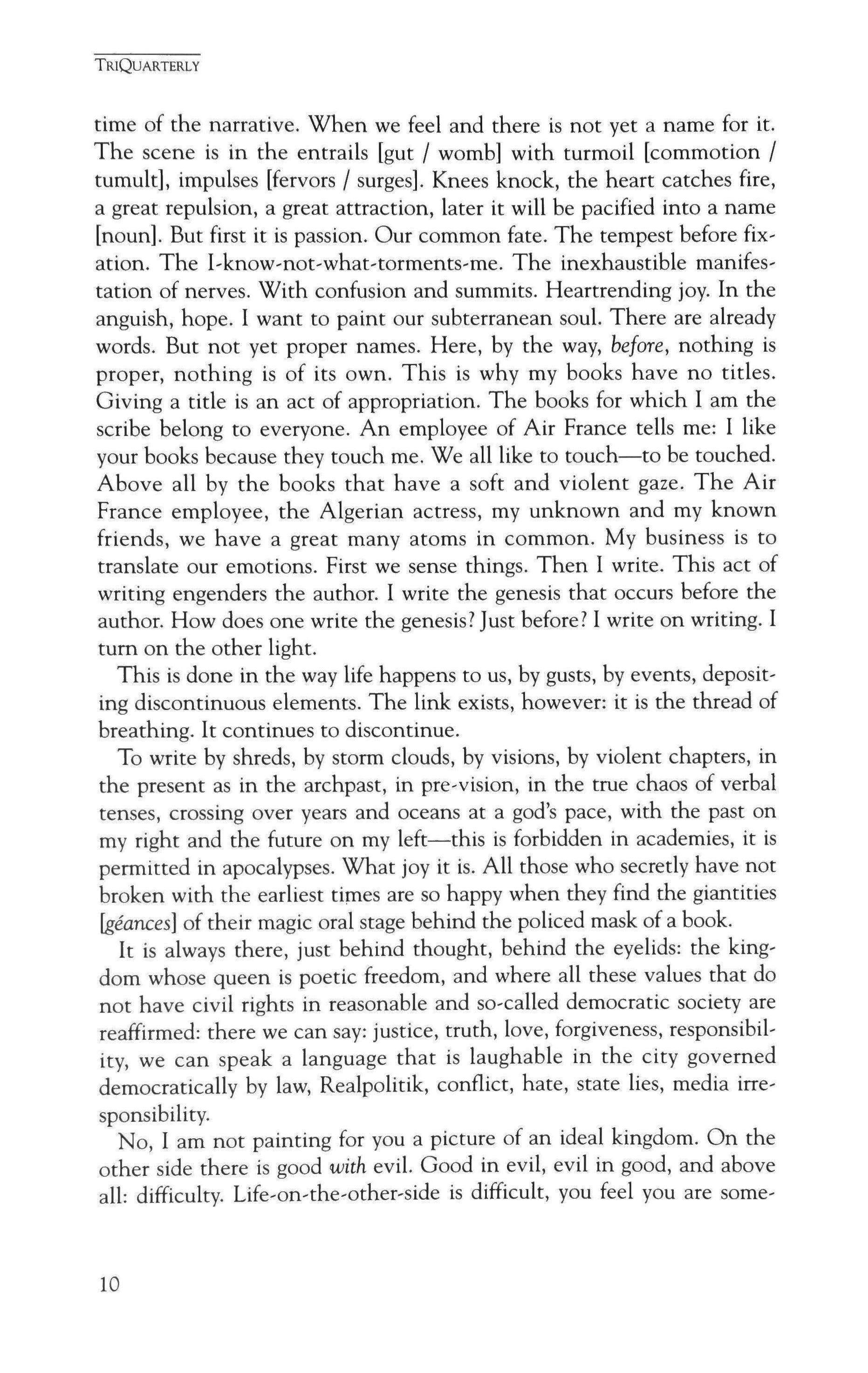
time of the narrative. When we feel and there is not yet a name for it. The scene is in the entrails [gut / womb] with turmoil [commotion / tumult]' impulses [fervors / surges]. Knees knock, the heart catches fire, a great repulsion, a great attraction, later it will be pacified into a name [noun]. But first it is passion. Our common fate. The tempest before fixation. The l-know-not-what-torrnents-rne. The inexhaustible manifestation of nerves. With confusion and summits. Heartrending joy. In the anguish, hope. I want to paint our subterranean soul. There are already words. But not yet proper names. Here, by the way, before, nothing is proper, nothing is of its own. This is why my books have no titles. Giving a title is an act of appropriation. The books for which I am the scribe belong to everyone. An employee of Air France tells me: I like your books because they touch me. We all like to touch-to be touched. Above all by the books that have a soft and violent gaze. The Air France employee, the Algerian actress, my unknown and my known friends, we have a great many atoms in common. My business is to translate our emotions. First we sense things. Then I write. This act of writing engenders the author. I write the genesis that occurs before the author. How does one write the genesis? Just before? I write on writing. I turn on the other light.
This is done in the way life happens to us, by gusts, by events, depositing discontinuous elements. The link exists, however: it is the thread of breathing. It continues to discontinue.
To write by shreds, by storm clouds, by visions, by violent chapters, in the present as in the archpast, in pre-vision, in the true chaos of verbal tenses, crossing over years and oceans at a god's pace, with the past on my right and the future on my left-this is forbidden in academies, it is permitted in apocalypses. What joy it is. All those who secretly have not broken with the earliest times are so happy when they find the giantities [geances] of their magic oral stage behind the policed mask of a book.
It is always there, just behind thought, behind the eyelids: the kingdom whose queen is poetic freedom, and where all these values that do not have civil rights in reasonable and so-called democratic society are reaffirmed: there we can say: justice, truth, love, forgiveness, responsibility, we can speak a language that is laughable in the city governed democratically by law, Realpolitik, conflict, hate, state lies, media irresponsibility.
No, I am not painting for you a picture of an ideal kingdom. On the other side there is good with evil. Good in evil, evil in good, and above all: difficulty. Life-on-the-other-side is difficult, you feel you are some-
TRIQUARTERLY
10
what alone, or very alone, very mad, in climbing the slopes of what Kierkegaard calls the absolute.
And if there were not that donkey to keep Abraham company it would be infernal. But there is the donkey. The animal-I will come back to this-that puts a limit on abandonment. The Bible does not report the conversation Abraham had with the donkey on Mount Moriah. And this does not surprise me. I want to give the donkey with Abraham a chance to speak. I want to give the donkey the floor.
One does not say foolish things [betises] to a donkey, don't you agree? Nor to a cat. It is only to another human being that one says foolish things, that one chats, that one strays from the point, that one lies. It is the human who is a dunce
With the donkey, we ride straight to the essentials, and right away.
I write on the donkey. (Dunce and donkey. Duncity is a human, not a donkey.)
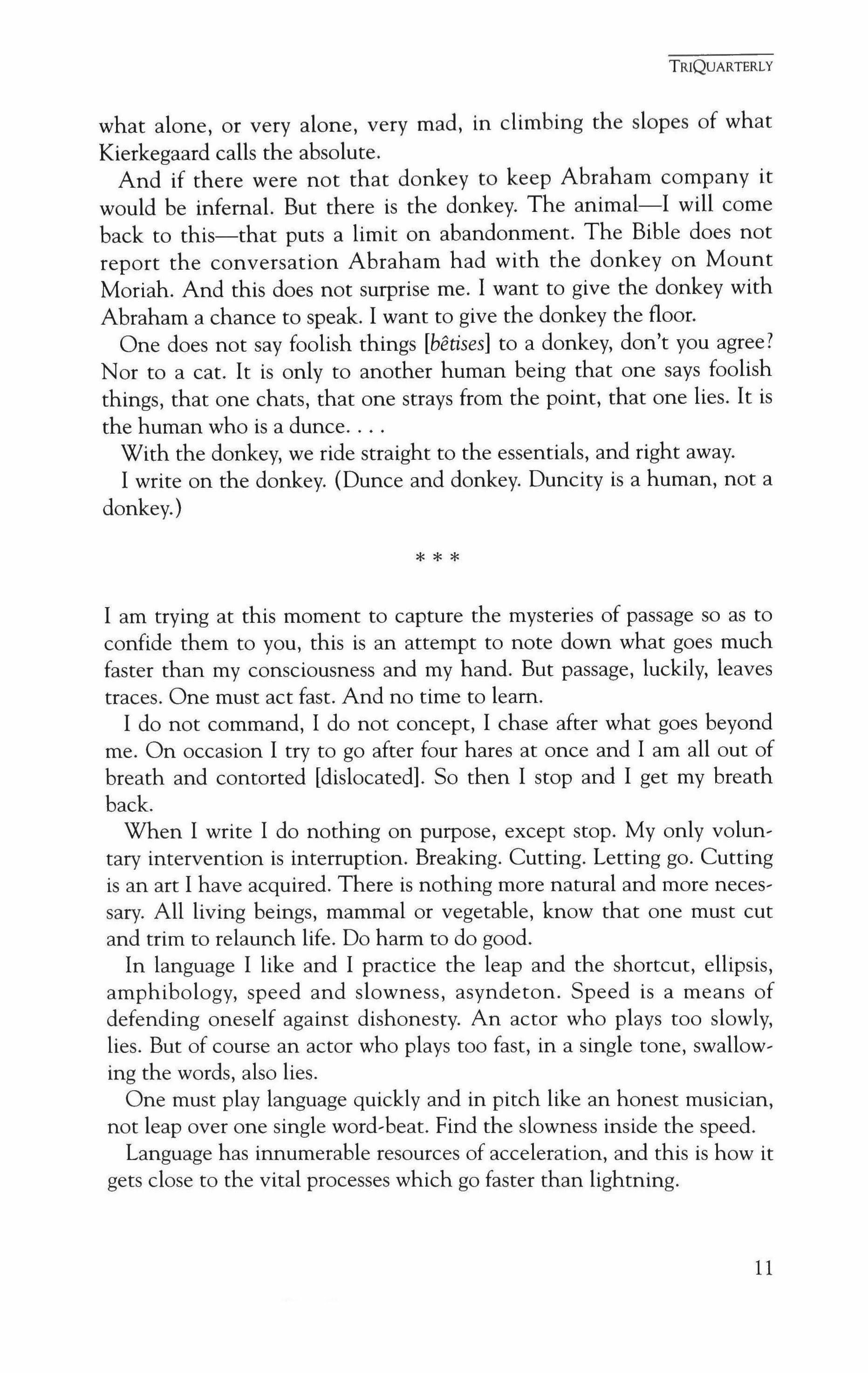
I am trying at this moment to capture the mysteries of passage so as to confide them to you, this is an attempt to note down what goes much faster than my consciousness and my hand. But passage, luckily, leaves traces. One must act fast. And no time to learn.
I do not command, I do not concept, I chase after what goes beyond me. On occasion I try to go after four hares at once and I am all out of breath and contorted [dislocated]. So then 1 stop and I get my breath back.
When 1 write 1 do nothing on purpose, except stop. My only voluntary intervention is interruption. Breaking. Cutting. Letting go. Cutting is an art I have acquired. There is nothing more natural and more necessary. All living beings, mammal or vegetable, know that one must cut and trim to relaunch life. Do harm to do good.
In language I like and I practice the leap and the shortcut, ellipsis, amphibology, speed and slowness, asyndeton. Speed is a means of defending oneself against dishonesty. An actor who plays too slowly, lies. But of course an actor who plays too fast, in a single tone, swallowing the words, also lies.
One must play language quickly and in pitch like an honest musician, not leap over one single word-beat. Find the slowness inside the speed.
Language has innumerable resources of acceleration, and this is how it gets close to the vital processes which go faster than lightning.
TRIQUARTERLY
* * *
11
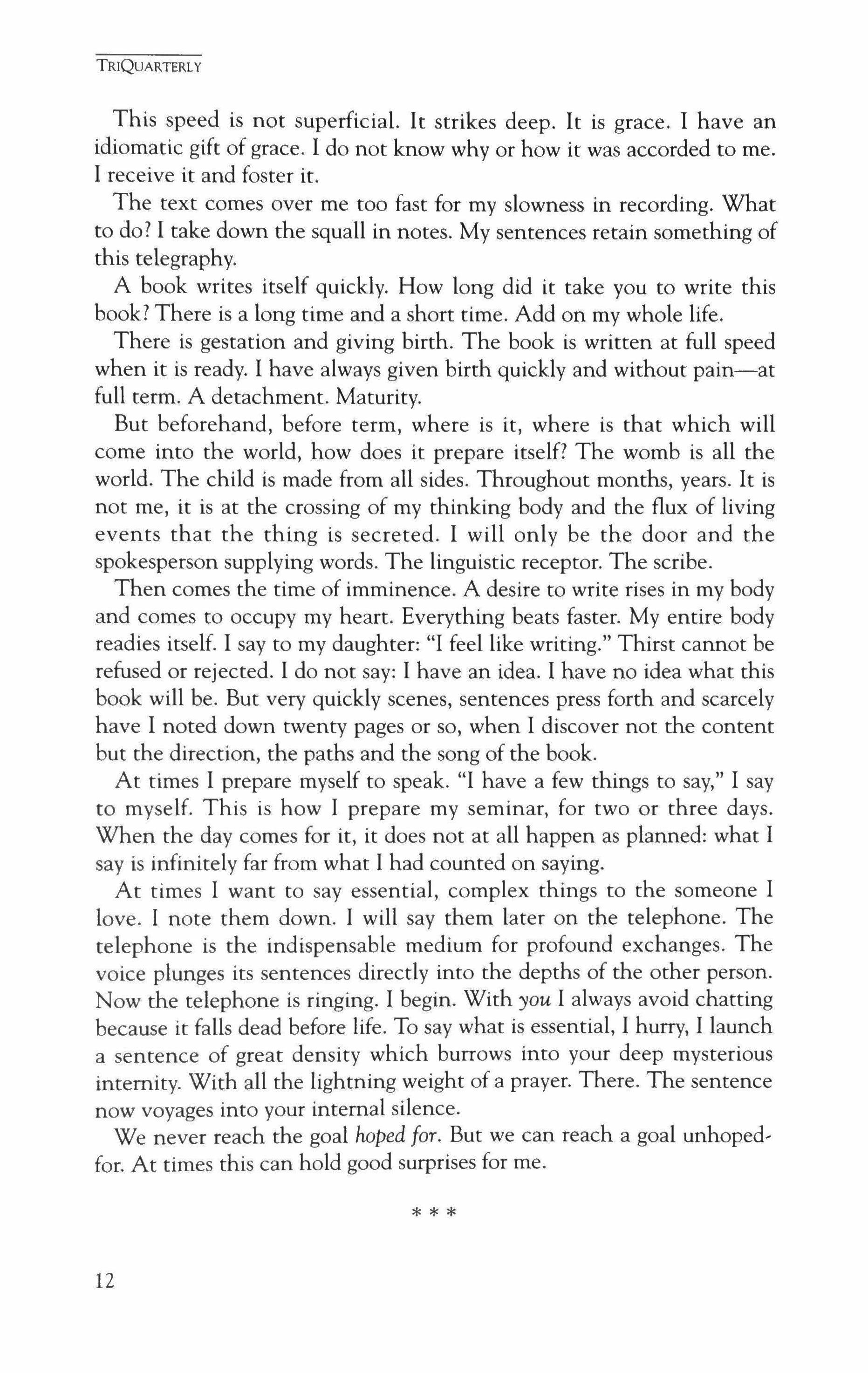
This speed is not superficial. It strikes deep. It is grace. I have an idiomatic gift of grace. I do not know why or how it was accorded to me. I receive it and foster it.
The text comes over me too fast for my slowness in recording. What to do? I take down the squall in notes. My sentences retain something of this telegraphy.
A book writes itself quickly. How long did it take you to write this book? There is a long time and a short time. Add on my whole life.
There is gestation and giving birth. The book is written at full speed when it is ready. I have always given birth quickly and without pain-at full term. A detachment. Maturity.
But beforehand, before term, where is it, where is that which will come into the world, how does it prepare itself? The womb is all the world. The child is made from all sides. Throughout months, years. It is not me, it is at the crossing of my thinking body and the flux of living events that the thing is secreted. I will only be the door and the spokesperson supplying words. The linguistic receptor. The scribe.
Then comes the time of imminence. A desire to write rises in my body and comes to occupy my heart. Everything beats faster. My entire body readies itself. I say to my daughter: "I feel like writing." Thirst cannot be refused or rejected. I do not say: I have an idea. I have no idea what this book will be. But very quickly scenes, sentences press forth and scarcely have I noted down twenty pages or so, when I discover not the content but the direction, the paths and the song of the book.
At times I prepare myself to speak. "I have a few things to say," I say to myself. This is how I prepare my seminar, for two or three days. When the day comes for it, it does not at all happen as planned: what I say is infinitely far from what I had counted on saying.
At times I want to say essential, complex things to the someone I love. I note them down. I will say them later on the telephone. The telephone is the indispensable medium for profound exchanges. The voice plunges its sentences directly into the depths of the other person. Now the telephone is ringing. I begin. With you I always avoid chatting because it falls dead before life. To say what is essential, I hurry, I launch a sentence of great density which burrows into your deep mysterious internity. With all the lightning weight of a prayer. There. The sentence now voyages into your internal silence.
We never reach the goal hoped for. But we can reach a goal unhopedfor. At times this can hold good surprises for me.
TRIQUARTERLY
*** 12
A book does not have a head and feet. It does not have a front door. It is written from all over at once, you enter it through a hundred windows. It enters you. A book is just about round. But since to appear, i.e. to be published, it must adjust itself into a rectangular parallelepiped, at a certain moment you cut the sphere, you flatten it, you square it up. You give the planet the form of a tomb. The book has only to await resurrection. Quickening.
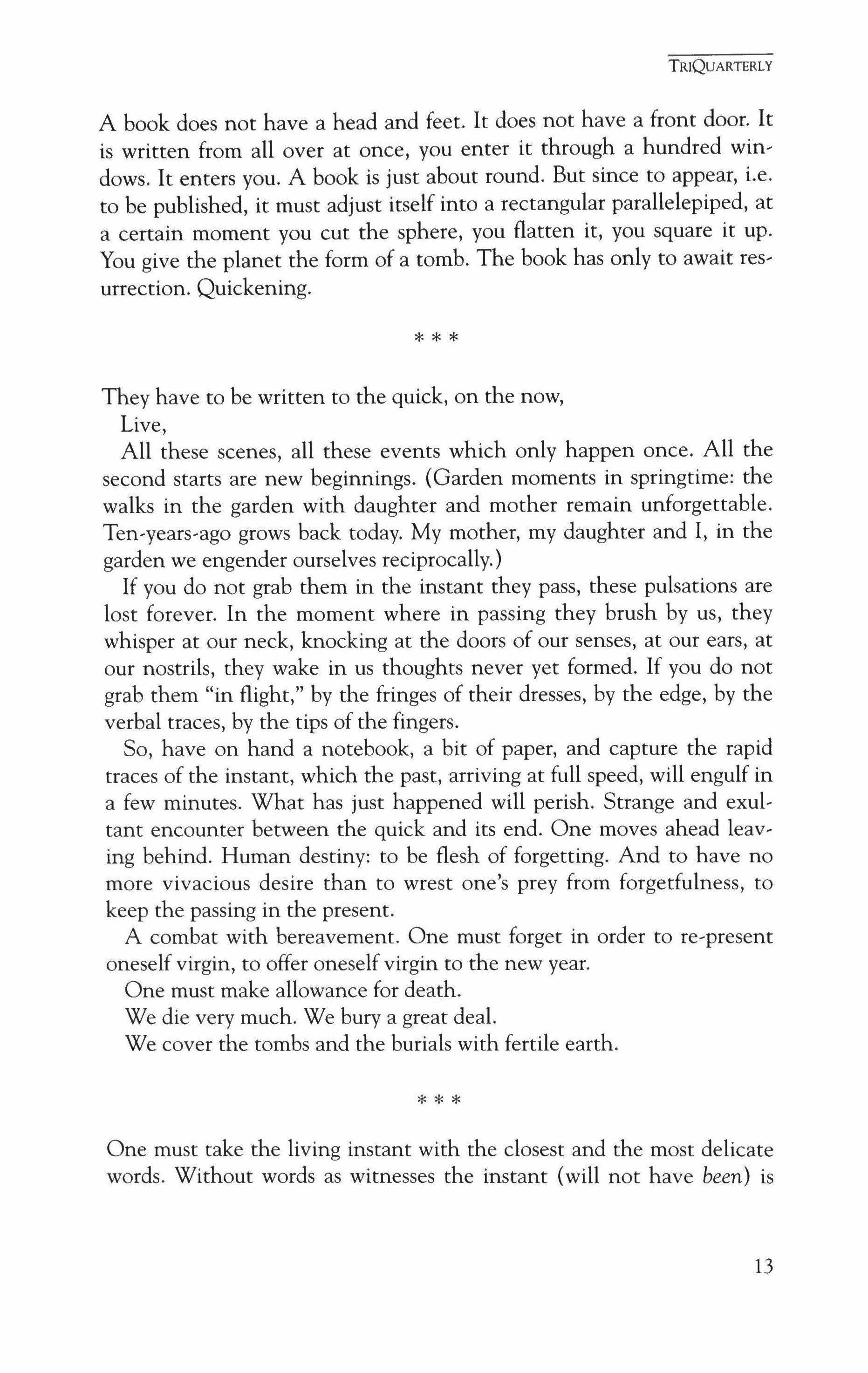
They have to be written to the quick, on the now, Live,
All these scenes, all these events which only happen once. All the second starts are new beginnings. (Garden moments in springtime: the walks in the garden with daughter and mother remain unforgettable. Ten-years-ago grows back today. My mother, my daughter and I, in the garden we engender ourselves reciprocally.)
If you do not grab them in the instant they pass, these pulsations are lost forever. In the moment where in passing they brush by us, they whisper at our neck, knocking at the doors of our senses, at our ears, at our nostrils, they wake in us thoughts never yet formed. If you do not grab them "in flight," by the fringes of their dresses, by the edge, by the verbal traces, by the tips of the fingers.
So, have on hand a notebook, a bit of paper, and capture the rapid traces of the instant, which the past, arriving at full speed, will engulf in a few minutes. What has just happened will perish. Strange and exultant encounter between the quick and its end. One moves ahead leaving behind. Human destiny: to be flesh of forgetting. And to have no more vivacious desire than to wrest one's prey from forgetfulness, to keep the passing in the present.
A combat with bereavement. One must forget in order to re-present oneself virgin, to offer oneself virgin to the new year.
One must make allowance for death.
We die very much. We bury a great deal.
We cover the tombs and the burials with fertile earth.
One must take the living instant with the closest and the most delicate words. Without words as witnesses the instant (will not have been) is
TRIQUARTERLY
* * *
* * *
13
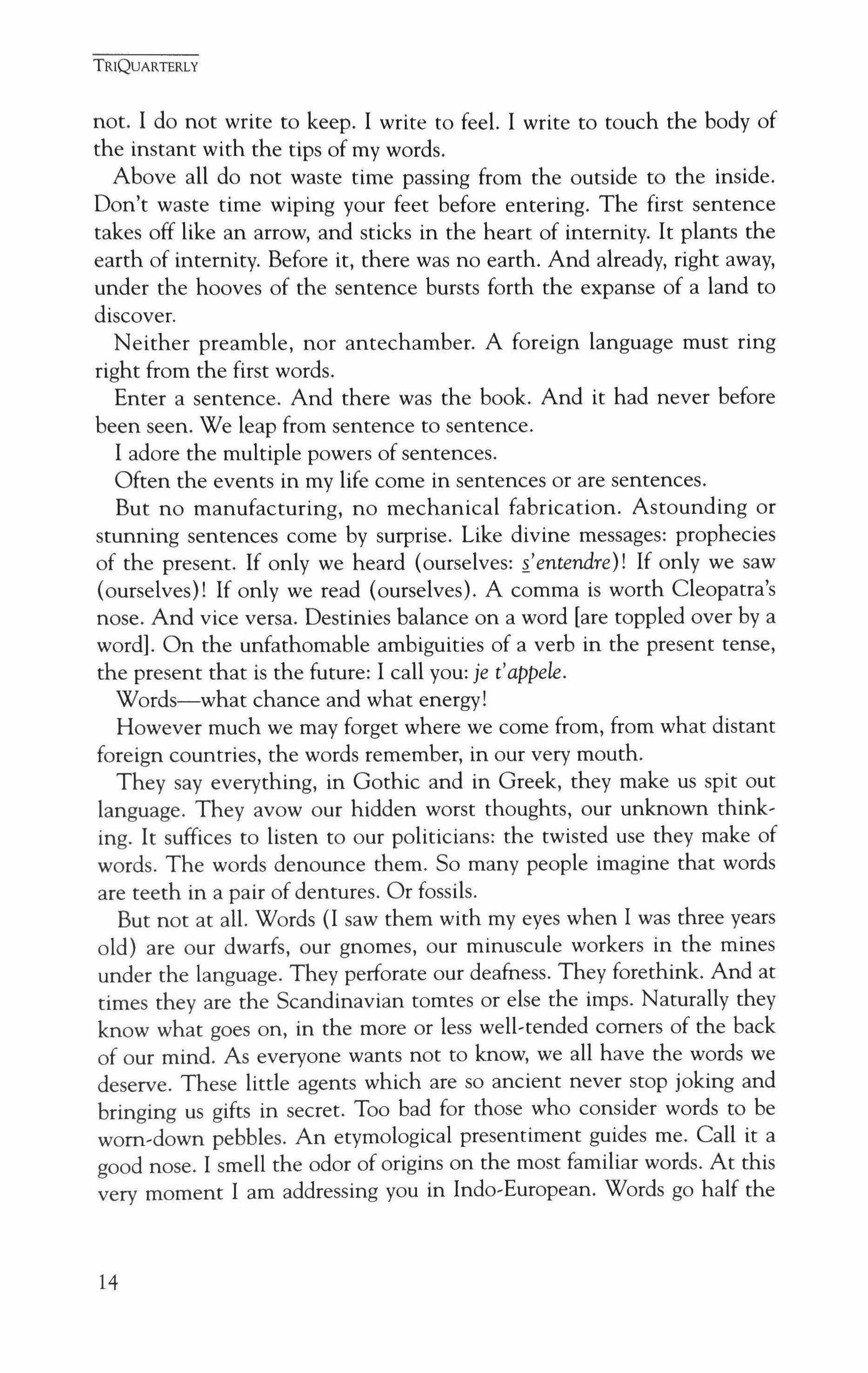
not. I do not write to keep. I write to feel. I write to touch the body of the instant with the tips of my words.
Above all do not waste time passing from the outside to the inside. Don't waste time wiping your feet before entering. The first sentence takes off like an arrow, and sticks in the heart of internity. It plants the earth of internity. Before it, there was no earth. And already, right away, under the hooves of the sentence bursts forth the expanse of a land to discover.
Neither preamble, nor antechamber. A foreign language must ring right from the first words.
Enter a sentence. And there was the book. And it had never before been seen. We leap from sentence to sentence.
I adore the multiple powers of sentences.
Often the events in my life come in sentences or are sentences.
But no manufacturing, no mechanical fabrication. Astounding or stunning sentences come by surprise. Like divine messages: prophecies of the present. If only we heard (ourselves: s'entendre)! If only we saw (ourselves)! If only we read (ourselves). A comma is worth Cleopatra's nose. And vice versa. Destinies balance on a word [are toppled over by a word]. On the unfathomable ambiguities of a verb in the present tense, the present that is the future: I call you: je r'appele.
Words-what chance and what energy!
However much we may forget where we come from, from what distant foreign countries, the words remember, in our very mouth.
They say everything, in Gothic and in Greek, they make us spit out language. They avow our hidden worst thoughts, our unknown thinking. It suffices to listen to our politicians: the twisted use they make of words. The words denounce them. So many people imagine that words are teeth in a pair of dentures. Or fossils.
But not at all. Words (l saw them with my eyes when I was three years old) are our dwarfs, our gnomes, our minuscule workers in the mines under the language. They perforate our deafness. They forethink. And at times they are the Scandinavian tomtes or else the imps. Naturally they know what goes on, in the more or less well-tended corners of the back of our mind. As everyone wants not to know, we all have the words we deserve. These little agents which are so ancient never stop joking and bringing us gifts in secret. Too bad for those who consider words to be worn-down pebbles. An etymological presentiment guides me. Call it a good nose. I smell the odor of origins on the most familiar words. At this very moment I am addressing you in Indo-European. Words go half the
TRIQUARTERLY
14

way for us, they do half the transportation, rushing from the Scamander and from the Rhine and from the Ganges they launch forth and with never-worn-out feet they come to strike the earth of the text.
I sense that in each book, words with hidden roots come and go in the thick of the text and carry out some other book between the lines. Suddenly I notice strange fruits in my garden. It is these verbal dwarfs who have made them grow.
And what words do between themselves-couplings, matings, hybridizations-is genius. An erotic and fertile genius. A law of life presides over their crossings [cross-breedings]. Only words in love inseminate [and disseminate: Seulement des mots que s'aiment semeru]. Superior semantics.
Language is not finished. We are all capable of being provisional demiurges, in creating newborns. Language lends itself willingly to these genetic miracles.
A newborn word moves us. A word born out of the love of two words is not a concept. Pfeilige. lnternity. It is only a poetic individual. Models? No models: there are none where I go, the savage earth is still being invented. But while I move ahead alone in the mobile night, I perceive the signals of other nocturnal vessels sailing under the same sky. It is because there is always that famous secret society, the Masonic Order of the Alert, the entirely diasporated people of border-jumpers. No one of them imitates another. But each one recognizes that the other is also responding to the [a] calL And we hear their passwords resonate. There is not one unique password, one shibboleth. Each has his own according to his language, and it is all the language of each that is shibboleth. The sonorous night is a caravan. Kayrawan came from Persia in the thirteenth century. And to sense that dead and surviving starsearchers share the solitude is reassuring. The solitude of each writing is always shared [partagee], partaken.
About the author
It is undoubtedly the death of my author that grafted in me the obligation to make sentences. I must write, or else the world will not exist. I must make everything: the world, the night, the day, the garden, the cooking, the childing, the countries; and I myselfdepend on this gesture. I write to replace the deceased author. I do not say "disappeared," because he is not entirely disappeared: he returns. I cannot not write: I must weave the firstdays of the year [New Year's days]. Planting, constructing, raising All of this is to keep death at a respectful distance.
TRIQUARTERLY
15
Death and I, we dialogize.
It is not a desire for mastery or for triumph. It is the fabrication of the raft riding on nothingness.
I have often said that my father, in going off precipitately, took with him the floor of the world and all the temple. It was terrifying to see that ruin. And so what happened to the family? Each one made a gesture to saturate the abyss. My mother became a midwife. My brother is almost a midwife, he is a pediatrician. Each one of us got busy around the process of bringing the world into the world. I set myself to weaving time. A year without a book-this has never happened to me, a year without the fabric of life. But I can go for as much as eight months, nine months, without putting into the world a world where I can put myself. But not longer.
But this world is first of all a stage, so that the characters of the theater's play can make their entrance.
A book and I are the hen and the egg. A self-fertilizing, dense, precise, polyglot and polyphonous language-in who engenders whom, who engenders who.
But how is it that I do not speak that language of writing when I speak? I cannot write in the air with my voice? When I speak-no writing, only discourse.
Answer:
The text needs the paper. It is in the contact with the sheet of paper that sentences emerge. As if coming out with great wing-strokes from a nest hidden beneath the paper. Maybe the sheet of paper is Khora?*
It is not written in my head. There must be the contact between my hand and the paper. I am not an intellectual. I am a painter. No computers. You do not paint with a computer. I paint, I draw the sentences from the secret well. I paint the passage: one cannot speak it. One can only perform it. No, never computers. The idea of the machine-that-isnot-me and that looks at me with its eye and reflects words in my eye reminds me of Polyphemus. Straight away I slip under the belly of a sheep, and body against body with the animal, my face buried in the wool, I flee the Computer that stares at my Night.
No, no eyes facing my blindness. I write without seeing that I write and what I write. As when we make love. It is a making with perfect dexterity and necessity, but we close our eyes so as not to distract our
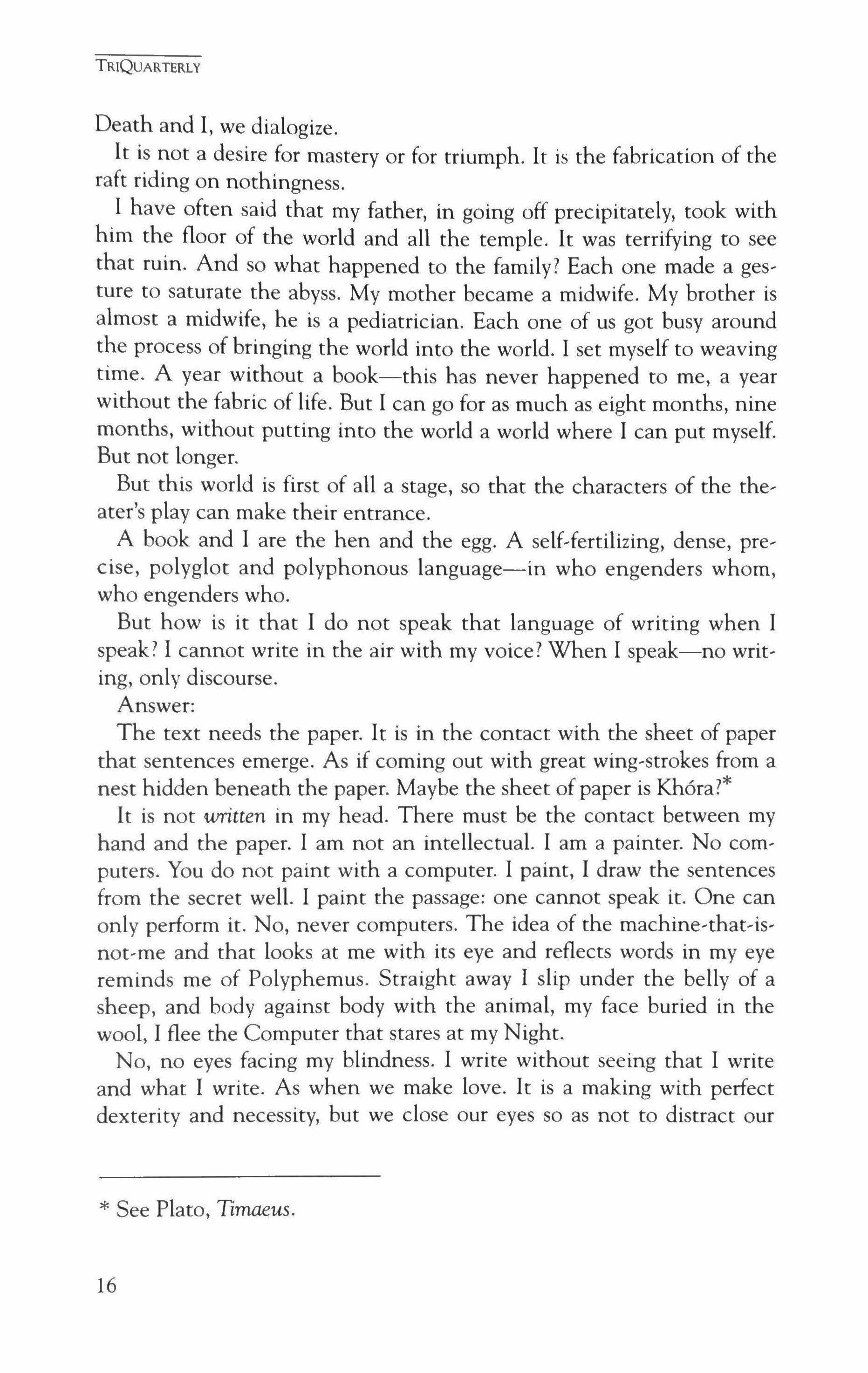
* See Plato, Timaeus.
TRIQUARTERLY
16
body, not to divert it from its intimate course.
As when we make love with the loved one, the only one, the one who is me, the one we trust as our own mother, the one I believe with my eyes shut, and I close my eyes so as better to believe, and so that the exterior will not exist, and so that we will be the two of us together in the hand of one same Night.
About the person whose name is You
I write you: I write to you and I write you. I will never say enough what my writing owes you.
I address myself to you. You are my address.
Each book is in a certain way a letter that wants to be received by you.
But it is not for you that I write: it is by you, passing through you, because of you-and thanks to you each book takes every liberty. A crazy liberty. The liberty, the freedom to not resemble, to not obey. But the book itself it not crazy. It has its deep logic. But without you I would be afraid of never being able to return from the ascension of Mount Crazy. But I can lose myself without anxiety because you keep me. The book is not a narrative, it is not a discourse, it is a poetic animal machine; the grain of its skin is pure poem. Because you keep watch.
The book gives itself the freedom to escape from the laws of society. It does not fit the description. It does not answer the signals. It does not get a visa.
For the police-force reader it seems to be an anarchic thing, an untamed animal. It incites and triggers the reflex to arrest. But the freedom my book gives itself is not insane. It exercises the right to invention, to research. We only search for what no one has yet found, but which exists nonetheless. We search for one land, we find another.
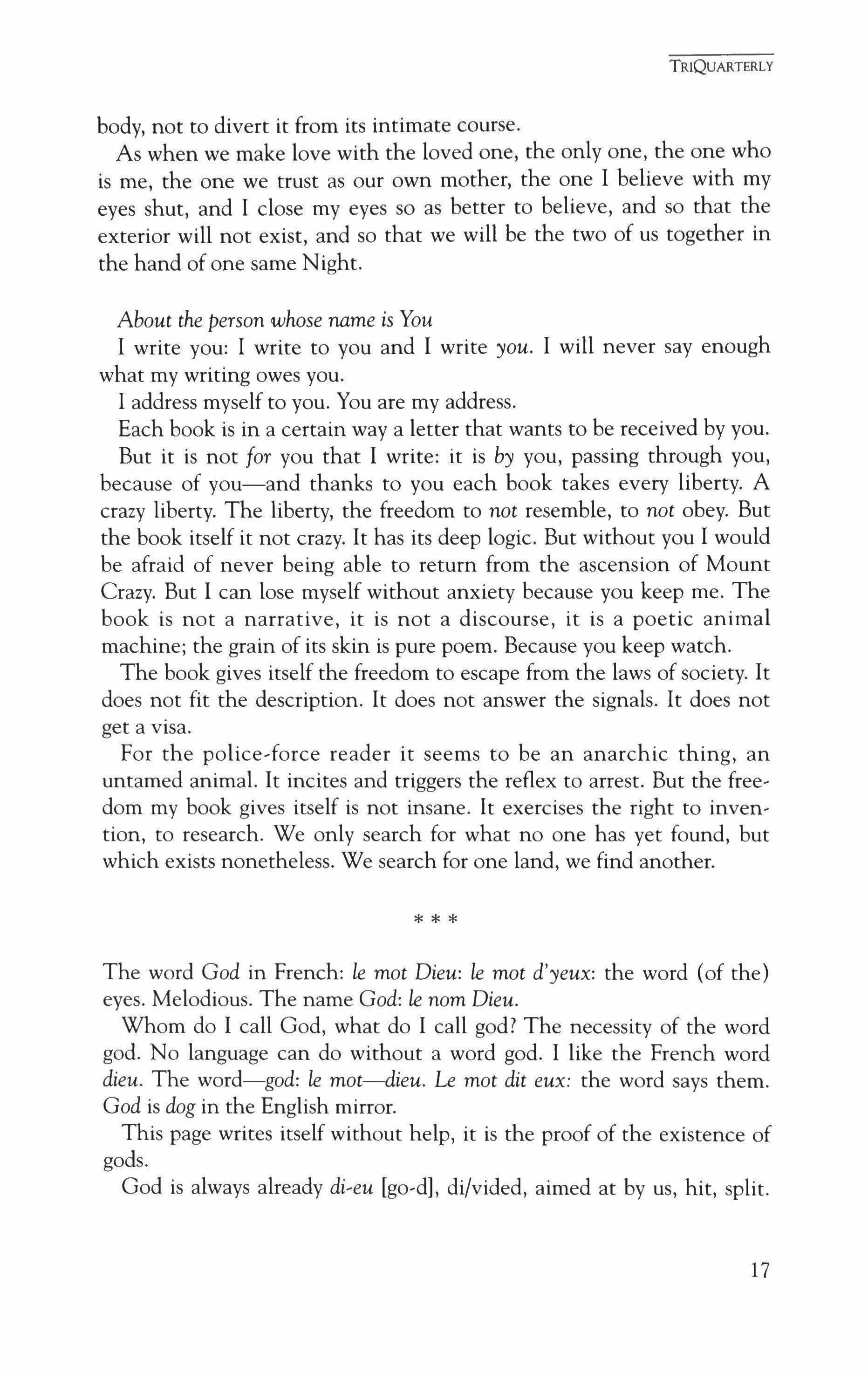
The word God in French: Ie mot Dieu: Ie mot d'yeux: the word (of the) eyes. Melodious. The name God: Ie nom Dieu.
Whom do I call God, what do I call god? The necessity of the word god. No language can do without a word god. I like the French word dieu. The word-god: Ie mot-dieu. Le mot dit eux: the word says them. God is dog in the English mirror.
This page writes itself without help, it is the proof of the existence of gods.
God is always already di�eu [go-d], di/vided, aimed at by us, hit, split.
TRIQUARTERLY
* * *
17
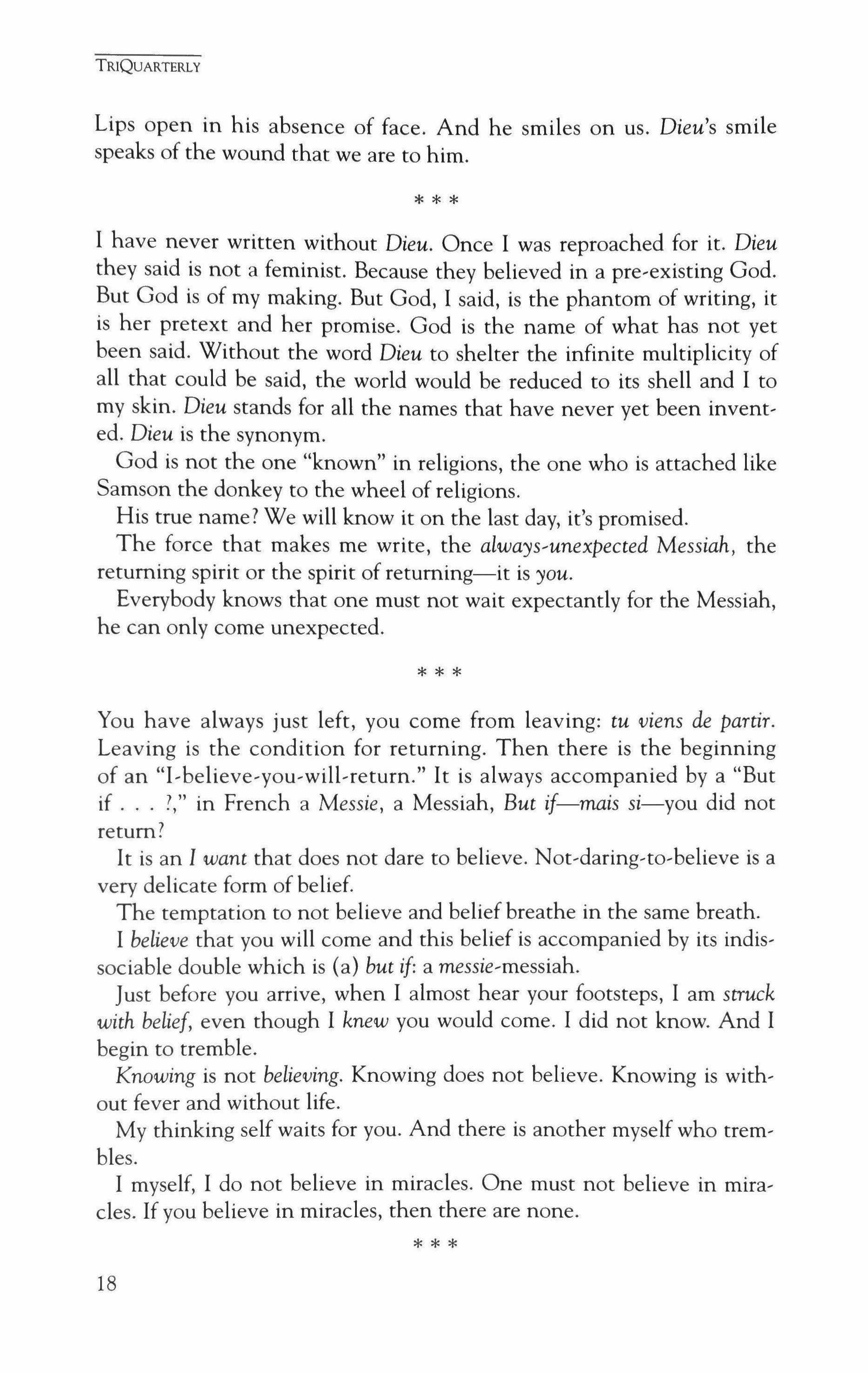
Lips open in his absence of face. And he smiles on us. Dieu's smile speaks of the wound that we are to him.
* * *
I have never written without Dieu. Once I was reproached for it. Dieu they said is not a feminist. Because they believed in a pre-existing God. But God is of my making. But God, I said, is the phantom of writing, it is her pretext and her promise. God is the name of what has not yet been said. Without the word Dieu to shelter the infinite multiplicity of all that could be said, the world would be reduced to its shell and I to my skin. Dieu stands for all the names that have never yet been invent, ed. Dieu is the synonym.
God is not the one "known" in religions, the one who is attached like Samson the donkey to the wheel of religions.
His true name? We will know it on the last day, it's promised.
The force that makes me write, the always,unexpected Messiah, the returning spirit or the spirit of returning-it is you.
Everybody knows that one must not wait expectantly for the Messiah, he can only come unexpected.
* * *
You have always just left, you come from leaving: tu viens de partir. Leaving is the condition for returning. Then there is the beginning of an "l-believe-you-will-return." It is always accompanied by a "But if ?," in French a Messie, a Messiah, But if-mais si-you did not return?
It is an I want that does not dare to believe. Not-daring-to-believe is a very delicate form of belief.
The temptation to not believe and belief breathe in the same breath. I believe that you will come and this belief is accompanied by its indissociable double which is (a) but if: a messie-messiah.
Just before you arrive, when I almost hear your footsteps, I am struck with belief, even though I knew you would come. I did not know. And I begin to tremble.
Knowing is not believing. Knowing does not believe. Knowing is with, out fever and without life.
My thinking self waits for you. And there is another myself who trernbles.
I myself, I do not believe in miracles. One must not believe in mira' cles. If you believe in miracles, then there are none.
TRIQUARTERLY
*** 18
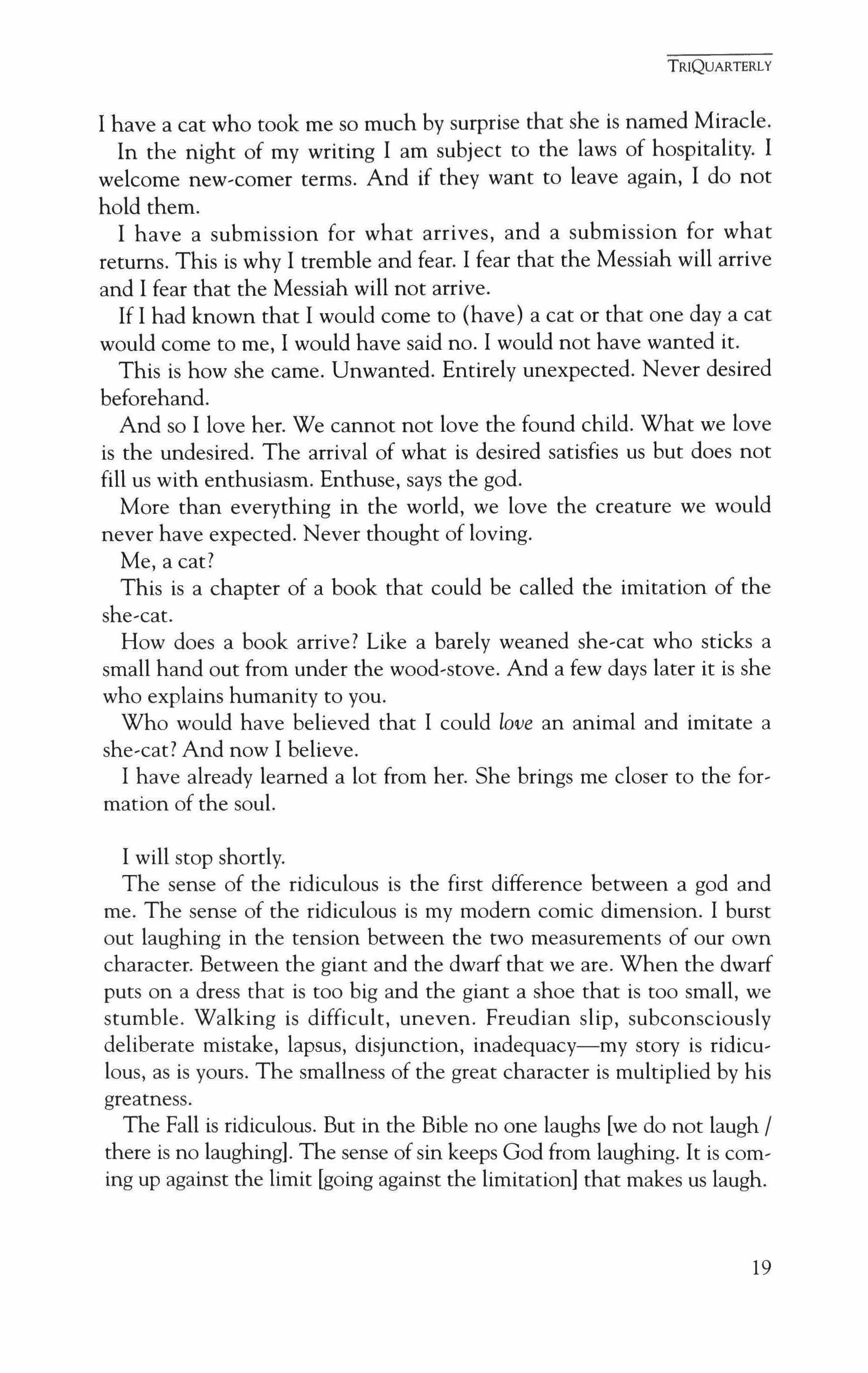
I have a cat who took me so much by surprise that she is named Miracle. In the night of my writing I am subject to the laws of hospitality. I welcome new-comer terms. And if they want to leave again, I do not hold them.
I have a submission for what arrives, and a submission for what returns. This is why I tremble and fear. I fear that the Messiah will arrive and I fear that the Messiah will not arrive.
If I had known that I would come to (have) a cat or that one day a cat would come to me, I would have said no. I would not have wanted it.
This is how she came. Unwanted. Entirely unexpected. Never desired beforehand.
And so I love her. We cannot not love the found child. What we love is the undesired. The arrival of what is desired satisfies us but does not fill us with enthusiasm. Enthuse, says the god.
More than everything in the world, we love the creature we would never have expected. Never thought of loving.
Me, a cat?
This is a chapter of a book that could be called the imitation of the she-cat.
How does a book arrive? Like a barely weaned she-cat who sticks a small hand out from under the wood-stove. And a few days later it is she who explains humanity to you.
Who would have believed that I could love an animal and imitate a she-cat? And now I believe.
I have already learned a lot from her. She brings me closer to the formation of the soul.
I will stop shortly.
The sense of the ridiculous is the first difference between a god and me. The sense of the ridiculous is my modem comic dimension. I burst out laughing in the tension between the two measurements of our own character. Between the giant and the dwarf that we are. When the dwarf puts on a dress that is too big and the giant a shoe that is too small, we stumble. Walking is difficult, uneven. Freudian slip, subconsciously deliberate mistake, lapsus, disjunction, inadequacy-my story is ridiculous, as is yours. The smallness of the great character is multiplied by his greatness.
The Fall is ridiculous. But in the Bible no one laughs [we do not laugh / there is no laughing]. The sense of sin keeps God from laughing. It is coming up against the limit [going against the limitation] that makes us laugh.
TRIQUARTERLY
19

In my Bible, we have the sense of the ridiculous. It is a great liberty. We enjoy it when we do not have the constraint of contrition. So chased from paradise, I go off precipitately and concretely without having had the time to take my shower. Then I spend the whole day looking for a bathroom. In complete contravention of the sense of epic decorum.
And glasses [spectacles]? Can we imagine a literature without glasses today? How did the myopic heroes manage before the walls of Troy?
We cannot imagine Phaedra entering on stage with glasses. And yet? Cleopatra with glasses is a violation [act of violence]. I want Phaedra not to be ashamed to wear glasses.
My effort in language and in thematics is to break with interdictions and false modesties. This is why I go so willingly into the house of dreams: I admire them for their aptitude for nondiscrimination. It is in their house that the equal light from before the guilty feeling reigns. Neither pride, not shame. It is only in dreams that we are strong and generous enough to look God in the face while he bursts out laughing. That creation, really! Those creatures! It takes some doing! And I laugh also to have caught God doing what he has never done elsewhere.
TRIQUARTERLY
20
Interview with Norman Manea
Marco Cugno
Translated from the Romanian by
Patrick Camiller
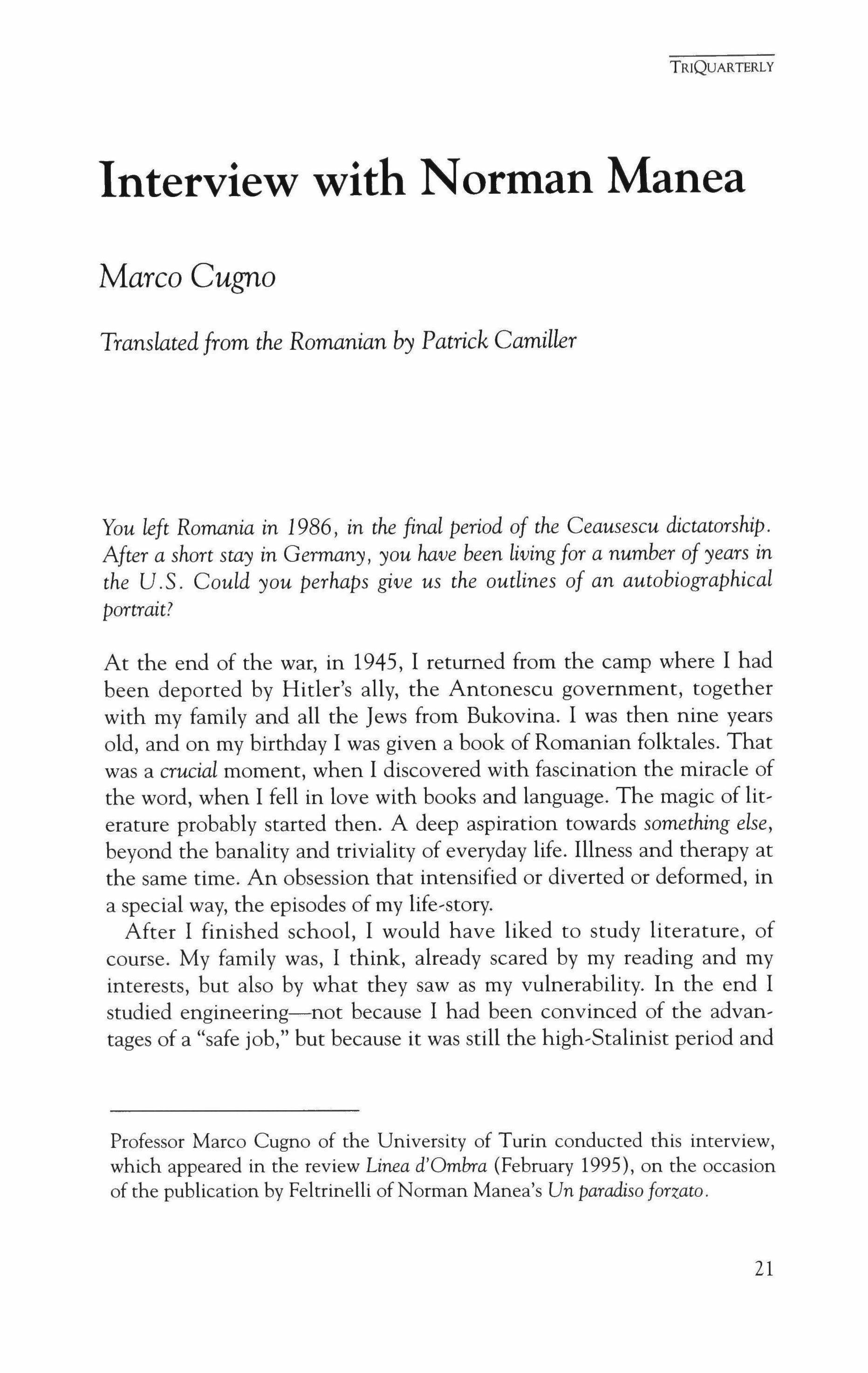
You left Romania in 1986, in the final period of the Ceausescu dictatorship. After a short stay in Germany, you have been livingfor a number of years in the U. S. Could you perhaps give us the outlines of an autobiographical portrait?
At the end of the war, in 1945, I returned from the camp where I had been deported by Hitler's ally, the Antonescu government, together with my family and all the Jews from Bukovina. I was then nine years old, and on my birthday I was given a book of Romanian folktales. That was a crucial moment, when I discovered with fascination the miracle of the word, when I fell in love with books and language. The magic of lit, erature probably started then. A deep aspiration towards something else, beyond the banality and triviality of everyday life. Illness and therapy at the same time. An obsession that intensified or diverted or deformed, in a special way, the episodes of my life-story. After I finished school, I would have liked to study literature, of course. My family was, I think, already scared by my reading and my interests, but also by what they saw as my vulnerability. In the end I studied engineering-not because I had been convinced of the advantages of a "safe job," but because it was still the high,Stalinist period and Professor Marco Cugno of the University of Turin conducted this interview, which appeared in the review Linea d'Ombra (February 1995), on the occasion of the publication by Feltrinelli of Norman Manea's Un paradiso forzato.
TRIQUARTERLY
21

I hoped that a concrete, useful occupation would give at least some pro' teetion from the surrounding ideological pressure, and because I was disgusted by the stupid demagogy in which "socialist literature," still strongly Proletkultist, indulged at the time. I wasted the best years of my youth in a quite unsuitable and extremely tiring profession. But it did make me directly familiar with interesting people and situations that I would not otherwise have come across. While an engineer, I naturally continued to read intensively and to write. Once the so-called "liberalization" came in the mid-sixties, I began to be published. My debut was in 1966, in the tiny literary review Povestea Vorbii, run by the "talentspotter" M. R. Paraschivescu. In just six issues, before it was suppressed, the journal's four mini-pages promoted unknown names who would later become some of the most important poets and prose writers of contemporary Romanian literature. In 1969 my first volume of short stories, Noaptea pe latura lunga [The Night on the Long Side], was published with a preface by the same M. R. Paraschivescu, who saw in me his great "coup." Other books followed in subsequent years. I could probably write a small volume about my "adventures" with publishing houses and censors in connection with each book of mine that appeared in Romania, whether because it was apolitical or because it had a political theme. But somehow or other, I had published ten volumes in Romania by 1986 (short stories, novels and essays).
The joy of reading and the fervor of literary projects make up for a lot of misery in the real world. The writer finds refuge in books and language, "even when the language is German and the writer Jewish," as Celan once said. Life is unpredictably short: you can't touch off too many changes if you want to have anything to show for it-that's how I used to think in my years as a writer in Romania. When there was no longer anything to hope for, I still delayed leaving for too long. And when I was forced to leave, I still hoped to return to my books, to writing and language. I hesitated for an inadmissibly long time, before I accepted exile.
I left Romania in 1986, "at the very last moment," with a one-month tourist visa. I wasn't at all decided to remain abroad. But I have never once been back, not even for a visit. In 1988, when I was already in Washington, my mother died. And in 1989 my father, then eighty-one years old, emigrated to Israel.
You were born in Bukovina, like Paul Celano What has Bukovina represented in the history ofRomania?
TRIQUARTERLY
22

It would be too complicated here to dwell on Bukovina's historical position as a borderland between empires and a zone of traffic and exchange between Romania, Poland, Ukraine, Austria, and so on. Bukovina has a superb natural location in northeast Romania. Thanks to its past as a province of the Austro-Hungarian Empire, it has been a fertile medium for stimulating intellectual communication, a cosmopolitan region in which Romanians, Jews, Germans, Poles and Ukrainians have lived side by side. Bukovina also occupies a privileged position in creative life, not just for Romanians but also for the other ethnic groups. It has sometimes been called "the placenta of Romanian literature," because of the important writers who originated there, but it has also produced Yiddish, Hebrew, German and Ukrainian writers of undoubted value. Unfortunately part of Bukovina was taken from Romania by the Soviet Union in 1940, in accordance with secret clauses of the MolotovRibbentrop Pact. So today the famous Cernauti (Czernowitz), once known as the "little Vienna," is absurdly a "Ukrainian" city.
Can you tell us something about your family and its origins? Also about how the Jews came to Romania, the role they played, and their integration or non' integration?
A "family tree" is much harder to draw up for a Jew than for a member of a static and stable community who has been spared the hostility of the surrounding world and the need to migrate from one place to anether. I have tried without success, for example, to discover the real origin of my name, Manea, which sounds distinctly Romanian. Did it come from Mann or Manes, or perhaps even Manovici? No one in my family has ever been able to clear up the mystery for me. My grandfather on my father's side already bore this name. He had it when he fought as a soldier in the Romanian army. I actually knew my grandfathers: they were very different from each other. Each occupied himself with a key element in life: books and bread. I was closer to my maternal grandfather, a bookseller from a traditionally Jewish, religious family linked to books; it was the cerebral and depressive side of the family, full of anxiety and humor. That grandfather was deported with us, and he died in the camp during the terrible winter of 1941�42. I also knew my other grandfather a little: he was a baker, the type of the Jewish peasant looking after a farm with horses, cows and sheep, and having lots of children. That was the calmer, more balanced side of my family, more bound up with nature and the immediate joys of life.
TRIQUARTERLY
23
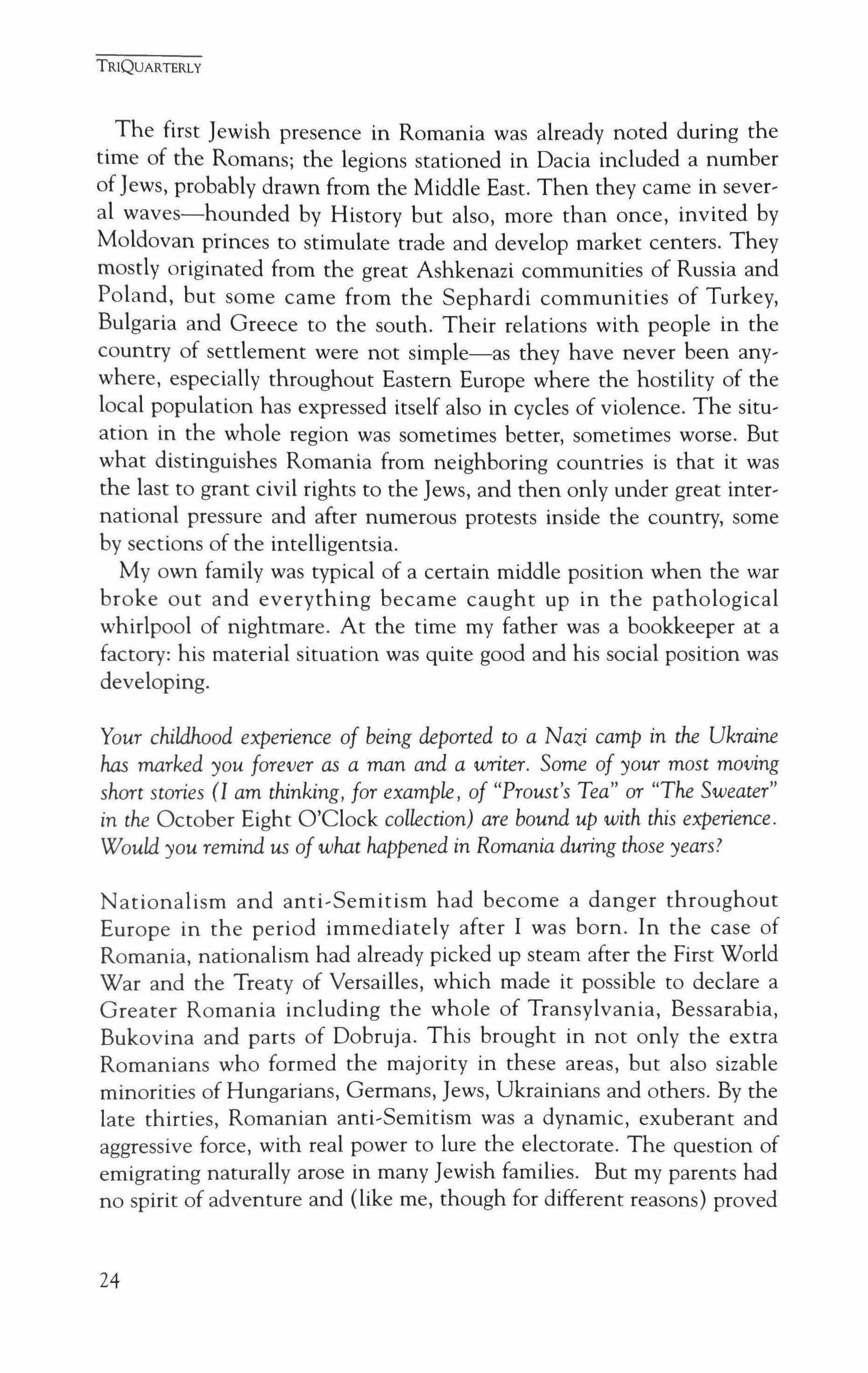
The first Jewish presence in Romania was already noted during the time of the Romans; the legions stationed in Dacia included a number of Jews, probably drawn from the Middle East. Then they came in sever, al waves-hounded by History but also, more than once, invited by Moldovan princes to stimulate trade and develop market centers. They mostly originated from the great Ashkenazi communities of Russia and Poland, but some came from the Sephardi communities of Turkey, Bulgaria and Greece to the south. Their relations with people in the country of settlement were not simple-as they have never been any' where, especially throughout Eastern Europe where the hostility of the local population has expressed itself also in cycles of violence. The situ, ation in the whole region was sometimes better, sometimes worse. But what distinguishes Romania from neighboring countries is that it was the last to grant civil rights to the Jews, and then only under great inter, national pressure and after numerous protests inside the country, some by sections of the intelligentsia.
My own family was typical of a certain middle position when the war broke out and everything became caught up in the pathological whirlpool of nightmare. At the time my father was a bookkeeper at a factory: his material situation was quite good and his social position was developing.
Your childhood experience of being deported to a Nazi camp in the Ukraine has marked you forever as a man and a uniter. Some of your most moving short stories (I am thinking, for example, of "Proust's Tea" or "The Sweater" in the October Eight O'Clock collection) are bound up with this experience. Would you remind us of what happened in Romania during those years?
Nationalism and anti-Semitism had become a danger throughout Europe in the period immediately after I was born. In the case of Romania, nationalism had already picked up steam after the First World War and the Treaty of Versailles, which made it possible to declare a Greater Romania including the whole of Transylvania, Bessarabia, Bukovina and parts of Dobruja. This brought in not only the extra Romanians who formed the majority in these areas, but also sizable minorities of Hungarians, Germans, Jews, Ukrainians and others. By the late thirties, Romanian anti-Semitism was a dynamic, exuberant and aggressive force, with real power to lure the electorate. The question of emigrating naturally arose in many Jewish families. But my parents had no spirit of adventure and (like me, though for different reasons) proved
TRIQUARTERLY
24
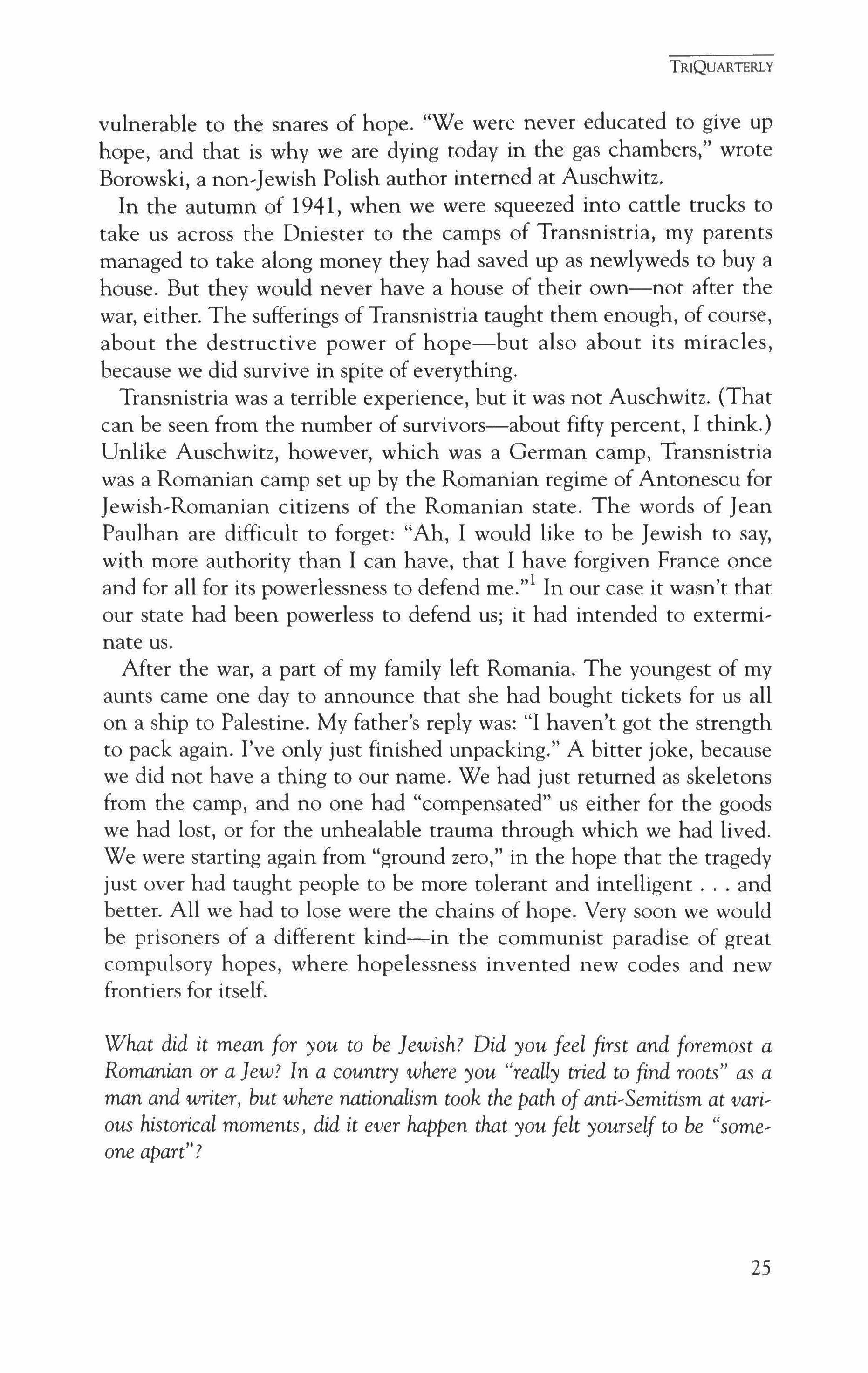
vulnerable to the snares of hope. "We were never educated to give up hope, and that is why we are dying today in the gas chambers," wrote Borowski, a non-jewish Polish author interned at Auschwitz.
In the autumn of 1941, when we were squeezed into cattle trucks to take us across the Dniester to the camps of Transnistria, my parents managed to take along money they had saved up as newlyweds to buy a house. But they would never have a house of their own-not after the war, either. The sufferings of Transnistria taught them enough, of course, about the destructive power of hope-but also about its miracles, because we did survive in spite of everything.
Transnistria was a terrible experience, but it was not Auschwitz. (That can be seen from the number of survivors-about fifty percent, I think.) Unlike Auschwitz, however, which was a German camp, Transnistria was a Romanian camp set up by the Romanian regime of Antonescu for [ewish-Romanian citizens of the Romanian state. The words of Jean Paulhan are difficult to forget: "Ah, I would like to be Jewish to say, with more authority than I can have, that I have forgiven France once and for all for its powerlessness to defend me."l In our case it wasn't that our state had been powerless to defend us; it had intended to exterrninate us.
After the war, a part of my family left Romania. The youngest of my aunts came one day to announce that she had bought tickets for us all on a ship to Palestine. My father's reply was: "I haven't got the strength to pack again. I've only just finished unpacking." A bitter joke, because we did not have a thing to our name. We had just returned as skeletons from the camp, and no one had "compensated" us either for the goods we had lost, or for the unhealable trauma through which we had lived. We were starting again from "ground zero," in the hope that the tragedy just over had taught people to be more tolerant and intelligent and better. All we had to lose were the chains of hope. Very soon we would be prisoners of a different kind-in the communist paradise of great compulsory hopes, where hopelessness invented new codes and new frontiers for itself.
What did it mean for you to be Jewish? Did you feel first and foremost a Romanian or a Jew? In a country where you "really tried to find roots" as a man and writer, but where nationalism took the path of anti,Semitism at vatious historical moments, did it ever happen that you felt yourself to be "some, one apart"?
TRIQUARTERLY
25
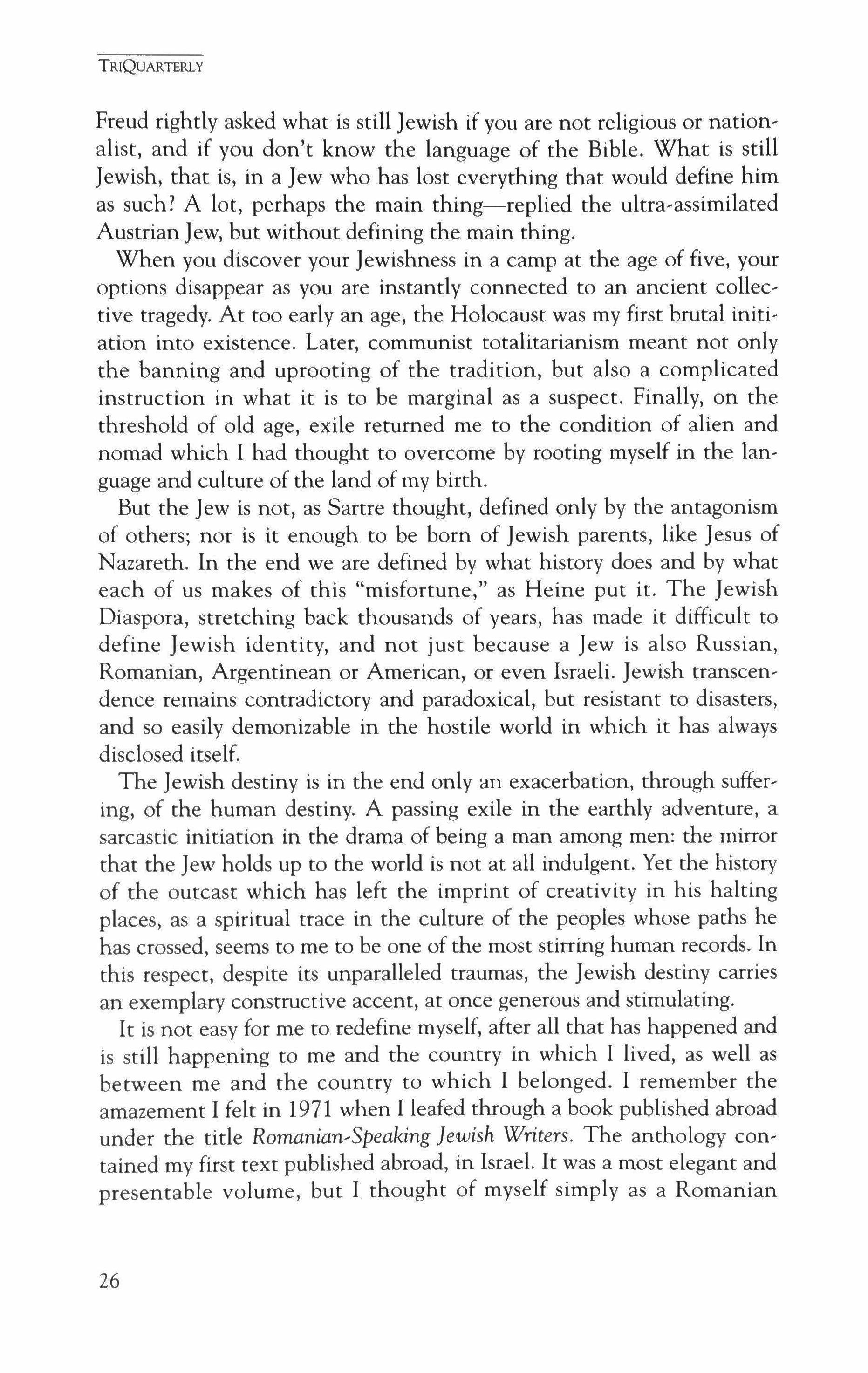
Freud rightly asked what is still Jewish if you are not religious or nationalist, and if you don't know the language of the Bible. What is still Jewish, that is, in a Jew who has lost everything that would define him as such? A lot, perhaps the main thing-replied the ultra-assimilated Austrian Jew, but without defining the main thing.
When you discover your [ewishness in a camp at the age of five, your options disappear as you are instantly connected to an ancient collective tragedy. At too early an age, the Holocaust was my first brutal initiation into existence. Later, communist totalitarianism meant not only the banning and uprooting of the tradition, but also a complicated instruction in what it is to be marginal as a suspect. Finally, on the threshold of old age, exile returned me to the condition of alien and nomad which I had thought to overcome by rooting myself in the Ianguage and culture of the land of my birth.
But the Jew is not, as Sartre thought, defined only by the antagonism of others; nor is it enough to be born of Jewish parents, like Jesus of Nazareth. In the end we are defined by what history does and by what each of us makes of this "misfortune," as Heine put it. The Jewish Diaspora, stretching back thousands of years, has made it difficult to define Jewish identity, and not just because a Jew is also Russian, Romanian, Argentinean or American, or even Israeli. Jewish transcendence remains contradictory and paradoxical, but resistant to disasters, and so easily demonizable in the hostile world in which it has always disclosed itself.
The Jewish destiny is in the end only an exacerbation, through suffering, of the human destiny. A passing exile in the earthly adventure, a sarcastic initiation in the drama of being a man among men: the mirror that the Jew holds up to the world is not at all indulgent. Yet the history of the outcast which has left the imprint of creativity in his halting places, as a spiritual trace in the culture of the peoples whose paths he has crossed, seems to me to be one of the most stirring human records. In this respect, despite its unparalleled traumas, the Jewish destiny carries an exemplary constructive accent, at once generous and stimulating. It is not easy for me to redefine myself, after all that has happened and is still happening to me and the country in which I lived, as well as between me and the country to which I belonged. I remember the amazement I felt in 1971 when I leafed through a book published abroad under the title Romanian�Speaking Jewish Writers. The anthology contained my first text published abroad, in Israel. It was a most elegant and presentable volume, but I thought of myself simply as a Romanian
TRIQUARTERLY
26
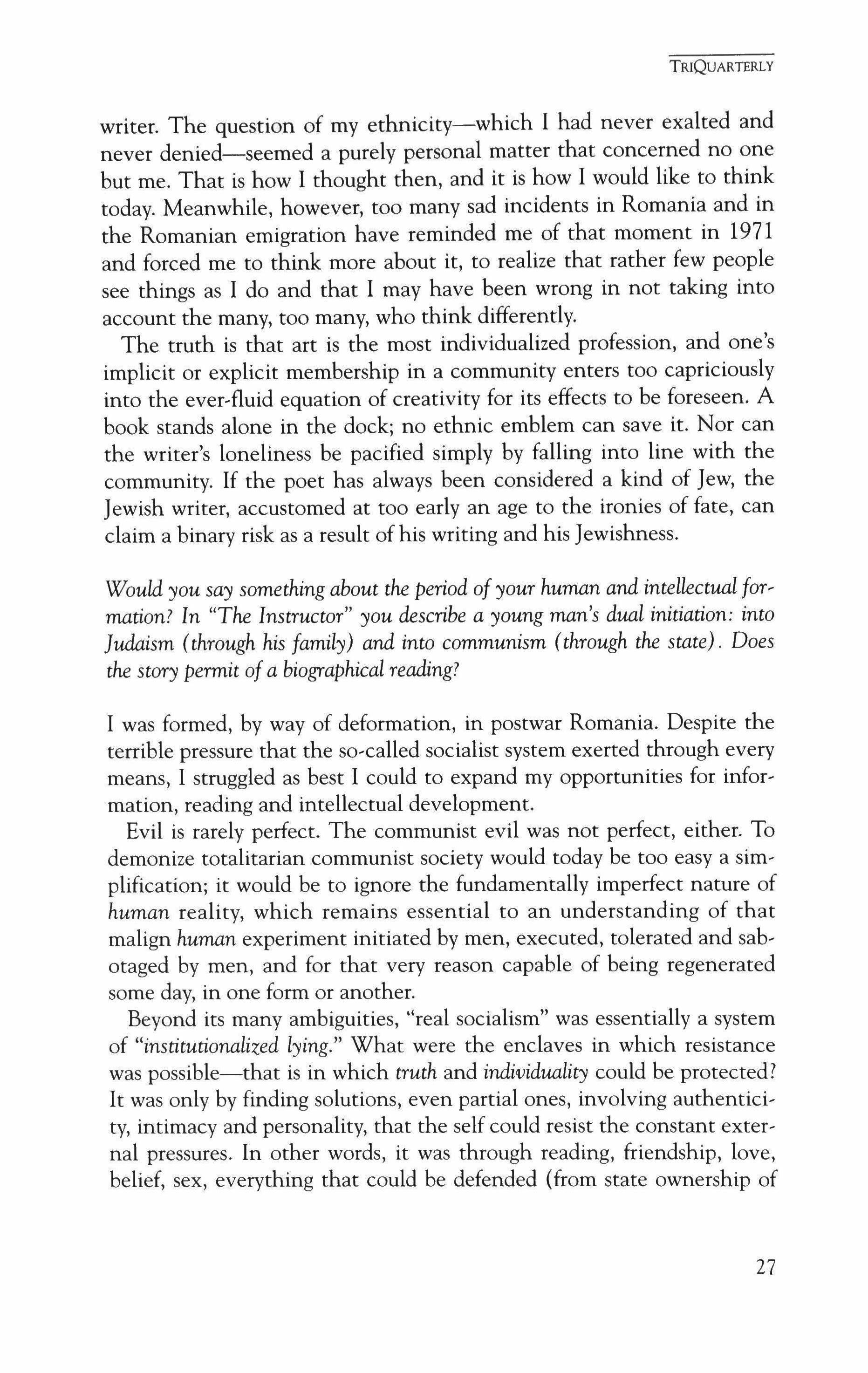
writer. The question of my ethnicity-which I had never exalted and never denied-seemed a purely personal matter that concerned no one but me. That is how I thought then, and it is how I would like to think today. Meanwhile, however, too many sad incidents in Romania and in the Romanian emigration have reminded me of that moment in 1971 and forced me to think more about it, to realize that rather few people see things as I do and that I may have been wrong in not taking into account the many, too many, who think differently.
The truth is that art is the most individualized profession, and one's implicit or explicit membership in a community enters too capriciously into the ever-fluid equation of creativity for its effects to be foreseen. A book stands alone in the dock; no ethnic emblem can save it. Nor can the writer's loneliness be pacified simply by falling into line with the community. If the poet has always been considered a kind of Jew, the Jewish writer, accustomed at too early an age to the ironies of fate, can claim a binary risk as a result of his writing and his Jewishness.
Would you say something about the period of your human and intellectual formation? In "The Instructor" you describe a young man's dual initiation: into Judaism (through his family) and into communism (through the state). Does the story permit of a biographical reading?
I was formed, by way of deformation, in postwar Romania. Despite the terrible pressure that the so-called socialist system exerted through every means, I struggled as best I could to expand my opportunities for information, reading and intellectual development.
Evil is rarely perfect. The communist evil was not perfect, either. To demonize totalitarian communist society would today be too easy a simplification; it would be to ignore the fundamentally imperfect nature of human reality, which remains essential to an understanding of that malign human experiment initiated by men, executed, tolerated and sabotaged by men, and for that very reason capable of being regenerated some day, in one form or another.
Beyond its many ambiguities, "real socialism" was essentially a system of "institutionalized lying." What were the enclaves in which resistance was possible-that is in which truth and individuality could be protected? It was only by finding solutions, even partial ones, involving authenticity, intimacy and personality, that the self could resist the constant external pressures. In other words, it was through reading, friendship, love, belief, sex, everything that could be defended (from state ownership of
TRIQUARTERLY
27

our thoughts and our soul) as the last, secret, coded expression of personal wealth (and life). As Primo Levi said about the camps, even "thinking and observing were factors of survival."
No one escaped without being affected, however. The survivors are partial victims (the full ones being dead), but their wounds do not just go away.
Yes, "The lnstructor'f can be related to my own experience. As a teenager I was tom between the communist utopia and my family tradition, which-without being bigoted-preserved some of the more important Jewish rituals. At the age of thirteen, I was a fiery and dreamy young communist whose family wanted at all costs to celebrate his male coming of age in accordance with Jewish tradition. At seventeen I was already cured of communist illusions-and there was no special merit in that. You just had to keep your eyes open, not to be seduced by the vice and adventure of deception, not to want to climb the social ladder at any price. But my moving away from communism did not mean a return to Jewish tradition. The hero of "The Instructor" eventually chooses the third way-the path of creation and art. That is, he chooses the chimera of writing. It is his way of bestowing durability and even transcendence upon his fellow creatures, who are gradually leaving the biography of the place, and even his own biography. It is, in the end, an attempt to bestow posterity upon them through art.
Literature was a great chance in the effort to resist degradation and to survive the darkness. During the wartime siege of Leningrad, when people would eat mice and freeze alive, many found an extraordinary regenerative power in the re-reading of Tolstoy and Dostoevsky. Primo Levi, in Auschwitz, revived by reading Dante again, not antifascist poems. In the conditions of the socialist regime, literature increased its chances as a kind of revitalizing dialogue with elevated voices of invisible friends. In my life as a reader, and not just as a writer, there has been a moment of Proust, a moment of Faulkner, a moment of Latin American literature, a moment ofJoyce. I could never forget the joyful excitement with which I read Musil, Kafka, Svevo Schulz or a lot of contemporary American literature. I was especially concerned with the modem "fissure" in art and its literary expression. Books from another world helped me to return to writing after cyclical periods of depression. Similarly, in my youth the great Russian writers, who were copiously translated during the Stalinist period (Turgenev, Pushkin, Lermontov, Chekhov, Tolstoy, Goncharov, and later Dostoevsky), helped me to resist eretinization through "socialist realism" and to keep as far as possible from official literature.
TRIQUARTERLY
28
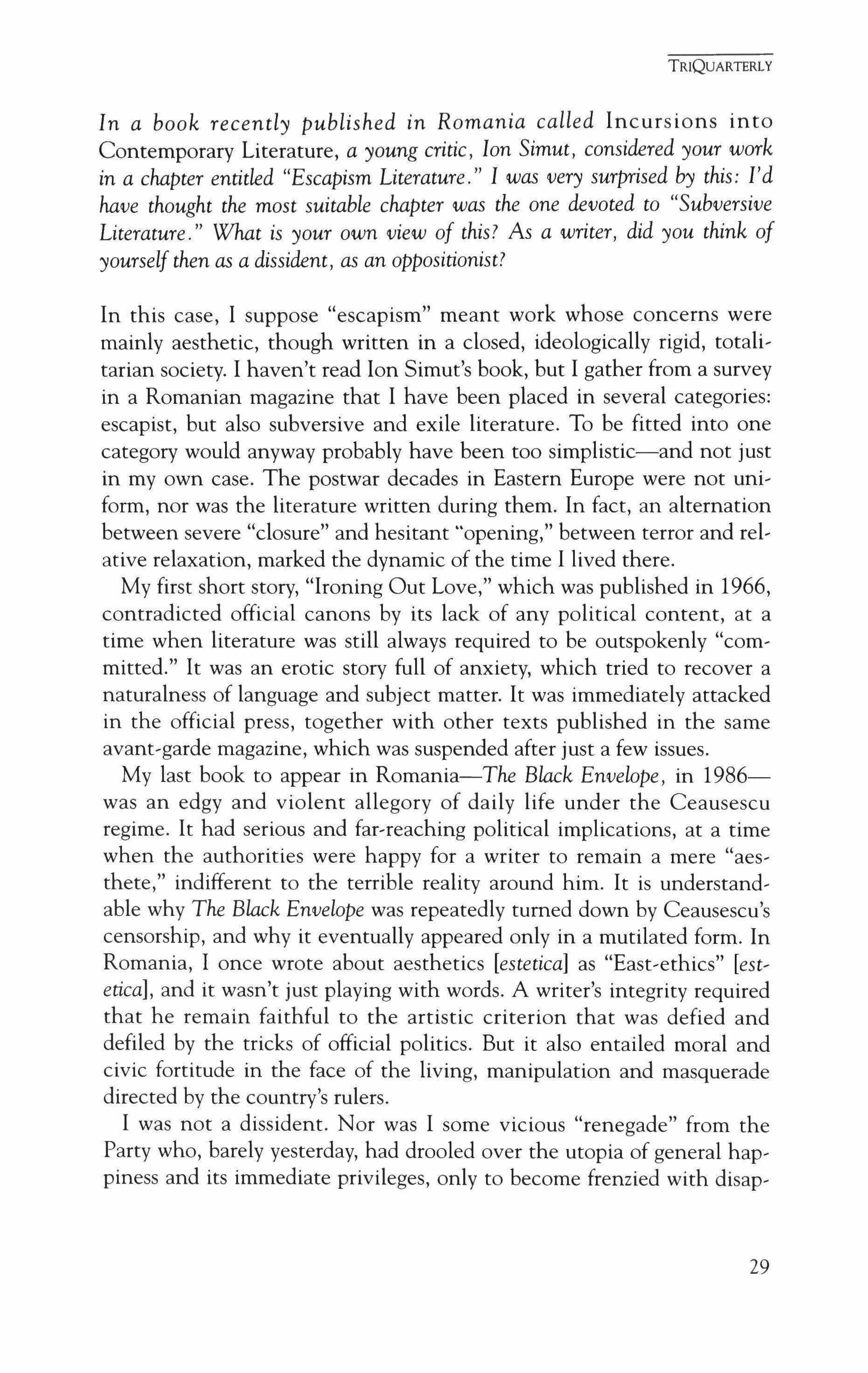
In a book recently published in Romania called Incursions into Contemporary Literature, a young critic, Ion Simut, considered your work in a chapter entitled "Escapism Literature." I was very surprised by this: 1'd have thought the most suitable chapter was the one devoted to "Subversive Literature." What is your own view of this? As a writer, did you think of yourself then as a dissident, as an oppositionist?
In this case, I suppose "escapism" meant work whose concerns were mainly aesthetic, though written in a closed, ideologically rigid, totalitarian society. I haven't read Ion Simut's book, but I gather from a survey in a Romanian magazine that I have been placed in several categories: escapist, but also subversive and exile literature. To be fitted into one category would anyway probably have been too simplistic-and not just in my own case. The postwar decades in Eastern Europe were not uniform, nor was the literature written during them. In fact, an alternation between severe "closure" and hesitant "opening," between terror and relative relaxation, marked the dynamic of the time I lived there.
My first short story, "Ironing Out Love," which was published in 1966, contradicted official canons by its lack of any political content, at a time when literature was still always required to be outspokenly "com' mitted." It was an erotic story full of anxiety, which tried to recover a naturalness of language and subject matter. It was immediately attacked in the official press, together with other texts published in the same avant-garde magazine, which was suspended after just a few issues.
My last book to appear in Romania-The Black Envelope, in 1986was an edgy and violent allegory of daily life under the Ceausescu regime. It had serious and far-reaching political implications, at a time when the authorities were happy for a writer to remain a mere "aesthete," indifferent to the terrible reality around him. It is understand, able why The Black Envelope was repeatedly turned down by Ceausescu's censorship, and why it eventually appeared only in a mutilated form. In Romania, I once wrote about aesthetics [estetica] as "East-ethics" [est, etica], and it wasn't just playing with words. A writer's integrity required that he remain faithful to the artistic criterion that was defied and defiled by the tricks of official politics. But it also entailed moral and civic fortitude in the face of the living, manipulation and masquerade directed by the country's rulers.
I was not a dissident. Nor was I some vicious "renegade" from the Party who, barely yesterday, had drooled over the utopia of general hap, piness and its immediate privileges, only to become frenzied with disap-
TRIQUARTERLY
29
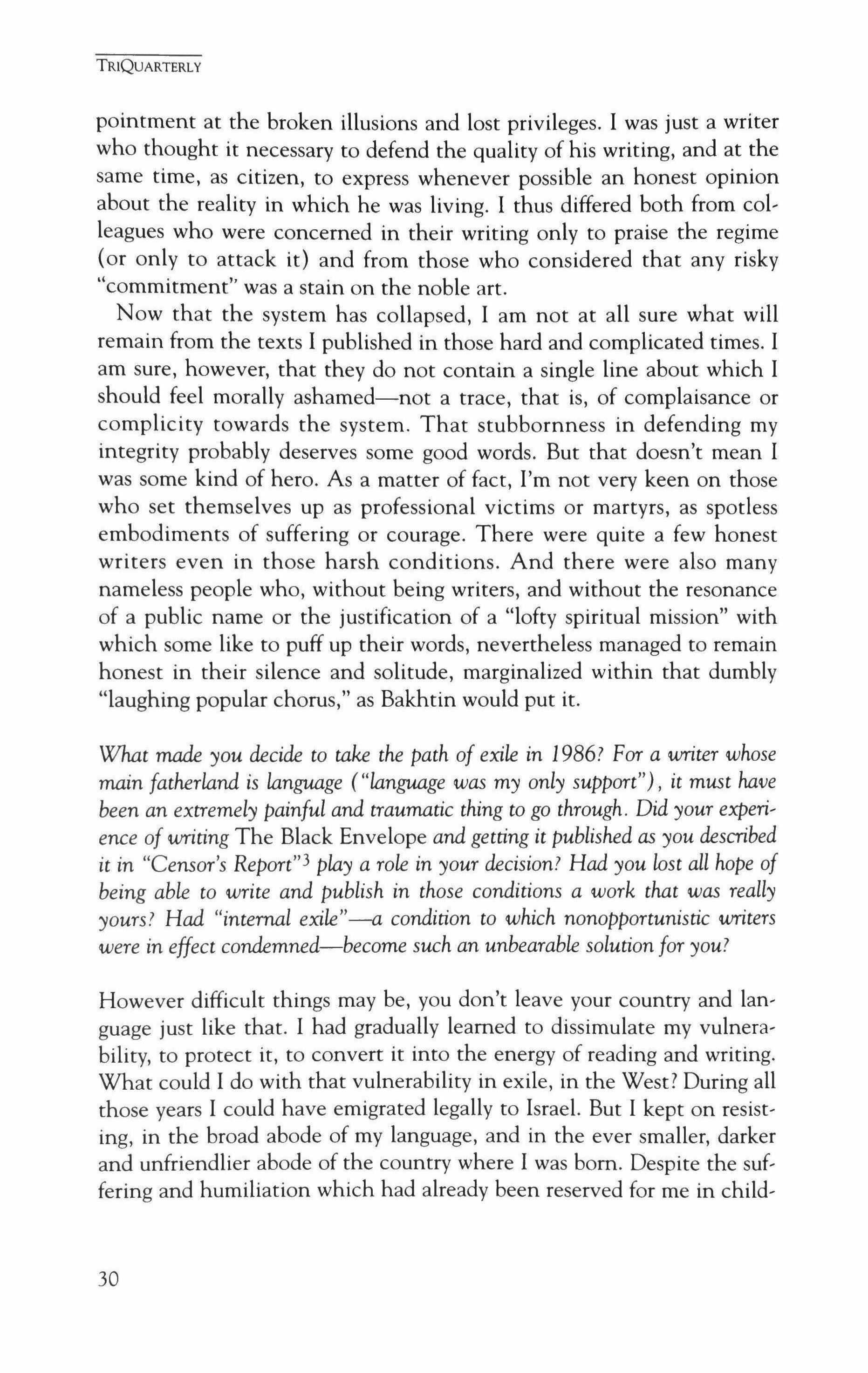
pointment at the broken illusions and lost privileges. 1 was just a writer who thought it necessary to defend the quality of his writing, and at the same time, as citizen, to express whenever possible an honest opinion about the reality in which he was living. 1 thus differed both from colleagues who were concerned in their writing only to praise the regime (or only to attack it) and from those who considered that any risky "commitment" was a stain on the noble art.
Now that the system has collapsed, 1 am not at all sure what will remain from the texts 1 published in those hard and complicated times. 1 am sure, however, that they do not contain a single line about which 1 should feel morally ashamed-not a trace, that is, of complaisance or complicity towards the system. That stubbornness in defending my integrity probably deserves some good words. But that doesn't mean 1 was some kind of hero. As a matter of fact, I'm not very keen on those who set themselves up as professional victims or martyrs, as spotless embodiments of suffering or courage. There were quite a few honest writers even in those harsh conditions. And there were also many nameless people who, without being writers, and without the resonance of a public name or the justification of a "lofty spiritual mission" with which some like to puff up their words, nevertheless managed to remain honest in their silence and solitude, marginalized within that dumbly "laughing popular chorus," as Bakhtin would put it.
What made you decide to take the path of exile in 1986? For a uniter whose main fatherland is language ("language was my only support"), it must have been an extremely painful and traumatic thing to go through. Did your expertence ofuniting The Black Envelope and getting it published as you described it in "Censor's Report"3 playa role in your decision? Had you lost all hope of being able to write and publish in those conditions a work that was really yours? Had "internal exile"-a condition to which nonopportunistic uniters were in effect condemned-become such an unbearable solution for you?
However difficult things may be, you don't leave your country and language just like that. 1 had gradually learned to dissimulate my vulnerability, to protect it, to convert it into the energy of reading and writing. What could 1 do with that vulnerability in exile, in the West? During all those years 1 could have emigrated legally to Israel. But I kept on resisting, in the broad abode of my language, and in the ever smaller, darker and unfriendlier abode of the country where I was born. Despite the suffering and humiliation which had already been reserved for me in child-
TRIQUARTERLY
30

hood, and which continued in different ways, I actually looked even with a certain condescension at those who were fleeing towards something better.
In the years I lived in so-called socialist, "multilaterally developed" Romania, it seemed to me that we had all become ")ews" to such an extent that it would have been indecent to complain of the extra burden placed on "nonnatives." Yet in 1981, when nationalism, chauvinism and anti-Semitism reached a nauseating level, I suddenly had the feeling that the nightmare of 1941�42 was returning. Then, in an interview with the magazine Familia, I was the first to protest against the famous nationalist and anti-Semitic manifesto "Ideals," which was published in the official weekly Saptamina, a kind of disguised cultural organ of the Securitate. The man responsible for the article was one of the Party's most irritating gutter-publicists, who is today prominently seated in Romania's new parliament. Anyway, after the interview I immediately became the object of violent attacks in the official press, which continued well into 1982. I was called "anti-Party," "cosmopolitan," "extra-territorial," and so on. The pressure kept growing around me-as I could feel whenever anything of mine was published. There was already a black aura around my name; I could easily detect it during "negotiations" with the censors about my volume of essays Contour, which was published in 1984. The Black Envelope adventure really was a nightmare. The hope without hopes that kept me tied to place and language was called literature. But the chimera kept growing weaker as it receded into the distance, tired, sullied, disjointed, diminished as I already was myself. Even in 1987, however, finding myself in Berlin, I did not accept the idea of a break when I learnt that Romania's grandiose Council for Socialist Culture and Education had revoked the literary prize just awarded to me by the Writers' Union. There was no precedent for such a measure in the forty years of "socialist culture" since the war. I answered the absurdity with an absurdity of my own: I protested to the president of the Union, in a letter that I knew would be intercepted by high "organs" of the state. Radio Free Europe explained the cancellation of the prize by the anti-Semitic attacks on the author that had been appearing for a long time in the official press, and concluded that "as far as the censorship of names is concerned, that of Norman Manea is one of the most undesirable." How unprepared I was to swap internal exile for exile properly so called, can be seen from the fact that once I arrived, without great enthusiasm, in America, I delayed for three years before resigning myself to the new situation.
TRIQUARTERLY
31

Would you explain more precisely how the censorship functioned after its offi� cial abolition by Ceausescu in 1977? In fact, there were different forms of censorship during those forty years ofdictatorship.
With the liberalization of the mid-sixties the censorship criteria became more ambiguous. This made it possible for major works of world literature, both classic and modem, to be published at a dizzying pace, as well as some valuable contemporary Romanian literature that could never have appeared in the Stalinist period. Very soon, the system rernernbered the danger that exists in words, in books. But the censors could no longer simply return to the militarv-tvpe regulations of the Stalinist period, even though they tried to stop the liberalization process through various tricks and delays. In the eighties Ceausescu had one of his "genius" brain waves: he would abolish censorship, in a move designed to confuse absolutely everybody! In reality, it was a "substitution" much as meat was substituted for by soya salami, wine by a kind of wood-juice, and television by two hours a day of songs in praise of the matchless Blabberer with whom providence had presented us. The dismantled censorship would be replaced with "self-responsibility." In other words, special committees of "working people" at newspapers, magazines and publishing houses, as well as at their printers and, even higher, at the ministry upon which everyone depended, would take the decisions and "assume responsibility" for what was published. Thus, instead of one central body with official authority, there appeared a series of successive "filters," so that not even a funeral announcement or an advertisement could be published without "the approval of the working people." Furthermore, the Council for Socialist Culture and Education gradually set up "reading committees" which, like the old censorship, "reviewed" what had already passed the exacting demands and the "responsibility" of the poor "working people."
I remember that in 1982 or 1983, at a literary colloquium in Belgrade, a Romanian publisher was asked if it was true that censorship no longer existed in his country. Yes, it's true, he proudly confirmed. So why do pornographic or anticommunist or religious books not appear in Romania? Not because we have censorship, but because we ourselves do not want such books-answered the director of one of the best foreignliterature publishing houses in socialist Romania. And he did not bat an eyelid.
And how did selfcensorship "function"?
TRIQUARTERLY
32

In the post-Stalinist decades, self-censorship also became more flexible, more complex, more treacherous-sometimes, of course, even paradoxical. I know from my own experience that in the eighties many of us were used to "overdoing it": that is, we would put into the manuscript submitted for publication a mass of irritating but superficial details about everyday reality which were not at all indispensable to the critical message we wanted to convey, so that in the likely "haggling" with the censor we could give some of them up while actually keeping the text as we wanted it to be. The strategy sometimes proved risky, especially in the final years when the administrative apparatus of a system macerating in its own morbid juices took on quite demented forms. The very word "chemist," for example, was suspect and hard to get printed, because it might allude to the country's number,one chemist, Elena Ceausescu, who had not finished primary school on time, yet was a member not just of the Romanian Academy but also of many prestigious foreign academies.
For all the censorship and selfcensorship, though, a number of more daring books and other texts continued to be published. Was there some kind of "complicity" on the part of the authorities? Did they consider some texts as necessary safety valves to be tolerated or even "provoked"?
There were some areas of complicity, of course. It has always been said in Romania that the law lasts for three days, that what really count are "connections." As for texts "given the go-ahead by the police," as we used to say, and launched with a label of great courage, they only increased the suspicion surrounding writers who were genuinely suspect, troublesome or subversive.
Most texts of that kind had a political theme, of course. Sometimes they focused on a Party activist, an ideological colonizer of the present, showing a conflict between the "good," progressive communist in step with the times, and the "bad" communist who had been left behind. Usually, such "courageous" works appeared after some tactical shift by the Central Committee, when it was admitted that "mistakes and even serious breaches have been committed" but that the very fact of selfcriticism demonstrated "the Party's strength and the correctness of its basic principles." The authors in question were really like activists with vague literary pretensions: they used a simplistic narrative structure, and a solemn tone, as at a Party meeting. "Combative" and easy to read,
TRIQUARTERLY
33
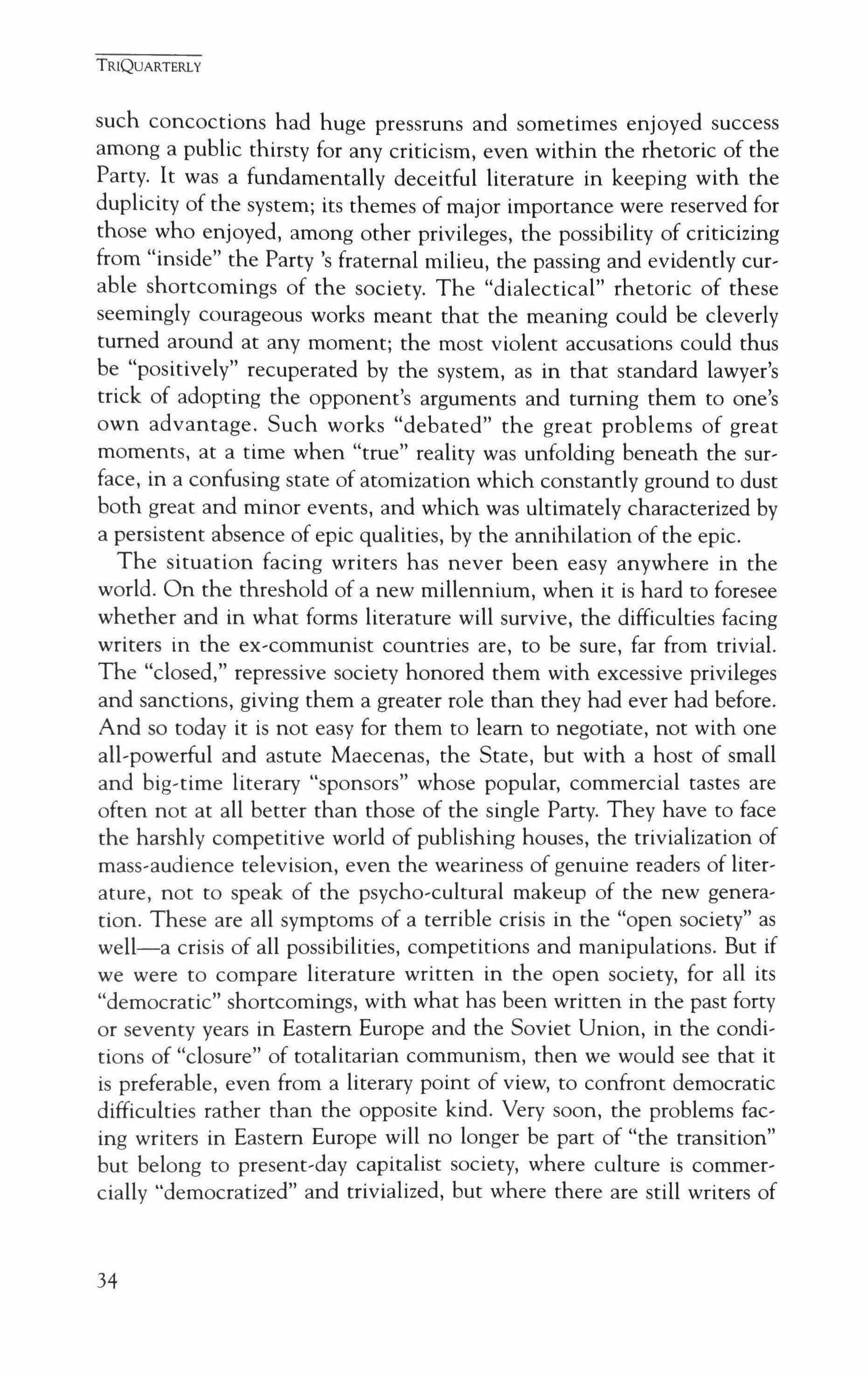
such concoctions had huge pressruns and sometimes enjoyed success among a public thirsty for any criticism, even within the rhetoric of the Party. It was a fundamentally deceitful literature in keeping with the duplicity of the system; its themes of major importance were reserved for those who enjoyed, among other privileges, the possibility of criticizing from "inside" the Party's fraternal milieu, the passing and evidently cur, able shortcomings of the society. The "dialectical" rhetoric of these seemingly courageous works meant that the meaning could be cleverly turned around at any moment; the most violent accusations could thus be "positively" recuperated by the system, as in that standard lawyer's trick of adopting the opponent's arguments and turning them to one's own advantage. Such works "debated" the great problems of great moments, at a time when "true" reality was unfolding beneath the sur, face, in a confusing state of atomization which constantly ground to dust both great and minor events, and which was ultimately characterized by a persistent absence of epic qualities, by the annihilation of the epic. The situation facing writers has never been easy anywhere in the world. On the threshold of a new millennium, when it is hard to foresee whether and in what forms literature will survive, the difficulties facing writers in the ex-communist countries are, to be sure, far from trivial. The "closed," repressive society honored them with excessive privileges and sanctions, giving them a greater role than they had ever had before. And so today it is not easy for them to learn to negotiate, not with one all-powerful and astute Maecenas, the State, but with a host of small and big,time literary "sponsors" whose popular, commercial tastes are often not at all better than those of the single Party. They have to face the harshly competitive world of publishing houses, the trivialization of mass,audience television, even the weariness of genuine readers of liter, ature, not to speak of the psycho-cultural makeup of the new genera, tion. These are all symptoms of a terrible crisis in the "open society" as well-a crisis of all possibilities, competitions and manipulations. But if we were to compare literature written in the open society, for all its "democratic" shortcomings, with what has been written in the past forty or seventy years in Eastern Europe and the Soviet Union, in the conditions of "closure" of totalitarian communism, then we would see that it is preferable, even from a literary point of view, to confront democratic difficulties rather than the opposite kind. Very soon, the problems facing writers in Eastern Europe will no longer be part of "the transition" but belong to present-day capitalist society, where culture is commercially "democratized" and trivialized, but where there are still writers of
TRIQUARTERLY
34
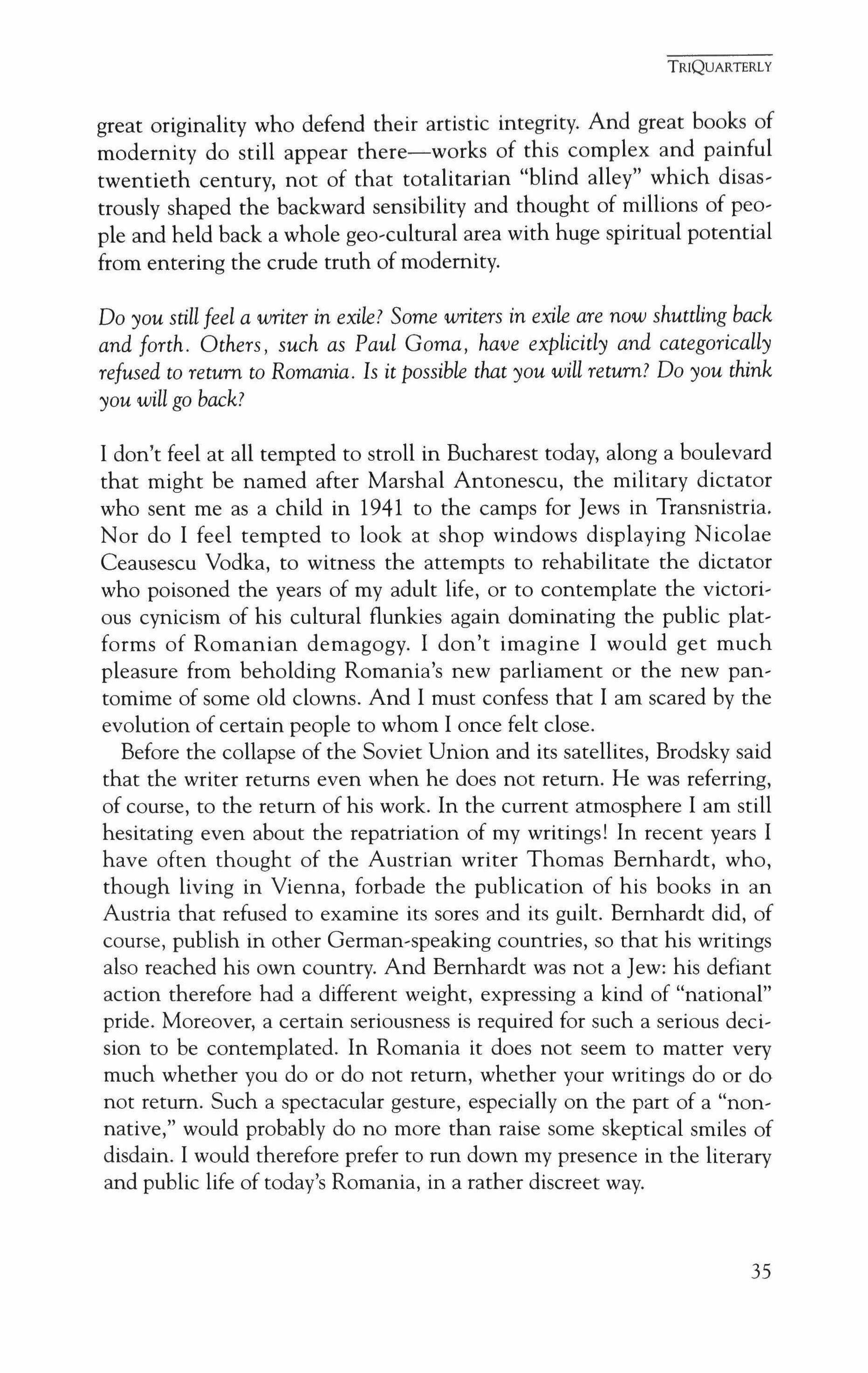
great originality who defend their artistic integrity. And great books of modernity do still appear there-works of this complex and painful twentieth century, not of that totalitarian "blind alley" which disastrously shaped the backward sensibility and thought of millions of people and held back a whole geo,cultural area with huge spiritual potential from entering the crude truth of modernity.
Do you still feel a writer in exile? Some writers in exile are now shuttling back and forth. Others, such as Paul Goma, have explicitly and categorically refused to return to Romania. Is it possible that you will return? Do you think you will go back?
I don't feel at all tempted to stroll in Bucharest today, along a boulevard that might be named after Marshal Antonescu, the military dictator who sent me as a child in 1941 to the camps for Jews in Transnistria. Nor do I feel tempted to look at shop windows displaying Nicolae Ceausescu Vodka, to witness the attempts to rehabilitate the dictator who poisoned the years of my adult life, or to contemplate the victorious cynicism of his cultural flunkies again dominating the public plat' forms of Romanian demagogy. I don't imagine I would get much pleasure from beholding Romania's new parliament or the new pan' tomime of some old clowns. And I must confess that I am scared by the evolution of certain people to whom I once felt close.
Before the collapse of the Soviet Union and its satellites, Brodsky said that the writer returns even when he does not return. He was referring, of course, to the return of his work. In the current atmosphere I am still hesitating even about the repatriation of my writings! In recent years I have often thought of the Austrian writer Thomas Bernhardt, who, though living in Vienna, forbade the publication of his books in an Austria that refused to examine its sores and its guilt. Bernhardt did, of course, publish in other German-speaking countries, so that his writings also reached his own country. And Bernhardt was not a Jew: his defiant action therefore had a different weight, expressing a kind of "national" pride. Moreover, a certain seriousness is required for such a serious decision to be contemplated. In Romania it does not seem to matter very much whether you do or do not return, whether your writings do or do not return. Such a spectacular gesture, especially on the part of a "non, native," would probably do no more than raise some skeptical smiles of disdain. I would therefore prefer to run down my presence in the literary and public life of today's Romania, in a rather discreet way.
TRIQUARTERLY
35

You wrote a much-discussed essay on Mircea Eliade, also published in Italy, which was really about the "responsibility" of intellectuals. What was the responsibility of intellectuals during the period of communist dictatorship? Can one speak of a "trahison des clercs," to use Benda's expression?
I would like to dwell for a moment on the Eliade essay, because it has some connection with your previous question. It was first published in 1991 in the American journal The New Republic, and reprinted the next year in my own Clowns collection.
I wrote and published this essay after the collapse of East European communism, when it had become clear that an important weapon, if not the principal one, used by nationalism to win over the electorate was the claim to find legitimacy in the writings of certain illustrious predecessors and to turn them into cult icons of its propaganda. It is probably no accident that a Party like the "Movement for Romania"-which proclaims its continuity with the Iron Guard, a Legionary group allied to Hitler and Mussolini-requires prospective members to pass an exam in the works of Eliade. I thought it necessary to remind those who did not know about, or who wanted to forget, the tragedy to which the nationalist option once led. The differences, as well as the similarities, needed to be brought out with the more recent communist catastrophe, which quite rightly was the one on everybody's mind.
The essay, which I called "Felix Culpa," discussed the far-right political option which such brilliant Romanian intellectuals as Eliade, Cioran and Noica made in the 1930s. It also signaled Eliade's persistent "amnesia" about this episode in his numerous volumes of autobiography and memoirs-indeed, his strange nostalgia for, and even identification with, the "happy guilt" of his youth that he showed in the last writings before his death.
In this essay I did not try to relate Eliade's political-ideological choices to his literary and scientific work. Memories of my own existence in a system that "politicized" everything did, of course, partly lie behind what may have been too drastic a separation between biography and oeuvre. (A number of American readers have, in fact, reproached me for precisely this.) The relationship between these two sides of Eliade's career has, in any case, been the object of some interesting studies, both old and new, in America and Europe. My own text, then, dealt only with the autobiographical writings. But these are far from insignificant, given that Eliade himself considered not only his work but also his life to be important, devoting to it successive volumes of memoirs or diary.
TRIQUARTERLY
36
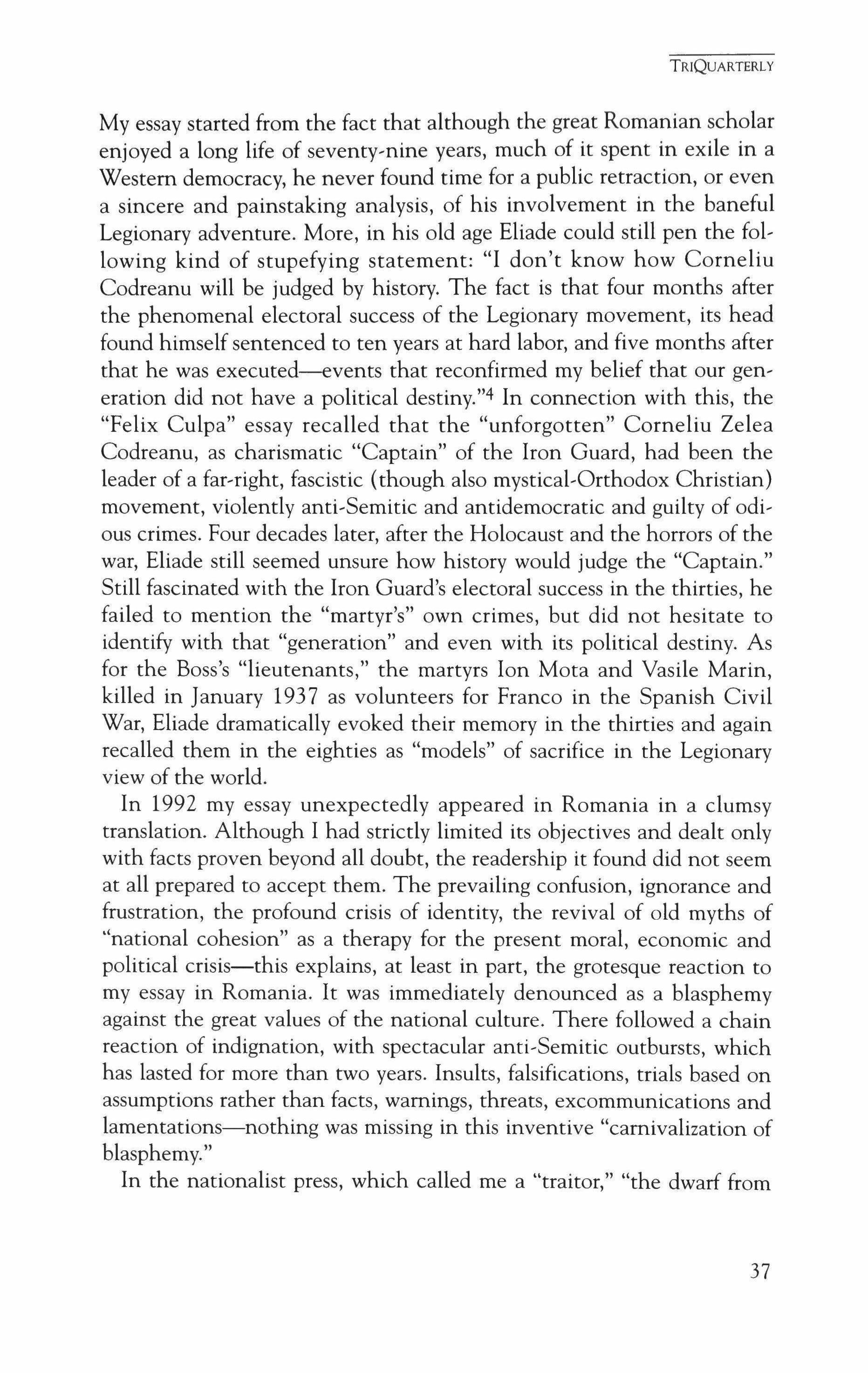
My essay started from the fact that although the great Romanian scholar enjoyed a long life of seventy-nine years, much of it spent in exile in a Western democracy, he never found time for a public retraction, or even a sincere and painstaking analysis, of his involvement in the baneful Legionary adventure. More, in his old age Eliade could still pen the following kind of stupefying statement: "I don't know how Corneliu Codreanu will be judged by history. The fact is that four months after the phenomenal electoral success of the Legionary movement, its head found himself sentenced to ten years at hard labor, and five months after that he was executed-events that reconfirmed my belief that our generation did not have a political destiny."4 In connection with this, the "Felix Culpa" essay recalled that the "unforgotten" Corneliu Zelea Codreanu, as charismatic "Captain" of the Iron Guard, had been the leader of a far-right, fascistic (though also mystical-Orthodox Christian) movement, violently anti-Semitic and antidemocratic and guilty of odious crimes. Four decades later, after the Holocaust and the horrors of the war, Eliade still seemed unsure how history would judge the "Captain." Still fascinated with the Iron Guard's electoral success in the thirties, he failed to mention the "martyr's" own crimes, but did not hesitate to identify with that "generation" and even with its political destiny. As for the Boss's "lieutenants," the martyrs Ion Mota and Vasile Marin, killed in January 1937 as volunteers for Franco in the Spanish Civil War, Eliade dramatically evoked their memory in the thirties and again recalled them in the eighties as "models" of sacrifice in the Legionary view of the world.
In 1992 my essay unexpectedly appeared in Romania in a clumsy translation. Although I had strictly limited its objectives and dealt only with facts proven beyond all doubt, the readership it found did not seem at all prepared to accept them. The prevailing confusion, ignorance and frustration, the profound crisis of identity, the revival of old myths of "national cohesion" as a therapy for the present moral, economic and political crisis-this explains, at least in part, the grotesque reaction to my essay in Romania. It was immediately denounced as a blasphemy against the great values of the national culture. There followed a chain reaction of indignation, with spectacular anti-Semitic outbursts, which has lasted for more than two years. Insults, falsifications, trials based on assumptions rather than facts, warnings, threats, excommunications and lamentations-nothing was missing in this inventive "carnivalization of blasphemy."
In the nationalist press, which called me a "traitor," "the dwarf from 37
TRIQUARTERLY

Jerusalem" or "common trash," you could find professions of faith of the kind published in Romdnia Mare, the paper of the leading member of parliament, C. V. Tudor: "Yes, indeed, we are fighting to make Mircea Eliade sacred we are fighting to rehabilitate Marshal Antonescu, President Ceausescu." Nor was there a lack of picturesque speech in self, styled democratic sections of the press, where I was more carefully described as a "detractor," "a disciple of Ceausescu," an "American prop' ping himself up against the White House," or a "policeman of the mind." The Manea Scandal of 1992 bears all too unhappy a resemblance to the one of 1982, only this time it was no longer stage,managed by the authorities: it was free and spontaneous, under conditions of democracy, so that the invective was more varied, the press campaign more extensive and more colorful.
If we are talking of the "responsibility of intellectuals," we have an example at hand in immediate reality which only confirms the sad experiences of the past. The attitude of some Romanian intellectuals in today's Eliade debate-if it can be called a debate-displays the same evasion of uncomfortable truths as in yesterday's situations of socialist captivity, which were incomparably more difficult and therefore, per' haps, more excusable.
Now what of the comparison you have implicitly been urging on me-the one between the "betrayal by intellectuals" under communism and the betrayal by Eliade's generation in the thirties, with its aggravating lack of any serious self-criticism or any honest assumption or lucid analysis of the "happy guilt"? I would say that under the communist die, tatorship, intellectuals who betrayed their honor and independence mostly did so not out of conviction (like their pro,fascist predecessors) but out of opportunism, weakness, fear and self-interest. That is no excuse, of course. It is quite disgusting, I have to say, how many important writers simply made a mockery of themselves, carrying out all the compromises and benefiting from all the privileges.
Fortunately, however, both in the fascist years and in the communist years, there were not a few artists who did not let themselves be seduced, intimidated and bought, and who thus showed that it was possible to resist! There was the example of our great Eugene lonesco, who, in the hysterical years of fascism in Romania, distanced himself in dis, gust from the cheerful and culpable "rhinocerization" of his illustrious colleagues, and later, in Paris, did not hesitate to confront the reality of the Gulag at a time when a frivolous and noisy Left was giving itself over to all manner of pro-Soviet manipulations. Ionesco's example, we
TRIQUARTERLY
38
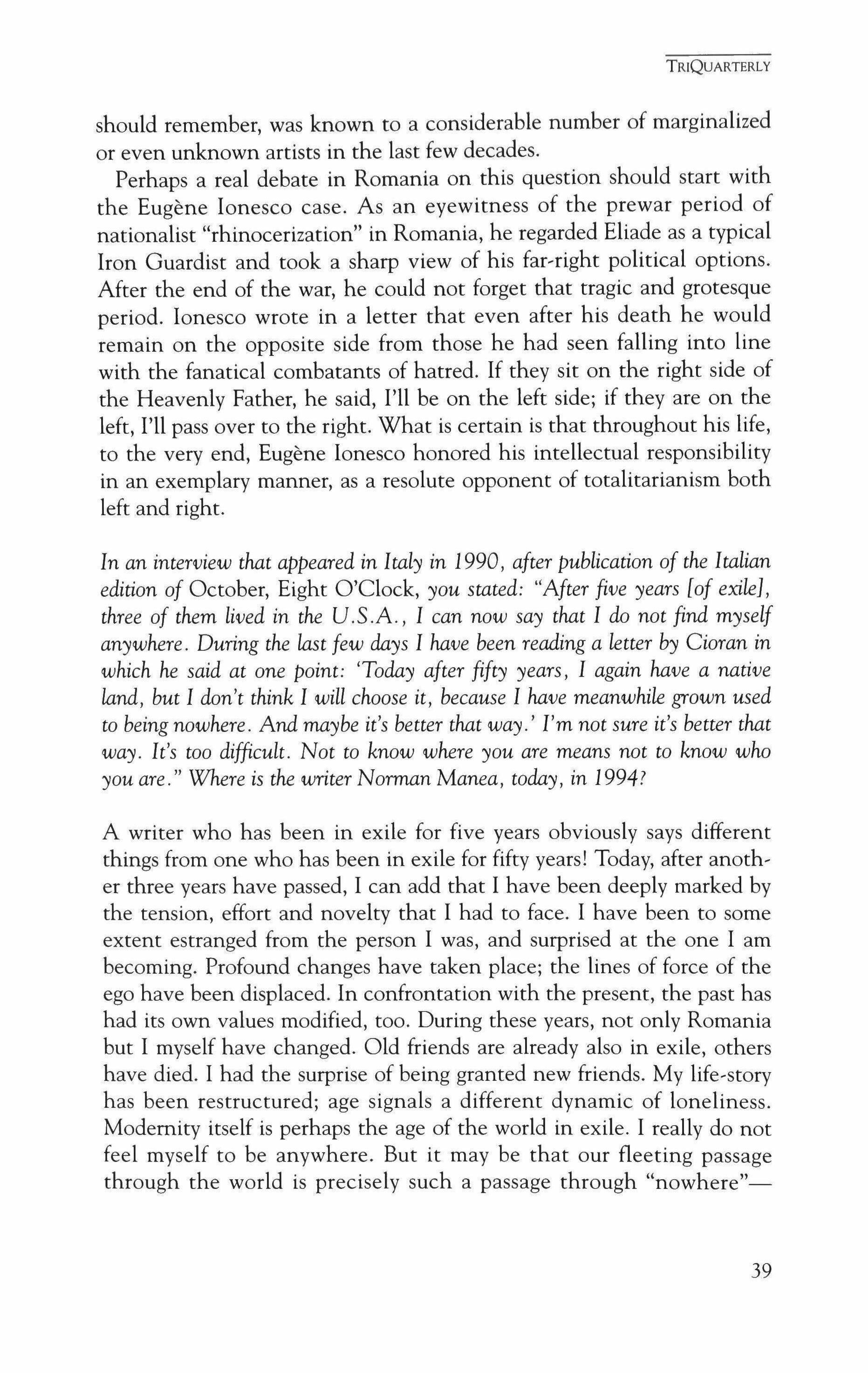
should remember, was known to a considerable number of marginalized or even unknown artists in the last few decades.
Perhaps a real debate in Romania on this question should start with the Eugene lonesco case. As an eyewitness of the prewar period of nationalist "rhinocerization" in Romania, he regarded Eliade as a typical Iron Guardist and took a sharp view of his far-right political options. After the end of the war, he could not forget that tragic and grotesque period. lonesco wrote in a letter that even after his death he would remain on the opposite side from those he had seen falling into line with the fanatical combatants of hatred. If they sit on the right side of the Heavenly Father, he said, I'll be on the left side; if they are on the left, I'll pass over to the right. What is certain is that throughout his life, to the very end, Eugene lonesco honored his intellectual responsibility in an exemplary manner, as a resolute opponent of totalitarianism both left and right.
In an interview that appeared in Italy in 1990, after publication of the Italian edition of October, Eight O'Clock, you stated: "After five years [of exile], three of them lived in the U.S.A, I can now say that I do not find myself anywhere. During the last few days I have been reading a letter by Cioran in which he said at one point: 'Today after fifty years, I again have a native land, but I don't think I will choose it, because I have meanwhile grown used to being nowhere. And maybe it's better that way.' I'm not sure it's better that way. It's too difficult. Not to know where you are means not to know who you are." Where is the writer Norman Manea, today, in 1994?
A writer who has been in exile for five years obviously says different things from one who has been in exile for fifty years! Today, after another three years have passed, I can add that I have been deeply marked by the tension, effort and novelty that I had to face. I have been to some extent estranged from the person I was, and surprised at the one I am becoming. Profound changes have taken place; the lines of force of the ego have been displaced. In confrontation with the present, the past has had its own values modified, too. During these years, not only Romania but I myself have changed. Old friends are already also in exile, others have died. I had the surprise of being granted new friends. My life-story has been restructured; age signals a different dynamic of loneliness. Modernity itself is perhaps the age of the world in exile. I really do not feel myself to be anywhere. But it may be that our fleeting passage through the world is precisely such a passage through "nowhere"-
TRIQUARTERLY
39

through the temporary abode of our futility.
As you can see, I have eventually accepted exile. I am trying to discover in this situation not just suffering, alienation and burdens, but also the advantages. For example, I feel released from the political, administrative and even literary authorities of the country where I lived the greater part of my life. In exile, relations with such authorities are far from insignificant, but they are more detached: they do not have such profound implications. Today I feel not only the bitterness but also the privilege of exile. I have finally accepted the honor of being an exile, with a regenerated (though moderate) curiosity about the sarcasm with which hope continues its stage-managing. A disappointed lover? A knight of hope? The exile embodies one of the dramatic contradictions of our times: between cosmopolitan, centrifugal modernity, and the centripetal need (or at least nostalgia) for belonging.
What lies ahead for the writer Nonnan Manea? Do you hold by what you said in 1990: "For me, to write means to write in Romanian. It is therefore not possible to free myselffrom my past, from my country, from what I consider a 'spiritual geography. Or has your experience of the last few years in the U.S. altered your perspective?
Romania was the formative landscape of my existence. It was there that I came to love books, there that I met the friends of my youth and my mature years, there that I saw the sea for the first time. The girl who enchanted and tormented my youth appeared to me there; mature love became marriage there; my mother's grave lies there.
For me Romania is not only Antonescu or Ceausescu or the Securitate or those who, almost yesterday, called me "alien," "elitist" or "anti-Party" in Ceausescu's Press and who today, in the free press, call me "traitor," "detractor," "the new American," and so on. For me, Romania is also the beautiful young peasant girl who crossed hundreds of kilometers in wartime, braving great dangers from Marshal Antonescu's men, to reach the Ukrainian steppes with the food and clothing she had brought for us in the camp to which we had been deported by the Romanian authorities. And having done this out of love for my parents and myself, she wept and begged to remain in the camp there with us.
Romania is unforgettable suffering, but also as much happiness as it was possible for there to be. For me today, however, Romania is above all the Romanian language.
It is not easy to live in Romanian in New York-that is, to continue
TRIQUARTERLY
40
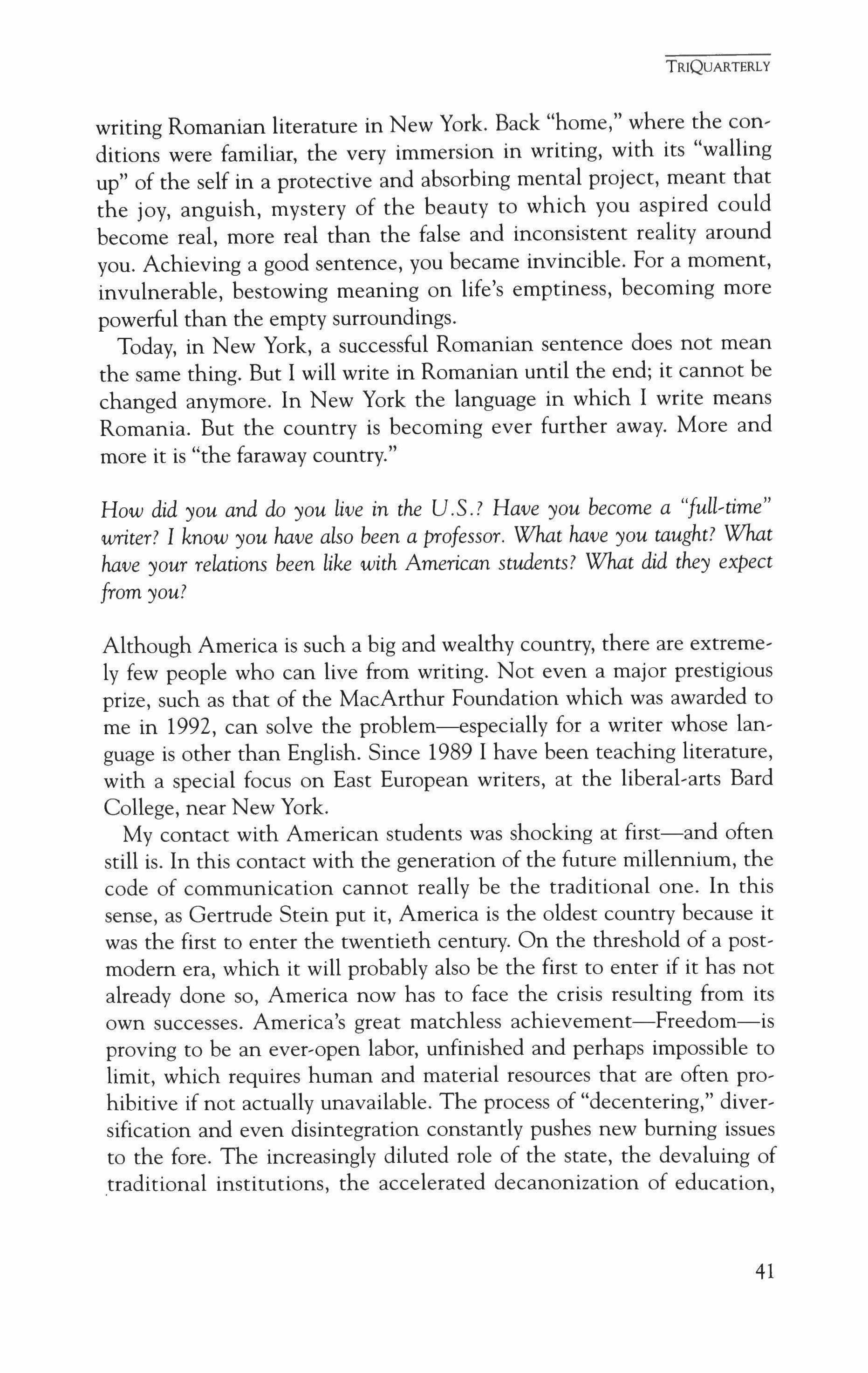
writing Romanian literature in New York. Back "home," where the conditions were familiar, the very immersion in writing, with its "walling up" of the self in a protective and absorbing mental project, meant that the joy, anguish, mystery of the beauty to which you aspired could become real, more real than the false and inconsistent reality around you. Achieving a good sentence, you became invincible. For a moment, invulnerable, bestowing meaning on life's emptiness, becoming more powerful than the empty surroundings.
Today, in New York, a successful Romanian sentence does not mean the same thing. But I will write in Romanian until the end; it cannot be changed anymore. In New York the language in which I write means Romania. But the country is becoming ever further away. More and more it is "the faraway country."
How did you and do you live in the U.S.? Have you become a "full-time" wtuet! I know you have also been a professor. What have you taught? What have your relations been like with American students? What did they expect from you?
Although America is such a big and wealthy country, there are extremely few people who can live from writing. Not even a major prestigious prize, such as that of the MacArthur Foundation which was awarded to me in 1992, can solve the problem-especially for a writer whose language is other than English. Since 1989 I have been teaching literature, with a special focus on East European writers, at the liberal-arts Bard College, near New York.
My contact with American students was shocking at first-and often still is. In this contact with the generation of the future millennium, the code of communication cannot really be the traditional one. In this sense, as Gertrude Stein put it, America is the oldest country because it was the first to enter the twentieth century. On the threshold of a postmodem era, which it will probably also be the first to enter if it has not already done so, America now has to face the crisis resulting from its own successes. America's great matchless achievement-Freedom-is proving to be an ever-open labor, unfinished and perhaps impossible to limit, which requires human and material resources that are often prohibitive if not actually unavailable. The process of "decentering," diversification and even disintegration constantly pushes new burning issues to the fore. The increasingly diluted role of the state, the devaluing of traditional institutions, the accelerated decanonization of education, 41
TRIQUARTERLY
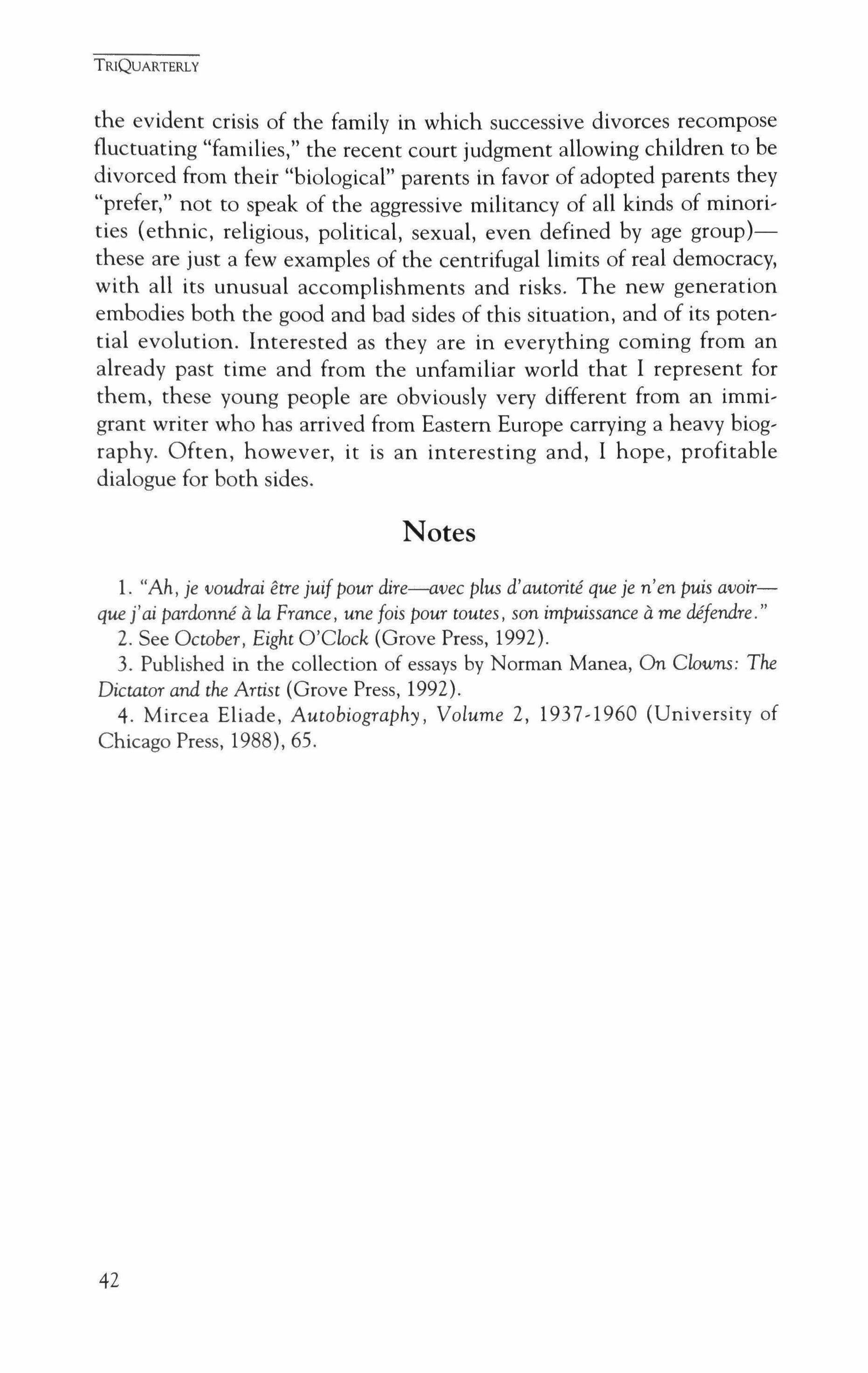
the evident crisis of the family in which successive divorces recompose fluctuating "families," the recent court judgment allowing children to be divorced from their "biological" parents in favor of adopted parents they "prefer," not to speak of the aggressive militancy of all kinds of minorities (ethnic, religious, political, sexual, even defined by age group)these are just a few examples of the centrifugal limits of real democracy, with all its unusual accomplishments and risks. The new generation embodies both the good and bad sides of this situation, and of its potential evolution. Interested as they are in everything coming from an already past time and from the unfamiliar world that I represent for them, these young people are obviously very different from an immigrant writer who has arrived from Eastern Europe carrying a heavy biography. Often, however, it is an interesting and, I hope, profitable dialogue for both sides.
Notes
1. "Ah, je voudrai etre juifpour dire-avec plus d'auioiiu: que je n'en puis avoirque j'ai pardonne a la France, une fois pour toutes, son impuissance a me defendre.
2. See October, Eight O'Clock (Grove Press, 1992).
3. Published in the collection of essays by Norman Manea, On Clowns: The Dictator and the Artist (Grove Press, 1992).
4. Mircea Eliade, Autobiography, Volume 2, 1937-1960 (University of Chicago Press, 1988),65.
TRIQUARTERLY
42
Courting the Approval of the Dead
Tracy Kidder
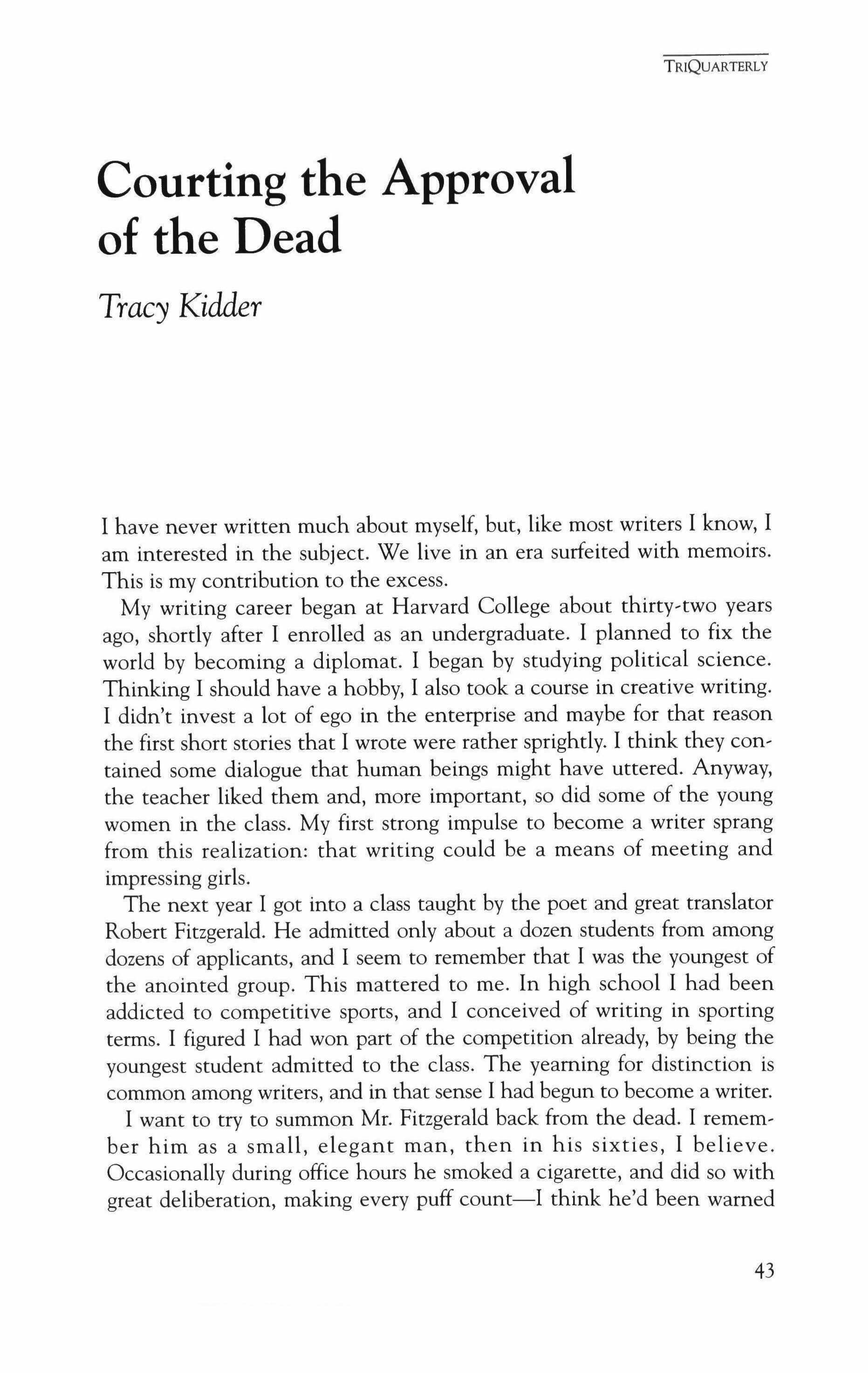
I have never written much about myself, but, like most writers I know, I am interested in the subject. We live in an era surfeited with memoirs. This is my contribution to the excess.
My writing career began at Harvard College about thirty-two years ago, shortly after I enrolled as an undergraduate. I planned to fix the world by becoming a diplomat. I began by studying political science.
Thinking I should have a hobby, I also took a course in creative writing. I didn't invest a lot of ego in the enterprise and maybe for that reason the first short stories that I wrote were rather sprightly. I think they contained some dialogue that human beings might have uttered. Anyway, the teacher liked them and, more important, so did some of the young women in the class. My first strong impulse to become a writer sprang from this realization: that writing could be a means of meeting and impressing girls.
The next year I got into a class taught by the poet and great translator Robert Fitzgerald. He admitted only about a dozen students from among dozens of applicants, and I seem to remember that I was the youngest of the anointed group. This mattered to me. In high school I had been addicted to competitive sports, and I conceived of writing in sporting terms. I figured I had won part of the competition already, by being the youngest student admitted to the class. The yearning for distinction is common among writers, and in that sense I had begun to become a writer.
I want to try to summon Mr. Fitzgerald back from the dead. I remember him as a small, elegant man, then in his sixties, I believe. Occasionally during office hours he smoked a cigarette, and did so with great deliberation, making every puff count-l think he'd been warned
TRIQUARTERLY
43
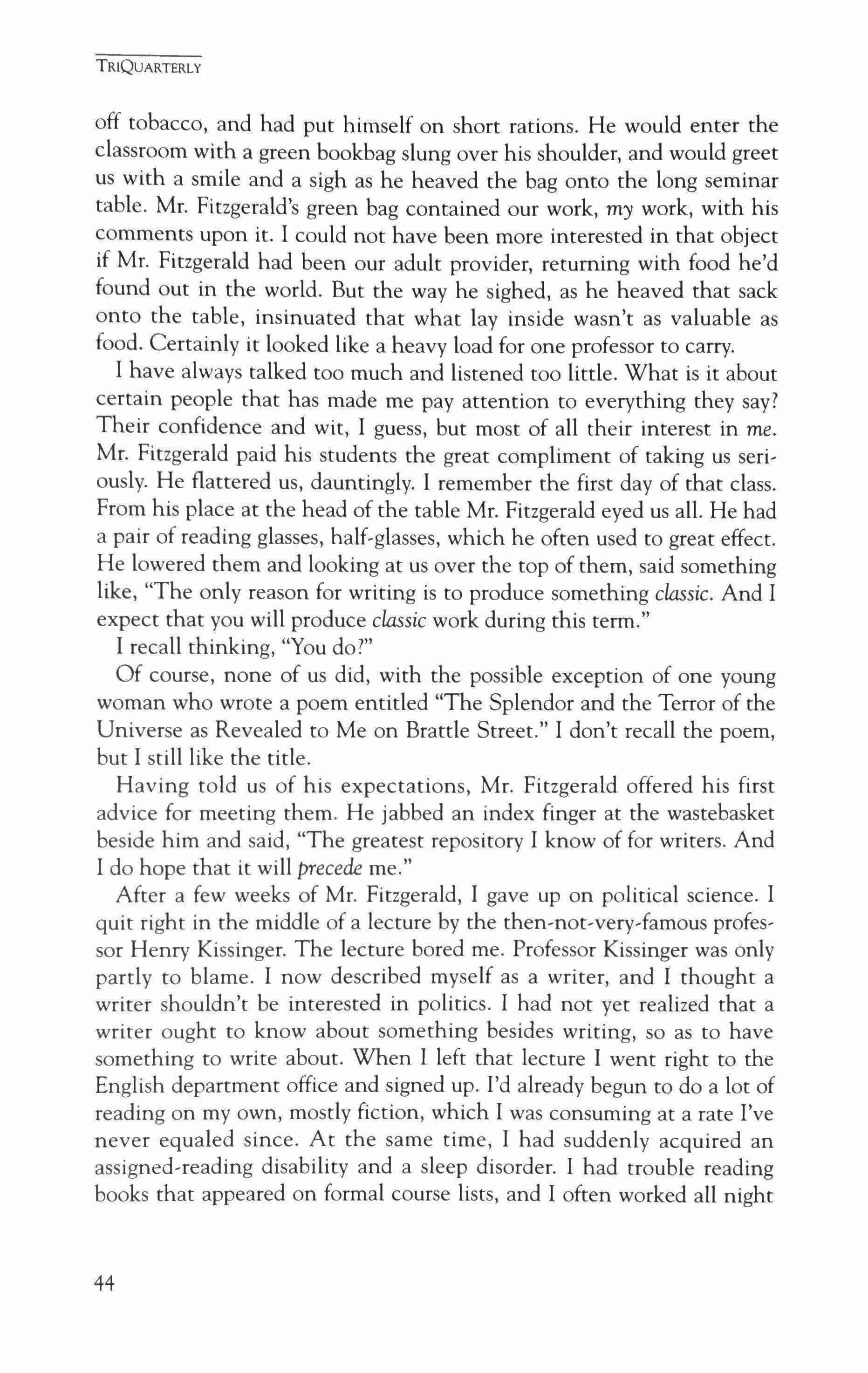
off tobacco, and had put himself on short rations. He would enter the classroom with a green bookbag slung over his shoulder, and would greet us with a smile and a sigh as he heaved the bag onto the long seminar table. Mr. Fitzgerald's green bag contained our work, my work, with his comments upon it. I could not have been more interested in that object if Mr. Fitzgerald had been our adult provider, returning with food he'd found out in the world. But the way he sighed, as he heaved that sack onto the table, insinuated that what lay inside wasn't as valuable as food. Certainly it looked like a heavy load for one professor to carry.
I have always talked too much and listened too little. What is it about certain people that has made me pay attention to everything they say? Their confidence and wit, I guess, but most of all their interest in me. Mr. Fitzgerald paid his students the great compliment of taking us seriously. He flattered us, dauntingly. I remember the first day of that class. From his place at the head of the table Mr. Fitzgerald eyed us all. He had a pair of reading glasses, half-glasses, which he often used to great effect. He lowered them and looking at us over the top of them, said something like, "The only reason for writing is to produce something classic. And I expect that you will produce classic work during this term."
I recall thinking, "You do?"
Of course, none of us did, with the possible exception of one young woman who wrote a poem entitled "The Splendor and the Terror of the Universe as Revealed to Me on Brattle Street." I don't recall the poem, but I still like the title.
Having told us of his expectations, Mr. Fitzgerald offered his first advice for meeting them. He jabbed an index finger at the wastebasket beside him and said, "The greatest repository I know of for writers. And I do hope that it will precede me."
After a few weeks of Mr. Fitzgerald, I gave up on political science. I quit right in the middle of a lecture by the then-not-very-famous professor Henry Kissinger. The lecture bored me. Professor Kissinger was only partly to blame. I now described myself as a writer, and I thought a writer shouldn't be interested in politics. I had not yet realized that a writer ought to know about something besides writing, so as to have something to write about. When I left that lecture I went right to the English department office and signed up. I'd already begun to do a lot of reading on my own, mostly fiction, which I was consuming at a rate I've never equaled since. At the same time, I had suddenly acquired an assigned-reading disability and a sleep disorder. I had trouble reading books that appeared on formal course lists, and I often worked all night
TRIQUARTERLY
44
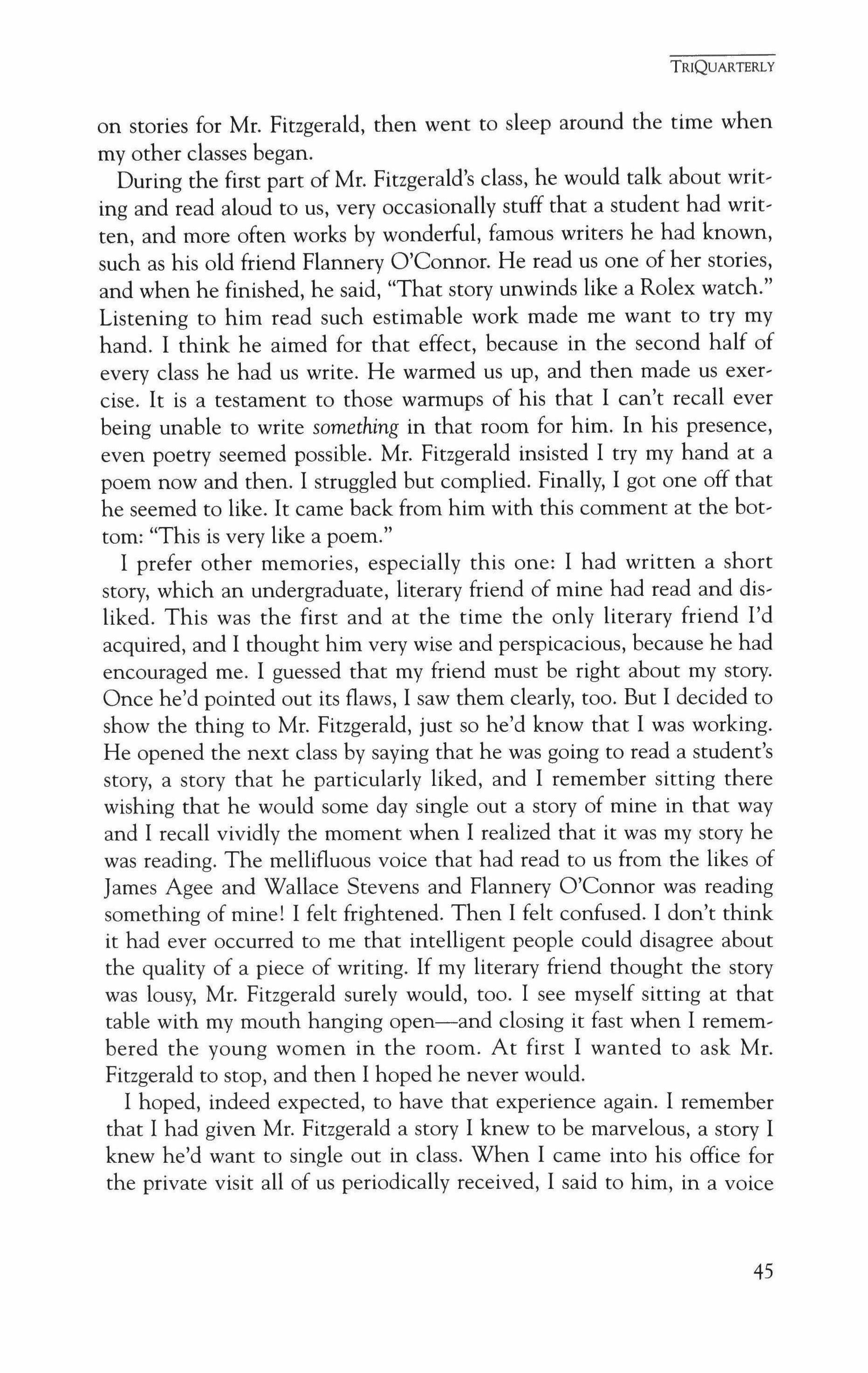
on stories for Mr. Fitzgerald, then went to sleep around the time when my other classes began.
During the first part of Mr. Fitzgerald's class, he would talk about writing and read aloud to us, very occasionally stuff that a student had written, and more often works by wonderful, famous writers he had known, such as his old friend Flannery O'Connor. He read us one of her stories, and when he finished, he said, "That story unwinds like a Rolex watch." Listening to him read such estimable work made me want to try my hand. I think he aimed for that effect, because in the second half of every class he had us write. He warmed us up, and then made us exercise. It is a testament to those warmups of his that I can't recall ever being unable to write something in that room for him. In his presence, even poetry seemed possible. Mr. Fitzgerald insisted I try my hand at a poem now and then. I struggled but complied. Finally, I got one off that he seemed to like. It came back from him with this comment at the bottom: "This is very like a poem."
I prefer other memories, especially this one: I had written a short story, which an undergraduate, literary friend of mine had read and disliked. This was the first and at the time the only literary friend I'd acquired, and I thought him very wise and perspicacious, because he had encouraged me. I guessed that my friend must be right about my story. Once he'd pointed out its flaws, I saw them clearly, too. But I decided to show the thing to Mr. Fitzgerald, just so he'd know that I was working. He opened the next class by saying that he was going to read a student's story, a story that he particularly liked, and I remember sitting there wishing that he would some day single out a story of mine in that way and I recall vividly the moment when I realized that it was my story he was reading. The mellifluous voice that had read to us from the likes of James Agee and Wallace Stevens and Flannery O'Connor was reading something of mine! I felt frightened. Then I felt confused. I don't think it had ever occurred to me that intelligent people could disagree about the quality of a piece of writing. If my literary friend thought the story was lousy, Mr. Fitzgerald surely would, too. I see myself sitting at that table with my mouth hanging open-and closing it fast when I rernembered the young women in the room. At first I wanted to ask Mr. Fitzgerald to stop, and then I hoped he never would.
I hoped, indeed expected, to have that experience again. I remember that I had given Mr. Fitzgerald a story I knew to be marvelous, a story I knew he'd want to single out in class. When I came into his office for the private visit all of us periodically received, I said to him, in a voice
TRIQUARTERLY
45
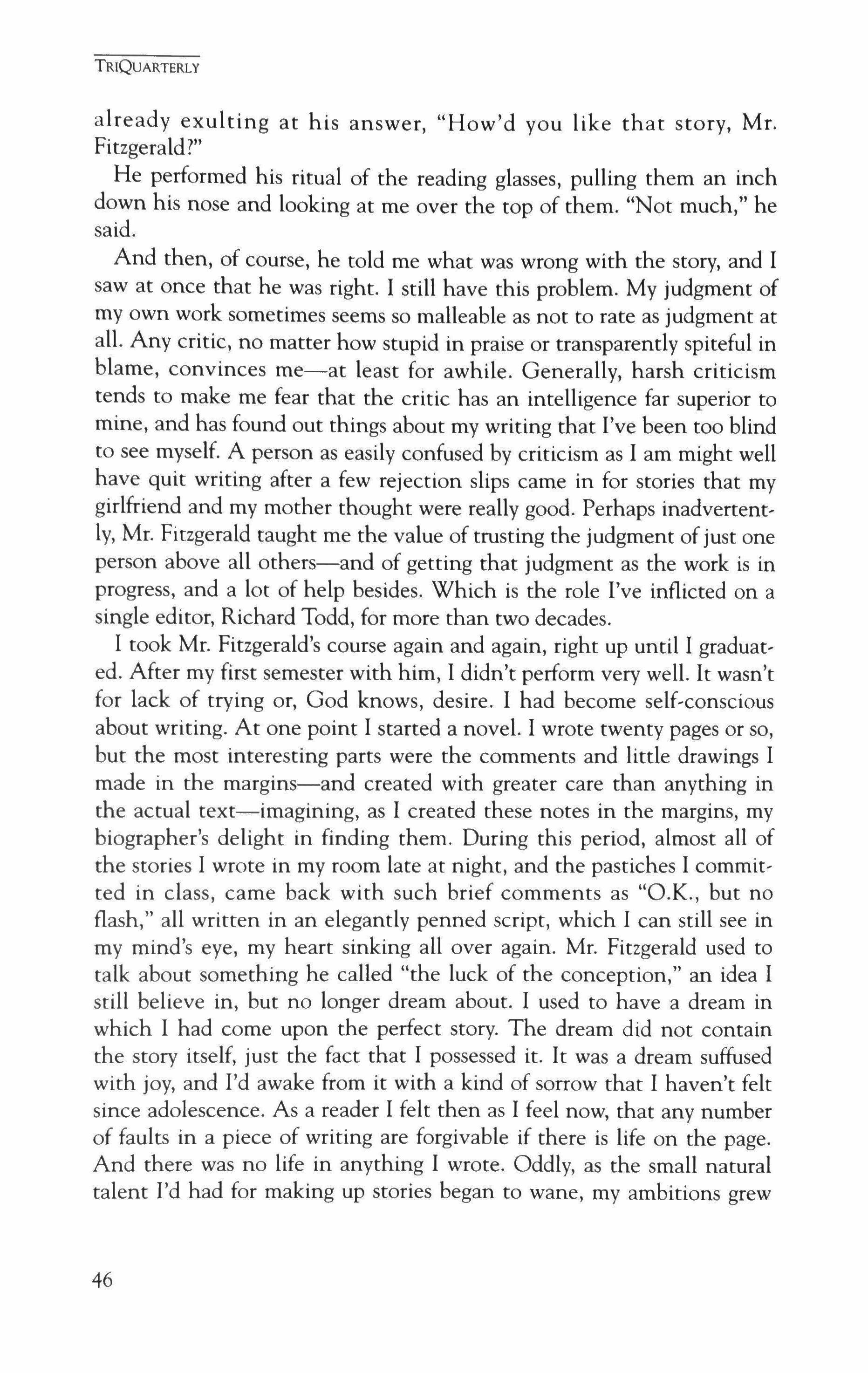
already exulting at his answer, "How'd you like that story, Mr. Fitzgerald?"
He performed his ritual of the reading glasses, pulling them an inch down his nose and looking at me over the top of them. "Not much," he said.
And then, of course, he told me what was wrong with the story, and I saw at once that he was right. I still have this problem. My judgment of my own work sometimes seems so malleable as not to rate as judgment at all. Any critic, no matter how stupid in praise or transparently spiteful in blame, convinces me-at least for awhile. Generally, harsh criticism tends to make me fear that the critic has an intelligence far superior to mine, and has found out things about my writing that I've been too blind to see myself. A person as easily confused by criticism as I am might well have quit writing after a few rejection slips came in for stories that my girlfriend and my mother thought were really good. Perhaps inadvertently, Mr. Fitzgerald taught me the value of trusting the judgment ofjust one person above all others-and of getting that judgment as the work is in progress, and a lot of help besides. Which is the role I've inflicted on a single editor, Richard Todd, for more than two decades.
I took Mr. Fitzgerald's course again and again, right up until I graduated. After my first semester with him, I didn't perform very well. It wasn't for lack of trying or, God knows, desire. I had become self-conscious about writing. At one point I started a novel. I wrote twenty pages or so, but the most interesting parts were the comments and little drawings I made in the margins-and created with greater care than anything in the actual text-imagining, as I created these notes in the margins, my biographer's delight in finding them. During this period, almost all of the stories I wrote in my room late at night, and the pastiches I committed in class, came back with such brief comments as "O.K., but no flash," all written in an elegantly penned script, which I can still see in my mind's eye, my heart sinking all over again. Mr. Fitzgerald used to talk about something he called "the luck of the conception," an idea I still believe in, but no longer dream about. I used to have a dream in which I had come upon the perfect story. The dream did not contain the story itself, just the fact that I possessed it. It was a dream suffused with joy, and I'd awake from it with a kind of sorrow that I haven't felt since adolescence. As a reader I felt then as I feel now, that any number of faults in a piece of writing are forgivable if there is life on the page. And there was no life in anything I wrote. Oddly, as the small natural talent I'd had for making up stories began to wane, my ambitions grew
ThlQUARTERLY
46
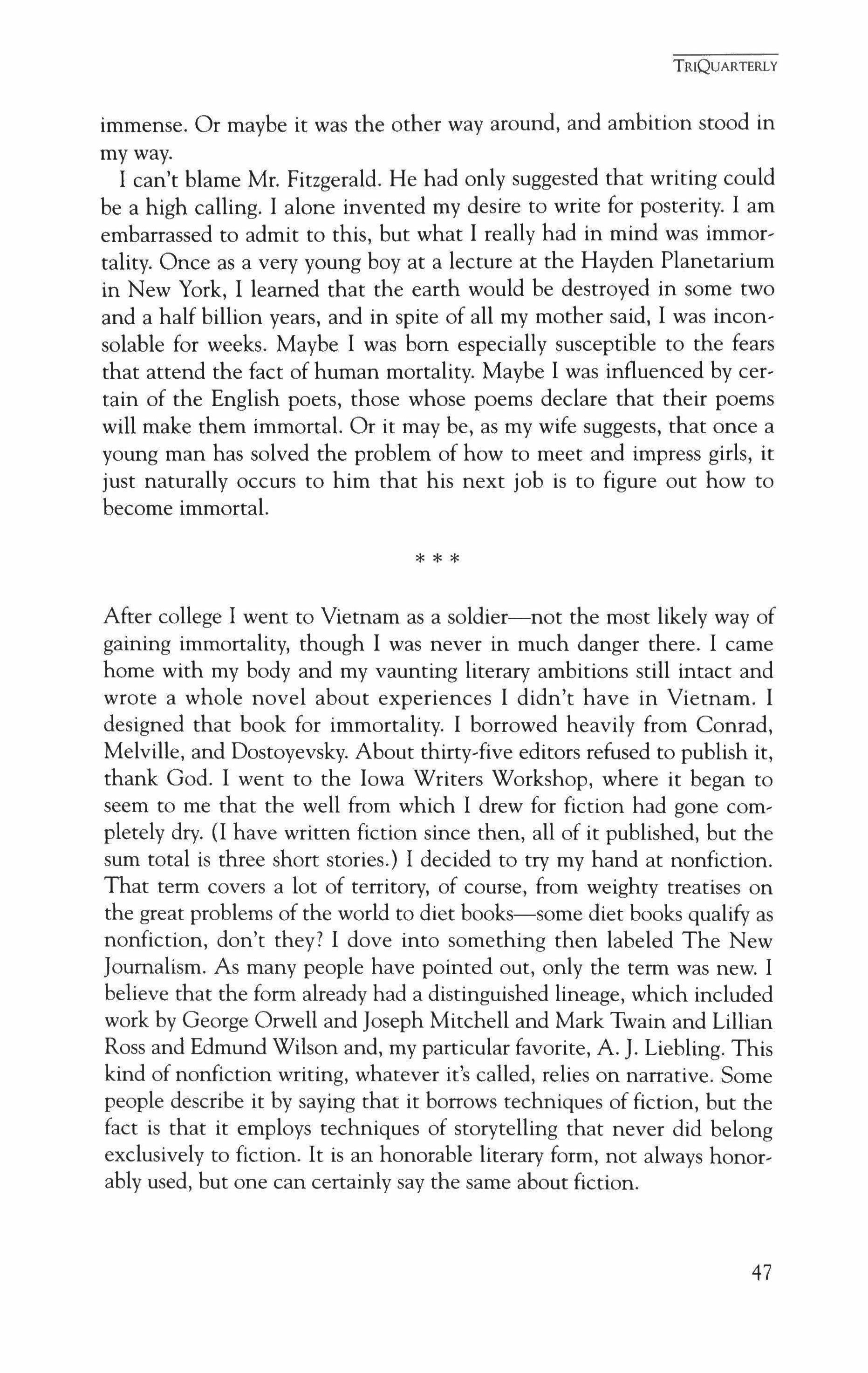
immense. Or maybe it was the other way around, and ambition stood in my way.
I can't blame Mr. Fitzgerald. He had only suggested that writing could be a high calling. I alone invented my desire to write for posterity. I am embarrassed to admit to this, but what I really had in mind was immortality. Once as a very young boy at a lecture at the Hayden Planetarium in New York, I learned that the earth would be destroyed in some two and a half billion years, and in spite of all my mother said, I was inconsolable for weeks. Maybe I was born especially susceptible to the fears that attend the fact of human mortality. Maybe I was influenced by certain of the English poets, those whose poems declare that their poems will make them immortal. Or it may be, as my wife suggests, that once a young man has solved the problem of how to meet and impress girls, it just naturally occurs to him that his next job is to figure out how to become immortal. * * *
After college I went to Vietnam as a soldier-not the most likely way of gaining immortality, though I was never in much danger there. I came home with my body and my vaunting literary ambitions still intact and wrote a whole novel about experiences I didn't have in Vietnam. I designed that book for immortality. I borrowed heavily from Conrad, Melville, and Dostoyevsky. About thirty-five editors refused to publish it, thank God. I went to the Iowa Writers Workshop, where it began to seem to me that the well from which I drew for fiction had gone cornpletely dry. (I have written fiction since then, all of it published, but the sum total is three short stories.) I decided to try my hand at nonfiction. That term covers a lot of territory, of course, from weighty treatises on the great problems of the world to diet books-some diet books qualify as nonfiction, don't they? I dove into something then labeled The New Journalism. As many people have pointed out, only the term was new. I believe that the form already had a distinguished lineage, which included work by George Orwell and Joseph Mitchell and Mark Twain and Lillian Ross and Edmund Wilson and, my particular favorite, A. J. Liebling. This kind of nonfiction writing, whatever it's called, relies on narrative. Some people describe it by saying that it borrows techniques of fiction, but the fact is that it employs techniques of storytelling that never did belong exclusively to fiction. It is an honorable literary form, not always honorably used, but one can certainly say the same about fiction.
TRIQUARTERLY
47
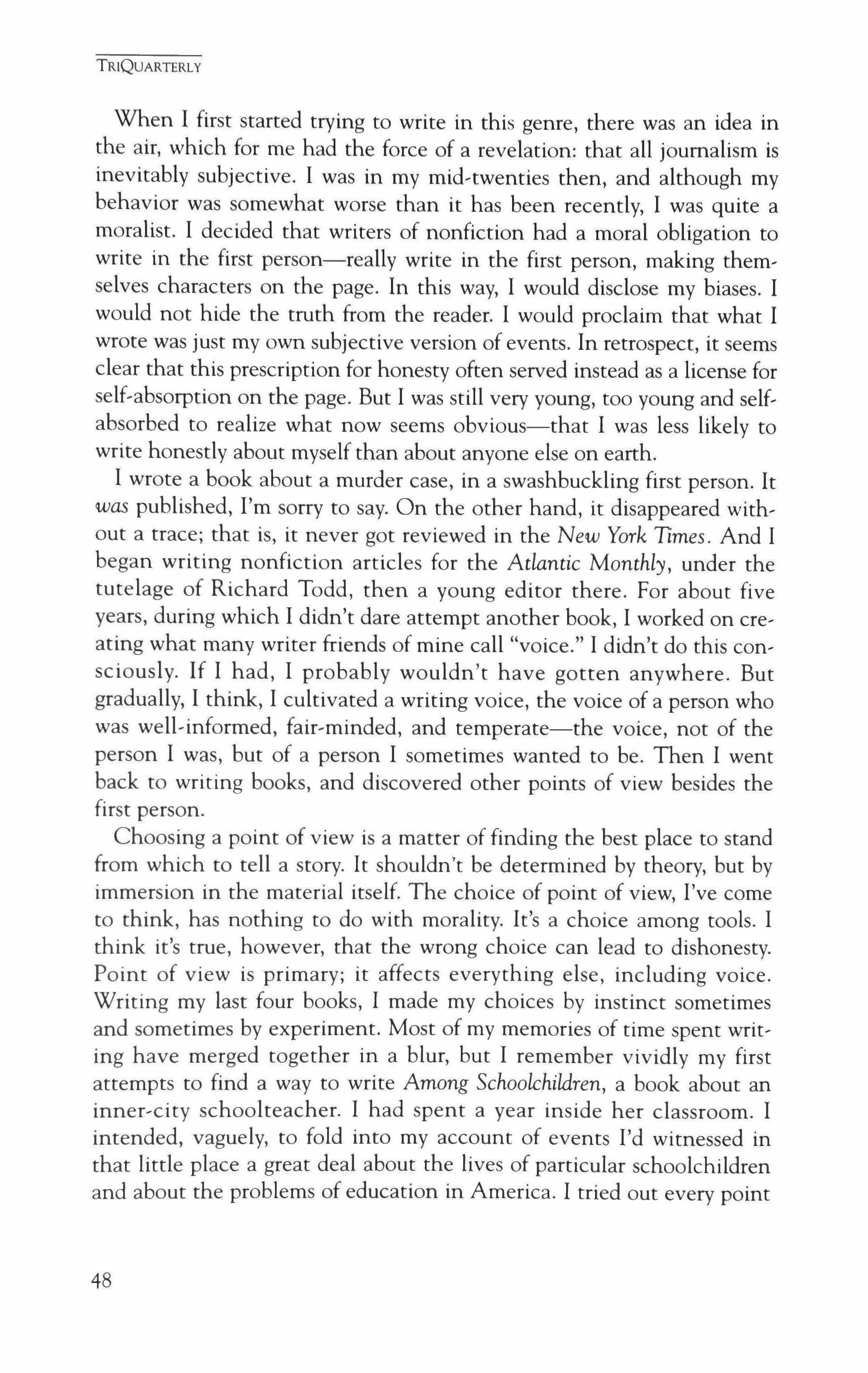
When I first started trying to write in this genre, there was an idea in the air, which for me had the force of a revelation: that all journalism is inevitably subjective. 1 was in my mid-twenties then, and although my behavior was somewhat worse than it has been recently, 1 was quite a moralist. 1 decided that writers of nonfiction had a moral obligation to write in the first person-really write in the first person, making themselves characters on the page. In this way, 1 would disclose my biases. 1 would not hide the truth from the reader. 1 would proclaim that what 1 wrote was just my own subjective version of events. In retrospect, it seems clear that this prescription for honesty often served instead as a license for self-absorption on the page. But I was still very young, too young and selfabsorbed to realize what now seems obvious-that I was less likely to write honestly about myself than about anyone else on earth.
1 wrote a book about a murder case, in a swashbuckling first person. It was published, I'm sorry to say. On the other hand, it disappeared without a trace; that is, it never got reviewed in the New YO'r'k Times. And 1 began writing nonfiction articles for the Atlantic Monthly, under the tutelage of Richard Todd, then a young editor there. For about five years, during which I didn't dare attempt another book, I worked on creating what many writer friends of mine call "voice." 1 didn't do this consciously. If 1 had, I probably wouldn't have gotten anywhere. But gradually, I think, I cultivated a writing voice, the voice of a person who was well-informed, fair-minded, and temperate-the voice, not of the person 1 was, but of a person 1 sometimes wanted to be. Then I went back to writing books, and discovered other points of view besides the first person.
Choosing a point of view is a matter of finding the best place to stand from which to tell a story. It shouldn't be determined by theory, but by immersion in the material itself. The choice of point of view, I've come to think, has nothing to do with morality. It's a choice among tools. 1 think it's true, however, that the wrong choice can lead to dishonesty. Point of view is primary; it affects everything else, including voice. Writing my last four books, I made my choices by instinct sometimes and sometimes by experiment. Most of my memories of time spent writing have merged together in a blur, but I remember vividly my first attempts to find a way to write Among Schoolchildren, a book about an inner-city schoolteacher. I had spent a year inside her classroom. I intended, vaguely, to fold into my account of events I'd witnessed in that little place a great deal about the lives of particular schoolchildren and about the problems of education in America. I tried out every point
TR1QUARTERLY
48

of view that I'd used in previous books, and every page I wrote felt lifeless. Finally, I hit on a restricted third- person narration.
The approach seemed to work. The world of that classroom seemed to come alive when the view of it was restricted mainly to observations of the teacher and to accounts of what the teacher saw and heard and smelled and felt. This choice narrowed my options. I ended up writing something less comprehensive than I'd planned. The book became essentially an account of a year in the emotional life of a schoolteacher. My choice of the restricted third person also obliged me to write parts of the book as if from within the teacher's mind. I felt entitled to describe her thoughts and feelings because she had described them to me, both during class and afterward, and because her descriptions rarely seemed self-serving. Believing in them myself, I thought that I could make them believable on the page.
Belief is an offering that a reader makes to an author, what Coleridge famously called "That willing suspension of disbelief for the moment, which constitutes poetic faith." It is up to the writer to entertain and inform without disappointing the reader into a loss of that faith. In fiction or poetry, of course, believability may have nothing to do with realism or even plausibility. It has everything to do with those things in nonfiction, in my opinion. I think that the nonfiction writer's fundamental job is to make what is true believable. I'm not sure that everyone agrees. Lately the job seems to have been defined differently. Here are some of the ways that some people now seem to define the nonfiction writer's job: to make believable what the writer thinks is true, if the writer wants to be scrupulous; to make believable what the writer wishes were true, if the writer isn't interested in scrupulosity; or to make believable what the writer thinks might be true, if the writer couldn't get the story and had to make it up.
I figure that if I call a piece of my own writing nonfiction it ought to be about real people, with their real names attached whenever possible, who say and do in print nothing that they didn't actually say and do. On the cover page of my last book I put a note that reads, "This is a work of nonfiction," and listed the several names that I was obliged to change in the text. I thought a longer note would be intrusive. I was afraid that it would stand between the reader and the spell that I wanted to create, inviting the reader into the world of a nursing home. But the definition of "nonfiction" has become so slippery that I wonder if I shouldn't have written more. So now I'll take this opportunity to explain that for my last book I spent a year doing research, that the
TRIQUARTERLY
49

name of the place I wrote about is its real name, that I didn't change the names of any of the major characters, and that I didn't invent dialogue or put any thoughts in characters' minds that the characters themselves didn't confess to.
I no longer care what rules other writers set for themselves. If I don't like what someone has written, I can stop reading, which is, after all, the worst punishment a writer can suffer. (It ought to be the worst punishment. Some critics seem to feel that the creation of a book that displeases them amounts to a felony.) But the expanded definitions of nonfiction have created problems for those writers who define the term narrowly. Many readers now view with suspicion every narrative that claims to be nonfiction, and yet scores of very good nonfiction writers do not make up their stories or the details in them-writers such as John McPhee, Jane Kramer, J. Anthony Lucas. There are also special cases that confound categories and all attempts to lay down rules for writers of narrative. I have in mind Norman Mailer and in particular his Executioner's Song, a hybrid of fact and fiction, carefully labeled as such-a book I admire.
Most writers lack Mailer's powers of invention. Some nonfiction writers do not lack his willingness to invent, but the candor to admit it. Some writers proceed by trying to discover the truth about a situation, and then invent or distort the facts as necessary. Even in these suspicious times, writers can get away with this. Often no one will know, and the subjects of the story may not care. They may not notice. But the writer always knows. I believe in immersion in the events of a story. I take it on faith that the truth lies in the events somewhere, and that immersion in those real events will yield glimpses of that truth. I try to hew to what has begun to seem like a narrow definition of nonfiction partly in that faith, and partly out of fear. I'm afraid that if I started making up things in a story that purported to be about real events and people, I'd stop believing it myself. And I imagine that such a loss of conviction would infect every sentence and make each one unbelievable.
I don't mean to imply that all a person has to do to write good narrative nonfiction is to take accurate notes and reproduce them. The kind of nonfiction I like to read is at bottom storytelling, as gracefully accomplished as good fiction. I don't think any technique should be ruled out to achieve it well. For myself, I rule out only invention. But I don't think that honesty and artifice are contradictory. They work together in good writing of every sort. Artfulness and an author's justified belief in a story often combine to produce the most believable nonfiction.
TRIQUARTERLY
*
50
* *
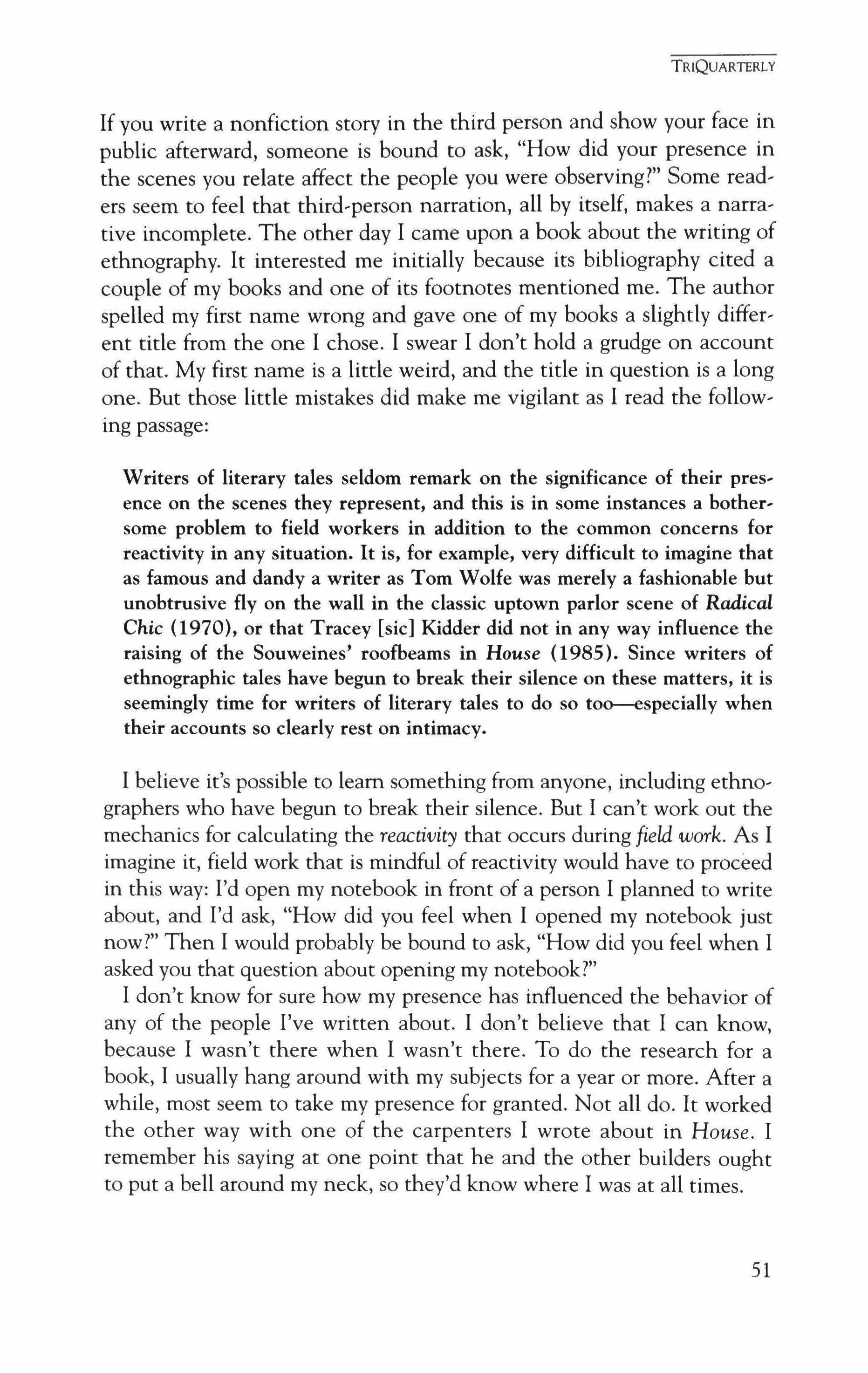
If you write a nonfiction story in the third person and show your face in public afterward, someone is bound to ask, "How did your presence in the scenes you relate affect the people you were observing?" Some read, ers seem to feel that third-person narration, all by itself, makes a narrative incomplete. The other day I came upon a book about the writing of ethnography. It interested me initially because its bibliography cited a couple of my books and one of its footnotes mentioned me. The author spelled my first name wrong and gave one of my books a slightly differ, ent title from the one I chose. I swear I don't hold a grudge on account of that. My first name is a little weird, and the title in question is a long one. But those little mistakes did make me vigilant as I read the follow, ing passage:
Writers of literary tales seldom remark on the significance of their pres, ence on the scenes they represent, and this is in some instances a bother, some problem to field workers in addition to the common concerns for reactivity in any situation. It is, for example, very difficult to imagine that as famous and dandy a writer as Tom Wolfe was merely a fashionable but unobtrusive fly on the wall in the classic uptown parlor scene of Radical Chic (1970), or that Tracey [sic] Kidder did not in any way influence the raising of the Souweines' roofbeams in House (1985). Since writers of ethnographic tales have begun to break their silence on these matters, it is seemingly time for writers of literary tales to do so too----especially when their accounts so clearly rest on intimacy.
I believe it's possible to learn something from anyone, including ethnographers who have begun to break their silence. But I can't work out the mechanics for calculating the reactivity that occurs during field work. As I imagine it, field work that is mindful of reactivity would have to proceed in this way: I'd open my notebook in front of a person I planned to write about, and I'd ask, "How did you feel when I opened my notebook just now?" Then I would probably be bound to ask, "How did you feel when I asked you that question about opening my notebook?"
I don't know for sure how my presence has influenced the behavior of any of the people I've written about. I don't believe that I can know, because I wasn't there when I wasn't there. To do the research for a book, I usually hang around with my subjects for a year or more. After a while, most seem to take my presence for granted. Not all do. It worked the other way with one of the carpenters I wrote about in House. I remember his saying at one point that he and the other builders ought to put a bell around my neck, so they'd know where I was at all times.
TRIQUARTERLY
51
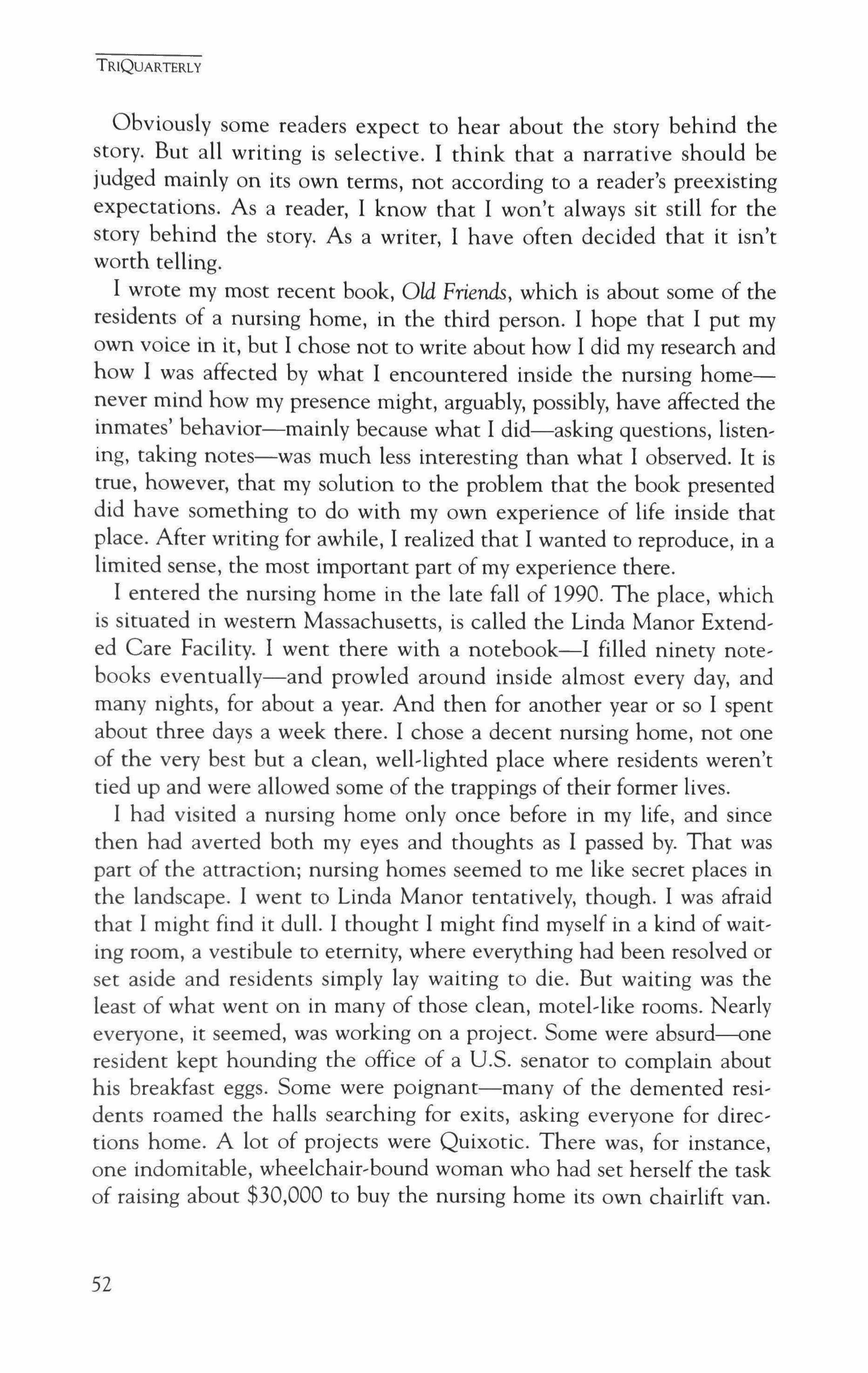
Obviously some readers expect to hear about the story behind the story. But all writing is selective. I think that a narrative should be judged mainly on its own terms, not according to a reader's preexisting expectations. As a reader, I know that I won't always sit still for the story behind the story. As a writer, I have often decided that it isn't worth telling.
I wrote my most recent book, Old Friends, which is about some of the residents of a nursing home, in the third person. I hope that I put my own voice in it, but I chose not to write about how I did my research and how I was affected by what I encountered inside the nursing homenever mind how my presence might, arguably, possibly, have affected the inmates' behavior-mainly because what I did-asking questions, listening, taking notes-was much less interesting than what I observed. It is true, however, that my solution to the problem that the book presented did have something to do with my own experience of life inside that place. After writing for awhile, I realized that I wanted to reproduce, in a limited sense, the most important part of my experience there.
I entered the nursing home in the late fall of 1990. The place, which is situated in western Massachusetts, is called the Linda Manor Extended Care Facility. I went there with a notebook-I filled ninety notebooks eventually-and prowled around inside almost every day, and many nights, for about a year. And then for another year or so I spent about three days a week there. I chose a decent nursing home, not one of the very best but a clean, well-lighted place where residents weren't tied up and were allowed some of the trappings of their former lives.
I had visited a nursing home only once before in my life, and since then had averted both my eyes and thoughts as I passed by. That was part of the attraction; nursing homes seemed to me like secret places in the landscape. I went to Linda Manor tentatively, though. I was afraid that I might find it dull. I thought I might find myself in a kind of waiting room, a vestibule to eternity, where everything had been resolved or set aside and residents simply lay waiting to die. But waiting was the least of what went on in many of those clean, motel-like rooms. Nearly everyone, it seemed, was working on a project. Some were absurd--one resident kept hounding the office of a U.S. senator to complain about his breakfast eggs. Some were poignant-many of the demented residents roamed the halls searching for exits, asking everyone for directions home. A lot of projects were Quixotic. There was, for instance, one indomitable, wheelchair-bound woman who had set herself the task of raising about $30,000 to buy the nursing home its own chairlift van.
TRIQUARTERLY
52
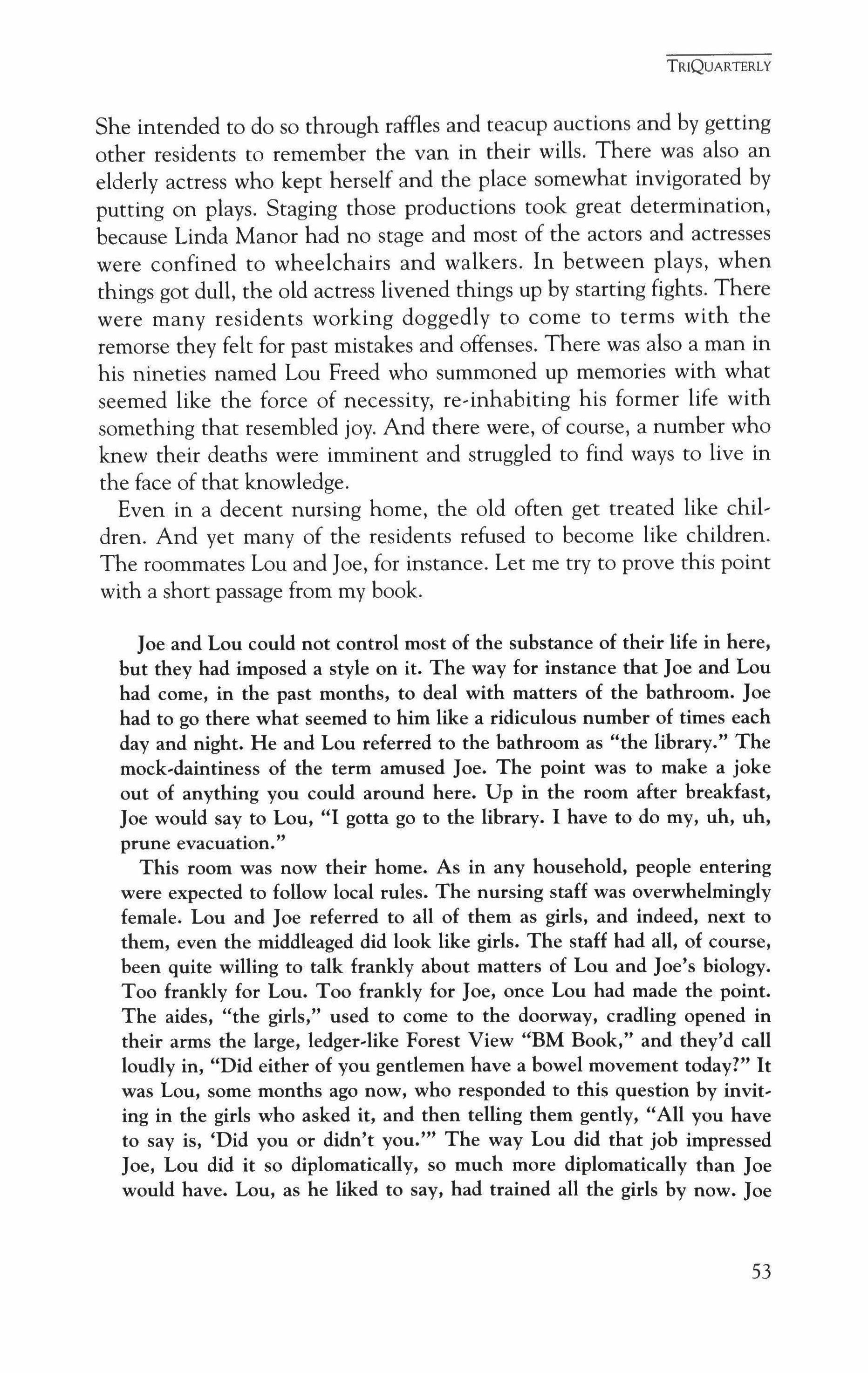
She intended to do so through raffles and teacup auctions and by getting other residents to remember the van in their wills. There was also an elderly actress who kept herself and the place somewhat invigorated by putting on plays. Staging those productions took great determination, because Linda Manor had no stage and most of the actors and actresses were confined to wheelchairs and walkers. In between plays, when things got dull, the old actress livened things up by starting fights. There were many residents working doggedly to come to terms with the remorse they felt for past mistakes and offenses. There was also a man in his nineties named Lou Freed who summoned up memories with what seemed like the force of necessity, re-inhabiting his former life with something that resembled joy. And there were, of course, a number who knew their deaths were imminent and struggled to find ways to live in the face of that knowledge.
Even in a decent nursing home, the old often get treated like children. And yet many of the residents refused to become like children. The roommates Lou and Joe, for instance. Let me try to prove this point with a short passage from my book.
Joe and Lou could not control most of the substance of their life in here, but they had imposed a style on it. The way for instance that Joe and Lou had come, in the past months, to deal with matters of the bathroom. Joe had to go there what seemed to him like a ridiculous number of times each day and night. He and Lou referred to the bathroom as "the library." The mock-daintiness of the term amused Joe. The point was to make a joke out of anything you could around here. Up in the room after breakfast, Joe would say to Lou, "I gotta go to the library. I have to do my, uh, uh, prune evacuation."
This room was now their home. As in any household, people entering were expected to follow local rules. The nursing staff was overwhelmingly female. Lou and Joe referred to all of them as girls, and indeed, next to them, even the middleaged did look like girls. The staff had all, of course, been quite willing to talk frankly about matters of Lou and Joe's biology. Too frankly for Lou. Too frankly for Joe, once Lou had made the point. The aides, "the girls," used to come to the doorway, cradling opened in their arms the large, ledger-like Forest View "BM Book," and they'd call loudly in, "Did either of you gentlemen have a bowel movement today?" It was Lou, some months ago now, who responded to this question by inviting in the girls who asked it, and then telling them gently, "All you have to say is, 'Did you or didn't you.'" The way Lou did that job impressed Joe, Lou did it so diplomatically, so much more diplomatically than Joe would have. Lou, as he liked to say, had trained all the girls by now. Joe
TRIQUARTERLY
53
took care of reinforcement.
It was a morning in December. Joe had the television news on. He and Lou were listening to the dispatches from the Middle East. Joe wasn't waiting for the aide with the BM Book, but he had a question ready for her. When the aide came to the door, she asked, "For my book. Did you?"
"Yes." Joe tilted his head toward Lou. "And so did he." Then, a little smile blossoming, Joe looked at the aide and asked, "And what about you?"
"None of your business!" The aide looked embarrassed. She laughed.
"Well, you ask me," Joe said.
"But I get paid for it."
"Goodbye," Joe said pleasantly, and went back to watching the news.
Many residents insisted on preserving their dignity, in spite of the indignities imposed by failing health and institutional confinement. Many people in there were attempting in one way or another to invent new lives for themselves. In the context of that place and of debilitating illnesses, their quests seemed important.
So when I began to write Old Friends, I didn't lack for interesting characters or stories. I felt I had an overabundance. I told myself before I started writing that I couldn't fit in everything, and then for about a year I tried to do just that. In the end I had to jettison a lot of portraits and stories that I had written many times and polished up. Among other things, I wrote four or five times and finally discarded what in all mod, esty I believe to have been the most riveting account of a session of Bingo ever composed. But the plain fact was that about half of what I wrote and rewrote got in the way of the main story that I wanted to tell.

Hundreds of articles and books deal with the big issues that surround aging in late-twentieth-century America. I read some of them. But I didn't want to approach this subject in a general way. It is useful, maybe even necessary, to imagine that a definable group called "the elderly" exists. But all such conceptions inevitably fail. It is accurate only to say that there are many individuals who have lived longer than most of the rest of the population, and that they differ widely among themselves. For various reasons, some can no longer manage what are called the activities of daily living at home, and, for lack of a better solution, some of those people end up living in nursing homes. I chose to write about a few of those people partly because so much well-meaning commentary
TRIQUARTERlY
* * *
54

on old age depicts white-haired folks in tennis clothes-a tendency, it seems to me, that inadvertently denigrates the lives of the many people who haven't been as lucky.
About five percent of Americans over sixty-five-about 1.5 million people-live in nursing homes and, according to one estimate, nearly half of all the people who live past sixty-five will spend some time inside a nursing home. Obviously, they are important places, but nursing homes weren't really the subject I wanted to address. There were already plenty of published exposes of bad nursing homes. I decided to do my research inside a good nursing home on the theory that a good one would be bad enough, inevitably a house of grief and pain, and also because I didn't want to write about the kinds of policy and management issues that would have assumed primary importance in a story set in an evil place. I wanted to write from the inside about the experience of being old and sick and confined to an institution. I wanted to come at the subject of aging, not through statistics, but through elderly people themselves. I wanted to write an interesting, engaging book. The residents of even a decent nursing home are people in a difficult situation, and I think that stories about people in difficult situations are almost always interesting, and often dramatic.
In some ways, research in that place was easy work. In the course of every story I'd done before, I had run into people who hadn't wanted to talk to me. But people in a nursing home never have enough willing listeners. A nursing home like Linda Manor may be the only place on earth where a person with a notebook can hope to receive a universal welcome.
Various sights, smells, and sounds distressed me at first. But gradually, I got used to the externals of the place and people. Almost everyone who has spent some time inside a nursing home begins to look beyond the bodies of the residents. It just happens. But around the time when that happened to me, another problem arose. I remember leaving the room of a dying, despondent resident and stopping in my tracks in a Linda Manor corridor, and hearing myself say to myself, "This is amazing! Everybody dies." And, of course, my next thought was, "Including me." I know that sounds silly. One is supposed to have figured that out before pushing fifty. But I hadn't believed it, I think.
I arranged some other troubling moments for myself, during my research. At one point, I decided that I ought to check into Linda Manor for a couple of days and nights, as if I were myself a resident. I hate the kind of story in which a perfectly healthy person decides to ride
TRIQUARTERLY
55
around in a wheelchair for a day and then proclaims himself an expert in what being wheelchair,bound is like. But I believe in the possibility of imaginatively experiencing what others experience, and I thought I might learn something. With vast amusement, a nurse ushered me into a little room. My roommate, an ancient man who couldn't speak much, terrified me as soon as I climbed into bed. He kept clicking his light on and off. At one point I saw his hand through the filmy, so'called "privacy curtain." His hand reached toward the curtain, grasping at it. He was trying to pull the curtain back, so that he could get a better look at me, and I had to stifle the impulse to yell at him to stop. Then, a little later, I heard a couple of the nurses in the hall outside, saying loudly, speaking of me, "Shall we give him an enema?" An old source of amusement among nurses, the enema.
I didn't learn much that I could use in my book, from my two-night stand at Linda Manor. Except for the fact that a few minutes can seem like eternity in a nursing-home bed and the fact that, from such a perspective, cheerful, attractive, average-sized nurses and nurse's aides can look huge and menacing. Those two nights I kept getting up and looking out the window, to make sure my car was still in the parking lot. I had planned to stay longer, but went home early the third morning in order to get some sleep.
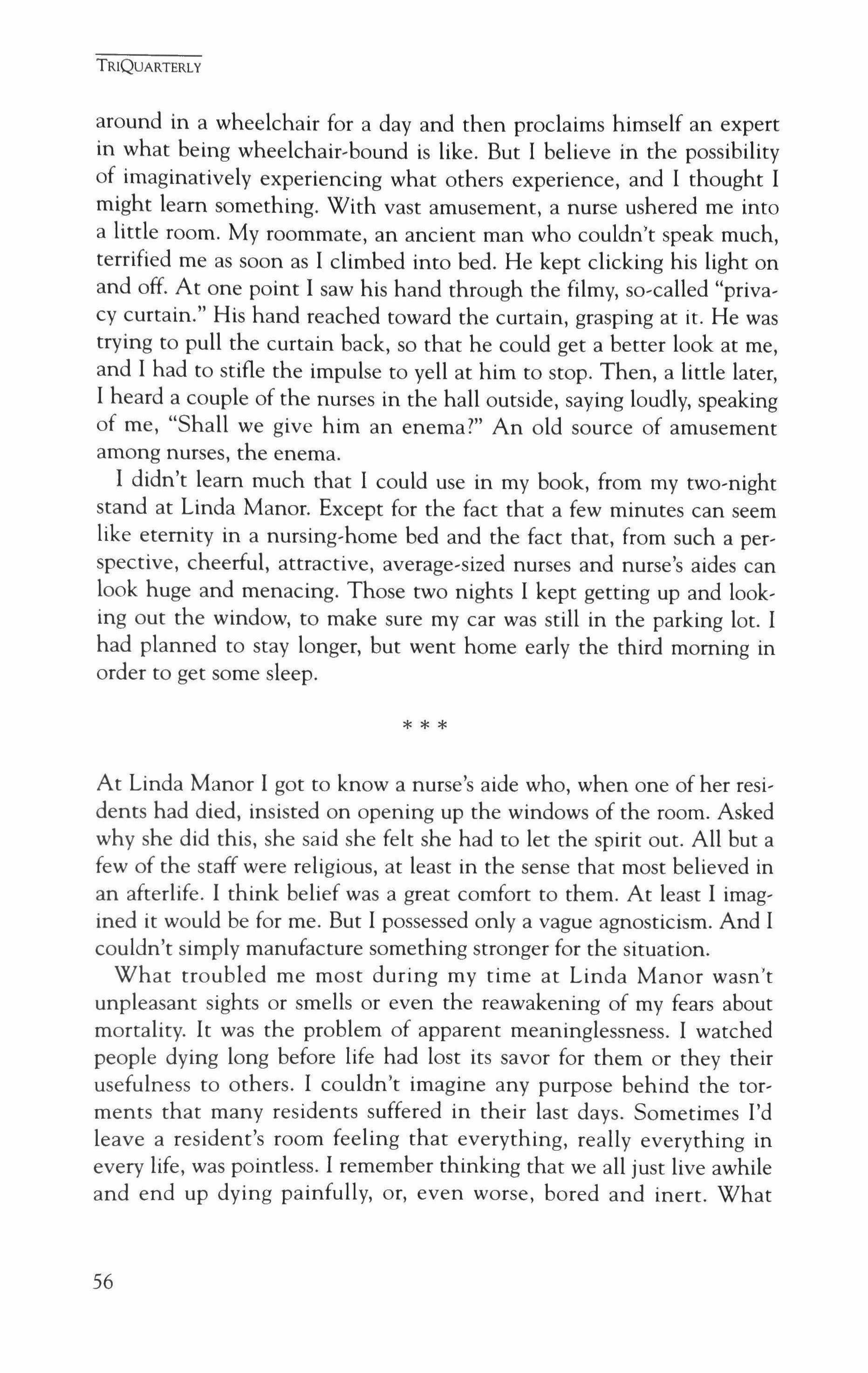
At Linda Manor I got to know a nurse's aide who, when one of her residents had died, insisted on opening up the windows of the room. Asked why she did this, she said she felt she had to let the spirit out. All but a few of the staff were religious, at least in the sense that most believed in an afterlife. I think belief was a great comfort to them. At least I imagined it would be for me. But I possessed only a vague agnosticism. And I couldn't simply manufacture something stronger for the situation.
What troubled me most during my time at Linda Manor wasn't unpleasant sights or smells or even the reawakening of my fears about mortality. It was the problem of apparent meaninglessness. I watched people dying long before life had lost its savor for them or they their usefulness to others. I couldn't imagine any purpose behind the torments that many residents suffered in their last days. Sometimes I'd leave a resident's room feeling that everything, really everything in every life, was pointless. I remember thinking that we all just live awhile and end up dying painfully, or, even worse, bored and inert. What
TRIQUARTERLY
* * *
56
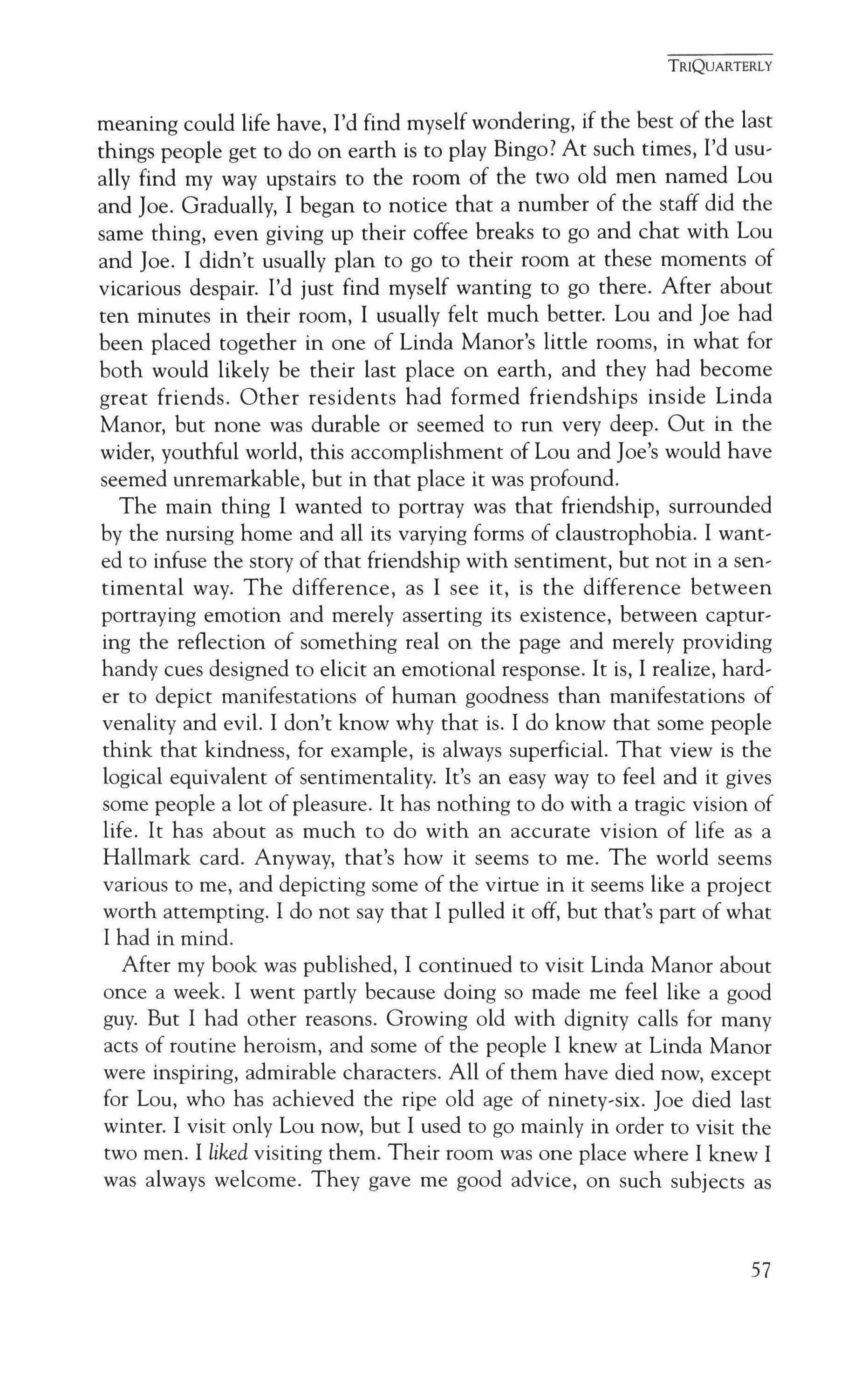
meaning could life have, I'd find myselfwondering, if the best of the last things people get to do on earth is to play Bingo? At such times, I'd usually find my way upstairs to the room of the two old men named Lou and Joe. Gradually, I began to notice that a number of the staff did the same thing, even giving up their coffee breaks to go and chat with Lou and Joe. I didn't usually plan to go to their room at these moments of vicarious despair. I'd just find myself wanting to go there. After about ten minutes in their room, I usually felt much better. Lou and Joe had been placed together in one of Linda Manor's little rooms, in what for both would likely be their last place on earth, and they had become great friends. Other residents had formed friendships inside Linda Manor, but none was durable or seemed to run very deep. Out in the wider, youthful world, this accomplishment of Lou and Joe's would have seemed unremarkable, but in that place it was profound.
The main thing I wanted to portray was that friendship, surrounded by the nursing home and all its varying forms of claustrophobia. I wanted to infuse the story of that friendship with sentiment, but not in a sentimental way. The difference, as I see it, is the difference between portraying emotion and merely asserting its existence, between capturing the reflection of something real on the page and merely providing handy cues designed to elicit an emotional response. It is, I realize, harder to depict manifestations of human goodness than manifestations of venality and evil. I don't know why that is. I do know that some people think that kindness, for example, is always superficial. That view is the logical equivalent of sentimentality. It's an easy way to feel and it gives some people a lot of pleasure. It has nothing to do with a tragic vision of life. It has about as much to do with an accurate vision of life as a Hallmark card. Anyway, that's how it seems to me. The world seems various to me, and depicting some of the virtue in it seems like a project worth attempting. I do not say that I pulled it off, but that's part of what I had in mind.
After my book was published, I continued to visit Linda Manor about once a week. I went partly because doing so made me feel like a good guy. But I had other reasons. Growing old with dignity calls for many acts of routine heroism, and some of the people I knew at Linda Manor were inspiring, admirable characters. All of them have died now, except for Lou, who has achieved the ripe old age of ninety-six. Joe died last winter. I visit only Lou now, but I used to go mainly in order to visit the two men. I liked visiting them. Their room was one place where I knew I was always welcome. They gave me good advice, on such subjects as
TRIQUARTERLY
57

child-rearing. They were funny, both intentionally and otherwise. Most important, their room was one place in the world where I could count on finding that amity prevailed. That was unusual, in my experience of the world. The crucial thing about Lou and joe was that they remained very good friends, better friends every time I visited. They presented an antidote to despair, which is connectedness, and for me, I learned, it is only the connectedness of the human tribe that can hold despair at bay. Connectedness can, of course, take many different forms. One can find it in religion, or in family, or, as in the case of Lou and joe, in friendship. Or perhaps in work, maybe even in the act of writing.
Harold Brodkey, who recently died of AIDS, wrote in an essay a couple of years ago, "I think anyone who spends his life working to become eligible for literary immortality is a fool." I agree. But I also think that only a fool would write merely for money or contemporary fame. I imagine that most writers-good, bad and mediocre-write partly for the sake of the private act of writing and partly in order to throw themselves out into the world. Most, I imagine, endeavor for connectedness, to create the kind of work that touches other lives and, in that sense at least, leaves something behind. I don't dream of immortality or plant marginalia for my biographers anymore. But I do wonder what Mr. Fitzgerald would think of what I've written and, especially, of what I'm going to write.
A few days after I got back from Vietnam, in june 1969, I traveled to Cambridge and called Mr. Fitzgerald from a pay phone. He invited me to lunch at his house the next afternoon. Of course, I didn't tell him this, but I wanted something from him, something ineffable, like hope. He had prepared sandwiches. I'm not sure that he made them himself, but I like to think that he did, and that he was responsible for cutting the crusts off the bread. I'm not sure why I remember that. It seemed a sweet gesture, a way of making me feel that I was important to him. It also made him seem old, older than I'd remembered him.
I saw Mr. Fitzgerald a few times more over the next year or two, and then he moved away and I moved out west for a while. I fell under other influences. My dreams of writing something classic gave way to my little dreams of writing something publishable, of making a living as a writer, which seemed hard enough. But those early dreams were dormant, not dead. When, almost ten years later, a book of mine, The Soul of a New Machine) was awarded the Pulitzer Prize and the American Book Award, my megalomaniacal dreams of literary glory came out of storage. I could tell myself at moments that I'd achieved them all. But I hesitated for
TRIQUARTERLY
58
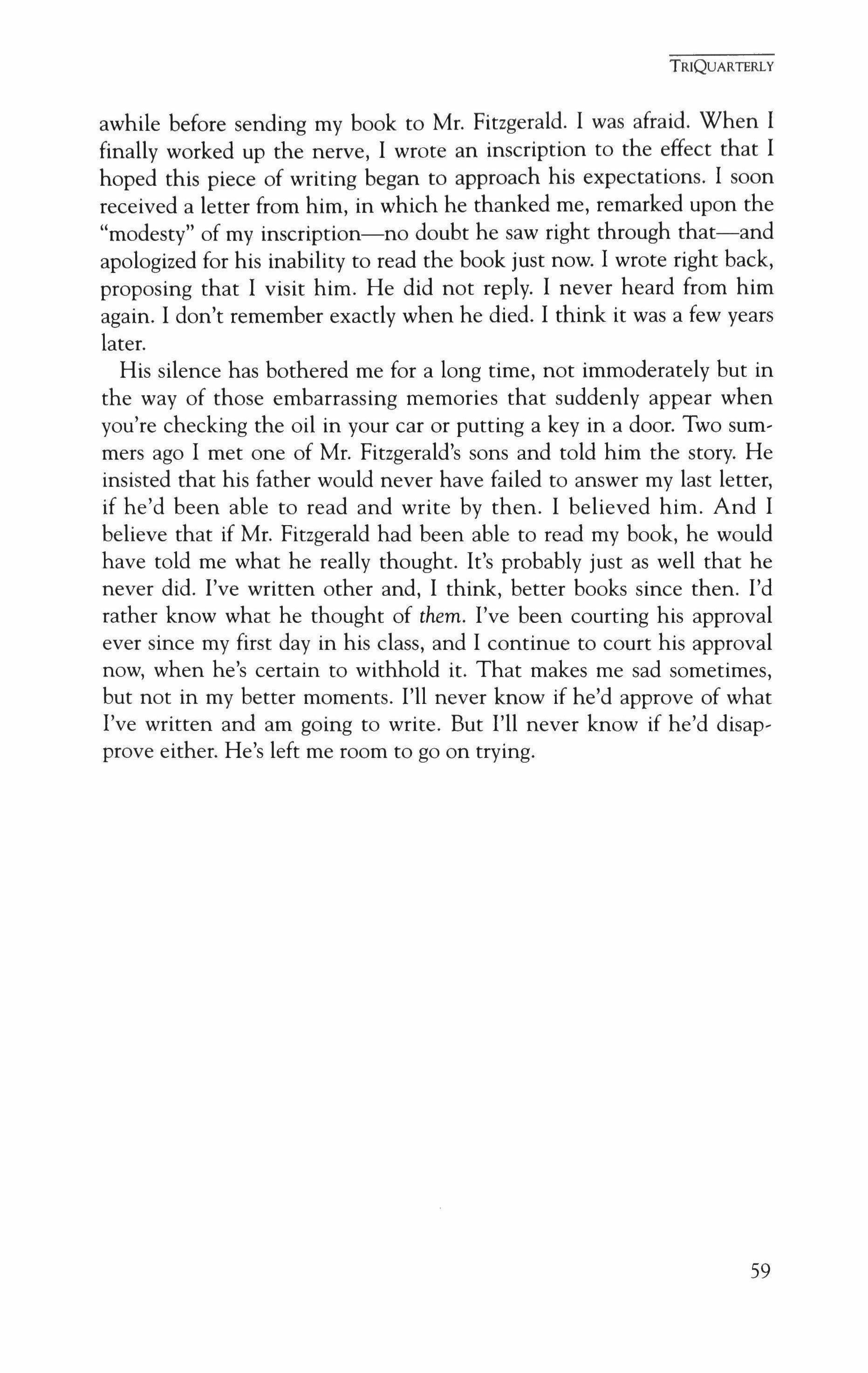
awhile before sending my book to Mr. Fitzgerald. I was afraid. When I finally worked up the nerve, I wrote an inscription to the effect that I hoped this piece of writing began to approach his expectations. I soon received a letter from him, in which he thanked me, remarked upon the "modesty" of my inscription-no doubt he saw right through that-and apologized for his inability to read the book just now. I wrote right back, proposing that I visit him. He did not reply. I never heard from him again. I don't remember exactly when he died. I think it was a few years later.
His silence has bothered me for a long time, not immoderately but in the way of those embarrassing memories that suddenly appear when you're checking the oil in your car or putting a key in a door. Two summers ago I met one of Mr. Fitzgerald's sons and told him the story. He insisted that his father would never have failed to answer my last letter, if he'd been able to read and write by then. I believed him. And I believe that if Mr. Fitzgerald had been able to read my book, he would have told me what he really thought. It's probably just as well that he never did. I've written other and, I think, better books since then. I'd rather know what he thought of them. I've been courting his approval ever since my first day in his class, and I continue to court his approval now, when he's certain to withhold it. That makes me sad sometimes, but not in my better moments. I'll never know if he'd approve of what I've written and am going to write. But I'll never know if he'd disapprove either. He's left me room to go on trying.
TRIQUARTERLY
59
Terrence Des Pres
Frederick Busch
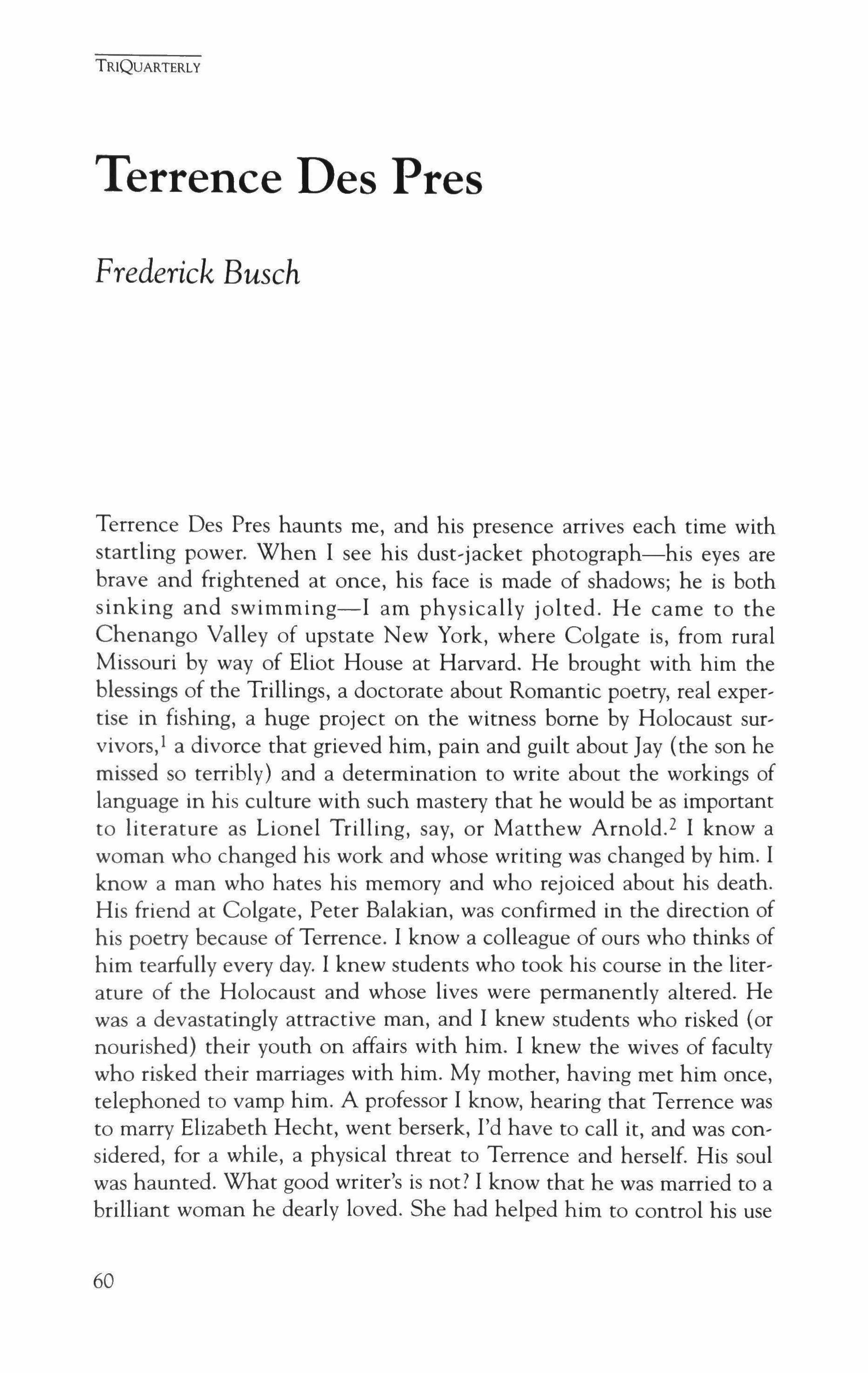
Terrence Des Pres haunts me, and his presence arrives each time with startling power. When I see his dust-jacket photograph-his eyes are brave and frightened at once, his face is made of shadows; he is both sinking and swimming-I am physically jolted. He came to the Chenango Valley of upstate New York, where Colgate is, from rural Missouri by way of Eliot House at Harvard. He brought with him the blessings of the Trillings, a doctorate about Romantic poetry, real expertise in fishing, a huge project on the witness borne by Holocaust survivors.! a divorce that grieved him, pain and guilt about Jay (the son he missed so terribly) and a determination to write about the workings of language in his culture with such mastery that he would be as important to literature as Lionel Trilling, say, or Matthew Arnold) I know a woman who changed his work and whose writing was changed by him. I know a man who hates his memory and who rejoiced about his death. His friend at Colgate, Peter Balakian, was confirmed in the direction of his poetry because of Terrence. I know a colleague of ours who thinks of him tearfully every day. I knew students who took his course in the literature of the Holocaust and whose lives were permanently altered. He was a devastatingly attractive man, and I knew students who risked (or nourished) their youth on affairs with him. I knew the wives of faculty who risked their marriages with him. My mother, having met him once, telephoned to vamp him. A professor I know, hearing that Terrence was to marry Elizabeth Hecht, went berserk, I'd have to call it, and was considered, for a while, a physical threat to Terrence and herself. His soul was haunted. What good writer's is not? I know that he was married to a brilliant woman he dearly loved. She had helped him to control his use
TRIQUARTERLY
60
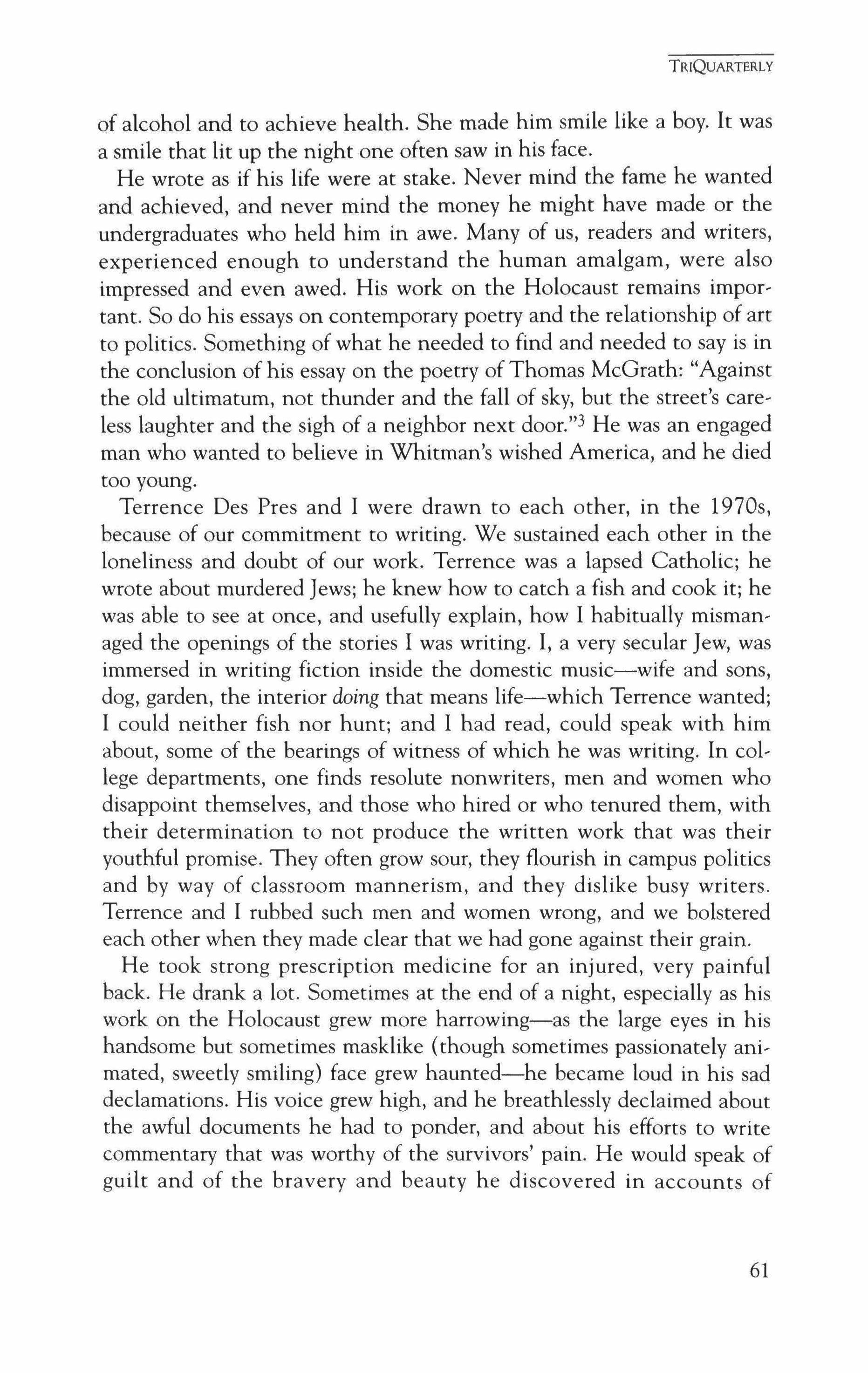
of alcohol and to achieve health. She made him smile like a boy. It was a smile that lit up the night one often saw in his face.
He wrote as if his life were at stake. Never mind the fame he wanted and achieved, and never mind the money he might have made or the undergraduates who held him in awe. Many of us, readers and writers, experienced enough to understand the human amalgam, were also impressed and even awed. His work on the Holocaust remains important. So do his essays on contemporary poetry and the relationship of art to politics. Something of what he needed to find and needed to say is in the conclusion of his essay on the poetry of Thomas McGrath: "Against the old ultimatum, not thunder and the fall of sky, but the street's careless laughter and the sigh of a neighbor next door" He was an engaged man who wanted to believe in Whitman's wished America, and he died too young.
Terrence Des Pres and I were drawn to each other, in the 1970s, because of our commitment to writing. We sustained each other in the loneliness and doubt of our work. Terrence was a lapsed Catholic; he wrote about murdered Jews; he knew how to catch a fish and cook it; he was able to see at once, and usefully explain, how I habitually mismanaged the openings of the stories I was writing. I, a very secular Jew, was immersed in writing fiction inside the domestic music-wife and sons, dog, garden, the interior doing that means life-which Terrence wanted; I could neither fish nor hunt; and I had read, could speak with him about, some of the bearings of witness of which he was writing. In college departments, one finds resolute nonwriters, men and women who disappoint themselves, and those who hired or who tenured them, with their determination to not produce the written work that was their youthful promise. They often grow sour, they flourish in campus politics and by way of classroom mannerism, and they dislike busy writers. Terrence and I rubbed such men and women wrong, and we bolstered each other when they made clear that we had gone against their grain.
He took strong prescription medicine for an injured, very painful back. He drank a lot. Sometimes at the end of a night, especially as his work on the Holocaust grew more harrowing-as the large eyes in his handsome but sometimes masklike (though sometimes passionately animated, sweetly smiling) face grew haunted-he became loud in his sad declamations. His voice grew high, and he breathlessly declaimed about the awful documents he had to ponder, and about his efforts to write commentary that was worthy of the survivors' pain. He would speak of guilt and of the bravery and beauty he discovered in accounts of
TRIQUARTERLY
61
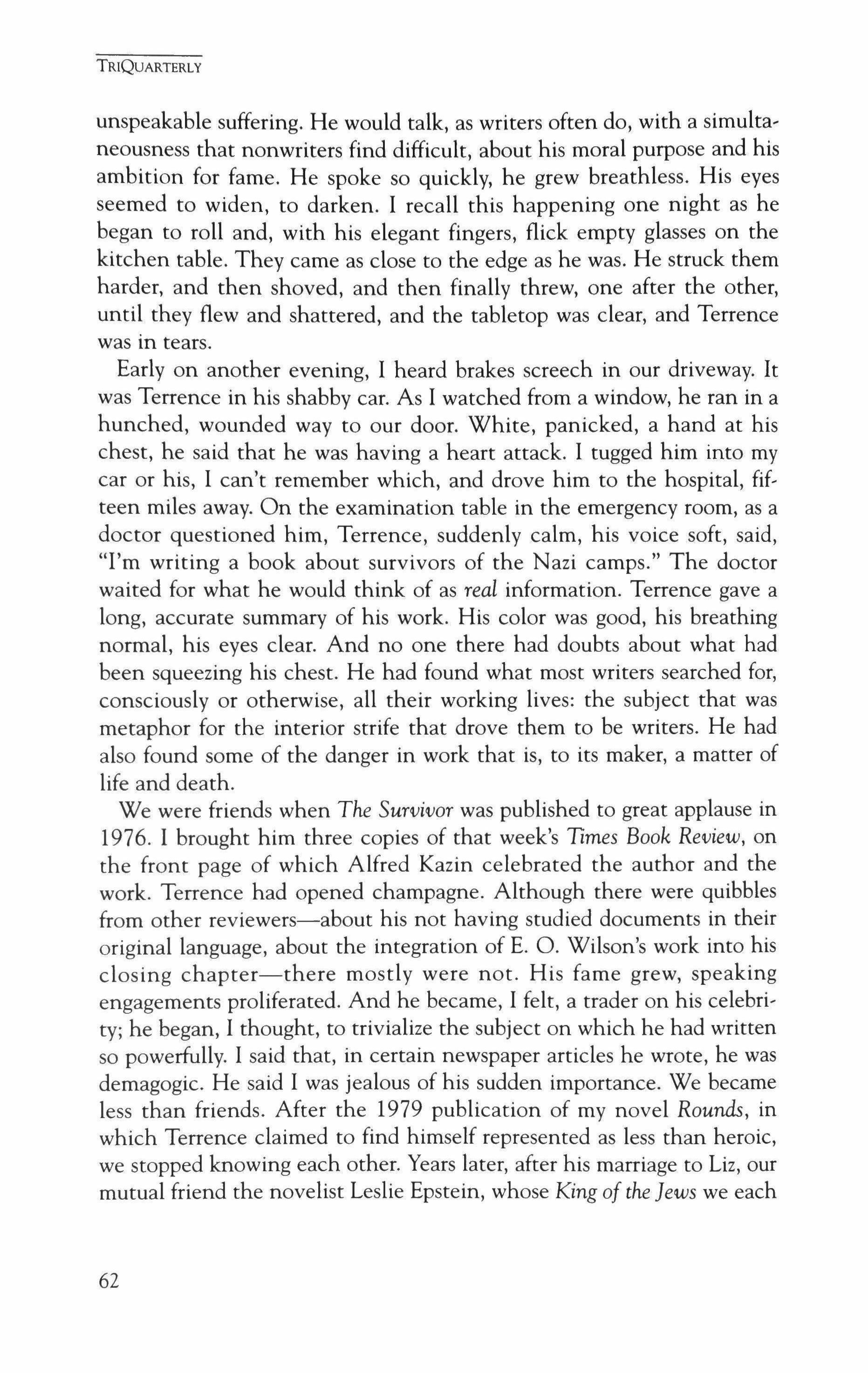
unspeakable suffering. He would talk, as writers often do, with a simultaneousness that nonwriters find difficult, about his moral purpose and his ambition for fame. He spoke so quickly, he grew breathless. His eyes seemed to widen, to darken. I recall this happening one night as he began to roll and, with his elegant fingers, flick empty glasses on the kitchen table. They came as close to the edge as he was. He struck them harder, and then shoved, and then finally threw, one after the other, until they flew and shattered, and the tabletop was clear, and Terrence was in tears.
Early on another evening, I heard brakes screech in our driveway. It was Terrence in his shabby car. As I watched from a window, he ran in a hunched, wounded way to our door. White, panicked, a hand at his chest, he said that he was having a heart attack. I tugged him into my car or his, I can't remember which, and drove him to the hospital, fifteen miles away. On the examination table in the emergency room, as a doctor questioned him, Terrence, suddenly calm, his voice soft, said, "I'm writing a book about survivors of the Nazi camps." The doctor waited for what he would think of as real information. Terrence gave a long, accurate summary of his work. His color was good, his breathing normal, his eyes clear. And no one there had doubts about what had been squeezing his chest. He had found what most writers searched for, consciously or otherwise, all their working lives: the subject that was metaphor for the interior strife that drove them to be writers. He had also found some of the danger in work that is, to its maker, a matter of life and death.
We were friends when The Survivor was published to great applause in 1976. I brought him three copies of that week's Times Book Review, on the front page of which Alfred Kazin celebrated the author and the work. Terrence had opened champagne. Although there were quibbles from other reviewers-about his not having studied documents in their original language, about the integration of E. O. Wilson's work into his closing chapter-there mostly were not. His fame grew, speaking engagements proliferated. And he became, I felt, a trader on his celebrity; he began, I thought, to trivialize the subject on which he had written so powerfully. I said that, in certain newspaper articles he wrote, he was demagogic. He said I was jealous of his sudden importance. We became less than friends. After the 1979 publication of my novel Rounds, in which Terrence claimed to find himself represented as less than heroic, we stopped knowing each other. Years later, after his marriage to Liz, our mutual friend the novelist Leslie Epstein, whose King of the Jews we each
TRIQUARTERLY
62
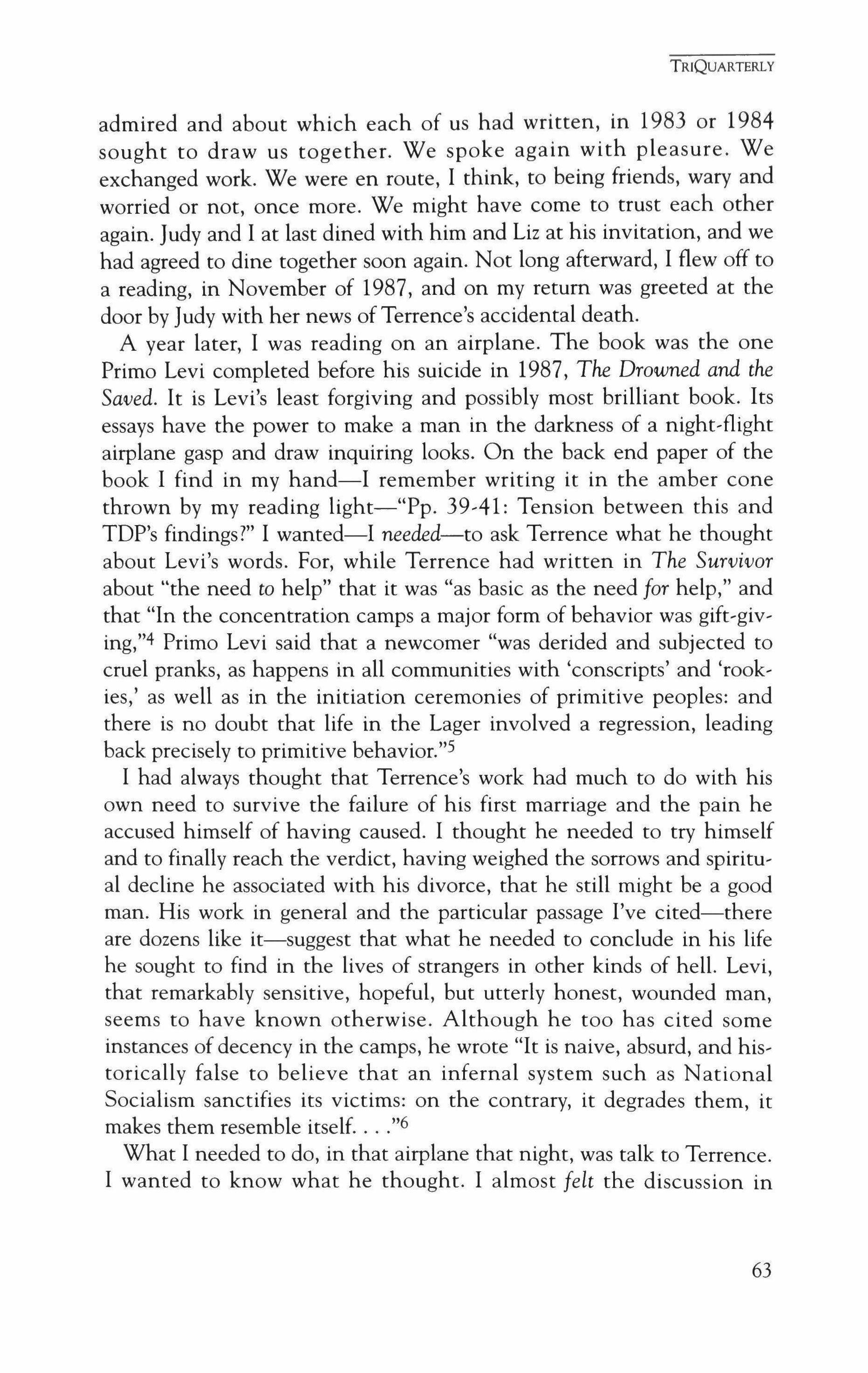
admired and about which each of us had written, in 1983 or 1984 sought to draw us together. We spoke again with pleasure. We exchanged work. We were en route, I think, to being friends, wary and worried or not, once more. We might have come to trust each other again. Judy and I at last dined with him and Liz at his invitation, and we had agreed to dine together soon again. Not long afterward, I flew off to a reading, in November of 1987, and on my return was greeted at the door by Judy with her news of Terrence's accidental death.
A year later, I was reading on an airplane. The book was the one Primo Levi completed before his suicide in 1987, The Drowned and the Saved. It is Levi's least forgiving and possibly most brilliant book. Its essays have the power to make a man in the darkness of a night-flight airplane gasp and draw inquiring looks. On the back end paper of the book I find in my hand-I remember writing it in the amber cone thrown by my reading light-"Pp. 39-41: Tension between this and TOP's findings?" I wanted-I needed-to ask Terrence what he thought about Levi's words. For, while Terrence had written in The Survivor about "the need to help" that it was "as basic as the need for help," and that "In the concentration camps a major form of behavior was gift-giving,"4 Primo Levi said that a newcomer "was derided and subjected to cruel pranks, as happens in all communities with 'conscripts' and 'rookies,' as well as in the initiation ceremonies of primitive peoples: and there is no doubt that life in the Lager involved a regression, leading back precisely to primitive behavior."
I had always thought that Terrence's work had much to do with his own need to survive the failure of his first marriage and the pain he accused himself of having caused. I thought he needed to try himself and to finally reach the verdict, having weighed the sorrows and spiritual decline he associated with his divorce, that he still might be a good man. His work in general and the particular passage I've cited-there are dozens like it-suggest that what he needed to conclude in his life he sought to find in the lives of strangers in other kinds of hell. Levi, that remarkably sensitive, hopeful, but utterly honest, wounded man, seems to have known otherwise. Although he too has cited some instances of decency in the camps, he wrote "It is naive, absurd, and historically false to believe that an infernal system such as National Socialism sanctifies its victims: on the contrary, it degrades them, it makes them resemble itself "6
What I needed to do, in that airplane that night, was talk to Terrence. I wanted to know what he thought. I almost felt the discussion in
TRIQUARTERLY
63
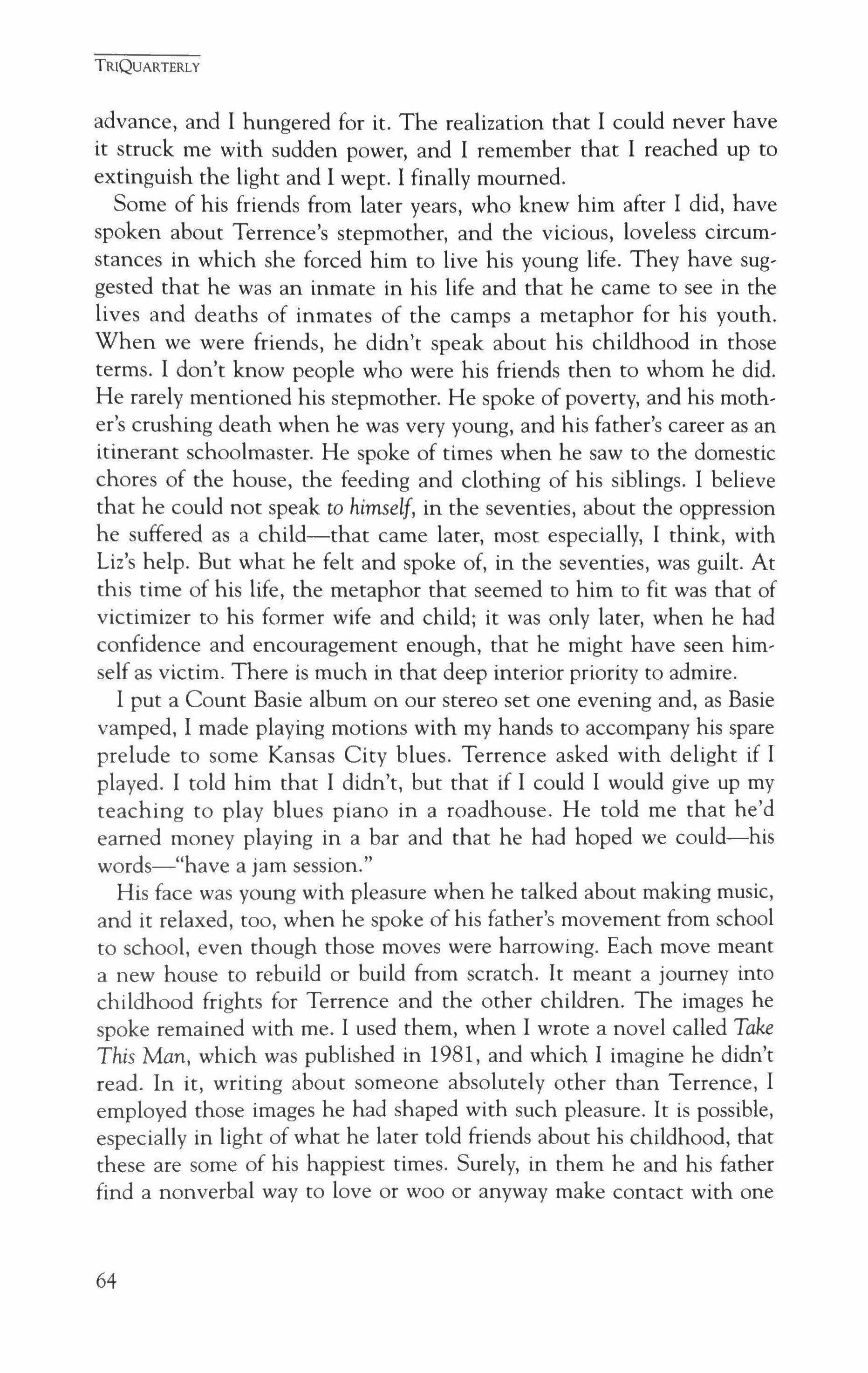
advance, and I hungered for it. The realization that I could never have it struck me with sudden power, and I remember that I reached up to extinguish the light and I wept. I finally mourned.
Some of his friends from later years, who knew him after I did, have spoken about Terrence's stepmother, and the vicious, loveless circumstances in which she forced him to live his young life. They have suggested that he was an inmate in his life and that he came to see in the lives and deaths of inmates of the camps a metaphor for his youth. When we were friends, he didn't speak about his childhood in those terms. I don't know people who were his friends then to whom he did. He rarely mentioned his stepmother. He spoke of poverty, and his mother's crushing death when he was very young, and his father's career as an itinerant schoolmaster. He spoke of times when he saw to the domestic chores of the house, the feeding and clothing of his siblings. I believe that he could not speak to himself, in the seventies, about the oppression he suffered as a child-that came later, most especially, I think, with Liz's help. But what he felt and spoke of, in the seventies, was guilt. At this time of his life, the metaphor that seemed to him to fit was that of victimizer to his former wife and child; it was only later, when he had confidence and encouragement enough, that he might have seen himself as victim. There is much in that deep interior priority to admire.
I put a Count Basie album on our stereo set one evening and, as Basie vamped, I made playing motions with my hands to accompany his spare prelude to some Kansas City blues. Terrence asked with delight if I played. I told him that I didn't, but that if I could I would give up my teaching to play blues piano in a roadhouse. He told me that he'd earned money playing in a bar and that he had hoped we could-his words-"have a jam session."
His face was young with pleasure when he talked about making music, and it relaxed, too, when he spoke of his father's movement from school to school, even though those moves were harrowing. Each move meant a new house to rebuild or build from scratch. It meant a journey into childhood frights for Terrence and the other children. The images he spoke remained with me. I used them, when I wrote a novel called Take This Man, which was published in 1981, and which I imagine he didn't read. In it, writing about someone absolutely other than Terrence, I employed those images he had shaped with such pleasure. It is possible, especially in light of what he later told friends about his childhood, that these are some of his happiest times. Surely, in them he and his father find a nonverbal way to love or woo or anyway make contact with one
TRIQUARTERLY
64

another, and they worked at making. The construction of a world figures in almost everything that Terrence wrote.
I wanted to save those moments, and I wanted to save them not only for myself. I gave them to him, while we were not friends, because once we had been. I served myself, and I made my fictive world, and I did on his behalf too the work that writers do: save feelings, instants, visions, from being eaten by time.
Here is one memory of my novel's character, taken from Terrence's words:
His father had taught in a school like this; they had driven for days to get to it, they had built another house for themselves, and his father had gone every day to teach in the high granite-and-brick building-make, believe miniature castle, probably built from discarded blueprints for a runt armory-with hard yellow light from classroom windows glowing on the parking lot and playground. (98)
Later, the same character recalls "This wasn't anyplace to do with what he'd called home, where he'd been born to circulate in hot counties with a lonely schoolmaster who often was mother, father, architect, and carpenter for them." (183) And then this:
He tried to place himself anyplace without his father and the motion-new classrooms, the faces looking up as he walked in to one more first day; orange lumber, bought cheap because undried, warping in the sun as they worked; roofs on which they rode in spite of his hourly mistakes; his father's dimpled flanks as they showered from a rain barrel after building a porch; his confidence, each time, despite his father's growing reservations, that this was what his life was supposed to be-and he couldn't see how he might come one day to live another way. That frightful blankness, blank as the dark his father carried him through in the pitching truck, must be the bright future his father sometimes men' tioned-the life that was different from this
But he missed him, as if loss were sudden and new. No matter what that man had done and been, he had been the man who straddled the roof and laughed. He had been the one who carried them through the nights and strange landscapes, and who had made them, finally, homes. It had been that man's hand at the back of the boy's thin neck, in whatever nameless countryside. (227)
One night in 1975 I called for him at Olmstead House, where he
TRIQUARTERLY
65

lived. His quarters were on the upper floor of a colonial home he rented from the college; he lived in a couple of rooms, kept a mattress on the floor for a bed, and was surrounded by thousands of books and records that I thought of as his furniture. On his wall was the smiling photo of his beautiful and very young mother. He was in another room, I in the living room, and as I waited I looked at his books. Opera was playing on the stereo. It was always at that time either opera or Janis Joplin, whose hoarse, edgy voice reminded him, he said, of his edgy boyhood. I saw an open notebook beside the chair in which Terrence had been sitting. I had to look. He was smarter than I, and I would learn something, and my work was as a magpie of lives. Here is what he had written: "Stories, first of all, store time." What I wrote in Take This Man, out of Terrence's memories, is the usual battle with loss; but maybe for Terrence and me, despite the distance between us at the time of writing, it was the jam session we had wished for.
When I remember Terrence, as I do so often, I think about the willingness alloyed with an almost insisted-on casualness, with which he took our son Ben, who was about eight, on little fishing trips. Fishing meant a great deal more to him than he told Ben, with whom he was gentle and tutorial about technique, but otherwise silent, Ben said. In one of his finest essays, a memoir that begins in the third person before shifting to the first, and which is shaped like a short story, Terrence remembers his Missouri boyhood. He writes about fishing-about a boy, he discloses after three pages, who was "of course myself, a self more vital, compact, pure, like wood within the inmost ring of a tree whose life has reached to many rings" [my italics]. He writes how "Amid the damage of living I find purchase in that uncluttered coming to selfhood of a boy "7 His work was about what must not be forgotten; and perhaps his own greatest loss was that participation in "the blessing of boyhood." He wrote in search of innocence, hoping-insisting-that he would find it again, even in modem life's worst horror. He never wrote again, at least for publication, about fishing-"rites that for a million years kept men living and in touch with awe."B
The grace he saw as lost did goad him. He felt that it could be rediscovered amid the damage of living. He required of himself that he search for decency in humankind's sewage. And all the while some of what nagged at him was the boy he had been, the self he saw as dead. I think that much of his work was an attempt to save that boy, to find him-in the worst we can do to others and ourselves-alive and blessed and pure.
TRIQUARTERLY
66
But he doubted as much as he wished to believe. Despite his searchhis prayer-for what was good, he also wrote that "Except in memory, a grace that is lost stays 10st."9 His salvation would be his memory, then, his saving from time what otherwise was vanished. His innocence would be in what he wrote. He would search, but he might not find, I think he suspected. In writing of John Gardner's life and death he referred to "childhood notions of guilt and the cross, a boy's desperate wish to be good and be loved."l0
He was both.

Notes
1. It resulted in The Survivor: An Anatomy of Life in the Death Camps (New York: Oxford University Press, 1976). In his Preface, Des Pres describes the project: "My subject is survival, the capacity of men and women to live beneath the pressure of protracted crisis, to sustain terrible damage in mind and body and yet be there, sane, alive, still human" (v). It is not merely his subject, but the brief he was compelled, by all of his life, to argue.
2. Indeed, in 1975 he published in the Partisan Review an essay he called "Prophecies of Grace and Doom: The Function of Criticism at the Present Time." It is reprinted in the posthumous collection Writing Into the World (New York: Viking, 1991), 1-6.
3. "Thomas McGrath, North America West," in Praises & Dispraises (New York: Viking, 1988), 186.
4. Des Pres, The Survivor, 136.
5. Primo Levi, The Drowned and the Saved (New York: Summit, 1986),39.
6. Levi, 40.
7. "Memory of Boyhood" in Writing Into the World (New York: Viking, 1991), 290.
8.Writing Into the World, 295.
9. Ibid.
10. "Accident and Its Scene," Writing Into the World, 202.
TRIQUARTERLY
67



The Sorge Spy Ring
A. Hernon
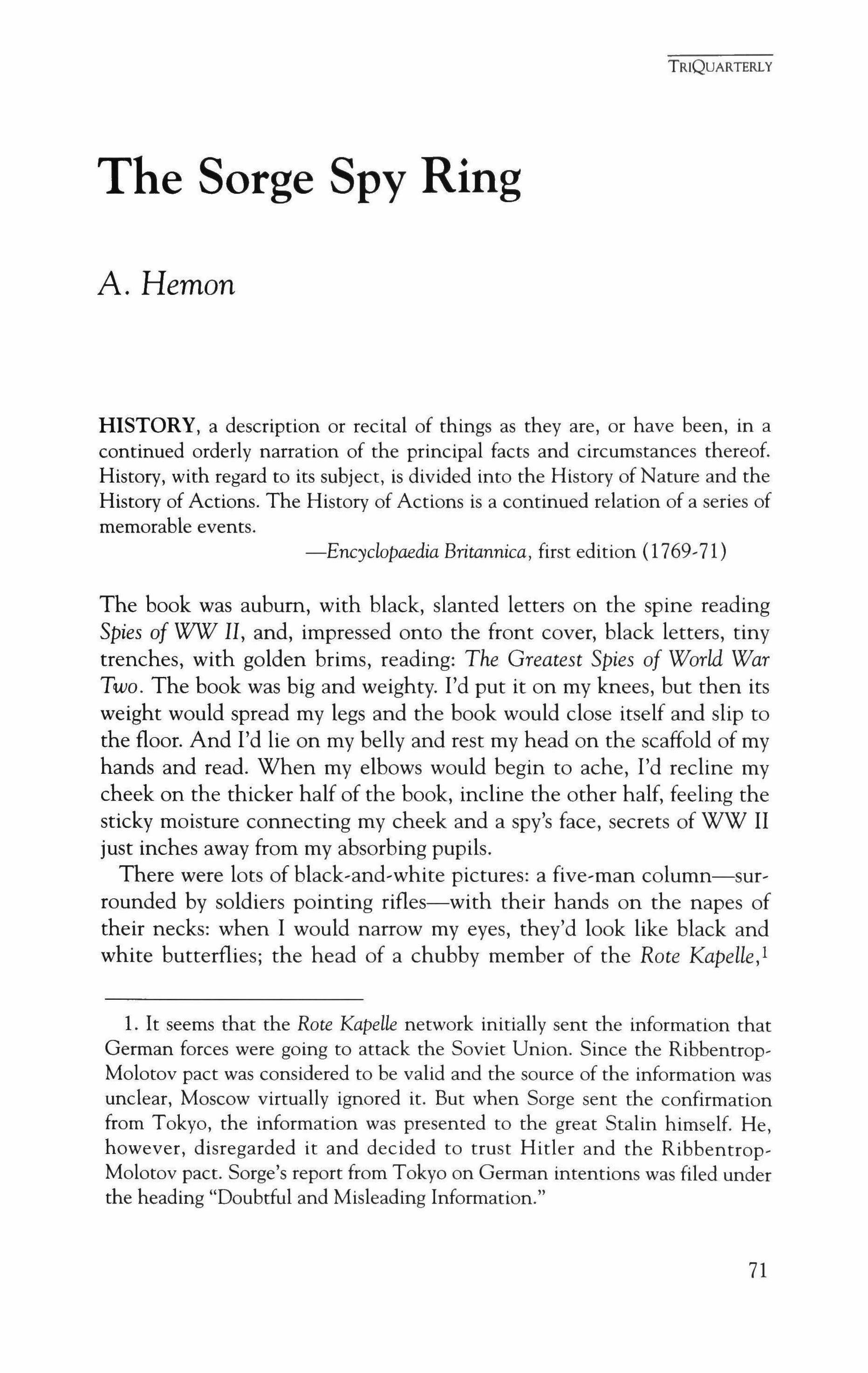
HISTORY, a description or recital of things as they are, or have been, in a continued orderly narration of the principal facts and circumstances thereof. History, with regard to its subject, is divided into the History of Nature and the History of Actions. The History of Actions is a continued relation of a series of memorable events.
-Encyclopaedia Britannica, first edition (1769-71)
The book was auburn, with black, slanted letters on the spine reading Spies of ww II, and, impressed onto the front cover, black letters, tiny trenches, with golden brims, reading: The Greatest Spies of World War Two. The book was big and weighty. I'd put it on my knees, but then its weight would spread my legs and the book would close itself and slip to the floor. And I'd lie on my belly and rest my head on the scaffold of my hands and read. When my elbows would begin to ache, I'd recline my cheek on the thicker half of the book, incline the other half, feeling the sticky moisture connecting my cheek and a spy's face, secrets of WW II just inches away from my absorbing pupils.
There were lots of black-and-white pictures: a five-man column-surrounded by soldiers pointing rifles-with their hands on the napes of their necks: when I would narrow my eyes, they'd look like black and white butterflies; the head of a chubby member of the Rote Kapelle,l
1. It seems that the Rote Kapelle network initially sent the information that German forces were going to attack the Soviet Union. Since the RibbentropMolotov pact was considered to be valid and the source of the information was unclear, Moscow virtually ignored it. But when Sorge sent the confirmation from Tokyo, the information was presented to the great Stalin himself. He, however, disregarded it and decided to trust Hitler and the RibbentropMolotov pact. Sorge's report from Tokyo on German intentions was filed under the heading "Doubtful and Misleading Information."
TRIQUARTERLY
71

with an asymmetrical face: nose slightly on the left side, right eye hardly opened and seemingly asleep, mouth kept shut with effort, as if there was a spring of blood behind the feeble lips-l just knew from his face that his hands {swollen wrists, bloody, burning trenches under the cuffs} were handcuffed; a picture of General Montgomery and a picture of General Montgomery's doppelganger, side by side: General Montgomery standing, arms akimbo, turned sideways, looking at the upper left comer of the page, with the timeless beret parallel with his gaze; General Montgomery's doppelganger, just the head, looking at me with odd pen, siveness, as if painfully aware that he could never be General Montgomery; a row of blindfolded people in white in front of the ready firing squad and a smiling officer, his right arm raised, pointing at the upper right comer of the picture. And, near the end, there was Sorge"at the outset of his mission in Japan"2-framed by a decor door behind his back, standing legs apart {left foot NW, right foot NE} in a dark trench coat, one hand pocketed, the other somewhat cramped, holding a purse or a camera case; and his head: fiendish ears, large and ill, shaped; lips shut tight, as if his teeth were biting the inside of his lower lip; the wide-base triangle of his nose, its top angle connected, by two deep furrows, with two dark dots in the comers of his mouth; lightless twin-holes, at the bottom of which were his obscure eyes; and the black,
2. Sorge flew from Berlin to Yokohama on Junker's first commercial flight from Germany to Japan, with brief stops in New York and Vancouver. Beside the log of Flight 1995, kept in the Museum of German Aviation in Frankfurt, there are no records of this historical endeavor. There is no list of passengers, but it is almost certain that the flight was almost full. It seems that the passengers were cosmopolitan, and the flight was tumultuous ("Winds over the Pacific were just horrid!"); that something was wrong with the heating system, so the passengers were freezing even with miraculously retrieved fur hats and leather gloves; that no one slept on the flight; that the food was edible, but for some reason there was no water so they all drank champagne (courtesy of Junker); that the plane almost went down in the middle of the night, somewhere over the Pacific; that first men, then women, disgorged themselves all over the air' craft and the vomit froze on the floor; that Sorge briefly befriended a certain Mary Kinzie, an American poetess, which did not go unnoticed by idle New York gossip-scribes. On September 9, 1933, in the early afternoon, Sorge and his shadowy co-passengers arrived at the Yokohama airport, reeking of vomit, emptied of champagne and lobster, with particles of undigested food thawing on the soles of their shoes. Some of them were proud of German air'industry and reliability; some of them were happy to be alive.
TR1QUARTERLY
72
inked helmet of hair.
The picture was obviously retouched: Sorge's anxiety was burdened with someone else's curtained body. One could see the sharp cut at the verge of his collar, where his head, guillotined in a shadowy laboratory, was attached to a headless trench coat-plus an inexplicable excess of neck-flesh on the left side) But I believed that Sorge was in that trench coat. I believed that he was about to enter the door-apparition behind his back. I believed in the totality of that picture, I believed in the apparent, and I trusted books. I was ten.
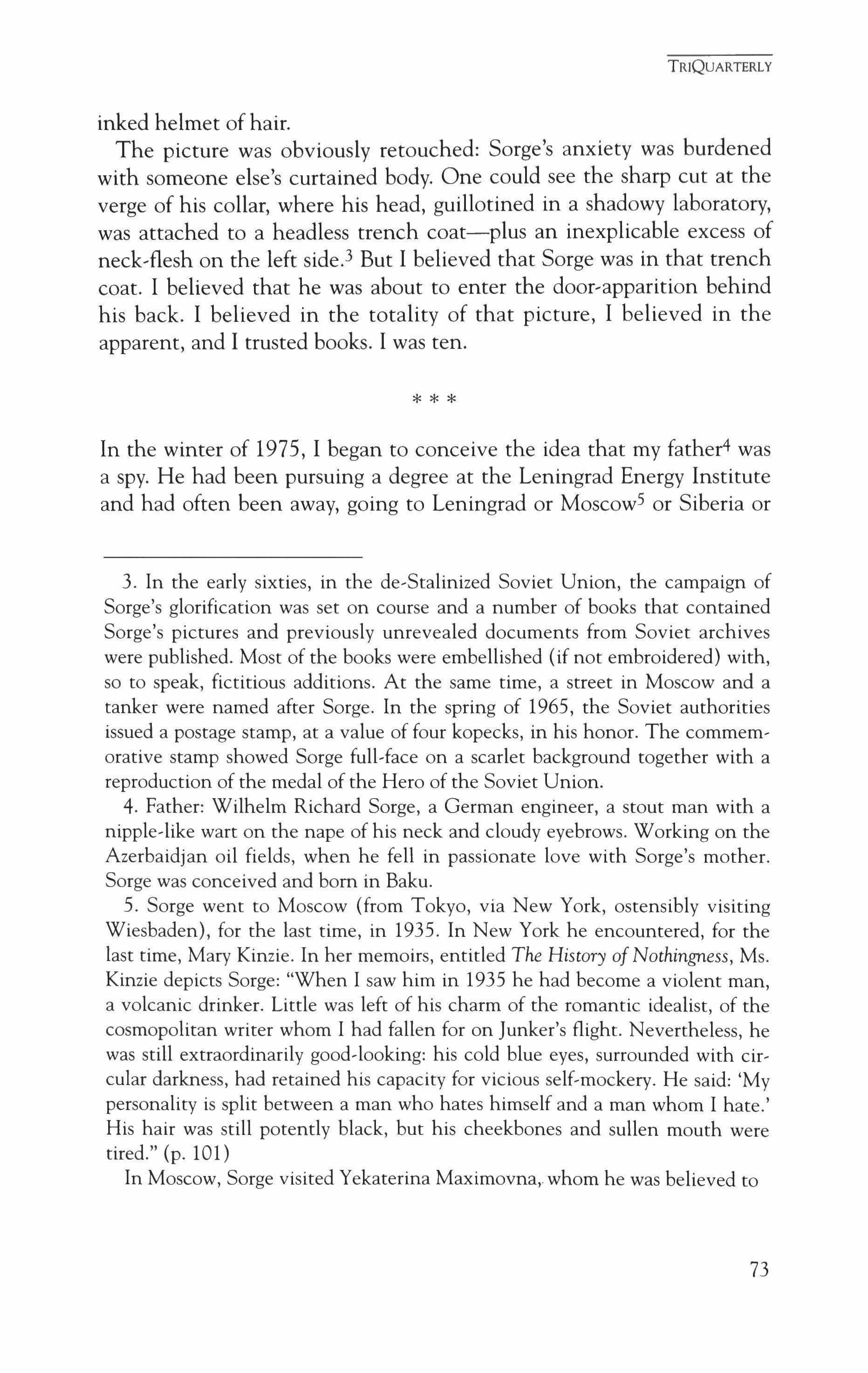
In the winter of 1975, I began to conceive the idea that my father+ was a spy. He had been pursuing a degree at the Leningrad Energy Institute and had often been away, going to Leningrad or Moscow- or Siberia or
3. In the early sixties, in the de-Stalinized Soviet Union, the campaign of Sorge's glorification was set on course and a number of books that contained Sorge's pictures and previously unrevealed documents from Soviet archives were published. Most of the books were embellished (if not embroidered) with, so to speak, fictitious additions. At the same time, a street in Moscow and a tanker were named after Sorge. In the spring of 1965, the Soviet authorities issued a postage stamp, at a value of four kopecks, in his honor. The commemorative stamp showed Sorge full-face on a scarlet background together with a reproduction of the medal of the Hero of the Soviet Union.
4. Father: Wilhelm Richard Sorge, a German engineer, a stout man with a nipple-like wart on the nape of his neck and cloudy eyebrows. Working on the Azerbaidjan oil fields, when he fell in passionate love with Sorge's mother. Sorge was conceived and born in Baku.
5. Sorge went to Moscow (from Tokyo, via New York, ostensibly visiting Wiesbaden), for the last time, in 1935. In New York he encountered, for the last time, Mary Kinzie. In her memoirs, entitled The History ofNothingness, Ms. Kinzie depicts Sorge: "When I saw him in 1935 he had become a violent man, a volcanic drinker. Little was left of his charm of the romantic idealist, of the cosmopolitan writer whom I had fallen for on Junker's flight. Nevertheless, he was still extraordinarily good-looking: his cold blue eyes, surrounded with circular darkness, had retained his capacity for vicious self-mockery. He said: 'My personality is split between a man who hates himself and a man whom I hate.' His hair was still potently black, but his cheekbones and sullen mouth were tired." (p. 101)
In Moscow, Sorge visited Yekaterina Maximovna,whom he was believed to
TRIQUARTERLY
* * *
73
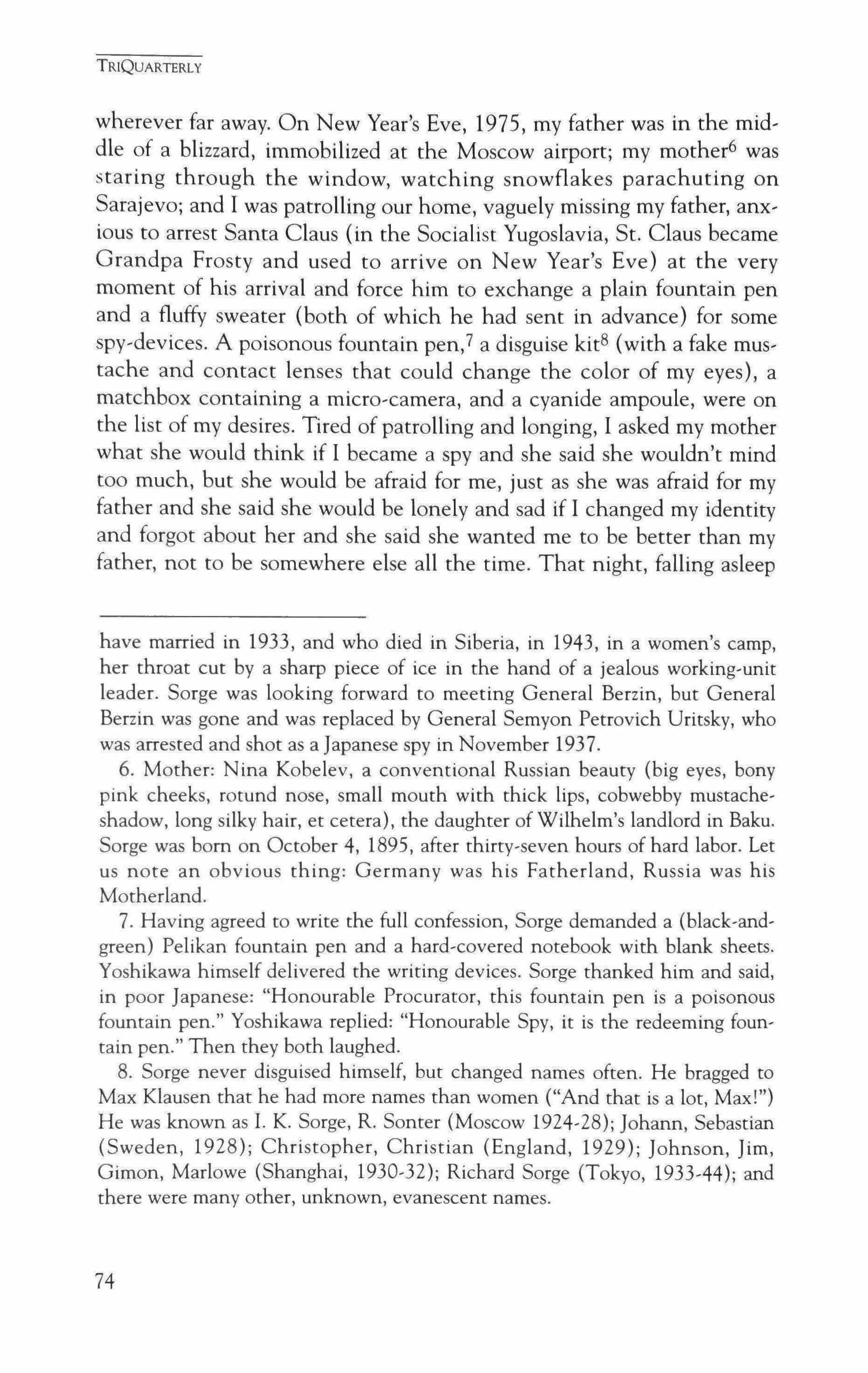
wherever far away. On New Year's Eve, 1975, my father was in the middle of a blizzard, immobilized at the Moscow airport; my mothers was staring through the window, watching snowflakes parachuting on Sarajevo; and I was patrolling our home, vaguely missing my father, anxious to arrest Santa Claus (in the Socialist Yugoslavia, St. Claus became Grandpa Frosty and used to arrive on New Year's Eve) at the very moment of his arrival and force him to exchange a plain fountain pen and a fluffy sweater (both of which he had sent in advance) for some spy-devices. A poisonous fountain pen.? a disguise kitS (with a fake mustache and contact lenses that could change the color of my eyes), a matchbox containing a micro-camera, and a cyanide ampoule, were on the list of my desires. Tired of patrolling and longing, I asked my mother what she would think if I became a spy and she said she wouldn't mind too much, but she would be afraid for me, just as she was afraid for my father and she said she would be lonely and sad if I changed my identity and forgot about her and she said she wanted me to be better than my father, not to be somewhere else all the time. That night, falling asleep
have married in 1933, and who died in Siberia, in 1943, in a women's camp, her throat cut by a sharp piece of ice in the hand of a jealous working-unit leader. Sorge was looking forward to meeting General Berzin, but General Berzin was gone and was replaced by General Semyon Petrovich Uritsky, who was arrested and shot as a Japanese spy in November 1937.
6. Mother: Nina Kobelev, a conventional Russian beauty (big eyes, bony pink cheeks, rotund nose, small mouth with thick lips, cobwebby mustacheshadow, long silky hair, et cetera), the daughter of Wilhelm's landlord in Baku. Sorge was born on October 4, 1895, after thirty-seven hours of hard labor. Let us note an obvious thing: Germany was his Fatherland, Russia was his Motherland.
7. Having agreed to write the full confession, Sorge demanded a (black-andgreen) Pelikan fountain pen and a hard-covered notebook with blank sheets. Yoshikawa himself delivered the writing devices. Sorge thanked him and said, in poor Japanese: "Honourable Procurator, this fountain pen is a poisonous fountain pen." Yoshikawa replied: "Honourable Spy, it is the redeeming fountain pen." Then they both laughed.
8. Sorge never disguised himself, but changed names often. He bragged to Max Klausen that he had more names than women ("And that is a lot, Max!") He was known as I. K. Sorge, R. Sonter (Moscow 1924-28); Johann, Sebastian (Sweden, 1928); Christopher, Christian (England, 1929); Johnson, Jim, Gimon, Marlowe (Shanghai, 1930-32); Richard Sorge (Tokyo, 1933-44); and there were many other, unknown, evanescent names.
TRIQUARTERLY
74
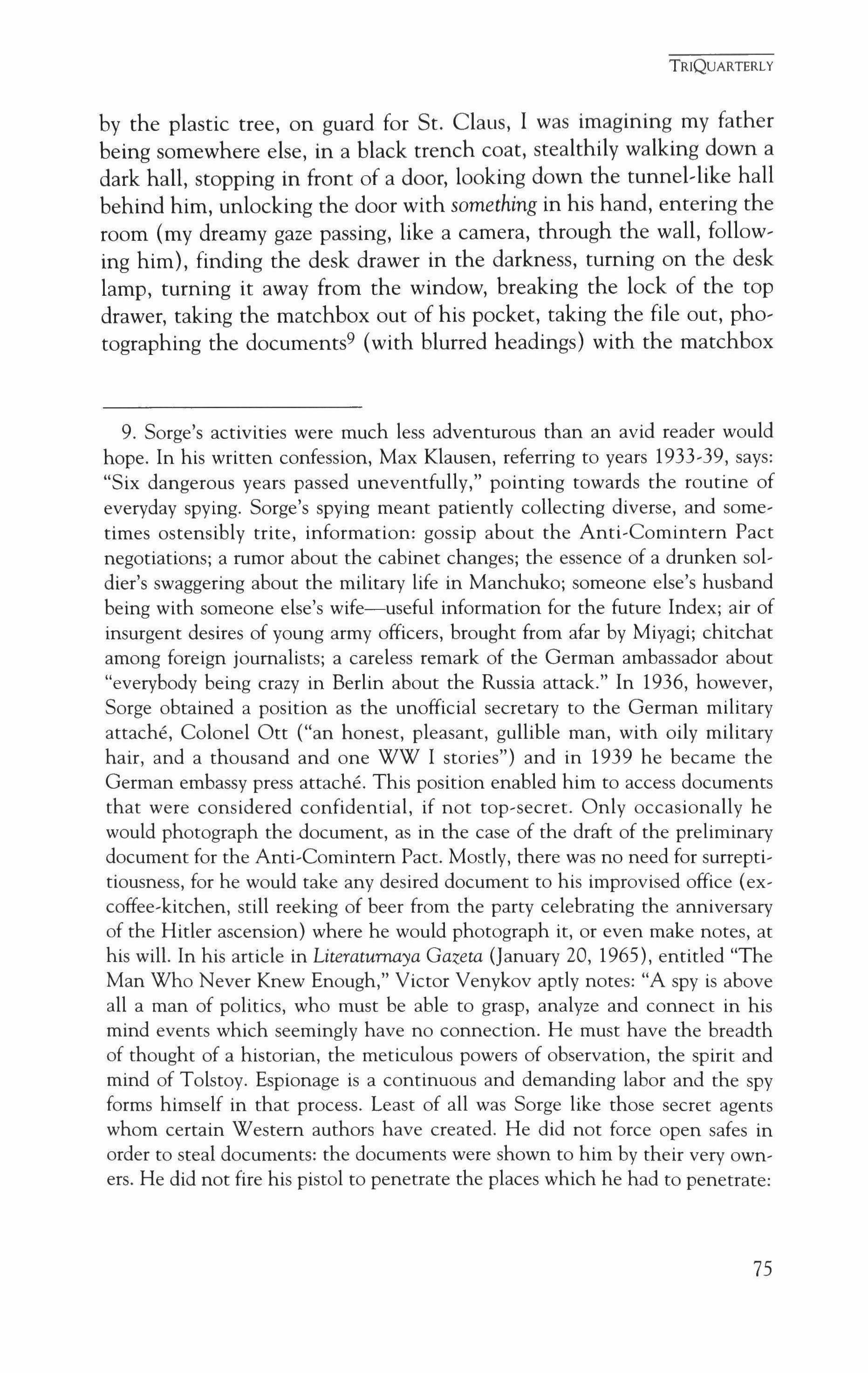
by the plastic tree, on guard for St. Claus, I was imagining my father being somewhere else, in a black trench coat, stealthily walking down a dark hall, stopping in front of a door, looking down the tunnel-like hall behind him, unlocking the door with something in his hand, entering the room {my dreamy gaze passing, like a camera, through the wall, following him}, finding the desk drawer in the darkness, turning on the desk lamp, turning it away from the window, breaking the lock of the top drawer, taking the matchbox out of his pocket, taking the file out, photographing the documents? {with blurred headings} with the matchbox
9. Sorge's activities were much less adventurous than an avid reader would hope. In his written confession, Max Klausen, referring to years 1933-39, says: "Six dangerous years passed uneventfully," pointing towards the routine of everyday spying. Sorge's spying meant patiently collecting diverse, and sometimes ostensibly trite, information: gossip about the Anti-Comintern Pact negotiations; a rumor about the cabinet changes; the essence of a drunken soldier's swaggering about the military life in Manchuko; someone else's husband being with someone else's wife-useful information for the future Index; air of insurgent desires of young army officers, brought from afar by Miyagi; chitchat among foreign journalists; a careless remark of the German ambassador about "everybody being crazy in Berlin about the Russia attack." In 1936, however, Sorge obtained a position as the unofficial secretary to the German military attache, Colonel Ott ("an honest, pleasant, gullible man, with oily military hair, and a thousand and one WW I stories") and in 1939 he became the German embassy press attache. This position enabled him to access documents that were considered confidential, if not top-secret. Only occasionally he would photograph the document, as in the case of the draft of the preliminary document for the Anti-Comintern Pact. Mostly, there was no need for surreptitiousness, for he would take any desired document to his improvised office (excoffee-kitchen, still reeking of beer from the party celebrating the anniversary of the Hitler ascension) where he would photograph it, or even make notes, at his will. In his article in Literaturnaya Gazeta (January 20, 1965), entitled "The Man Who Never Knew Enough," Victor Venykov aptly notes: "A spy is above all a man of politics, who must be able to grasp, analyze and connect in his mind events which seemingly have no connection. He must have the breadth of thought of a historian, the meticulous powers of observation, the spirit and mind of Tolstoy. Espionage is a continuous and demanding labor and the spy forms himself in that process. Least of all was Sorge like those secret agents whom certain Western authors have created. He did not force open safes in order to steal documents: the documents were shown to him by their very owners. He did not fire his pistol to penetrate the places which he had to penetrate:
TRIQUARTERLY
75
(whose snapping I attempted to reproduce: "sllt sllt.") But wait, I hear footsteps, heavy thumping, I tum off the light, the footsteps stop before the door, I hide behind the curtain, the footsteps open the door, cut the darkness with the flashlight, like a sword, I'm afraid that he (she?) could smell my fear, my heart is as loud as a tank engine, the door is closed and everything is fine, but I do not dare to feel relieved. I uncurtain myself and continue photographing and then I hear a woman sobbing and there is another door and I open the door and a torrent of light rushes in, and a Japanese wornant? says, with a sorrowful smile: "You must go to bed now. Go undress yourself."
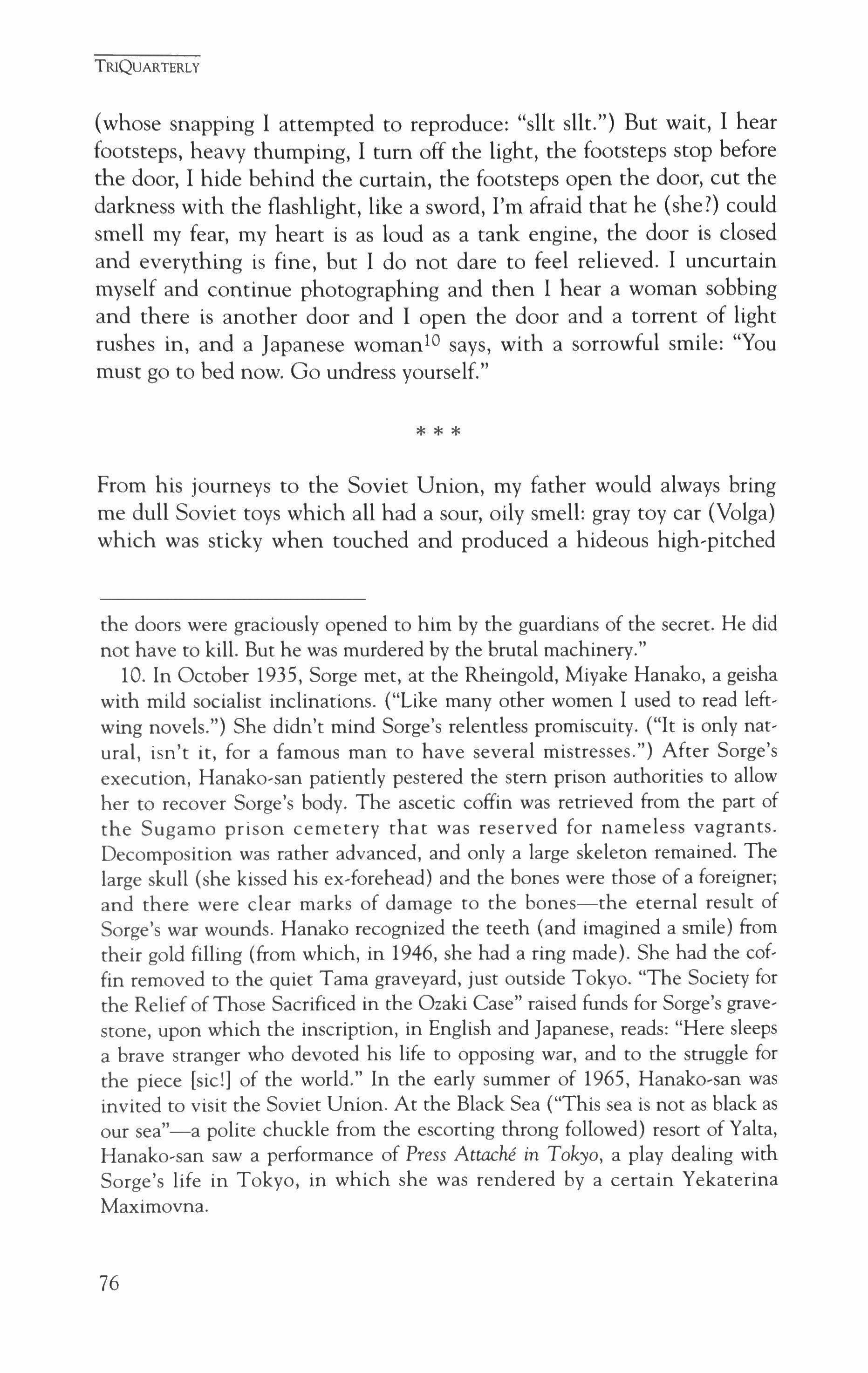
From his journeys to the Soviet Union, my father would always bring me dull Soviet toys which all had a sour, oily smell: gray toy car (Volga) which was sticky when touched and produced a hideous high-pitched
the doors were graciously opened to him by the guardians of the secret. He did not have to kill. But he was murdered by the brutal machinery."
10. In October 1935, Sorge met, at the Rheingold, Miyake Hanako, a geisha with mild socialist inclinations. ("Like many other women I used to read leftwing novels.") She didn't mind Sorge's relentless promiscuity. ("It is only natural, isn't it, for a famous man to have several mistresses.") After Sorge's execution, Hanako-san patiently pestered the stern prison authorities to allow her to recover Sorge's body. The ascetic coffin was retrieved from the part of the Sugamo prison cemetery that was reserved for nameless vagrants. Decomposition was rather advanced, and only a large skeleton remained. The large skull (she kissed his ex-forehead) and the bones were those of a foreigner; and there were clear marks of damage to the bones-the eternal result of Sorge's war wounds. Hanako recognized the teeth (and imagined a smile) from their gold filling (from which, in 1946, she had a ring made). She had the coffin removed to the quiet Tama graveyard, just outside Tokyo. "The Society for the Relief of Those Sacrificed in the Ozaki Case" raised funds for Sorge's gravestone, upon which the inscription, in English and Japanese, reads: "Here sleeps a brave stranger who devoted his life to opposing war, and to the struggle for the piece [sic!] of the world." In the early summer of 1965, Hanako-san was invited to visit the Soviet Union. At the Black Sea ("This sea is not as black as our sea"-a polite chuckle from the escorting throng followed) resort of Yalta, Hanako-san saw a performance of Press Attache in Tokyo, a play dealing with Sorge's life in Tokyo, in which she was rendered by a certain Yekaterina Maximovna.
TRIQUARTERLY
*
* *
76
whining sound when {seldom} driven; dun plastic train station, meant for my long-abandoned train; military olive-green gun that ejected little {vomit-orange} plastic balls, instantly banned and then consequently disposed of by my mother; a plethora of books about the victorious Red ArmyI! which I couldn't read since they were in Russian, but I liked the pictures {plain peasant faces, scared stiff of the Army photographer's camera} of the heroes who neutralized a German machine gun by throwing themselves at the barrel or who jumped, with clusters of hand grenades attached to their chests, into trenches full of terrified Germans. But at the beginning of 1975, after three cold nights at the Moscow airport, he brought me something beyond words: a portable telegraphic system. It was in a gray {naturally} box with a thin booklet
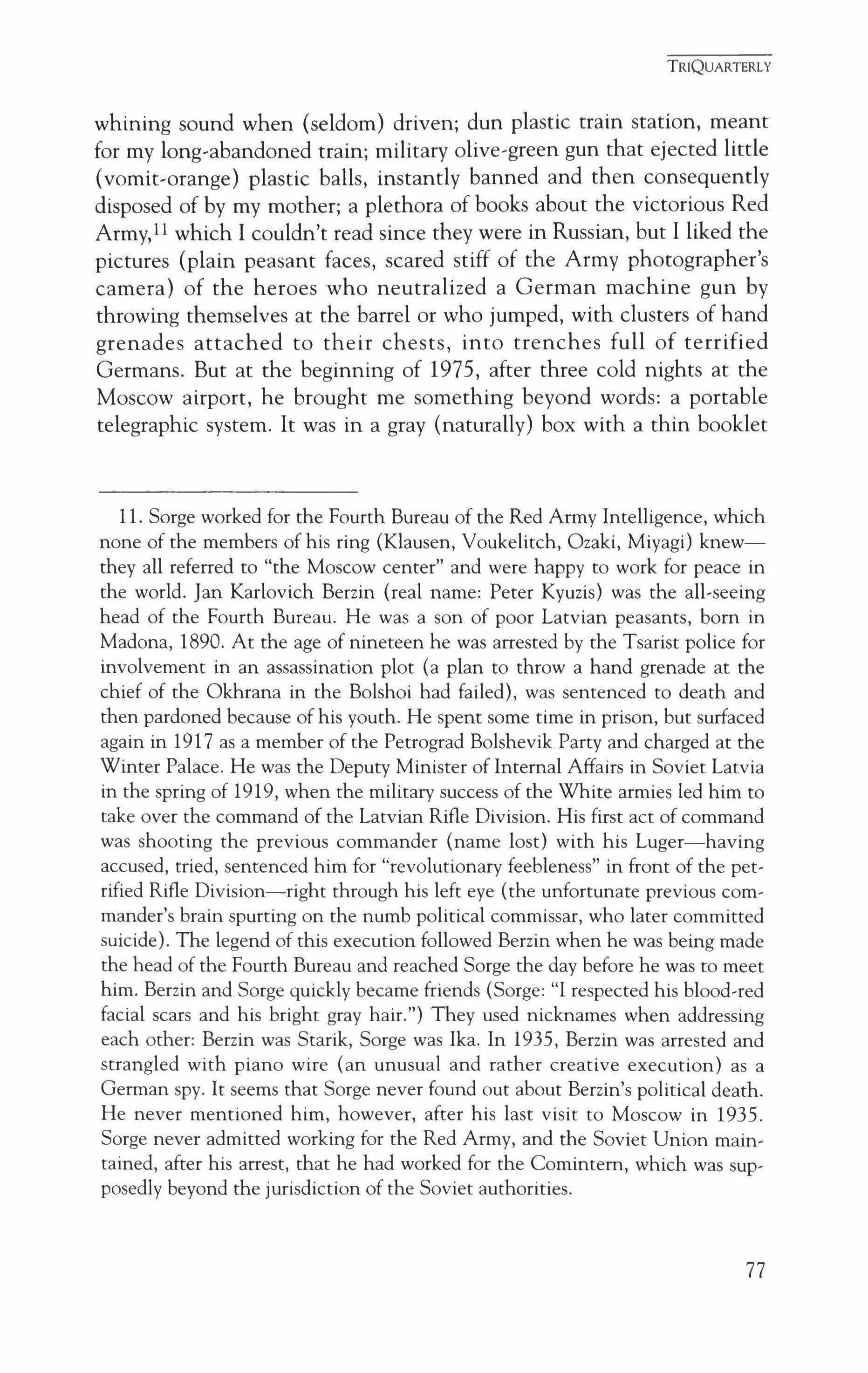
11. Sorge worked for the Fourth Bureau of the Red Army Intelligence, which none of the members of his ring (Klausen, Voukelitch, Ozaki, Miyagi) knewthey all referred to "the Moscow center" and were happy to work for peace in the world. Jan Karlovich Berzin (real name: Peter Kyuzis) was the all-seeing head of the Fourth Bureau. He was a son of poor Latvian peasants, born in Madona, 1890. At the age of nineteen he was arrested by the Tsarist police for involvement in an assassination plot (a plan to throw a hand grenade at the chief of the Okhrana in the Bolshoi had failed), was sentenced to death and then pardoned because of his youth. He spent some time in prison, but surfaced again in 1917 as a member of the Petrograd Bolshevik Party and charged at the Winter Palace. He was the Deputy Minister of Internal Affairs in Soviet Latvia in the spring of 1919, when the military success of the White armies led him to take over the command of the Latvian Rifle Division. His first act of command was shooting the previous commander (name lost) with his Luger-having accused, tried, sentenced him for "revolutionary feebleness" in front of the petrified Rifle Division-right through his left eye (the unfortunate previous commander's brain spurting on the numb political commissar, who later committed suicide). The legend of this execution followed Berzin when he was being made the head of the Fourth Bureau and reached Sorge the day before he was to meet him. Berzin and Sorge quickly became friends (Sorge: "I respected his blood-red facial scars and his bright gray hair.") They used nicknames when addressing each other: Berzin was Stank, Sorge was Ika. In 1935, Berzin was arrested and strangled with piano wire (an unusual and rather creative execution) as a German spy. It seems that Sorge never found out about Berzin's political death. He never mentioned him, however, after his last visit to Moscow in 1935. Sorge never admitted working for the Red Army, and the Soviet Union maintained, after his arrest, that he had worked for the Comintern, which was supposedly beyond the jurisdiction of the Soviet authorities.
TRIQUARTERLY
77
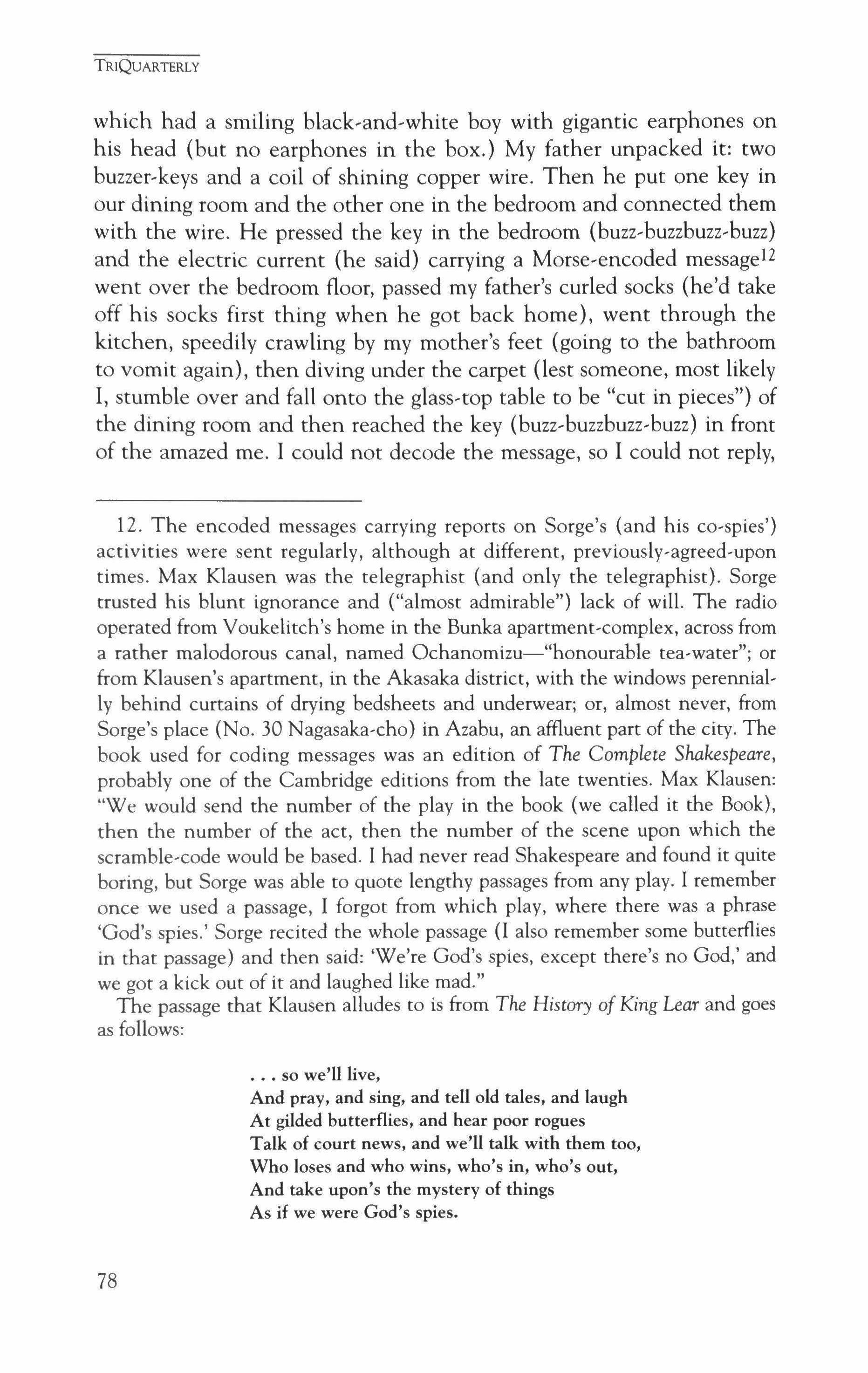
which had a smiling black-and-white boy with gigantic earphones on his head (but no earphones in the box.) My father unpacked it: two buzzer'keys and a coil of shining copper wire. Then he put one key in our dining room and the other one in the bedroom and connected them with the wire. He pressed the key in the bedroom (buzz-buzzbuzz-buzz) and the electric current (he said) carrying a Morse-encoded messagelwent over the bedroom floor, passed my father's curled socks (he'd take off his socks first thing when he got back home), went through the kitchen, speedily crawling by my mother's feet (going to the bathroom to vomit again), then diving under the carpet (lest someone, most likely I, stumble over and fall onto the glass-top table to be "cut in pieces") of the dining room and then reached the key (buzz-buzzbuzz-buzz) in front of the amazed me. I could not decode the message, so I could not reply,
12. The encoded messages carrying reports on Sorge's (and his co-spies') activities were sent regularly, although at different, previously-agreed-upon times. Max Klausen was the telegraphist (and only the telegraphist). Sorge trusted his blunt ignorance and ("almost admirable") lack of will. The radio operated from Voukelitch's home in the Bunka apartment-complex, across from a rather malodorous canal, named Ochanomizu-"honourable tea'water"; or from Klausen's apartment, in the Akasaka district, with the windows perennial, ly behind curtains of drying bedsheets and underwear; or, almost never, from Sorge's place (No. 30 Nagasaka-cho) in Azabu, an affluent part of the city. The book used for coding messages was an edition of The Complete Shakespeare, probably one of the Cambridge editions from the late twenties. Max Klausen: "We would send the number of the play in the book (we called it the Book), then the number of the act, then the number of the scene upon which the scramble-code would be based. I had never read Shakespeare and found it quite boring, but Sorge was able to quote lengthy passages from any play. I remember once we used a passage, I forgot from which play, where there was a phrase 'God's spies.' Sorge recited the whole passage (I also remember some butterflies in that passage) and then said: 'We're God's spies, except there's no God,' and we got a kick out of it and laughed like mad."
The passage that Klausen alludes to is from The History ofKing Lear and goes as follows:
so we'll live,
And pray, and sing, and tell old tales, and laugh
At gilded butterflies, and hear poor rogues
Talk of court news, and we'll talk with them too,
Who loses and who wins, who's in, who's out,
And take upon's the mystery of things
As if we were God's spies.
TRIQUARTERLY
78
which made me eager to learn Morse code. My father knew Morse code very well (which fueled my suspicions) so he decided to train me. He'd tap messages at the dinner table (my mother digging a crater in the mashed potatoes, and rolling her eyes) and I'd try to decode them, forgetting to chew and swallow, the mashed potatoes becoming liquid in my mouth. He'd tap "hurry up" at the bathroom door, where I was getting carried away over a book. I was getting better, I even sent him a couple of simple messages ("want dog"), but my father sustained his teaching patience only for a week or two, then he was busy, then he was off to the Soviet Union again. I continued to practice Morse code for a while and was getting somewhat better, but than I abandoned practicing because it was boring to send messages into a void. Several times I played a whole spy game: I'd sneak into my parents' bedroom (my mother innocuously watching The Sound ofMusic), photograph the stuff in the top drawer, the unlocked one, of my father's desk (mainly bills) with a matchbox (a real matchbox), then I would crawl out of the bedroom, behind the back of my unsuspecting dozing Mother, and go to my secret shelter under the glass-top table, and send haplessly coded messages back to the bedroom, imagining that they meant something, picturing someone on the other end of the copper wire. It was all over when I shattered the glass-top table, almost beheading myself, while practicing seeing (seeing clearly, I should say) in the dark-a skill necessary, I believed, for any spy, let alone a great one. My mother terminated the telegraph line and I was left to send messages by telepathy (a brief and only partly successful attempt). In April, my father came back from the Soviet Union and he brought me a too-light, atrociously deformed, pigskin soccer ball.
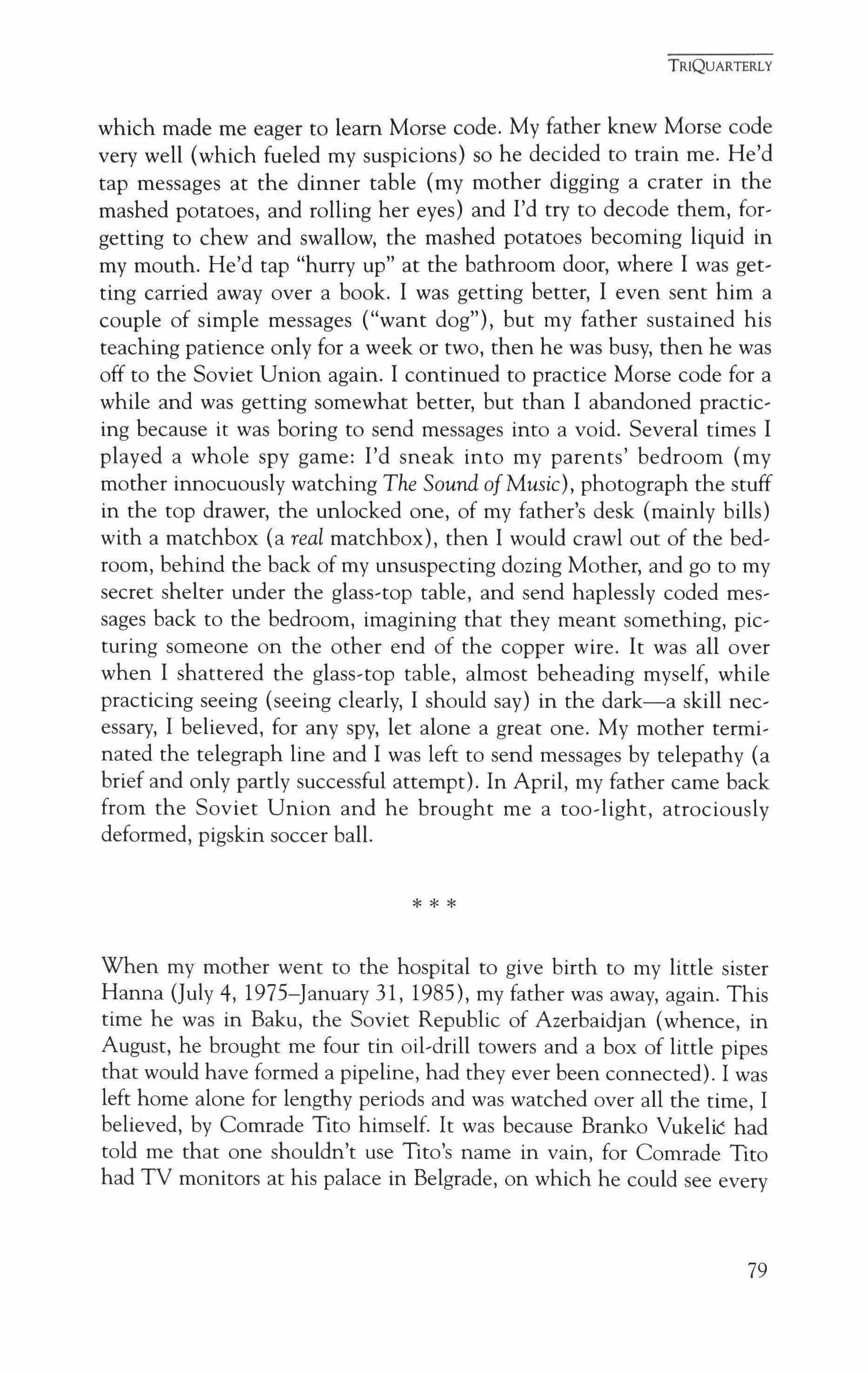
When my mother went to the hospital to give birth to my little sister Hanna (July 4, 1975-January 31, 1985), my father was away, again. This time he was in Baku, the Soviet Republic of Azerbaidjan (whence, in August, he brought me four tin oil-drill towers and a box of little pipes that would have formed a pipeline, had they ever been connected). I was left home alone for lengthy periods and was watched over all the time, I believed, by Comrade Tito himself. It was because Branko Vukelic had told me that one shouldn't use Tito's name in vain, for Comrade Tito had TV monitors at his palace in Belgrade, on which he could see every
TRIQUARTERLY
* * *
79
single resident of Yugoslavia, at any given moment of their lives.U "Now," Branko Vukelic said, "if you use Tito's name to swear and then you lie, or if you use Tiro's name to curse, he can see you. And if he sees you, he may decide to die and punish us all." I was very careful thereafter not to swear, lest I be guilty of Comrade Tiro's (or someone else's, for that matter) death. It was soothing to know, however, that I was being monitored, when I was all by myself, that if someone came to abduct me (the police or the devil himself) it would have been seen and I would have been, doubtless, retrieved from the sneaky villains. It also meant that I had to wash my hands after using the bathroom, couldn't pick my nose and stick the snot to the underside of the chair, nor could I belch like a hog. I tried to locate the cameras that must have been transmitting images from our home to Tiro's residence. I thought that the cameras were superbly hidden, for I couldn't find any. While Mother

13. At the outset of Sorge's mission to Japan, Berzin told him: "The only thing you should trust and rely upon is the omnipresence of surveillance. There'll be eyes everywhere, and nowhere." Sorge was all too aware of being watched: even on the Junker flight, he felt a gaze adhered to his body (although that may have been Mary Kinzie). Once in Japan, the following things made Sorge aware of the surveillance:
a) he was being watched by Aritomi Mitsukado, a reporter for Jiji Shimpo, who would somehow always find him in any bar or at any party and then ask a transparent question like: "Do you think this tyranny will last forever!" (Sorge: "What tyranny?");
b) his maid and laundryman were frequently questioned and tortured by the police;
c) a woman he slept with (name lost) got up in the middle of the night and went through his pockets, finding nothing;
d) in bars and restaurants, even at the Imperial Hotel, he was constantly monitored by plainclothesmen of the Thought Police (sticking out of the careless crowd by being too focused on him);
e) his house was searched and his suitcases examined, during his absences;
f) most of all, it was a sense that he developed, a sense that someone's gaze was always at the nape of his neck, like a wart.
Sorge: "When you know that you're being watched, you assume a role and play it, even when you sleep--even when you dream. Most of my life I played Richard Sorge, and I was someone else, somewhere else. The ubiquitous surveillance makes everything look different-you see things through someone else's eyes. Everything is more present-more real-because you see nothing alone."
TRIQUARTERLY
80
Mer recovery, Sorge went back to the Galician Front, where he became one of the best sharpshooters in his division, specializing in eliminating enemy snipers.

There were claims that a "Dr. Sorge," said by the police to have been in Frankfurt in 1925 and 1926, was not the mysterious Tokyo spy, ''but someone else, of whom we know nothing."
I •• }"" ,J .,111_ it' _-I t�< ["t,' '1�(t-ll"V ,.t.,"'...... ,J", '��"41' ,,-./h", Ilfr \-\ oM \. # '" t. :ft." f i '-.jo /: (:".1It ("•••I.�.w r �_ 'It•••. .,"2' ", It I .7 d !3 •••tr It' t ;".. I '.
In the summer of 1965, Hanako-san was invited to visit the Soviet Union. At the Black Sea resort of Yalta, she went to see a performance of Press Attache in Tokyo, a play dealing with Sorge's life in Japan.
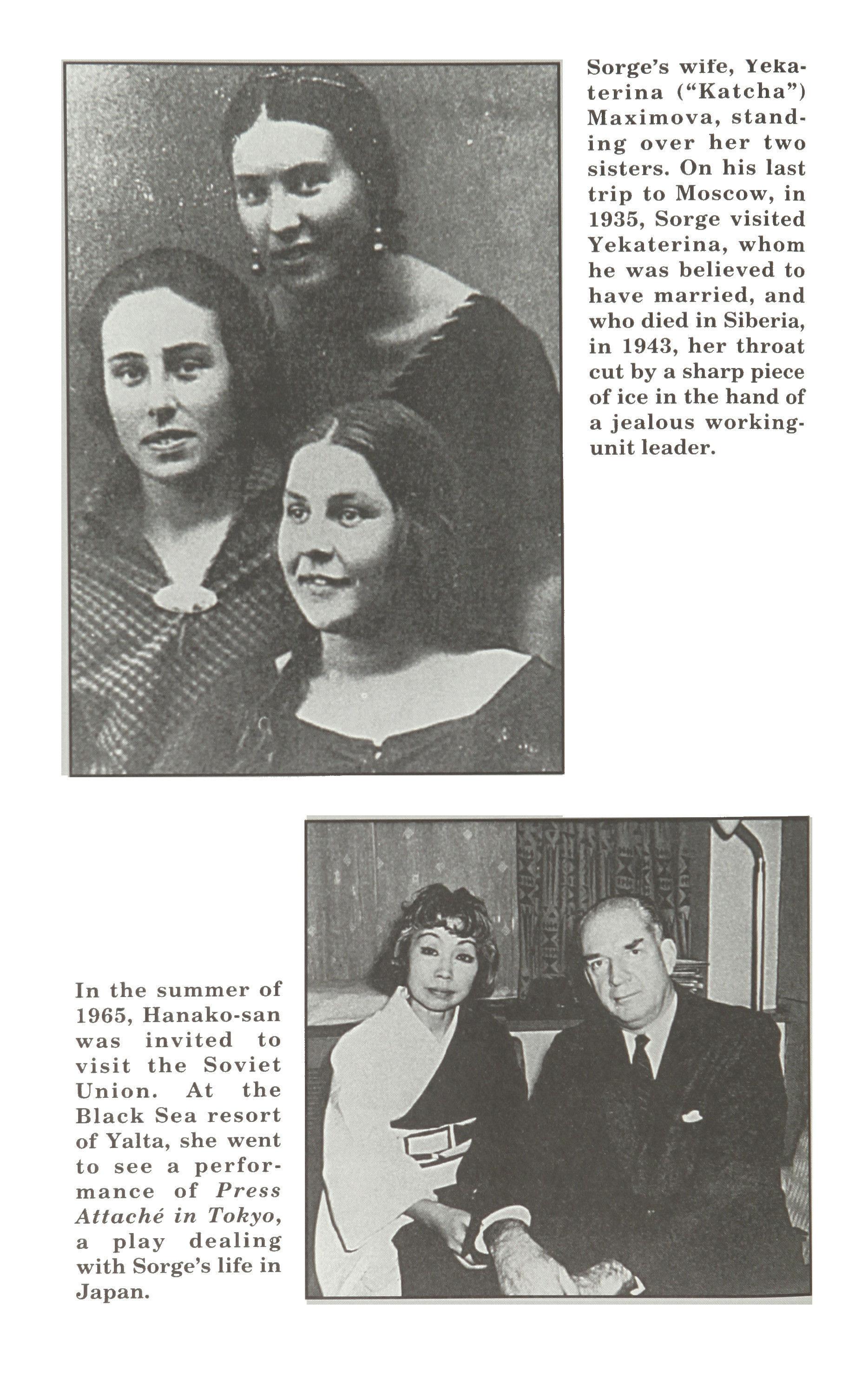
Sorge's wife, Yekaterina ("Katcha") Maximova, s t a n ding over her two sisters. On his last trip to Moscow, in 1935, Sorge visited Yekaterina, whom he was believed to have married, and who died in Siberia, in 1943, her throat cut by a sharp piece of ice in the hand of a jealous working. unit leader.
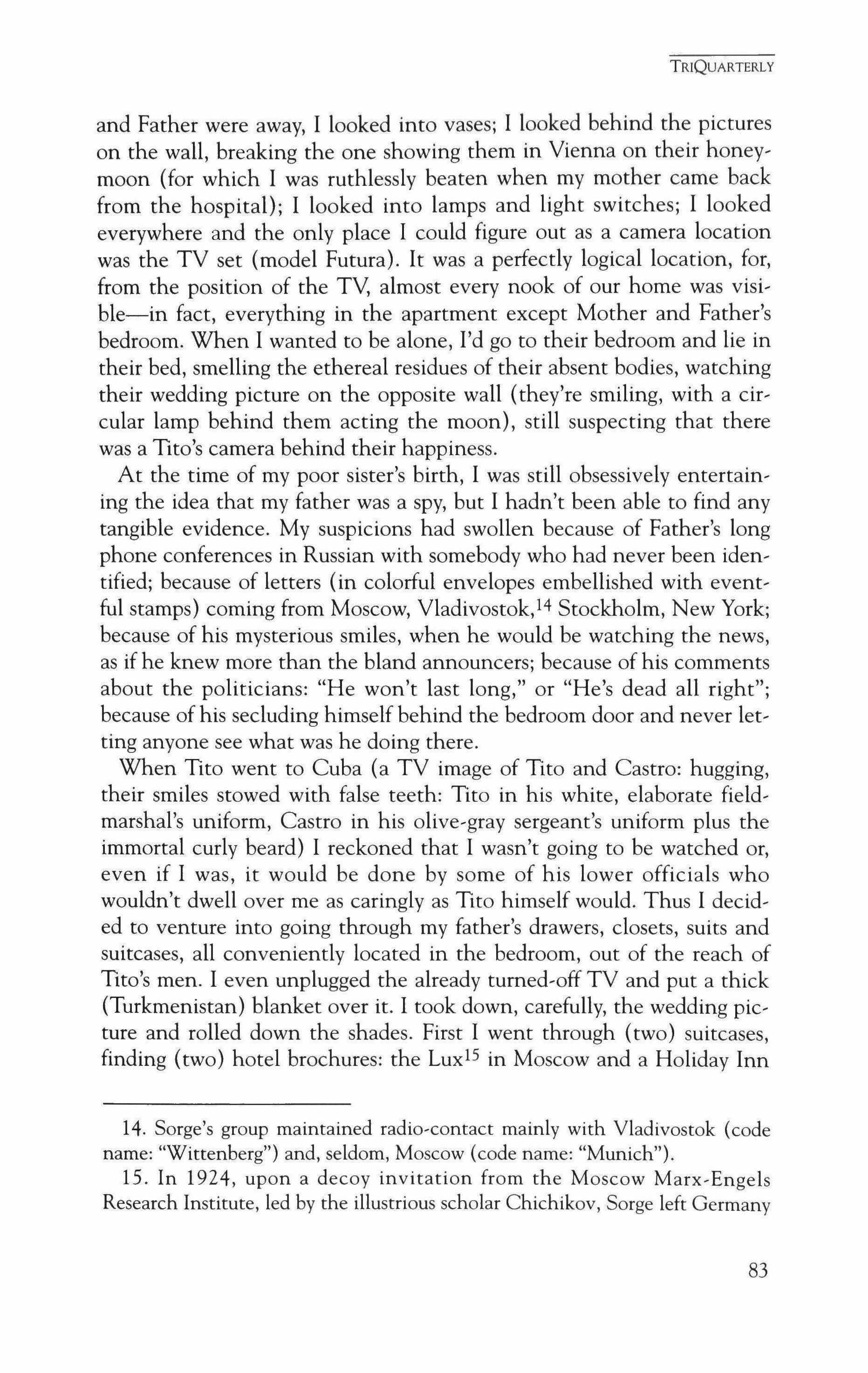
and Father were away, I looked into vases: I looked behind the pictures on the wall, breaking the one showing them in Vienna on their honeymoon (for which I was ruthlessly beaten when my mother came back from the hospital): I looked into lamps and light switches: I looked everywhere and the only place I could figure out as a camera location was the TV set (model Futura). It was a perfectly logical location, for, from the position of the TV, almost every nook of our home was visible-in fact, everything in the apartment except Mother and Father's bedroom. When I wanted to be alone, I'd go to their bedroom and lie in their bed, smelling the ethereal residues of their absent bodies, watching their wedding picture on the opposite wall (they're smiling, with a circular lamp behind them acting the moon), still suspecting that there was a Tito's camera behind their happiness.
At the time of my poor sister's birth, I was still obsessively entertaining the idea that my father was a spy, but I hadn't been able to find any tangible evidence. My suspicions had swollen because of Father's long phone conferences in Russian with somebody who had never been identified; because of letters (in colorful envelopes embellished with eventful stamps) coming from Moscow, Vladivostok.l+ Stockholm, New York: because of his mysterious smiles, when he would be watching the news, as if he knew more than the bland announcers; because of his comments about the politicians: "He won't last long," or "He's dead all right": because of his secluding himself behind the bedroom door and never letting anyone see what was he doing there.
When Tito went to Cuba (a TV image of Tito and Castro: hugging, their smiles stowed with false teeth: Tito in his white, elaborate fieldmarshal's uniform, Castro in his olive-gray sergeant's uniform plus the immortal curly beard) I reckoned that I wasn't going to be watched or, even if I was, it would be done by some of his lower officials who wouldn't dwell over me as caringly as Tito himself would. Thus I decided to venture into going through my father's drawers, closets, suits and suitcases, all conveniently located in the bedroom, out of the reach of Tito's men. I even unplugged the already turned-off TV and put a thick (Turkmenistan) blanket over it. I took down, carefully, the wedding picture and rolled down the shades. First I went through (two) suitcases, finding (two) hotel brochures: the Lux15 in Moscow and a Holiday Inn
14. Sorge's group maintained radio-contact mainly with Vladivostok {code name: "Wittenberg"} and, seldom, Moscow {code name: "Munich"}.
15. In 1924, upon a decoy invitation from the Moscow Marx-Engels Research Institute, led by the illustrious scholar Chichikov, Sorge left Germany
TRIQUARTERLY
83
in Vienna, with pictures of reception desks, desolate rooms and swim, ming pools. The Lux hotel brochure had a smiling Russian beauty {silky braids, rosy cheeks, big eyes, et cetera} on the front page. The Holiday Inn brochure had a picture of a spacious hall, with an immense chandelier, dissolved into glittering crystal tears, hanging from the top of the picture. I went through the inside suitcase pockets, finding business cards (in various languages, in sundry alphabets); finding unintelligible notes
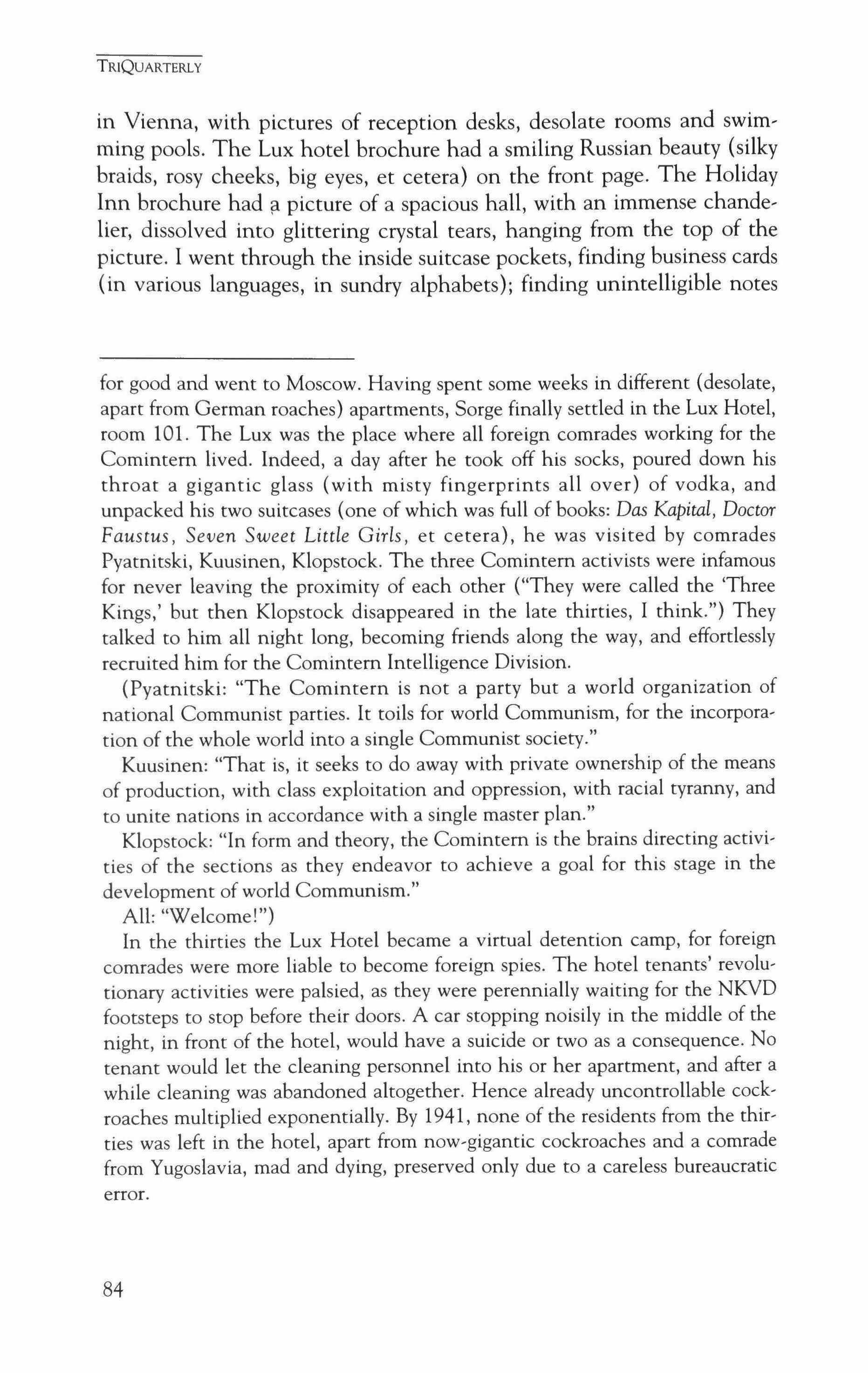
for good and went to Moscow. Having spent some weeks in different {desolate, apart from German roaches} apartments, Sorge finally settled in the Lux Hotel, room 101. The Lux was the place where all foreign comrades working for the Comintern lived. Indeed, a day after he took off his socks, poured down his throat a gigantic glass {with misty fingerprints all over} of vodka, and unpacked his two suitcases {one of which was full of books: Das Kapital, Doctor Faustus, Seven Sweet Little Girls, et cetera}, he was visited by comrades Pyatnitski, Kuusinen, Klopstock. The three Comintern activists were infamous for never leaving the proximity of each other ("They were called the 'Three Kings,' but then Klopstock disappeared in the late thirties, I think.") They talked to him all night long, becoming friends along the way, and effortlessly recruited him for the Comintern Intelligence Division.
(Pyatnitski: "The Comintern is not a party but a world organization of national Communist parties. It toils for world Communism, for the incorporation of the whole world into a single Communist society."
Kuusinen: "That is, it seeks to do away with private ownership of the means of production, with class exploitation and oppression, with racial tyranny, and to unite nations in accordance with a single master plan."
Klopstock: "In form and theory, the Comintem is the brains directing activities of the sections as they endeavor to achieve a goal for this stage in the development of world Communism."
All: "Welcome!")
In the thirties the Lux Hotel became a virtual detention camp, for foreign comrades were more liable to become foreign spies. The hotel tenants' revolutionary activities were palsied, as they were perennially waiting for the NKVD footsteps to stop before their doors. A car stopping noisily in the middle of the night, in front of the hotel, would have a suicide or two as a consequence. No tenant would let the cleaning personnel into his or her apartment, and after a while cleaning was abandoned altogether. Hence already uncontrollable cockroaches multiplied exponentially. By 1941, none of the residents from the thirties was left in the hotel, apart from now-gigantic cockroaches and a comrade from Yugoslavia, mad and dying, preserved only due to a careless bureaucratic error.
TRIQUARTERLY
84
on napkins and exhausted railway tickets; finding a lighter (a miniature camera? Nol ) and a pack of Soviet cigarettes (Sputnik, with an ostentatious picture of an ascending spaceship on the box); finding mysterious rubber objects (condoms, I was to find out, a couple of years later).

Now I want the reader to assume the role of the camera, to move the lens towards me and peek over my shoulder, following my gaze. I want the camera to focus on the objects that I am about to uncover. I want the thrill of discovery to be rendered with the exactness of the detail. I want this to be documented. Tum on the light. Roll.
The left closet. First, the underwear. You have to look under the neat' ly built pyramid of undershirts. Nothing. Under the panties. A book, with pictures: Figurae Veneris-A Love Manual.16 Men and women, naked, assuming acrobatic positions, hairy crotches. Never mind. Towels. Nothing. Bedspreads. A cloth-covered notebook, with Mother's name written on it, with a lock, no key. Hell. Leave it as if nothing hap,
16. Beside Gemum Imperialism (1927), a study of the political will that led to the slaughter of WW I, and The Accumulation of Capital and Rosa Luxembourg (1922), a study of the life and theories of the great German revolutionary, Sorge's most important work was Marxism and Love (1921), a work about human relationships in the context of merciless exploitation. In the Introduction, Sorge writes: "Thus love is not possible in a class society, for every human relationship is a relationship of property, exploitation and ideological subjugation. Love as a concept can be achieved only in a classless society, where a man is a man and a woman is a woman. Just as the decisive intensification of class struggle, exposing the cruelty of capitalism, leads towards the revolution, the intensification of purely sexual relations would expose the inhumanity of individual human relations. The consequent objectified vacuum of inhumanity would simply require a revolutionary action. Love, to sum up, is not what we need now-what we need now is sex!" Scholars claim that Marxism and Love is more a product of the unfulfilled desire for Christiane, the wife of Kurt Gerlach, his teacher at the Kiel University, than a product of studious research. Some, however, tried to show that Marxism and Love (and some articles, like "Anal Sex and Revolution" from 1923) influenced Wilhelm Reich. Sorge himself was not too proud of his early theoretical work: "I am convinced that my handling of these difficult theoretical questions was cumbersome and immature, and 1 hope that the Nazis burned every last copy."
TRIQUARTERLY
* * *
85
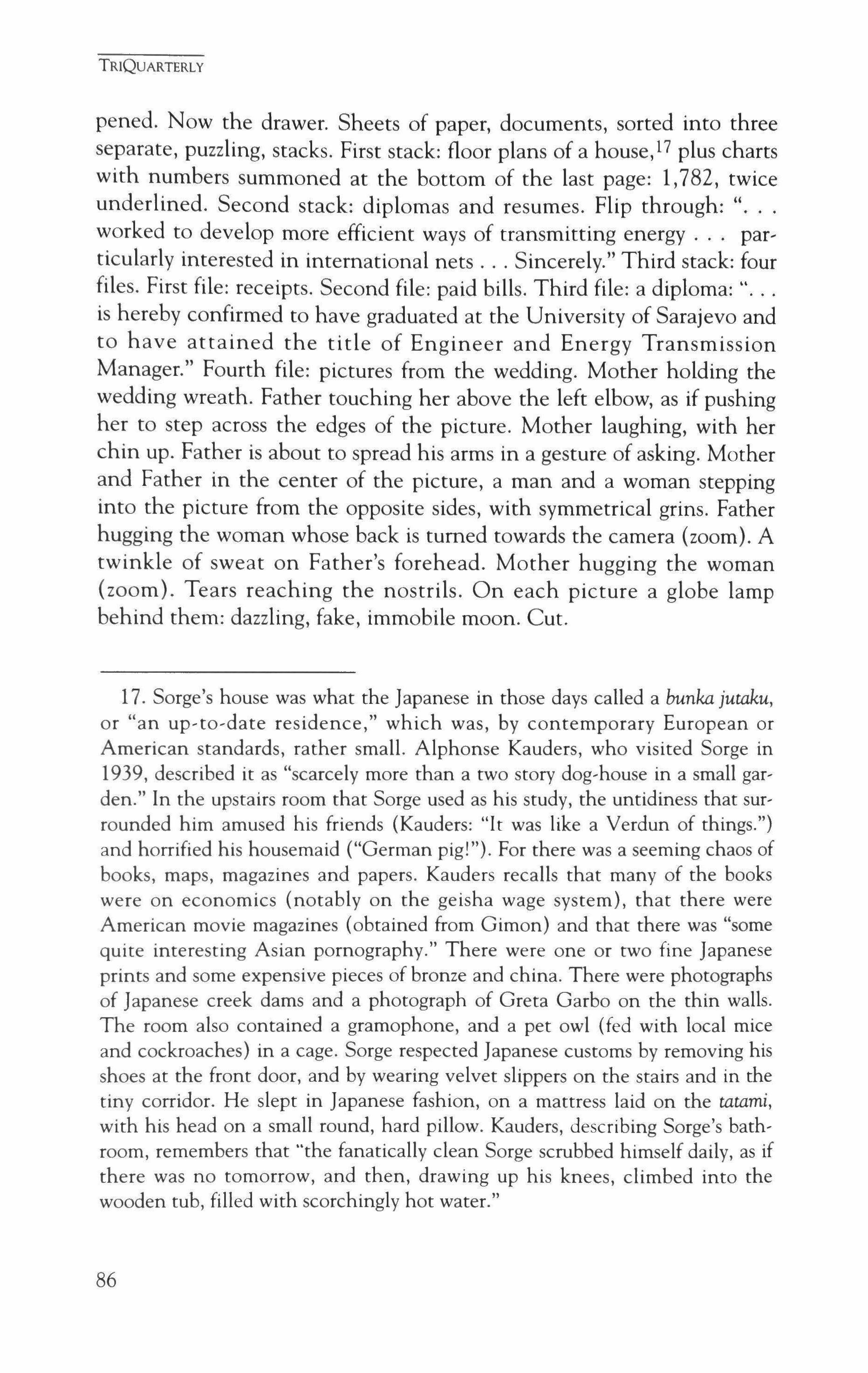
pened. Now the drawer. Sheets of paper, documents, sorted into three separate, puzzling, stacks. First stack: floor plans of a house.l? plus charts with numbers summoned at the bottom of the last page: 1,782, twice underlined. Second stack: diplomas and resumes. Flip through: " worked to develop more efficient ways of transmitting energy. particularly interested in international nets Sincerely." Third stack: four files. First file: receipts. Second file: paid bills. Third file: a diploma: is hereby confirmed to have graduated at the University of Sarajevo and to have attained the title of Engineer and Energy Transmission Manager." Fourth file: pictures from the wedding. Mother holding the wedding wreath. Father touching her above the left elbow, as if pushing her to step across the edges of the picture. Mother laughing, with her chin up. Father is about to spread his arms in a gesture of asking. Mother and Father in the center of the picture, a man and a woman stepping into the picture from the opposite sides, with symmetrical grins. Father hugging the woman whose back is turned towards the camera {zoom}. A twinkle of sweat on Father's forehead. Mother hugging the woman {zoom}. Tears reaching the nostrils. On each picture a globe lamp behind them: dazzling, fake, immobile moon. Cut.
17. Sorge's house was what the Japanese in those days called a bunka jutaku, or "an up-to-date residence," which was, by contemporary European or American standards, rather small. Alphonse Kauders, who visited Sorge in 1939, described it as "scarcely more than a two story dog-house in a small garden." In the upstairs room that Sorge used as his study, the untidiness that surrounded him amused his friends (Kauders: "It was like a Verdun of things.") and horrified his housemaid ("German pig!"). For there was a seeming chaos of books, maps, magazines and papers. Kauders recalls that many of the books were on economics (notably on the geisha wage system), that there were American movie magazines (obtained from Gimon) and that there was "some quite interesting Asian pornography." There were one or two fine Japanese prints and some expensive pieces of bronze and china. There were photographs of Japanese creek dams and a photograph of Greta Garbo on the thin walls. The room also contained a gramophone, and a pet owl (fed with local mice and cockroaches) in a cage. Sorge respected Japanese customs by removing his shoes at the front door, and by wearing velvet slippers on the stairs and in the tiny corridor. He slept in Japanese fashion, on a mattress laid on the tatami, with his head on a small round, hard pillow. Kauders, describing Sorge's bathroom, remembers that "the fanatically clean Sorge scrubbed himself daily, as if there was no tomorrow, and then, drawing up his knees, climbed into the wooden tub, filled with scorchingly hot water."
TRIQUARTERLY
86
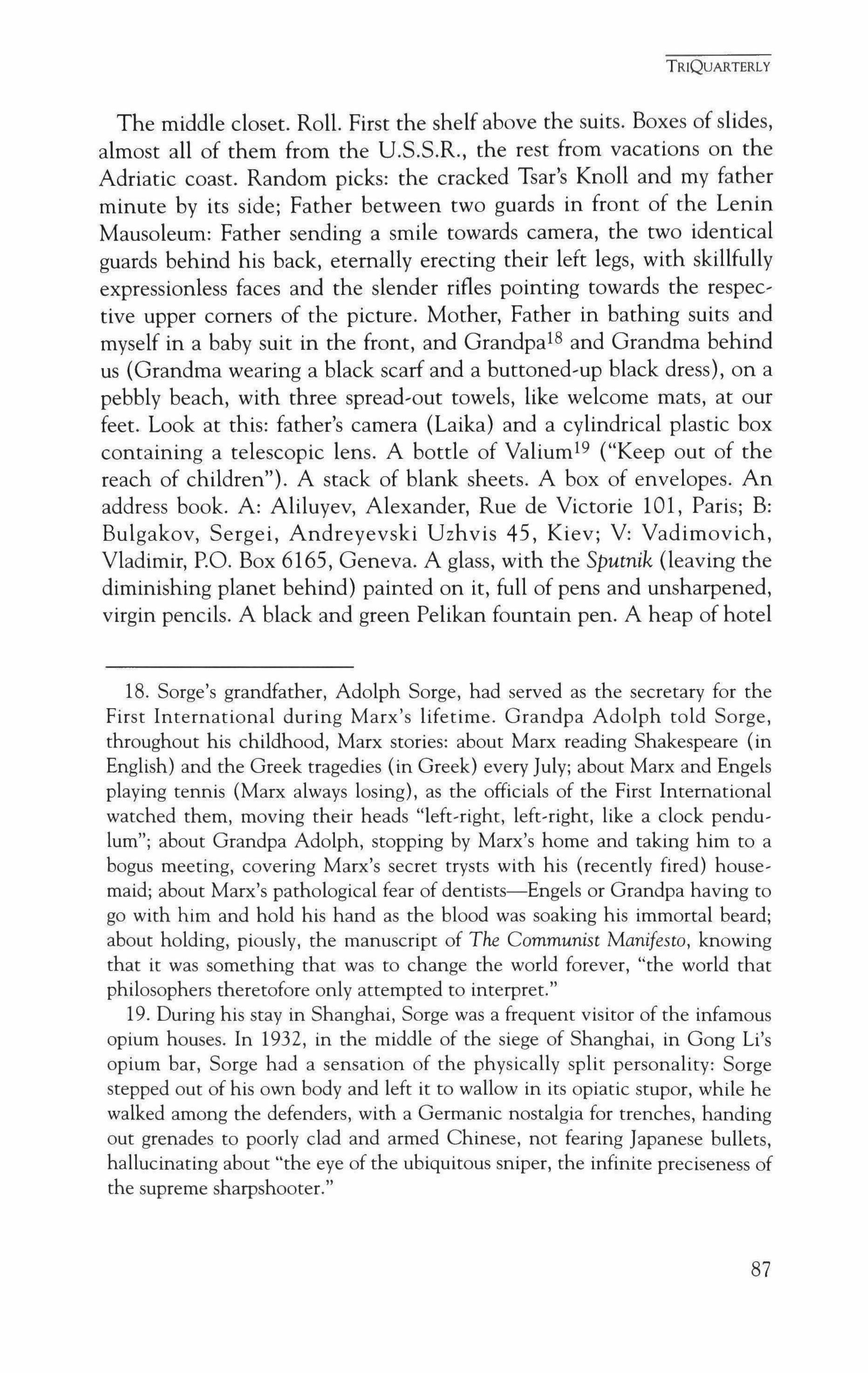
The middle closet. Roll. First the shelf above the suits. Boxes of slides, almost all of them from the U.S.s.R., the rest from vacations on the Adriatic coast. Random picks: the cracked Tsar's Knoll and my father minute by its side; Father between two guards in front of the Lenin Mausoleum: Father sending a smile towards camera, the two identical guards behind his back, eternally erecting their left legs, with skillfully expressionless faces and the slender rifles pointing towards the respective upper comers of the picture. Mother, Father in bathing suits and myself in a baby suit in the front, and Grandpalf and Grandma behind us (Grandma wearing a black scarf and a buttoned-up black dress), on a pebbly beach, with three spread-out towels, like welcome mats, at our feet. Look at this: father's camera (Laika) and a cylindrical plastic box containing a telescopic lens. A bottle of Valiuml? ("Keep out of the reach of children"). A stack of blank sheets. A box of envelopes. An address book. A: Aliluyev, Alexander, Rue de Victorie 101, Paris; B: Bulgakov, Sergei, Andreyevski Uzhvis 45, Kiev; V: Vadimovich, Vladimir, P.O. Box 6165, Geneva. A glass, with the Sputnik (leaving the diminishing planet behind) painted on it, full of pens and unsharpened, virgin pencils. A black and green Pelikan fountain pen. A heap of hotel
18. Sorge's grandfather, Adolph Sorge, had served as the secretary for the First International during Marx's lifetime. Grandpa Adolph told Sorge, throughout his childhood, Marx stories: about Marx reading Shakespeare (in English) and the Greek tragedies (in Greek) every July; about Marx and Engels playing tennis (Marx always losing), as the officials of the First International watched them, moving their heads "left-right, left-right, like a clock pendulum"; about Grandpa Adolph, stopping by Marx's home and taking him to a bogus meeting, covering Marx's secret trysts with his (recently fired) housemaid; about Marx's pathological fear of dentists-Engels or Grandpa having to go with him and hold his hand as the blood was soaking his immortal beard; about holding, piously, the manuscript of The Communist Manifesto, knowing that it was something that was to change the world forever, "the world that philosophers theretofore only attempted to interpret."
19. During his stay in Shanghai, Sorge was a frequent visitor of the infamous opium houses. In 1932, in the middle of the siege of Shanghai, in Gong Li's opium bar, Sorge had a sensation of the physically split personality: Sorge stepped out of his own body and left it to wallow in its opiatic stupor, while he walked among the defenders, with a Germanic nostalgia for trenches, handing out grenades to poorly clad and armed Chinese, not fearing Japanese bullets, hallucinating about "the eye of the ubiquitous sniper, the infinite preciseness of the supreme sharpshooter."
TRIQUARTERLY
87
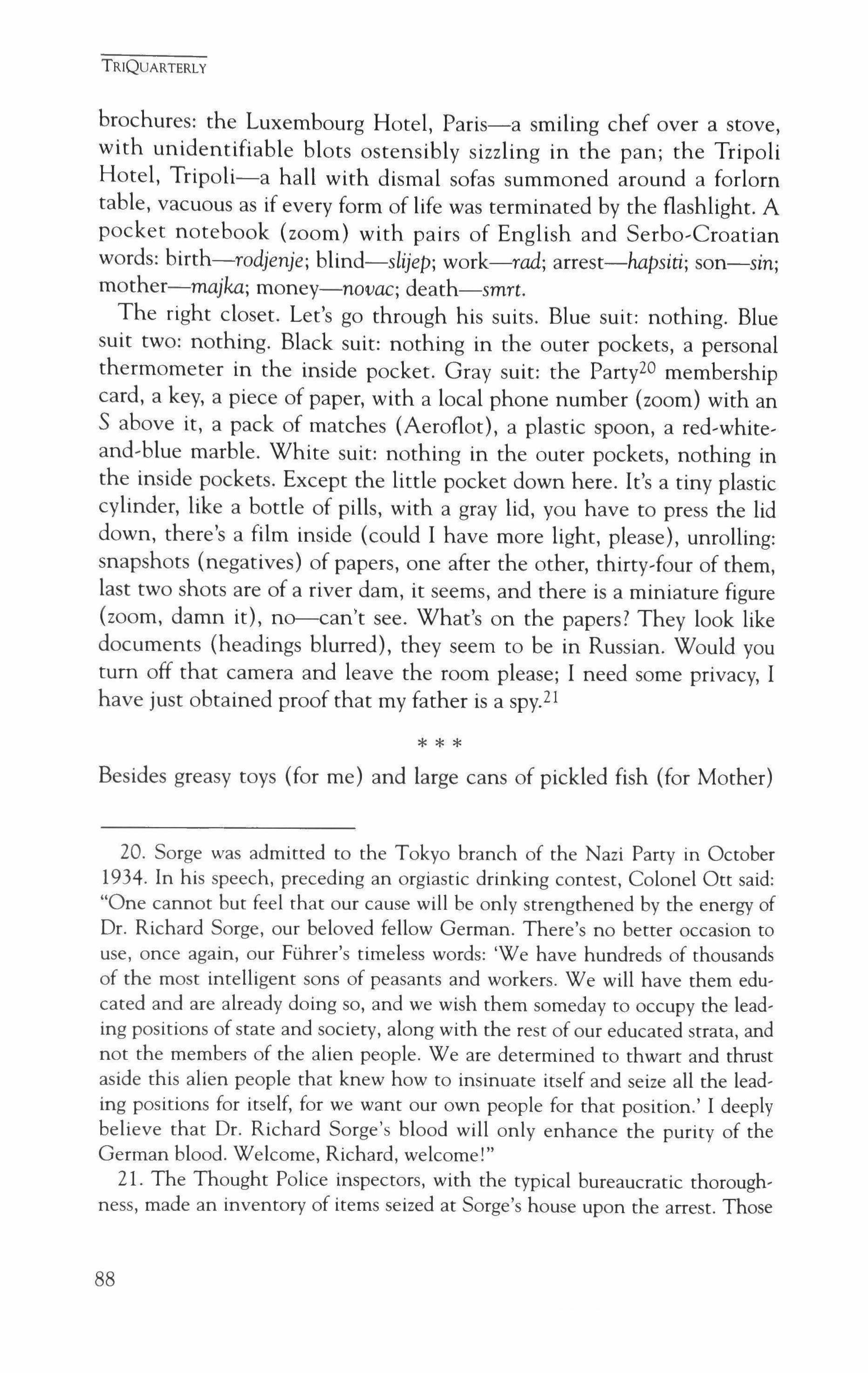
brochures: the Luxembourg Hotel, Paris-a smiling chef over a stove, with unidentifiable blots ostensibly sizzling in the pan; the Tripoli Hotel, Tripoli-a hall with dismal sofas summoned around a forlorn table, vacuous as if every form of life was terminated by the flashlight. A pocket notebook (zoom) with pairs of English and Serbo-Croatian words: birth-rodjenje; blind-slijep; work-rad; arrest-hapsiti; son-sin; mother-majka; money-novae; death-smrt.
The right closet. Let's go through his suits. Blue suit: nothing. Blue suit two: nothing. Black suit: nothing in the outer pockets, a personal thermometer in the inside pocket. Gray suit: the Party20 membership card, a key, a piece of paper, with a local phone number (zoom) with an S above it, a pack of matches (Aeroflot), a plastic spoon, a red-whiteand-blue marble. White suit: nothing in the outer pockets, nothing in the inside pockets. Except the little pocket down here. It's a tiny plastic cylinder, like a bottle of pills, with a gray lid, you have to press the lid down, there's a film inside (could I have more light, please), unrolling: snapshots (negatives) of papers, one after the other, thirty-four of them, last two shots are of a river dam, it seems, and there is a miniature figure (zoom, damn it), no-can't see. What's on the papers? They look like documents (headings blurred), they seem to be in Russian. Would you turn off that camera and leave the room please; I need some privacy, I have just obtained proof that my father is a spy)1
Besides greasy toys (for me) and large cans of pickled fish (for Mother)
20. Sorge was admitted to the Tokyo branch of the Nazi Party in October 1934. In his speech, preceding an orgiastic drinking contest, Colonel Ott said: "One cannot but feel that our cause will be only strengthened by the energy of Dr. Richard Sorge, our beloved fellow German. There's no better occasion to use, once again, our Fuhrer's timeless words: 'We have hundreds of thousands of the most intelligent sons of peasants and workers. We will have them educated and are already doing so, and we wish them someday to occupy the leading positions of state and society, along with the rest of our educated strata, and not the members of the alien people. We are determined to thwart and thrust aside this alien people that knew how to insinuate itself and seize all the leading positions for itself, for we want our own people for that position.' I deeply believe that Dr. Richard Sorge's blood will only enhance the purity of the German blood. Welcome, Richard, welcome!"
21. The Thought Police inspectors, with the typical bureaucratic thoroughness, made an inventory of items seized at Sorge's house upon the arrest. Those
TRIQUARTERLY
* * *
88

my father brought stories from the U.S.S.R.: about his travels down the Volga River, passing by towns, one after the other, made of cubicles, factory smokestacks, and an enormous Lenin statue {making a step forward, pointing towards the future}; about the greatest dam in the world, on the Yenisey River-watching the boiling river at the foot of the dam was "like watching the Red Sea splitting"; about the Turkmenistan people who rode purebred horses as if they'd grown out of them; about thousands of miles of taiga, where prehistoric creatures lived and where you'd never be found if you were lost; about places so cold that your blood would just stop flowing if you stopped moving; about places where vodka was so cheap that nobody drank water. Many stories featured Professor Venykov-my father always referred to him as Professor Venykov, as if that were his Christian name. The stories of Venykov were stories of placidity: about long conversations by the perpetually warm samovar, with affordable caviare and pickled pike liver; about walks down the Nevski Prospekt, while Russian children played hockey on the frozen Neva; about Venykov reminiscing about his childhood: cherry orchards around Kiev, swimming in the Dnieper, fighting, at the
bare objects-the physical tools of espionage-were to form the first grim and material skeleton in the body of proof to be forged against him. They included three cameras; one copying camera with accessories; three photo lenses (one telescopic); developing equipment; two rolls of film with photographed documents (the nature of the documents is unclear from the police files); one black leather wallet containing $1,782; sixteen notebooks with details of contacts with agents and notes in an unknown language; Sorge's Nazi Party card (with membership fees paid until 1951) and a list of Party members in Japan; two volumes of The Complete Shakespeare (no data as to which edition); seven pages of reports and charts in English; and, lastly and fatally, two pages of a typewritten draft, also in English, of the final message of achievement, to be sent to "Wittenberg" on October 15.
22. Sorge: "In the summer of 1914, I visited Sweden on vacation, and returned to Germany by the last boat available. The Austrian Archduke had been assassinated in Sarajevo, and World War I broke out. I volunteered for service immediately, joining the army without reporting to my school or taking the final graduation examination. This period may be described as 'from the schoolhouse to the slaughterhouse.'" Sorge was sent to the Eastern Front (Galicia). He was befriended by an old stonesman from Hamburg, a real leftist, whose head was shattered into smithereens before Sorge's very eyes, a piece of skull bone cutting his face (a permanent scar remained). In July 1915,
TRIQUARTERLY
89
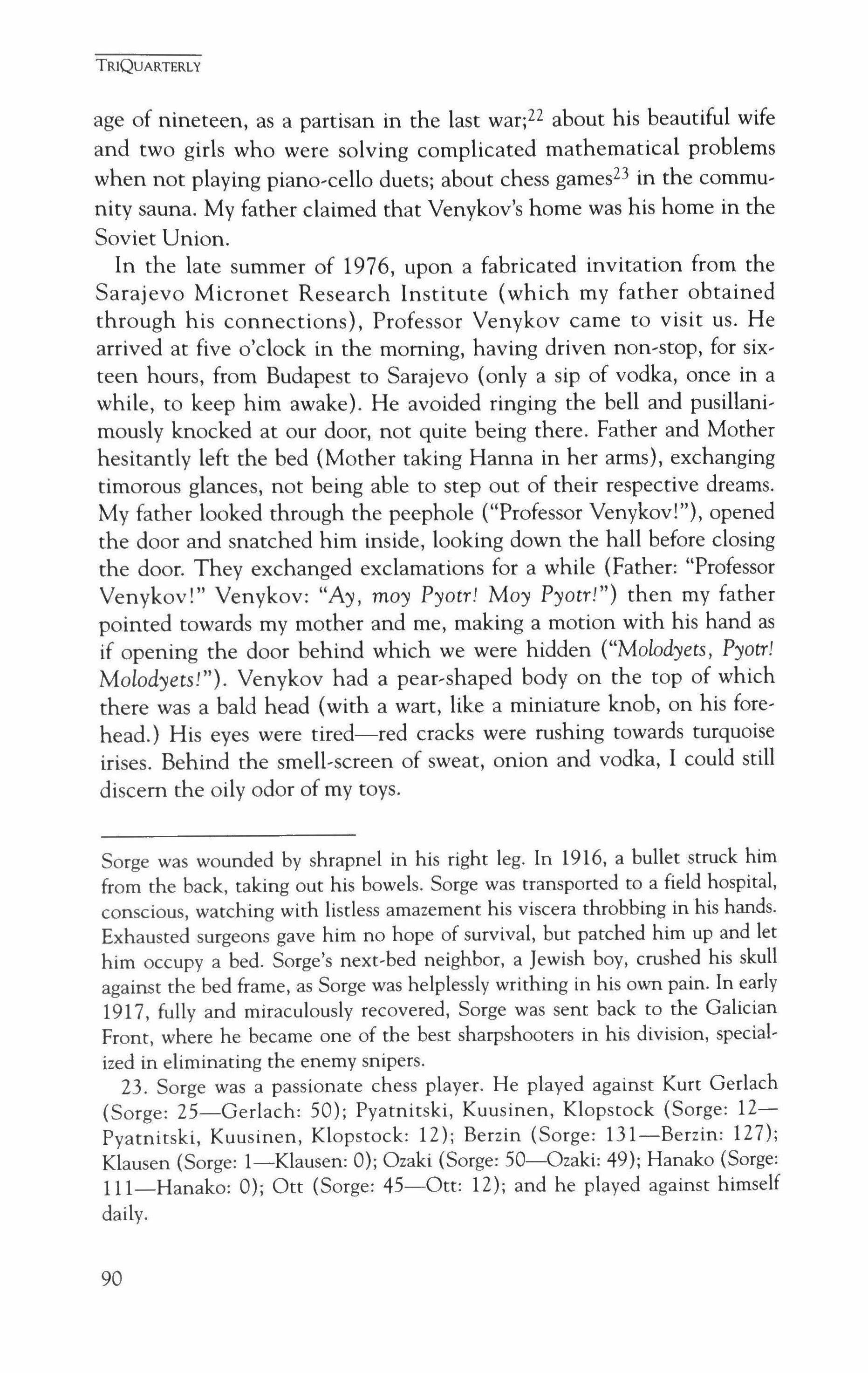
age of nineteen, as a partisan in the last warj22 about his beautiful wife and two girls who were solving complicated mathematical problems when not playing piano-cello duets: about chess games-! in the community sauna. My father claimed that Venykov's home was his home in the Soviet Union.
In the late summer of 1976, upon a fabricated invitation from the Sarajevo Micronet Research Institute (which my father obtained through his connections), Professor Venykov came to visit us. He arrived at five o'clock in the morning, having driven non-stop, for six, teen hours, from Budapest to Sarajevo (only a sip of vodka, once in a while, to keep him awake). He avoided ringing the bell and pusillanimously knocked at our door, not quite being there. Father and Mother hesitantly left the bed (Mother taking Hanna in her arms), exchanging timorous glances, not being able to step out of their respective dreams. My father looked through the peephole ("Professor Venykov!"), opened the door and snatched him inside, looking down the hall before closing the door. They exchanged exclamations for a while (Father: "Professor Venykov!" Venykov: "Ay, may Pyatr! May Pyatr!") then my father pointed towards my mother and me, making a motion with his hand as if opening the door behind which we were hidden {"Malodyets, Pyotr! Malodyets!"}. Venykov had a pear-shaped body on the top of which there was a bald head (with a wart, like a miniature knob, on his fore' head.) His eyes were tired-red cracks were rushing towards turquoise irises. Behind the smell-screen of sweat, onion and vodka, I could still discern the oily odor of my toys.
Sorge was wounded by shrapnel in his right leg. In 1916, a bullet struck him from the back, taking out his bowels. Sorge was transported to a field hospital, conscious, watching with listless amazement his viscera throbbing in his hands. Exhausted surgeons gave him no hope of survival, but patched him up and let him occupy a bed. Sorge's next-bed neighbor, a Jewish boy, crushed his skull against the bed frame, as Sorge was helplessly writhing in his own pain. In early 1917, fully and miraculously recovered, Sorge was sent back to the Galician Front, where he became one of the best sharpshooters in his division, special, ized in eliminating the enemy snipers.
23. Sorge was a passionate chess player. He played against Kurt Gerlach (Sorge: 25-Gerlach: 50); Pyatnitski, Kuusinen, Klopstock (Sorge: 12Pyatnitski, Kuusinen, Klopstock: 12); Berzin (Sorge: 131-Berzin: 127); Klausen (Sorge: l-Klausen: 0); Ozaki (Sorge: 50-Ozaki: 49); Hanako (Sorge: I11-Hanako: 0); Ott (Sorge: 45-0tt: 12); and he played against himself daily.
TRIQUARTERLY
90
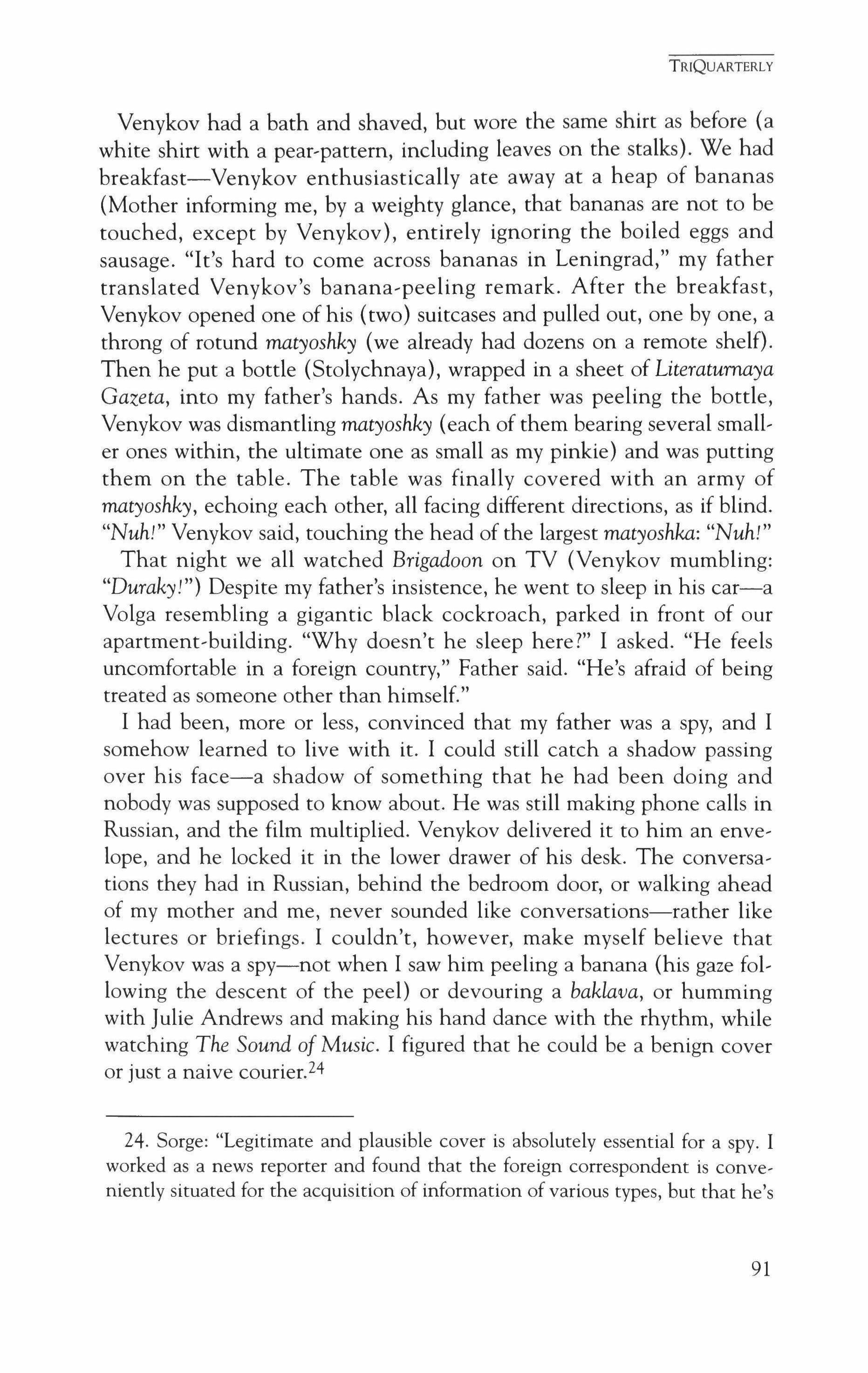
Venykov had a bath and shaved, but wore the same shirt as before (a white shirt with a pear-pattern, including leaves on the stalks). We had breakfast-Venykov enthusiastically ate away at a heap of bananas (Mother informing me, by a weighty glance, that bananas are not to be touched, except by Venykov), entirely ignoring the boiled eggs and sausage. "It's hard to come across bananas in Leningrad," my father translated Venykov's banana-peeling remark. After the breakfast, Venykov opened one of his (two) suitcases and pulled out, one by one, a throng of rotund matyoshky (we already had dozens on a remote shelf). Then he put a bottle (Stolychnaya), wrapped in a sheet of Literaturnaya Gazeta, into my father's hands. As my father was peeling the bottle, Venykov was dismantling matyoshky (each of them bearing several small, er ones within, the ultimate one as small as my pinkie) and was putting them on the table. The table was finally covered with an army of matyoshky, echoing each other, all facing different directions, as if blind. "Nuh!" Venykov said, touching the head of the largest matyoshka: "Nuh!"
That night we all watched Brigadoon on TV (Venykov mumbling: "Duraky!") Despite my father's insistence, he went to sleep in his car-a Volga resembling a gigantic black cockroach, parked in front of our apartment-building. "Why doesn't he sleep here?" I asked. "He feels uncomfortable in a foreign country," Father said. "He's afraid of being treated as someone other than himself."
I had been, more or less, convinced that my father was a spy, and I somehow learned to live with it. I could still catch a shadow passing over his face-a shadow of something that he had been doing and nobody was supposed to know about. He was still making phone calls in Russian, and the film multiplied. Venykov delivered it to him an envelope, and he locked it in the lower drawer of his desk. The conversations they had in Russian, behind the bedroom door, or walking ahead of my mother and me, never sounded like conversations-rather like lectures or briefings. I couldn't, however, make myself believe that Venykov was a spy-not when I saw him peeling a banana (his gaze following the descent of the peel) or devouring a baklava, or humming with Julie Andrews and making his hand dance with the rhythm, while watching The Sound of Music. I figured that he could be a benign cover or just a naive courier.st
24. Sorge: "Legitimate and plausible cover is absolutely essential for a spy. I worked as a news reporter and found that the foreign correspondent is conveniently situated for the acquisition of information of various types, but that he's
TRIQUARTERLY
91

The Venykov weeks passed uneventfully: he was playing chess with my father (Mother: "What's the score?" Father: "One thirty one-one twenty seven."); visiting the mountains around Sarajevo; buying cheap Italian jeans from smugglers for his girls. (A smuggler to his accomplice: "Get me size thirty for Brezhnev!"): going to movies-I (You Only Live Twice, From Russia with Love, True Stories VI); talking to my father behind the closed doors. We'd watch his Volga, before going to sleep, seeing flashes of flesh, as he was putting on his crimson pajamas. Near the end of the third week, at the end of the day that included a movie (Arabian Nights), a dinner (Bosnian cuisine) and plenty of delectable Turkish coffee, Venykov agreed to sleep in my room. Lying between my parents (my sister in her crib), I could hear the hum of Venykov's snoring, occasionally interrupted by the smacking of his lips. Mother: "He's not going to stay forever, is he?" Father: "He's got to go back. His wife and children are there." Me: "Why can't they come here?" Father: "They just can't."
The following day, Venykov packed up before any of us got up (although my sister bawled pitilessly, alarming us, I suppose), had a quick breakfast with us, then kissed my forehead, shook his index finger with my sister, hugged my mother and father (slapping his back drarnatically), turned on the cockroach-car and drove back to Leningrad. "He's
closely observed by the police. I believe, however, that the best thing an agent can do is to render himself as an intellectual: a professor, a writer, a scholar. Generally speaking, the intellectual class is made up of men of average or less than average intelligence, and the agent who assumes such a cover would be quite safe from detection by police. Moreover, as an intellectual with extensive scholarly connections (which he would utilize as sources or transmitters of information), he could associate with people who possess information they know nothing about, he could ask ostensibly ludicrous questions and develop trust. I think that intellectuals are the pets of the world, digging holes in the backyard of history. They can move around without arousing suspicion."
25. In the files of the Frankfurt Police, dating from 1927, there is a vague and unconfirmed report showing that a Dr. Richard Sorge left for the United States on January 24, 1926, and spent some time in California, working in Hollywood film studios. The only admission, however, made by Sorge of visiting America was on his way to Japan. Herr Alexander Hernon, a researcher at the German Foreign Office Archives, claims that there is "a possibility that Dr. Richard Sorge, said by the police to have been in Frankfurt in 1925 and 1926, was not the Soviet spy who was working in Tokyo and on mysterious missions abroad, but someone else, of whom we know nothing."
TRIQUARTERLY
92
The House of the Sorges, outside Baku, Azerbaijan, where Richard was born, after thirty-seven hours of hard labor

Sorge in September 1941, just before his arrest, somewhere in Japan.
� ." _9' tt
•

Sorge was not too proud of his early theoretical work: "I am convinced that my handling of these difficult theoretical questions was cumbersome and immature, and 1 hope that the Nazis burned every last copy."
Richard at the age of eight with his grandfa, ther, Adolph Sorge. Grandpa Adolph told Sorge, all throughout his childhood, stories about Marx poring over Shakespeare (in English) and the Greek tragedies (in Greek); about Marx and Engels playing tennis (Marx always losing), as the mesmerized officials of the First International watched them, moving their heads "left-right, left-right, like a clock pendulum."
home," announced my father two days later, after a brief phone conversation. In my room, Venykov left the scent of his newly purchased aftershave (Pirralon), and a crumpled brown sock under my bed.
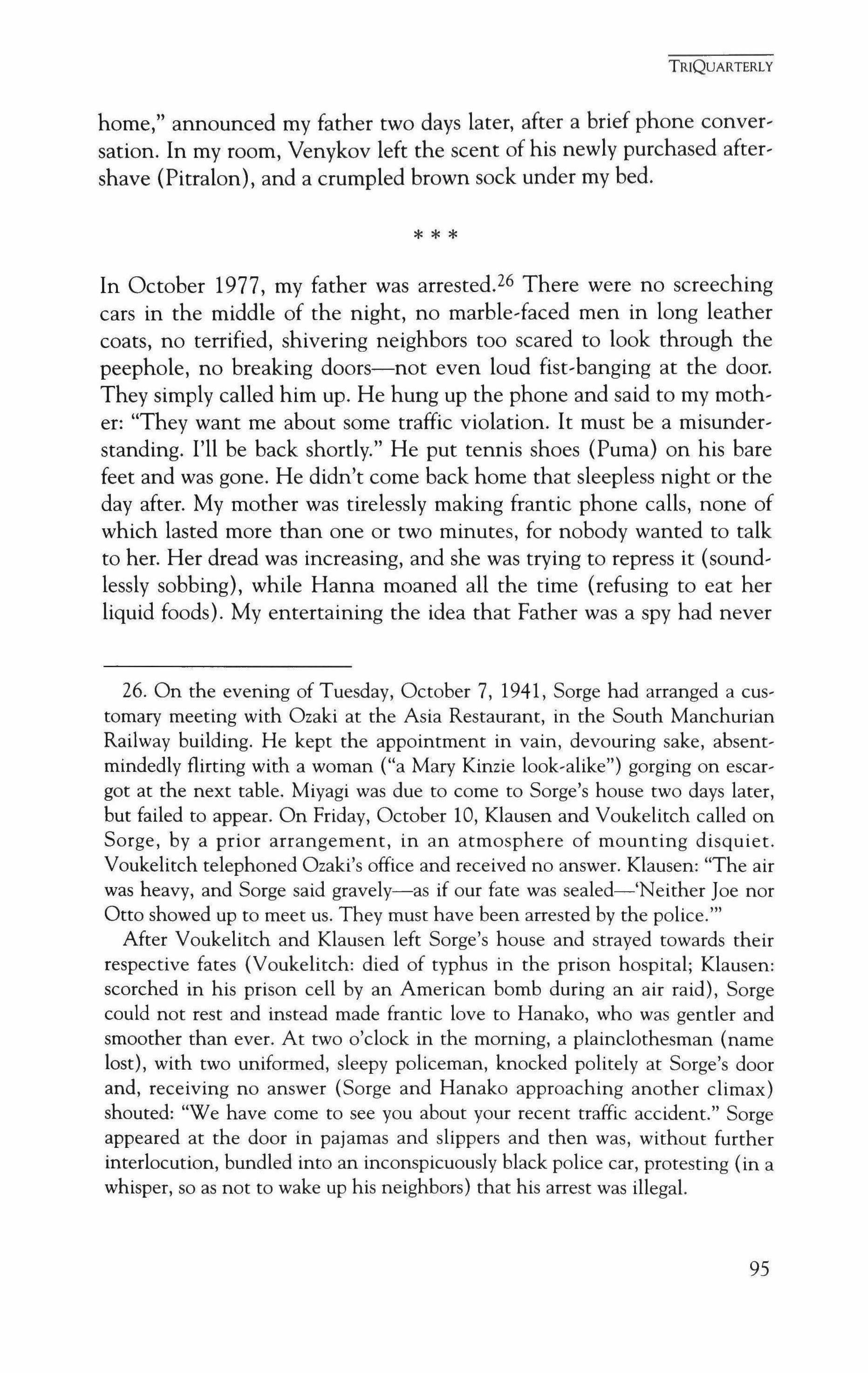
In October 1977, my father was arrested.I'' There were no screeching cars in the middle of the night, no marble-faced men in long leather coats, no terrified, shivering neighbors too scared to look through the peephole, no breaking doors-not even loud fist-banging at the door. They simply called him up. He hung up the phone and said to my mother: "They want me about some traffic violation. It must be a misunderstanding. I'll be back shortly." He put tennis shoes (Puma) on his bare feet and was gone. He didn't come back home that sleepless night or the day after. My mother was tirelessly making frantic phone calls, none of which lasted more than one or two minutes, for nobody wanted to talk to her. Her dread was increasing, and she was trying to repress it (soundlessly sobbing), while Hanna moaned all the time (refusing to eat her liquid foods). My entertaining the idea that Father was a spy had never
26. On the evening of Tuesday, October 7, 1941, Sorge had arranged a customary meeting with Ozaki at the Asia Restaurant, in the South Manchurian Railway building. He kept the appointment in vain, devouring sake, absentmindedly flirting with a woman ("a Mary Kinzie look-alike") gorging on escargot at the next table. Miyagi was due to come to Sorge's house two days later, but failed to appear. On Friday, October 10, Klausen and Voukelitch called on Sorge, by a prior arrangement, in an atmosphere of mounting disquiet. Voukelitch telephoned Ozaki's office and received no answer. Klausen: "The air was heavy, and Sorge said gravely-as if our fate was sealed-'Neither Joe nor Otto showed up to meet us. They must have been arrested by the police.'"
After Voukelitch and Klausen left Sorge's house and strayed towards their respective fates (Voukelitch: died of typhus in the prison hospital; Klausen: scorched in his prison cell by an American bomb during an air raid), Sorge could not rest and instead made frantic love to Hanako, who was gentler and smoother than ever. At two o'clock in the morning, a plainclothesman (name lost), with two uniformed, sleepy policeman, knocked politely at Sorge's door and, receiving no answer (Sorge and Hanako approaching another climax) shouted: "We have come to see you about your recent traffic accident." Sorge appeared at the door in pajamas and slippers and then was, without further interlocution, bundled into an inconspicuously black police car, protesting (in a whisper, so as not to wake up his neighbors) that his arrest was illegal.
TRIQUARTERLY
* * *
95

been much more than a way to embellish my vacant childhood, but with father's arrest it suddenly became palpable. My spine tingled with pride in my ability to sense his spyness, while, at the same time, I was scared, beginning to realize that we were up against something beyond my feeble comprehension. My limbs became weightier and larger, my motion beyond my control. I constantly felt an urge to hide under the bed or in the closet, but all I could do was watch my mother swing (with ululating Hanna in her arms) back and forth, like a metronome.
Four days after my father's vanishing, Slobodan came. He rang the bell patiently, while my mother was alternately looking through the peephole and at me, deliberating whether to open the door. "I'm a friend," Slobodan announced. My mother opened the door, but kept it chained. "Madam," he said and showed her the inside ofhis wallet. "I'm Inspector-? Slobodan." "State Security," my mother mumbled. "No need to behave like a hysterical woman," he said. "I'm here to help." Mother unchained the door and let him in. He went straight to the dining room, without taking his shoes off, sat down, wiped his thick glasses and vast forehead with a handkerchief, while Mother and I watched him, benumbed.
"I want you to know, madam, that we know everything.s'' We have watched, we have listened, and we know," he said. "And I also want you to know that we have no hard feelings about you, we presume that you
27. The procurator directly responsible for the interrogation of Sorge was Yoshikawa Mitsusada of the Thought Department of the Tokyo District Court Procurator Bureau. Yoshikawa had an extensive knowledge of current political and economic thought, including Marxism. It was rumored that he had been a Marxist himself when he was a student at Tokyo Imperial University. Soon after graduating from the university, he had written a comprehensive study of the geisha wage system. It seems that there was some mutual admiration between the two of them. Yoshikawa: "In my whole life, I have never seen anyone as great as he was." After the sentence, at their last meeting, Sorge asked Yoshikawa to be kind to Hanako-san: "She will marry a professor in the end, and have a boring and happy life. Don't do anything to her."
28. Some of Sorge's information, seemingly petty, was dispatched, by the way of the Fourth Bureau, to the GPU, which used it to build the foundations for what would become the KGB's Sixth Division of the First Directorate-the infamous Index. The Index was a vast collection of biographical and personal data about everyone who might, even very remotely, be of use at some time or another, to Soviet espionage. The Index files contained information about sexual preferences (obtained by voyeuristic monitoring or tempting agents); eating (restaurant bills, et cetera) and sleeping habits {calls in the middle of the night,
TRIQUARTERLY
96

knew nothing about your husband's activities. Had you known, you would have informed us, am I right? Feel free to interrupt me. I can just feel that that pretty mouth of yours wants to start clattering. Cute children, madam. Are they yours? Just joking-they look exactly like you. What's the little girl's name? She'll be an attractive woman, I'll tell you. Feel free to interrupt me. You shouldn't feel that way about me, madam, I'm a nice person. I love this country, you know, I think that we have something here, something like no other place in the world and I can tell you that there are plenty of people that think that way. We don't want this country, what our fathers bled for, to be defiled-it belongs to us and we want to keep it. And if you don't like it-well, you're welcome to leave and go somewhere else, to Arnerica-? or wherever the hell you want. Don't you agree with me? Tell me, don't you think the same way?"
My mother said: "Comrade Slobodan, I want you to leave this very moment!"
"I'll be glad to do so, but not before I take care of several wee things. I monitoring, et cetera); about sport-team affiliations; about reading interests (subscription lists, library records, etc.) and, often, recorded stories, apparently unrelated, which helped the one in charge of the particular individual to assess what sort of person he or she was to utilize. The information could be used for blackmail, or for assuming the right approach when recruiting, or for plugging damaging information into the public's mind. Cold War defectors brought numerous stories about the Index and, almost without exception, claimed that the official slogan was "We know everything!" In pre-computer times, only the Nazi Gestapo had much the same kind of organization, but it was not nearly as detailed nor all-embracing as the Index. There are claims, dating all the way from the sixties, that the United States government agencies (CIA, or FBI, or both) are building a computer database, founded on principles similar to the Index's, but none of those claims has ever been confirmed.
29. Major General Charles A. Willoughby, MacArthur's chief of intelligence (1941-51), confiscated all the Japanese Sorge files that survived the leveling of Tokyo and conducted an investigation of the Sorge case, which helped uncover many a Communist network back home in the United States of America. In his book Shanghai Conspiracy: The Sorge Spy Ring (1952) he aptly notes: "Though the work of Dr. Richard Sorge and his companions belongs to history, the methods of their work should serve as a clear warning for today and for the future. They concern not just the intelligence officer but every good citizen. Some of the implications are frightening. One begins to wonder whom one can trust, what innocent-appearing friend may suddenly be discovered as an enemy."
TRIQUARTERLY
97

need a nice photograph of your husband, for the papers. No? Well, I'll take the liberty of looking for this and that. You may watch-lest I be tempted to take something for myself."
My mother retched several times, then put Hanna into the crib and hurried to the bathroom. I heard her vomiting, as if coughing.
"Women, always vomiting. Stay away from women, little boy, that's my advice. So, tell me about your father. Do you like your daddy? I suppose you do. When I was a boy, I always had a place where I would hide precious little things, you know, marbles and ticklish pictures and stuff. Do you have a place like that? Does your father have a place like that? Would you show me?"
My mother walked back in.
"I was just asking your boy, madam, what does he want to be in his life: What do you want to be, young man?"
"A journalist," I said.
"Smart, very smart. You're going to get very far, my boy. Madam, ifyou'd show me where does your husband keep his private stuff, I'd be thankful beyond words. No? Well, then I'll just look around, if you don't mind."
He got up and paced around the dining room, pulled out a couple of books from the shelf, flipped through them detachedly, and put them back. He turned towards us, smiled, said: "Pardon me," and slipped into the bedroom.
Mother and I heard noises coming from the bedroom: thumping of suitcases, a screech of a drawer, a snap of the locked drawer, din of sundry things being thrown on the floor. Mother held my hand, squeezing it-her hand moist and faint. Slobodan walked out with a suitcase, shoving something into his pocket. He produced a little box (with a painted bee landing on a flower) out of his hand and said: "Condoms, my boy. Had your father had this on, you would have rotted, stuck in a sewage pipe, years ago." My mother plucked the box out of his hand and said: "Get out!"
"If you wish to talk to me, feel free to call me. My boss always says that love has political limtts.J'' Please, call me." He wrote the phone number on the wall by the front door: 71-782, then opened the door and walked
30. In August 1941, Hanako-san was summoned to the Thought Police headquarters and urged by a man named Nakamura to break off relations with Sorge. ("They don't know what loyalty means! They don't know the value of the family!") The typically Sorgean, sardonic reaction was to invite Nakamura to dinner-an invitation that was embarrassingly ignored.
TRIQUARTERLY
98

out. Before my mother closed the door, he shouted in the echoing hall: "We should get together sometime, now that you're alone."
Mother reluctantly opened the bedroom door: a gaping suitcase; a pile of suits (hanger-hooks looking like bowed swan heads); the Sputnik glass shattered, pens and pencils scattered around, like corpses. On the bed, there were two symmetrical foot-shaped dents, and mounted ripples on the bedspread around them.
After a month or so, Hanna and I went with our mother to visit Father in jail. The visiting room looked like a decrepit hotel hall, with stained and tom sofas and armchairs sorted into separate throngs. Father came followed by a guard31 in a wan blue uniform (the rim of his cap touching the top of his eyebrows). Mother immediately burst into tears and hugged Father. He sat down between Hanna ("Tata! Tata!") and me, putting his arms around us (thin, bloody wristlets). The tip of his left eyetooth was broken and under his left ear, at the root of the jaw, there was a huge bruise, like a shadow of the ear.
"I've done nothing wrong," he said.
"Shut your fucking mouth!" roared the guard.
"Did they torture-- you?" Mother asked.
"A slap or two."
31. In the Sugamo prison, Sorge was befriended, somewhat surprisingly, by Captain Ohashi-the head of the guards. After Sorge had written his confession, Ohashi brought newspapers to Sugamo every day, together with a supply of Sorge's own tea. Sometimes they'd drink tea together in Sorge's cell. (Sorge: "If I am sentenced to death, Captain Ohashi, I shall become a ghost and haunt you.") In October 1944, after the execution day had been set, Ohashi bought some fruit and sake and gave what he described as a "farewell party" for Sorge. Ohashi begged a farewell gift from Sorge-preferably Sorge's black Italian shoes with leather soles and silk laces. After Sorge was led to the execution, the polished pair of shoes was found in his cell (toes facing the wall), with folded silk socks inside, and a note for Ohashi: "I shall never forget your kindness during the most difficult time of my eventful life."
32. Before getting to Yoshikawa, Sorge went through the obligatory interrogation conducted by lower procurators, which chiefly meant rather routine torture: Sorge was compelled to remain in a kneeling position, in formal Japanese style, for hours, while three procurators struck him repeatedly, stamped their feet on his knees, or twisted his head and arms in a judo hold. On occasion, they'd bum hair or pierce particularly sensitive points (nipples, testicles, anus) on his body. Every once in a while Sorge would just close his eyes and try to ignore the immense pain. The momentary trance would be smashed by a full-
TRIQUARTERLY
99
"Shut your fucking mouth!"
"How's your school?" Father asked me. "Fine."
"Any problems?" "No."
"Good"
"He got the best grade in the class33 for the history test," Mother said. "Good," he said. "Good."
"What do they want from you?" Mother asked.
"They're interrogating me. They want me to sign a statement."34
"Shut your big fucking mouth! This is the last time I'm telling you."
Father was sentenced, after a brief (closed-to-the-public) trial, to three years of hard labor and was shipped off to the Zenica prison on January 7, 1978. There was footage shown on TV of my father (and four obscure men) in the courtroom handcuffed, as the voice-over spoke about "disseminating foreign propaganda," about "the internal enemy who never sleeps," about "Tiro and his vision," about "protecting what our fathers bled for."

fist blow from behind to his ear or the nape of his neck-the pain would be so intense that Sorge vomited uncontrollably. Naturally, he did not sign the confession under the torture.
33. While in high school, Sorge's best friend was a Jewish boy named Franz, with whom he shared interest in German history-particularly Barbarossa and Bismarck. The friendship was abruptly broken off, after Franz tried to kiss Ika, over the book about Barbarossa's incursion, full of pictures of heavily armored German knights on stout armor-skirted horses.
34. Sorge broke down in the Buddhist chaplain's room at Sugamo, after the signed statements by Klausen, Voukelitch, Ozaki and Miyagi were shown to him. Yoshikawa made the following appeal: "What about your obligations as a human being? Your friends, who have risked their lives and families to work with you, for your cause, have confessed and may hope thereby to secure some mitigation, however slight, of their sentences. Are you going to abandon them to their fate? Are you going to betray them? Are you going to be remembered as a typical Western man, caring more about himself than anyone else? If I were in your place, I'd confess." Sorge said: "Honourable Procurator, I have been defeated, for which I congratulate you," after which he requested the pen (black-and-green Pelikan) and paper (blank-sheet, hard-covered notebook). He wrote an autobiographical confession which amounted to some 50,000 words and began with words: "For the first time in my life, I want to tell the truth: I have been a Communist since 1928."
TRIQUARTERLY
100
"We have seen it before," the voice said. "And we'll see it again: dis, sembling intellectuals, spreading dissent like a lethal germ. But this is what we have to tell them: Stay away from the clear stream of our progress or we'll crush you like snails! "35
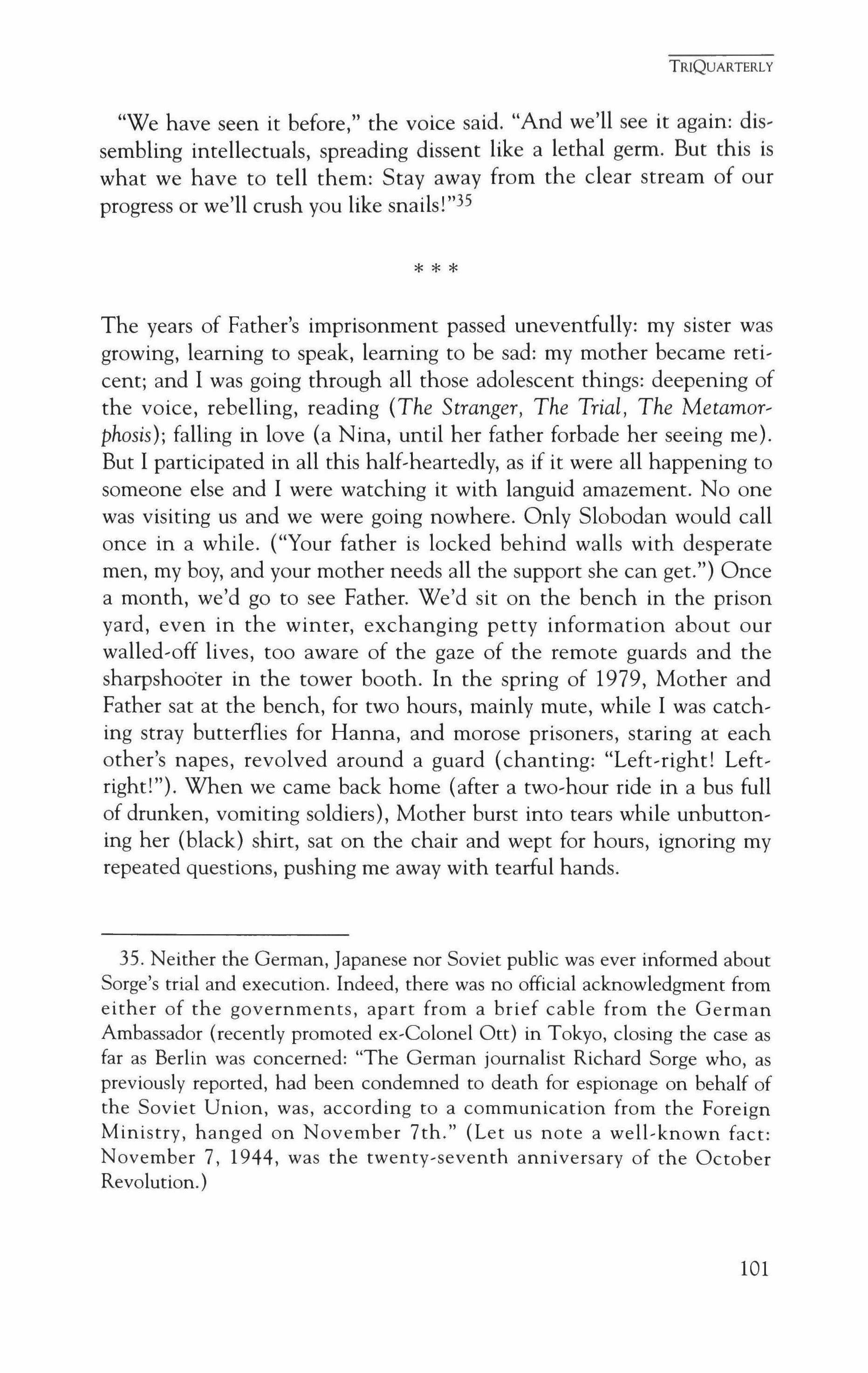
The years of Father's imprisonment passed uneventfully: my sister was growing, learning to speak, learning to be sad: my mother became reticent; and I was going through all those adolescent things: deepening of the voice, rebelling, reading (The Stranger, The Trial, The Meramorphosis); falling in love (a Nina, until her father forbade her seeing me). But I participated in all this half-heartedly, as if it were all happening to someone else and I were watching it with languid amazement. No one was visiting us and we were going nowhere. Only Slobodan would call once in a while. ("Your father is locked behind walls with desperate men, my boy, and your mother needs all the support she can get.") Once a month, we'd go to see Father. We'd sit on the bench in the prison yard, even in the winter, exchanging petty information about our walled-off lives, too aware of the gaze of the remote guards and the sharpshooter in the tower booth. In the spring of 1979, Mother and Father sat at the bench, for two hours, mainly mute, while I was catching stray butterflies for Hanna, and morose prisoners, staring at each other's napes, revolved around a guard (chanting: "Left-right! Leftright!"). When we came back home (after a two-hour ride in a bus full of drunken, vomiting soldiers), Mother burst into tears while unbutton, ing her (black) shirt, sat on the chair and wept for hours, ignoring my repeated questions, pushing me away with tearful hands.
35. Neither the German, Japanese nor Soviet public was ever informed about Sorge's trial and execution. Indeed, there was no official acknowledgment from either of the governments, apart from a brief cable from the German Ambassador (recently promoted ex-Colonel Ott) in Tokyo, closing the case as far as Berlin was concerned: "The German journalist Richard Sorge who, as previously reported, had been condemned to death for espionage on behalf of the Soviet Union, was, according to a communication from the Foreign Ministry, hanged on November 7th." (Let us note a well-known fact: November 7, 1944, was the twenty-seventh anniversary of the October Revolution.)
TRIQUARTERLY
* * *
101
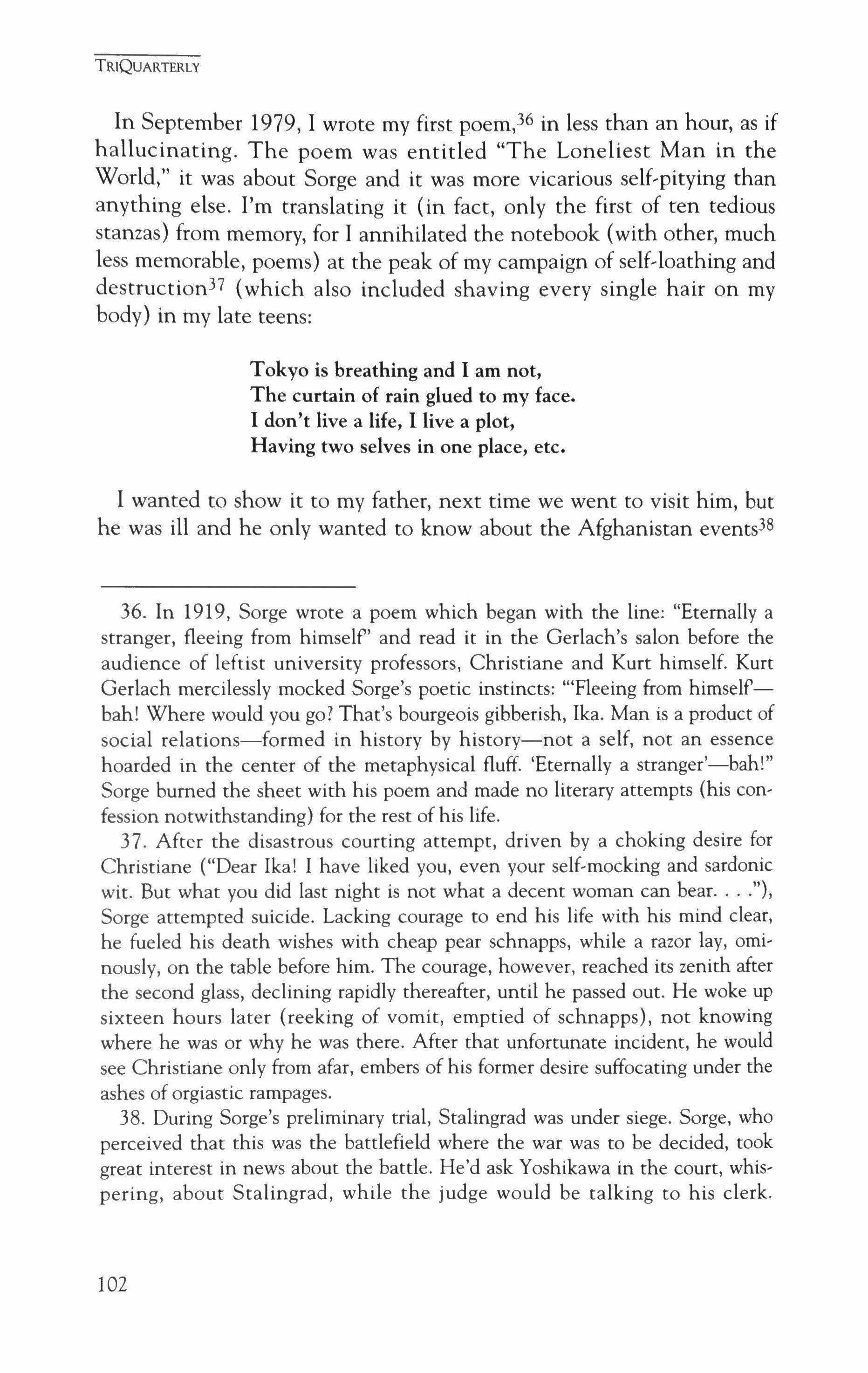
In September 1979, I wrote my first poem,36 in less than an hour, as if hallucinating. The poem was entitled "The Loneliest Man in the World," it was about Sorge and it was more vicarious self-pitying than anything else. I'm translating it (in fact, only the first of ten tedious stanzas) from memory, for I annihilated the notebook (with other, much less memorable, poems) at the peak of my campaign of self,loathing and destruction-? (which also included shaving every single hair on my body) in my late teens:
Tokyo is breathing and I am not, The curtain of rain glued to my face. I don't live a life, I live a plot, Having two selves in one place, etc.
I wanted to show it to my father, next time we went to visit him, but he was ill and he only wanted to know about the Afghanistan events38
36. In 1919, Sorge wrote a poem which began with the line: "Eternally a stranger, fleeing from himself" and read it in the Gerlach's salon before the audience of leftist university professors, Christiane and Kurt himself. Kurt Gerlach mercilessly mocked Sorge's poetic instincts: '''Fleeing from himselfbah! Where would you go? That's bourgeois gibberish, Ika. Man is a product of social relations-formed in history by history-not a self, not an essence hoarded in the center of the metaphysical fluff. 'Eternally a stranger'-bah!" Sorge burned the sheet with his poem and made no literary attempts (his confession notwithstanding) for the rest of his life.
37. After the disastrous courting attempt, driven by a choking desire for Christiane ("Dear Ika! I have liked you, even your self-mocking and sardonic wit. But what you did last night is not what a decent woman can bear. "), Sorge attempted suicide. Lacking courage to end his life with his mind clear, he fueled his death wishes with cheap pear schnapps, while a razor lay, ominously, on the table before him. The courage, however, reached its zenith after the second glass, declining rapidly thereafter, until he passed out. He woke up sixteen hours later (reeking of vomit, emptied of schnapps), not knowing where he was or why he was there. After that unfortunate incident, he would see Christiane only from afar, embers of his former desire suffocating under the ashes of orgiastic rampages.
38. During Sorge's preliminary trial, Stalingrad was under siege. Sorge, who perceived that this was the battlefield where the war was to be decided, took great interest in news about the battle. He'd ask Yoshikawa in the court, whispering, about Stalingrad, while the judge would be talking to his clerk.
TR1QUARTERLY
102

(political prisoners could not watch news). This time we met him in a miasmic room, with a small window looking at the women's prison. He was escorted by a guard, whom he nicknamed "Barabbas," and who would help him get up or walk. ("You can put me back on the cross now, Barabbas.") The prison uniform was dangling from his now-scrawny shoulders. "I shrunk," he said.
In January 1980, Father was released from prison, diagnosed with brain cancer, curled into an old man, with most of his teeth missing. He could wear my clothes, and the wedding ring was sliding down his finger-he took it off. We rearranged our place and put the TV in the bedroom, Father taking hold of the remote for the rest of his life. He'd watch TV (mainly news) all day, sucking a banana, occasionally passing out and then waking up from listless dreams. On his good days, he'd be drinking strong-scented tea39 and tell us stories about his U.S.s.R. journeys: about Ukrainian weddings, everybody dancing kolomiyka like there's no tomorrow; about nuclear submarines that could stay underwater for years (crews going blind); about riding camels in Kazakhstan; about wheat fields spreading as far as you could see and beyond. Every day, he was getting smaller and smaller, as if flesh was being squeezed out of him like toothpaste.
On May 4, Comrade Tito died. He had been ailing for a long time and they had had to amputate his leg. We were, for days, repeatedly shown footage of (rnonopedic) Comrade Tito smiling, surrounded by glowing doctors (happier than anyone that he was alive), a wrinkleless sheet covering his retained leg. Sirens begun wailing at 15:04. I looked through the window and saw everything still: people stood motionless on the street, cars were paralyzed, as if someone had stopped the film in the projector. On the black TV screen white letters emitted: "Comrade Tito has passed away"-no voice-over, no images shown. Sirens stopped
Yoshikawa would reply in an undertone, telling him about the general situation ("They're keeping their positions," or "It looks good"). The preliminary judge knew what was going on, but did nothing to stop them. When Stalingrad was saved, Ohashi watched Sorge, through the peephole of his cell, dancing, clapping hands, and kissing the walls with joy.
39. Moments before the execution, the chief chaplain of the Sugamo prison (accompanied with Yoshikawa and Ohashi) offered Sorge tea and cake, and said: "Life and death are one and the same thing to one who has attained impersonal beatitude. Impersonal beatitude can be attained by entrusting everything to the mercy of Buddha." Sorge said: "I thank you, but: no!"
TRIQUARTERLY
103
wailing, I looked at the street and everybody and everything was gone, as if the ground had gaped open and swallowed it all.4o "I suppose this is the [udgment Day," my father said and turned off the TV. "I suppose this is the end of it all."
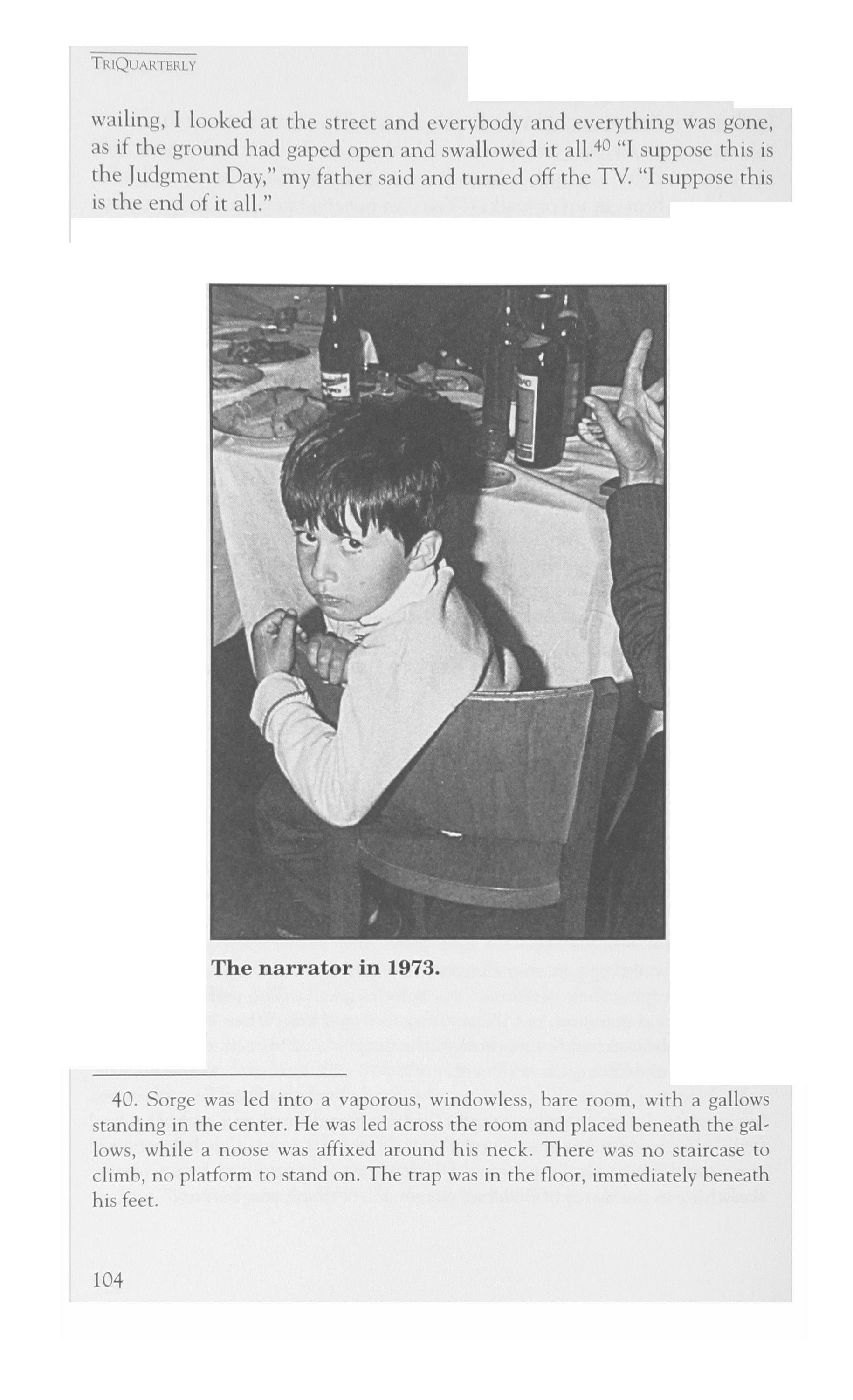
40. Sorge was led into a vaporous, windowless, bare room, with a gallows standing in the center. He was led across the room and placed beneath the gallows, while a noose was affixed around his neck. There was no staircase to climb, no platform to stand on. The trap was in the floor, immediately beneath his feet.
TR1QUARTERLY
The narrator in 1973.
104
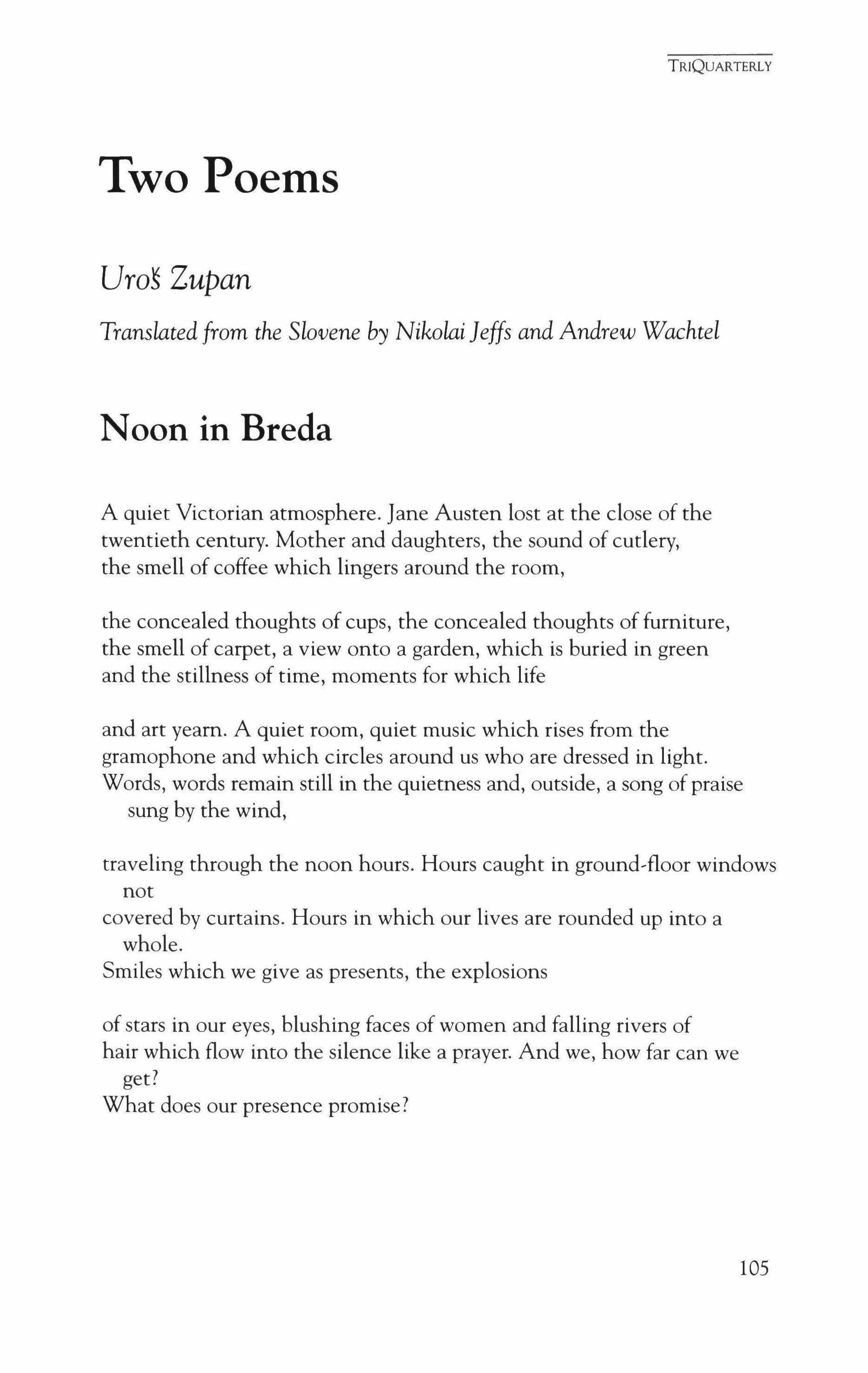
Two Poems
Uro� Zupan
Translated from the Slovene by Nikolai Jeffs and Andrew Wachtel
Noon in Breda
A quiet Victorian atmosphere. Jane Austen lost at the close of the twentieth century. Mother and daughters, the sound of cutlery, the smell of coffee which lingers around the room, the concealed thoughts of cups, the concealed thoughts of furniture, the smell of carpet, a view onto a garden, which is buried in green and the stillness of time, moments for which life
and art yearn. A quiet room, quiet music which rises from the gramophone and which circles around us who are dressed in light. Words, words remain still in the quietness and, outside, a song ofpraise sung by the wind,
traveling through the noon hours. Hours caught in ground-floor windows not covered by curtains. Hours in which our lives are rounded up into a whole. Smiles which we give as presents, the explosions of stars in our eyes, blushing faces of women and falling rivers of hair which flow into the silence like a prayer. And we, how far can we get?
What does our presence promise?
TRIQUARTERLY
105
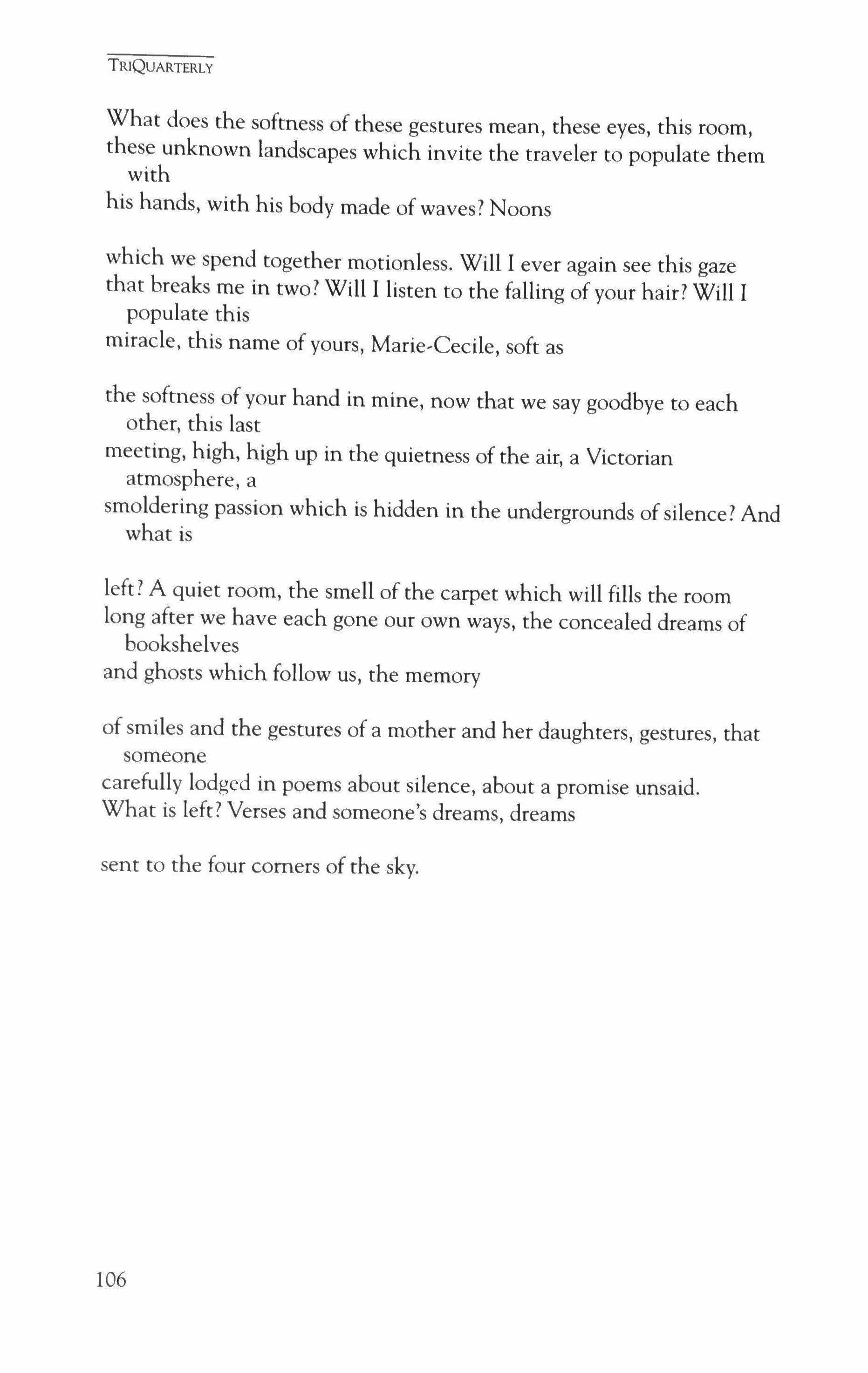
What does the softness of these gestures mean, these eyes, this room, these unknown landscapes which invite the traveler to populate them with his hands, with his body made of waves? Noons which we spend together motionless. Will I ever again see this gaze that breaks me in two? Will I listen to the falling of your hair? Willi populate this miracle, this name of yours, Marie-Cecile, soft as the softness of your hand in mine, now that we say goodbye to each other, this last meeting, high, high up in the quietness of the air, a Victorian atmosphere, a smoldering passion which is hidden in the undergrounds of silence? And what is
left? A quiet room, the smell of the carpet which will fills the room long after we have each gone our own ways, the concealed dreams of bookshelves and ghosts which follow us, the memory of smiles and the gestures of a mother and her daughters, gestures, that someone carefully lodged in poems about silence, about a promise unsaid. What is left? Verses and someone's dreams, dreams
sent to the four comers of the sky.
Y
TRIQUARTERL
106

A Sarajevo Elegy
forJosiP Osti
The word must be written and not just pronounced. I teach Hamlet from Fortinbras's elegy. You wrote it and uncovered a curtain for me. Once more I can hear clearly the voices of the announcers coming through the walls, now I can again become conscious of something that has become a daily ritual, the set game of the dead, now when I bury my hands in my head, when I plunge through eyes to touch the place where the evil in us all has its origin.
I know that you did not imagine that it would happen, that you would have to sing about it, the task is hard, sometimes too hard, for the human in the poet, for the poet in the human, the feeling of guilt enormous, but the word must be written, that is why we are here despite the anger and powerlessness, despite the tears and our nervous hands, because sentences feed on pain and sadness, because words unmetaphorically grow in blood.
Would you have become a poet if you had known that one day you would have to write The Book of the Dead? Would not you have rather given it all up?
But no, you know that there is no retreat. Mythology must be reborn, places accurately described, because fewer and fewer are left, remain behind, and they are ever harder to recognize. That is why pictures from your memory, which is now your only blood brother, must be stronger. Pictures placed in stronger sentences, crystal-bright and clear, so that they don't lose a single outline. Smells more real than real smells. Buildings more quiet and solemn than they were. Less and less remains, and streets will not be able to return memories to the eyes,
TRIQUARTERLY 107
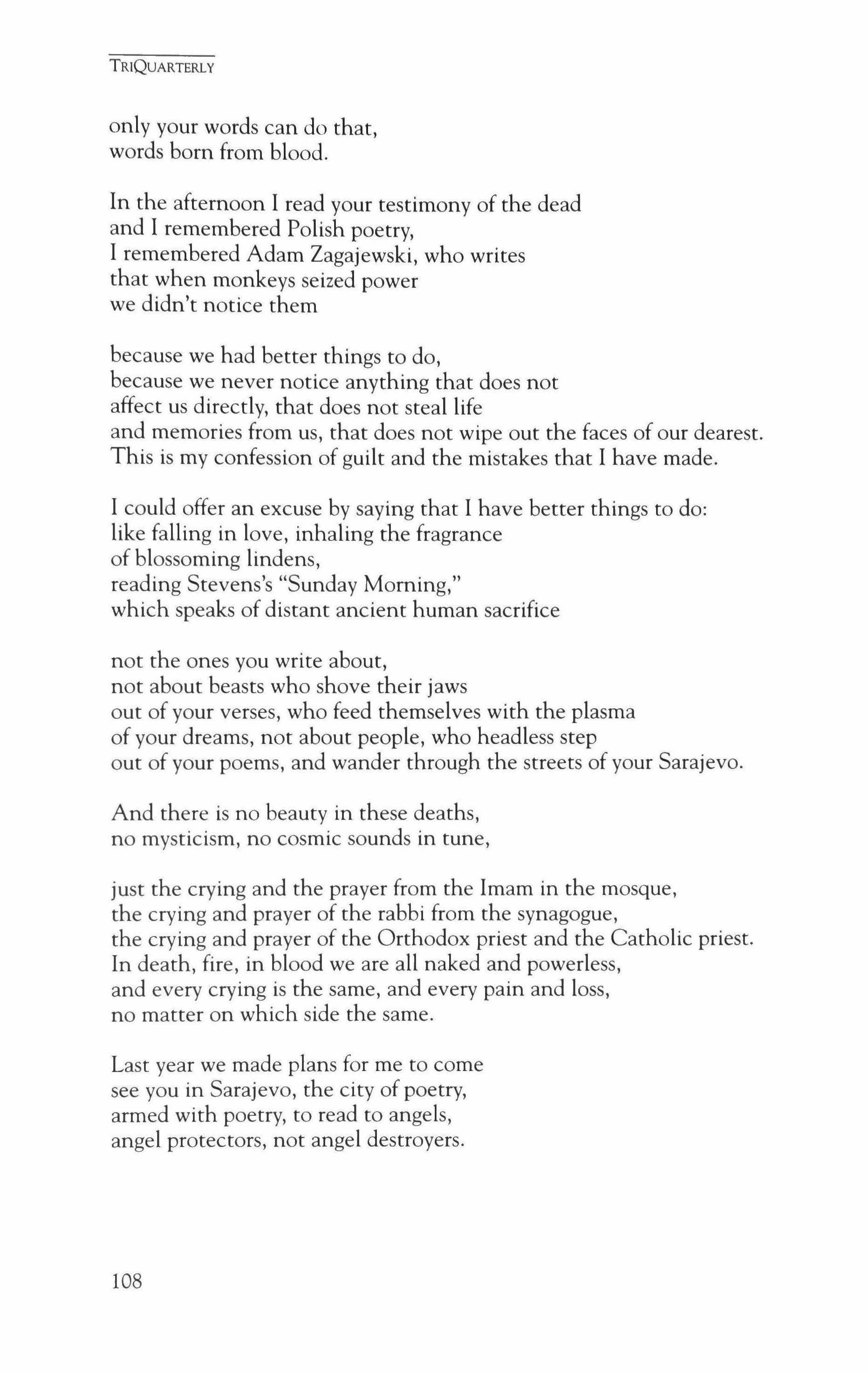
only your words can do that, words born from blood.
In the afternoon I read your testimony of the dead and I remembered Polish poetry, I remembered Adam Zagajewski, who writes that when monkeys seized power we didn't notice them
because we had better things to do, because we never notice anything that does not affect us directly, that does not steal life and memories from us, that does not wipe out the faces of our dearest. This is my confession of guilt and the mistakes that I have made.
I could offer an excuse by saying that I have better things to do: like falling in love, inhaling the fragrance of blossoming lindens, reading Stevens's "Sunday Morning," which speaks of distant ancient human sacrifice
not the ones you write about, not about beasts who shove their jaws out of your verses, who feed themselves with the plasma of your dreams, not about people, who headless step out of your poems, and wander through the streets of your Sarajevo.
And there is no beauty in these deaths, no mysticism, no cosmic sounds in tune,
just the crying and the prayer from the Imam in the mosque, the crying and prayer of the rabbi from the synagogue, the crying and prayer of the Orthodox priest and the Catholic priest. In death, fire, in blood we are all naked and powerless, and every crying is the same, and every pain and loss, no matter on which side the same.
Last year we made plans for me to come see you in Sarajevo, the city of poetry, armed with poetry, to read to angels, angel protectors, not angel destroyers.
TRIQUARTERLY
108
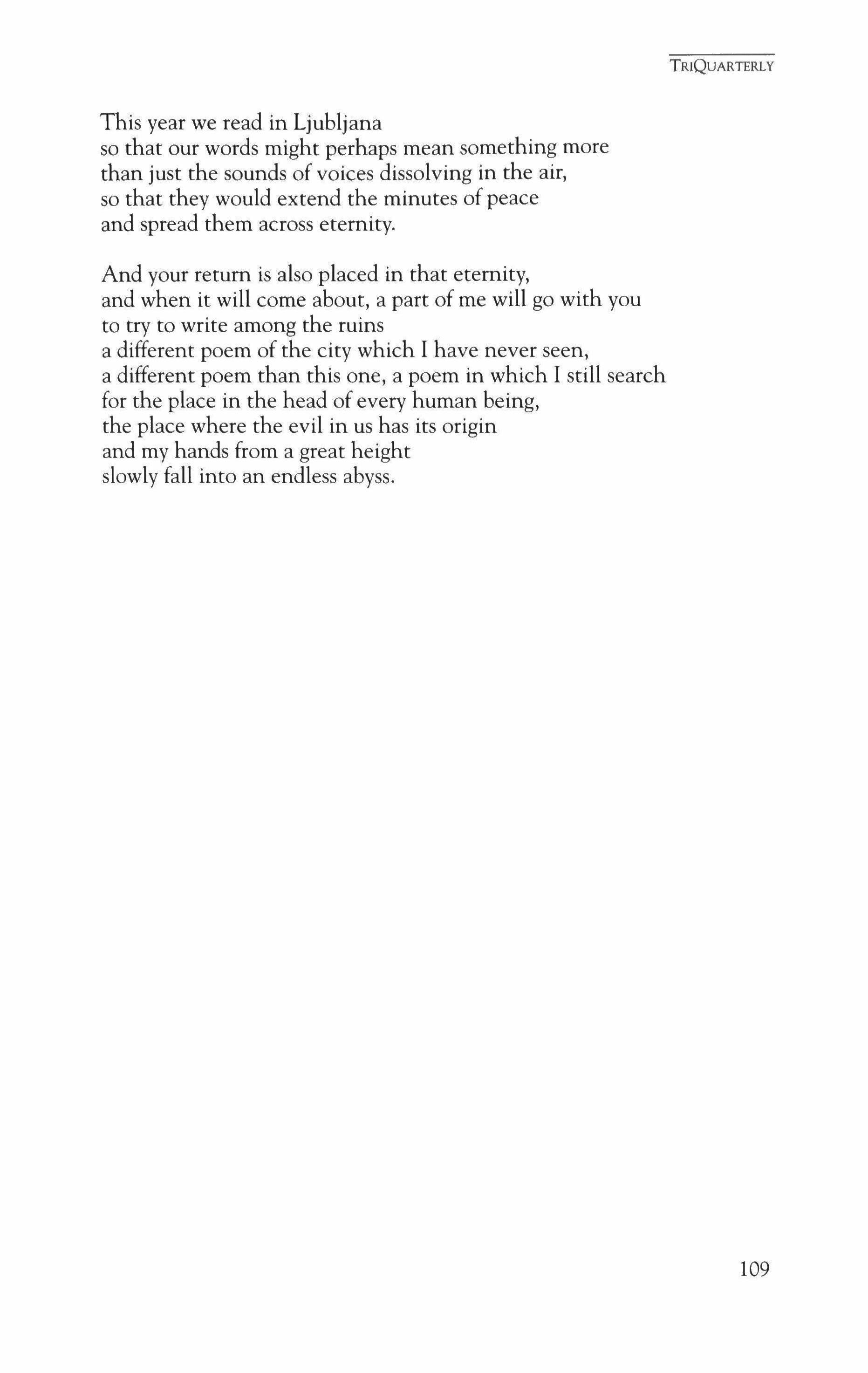
This year we read in Ljubljana so that our words might perhaps mean something more than just the sounds of voices dissolving in the air, so that they would extend the minutes of peace and spread them across eternity.
And your return is also placed in that eternity, and when it will come about, a part of me will go with you to try to write among the ruins a different poem of the city which I have never seen, a different poem than this one, a poem in which I still search for the place in the head of every human being, the place where the evil in us has its origin and my hands from a great height slowly fall into an endless abyss.
TRIQUARTERLY 109
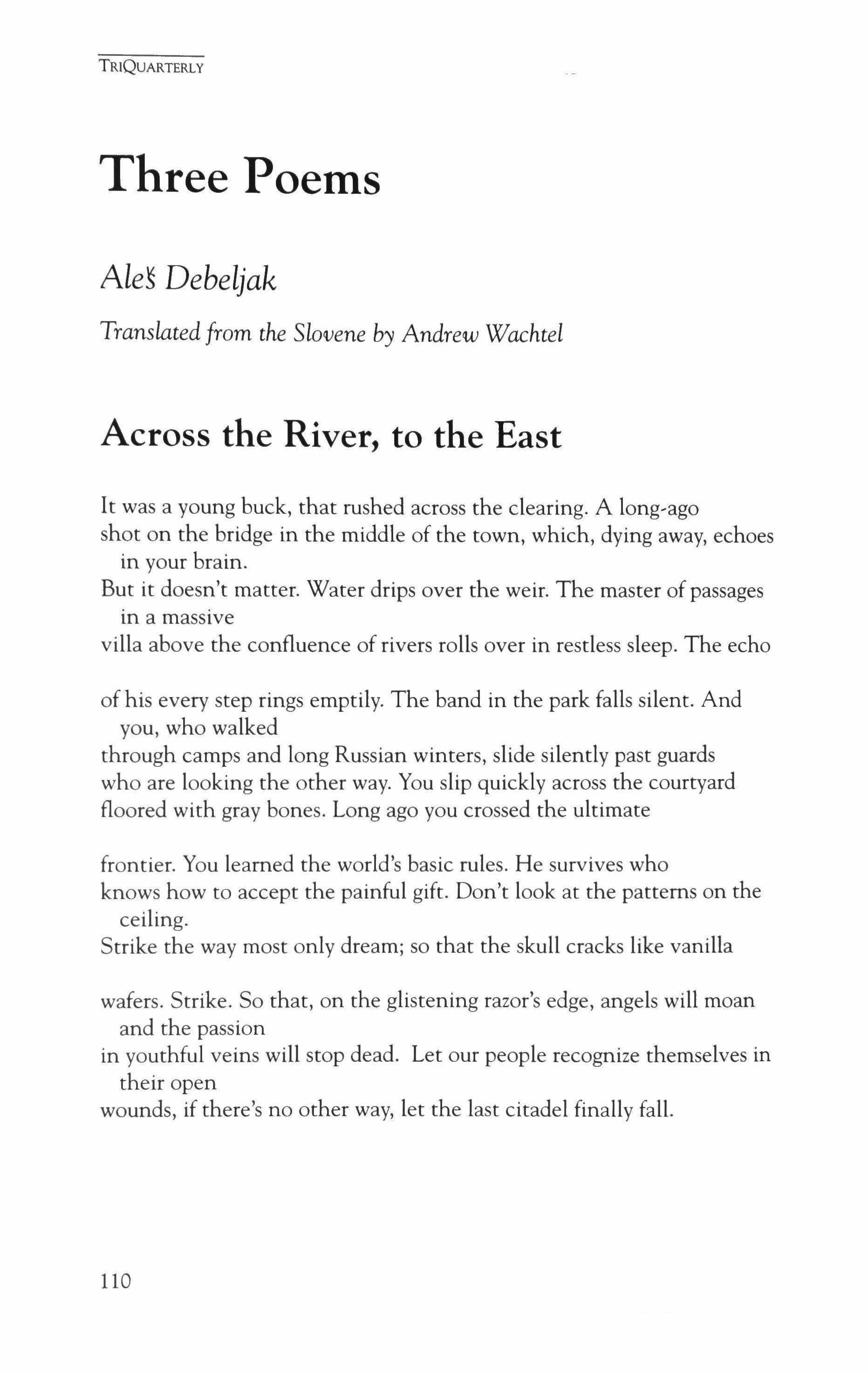
Three Poems
Ale� Debeljak
Translated from the Slovene by Andrew
Wachtel
Across the River, to the East
It was a young buck, that rushed across the clearing. A long-ago shot on the bridge in the middle of the town, which, dying away, echoes in your brain. But it doesn't matter. Water drips over the weir. The master of passages in a massive villa above the confluence of rivers rolls over in restless sleep. The echo of his every step rings emptily. The band in the park falls silent. And you, who walked through camps and long Russian winters, slide silently past guards who are looking the other way. You slip quickly across the courtyard floored with gray bones. Long ago you crossed the ultimate frontier. You learned the world's basic rules. He survives who knows how to accept the painful gift. Don't look at the patterns on the ceiling. Strike the way most only dream; so that the skull cracks like vanilla wafers. Strike. So that, on the glistening razor's edge, angels will moan and the passion in youthful veins will stop dead. Let our people recognize themselves in their open wounds, if there's no other way, let the last citadel finally fall.
TRIQUARTERLY
110
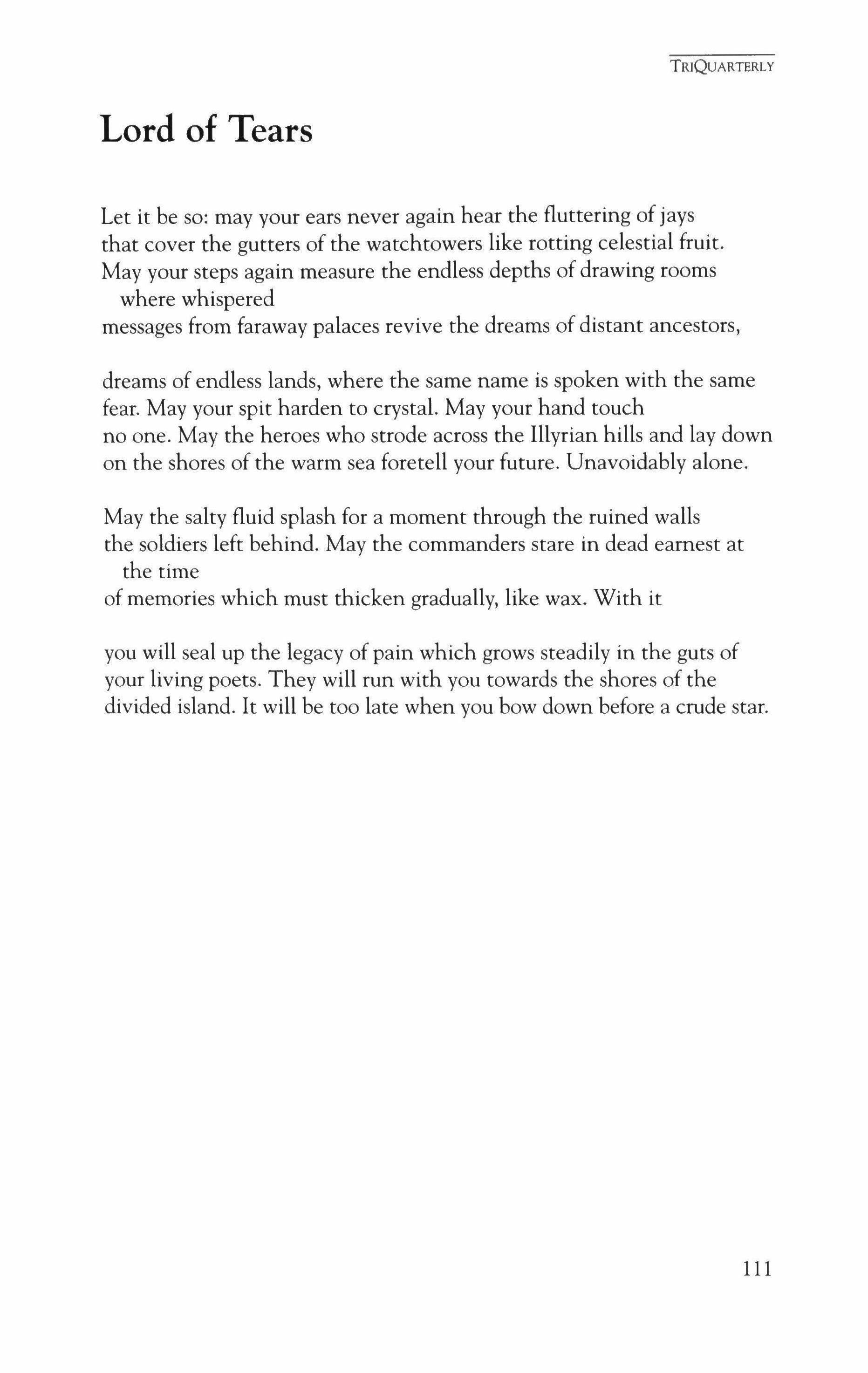
Lord of Tears
Let it be so: may your ears never again hear the fluttering of jays that cover the gutters of the watchtowers like rotting celestial fruit. May your steps again measure the endless depths of drawing rooms where whispered messages from faraway palaces revive the dreams of distant ancestors, dreams of endless lands, where the same name is spoken with the same fear. May your spit harden to crystal. May your hand touch no one. May the heroes who strode across the Illyrian hills and lay down on the shores of the warm sea foretell your future. Unavoidably alone.
May the salty fluid splash for a moment through the ruined walls the soldiers left behind. May the commanders stare in dead earnest at the time of memories which must thicken gradually, like wax. With it you will seal up the legacy of pain which grows steadily in the guts of your living poets. They will run with you towards the shores of the divided island. It will be too late when you bow down before a crude star.
TRIQUARTERLY
111

Migrations
Everything, you see everything: the dimness of the concert hall, dusty violins hurriedly placed on the parquet, the breathing of flies, a whistling teapot, a cartridge discharged into the dim dawn, a carpet's hunting motive, an inscription in the tongue of two prophets, things
that drown in endless light, cries which rise up to the sky, the shine of metals, a basilica, the smell of a garden, the dark verse of a sonnet, a column of children and weeping women, who carry newborns in their wide skirts, a thin stream of plum
juice which soaks into the turned earth, trodden by retreating battalions. Everything. The fresh tranquility of cemeteries, the painful metastases of forests in which the known world will rattle to an end. Ancient order of violence which returns to the hearth. How quiet the house is now. The girls' choir has fallen silent. But the track to the East will certainly remain.
No one can erase it. And you know that the steeple clock tolls for you and us.
TRIQUARTERLY
112
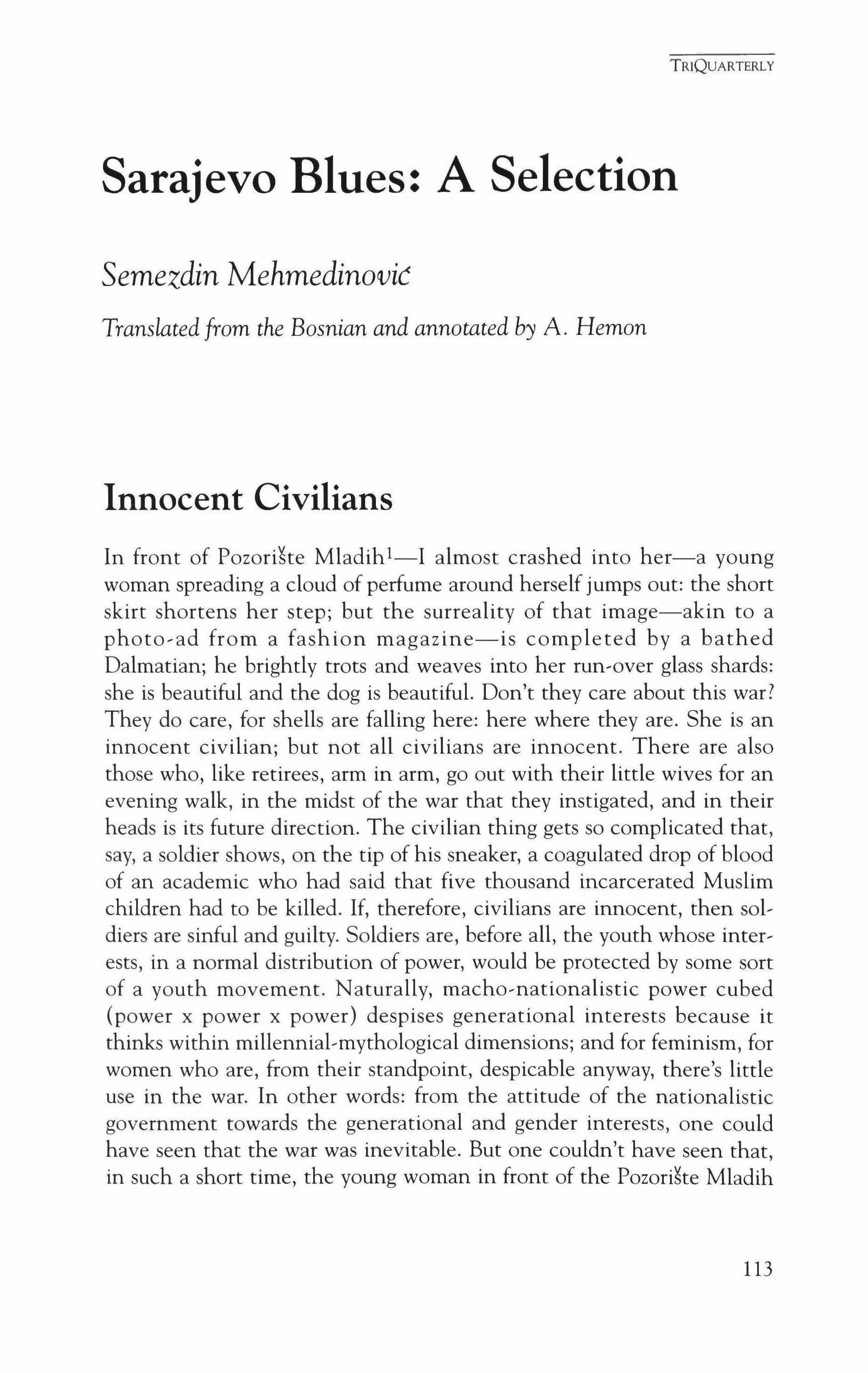
Sarajevo Blues: A Selection
Semezdin Mehmedinovic
Translated from the Bosnian and annotated by A. Hernon
Innocent Civilians
In front of Pozoriste MladihI-I almost crashed into her-a young woman spreading a cloud of perfume around herselfjumps out: the short skirt shortens her step; but the surreality of that image-akin to a photo-ad from a fashion magazine-is completed by a bathed Dalmatian; he brightly trots and weaves into her run-over glass shards: she is beautiful and the dog is beautiful. Don't they care about this war? They do care, for shells are falling here: here where they are. She is an innocent civilian; but not all civilians are innocent. There are also those who, like retirees, arm in arm, go out with their little wives for an evening walk, in the midst of the war that they instigated, and in their heads is its future direction. The civilian thing gets so complicated that, say, a soldier shows, on the tip of his sneaker, a coagulated drop of blood of an academic who had said that five thousand incarcerated Muslim children had to be killed. If, therefore, civilians are innocent, then soldiers are sinful and guilty. Soldiers are, before all, the youth whose interests, in a normal distribution of power, would be protected by some sort of a youth movement. Naturally, macho-nationalistic power cubed (power x power x power) despises generational interests because it thinks within millennial-mythological dimensions; and for feminism, for women who are, from their standpoint, despicable anyway, there's little use in the war. In other words: from the attitude of the nationalistic government towards the generational and gender interests, one could have seen that the war was inevitable. But one couldn't have seen that, in such a short time, the young woman in front of the Pozoriste Mladih
TRIQUARTERLY
113

will have awakened an almost forgotten memory of the world in which something complete, beautiful and fragrant exists. Something like a silk scarf.
Expulsion
The Chetniks- have expelled mental patients from jagomir ' into the city. One of them, that day, holds the body of a dead sparrow by tiny claws, approaches a passerby on Kralja Tomislavat and says: "And you will be dead too, when my army comes."
Wounded Parks
1) Compelled by the arrival of the winter, Sarajevo residents cut trees in the parks; if we exclude shells, the dominating sound in the city is the sound of a chain saw. Everyday images: with a steel cable, men pull for themselves, a poplar resists, swaying left and right, children running around and cheering, some for the men, some for the poplar, and when the tree falls, then the view of the Trebevic> woods bursts open; an exceptionally tall man, his hair gray and cut neat, in a new silk suit, with a bow tie, shining shoes, a briefcase in his left hand, in his right a rather large-severed in the park-chestnut bough, which he drags with effort through the lobby door.
2) "A true attack is being committed at the city green. Parks are being cut down, trees on the streets, even in the cemeteries. We appeal to the citizens to protect the city green. Those who disobey shall be severely punished." From this text, printed in the Sarajevo daily papers, I infer: if I don't protect the city green, being busy with my own work, I shall be severely punished. All the same, on the city's north side one can hear the sorrowful wailing of a chain saw; people in the city are desperate, as are all the underfed before the arrival of the winter.
The Lion
The former city cemetery is revived by the war. A bulldozer carves new graves into the ground; it digs them in advance, counting on corpses.
TRIQUARTERLY
114
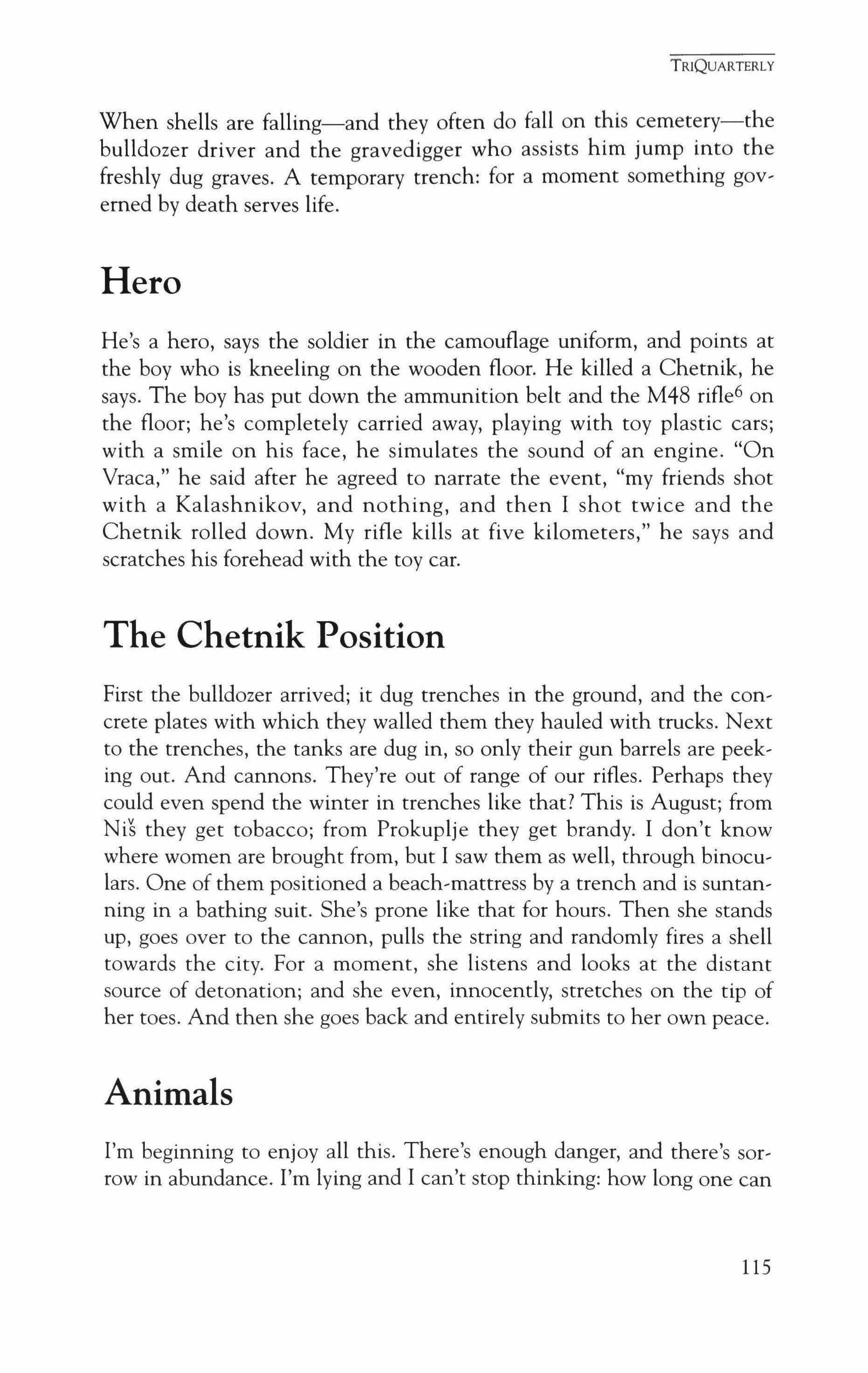
When shells are falling-and they often do fall on this cemetery-the bulldozer driver and the gravedigger who assists him jump into the freshly dug graves. A temporary trench: for a moment something governed by death serves life.
Hero
He's a hero, says the soldier in the camouflage uniform, and points at the boy who is kneeling on the wooden floor. He killed a Chetnik, he says. The boy has put down the ammunition belt and the M48 rifle6 on the floor; he's completely carried away, playing with toy plastic cars; with a smile on his face, he simulates the sound of an engine. "On Vraca," he said after he agreed to narrate the event, "my friends shot with a Kalashnikov, and nothing, and then I shot twice and the Chetnik rolled down. My rifle kills at five kilometers," he says and scratches his forehead with the toy car.
The Chetnik Position
First the bulldozer arrived; it dug trenches in the ground, and the con' crete plates with which they walled them they hauled with trucks. Next to the trenches, the tanks are dug in, so only their gun barrels are peek, ing out. And cannons. They're out of range of our rifles. Perhaps they could even spend the winter in trenches like that? This is August; from Nis they get tobacco; from Prokuplje they get brandy. I don't know where women are brought from, but I saw them as well, through binoculars. One of them positioned a beach,mattress by a trench and is suntan, ning in a bathing suit. She's prone like that for hours. Then she stands up, goes over to the cannon, pulls the string and randomly fires a shell towards the city. For a moment, she listens and looks at the distant source of detonation; and she even, innocently, stretches on the tip of her toes. And then she goes back and entirely submits to her own peace.
Animals
I'm beginning to enjoy all this. There's enough danger, and there's sorrow in abundance. I'm lying and I can't stop thinking: how long one can 115
TRIQUARTERLY
TRIQUARTERLY

bear a life like this? On my chest the cat sleeps. She is chosen; above her slanted pupils there is a pattern in the shape of the letter M. I didn't know that: you divulged that to me on the day I went wild and wanted to crush her: I wanted to crush her cat nature. Then you revealed the pattern on her forehead and said: Only the cats caressed by Mohammed have the M. Since then I let her do whatever she wants, sleep wherever she happens to be. I don't know how much longer one can bear a life like this. I get thrills every time, when at the thundering outside the cat snaps out of sleep and then, on my chest, I feel the slow unsheathing of the claws.
Looted Stores
1 ) A young man in a black uniform walks through the display window of an abandoned store; the military boots walk over the empty space, over thousands of pins with which compactly, close to the cardboard, men's shirts used to be pinned and packed into boxes. He sits at the register and taps the keys of the keyboard with his fingers; he pulls out a laser gun and points at the empty comers of the room; the red dot wanders over the wall, over the vacant shelves; he puts the gun down on his knee and, still sitting, opens the drawer in the desk, takes out a comb and carelessly pulls it through his hair. Then he takes out a little porcelain figure of Jesus on the cross, with the thorn wreath, and puts it on the desk: the clean contingence between his fingertips and the porcelain figure. Slightly bent, he pulls out from underneath his feet a box with no lid, containing a shirt. A sneaker sale impressed on the chest of the still-packed shirt; he moves his hand over the collar as if brushing it; pulls a pin out of the shirt and with the butt of his pistol pounds it into the wooden edge of the desk. He puts the figure of the crucified Christ on the shirt where the sale of the sneaker is impressed; and then he puts the box with its entire contents on the desk. He gets up, with the pistol dangling under his armpit and, combing his hair, goes out.
2) Perhaps because it is war, only because of that: it crosses my mind that the factory packing of shirts, with hundreds of little needles in them, is the marketing derision of the sufferings of that wonderful Jewish boy.
116
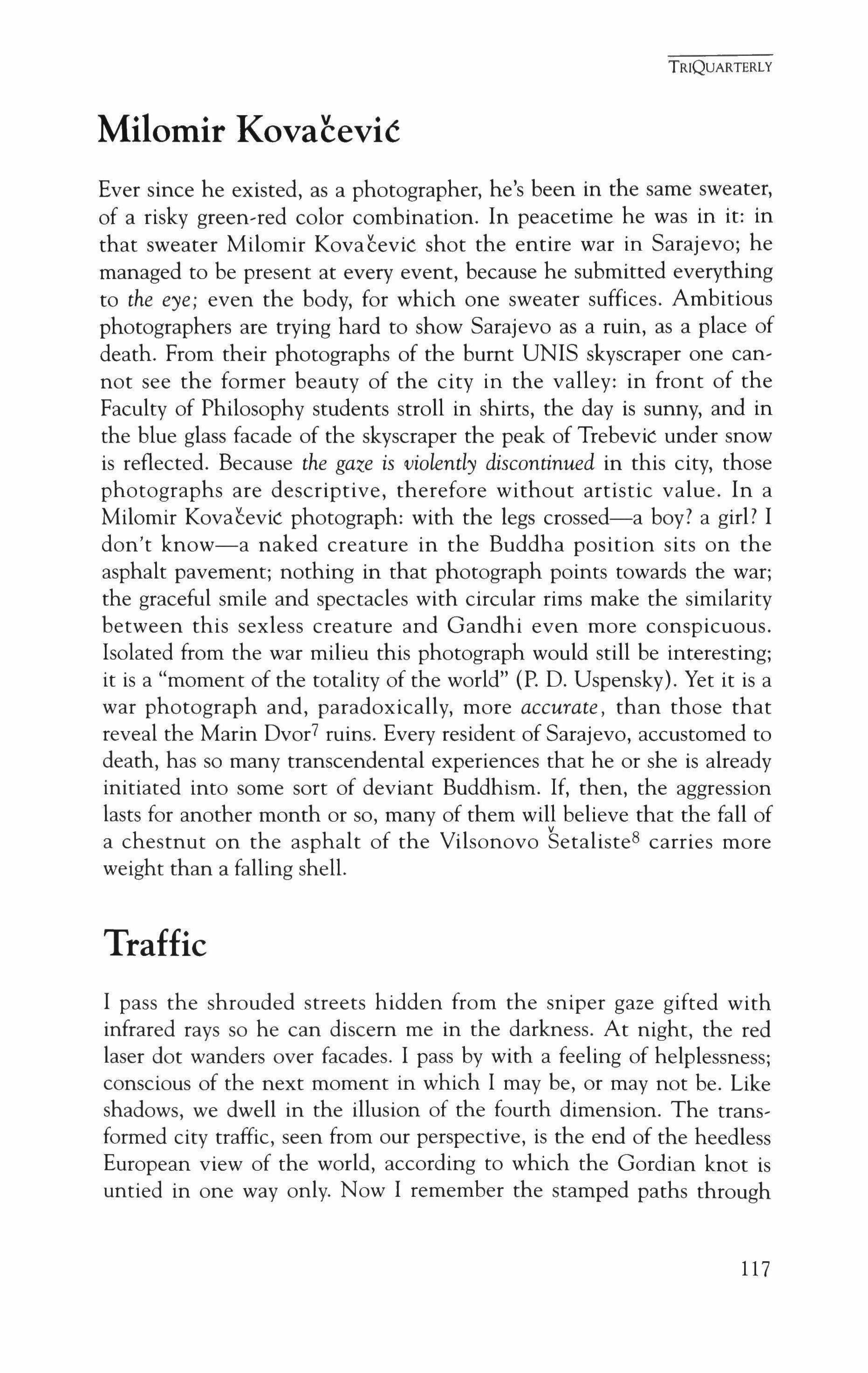
Milomir Kovacevic
Ever since he existed, as a photographer, he's been in the same sweater, of a risky green-red color combination. In peacetime he was in it: in that sweater Milornir Kovacevic shot the entire war in Sarajevo; he managed to be present at every event, because he submitted everything to the eye; even the body, for which one sweater suffices. Ambitious photographers are trying hard to show Sarajevo as a ruin, as a place of death. From their photographs of the burnt UNIS skyscraper one cannot see the former beauty of the city in the valley: in front of the Faculty of Philosophy students stroll in shirts, the day is sunny, and in the blue glass facade of the skyscraper the peak of Trebevic under snow is reflected. Because the gaze is violently discontinued in this city, those photographs are descriptive, therefore without artistic value. In a Milomir Kovacevic photograph: with the legs crossed-a boy? a girl? I don't know-a naked creature in the Buddha position sits on the asphalt pavement; nothing in that photograph points towards the war; the graceful smile and spectacles with circular rims make the similarity between this sexless creature and Gandhi even more conspicuous. Isolated from the war milieu this photograph would still be interesting; it is a "moment of the totality of the world" (P. D. Uspensky). Yet it is a war photograph and, paradoxically, more accurate, than those that reveal the Marin Dvor? ruins. Every resident of Sarajevo, accustomed to death, has so many transcendental experiences that he or she is already initiated into some sort of deviant Buddhism. If, then, the aggression lasts for another month or so, many of them will believe that the fall of a chestnut on the asphalt of the Vilsonovo Setaliste8 carries more weight than a falling shell.
Traffic
I pass the shrouded streets hidden from the sniper gaze gifted with infrared rays so he can discern me in the darkness. At night, the red laser dot wanders over facades. I pass by with a feeling of helplessness; conscious of the next moment in which I may be, or may not be. Like shadows, we dwell in the illusion of the fourth dimension. The transformed city traffic, seen from our perspective, is the end of the heedless European view of the world, according to which the Gordian knot is untied in one way only. Now I remember the stamped paths through
TRIQUARTERLY
117
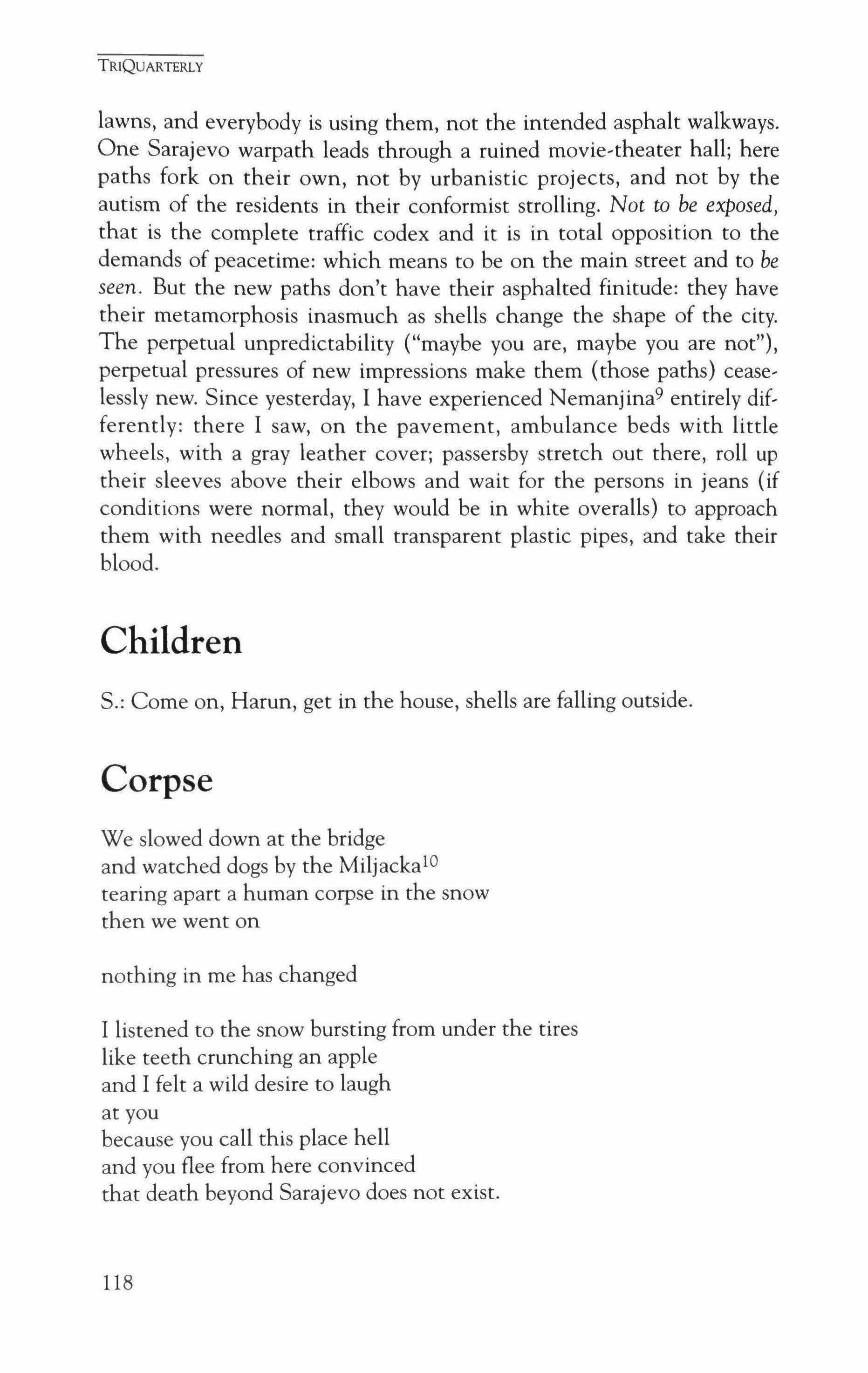
lawns, and everybody is using them, not the intended asphalt walkways. One Sarajevo warpath leads through a ruined movie-theater hall; here paths fork on their own, not by urbanistic projects, and not by the autism of the residents in their conformist strolling. Not to be exposed, that is the complete traffic codex and it is in total opposition to the demands of peacetime: which means to be on the main street and to be seen. But the new paths don't have their asphalted finitude: they have their metamorphosis inasmuch as shells change the shape of the city. The perpetual unpredictability ("maybe you are, maybe you are not"), perpetual pressures of new impressions make them (those paths) ceaselessly new. Since yesterday, I have experienced Nernanjina? entirely differently: there I saw, on the pavement, ambulance beds with little wheels, with a gray leather cover; passersby stretch out there, roll up their sleeves above their elbows and wait for the persons in jeans (if conditions were normal, they would be in white overalls) to approach them with needles and small transparent plastic pipes, and take their blood.
Children
S.: Come on, Harun, get in the house, shells are falling outside.
Corpse
We slowed down at the bridge and watched dogs by the Miljacka'P tearing apart a human corpse in the snow then we went on nothing in me has changed
I listened to the snow bursting from under the tires like teeth crunching an apple and I felt a wild desire to laugh at you because you call this place hell and you flee from here convinced that death beyond Sarajevo does not exist.
TRIQUARTERLY
118
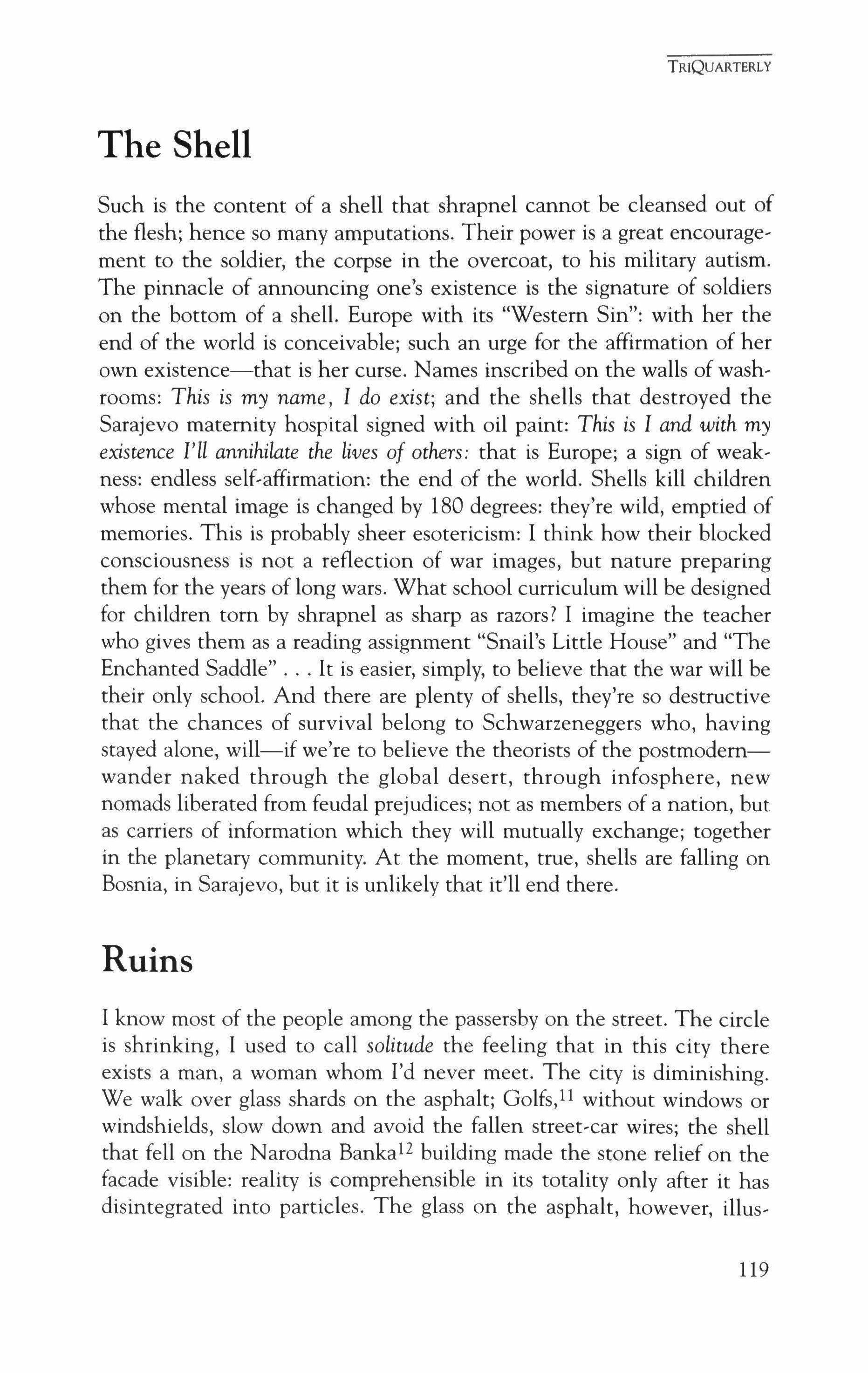
The Shell
Such is the content of a shell that shrapnel cannot be cleansed out of the flesh; hence so many amputations. Their power is a great encouragement to the soldier, the corpse in the overcoat, to his military autism. The pinnacle of announcing one's existence is the signature of soldiers on the bottom of a shell. Europe with its "Western Sin": with her the end of the world is conceivable; such an urge for the affirmation of her own existence-that is her curse. Names inscribed on the walls of washrooms: This is my name, I do exist; and the shells that destroyed the Sarajevo maternity hospital signed with oil paint: This is I and with my existence I'll annihilate the lives of others: that is Europe; a sign of weakness: endless self-affirmation: the end of the world. Shells kill children whose mental image is changed by 180 degrees: they're wild, emptied of memories. This is probably sheer esotericism: I think how their blocked consciousness is not a reflection of war images, but nature preparing them for the years of long wars. What school curriculum will be designed for children tom by shrapnel as sharp as razors? I imagine the teacher who gives them as a reading assignment "Snail's Little House" and "The Enchanted Saddle" It is easier, simply, to believe that the war will be their only school. And there are plenty of shells, they're so destructive that the chances of survival belong to Schwarzeneggers who, having stayed alone, will-if we're to believe the theorists of the postmodernwander naked through the global desert, through infosphere, new nomads liberated from feudal prejudices; not as members of a nation, but as carriers of information which they will mutually exchange; together in the planetary community. At the moment, true, shells are falling on Bosnia, in Sarajevo, but it is unlikely that it'll end there.
Ruins
I know most of the people among the passersby on the street. The circle is shrinking, I used to call solitude the feeling that in this city there exists a man, a woman whom I'd never meet. The city is diminishing. We walk over glass shards on the asphalt; Golfs,U without windows or windshields, slow down and avoid the fallen street-car wires; the shell that fell on the Narodna Bankal- building made the stone relief on the facade visible: reality is comprehensible in its totality only after it has disintegrated into particles. The glass on the asphalt, however, illus-
TRIQUARTERLY
119
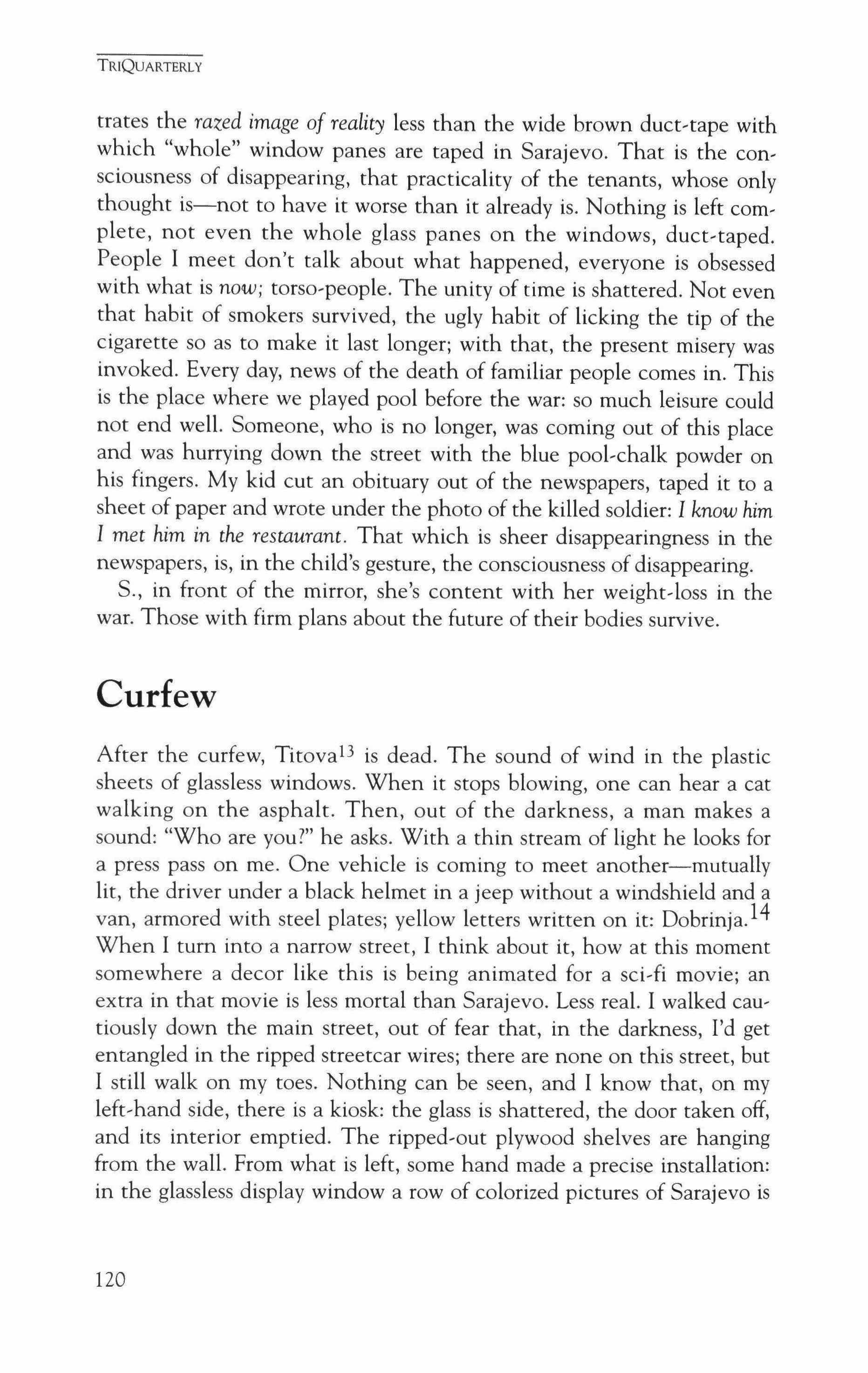
trates the razed image of reality less than the wide brown duct-tape with which "whole" window panes are taped in Sarajevo. That is the consciousness of disappearing, that practicality of the tenants, whose only thought is-not to have it worse than it already is. Nothing is left complete, not even the whole glass panes on the windows, duct-taped. People I meet don't talk about what happened, everyone is obsessed with what is now; torso-people. The unity of time is shattered. Not even that habit of smokers survived, the ugly habit of licking the tip of the cigarette so as to make it last longer; with that, the present misery was invoked. Every day, news of the death of familiar people comes in. This is the place where we played pool before the war: so much leisure could not end well. Someone, who is no longer, was coming out of this place and was hurrying down the street with the blue pool-chalk powder on his fingers. My kid cut an obituary out of the newspapers, taped it to a sheet of paper and wrote under the photo of the killed soldier: I know him I met him in the restaurant. That which is sheer disappearingness in the newspapers, is, in the child's gesture, the consciousness of disappearing. S., in front of the mirror, she's content with her weight-loss in the war. Those with firm plans about the future of their bodies survive.
Curfew
After the curfew, Titova13 is dead. The sound of wind in the plastic sheets of glassless windows. When it stops blowing, one can hear a cat walking on the asphalt. Then, out of the darkness, a man makes a sound: "Who are you!" he asks. With a thin stream of light he looks for a press pass on me. One vehicle is coming to meet another-mutually lit, the driver under a black helmet in a jeep without a windshield and a van, armored with steel plates; yellow letters written on it: Dobrinja.14 When I tum into a narrow street, I think about it, how at this moment somewhere a decor like this is being animated for a sci-fi movie; an extra in that movie is less mortal than Sarajevo. Less real. I walked cautiously down the main street, out of fear that, in the darkness, I'd get entangled in the ripped streetcar wires; there are none on this street, but I still walk on my toes. Nothing can be seen, and I know that, on my left-hand side, there is a kiosk: the glass is shattered, the door taken off, and its interior emptied. The ripped-out plywood shelves are hanging from the wall. From what is left, some hand made a precise installation: in the glassless display window a row of colorized pictures of Sarajevo is
TRIQUARTERLY
120
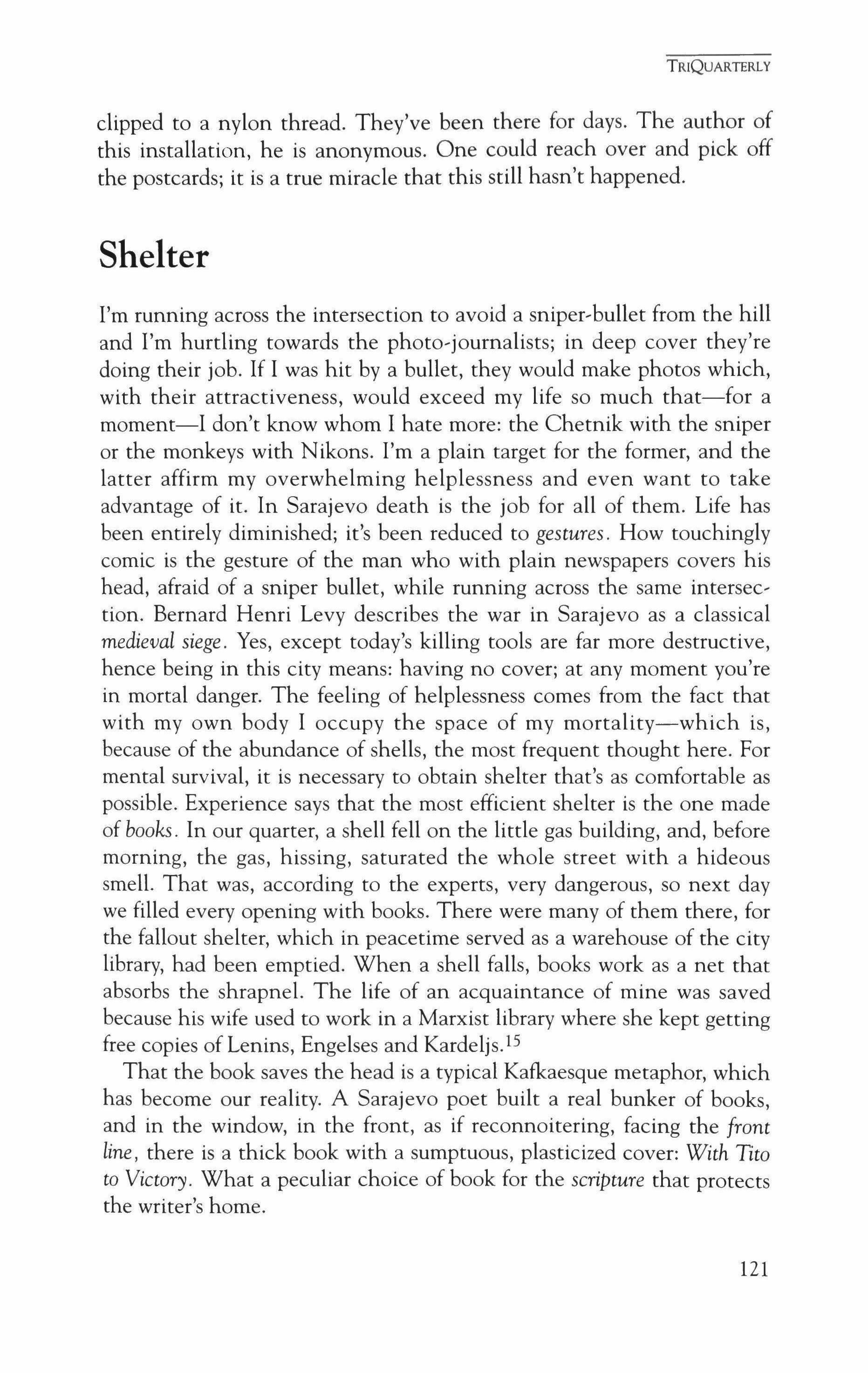
clipped to a nylon thread. They've been there for days. The author of this installation, he is anonymous. One could reach over and pick off the postcards; it is a true miracle that this still hasn't happened.
Shelter
I'm running across the intersection to avoid a sniper-bullet from the hill and I'm hurtling towards the photo-journalists: in deep cover they're doing their job. If I was hit by a bullet, they would make photos which, with their attractiveness, would exceed my life so much that-for a moment-I don't know whom I hate more: the Chetnik with the sniper or the monkeys with Nikons. I'm a plain target for the former, and the latter affirm my overwhelming helplessness and even want to take advantage of it. In Sarajevo death is the job for all of them. Life has been entirely diminished; it's been reduced to gestures. How touchingly comic is the gesture of the man who with plain newspapers covers his head, afraid of a sniper bullet, while running across the same intersection. Bernard Henri Levy describes the war in Sarajevo as a classical medieval siege. Yes, except today's killing tools are far more destructive, hence being in this city means: having no cover; at any moment you're in mortal danger. The feeling of helplessness comes from the fact that with my own body I occupy the space of my mortality-which is, because of the abundance of shells, the most frequent thought here. For mental survival, it is necessary to obtain shelter that's as comfortable as possible. Experience says that the most efficient shelter is the one made of books. In our quarter, a shell fell on the little gas building, and, before morning, the gas, hissing, saturated the whole street with a hideous smell. That was, according to the experts, very dangerous, so next day we filled every opening with books. There were many of them there, for the fallout shelter, which in peacetime served as a warehouse of the city library, had been emptied. When a shell falls, books work as a net that absorbs the shrapnel. The life of an acquaintance of mine was saved because his wife used to work in a Marxist library where she kept getting free copies of Lenins, Engelses and Kardcljs.l"
That the book saves the head is a typical Kafkaesque metaphor, which has become our reality. A Sarajevo poet built a real bunker of books, and in the window, in the front, as if reconnoitering, facing the front line, there is a thick book with a sumptuous, plasticized cover: With Tito to Victory. What a peculiar choice of book for the scripture that protects the writer's home.
TRIQUARTERLY
121
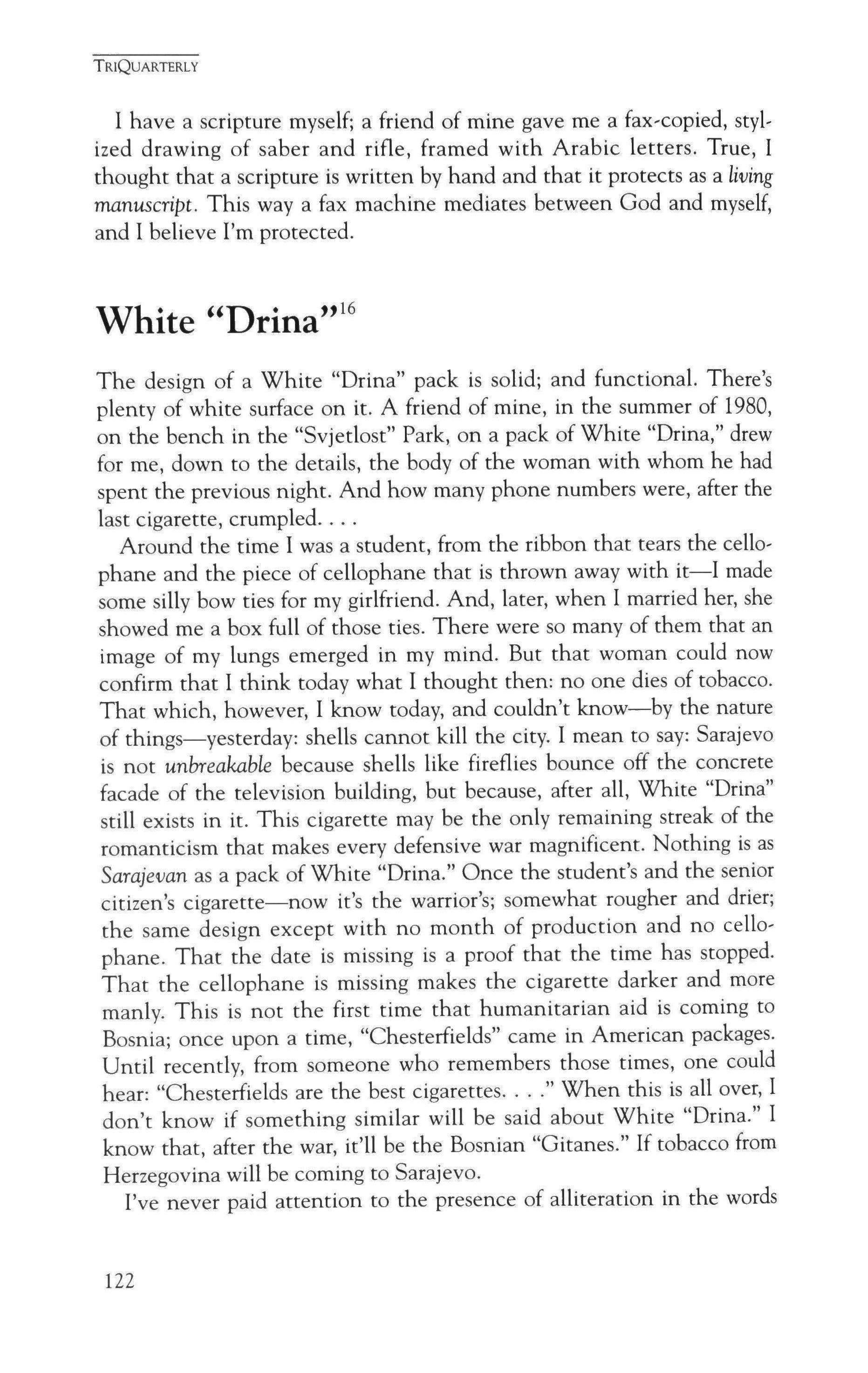
I have a scripture myself; a friend of mine gave me a fax-copied, stylized drawing of saber and rifle, framed with Arabic letters. True, I thought that a scripture is written by hand and that it protects as a living manuscript. This way a fax machine mediates between God and myself, and I believe I'm protected.
White "Drina"16
The design of a White "Drina" pack is solid; and functional. There's plenty of white surface on it. A friend of mine, in the summer of 1980, on the bench in the "Svjetlost" Park, on a pack of White "Drina," drew for me, down to the details, the body of the woman with whom he had spent the previous night. And how many phone numbers were, after the last cigarette, crumpled
Around the time I was a student, from the ribbon that tears the cellophane and the piece of cellophane that is thrown away with it-I made some silly bow ties for my girlfriend. And, later, when I married her, she showed me a box full of those ties. There were so many of them that an image of my lungs emerged in my mind. But that woman could now confirm that I think today what I thought then: no one dies of tobacco. That which, however, I know today, and couldn't know-by the nature of things-yesterday: shells cannot kill the city. I mean to say: Sarajevo is not unbreakable because shells like fireflies bounce off the concrete facade of the television building, but because, after all, White "Drina" still exists in it. This cigarette may be the only remaining streak of the romanticism that makes every defensive war magnificent. Nothing is as Sarajevan as a pack of White "Drina." Once the student's and the senior citizen's cigarette-now it's the warrior's; somewhat rougher and drier; the same design except with no month of production and no cellophane. That the date is missing is a proof that the time has stopped. That the cellophane is missing makes the cigarette darker and more manly. This is not the first time that humanitarian aid is coming to Bosnia; once upon a time, "Chesterfields" came in American packages. Until recently, from someone who remembers those times, one could hear: "Chesterfields are the best cigarettes When this is all over, I don't know if something similar will be said about White "Drina." I know that, after the war, it'll be the Bosnian "Gitanes." If tobacco from Herzegovina will be coming to Sarajevo.
I've never paid attention to the presence of alliteration in the words
TRIQUARTERLY
122
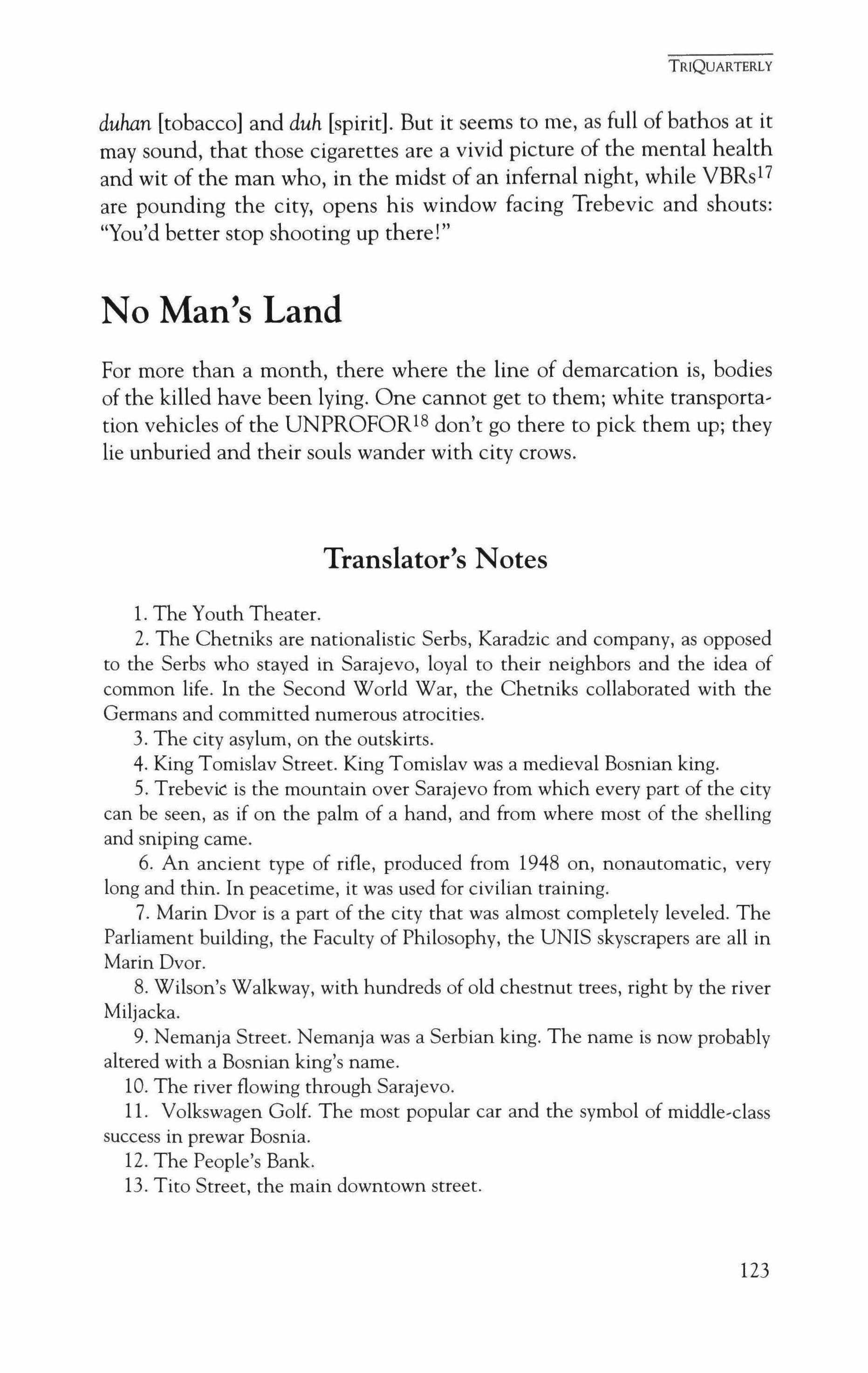
duhan [tobacco] and duh [spirit]. But it seems to me, as full of bathos at it may sound, that those cigarettes are a vivid picture of the mental health and wit of the man who, in the midst of an infernal night, while VBRs17 are pounding the city, opens his window facing Trebevic and shouts: "You'd better stop shooting up there!"
No Man's Land
For more than a month, there where the line of demarcation is, bodies of the killed have been lying. One cannot get to them; white transportation vehicles of the UNPROFOR18 don't go there to pick them up; they lie unburied and their souls wander with city crows.
Translator's Notes
1. The Youth Theater.
2. The Chetniks are nationalistic Serbs, Karadzic and company, as opposed to the Serbs who stayed in Sarajevo, loyal to their neighbors and the idea of common life. In the Second World War, the Chetniks collaborated with the Germans and committed numerous atrocities.
3. The city asylum, on the outskirts.
4. King Tomislav Street. King Tomislav was a medieval Bosnian king.
5. Trebevic is the mountain over Sarajevo from which every part of the city can be seen, as if on the palm of a hand, and from where most of the shelling and sniping came.
6. An ancient type of rifle, produced from 1948 on, nonautomatic, very long and thin. In peacetime, it was used for civilian training.
7. Marin Dvor is a part of the city that was almost completely leveled. The Parliament building, the Faculty of Philosophy, the UNIS skyscrapers are all in Marin Dvor.
8. Wilson's Walkway, with hundreds of old chestnut trees, right by the river Miljacka.
9. Nemanja Street. Nemanja was a Serbian king. The name is now probably altered with a Bosnian king's name.
10. The river flowing through Sarajevo.
11. Volkswagen Golf. The most popular car and the symbol of middle-class success in prewar Bosnia.
12. The People's Bank.
13. Tito Street, the main downtown street.
TRIQUARTERLY
123

14. A southwestern part of the city, near the airport, virtually cut off from the rest of the city.
15. Edvard Kardelj was Tito's prolix deputy ideologist and wrote many books, omnipresent in the communist era.
16. The river Drina is a geographical border between Bosnia and Serbia. In the former Yugoslavia, cigarettes often had geographical names. So there was a brand "Drina," whose packaging was red, produced by Serbian factories. Hence White "Drina," manufactured in Sarajevo.
17. Multi-rocket launchers.
18. The United Nations Protection Force.
TRIQUARTERLY
124

The Man from the Death Institute: A Selection
Novica Tadic
Translated from the Serbian by
A. Hernon
The Working Room
One chair one desk
One curtain on the window, blind one bed-cauldron-bed one circular nightstand, beside it
Little things over the gray floor strewn combs coils saws husks rags mice droppings bones dark matter
The door lost in the thick wall the sagging ceiling the comers in a dreadful squeeze united
On the desk an open book the Manuscript and an angel's feather stuck in my back
TRIQUARTERLY 125
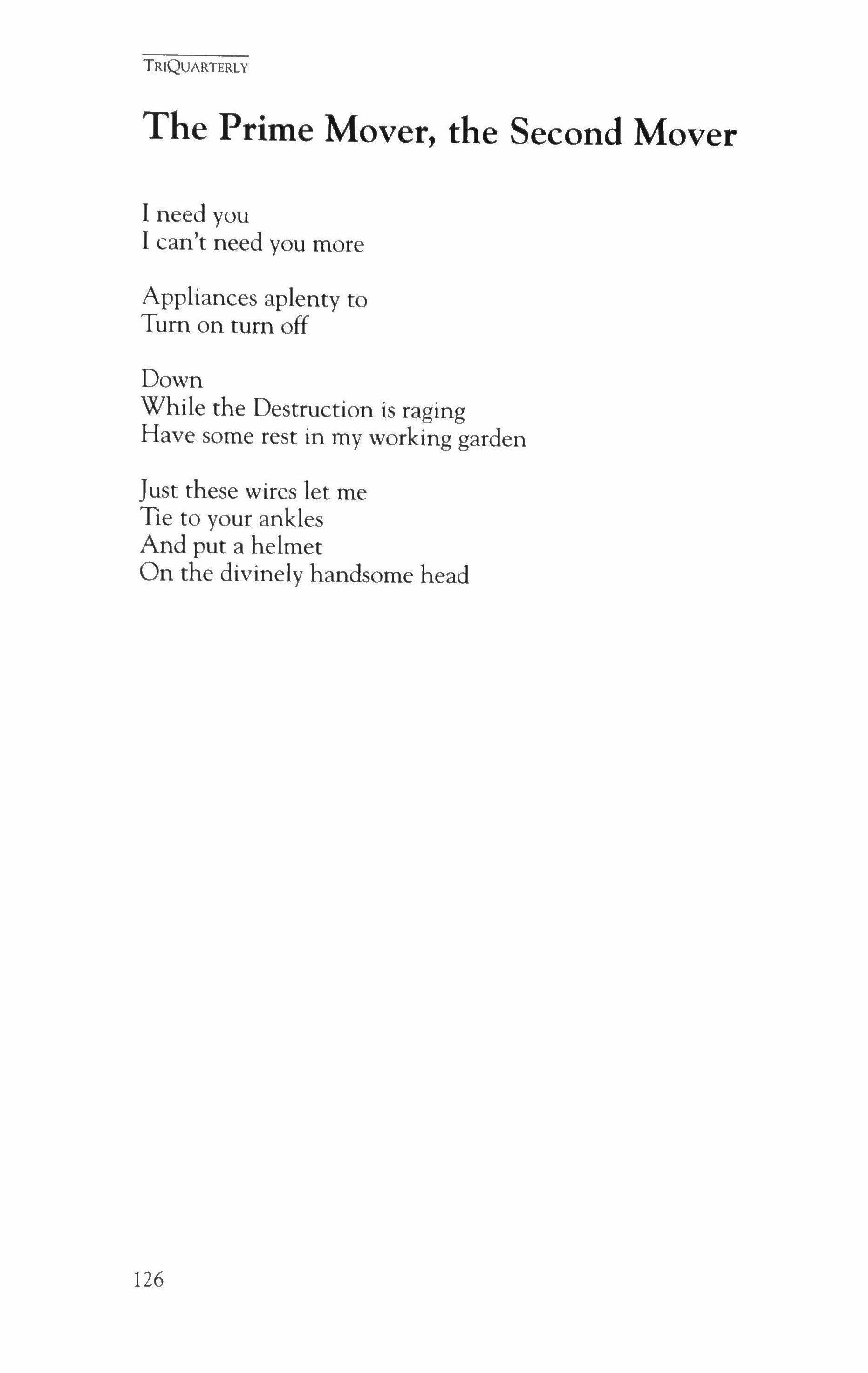
The Prime Mover, the Second Mover
I need you I can't need you more
Appliances aplenty to Turn on turn off
Down
While the Destruction is raging Have some rest in my working garden
Just these wires let me Tie to your ankles And put a helmet On the divinely handsome head
TRIQUARTERLY
126
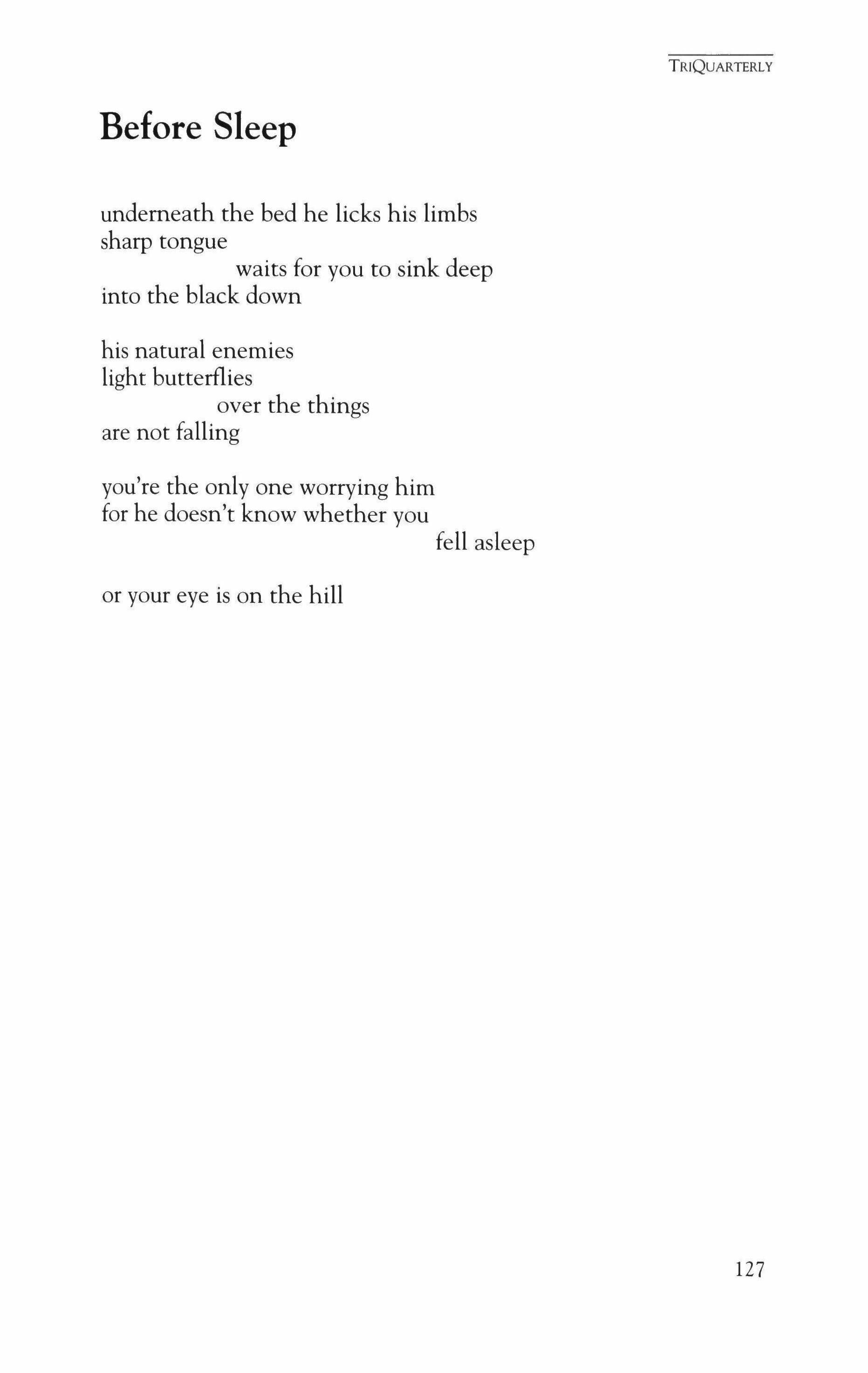
Before Sleep
underneath the bed he licks his limbs sharp tongue waits for you to sink deep into the black down his natural enemies light butterflies over the things are not falling
you're the only one worrying him for he doesn't know whether you fell asleep or your eye is on the hill
TRIQUARTERLY
127
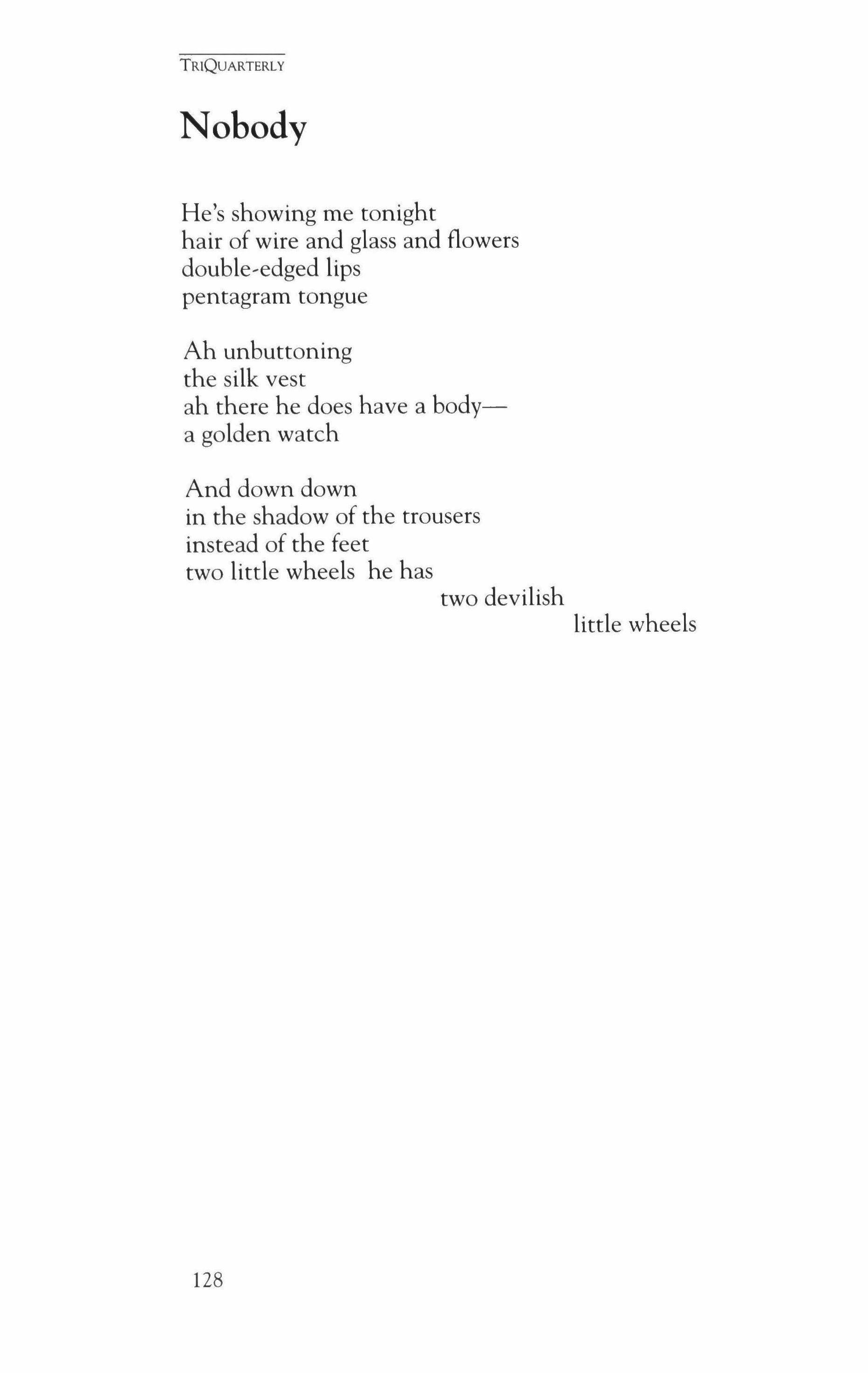
Nobody
He's showing me tonight hair of wire and glass and flowers
double-edged lips
pentagram tongue
Ah unbuttoning the silk vest ah there he does have a bodya golden watch
And down down in the shadow of the trousers instead of the feet two little wheels he has two devilish little wheels
TRIQUARTERLY
128
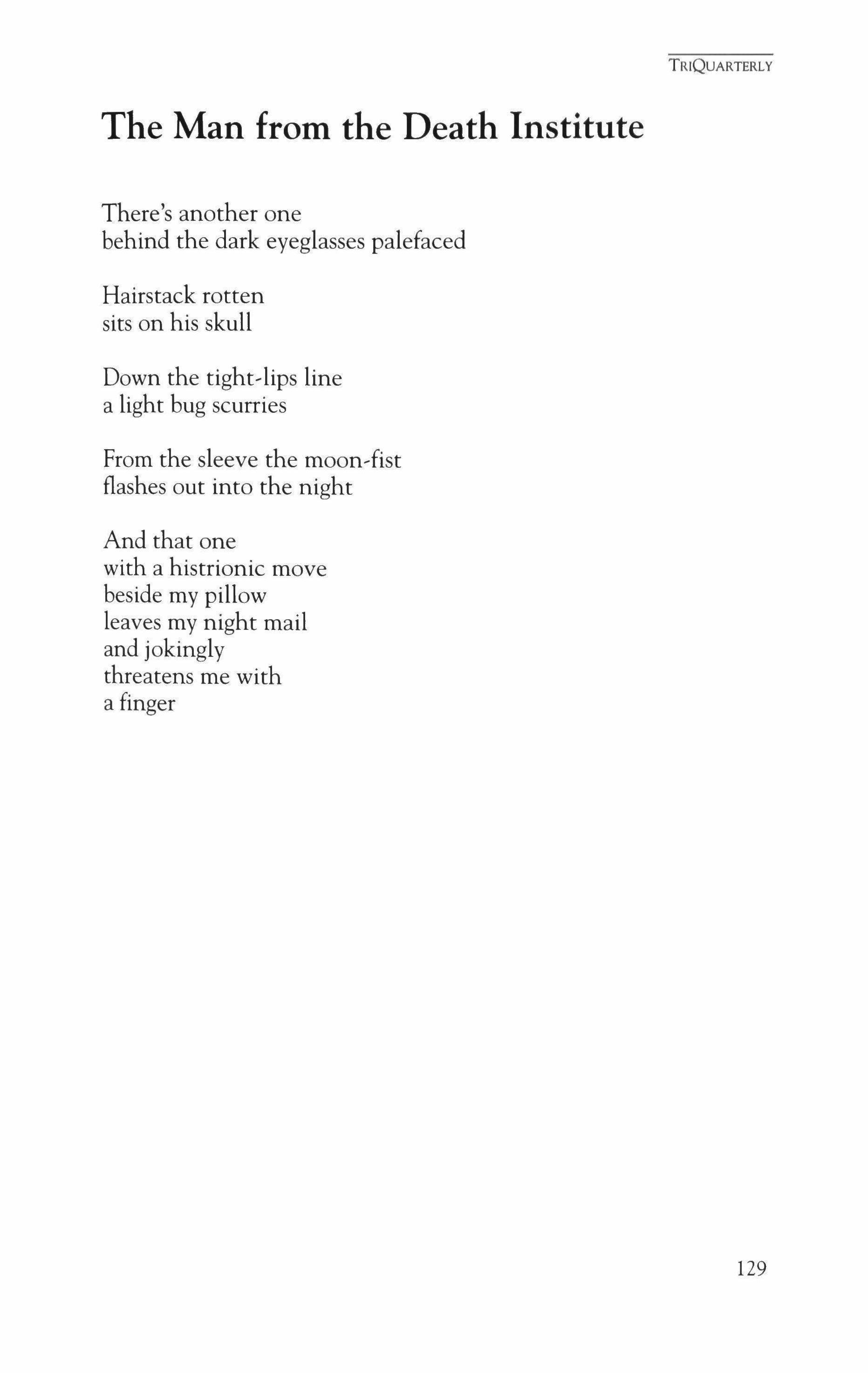
The Man from the Death Institute
There's another one behind the dark eyeglasses palefaced
Hairstack rotten sits on his skull
Down the tight-lips line a light bug scurries
From the sleeve the moon-fist flashes out into the night
And that one with a histrionic move beside my pillow leaves my night mail and jokingly threatens me with a finger
TRIQUARTERLY 129
From the Second World War to This War: Croation Literary Life Between Ideology and Nationalism
Ivan Matkovic
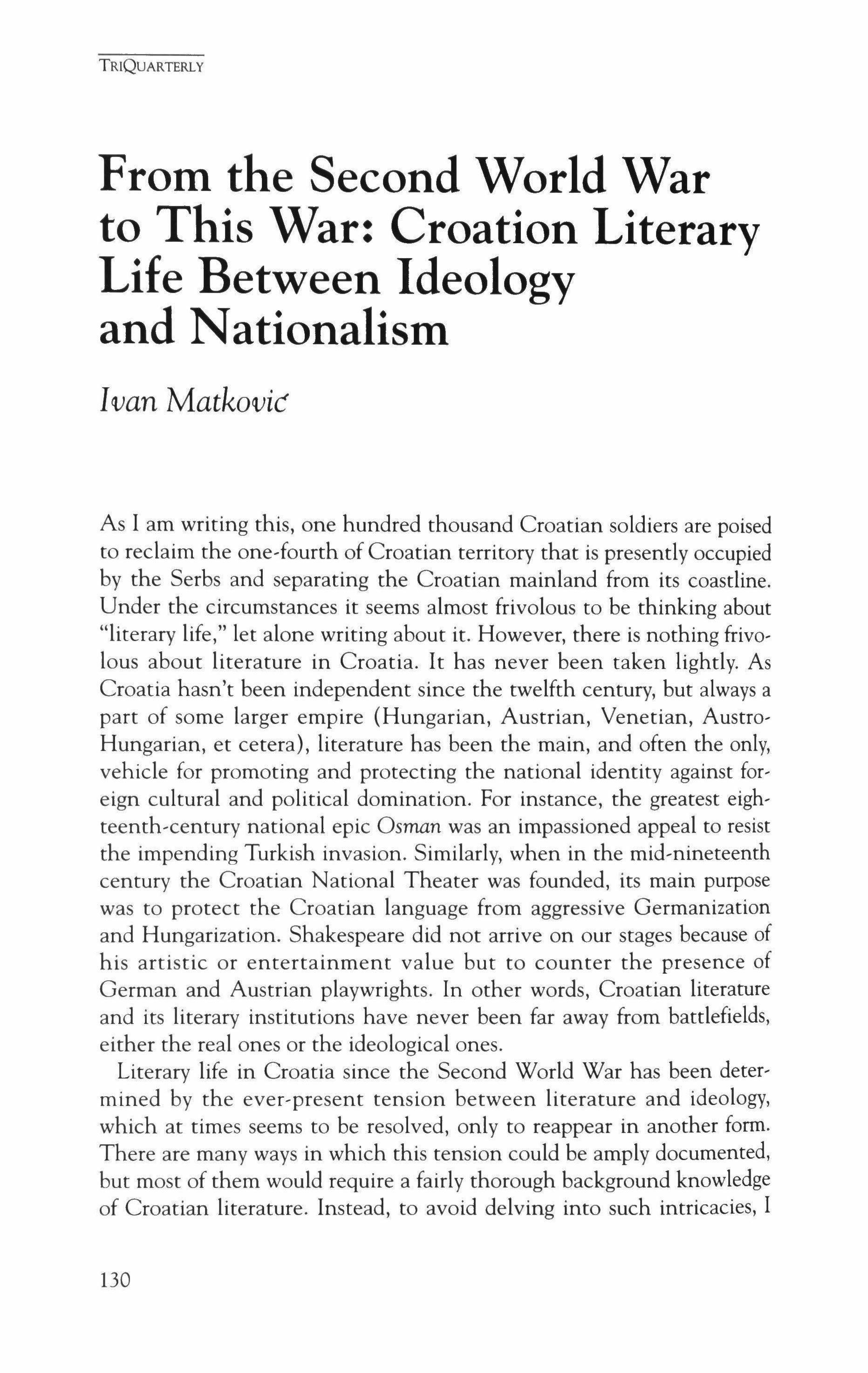
As I am writing this, one hundred thousand Croatian soldiers are poised to reclaim the one-fourth of Croatian territory that is presently occupied by the Serbs and separating the Croatian mainland from its coastline. Under the circumstances it seems almost frivolous to be thinking about "literary life," let alone writing about it. However, there is nothing frivolous about literature in Croatia. It has never been taken lightly. As Croatia hasn't been independent since the twelfth century, but always a part of some larger empire (Hungarian, Austrian, Venetian, AustroHungarian, et cetera), literature has been the main, and often the only, vehicle for promoting and protecting the national identity against foreign cultural and political domination. For instance, the greatest eighteenth-century national epic Osman was an impassioned appeal to resist the impending Turkish invasion. Similarly, when in the mid-nineteenth century the Croatian National Theater was founded, its main purpose was to protect the Croatian language from aggressive Germanization and Hungarization. Shakespeare did not arrive on our stages because of his artistic or entertainment value but to counter the presence of German and Austrian playwrights. In other words, Croatian literature and its literary institutions have never been far away from battlefields, either the real ones or the ideological ones.
Literary life in Croatia since the Second World War has been determined by the ever-present tension between literature and ideology, which at times seems to be resolved, only to reappear in another form. There are many ways in which this tension could be amply documented, but most of them would require a fairly thorough background knowledge of Croatian literature. Instead, to avoid delving into such intricacies, I
TRIQUARTERLY
130
have decided to illustrate them by explaining the history of the reception of American literature in Croatia, which, although it may seem a peripheral cultural phenomenon, does illuminate the nature of the relationship between literature and ideology and therefore, albeit indirectly, the nature of "literary life." For the story of "literary life" in our country {which may perhaps be taken as indicative of "literary life" in other countries formerly a part of the Soviet bloc} is a story of ideological control, independent of the particular ideology which exercises that control.
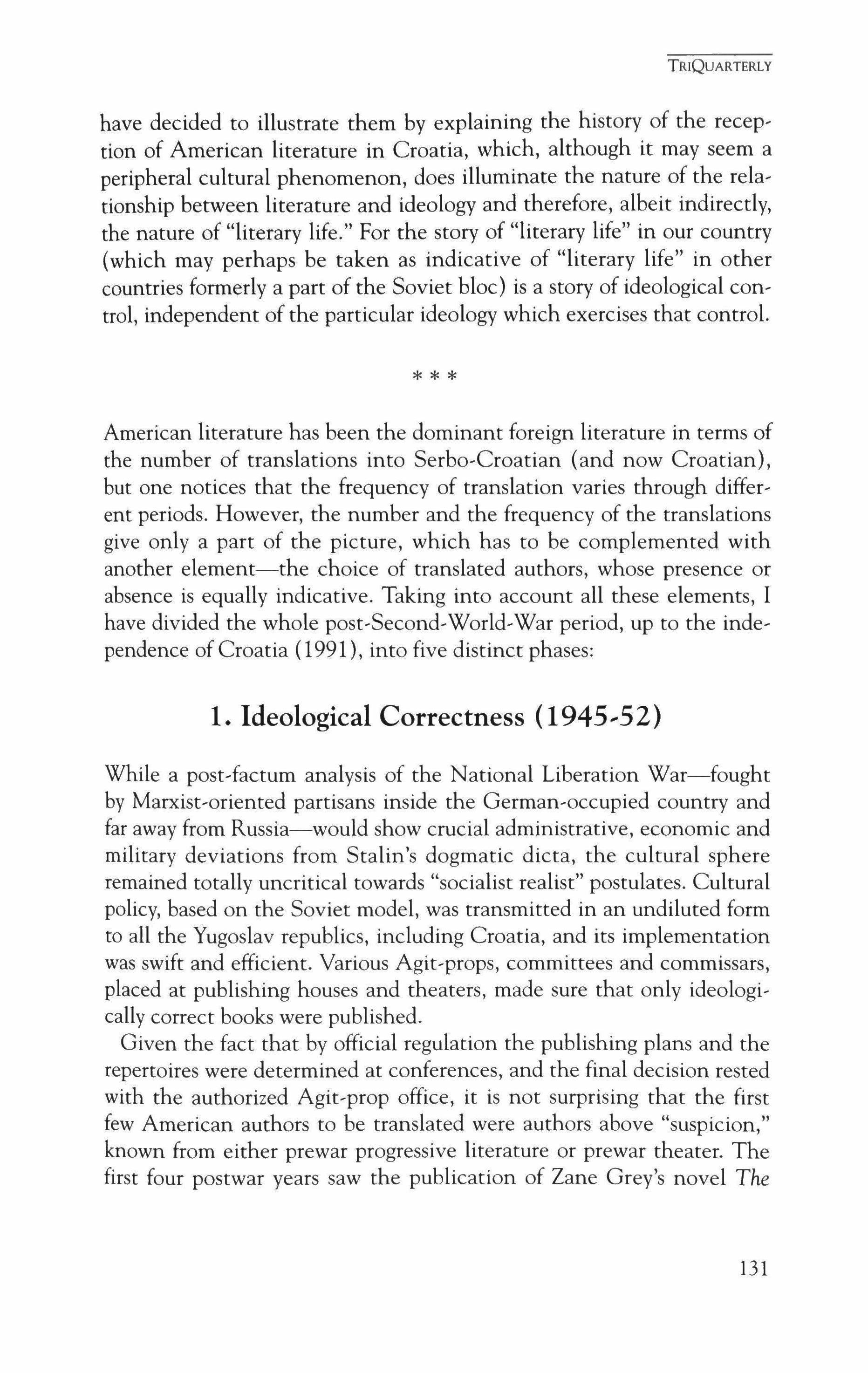
American literature has been the dominant foreign literature in terms of the number of translations into Serbo-Croatian {and now Croatian}, but one notices that the frequency of translation varies through different periods. However, the number and the frequency of the translations give only a part of the picture, which has to be complemented with another element-the choice of translated authors, whose presence or absence is equally indicative. Taking into account all these elements, I have divided the whole post-Second-World-War period, up to the independence of Croatia (1991), into five distinct phases:
1. Ideological Correctness (1945 52)
While a post-factum analysis of the National Liberation War-fought by Marxist-oriented partisans inside the German-occupied country and far away from Russia-would show crucial administrative, economic and military deviations from Stalin's dogmatic dicta, the cultural sphere remained totally uncritical towards "socialist realist" postulates. Cultural policy, based on the Soviet model, was transmitted in an undiluted form to all the Yugoslav republics, including Croatia, and its implementation was swift and efficient. Various Agit-props, committees and commissars, placed at publishing houses and theaters, made sure that only ideologically correct books were published.
Given the fact that by official regulation the publishing plans and the repertoires were determined at conferences, and the final decision rested with the authorized Agit-prop office, it is not surprising that the first few American authors to be translated were authors above "suspicion," known from either prewar progressive literature or prewar theater. The first four postwar years saw the publication of Zane Grey's novel The 131
TRIQUARTERLY
* * *
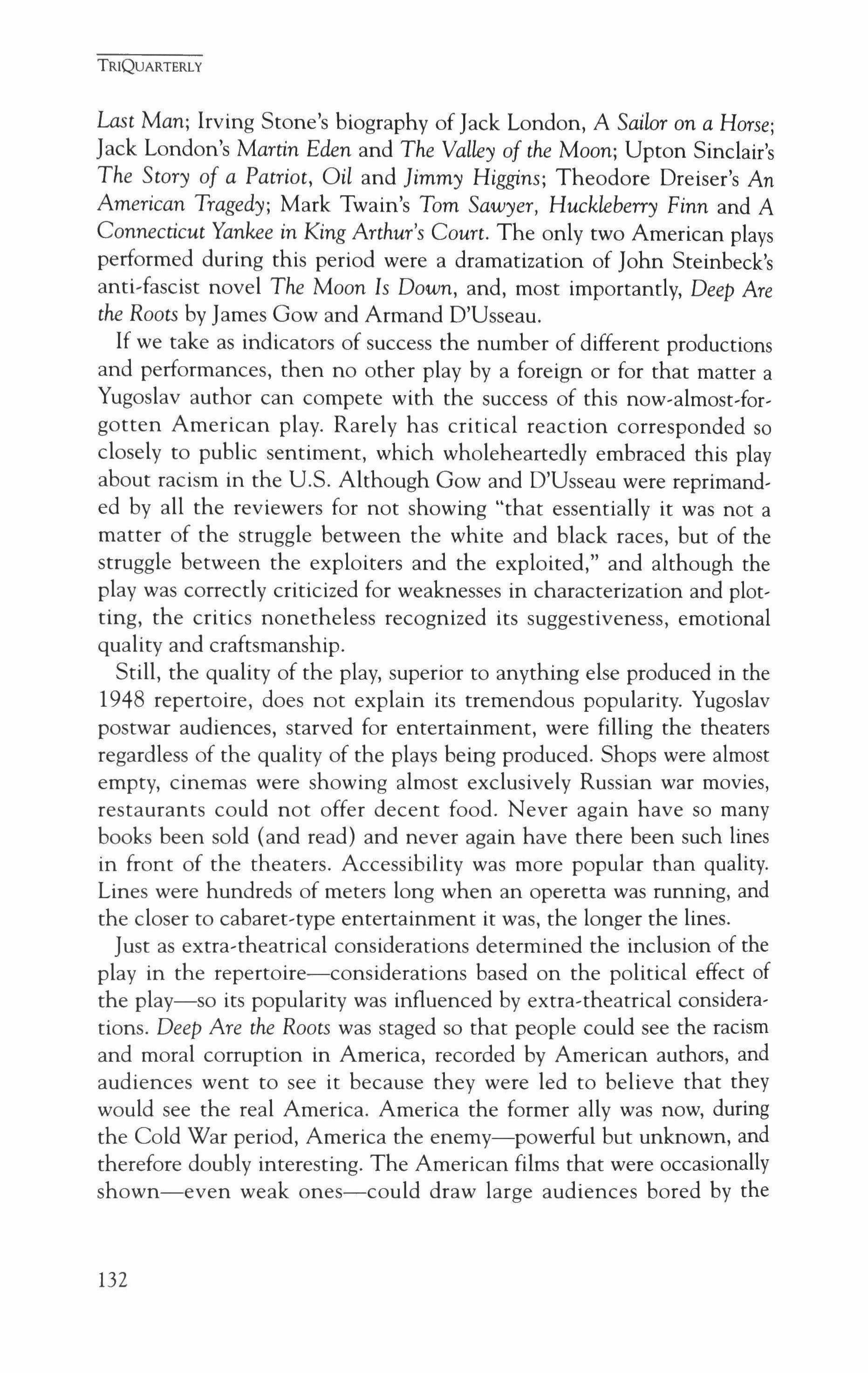
Last Man; Irving Stone's biography of Jack London, A Sailor on a Horse; Jack London's Martin Eden and The Valley of the Moon; Upton Sinclair's The Story of a Patriot, Oil and Jimmy Higgins; Theodore Dreiser's An American Tragedy; Mark Twain's Tom Sawyer, Huckleberry Finn and A Connecticut Yankee in King Arthur's Court. The only two American plays performed during this period were a dramatization of John Steinbeck's anti-fascist novel The Moon Is Down, and, most importantly, Deep Are the Roots by James Gow and Armand D'Usseau.
If we take as indicators of success the number of different productions and performances, then no other play by a foreign or for that matter a Yugoslav author can compete with the success of this now-almost-forgotten American play. Rarely has critical reaction corresponded so closely to public sentiment, which wholeheartedly embraced this play about racism in the U.S. Although Gow and D'Usseau were reprimanded by all the reviewers for not showing "that essentially it was not a matter of the struggle between the white and black races, but of the struggle between the exploiters and the exploited," and although the play was correctly criticized for weaknesses in characterization and plotting, the critics nonetheless recognized its suggestiveness, emotional quality and craftsmanship.
Still, the quality of the play, superior to anything else produced in the 1948 repertoire, does not explain its tremendous popularity. Yugoslav postwar audiences, starved for entertainment, were filling the theaters regardless of the quality of the plays being produced. Shops were almost empty, cinemas were showing almost exclusively Russian war movies, restaurants could not offer decent food. Never again have so many books been sold (and read) and never again have there been such lines in front of the theaters. Accessibility was more popular than quality. Lines were hundreds of meters long when an operetta was running, and the closer to cabaret-type entertainment it was, the longer the lines.
Just as extra-theatrical considerations determined the inclusion of the play in the repertoire-considerations based on the political effect of the play-so its popularity was influenced by extra-theatrical considerations. Deep Are the Roots was staged so that people could see the racism and moral corruption in America, recorded by American authors, and audiences went to see it because they were led to believe that they would see the real America. America the former ally was now, during the Cold War period, America the enemy-powerful but unknown, and therefore doubly interesting. The American films that were occasionally shown-even weak ones-could draw large audiences bored by the
TRIQUARTERLY
132
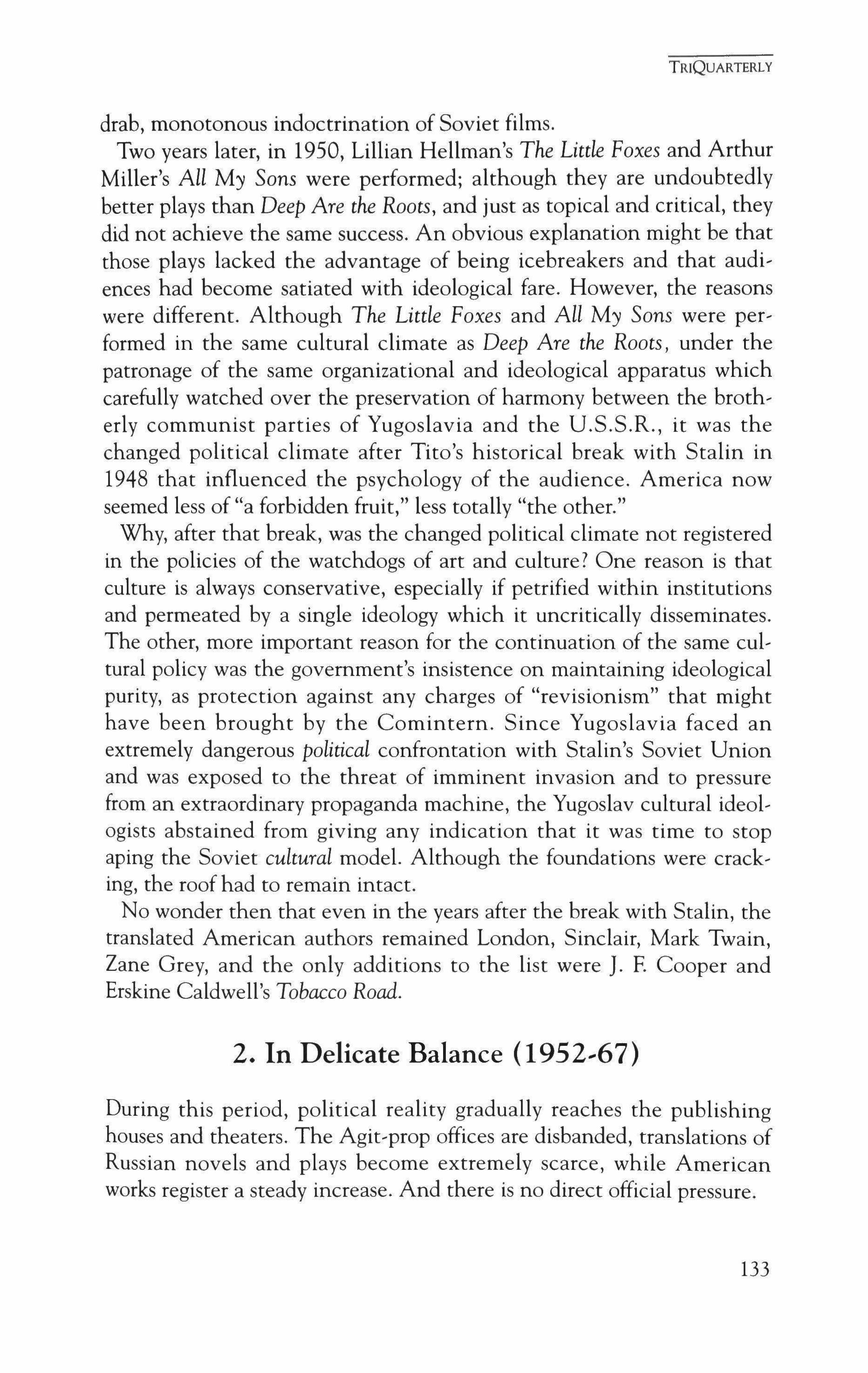
drab, monotonous indoctrination of Soviet films.
Two years later, in 1950, Lillian Hellman's The Little Faxes and Arthur Miller's All My Sons were performed; although they are undoubtedly better plays than Deep Are the Roots, and just as topical and critical, they did not achieve the same success. An obvious explanation might be that those plays lacked the advantage of being icebreakers and that audiences had become satiated with ideological fare. However, the reasons were different. Although The Little Faxes and All My Sons were performed in the same cultural climate as Deep Are the Roots, under the patronage of the same organizational and ideological apparatus which carefully watched over the preservation of harmony between the brotherly communist parties of Yugoslavia and the U.S.S.R., it was the changed political climate after Tito's historical break with Stalin in 1948 that influenced the psychology of the audience. America now seemed less of "a forbidden fruit," less totally "the other."
Why, after that break, was the changed political climate not registered in the policies of the watchdogs of art and culture? One reason is that culture is always conservative, especially if petrified within institutions and permeated by a single ideology which it uncritically disseminates. The other, more important reason for the continuation of the same cultural policy was the government's insistence on maintaining ideological purity, as protection against any charges of "revisionism" that might have been brought by the Comintern. Since Yugoslavia faced an extremely dangerous political confrontation with Stalin's Soviet Union and was exposed to the threat of imminent invasion and to pressure from an extraordinary propaganda machine, the Yugoslav cultural ideologists abstained from giving any indication that it was time to stop aping the Soviet cultural model. Although the foundations were cracking, the roof had to remain intact.
No wonder then that even in the years after the break with Stalin, the translated American authors remained London, Sinclair, Mark Twain, Zane Grey, and the only additions to the list were J. F. Cooper and Erskine Caldwell's Tobacco Road.
2. In Delicate Balance (1952 67)
During this period, political reality gradually reaches the publishing houses and theaters. The Agit-prop offices are disbanded, translations of Russian novels and plays become extremely scarce, while American works register a steady increase. And there is no direct official pressure.
TRIQUARTERLY
133

Complex social-structural changes, like rapid industrialization and urbanization, required different and more mass-oriented instruments of persuasion. When in the immediate postwar period the primary task of the government was the consolidation of power and organization of the new socialist state, literature could very well have served as an instrument of ideological indoctrination, but once this task had been successfully accomplished, literature and theater were no longer deemed able to influence the long-term process of cultural and social change. The precondition for this process was the education of the masses: eradication of illiteracy (16.3 percent in 1953), technical education (necessary for integration into an industrialized economy and urban environment), as well as a more subtle political education of all citizens-and not only those who indulged in reading novels. Such tasks are better accomplished by mass media-radio, TV, newspapers and periodicals. It is not surprising that in the 1948-53 period the number of newspapers doubled and the number of radios quadrupled.
Undoubtedly, even in this period there was a lot of self-censorship which is impossible to quantify. After all, in 1954 at the Plenum of the Yugoslav Writers' Association, one participant defined it in the following terms:
It is that censorship which imperatively comes from the poet himself and about which, as I vividly remember, comrade Oskar Davico spoke exceptionally well in Dubrovnik several years ago. He said approximately the following: "I do not need any censorship. I am my own greatest and most rigid censor." This seems to me to be a very apt description of the attitude, motivation and awareness of the poet's role in society and especially in our societv.!
The full extent of our self-imposed censorship will never be known, but fortunately it was a question of individual decisions and not an allpervasive policy. For instance, Beckett's Waiting for Godot, translated as early as 1957, waited till 1966 before it was produced in Zagreb. Then the play was directed by the same person who had directed it in 1957, when it had been rehearsed and staged only for the employees of the Zagreb Drama Theater. It had not been produced for the general public in 1957 because the director, the cast and the management of the theater themselves decided not to do so. Nobody required that such a decision be made. The play had been studiously rehearsed; the same actor playing the main role nine years later performed it very successfully. Therefore, the decision not to stage the play in 1957 had nothing to do
TRIQUARTERLY
134

with theatrical considerations but stemmed from uncertainty about the ideological role of the theater. In 1957, the director, either fearing that the spirit of helplessness emanating from this pessimistic play would infect the audience or that the play might be misunderstood and thus do a disservice to the hitherto unknown author, decided against staging it. However, as far as American literature was concerned, this was the great catching-up period, when numerous classical (Hawthorne, Melville, et al.) and contemporary writers (Norman Mailer, James Jones, J. D. Salinger, et al.) were published. The delay between then-current American literary production and its transfer to Croatia was becoming ever shorter.
3. The New Politicization (1967 75)
It is somewhat ironic that the reception of a play by Eugene O'Neill, the progenitor of the modern American drama, should have signaled a new situation in which literature once again was the focus of Croatian political life. A critic greeted the performance of A Moon for the Misbegotten with the following provocative question:
What meaning, after all, does this world of the American farm hold for us? I would not, naturally, be asking this question if it did not seem to me that we are rather too uncritical with respect to foreign works, and rather too disinclined to value our own. Do we not have in our rather meager heritage texts which would-now that we have opted for this kind of theater-be suitable? Or even more suitable?2
The reviewer's question had nothing to do with assessing Eugene O'Neill's place in modern drama but addressed itself primarily to the question of the role of the national literature. The so-called "Croatian question," one of the central problems even during the time of the Kingdom of Yugoslavia, came up again in the late sixties because the socialist government, no matter how hard it tried to repress it, had been unable to resolve it. Tensions between the two largest nations in Yugoslavia, Serbia and Croatia, ran deep and, as the most recent events amply prove, were not to be overcome. The problem was compounded by the complete stagnation of economic growth, by rising unemployment and by emigration, which were all the result of hurriedly adopted economic reforms. As the pie to be shared was becoming smaller, the Croats felt they were discriminated against by the 135
TRIQUARTERLY
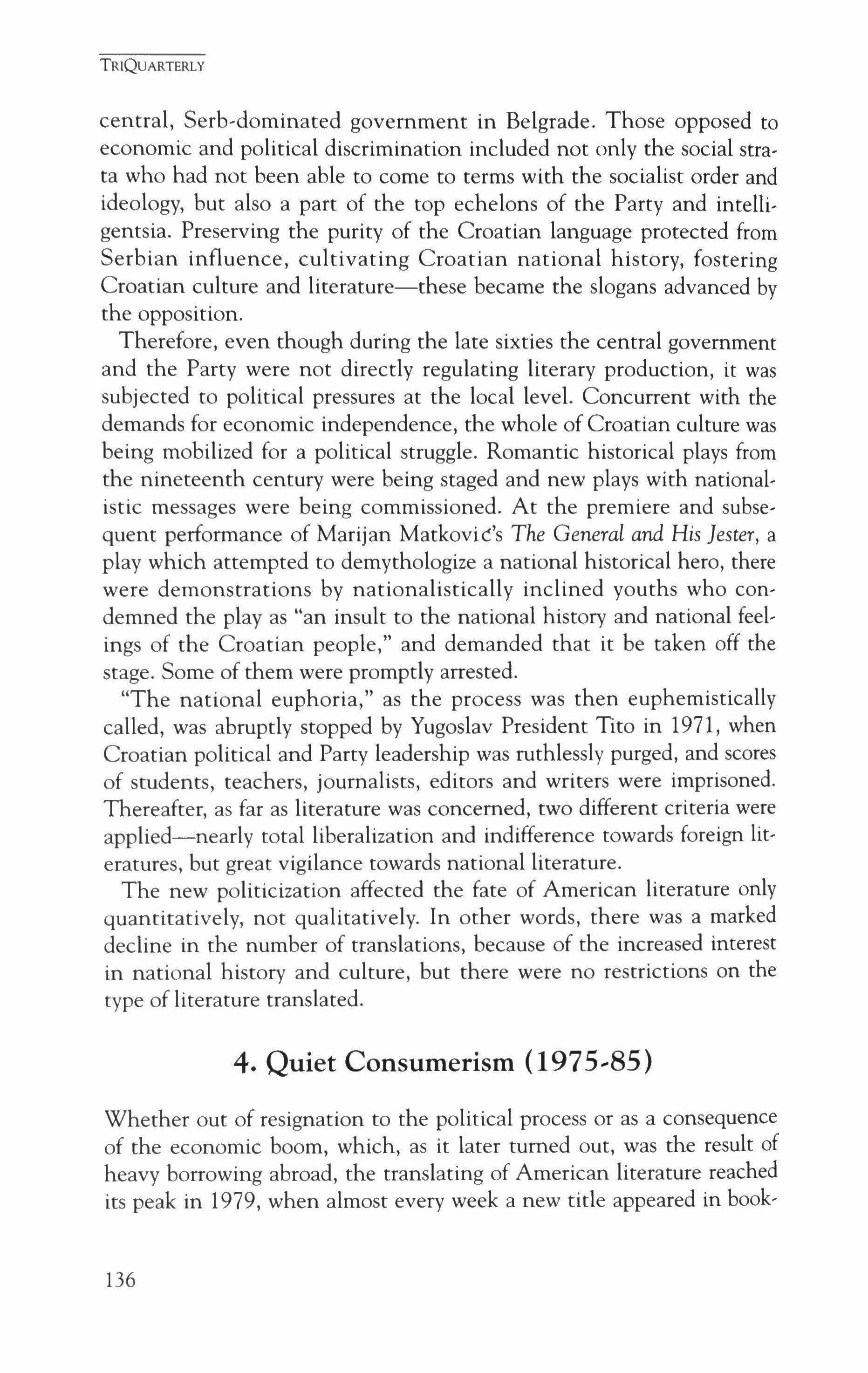
central, Serb-dominated government in Belgrade. Those opposed to economic and political discrimination included not only the social strata who had not been able to come to terms with the socialist order and ideology, but also a part of the top echelons of the Party and intelligentsia. Preserving the purity of the Croatian language protected from Serbian influence, cultivating Croatian national history, fostering Croatian culture and literature-these became the slogans advanced by the opposition.
Therefore, even though during the late sixties the central government and the Party were not directly regulating literary production, it was subjected to political pressures at the local level. Concurrent with the demands for economic independence, the whole of Croatian culture was being mobilized for a political struggle. Romantic historical plays from the nineteenth century were being staged and new plays with nationalistic messages were being commissioned. At the premiere and subsequent performance of Marijan Markovic's The General and His Jester, a play which attempted to demythologize a national historical hero, there were demonstrations by nationalistically inclined youths who condemned the playas "an insult to the national history and national feelings of the Croatian people," and demanded that it be taken off the stage. Some of them were promptly arrested.
"The national euphoria," as the process was then euphemistically called, was abruptly stopped by Yugoslav President Tito in 1971, when Croatian political and Party leadership was ruthlessly purged, and scores of students, teachers, journalists, editors and writers were imprisoned. Thereafter, as far as literature was concerned, two different criteria were applied-nearly total liberalization and indifference towards foreign literatures, but great vigilance towards national literature.
The new politicization affected the fate of American literature only quantitatively, not qualitatively. In other words, there was a marked decline in the number of translations, because of the increased interest in national history and culture, but there were no restrictions on the type of literature translated.
4. Quiet Consumerism (1975 85)
Whether out of resignation to the political process or as a consequence of the economic boom, which, as it later turned out, was the result of heavy borrowing abroad, the translating of American literature reached its peak in 1979, when almost every week a new title appeared in book-
TRIQUARTERLY
136
stores or on the stage. However, the majority of these titles were popular fiction, to be consumed during increasing leisure time. This period saw the publication of works by Harold Robbins, Jacqueline Susann, James A. Michener and others. Towards the end of the period, there was again a marked falling off in the number of translations, as a consequence of the severe political and economic crisis and, I believe, because SerboCroatian television broadcasting became thoroughly Americanized in content.

Even this brief summary of the forty years of the reception of American literature in Croatia suggests obvious conclusions: first, that there has been a constant relationship between literature and ideology; second, that there must have existed an efficient system of control. Theaters, publishing houses, newspapers, magazines were all state-owned and largely subsidized. In other words, there were no financially-independent literary institutions. This meant that writers could be either in favor or out of favor. If in favor, a writer would be published and eligible for awards, which were many: inclusion in school textbooks, which ensured steady royalties; an apartment; stipends for traveling abroad; a good job in a publishing house, etc. If out of favor, a writer would not get published, or some of his/her work would be published and some not, and in some cases he/she could end up in prison. Even so, with the rules clearly defined, there were very few writers who could make a living as writers. We are not a nation of voracious readers-in the former Yugoslavia, illiteracy stood at about 14 percent and besides, although Serbo-Croatian was the official language, the majority of Slovenes, Macedonians and Albanians would read only in their own languages. Therefore a print run of 5,000 copies was regarded as a huge bestseller and in order to survive economically, almost all writers held steady jobs as editors, teachers, journalists, translators, and so on.
In 1990 the first free elections were held in Croatia; the nationalist Croatian Democratic Union (HDZ) won an overwhelming victory. The large Serb minority (13 percent), concentrated in several regions of the country, felt threatened in spite of the assurances given, and started erecting physical barricades to prevent access to their enclaves. This was the so-called "log revolution," for the barricades were built of heavy logs. When the Croatian police tried to dismantle the barricades, clashes ensued, and the Serb-controlled Yugoslav Federal Army sided with 137
TRIQUARTERLY
* * *
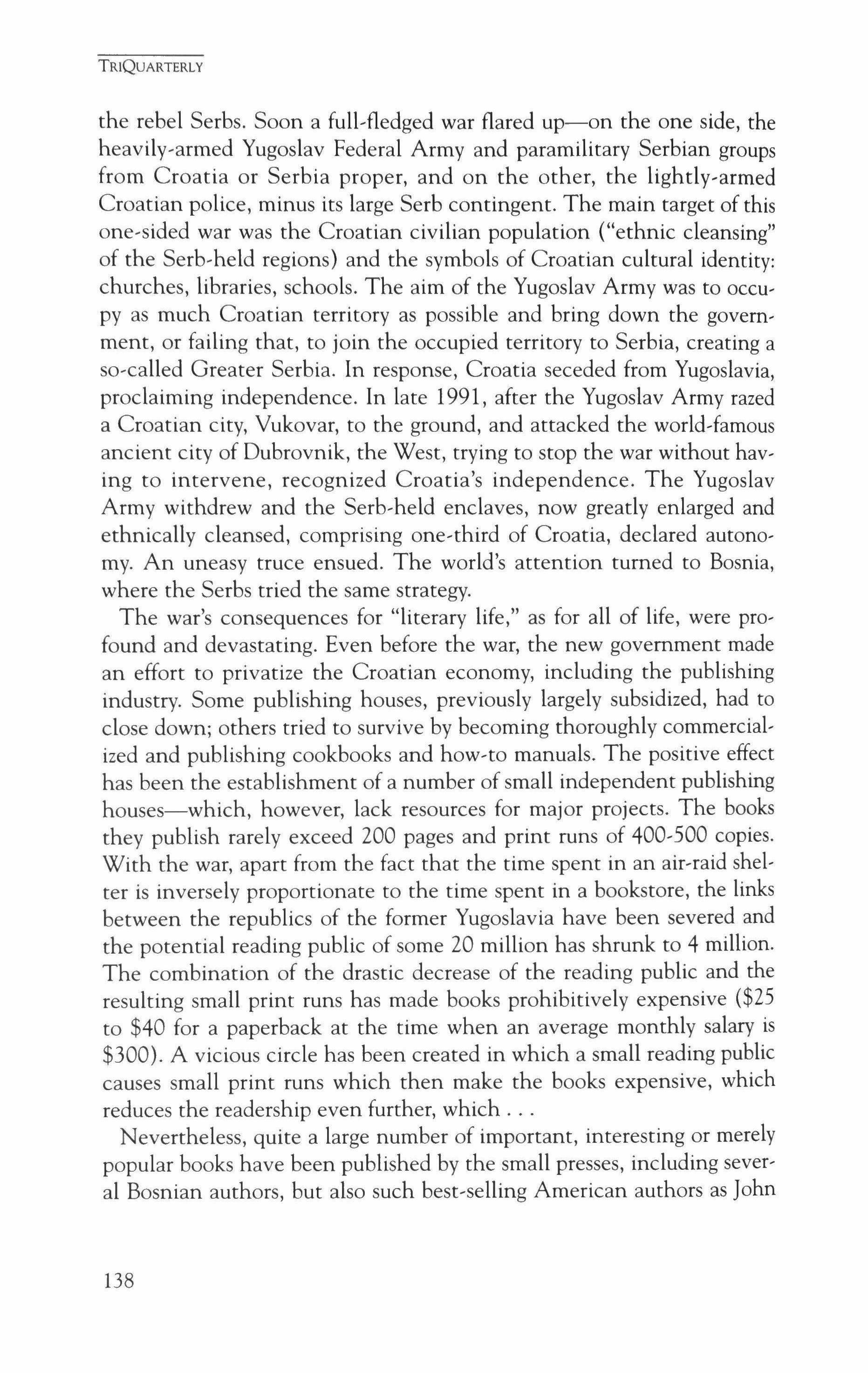
the rebel Serbs. Soon a full-fledged war flared up-on the one side, the heavily-armed Yugoslav Federal Army and paramilitary Serbian groups from Croatia or Serbia proper, and on the other, the lightly-armed Croatian police, minus its large Serb contingent. The main target of this one-sided war was the Croatian civilian population ("ethnic cleansing" of the Serb-held regions) and the symbols of Croatian cultural identity: churches, libraries, schools. The aim of the Yugoslav Army was to occupyas much Croatian territory as possible and bring down the government, or failing that, to join the occupied territory to Serbia, creating a so-called Greater Serbia. In response, Croatia seceded from Yugoslavia, proclaiming independence. In late 1991, after the Yugoslav Army razed a Croatian city, Vukovar, to the ground, and attacked the world-famous ancient city of Dubrovnik, the West, trying to stop the war without having to intervene, recognized Croatia's independence. The Yugoslav Army withdrew and the Serb-held enclaves, now greatly enlarged and ethnically cleansed, comprising one-third of Croatia, declared autonomy. An uneasy truce ensued. The world's attention turned to Bosnia, where the Serbs tried the same strategy.
The war's consequences for "literary life," as for all of life, were pro� found and devastating. Even before the war, the new government made an effort to privatize the Croatian economy, including the publishing industry. Some publishing houses, previously largely subsidized, had to close down; others tried to survive by becoming thoroughly commercialized and publishing cookbooks and how-to manuals. The positive effect has been the establishment of a number of small independent publishing houses-which, however, lack resources for major projects. The books they publish rarely exceed 200 pages and print runs of 400�500 copies. With the war, apart from the fact that the time spent in an air-raid shelter is inversely proportionate to the time spent in a bookstore, the links between the republics of the former Yugoslavia have been severed and the potential reading public of some 20 million has shrunk to 4 million. The combination of the drastic decrease of the reading public and the resulting small print runs has made books prohibitively expensive ($25 to $40 for a paperback at the time when an average monthly salary is $300). A vicious circle has been created in which a small reading public causes small print runs which then make the books expensive, which reduces the readership even further, which Nevertheless, quite a large number of important, interesting or merely popular books have been published by the small presses, including several Bosnian authors, but also such best-selling American authors as John
TRIQUARTERLY
138

Grisham, R. ]. Waller, Michael Crichton and others. In the words of one such publisher, nowadays it is much easier to publish books than to sell them.
The other consequence has been that literature has once again been mobilized in the service of defending and promoting the national identitv, and the meager resources allocated by the state have gone to publications serving that purpose: revised histories of Croatia's past, biographies of prominent Croatians past and present, memoirs, linguistic studies, patriotic poetry and essays. There has been very little fiction, and very little translation. Writers are often judged by the fervor they exhibit towards the new state. In that sense, the case of the Croatian writer Slavenka Drakulic has been indicative. Her first novel, Holograms of Fear, published before the war, was a best-seller which ran into several editions-as did her second novel, The Marble Skin. In the meantime, her nonfiction book, How We Survived Communism and Even Laughed, has made her internationally known and she has been favorably cornpared to a number of famous East European writers. One would expect that a new state would be eager to establish its cultural presence abroad by promoting such a writer. However, How We Survived was never published in Croatia. Partly because of the war, but partly because, at the same time, Drakulic published some articles in the foreign press which were critical of the new government. Apparently, the prevailing line of thinking has been that during the war one should not "wash dirty laundry" in public, least of all abroad. One of her incriminating essays, "Overcome by Nationhood," was first published in Time magazine and later included in her fourth book, Balkan Express. In the essay she describes some of the changes the war has brought about:
Some of my foreign friends from that time cannot understand that they and I have less and less in common now. I am living in a country that has had six bloody months of war, and it is hard for them to understand that being Croat has become my destiny. How can I explain to them that in this war I am defined by my nationality, and by it alone? There is another thing that is even harder to explain-the way the awareness of my nationality, because of my past, carne to me in a negative way. I had fought against treating nationality as a main criterion by which to judge human beings; I tried to see the people behind the label; I kept open the possibility of dialogue with my friends and colleagues in Serbia even after all telephone lines and roads had been cut off and one-third of Croatia had been occupied and bombed. I resisted corning to terms with the fact that in Croatia it is difficult to be the kind of person who says, "Yes, I am Croat, but In the end, none of that helped me. Along with millions of other
TRIQUARTERLY
139
Croats, I was pinned to the wall of nationhood-not only by outside pressure from Serbia and the Federal Army but by national homogenization within Croatia itself. That is what the war is doing to us, reducing us to one dimension: the Nation. The trouble with this nationhood, however, is that whereas before, I was defined by my education, my job, my ideas, my character-and, yes, my nationality too-now I feel stripped of all that. I am nobody because I am not a person any more. I am one of 4.5 million Croats.J
As soon as the article came out she was once more violently attacked by most of the media, called a traitor, a war profiteer, et cetera. Let me quote just one of those attacks for the sake of its flavor:
What Slavenka Drakulic has published in some Swiss and German papers and now even on the pages of American Time magazine can hardly be called anything but garbage which she is throwing not only in the face of her hated Croatia, but also in the face of all the honorable people who tried, as opposed to her, regardless of consequences, to expand the space of freedom in Croatia In the end one must ask a question: can a writer be regarded as moral, who, while his nation is suffering a terrible tragedy, if he cannot identify with it emotionally and intellectually, doesn't have the decency to keep at least silent?4
Needless to say, Balkan Express has not been published in Croatia, either.

A week ago, Croatian soldiers, in an amazing three days, retook the Serbheld territory between Croatia's mainland and its coast, giving it once again the shape of a viable country. Yesterday I heard that Drakulic's third novel, The Hunger of the Gods, will be published shortly by an independent small publisher. Not surprisingly, it is a love story between a Polish woman and a Brazilian man and takes place in New York.
Zagreb, September 1995
P.S. Since I wrote this article, three events have happened which give cause for qualified optimism. In chronological order, the first was the Frankfurt Book Fair in October 1995, where Croatia was represented by forty-four publishers, the majority of which were established since 1990.
TRIQUARTERLY
* * *
140
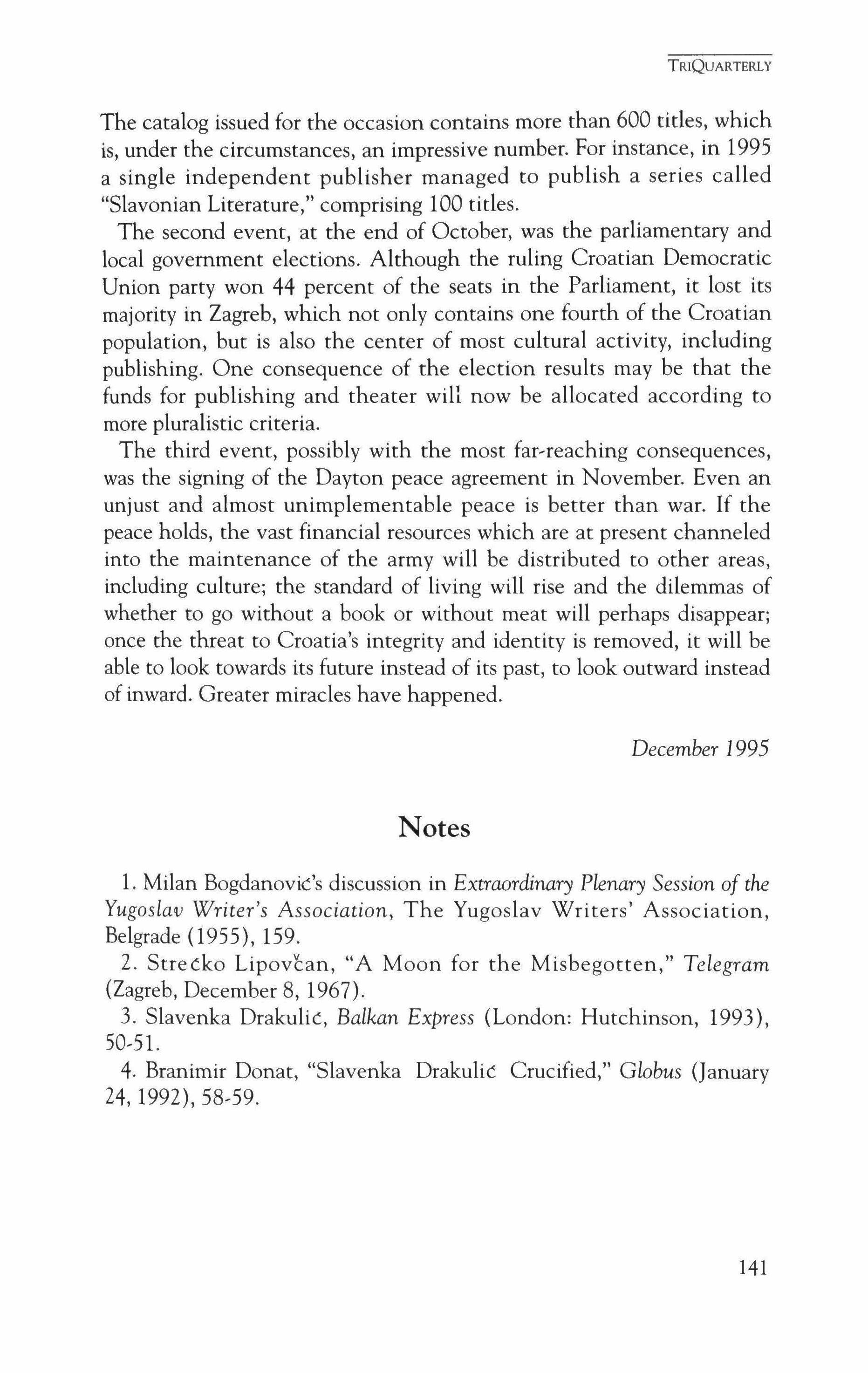
The catalog issued for the occasion contains more than 600 tides, which is, under the circumstances, an impressive number. For instance, in 1995 a single independent publisher managed to publish a series called "Slavonian Literature," comprising 100 tides.
The second event, at the end of October, was the parliamentary and local government elections. Although the ruling Croatian Democratic Union party won 44 percent of the seats in the Parliament, it lost its majority in Zagreb, which not only contains one fourth of the Croatian population, but is also the center of most cultural activity, including publishing. One consequence of the election results may be that the funds for publishing and theater will now be allocated according to more pluralistic criteria.
The third event, possibly with the most far,reaching consequences, was the signing of the Dayton peace agreement in November. Even an unjust and almost unimplementable peace is better than war. If the peace holds, the vast financial resources which are at present channeled into the maintenance of the army will be distributed to other areas, including culture; the standard of living will rise and the dilemmas of whether to go without a book or without meat will perhaps disappear; once the threat to Croatia's integrity and identity is removed, it will be able to look towards its future instead of its past, to look outward instead of inward. Greater miracles have happened.
December 1995
Notes
1. Milan Bogdanovic's discussion in Extraordinary Plenary Session of the Yugoslav Writer's Association, The Yugoslav Writers' Association, Belgrade (1955),159.
2. Stre cko Lipovcan, "A Moon for the Misbegotten," Telegram (Zagreb, December 8, 1967).
3. Slavenka Drakulic, Balkan Express (London: Hutchinson, 1993), 50,5l.
4. Branimir Donat, "Slavenka Drakulic Crucified," Globus {January 24, 1992),58,59.
TRIQUARTERLY
141



Two Poems
Mana Luisa A. Carino
Firstborn

for Walt, on his first birthday
The firstborn has the power to heal the breach between families especially when there has been an elopement or a misunderstanding.
The firstborn basks in her parents' affection. They rub her legs in the sunshine and blow loud kisses on her belly. Grandparents and the rest of the family circle close, like many embraces.
The firstborn inherits the carabao, and with the maya bird spends his early years riding its back through the paddies, calling the wind.
The firstborn lies in the duyan, rocked to sleep with lullabies. It will be at least three years before she is taught to watch over her sleeping baby brother.
The firstborn is given the tongue of the roasted pig to suck on during the christening party. He will grow to be quick with words.
The firstborn has his stomach bound with a triangle of cloth, to guard against colic. When the cord dries and falls off, his mother keeps it in a hanky pinned next to her heart.
TRIQUARTERLY
:!: 145
TRIQUARTERLY

When his sisters and brothers follow, she strings the dried stumps together and knots them into the same cloth, breathing a prayer that all their lives they will be as close as this and know it.
The firstborn will receive new clothes and shoes when the family can afford these.
Gifts are not withheld from the others, only deferred to better times.
After the parents, the eldest dips his hand into the common bowl. He takes a larger portion of meat or fish, especially if he is old enough to work the fields.
The firstborn carries other gifts and names. She is called Elder Sister, Exemplar, Little Mother. She carries her family's hopes and takes care that the rice pot does not overflow.
The firstborn is also the Elder Brother. He will have to provide for his unmarried sisters, give them a life for which to give thanks forever, even if it is spinsterhood.
He will be schooled in the knowledge of his tribe, including war. She will learn the ways of plants and medicines and the arrangement of limbs.
He can wear the robes of justice as well as the threads of inconstancy. They will want her to wear white and to bring offspring into the world.
She will tend her mother in labor and learn the alphabet of blood. When it is time he will join his peers at the river where the village herbalist will cut the tail off his lizard and wrap the rest in a paste of guava leaves.
They will let him follow his restlessness to the borders of the village, and one day he will disappear into another country to hunt.
She will sit by the window until someone passing beneath with a song and a stringed instrument snares her restlessness and binds it to his own.
146

They will learn to do other things because there are constellations we have just learned to name in the sky.
They will learn to be other things because they are like foam that rises to the edge of the waves, trying to abandon the formlessness of water.
They will learn to be other things because they know the cubits and origins of your house.
Having passed through its gates, they know they can be new. Having tasted salt and milk they will go in search of oil and grain; seed to put in the soil, reeds for plaiting baskets, a story-lamp or two.
TRIQUARTERLY
147
Last Known Residence
for Ruben
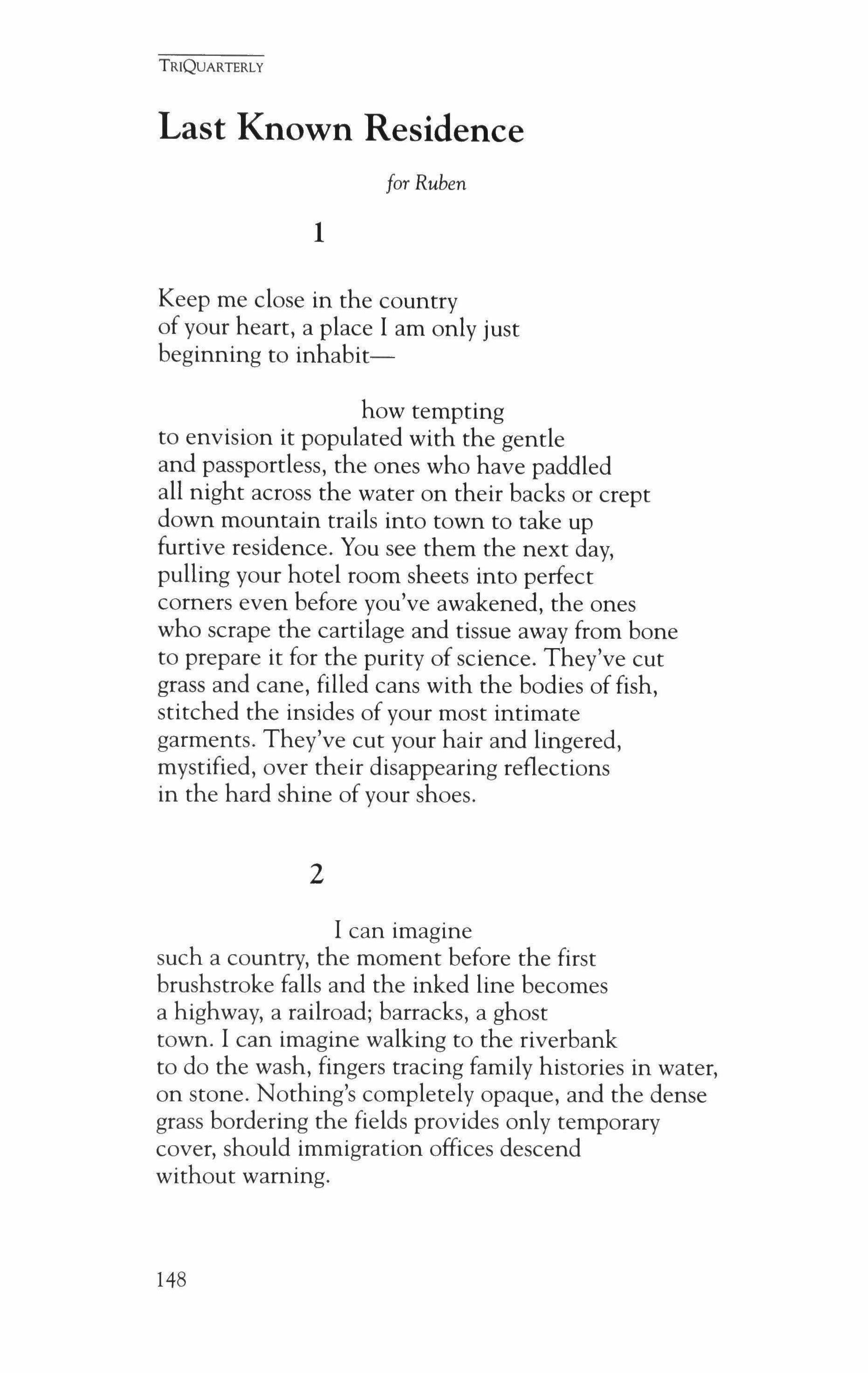
1
Keep me close in the country of your heart, a place I am only just beginning to inhabithow tempting to envision it populated with the gentle and passportless, the ones who have paddled all night across the water on their backs or crept down mountain trails into town to take up furtive residence. You see them the next day, pulling your hotel room sheets into perfect comers even before you've awakened, the ones who scrape the cartilage and tissue away from bone to prepare it for the purity of science. They've cut grass and cane, filled cans with the bodies of fish, stitched the insides of your most intimate garments. They've cut your hair and lingered, mystified, over their disappearing reflections in the hard shine of your shoes.
2
I can imagine such a country, the moment before the first brushstroke falls and the inked line becomes a highway, a railroad; barracks, a ghost town. I can imagine walking to the riverbank to do the wash, fingers tracing family histories in water, on stone. Nothing's completely opaque, and the dense grass bordering the fields provides only temporary cover, should immigration offices descend without warning.
TRIQUARTERLY
148
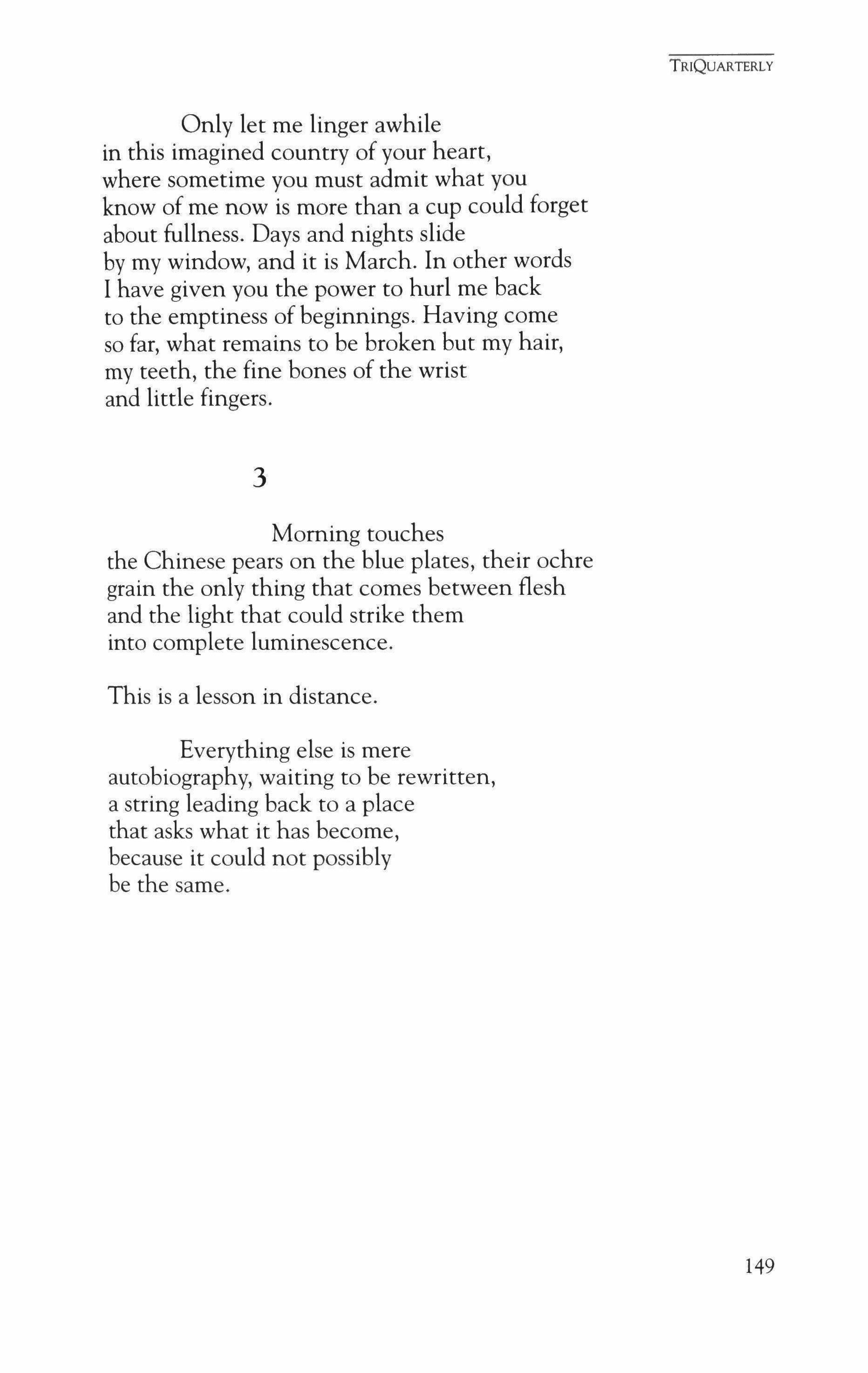
Only let me linger awhile in this imagined country of your heart, where sometime you must admit what you know of me now is more than a cup could forget about fullness. Days and nights slide by my window, and it is March. In other words I have given you the power to hurl me back to the emptiness of beginnings. Having come so far, what remains to be broken but my hair, my teeth, the fine bones of the wrist and little fingers.
3
Morning touches the Chinese pears on the blue plates, their ochre grain the only thing that comes between flesh and the light that could strike them into complete luminescence.
This is a lesson in distance.
Everything else is mere autobiography, waiting to be rewritten, a string leading back to a place that asks what it has become, because it could not possibly be the same.
TRIQUARTERLY 149
Two Poems Deborah Pope
Bad Child

He says he wishes I was not even living, he says he wishes I would go away, swinging his small fists at me, his shirt with spilled milk still dripping, his arms two jerking propellers of fury and shame. I am wiping at milk on the couch, the dashed basin it is making, saying milk of all things, the smell, the stain, how can you be so clumsy, careless, running through my own spirals of tirade toward everything so shabby, used, nobody cares, no one looks after things in this house and can't you even say you're sorry. He skulks in the hall, making sure I can hear how he hates me. I clamp shut not to yell
TRIQUARTERLY
150
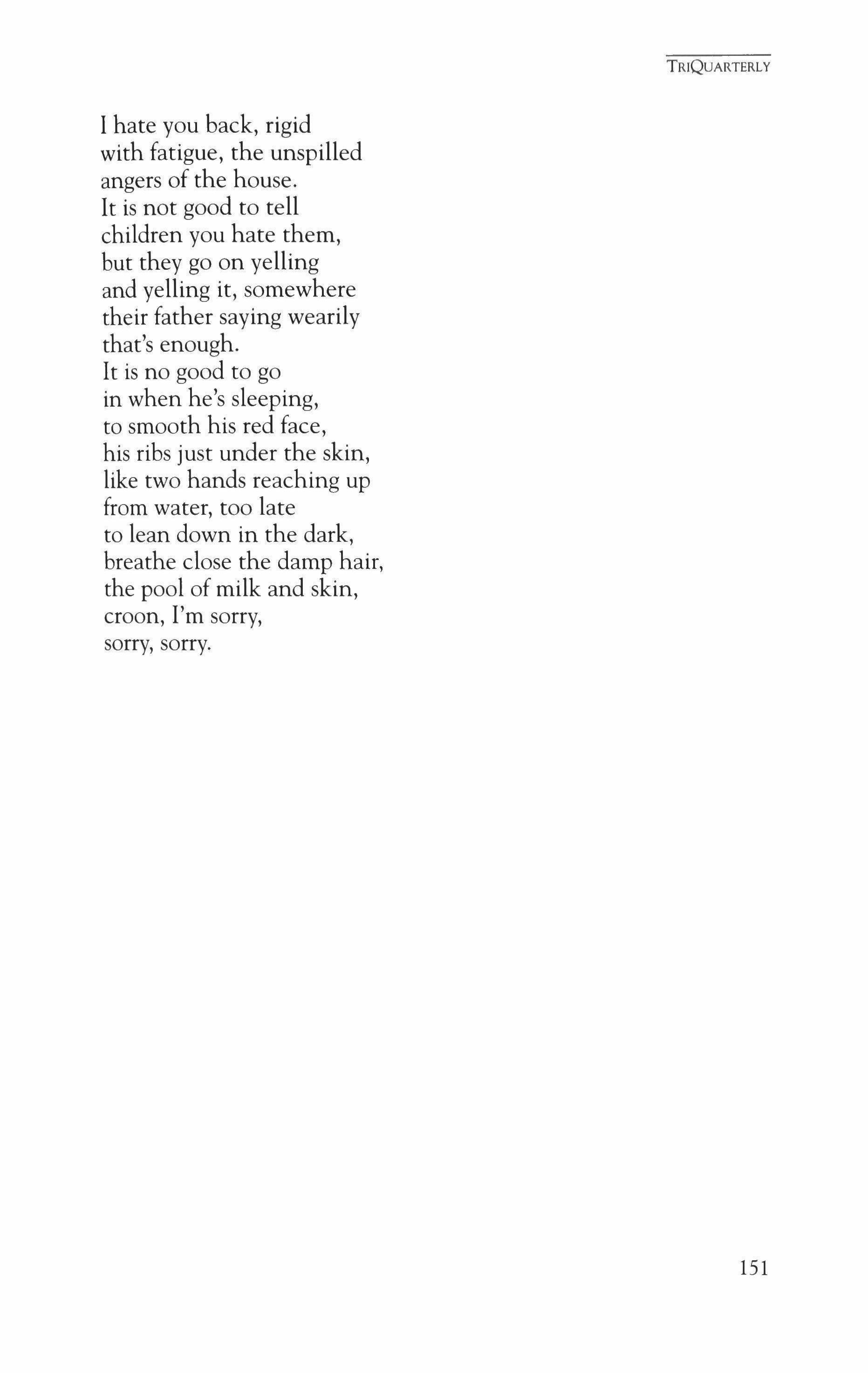
I hate you back, rigid with fatigue, the unspilled angers of the house. It is not good to tell children you hate them, but they go on yelling and yelling it, somewhere their father saying wearily that's enough. It is no good to go in when he's sleeping, to smooth his red face, his ribs just under the skin, like two hands reaching up from water, too late to lean down in the dark, breathe close the damp hair, the pool of milk and skin, croon, I'm sorry, sorry, sorry.
TRIQUARTERLY
151
Solstice

You held me against the side of the house that faced the woods where no one could see, one hand holding my wrists, your free hand lifting my skirt as leaves the color of burns were breaking loose, falling through the needle air around me, my dead were all there in that season, those I loved gone deeper into the earth, ash and flesh, than any passion into my skin, and their faces rose up to me with your touch and the dark my body cast me down was where I might find them at last, letting go felt that frightening, that free, and I cried out when your grip hauled me back, your hand knotted hard in my hair, and I was rising, returning, coming back into a day where the sun went on beating red as a muscle.
TRIQUARTERLY
152
Sunday Angela Shannon
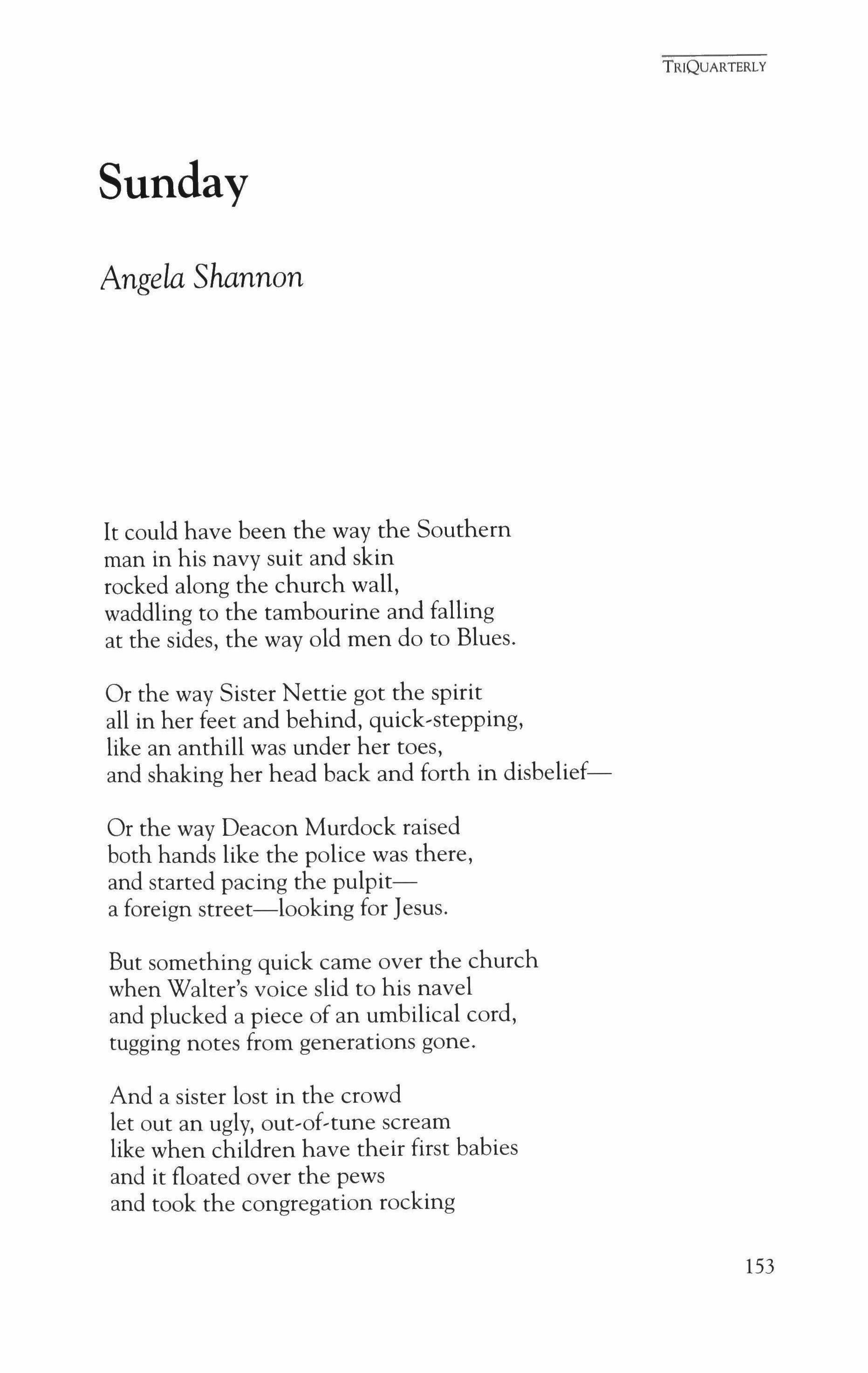
It could have been the way the Southern man in his navy suit and skin rocked along the church wall, waddling to the tambourine and falling at the sides, the way old men do to Blues.
Or the way Sister Nettie got the spirit all in her feet and behind, quick-stepping. like an anthill was under her toes, and shaking her head back and forth in disbelief-
Or the way Deacon Murdock raised both hands like the police was there, and started pacing the pulpita foreign street-looking for Jesus.
But something quick came over the church when Walter's voice slid to his navel and plucked a piece of an umbilical cord, tugging notes from generations gone.
And a sister lost in the crowd let out an ugly, out-of-tune scream like when children have their first babies and it floated over the pews and took the congregation rocking
TRIQUARTERLY 153
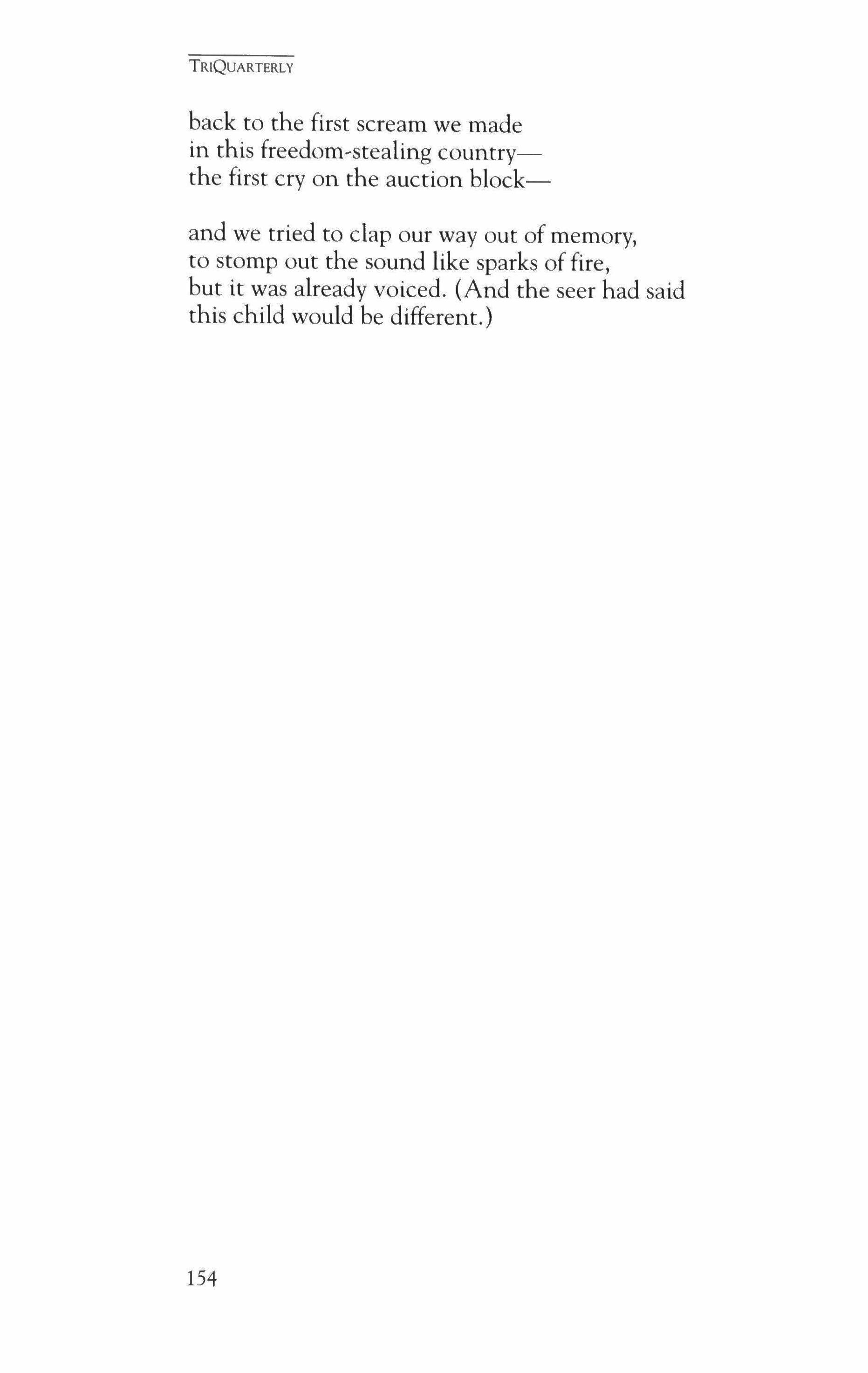
back to the first scream we made in this freedom-stealing countrythe first cry on the auction block-
and we tried to clap our way out of memory, to stomp out the sound like sparks of fire, but it was already voiced. (And the seer had said this child would be different.)
TRIQUARTERLY
154
Two Poems
Amy England
Two Tourists with Guidebook Approach
Planetarium
Eva Noodle: The wind! My hair Is starting to grow sideways. What's this?
Eva Pick:
Noodle:
Pick:
Noodle:
Pick: Noodle:

Pick:
Noodle:
The desired object, 900 Achsah Bond. It isn't really black.
Yet black is the effect. Beautifully polished.
Yes. Silver Is really the effect.
How many sides does it have? Of what Material? And by what water?
By the Sea of Michigan salted
With mill waste, it is carved in rainbow granite, But what metal domes the whole, the book doesn't say. It has one side for each House of heaven.
And how Are the houses connected?
TRIQUARTERLY
155
TRIQUARTERLY
Pick:
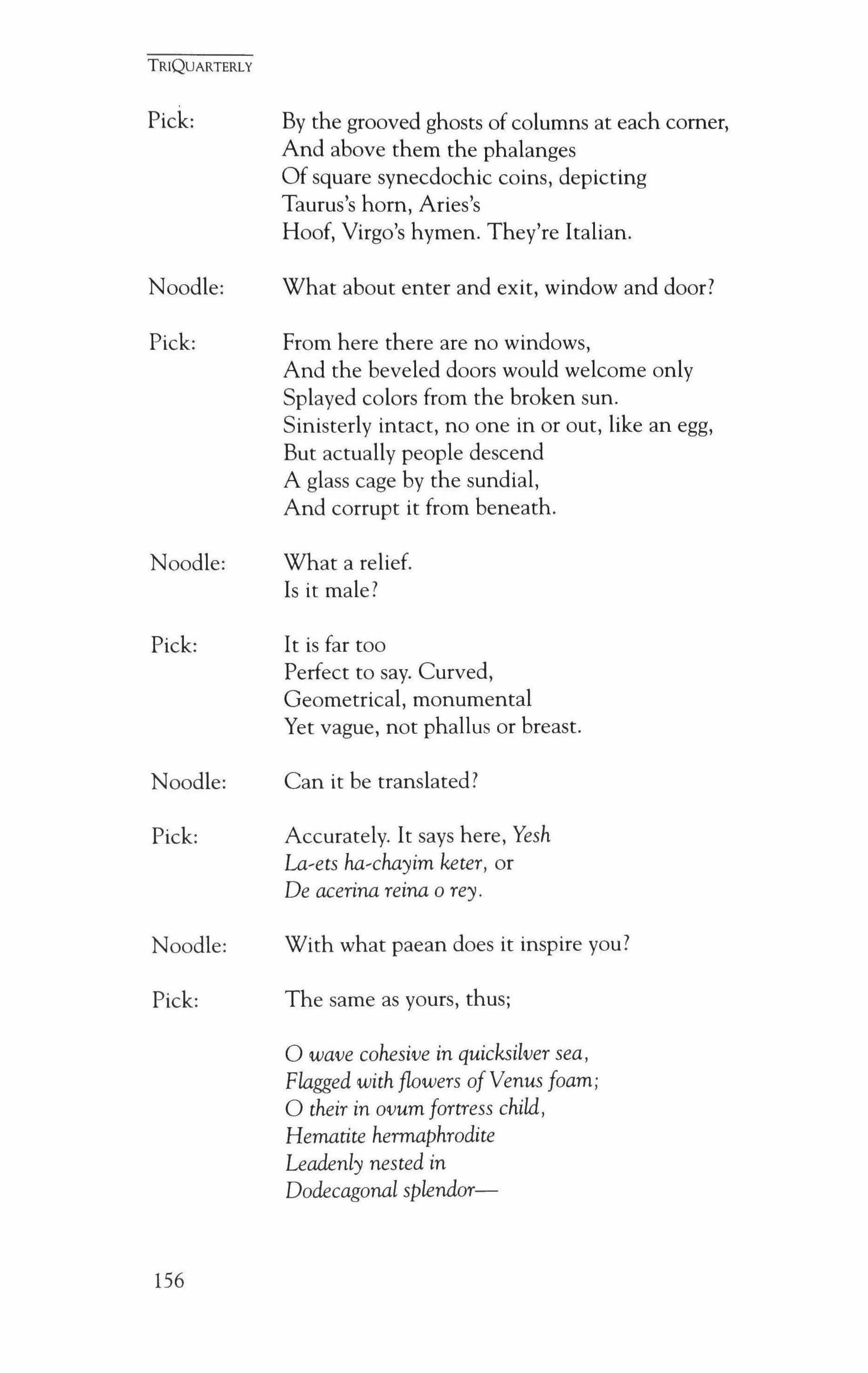
Noodle:
Pick:
Noodle:
By the grooved ghosts of columns at each comer, And above them the phalanges Of square synecdochic coins, depicting Taurus's hom, Aries's Hoof, Virgo's hymen. They're Italian.
What about enter and exit, window and door?
From here there are no windows, And the beveled doors would welcome only
Splayed colors from the broken sun. Sinisterly intact, no one in or out, like an egg, But actually people descend A glass cage by the sundial, And corrupt it from beneath.
What a relief. Is it male?
Pick: It is far too
Perfect to say. Curved, Geometrical, monumental Yet vague, not phallus or breast.
Noodle:
Pick: Noodle:
Pick: 156
Can it be translated?
Accurately. It says here, Yesh La-ezs ha�chayim keter, or De acerina reina 0 rey.
With what paean does it inspire you?
The same as yours, thus; o wave cohesive in quicksilver sea, Flagged with flowers ofVenus foam; o their in ovum fortress child, Hematite hermaphrodite
Leadenly nested in Dodecagonal splendor-
Noodle: Pick:
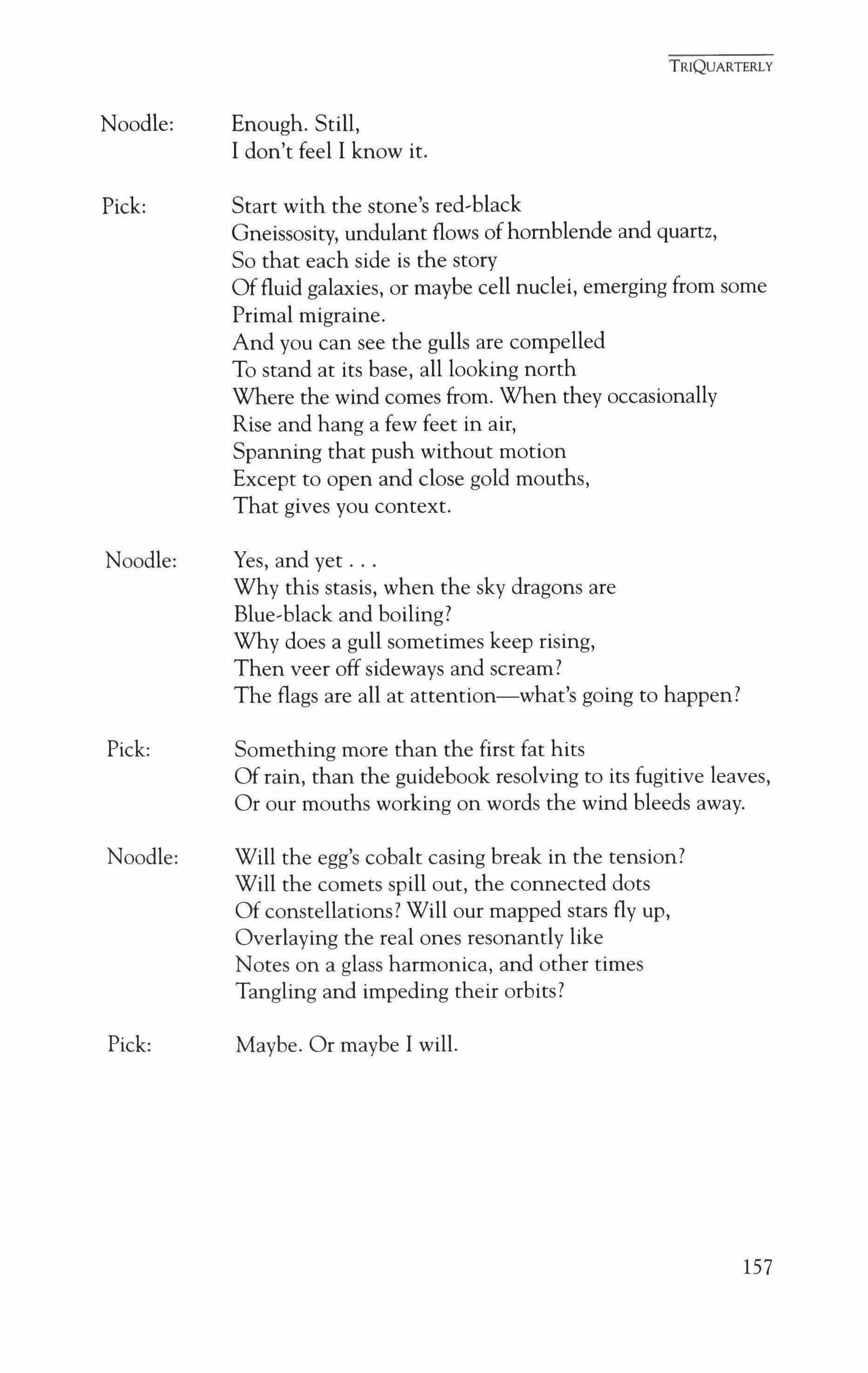
Noodle: Pick:
Enough. Still, I don't feel I know it.
Start with the stone's red-black Gneissosity, undulant flows ofhornblende and quartz, So that each side is the story Of fluid galaxies, or maybe cell nuclei, emerging from some Primal migraine.
And you can see the gulls are compelled To stand at its base, all looking north Where the wind comes from. When they occasionally Rise and hang a few feet in air, Spanning that push without motion Except to open and close gold mouths, That gives you context.
Yes, and yet
Why this stasis, when the sky dragons are Blue-black and boiling?
Why does a gull sometimes keep rising, Then veer off sideways and scream? The flags are all at attention-what's going to happen?
Something more than the first fat hits Of rain, than the guidebook resolving to its fugitive leaves, Or our mouths working on words the wind bleeds away.
Noodle: Pick:
Will the egg's cobalt casing break in the tension? Will the comets spill out, the connected dots Of constellations? Will our mapped stars fly up, Overlaying the real ones resonantly like Notes on a glass harmonica, and other times Tangling and impeding their orbits?
Maybe. Or maybe I will.
TRIQUARTERLY
157
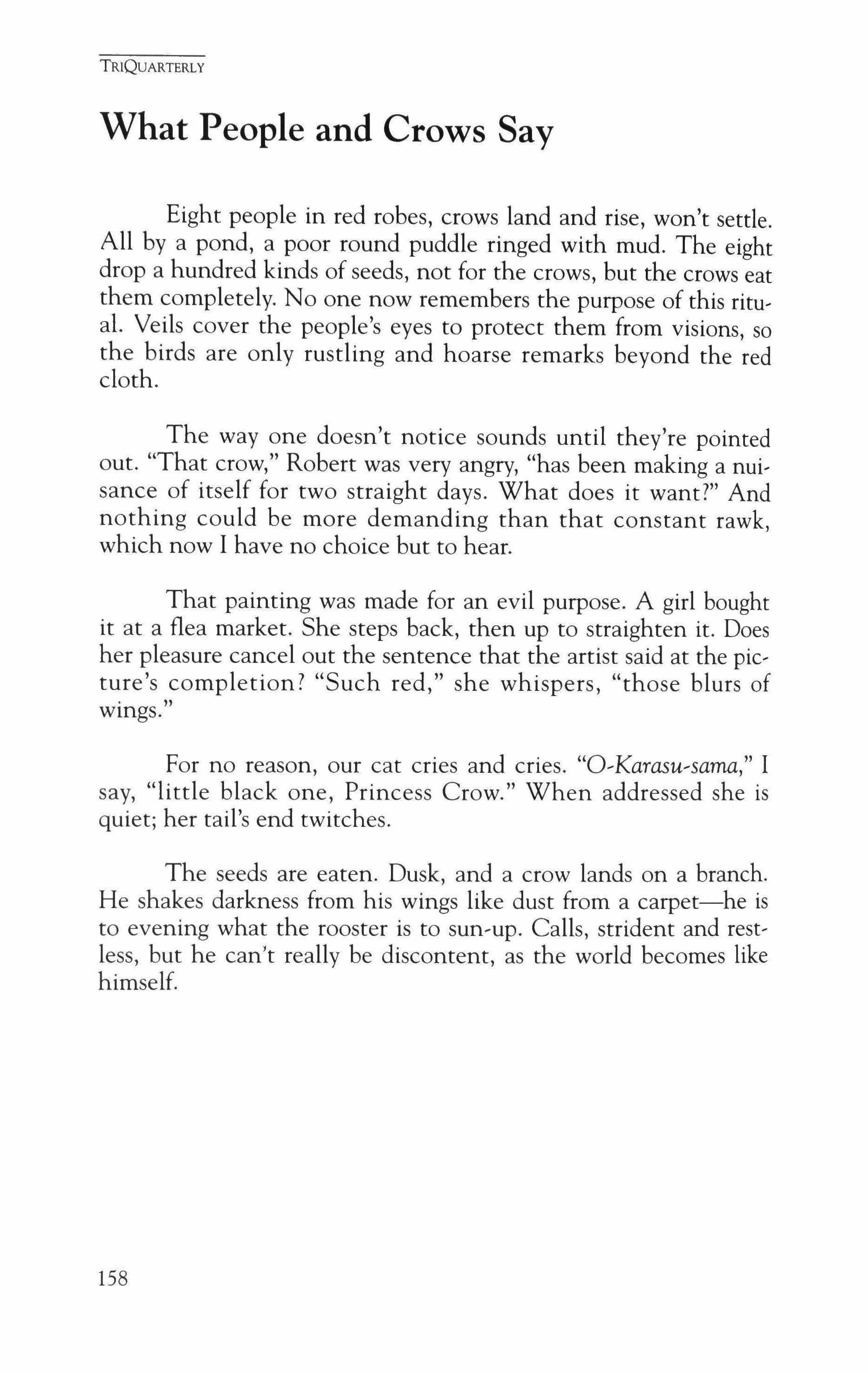
What People and Crows Say
Eight people in red robes, crows land and rise, won't settle. All by a pond, a poor round puddle ringed with mud. The eight drop a hundred kinds of seeds, not for the crows, but the crows eat them completely. No one now remembers the purpose of this ritual. Veils cover the people's eyes to protect them from visions, so the birds are only rustling and hoarse remarks beyond the red cloth.
The way one doesn't notice sounds until they're pointed out. "That crow," Robert was very angry, "has been making a nuisance of itself for two straight days. What does it want?" And nothing could be more demanding than that constant rawk, which now I have no choice but to hear.
That painting was made for an evil purpose. A girl bought it at a flea market. She steps back, then up to straighten it. Does her pleasure cancel out the sentence that the artist said at the picture's completion? "Such red," she whispers, "those blurs of wings.
For no reason, our cat cries and cries. "O-Karasu-sama," I say, "little black one, Princess Crow." When addressed she is quiet; her tail's end twitches.
The seeds are eaten. Dusk, and a crow lands on a branch. He shakes darkness from his wings like dust from a carpet-he is to evening what the rooster is to sun-up. Calls, strident and restless, but he can't really be discontent, as the world becomes like himself.
TRIQUARTERLY
158
Illinois River
Dan Bellm

An island of white oak and red oak, cottonwood and red bud, a barge at Utica passing through the locks,
the petroleum and LP trucks warming up in the lot of the farm service bureau, the drivers blowing into their hands and pulling on gloves for the day's work,
a tarpaper house on stilts over the flood plain, a chimney covered with vines, a line of cypresses leaning to the river, a girl riding her bike with training wheels down the field of grass,
a tilting white cottage under the sandstone bluffs, a haymow, a hog pen, a swing set, a satellite dish,
prefab aluminum granaries, plastic lawn deer, cornflowers, bees and horseflies in the roadside grass and bickering starlings, three pickups crossing the ferry at Kampsville, the rural electrification plant,
water sprayed into a field from a soaker hose unwound from a heavy spool,
herbicide sprayed from a tank under the air-conditioned tractor and accumulating in the black soil, turning up years later in the drinking water at the bottom of the page in a newspaper report,
TRIQUARTERLY
159
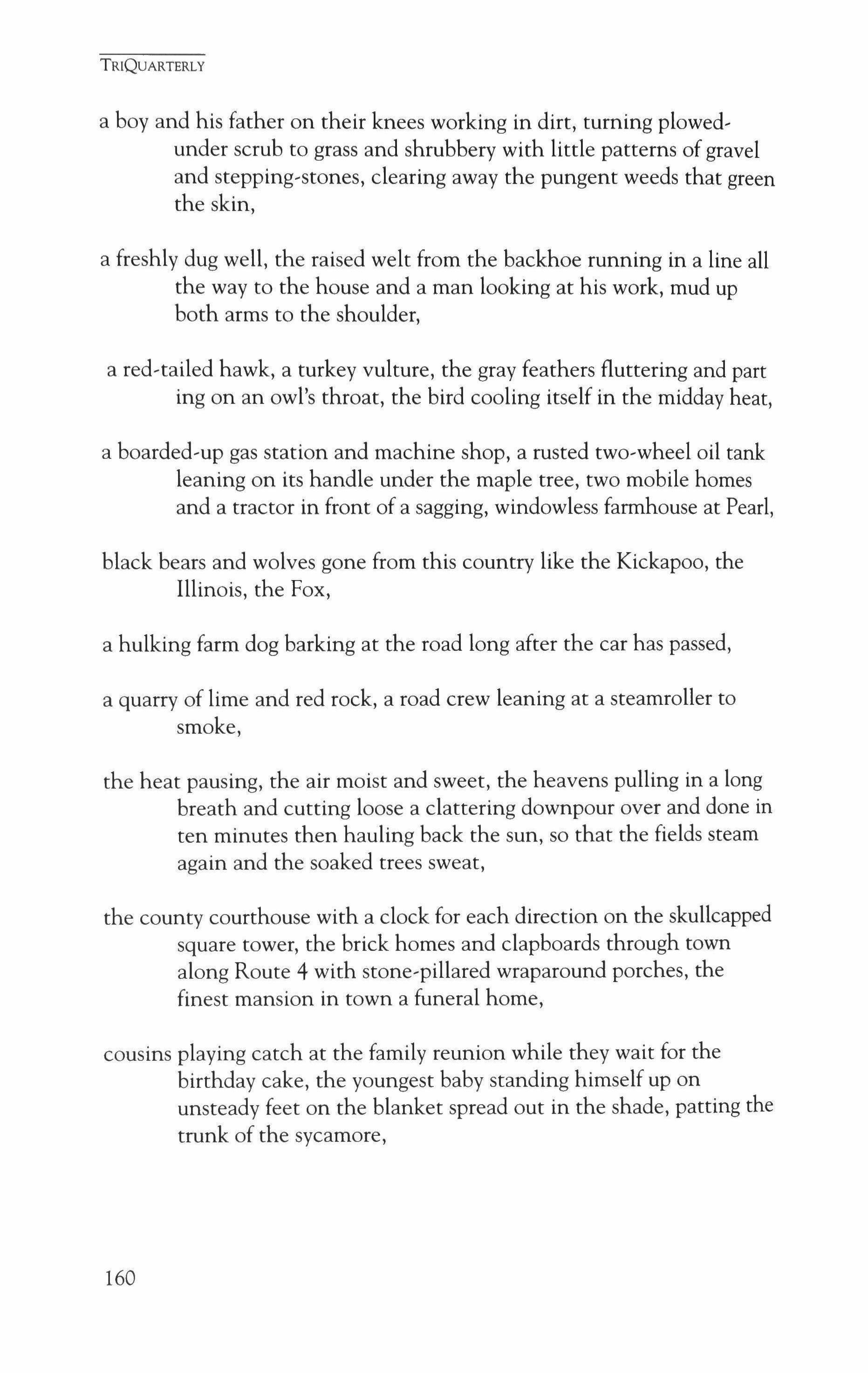
a boy and his father on their knees working in dirt, turning plowed, under scrub to grass and shrubbery with little patterns of gravel and stepping-stones, clearing away the pungent weeds that green the skin,
a freshly dug well, the raised welt from the backhoe running in a line all the way to the house and a man looking at his work, mud up both arms to the shoulder,
a red-tailed hawk, a turkey vulture, the gray feathers fluttering and part ing on an owl's throat, the bird cooling itself in the midday heat,
a boarded-up gas station and machine shop, a rusted two'wheel oil tank leaning on its handle under the maple tree, two mobile homes and a tractor in front of a sagging, windowless farmhouse at Pearl, black bears and wolves gone from this country like the Kickapoo, the Illinois, the Fox,
a hulking farm dog barking at the road long after the car has passed,
a quarry of lime and red rock, a road crew leaning at a steamroller to smoke,
the heat pausing, the air moist and sweet, the heavens pulling in a long breath and cutting loose a clattering downpour over and done in ten minutes then hauling back the sun, so that the fields steam again and the soaked trees sweat,
the county courthouse with a clock for each direction on the skullcapped square tower, the brick homes and clapboards through town along Route 4 with stone-pillared wraparound porches, the finest mansion in town a funeral home,
cousins playing catch at the family reunion while they wait for the birthday cake, the youngest baby standing himself up on unsteady feet on the blanket spread out in the shade, patting the trunk of the sycamore,
TRIQUARTERLY
160

three boys skinny-dipping in back of the levee surprised by a convoy of cars to the riverside from the Baptist Church, the preacher lifting his prayer and the congregation answering and a girl held down and drenched as the boys hide giggling in the rushes, their clothes strewn under the trees, and one of them sitting in the cafe at Beardstown forty years later with his friends, remember ing it,
twelve-year-olds jumping and screaming in the overheated pool at a motel birthday party, one mother waiting at a table with a bored scowl thumbing a People magazine, Princess Caroline's wedding on the cover,
a truck driver adjusting the side mirror so he can watch black smoke rise out the pipe as he shifts gears, the better to impress women, imagining he is a cowboy as he hauls in the miles of interstate toward Galesburg to metallic rock 'n' roll,
a man in Schuyler County estranged from his wife who takes his boys aged two and four out in the car and shoots them in the head by the side of the road near Rushville, then shoots himself, the younger boy safely strapped into his car seat in the back,
an auto graveyard, a Meadow Gold Dairy truck upended without wheels, a gravel pit, two wagon wheels at a driveway dotted with reflector caps,
a birdhouse in the shape of a riverboat, paper trash smoking in a bum barrel, a brown-spotted coyote crossing the road, a one-lane bridge,
generations of washing machines and oil cans, mower blades and truck parts, piled in a neat square patch in back of the house and overgrown with tall grass,
Hardee's and Taco Bell and Target and Wal-Mart, all new, floating in acres of parking under the tall lights, the edge of the city spreading into the flat darkness,
TRIQUARTERLY
161
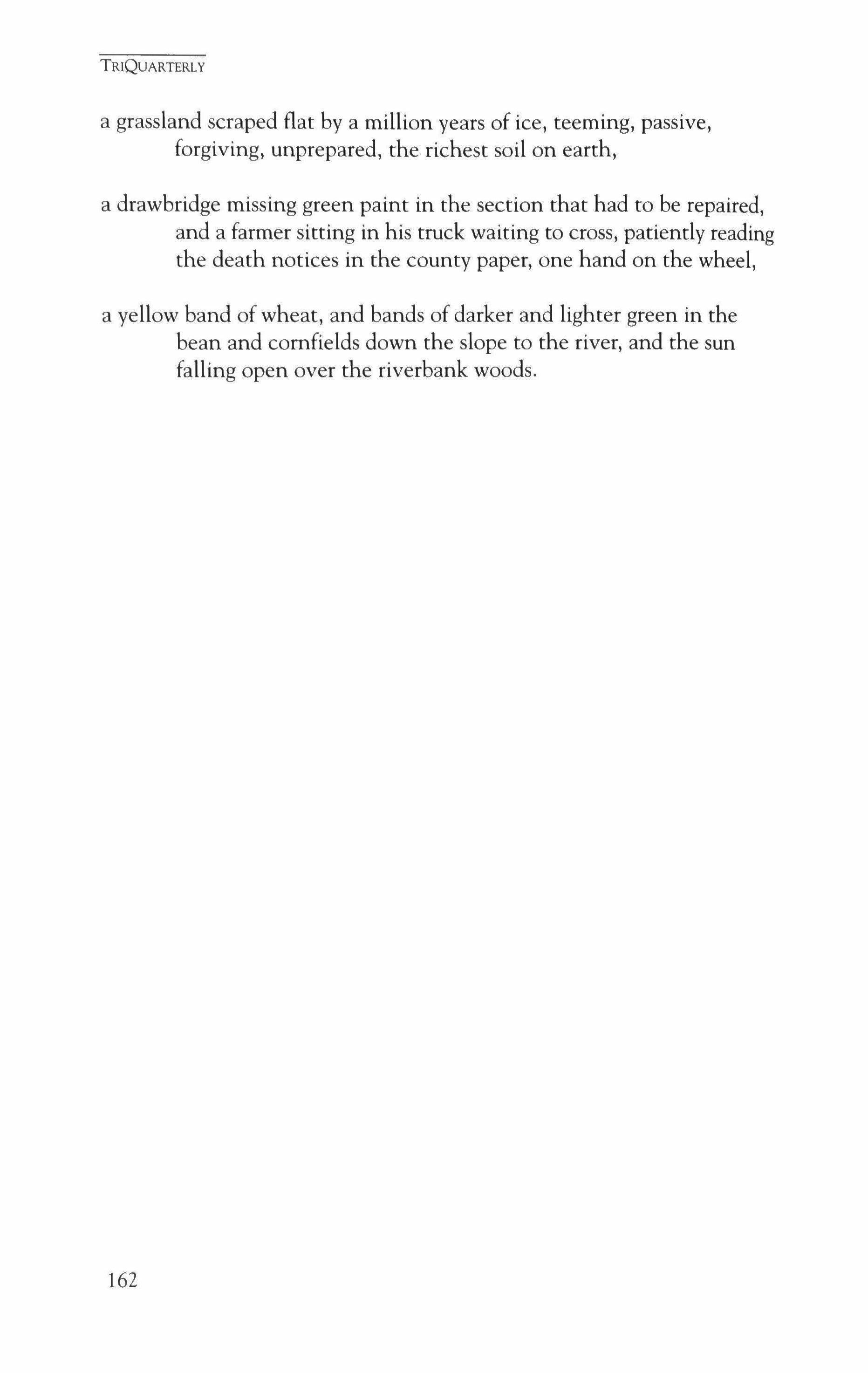
a grassland scraped flat by a million years of ice, teeming, passive, forgiving, unprepared, the richest soil on earth,
a drawbridge missing green paint in the section that had to be repaired, and a farmer sitting in his truck waiting to cross, patiently reading the death notices in the county paper, one hand on the wheel,
a yellow band of wheat, and bands of darker and lighter green in the bean and cornfields down the slope to the river, and the sun falling open over the riverbank woods.
TRIQUARTERLY
162
[Seguro que hell yes! (apologies to Flaco Jimenez)
Luis]. Rodrfguez
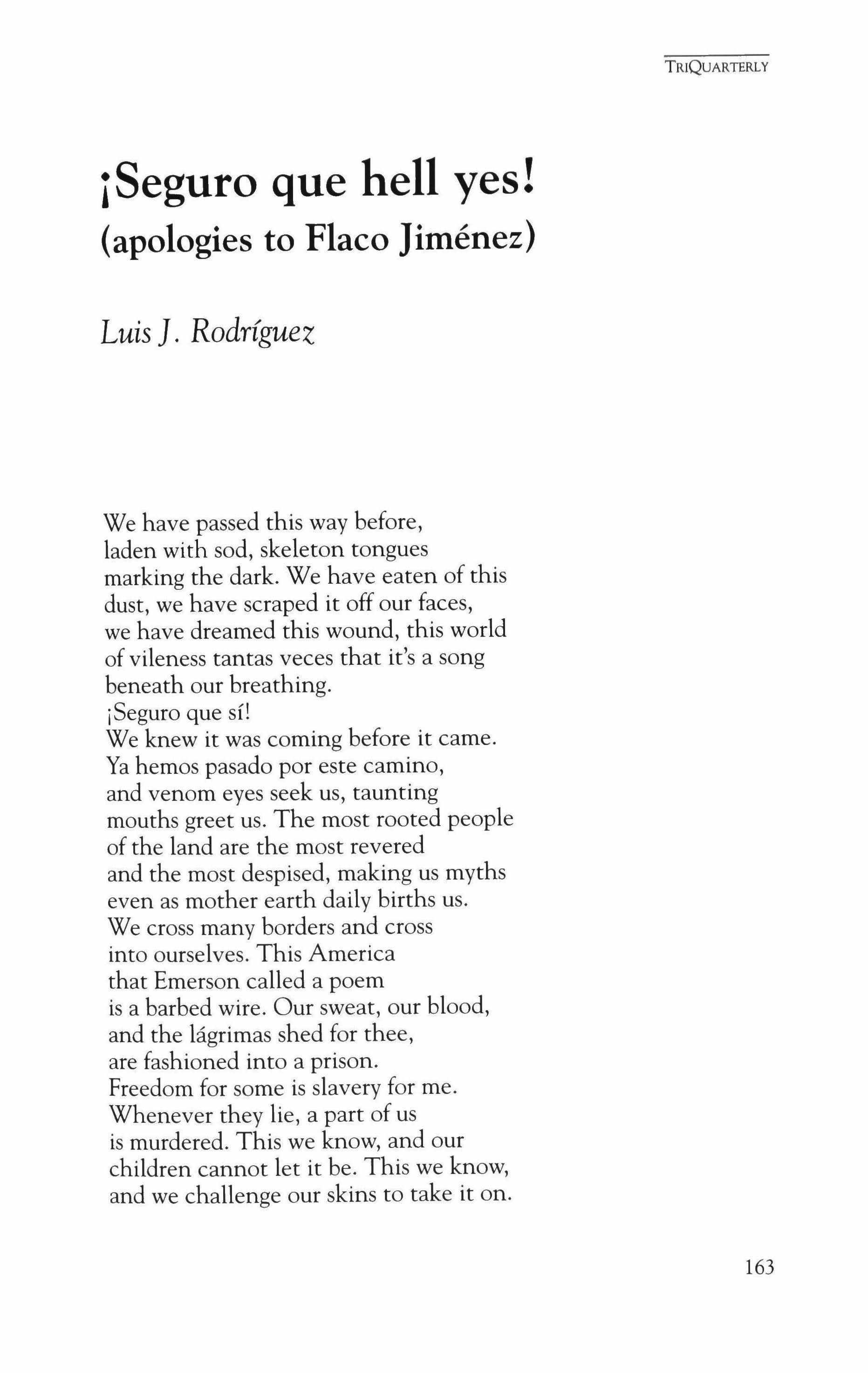
We have passed this way before, laden with sod, skeleton tongues marking the dark. We have eaten of this dust, we have scraped it off our faces, we have dreamed this wound, this world of vileness tantas veces that it's a song beneath our breathing.
[Seguro que sf!
We knew it was coming before it came. Ya hemos pasado por este camino, and venom eyes seek us, taunting mouths greet us. The most rooted people of the land are the most revered and the most despised, making us myths even as mother earth daily births us. We cross many borders and cross into ourselves. This America that Emerson called a poem is a barbed wire. Our sweat, our blood, and the lagrirnas shed for thee, are fashioned into a prison. Freedom for some is slavery for me. Whenever they lie, a part of us is murdered. This we know, and our children cannot let it be. This we know, and we challenge our skins to take it on.
TRlQUARTERLY
163

This we know because we have passed this way before, seguro que sf, cactus bedding at our feet, snake curling through our veins. Ya hemos pasado por este camino, and we can never stop coming. The desert calls us: the fire-scarred trees, the dried bones of elders, the silent screaming of stones, they call us back and we come, because we have died so many times to the sun, because we belong to the rivers wild, because we never feared the blue in the eye, the green in the heart, the searing laws and guns and lies, because we dreamed all this, and now we are awake to dream again. [Seguro que hell yes!
TR1QUARTERLY
164
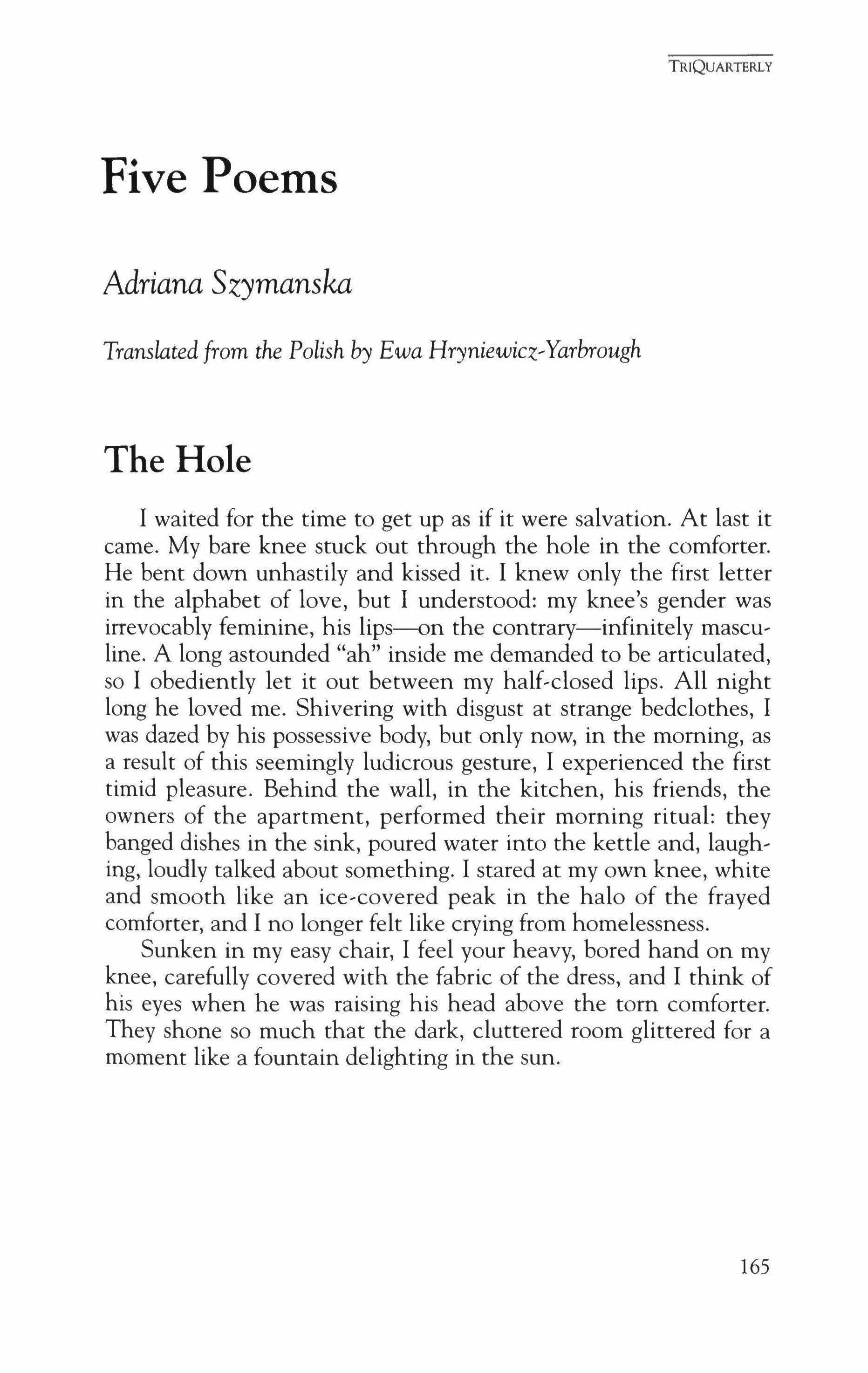
Five Poems
Adriana Szymanska
Translated from the Polish by
Ewa Hryniewicz�Yarbrough
The Hole
I waited for the time to get up as if it were salvation. At last it came. My bare knee stuck out through the hole in the comforter. He bent down unhastily and kissed it. I knew only the first letter in the alphabet of love, but I understood: my knee's gender was irrevocably feminine, his lips--on the contrary-infinitely masculine. A long astounded "ah" inside me demanded to be articulated, so I obediently let it out between my half-closed lips. All night long he loved me. Shivering with disgust at strange bedclothes, I was dazed by his possessive body, but only now, in the morning, as a result of this seemingly ludicrous gesture, I experienced the first timid pleasure. Behind the wall, in the kitchen, his friends, the owners of the apartment, performed their morning ritual: they banged dishes in the sink, poured water into the kettle and, laughing, loudly talked about something. I stared at my own knee, white and smooth like an ice-covered peak in the halo of the frayed comforter, and I no longer felt like crying from homelessness.
Sunken in my easy chair, I feel your heavy, bored hand on my knee, carefully covered with the fabric of the dress, and I think of his eyes when he was raising his head above the tom comforter. They shone so much that the dark, cluttered room glittered for a moment like a fountain delighting in the sun.
TRIQUARTERLY
165
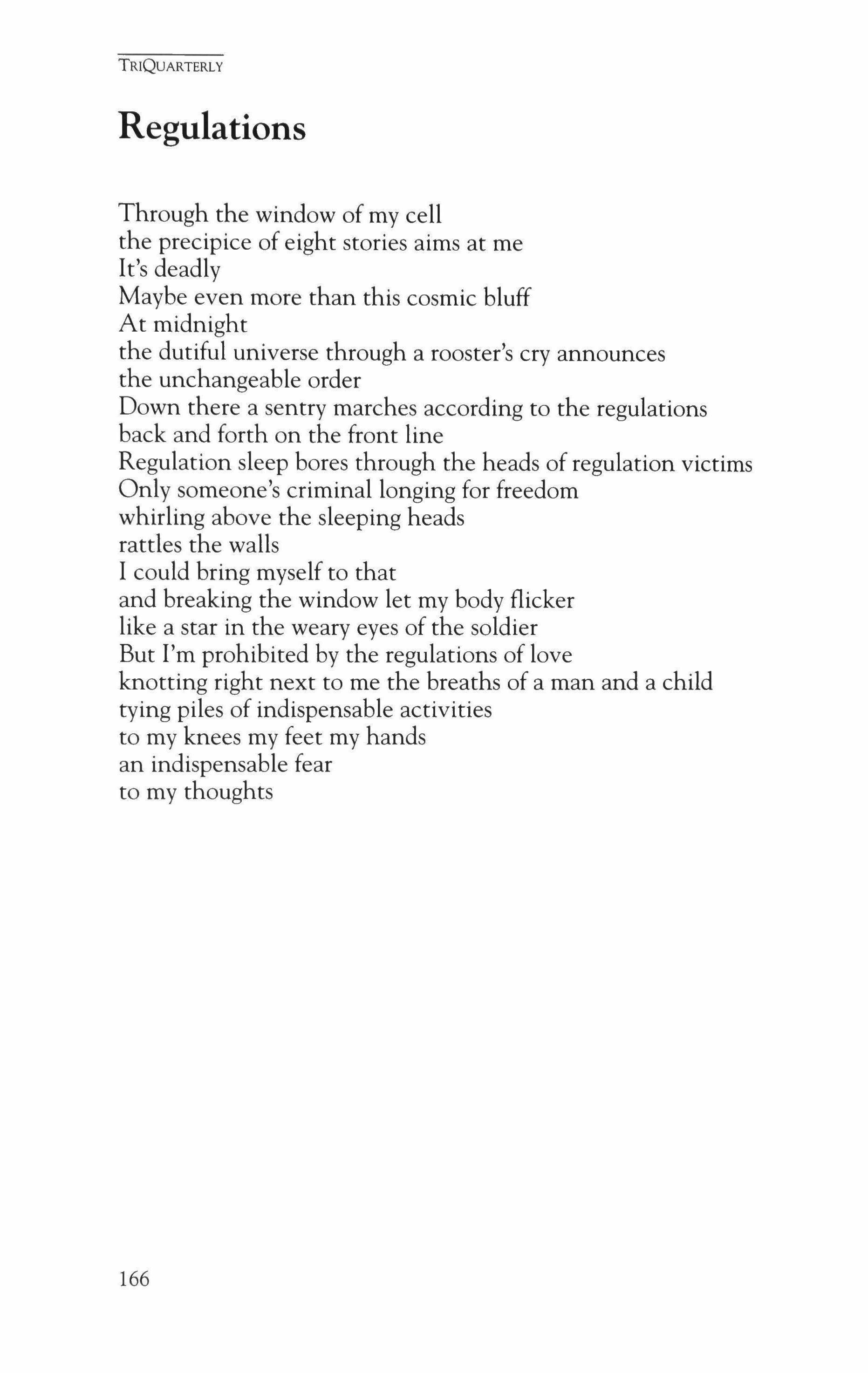
Regulations
Through the window of my cell
the precipice of eight stories aims at me
It's deadly
Maybe even more than this cosmic bluff
At midnight the dutiful universe through a rooster's cry announces the unchangeable order
Down there a sentry marches according to the regulations back and forth on the front line
Regulation sleep bores through the heads of regulation victims
Only someone's criminal longing for freedom whirling above the sleeping heads rattles the walls
I could bring myself to that and breaking the window let my body flicker like a star in the weary eyes of the soldier
But I'm prohibited by the regulations of love knotting right next to me the breaths of a man and a child tying piles of indispensable activities to my knees my feet my hands an indispensable fear to my thoughts
TRIQUARTERLY
166
Barbarian

This boy has in his eyes two silver mirrors that reflect the universe. When I look into them, I become a beam of light. A pulse of space. A flicker of infinity. If I looked longer, I know, the world would come to an end. An explosion of matter. A kinetic crash. But I look only for a moment and he doesn't even notice this chasm in me which, just in time, my eyelids shut off from his sight.
He is so young that his feet and elbows throw sparks. An underaged barbarian who inflames my yearning for the past. For the beginning when the eyes of all creatures glowed innocent as an eastern dawn or darkened bloodthirsty as the night. When tenderness was pure as a dream, and fury bared real fangs. When each gesture opened gardens of delight or inflicted deadly wounds.
I was once in Paradise. But now, exiled, I startle at the touch of his living hand. Do I still reckon with life? Oh, he lifts a page of sorrow from my lap so unexpectedly, so gently that one more time, enraptured, I am born naked like Venus.
Glory to you, barbarian! One more time, thanks to you, I die.
TRIQUARTERLY
167
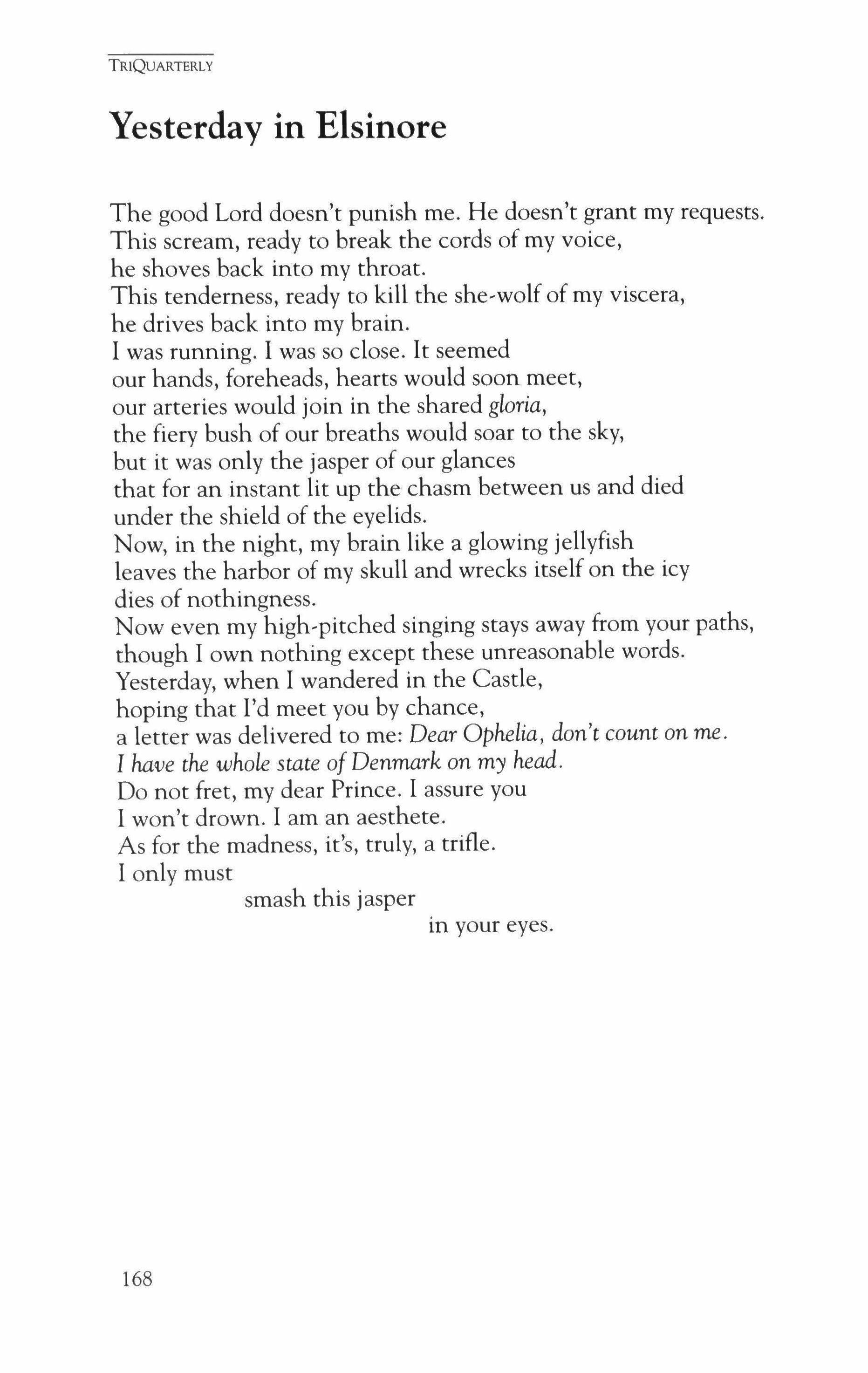
Yesterday in Elsinore
The good Lord doesn't punish me. He doesn't grant my requests. This scream, ready to break the cords of my voice, he shoves back into my throat. This tenderness, ready to kill the she-wolf of my viscera, he drives back into my brain.
I was running. I was so close. It seemed our hands, foreheads, hearts would soon meet, our arteries would join in the shared gloria, the fiery bush of our breaths would soar to the sky, but it was only the jasper of our glances that for an instant lit up the chasm between us and died under the shield of the eyelids.
Now, in the night, my brain like a glowing jellyfish leaves the harbor of my skull and wrecks itself on the icy dies of nothingness.
Now even my high-pitched singing stays away from your paths, though I own nothing except these unreasonable words. Yesterday, when I wandered in the Castle, hoping that I'd meet you by chance, a letter was delivered to me: Dear Ophelia, don't count on me. I have the whole state of Denmark on my head. Do not fret, my dear Prince. I assure you I won't drown. I am an aesthete.
As for the madness, it's, truly, a trifle. I only must smash this jasper in your eyes.
TRIQUARTERLY
168
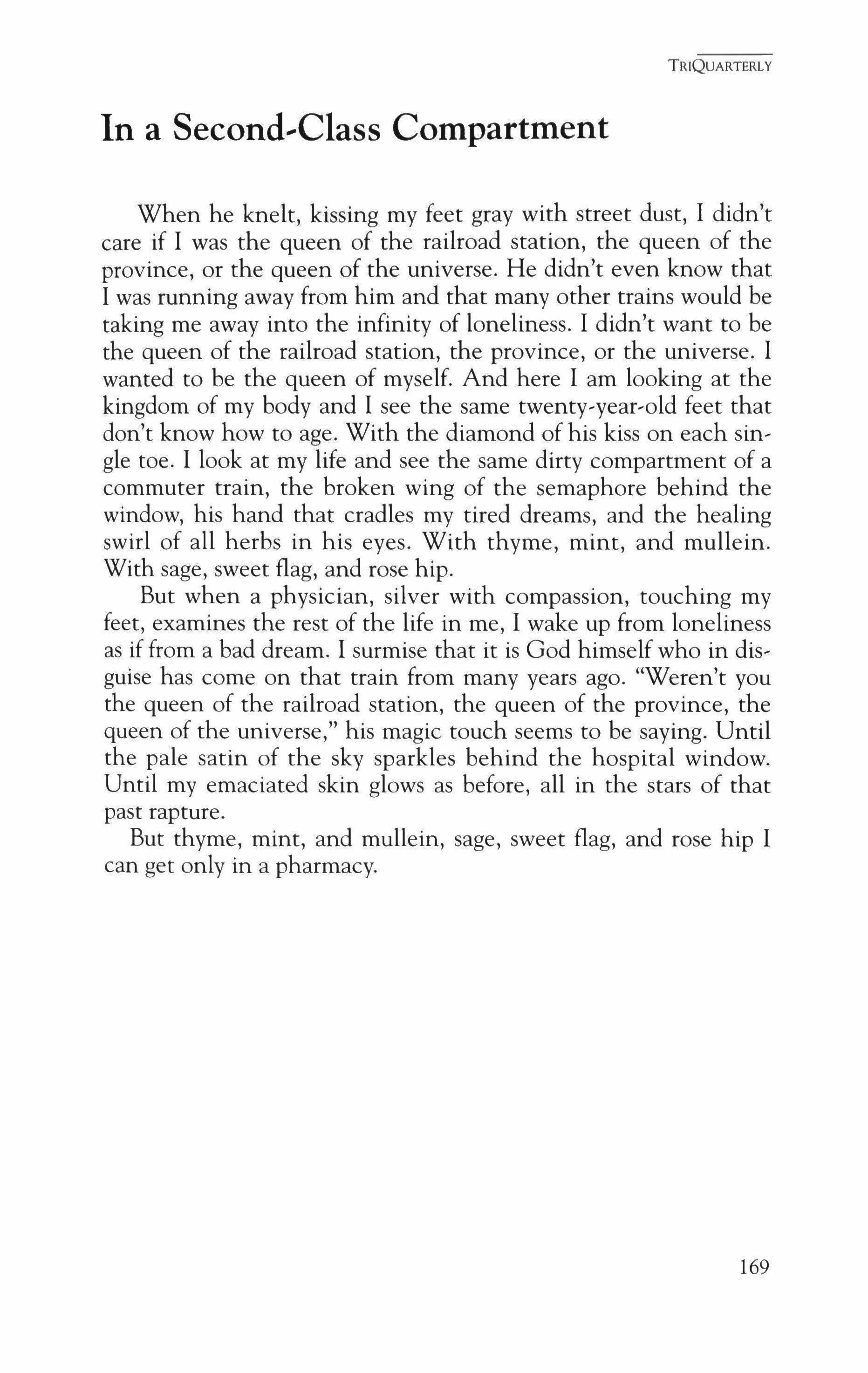
In a Second Class Compartment
When he knelt, kissing my feet gray with street dust, I didn't care if I was the queen of the railroad station, the queen of the province, or the queen of the universe. He didn't even know that I was running away from him and that many other trains would be taking me away into the infinity of loneliness. I didn't want to be the queen of the railroad station, the province, or the universe. I wanted to be the queen of myself. And here I am looking at the kingdom of my body and I see the same twenty,year,old feet that don't know how to age. With the diamond of his kiss on each sin' gle toe. I look at my life and see the same dirty compartment of a commuter train, the broken wing of the semaphore behind the window, his hand that cradles my tired dreams, and the healing swirl of all herbs in his eyes. With thyme, mint, and mullein. With sage, sweet flag, and rose hip.
But when a physician, silver with compassion, touching my feet, examines the rest of the life in me, I wake up from loneliness as if from a bad dream. I surmise that it is God himself who in dis, guise has come on that train from many years ago. "Weren't you the queen of the railroad station, the queen of the province, the queen of the universe," his magic touch seems to be saying. Until the pale satin of the sky sparkles behind the hospital window. Until my emaciated skin glows as before, all in the stars of that past rapture.
But thyme, mint, and mullein, sage, sweet flag, and rose hip I can get only in a pharmacy.
TRIQUARTERLY
169
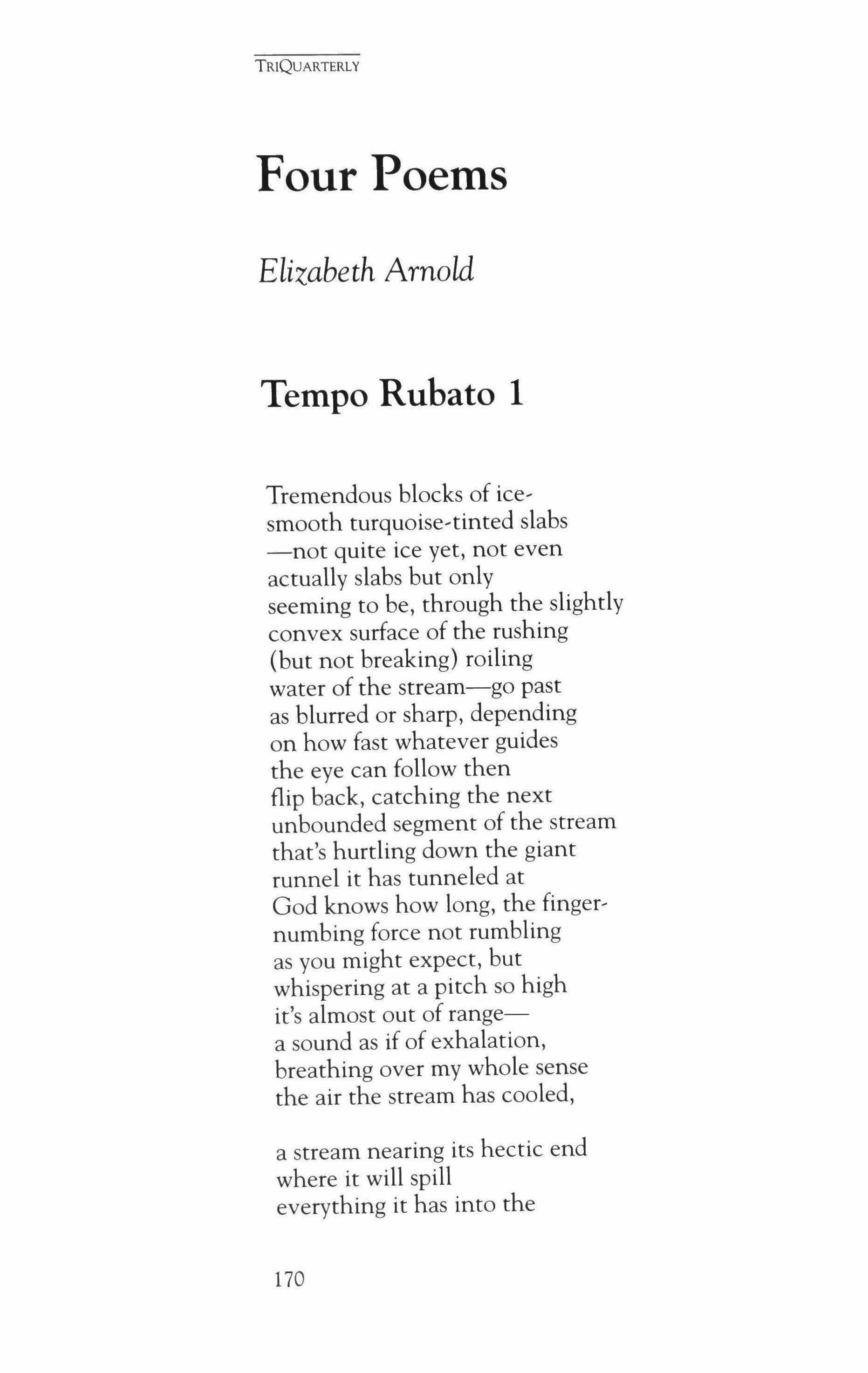
Four Poems
Elizabeth Arnold
Tempo Rubato 1
Tremendous blocks of icesmooth turquoise-tinted slabs -not quite ice yet, not even actually slabs but only seeming to be, through the slightly convex surface of the rushing (but not breaking) roiling water of the stream-go past as blurred or sharp, depending on how fast whatever guides the eye can follow then flip back, catching the next unbounded segment of the stream that's hurtling down the giant runnel it has tunneled at God knows how long, the fingernumbing force not rumbling as you might expect, but whispering at a pitch so high it's almost out of rangea sound as if of exhalation, breathing over my whole sense the air the stream has cooled,
a stream nearing its hectic end where it will spill everything it has into the
TRIQUARTERLY
170

waiting, open-ended once- lake arm of ocean, the forest-green fjordas earlier, uncountable millennia ago, it broke the barrier of dirt and trees and rock, crashed through or slowly rubbed until the land dissolved and flooded through itself beyond beyond.
TRIQUARTERLY
171
Fall Recurrence
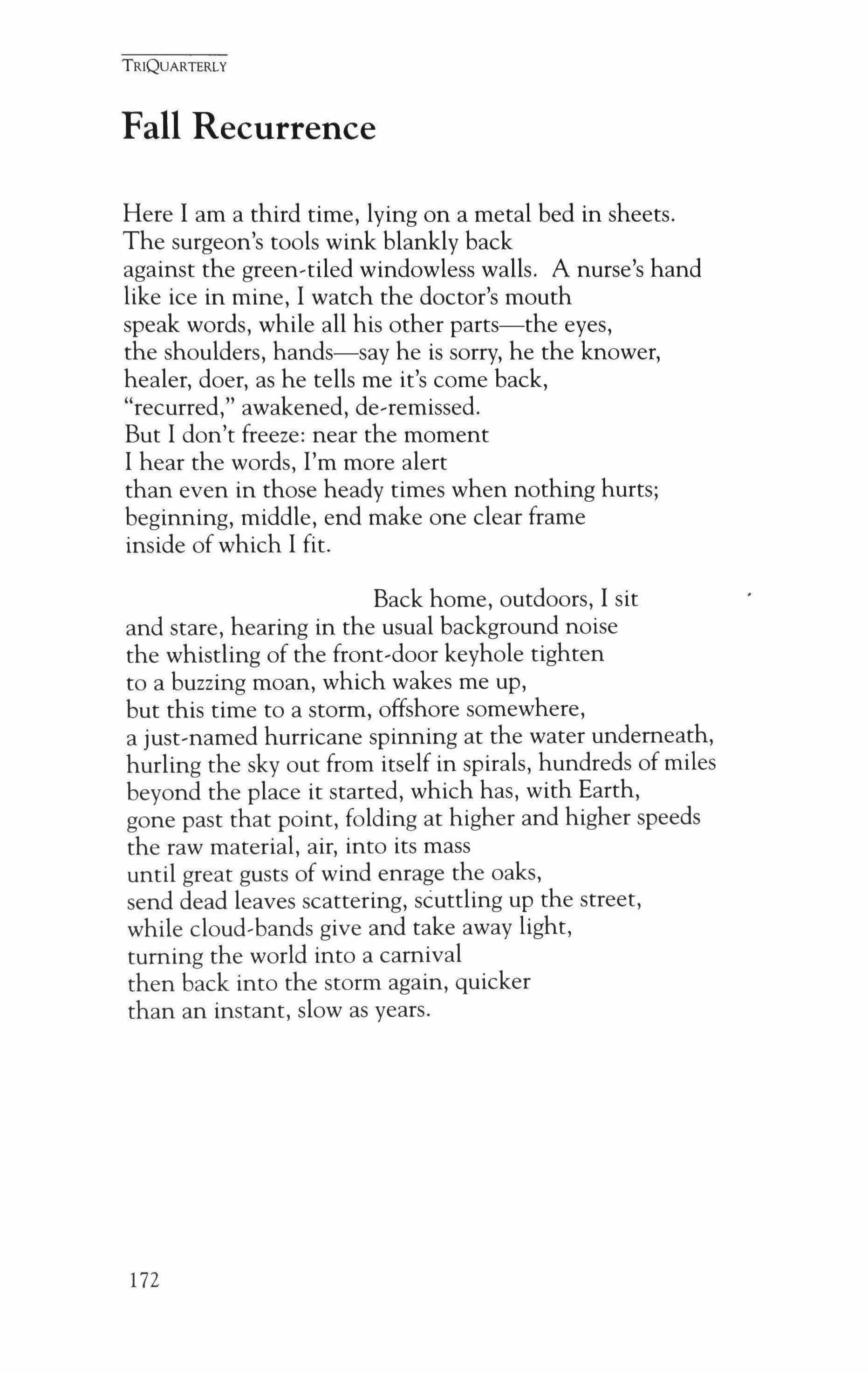
Here I am a third time, lying on a metal bed in sheets. The surgeon's tools wink blankly back against the green-tiled windowless walls. A nurse's hand like ice in mine, I watch the doctor's mouth speak words, while all his other parts-the eyes, the shoulders, hands-say he is sorry, he the knower, healer, doer, as he tells me it's come back, "recurred," awakened, de-remissed. But I don't freeze: near the moment I hear the words, I'm more alert than even in those heady times when nothing hurts; beginning, middle, end make one clear frame inside of which I fit.
Back home, outdoors, I sit and stare, hearing in the usual background noise the whistling of the front-door keyhole tighten to a buzzing moan, which wakes me up, but this time to a storm, offshore somewhere, a just-named hurricane spinning at the water underneath, hurling the sky out from itself in spirals, hundreds of miles beyond the place it started, which has, with Earth, gone past that point, folding at higher and higher speeds the raw material, air, into its mass until great gusts of wind enrage the oaks, send dead leaves scattering, scuttling up the street, while cloud-bands give and take away light, turning the world into a carnival then back into the storm again, quicker than an instant, slow as years.
TRIQUARTERLY
172
Swim
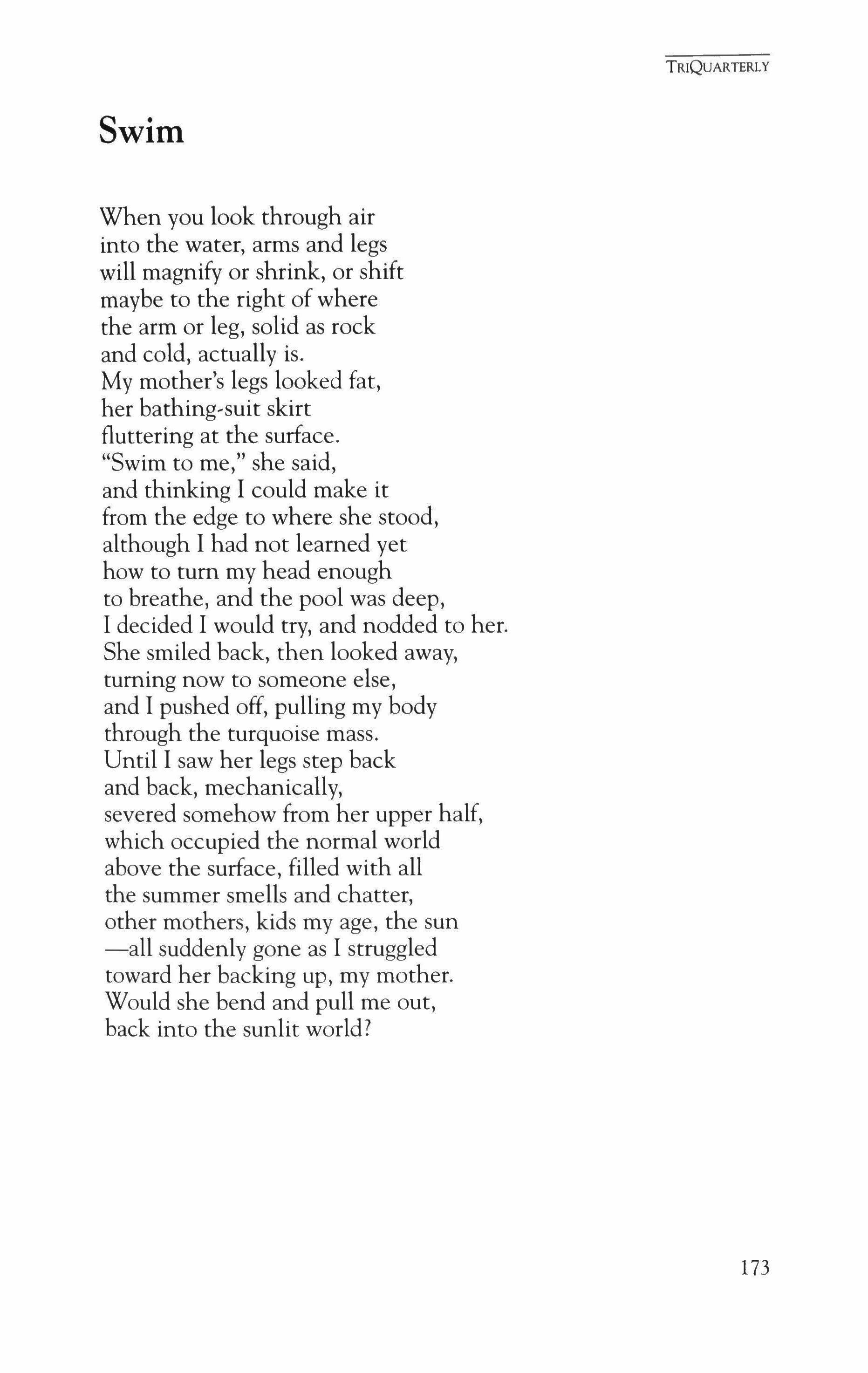
When you look through air into the water, arms and legs will magnify or shrink, or shift maybe to the right of where the arm or leg, solid as rock and cold, actually is. My mother's legs looked fat, her bathing-suit skirt fluttering at the surface. "Swim to me," she said, and thinking I could make it from the edge to where she stood, although I had not learned yet how to tum my head enough to breathe, and the pool was deep, I decided I would try, and nodded to her. She smiled back, then looked away, turning now to someone else, and I pushed off, pulling my body through the turquoise mass. Until I saw her legs step back and back, mechanically, severed somehow from her upper half, which occupied the normal world above the surface, filled with all the summer smells and chatter, other mothers, kids my age, the sun -all suddenly gone as I struggled toward her backing up, my mother. Would she bend and pull me out, back into the sunlit world?
TRIQUARTERLY
173
The Boat Man
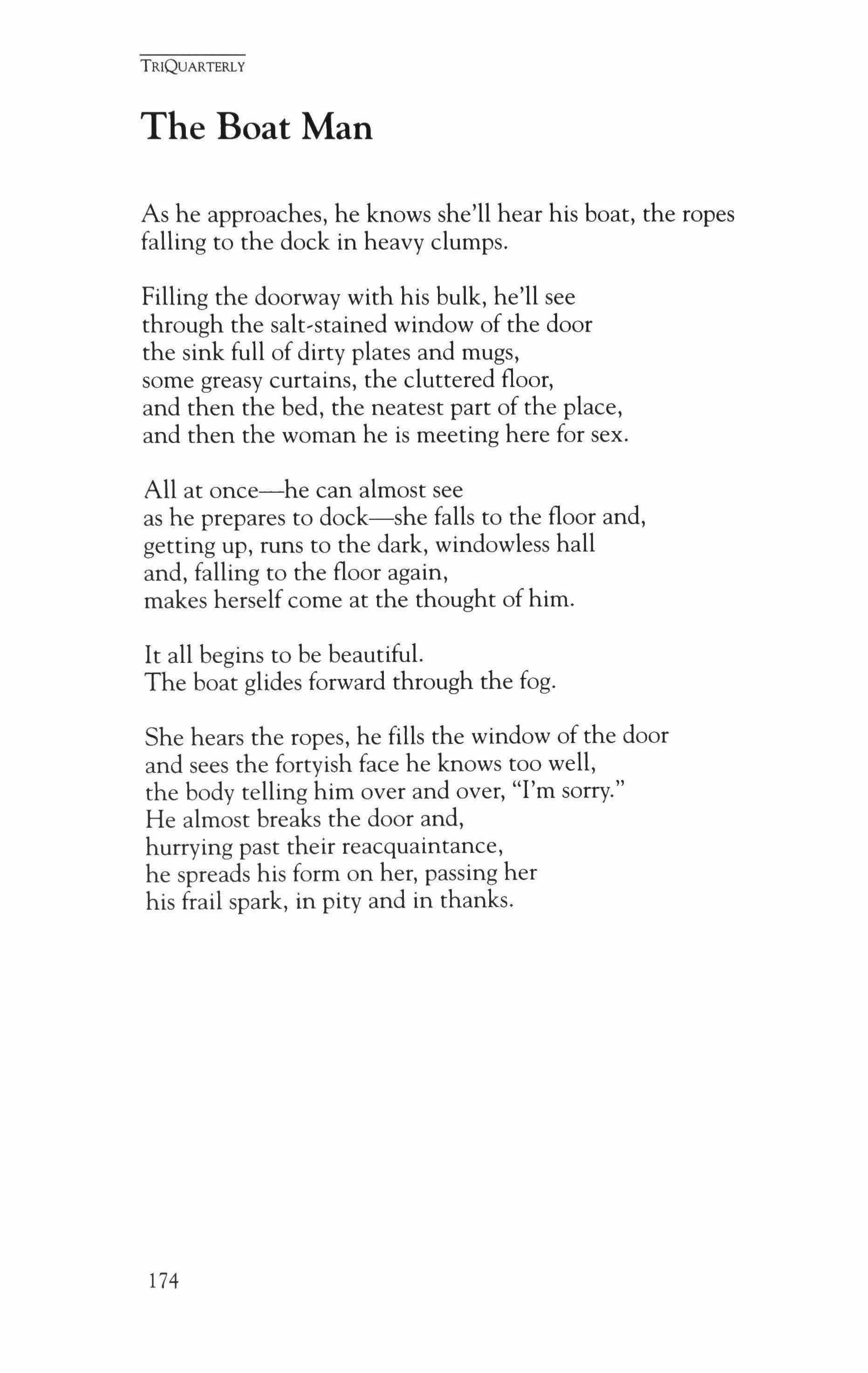
As he approaches, he knows she'll hear his boat, the ropes falling to the dock in heavy clumps.
Filling the doorway with his bulk, he'll see through the salt,stained window of the door the sink full of dirty plates and mugs, some greasy curtains, the cluttered floor, and then the bed, the neatest part of the place, and then the woman he is meeting here for sex.
All at once-he can almost see as he prepares to dock-she falls to the floor and, getting up, runs to the dark, windowless hall and, falling to the floor again, makes herself come at the thought of him.
It all begins to be beautiful. The boat glides forward through the fog.
She hears the ropes, he fills the window of the door and sees the fortyish face he knows too well, the body telling him over and over, "I'm sorry." He almost breaks the door and, hurrying past their reacquaintance, he spreads his form on her, passing her his frail spark, in pity and in thanks.
TRIQUARTERLY
174
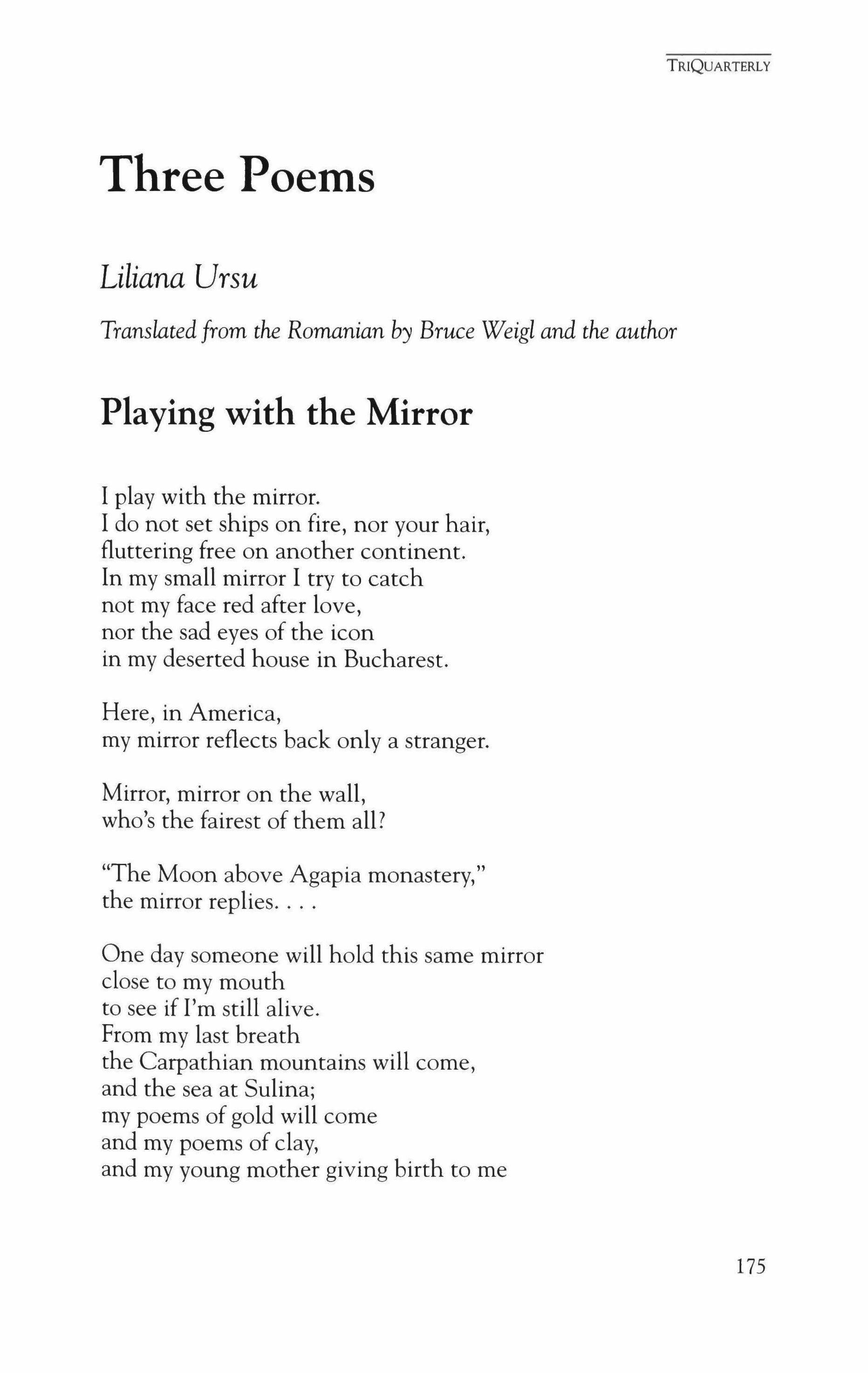
Three Poems
Liliana Ursu
Translated from the Romanian by Bruce Weigl and the author
Playing with the Mirror
I play with the mirror. I do not set ships on fire, nor your hair, fluttering free on another continent. In my small mirror I try to catch not my face red after love, nor the sad eyes of the icon in my deserted house in Bucharest.
Here, in America, my mirror reflects back only a stranger.
Mirror, mirror on the wall, who's the fairest of them all?
"The Moon above Agapia monastery," the mirror replies
One day someone will hold this same mirror close to my mouth to see if I'm still alive. From my last breath the Carpathian mountains will come, and the sea at Sulina; my poems of gold will come and my poems of clay, and my young mother giving birth to me
TRIQUARTERLY
175
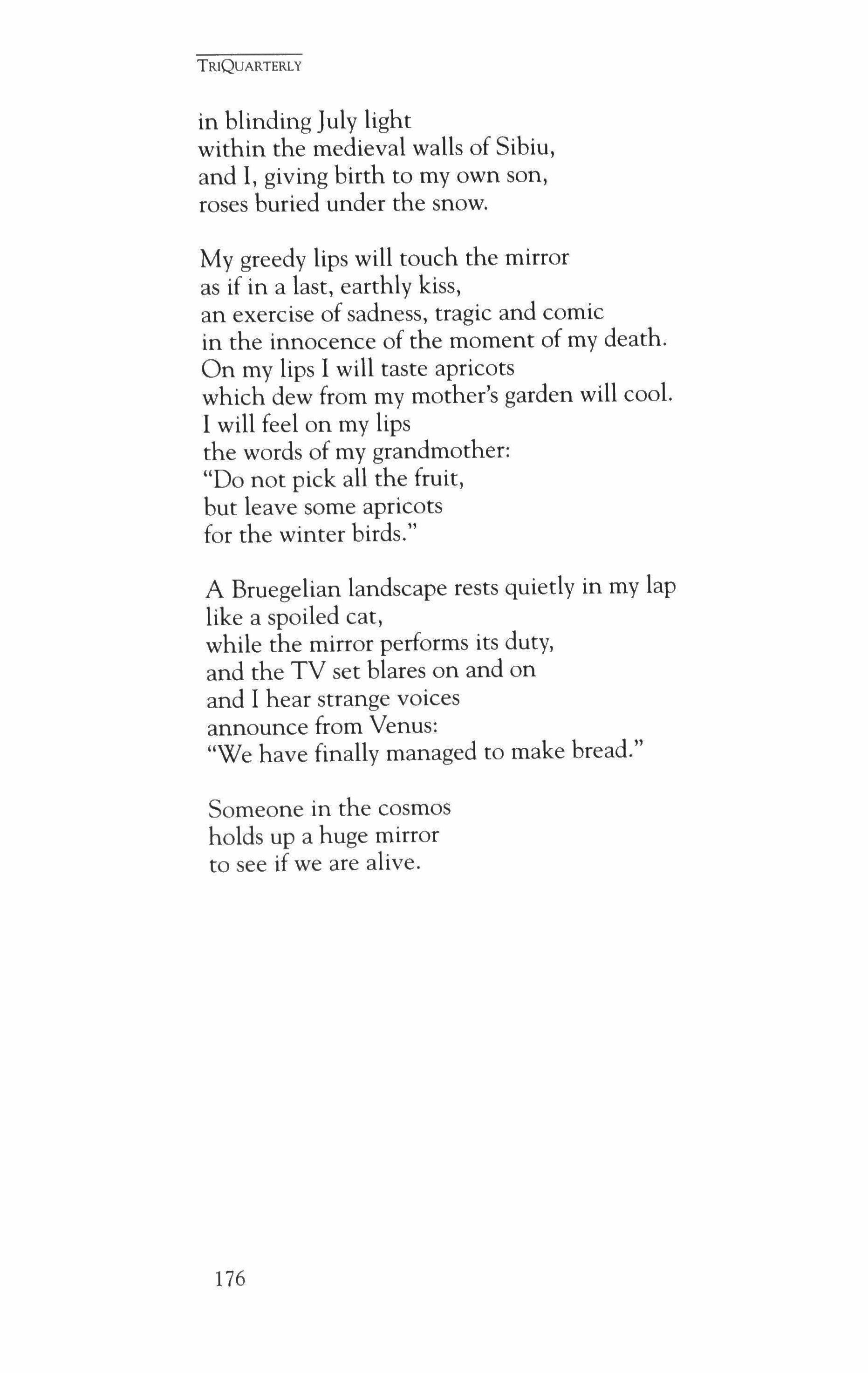
in blindingJuly light within the medieval walls of Sibiu, and 1, giving birth to my own son, roses buried under the snow.
My greedy lips will touch the mirror as if in a last, earthly kiss, an exercise of sadness, tragic and comic in the innocence of the moment of my death. On my lips 1 will taste apricots which dew from my mother's garden will cool. 1 will feel on my lips the words of my grandmother: "Do not pick all the fruit, but leave some apricots for the winter birds."
A Bruegelian landscape rests quietly in my lap like a spoiled cat, while the mirror performs its duty, and the TV set blares on and on and I hear strange voices announce from Venus: "We have finally managed to make bread."
Someone in the cosmos holds up a huge mirror to see if we are alive.
TRIQUARTERLY
176
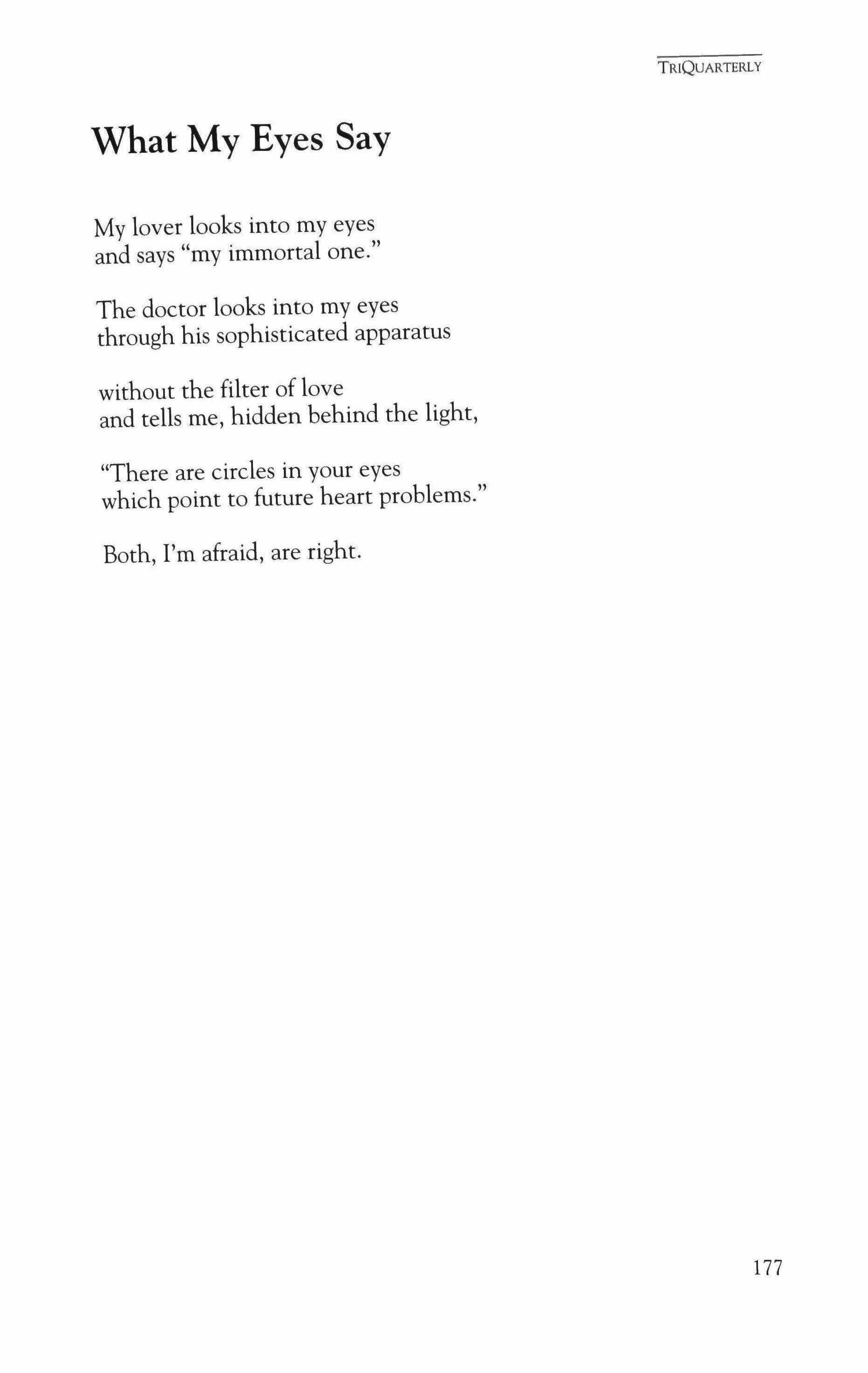
What My Eyes Say
My lover looks into my eyes and says "my immortal one."
The doctor looks into my eyes through his sophisticated apparatus
without the filter of love and tells me, hidden behind the light,
"There are circles in your eyes which point to future heart problems."
Both, I'm afraid, are right.
TRIQUARTERLY
177
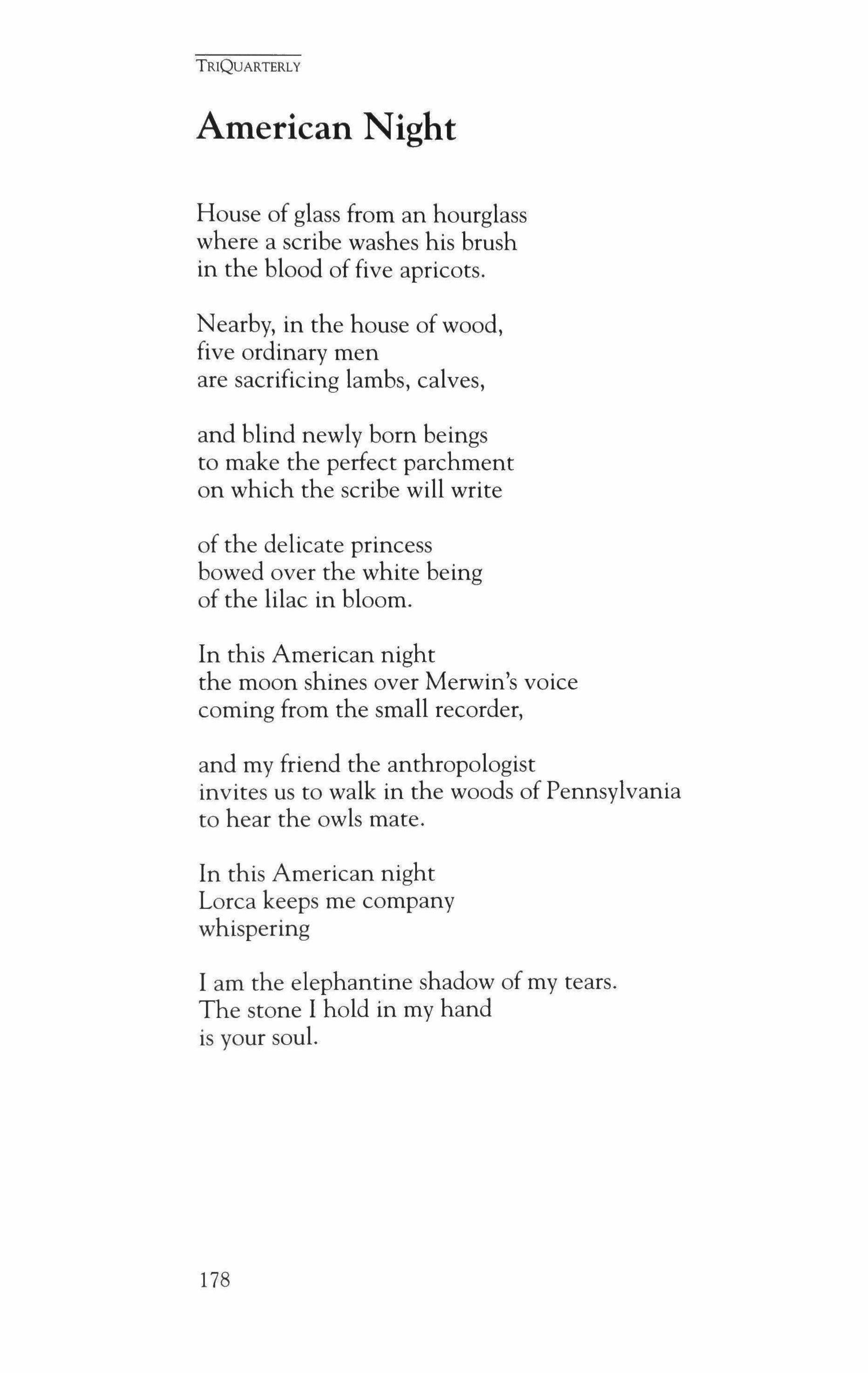
American Night
House of glass from an hourglass where a scribe washes his brush in the blood of five apricots.
Nearby, in the house of wood, five ordinary men are sacrificing lambs, calves, and blind newly born beings to make the perfect parchment on which the scribe will write of the delicate princess bowed over the white being of the lilac in bloom.
In this American night the moon shines over Merwin's voice coming from the small recorder, and my friend the anthropologist invites us to walk in the woods of Pennsylvania to hear the owls mate.
In this American night Lorca keeps me company whispering
I am the elephantine shadow of my tears. The stone I hold in my hand is your soul.
TRIQUARTERLY
178
Ode 11.5 / To a Suitor
Horace
Translated from the Latin by David Ferry
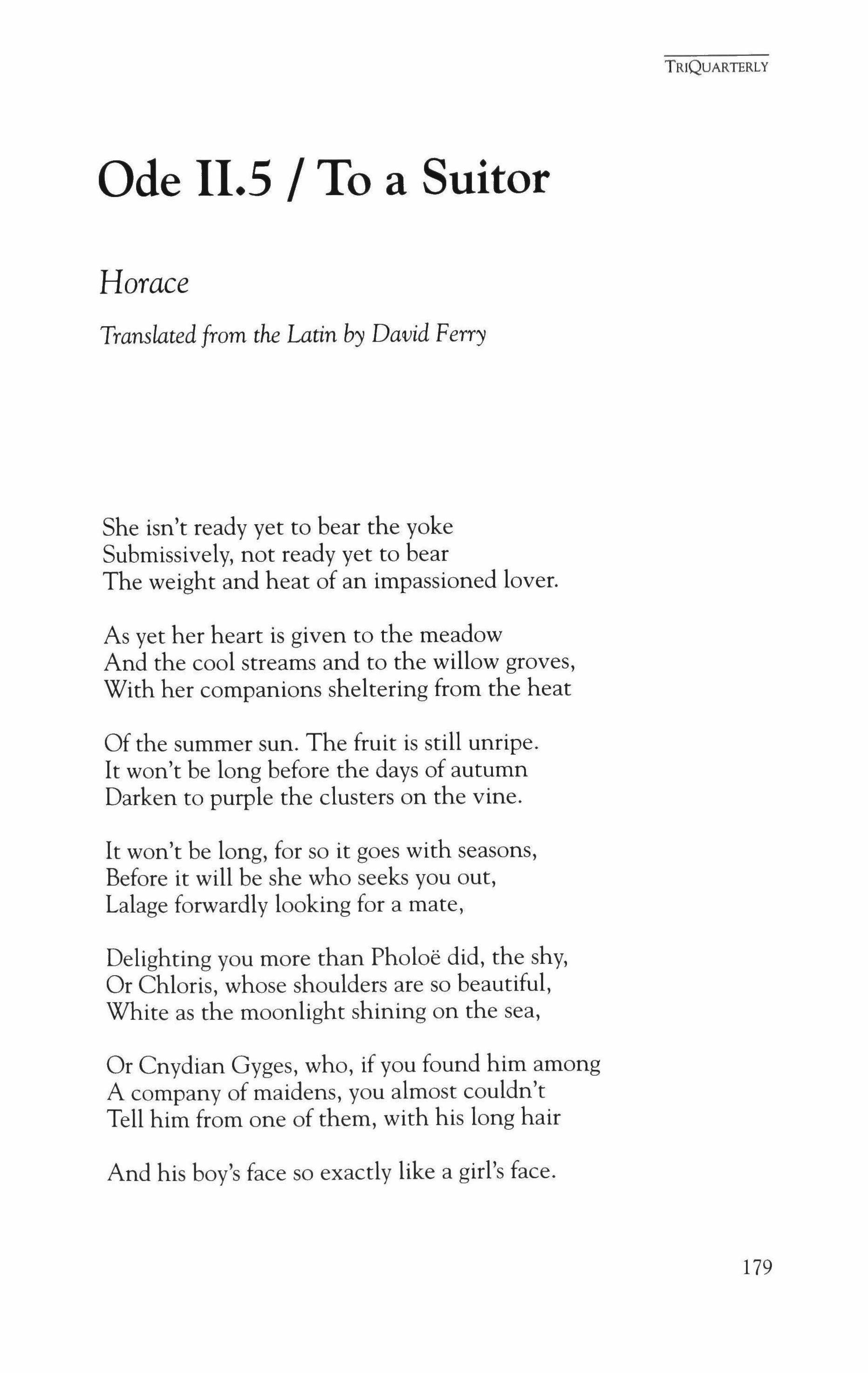
She isn't ready yet to bear the yoke
Submissively, not ready yet to bear
The weight and heat of an impassioned lover.
As yet her heart is given to the meadow
And the cool streams and to the willow groves, With her companions sheltering from the heat
Of the summer sun. The fruit is still unripe. It won't be long before the days of autumn Darken to purple the clusters on the vine.
It won't be long, for so it goes with seasons, Before it will be she who seeks you out, Lalage forwardly looking for a mate,
Delighting you more than Pholoe did, the shy, Or Chloris, whose shoulders are so beautiful, White as the moonlight shining on the sea,
Or Cnydian Gyges, who, if you found him among A company of maidens, you almost couldn't Tell him from one of them, with his long hair
And his boy's face so exactly like a girl's face.
TRIQUARTERLY 179
Two Poems
M. Wyrebek
Gone
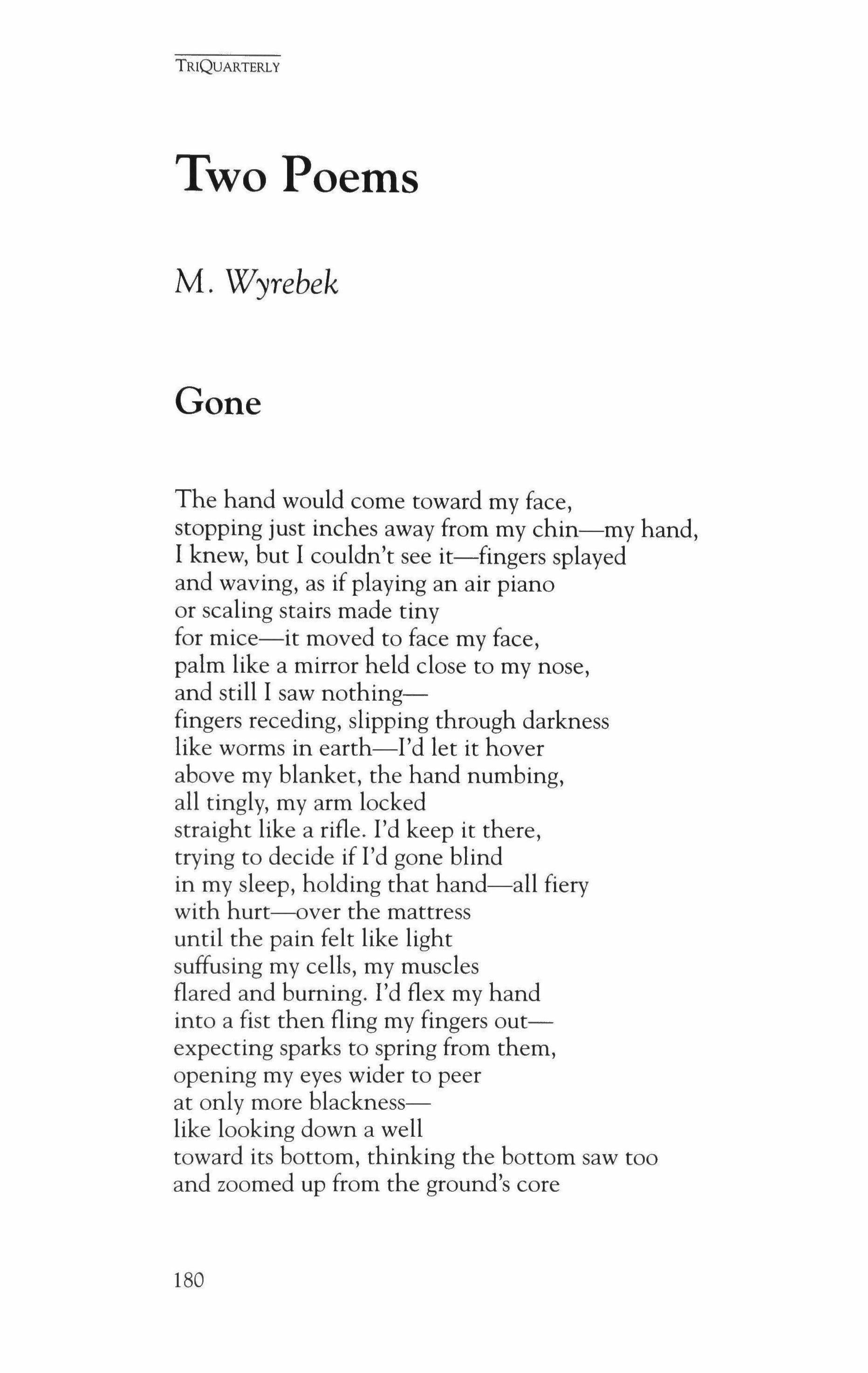
The hand would come toward my face, stopping just inches away from my chin-my hand, I knew, but I couldn't see it-fingers splayed and waving, as if playing an air piano or scaling stairs made tiny for mice-it moved to face my face, palm like a mirror held close to my nose, and still I saw nothingfingers receding, slipping through darkness like worms in earth-I'd let it hover above my blanket, the hand numbing, all tingly, my arm locked straight like a rifle. I'd keep it there, trying to decide if I'd gone blind in my sleep, holding that hand-all fiery with hurt-over the mattress until the pain felt like light suffusing my cells, my muscles flared and burning. I'd flex my hand into a fist then fling my fingers outexpecting sparks to spring from them, opening my eyes wider to peer at only more blacknesslike looking down a well toward its bottom, thinking the bottom saw too and zoomed up from the ground's core
TRIQUARTERLY
180

like a snake tongue uncurling, the darkness lashing at you when you weren't looking. But I was looking, wondering why my sight would leave me in the middle of a dream unweaving. When the ache was unbearable I'd reach across the abyss of my slim hips with my other arm, take the fizzing, hurting hand in mine and lift it higher-both arms suspended as if in a trance-and I'd tell myself my vision wasn't gone, that it couldn't go in an instant with a blink, like magic. It was complicated-blindness, keeping track of all you weren't seeingremembering what everything looked like the last time you saw, constantly being afraid because the dark was always with you-so I'd decide I was fine, but invisible, and I'd give my fingers a good squeeze, tuck them in at my sides, and say the prayers my mother told me to say when I couldn't sleep and the universe was watching.
TRIQUARTERLY 101
Still
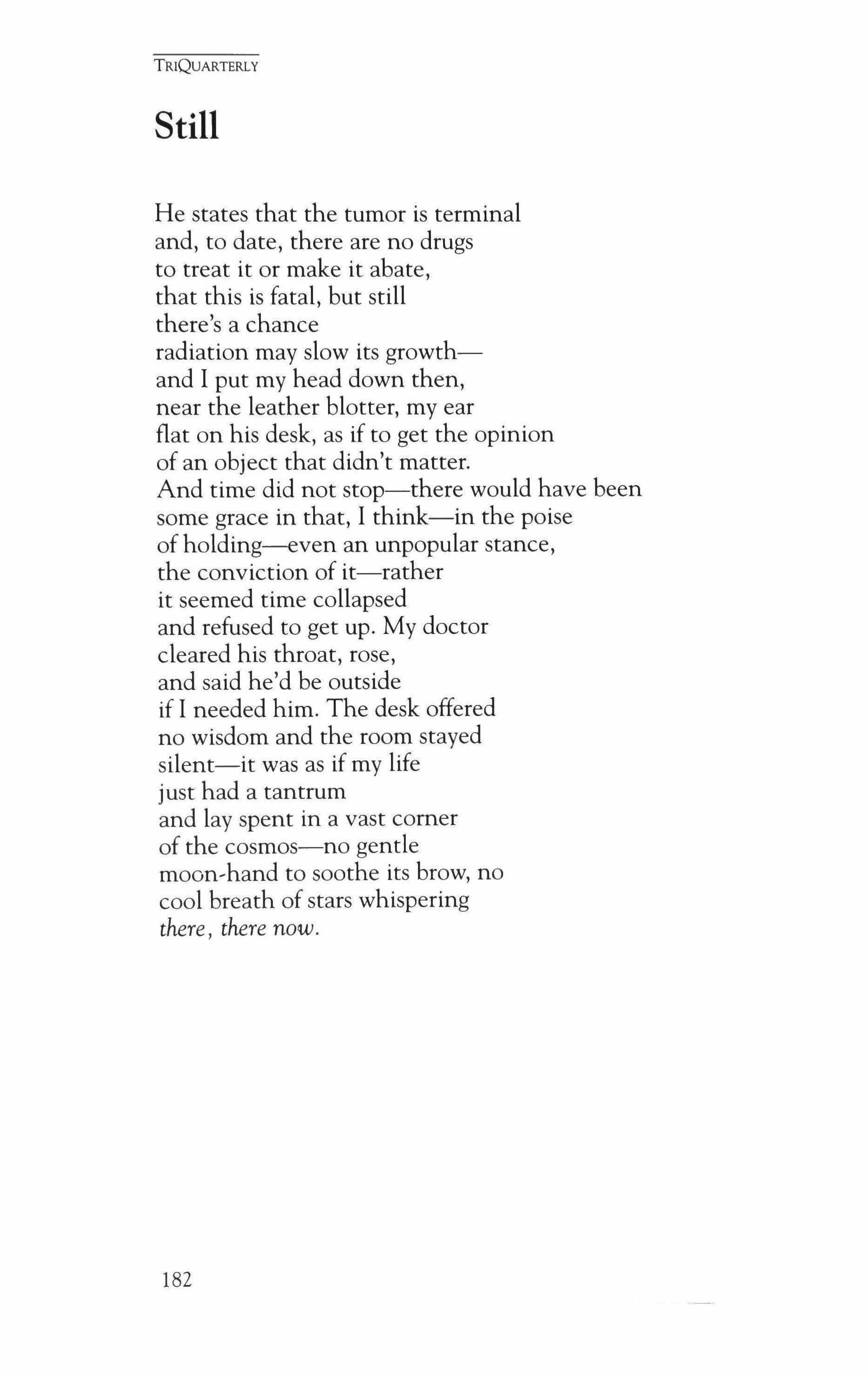
He states that the tumor is terminal and, to date, there are no drugs to treat it or make it abate, that this is fatal, but still there's a chance radiation may slow its growthand I put my head down then, near the leather blotter, my ear flat on his desk, as if to get the opinion of an object that didn't matter. And time did not stop-there would have been some grace in that, I think-in the poise of holding-even an unpopular stance, the conviction of it-rather it seemed time collapsed and refused to get up. My doctor cleared his throat, rose, and said he'd be outside if I needed him. The desk offered no wisdom and the room stayed silent-it was as if my life just had a tantrum and lay spent in a vast comer of the cosmos-no gentle moon-hand to soothe its brow, no cool breath of stars whispering there, there now.
TRIQUARTERLY
182
Two Poems
Ilya Kutik
Translated from the Russian by Andrew Wachtel
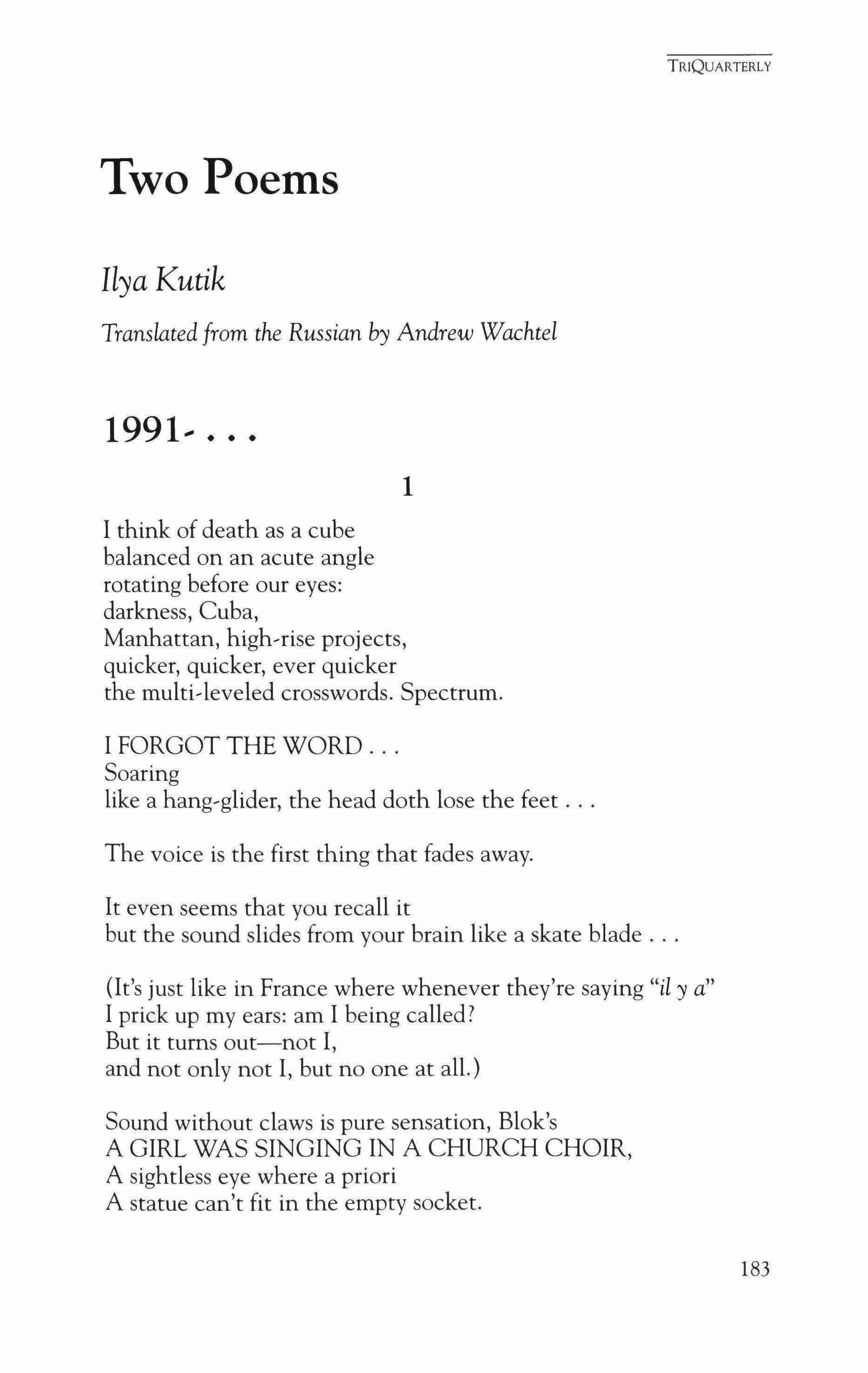
I think of death as a cube balanced on an acute angle rotating before our eyes: darkness, Cuba, Manhattan, high-rise projects, quicker, quicker, ever quicker the multi-leveled crosswords. Spectrum.
I FORGOT THE WORD
Soaring
like a hang-glider, the head doth lose the feet
The voice is the first thing that fades away.
It even seems that you recall it but the sound slides from your brain like a skate blade
(It's just like in France where whenever they're saying "il y a" I prick up my ears: am I being called? But it turns out-not I, and not only not I, but no one at all.)
Sound without claws is pure sensation, Blok's A GIRL WAS SINGING IN A CHURCH CHOIR, A sightless eye where a priori A statue can't fit in the empty socket.
TRIQUARTERLY
1991 1
183
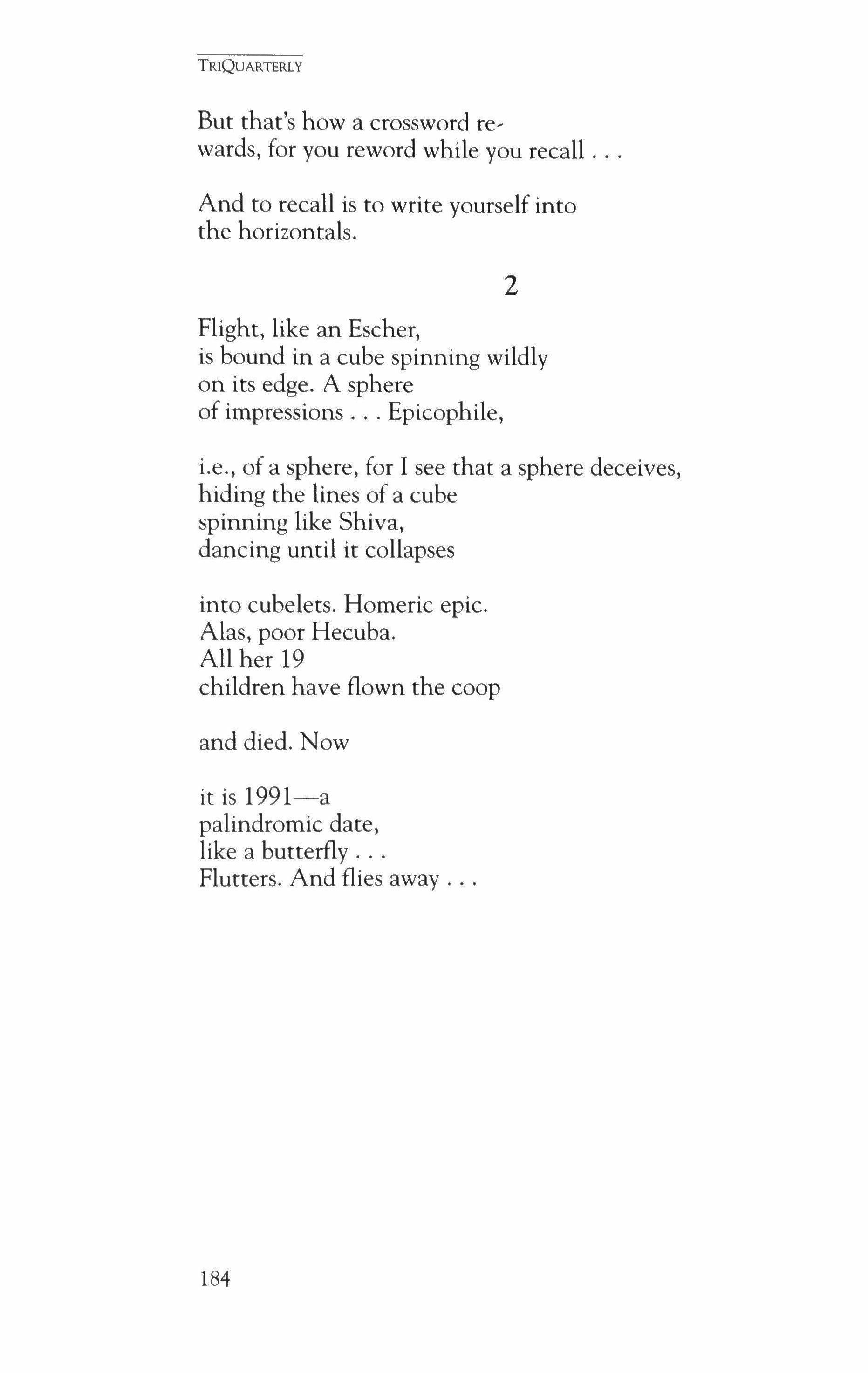
But that's how a crossword re� wards, for you reword while you recall
And to recall is to write yourself into the horizontals.
2
Flight, like an Escher, is bound in a cube spinning wildly on its edge. A sphere of impressions Epicophile,
Le., of a sphere, for I see that a sphere deceives, hiding the lines of a cube spinning like Shiva, dancing until it collapses into cubelets. Homeric epic. Alas, poor Hecuba. All her 19 children have flown the coop and died. Now it is 1991-a palindromic date, like a butterfly Flutters. And flies away
TRIQUARTERLY
184
Peephole
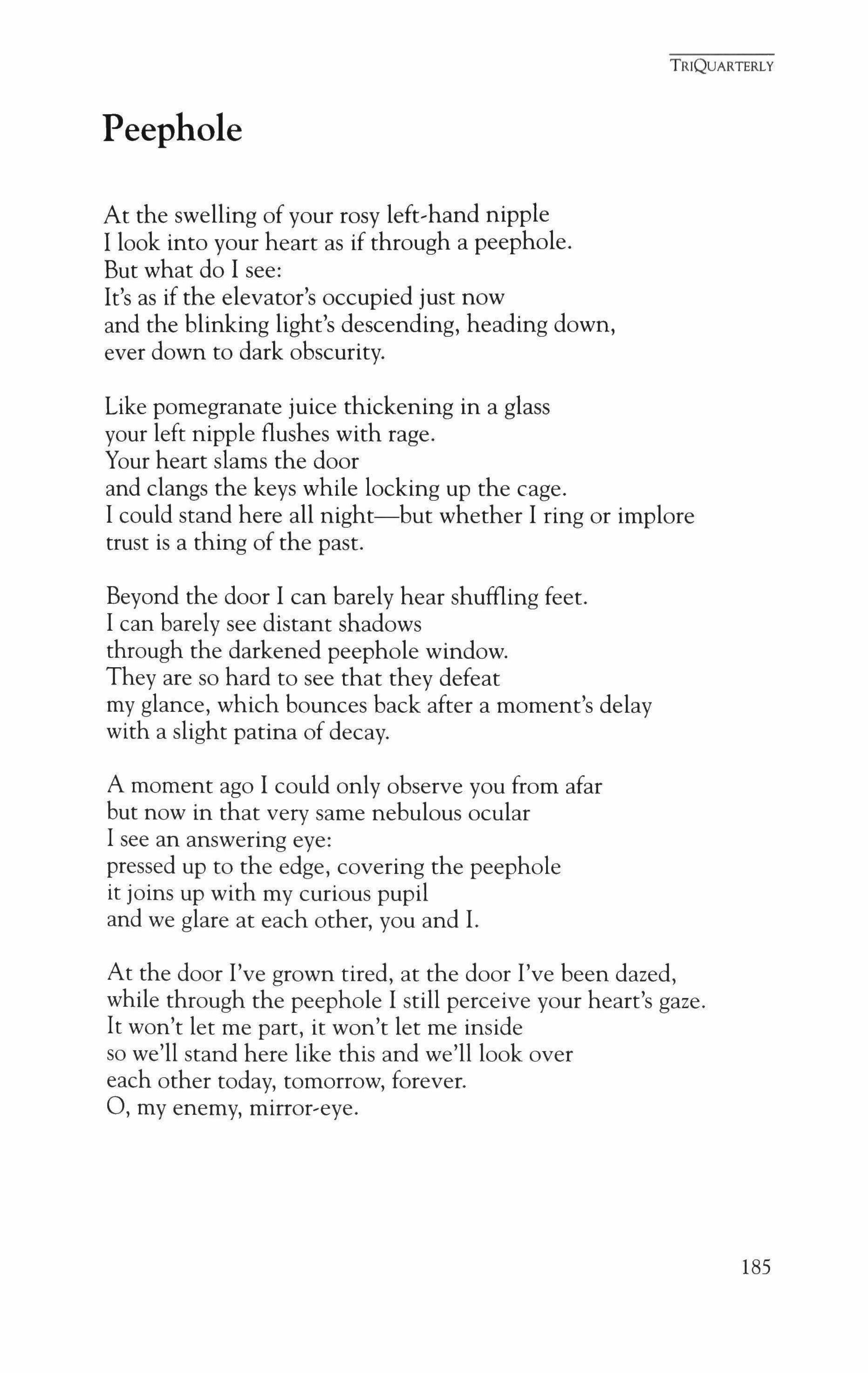
At the swelling of your rosy left-hand nipple I look into your heart as if through a peephole. But what do I see: It's as if the elevator's occupied just now and the blinking light's descending, heading down, ever down to dark obscurity.
Like pomegranate juice thickening in a glass your left nipple flushes with rage. Your heart slams the door and clangs the keys while locking up the cage. I could stand here all night-but whether I ring or implore trust is a thing of the past.
Beyond the door I can barely hear shuffling feet. I can barely see distant shadows through the darkened peephole window. They are so hard to see that they defeat my glance, which bounces back after a moment's delay with a slight patina of decay.
A moment ago I could only observe you from afar but now in that very same nebulous ocular I see an answering eye: pressed up to the edge, covering the peephole it joins up with my curious pupil and we glare at each other, you and I.
At the door I've grown tired, at the door I've been dazed, while through the peephole I still perceive your heart's gaze. It won't let me part, it won't let me inside so we'll stand here like this and we'll look over each other today, tomorrow, forever. 0, my enemy, mirror-eye.
TRIQUARTERLY
185
Two Poems
Ralph Sneeden
Boatyard Mechanic
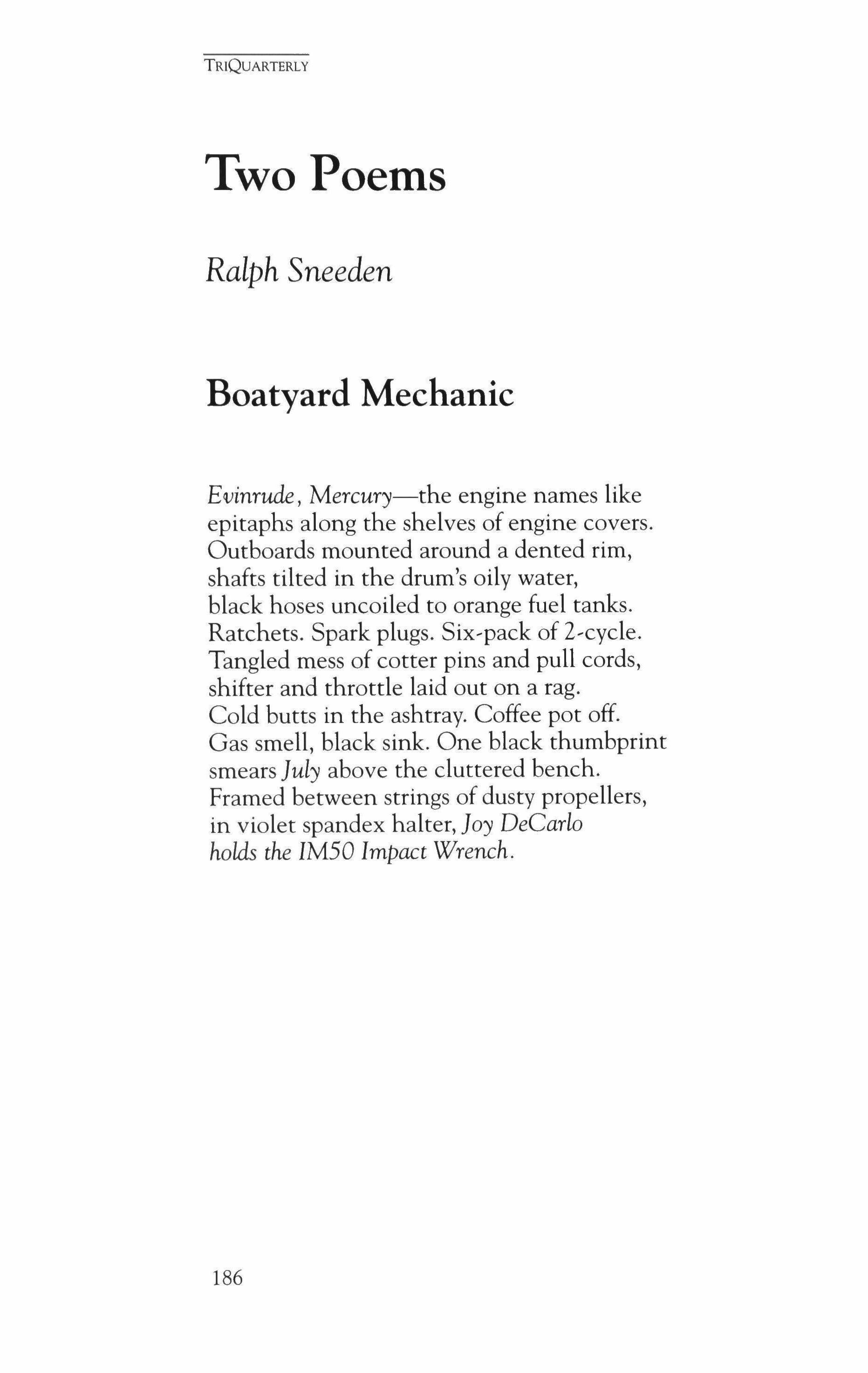
Evinrude, Mercury-the engine names like epitaphs along the shelves of engine covers. Outboards mounted around a dented rim, shafts tilted in the drum's oily water, black hoses uncoiled to orange fuel tanks. Ratchets. Spark plugs. Six-pack of 2�cycle.
Tangled mess of cotter pins and pull cords, shifter and throttle laid out on a rag. Cold butts in the ashtray. Coffee pot off. Gas smell, black sink. One black thumbprint smears July above the cluttered bench. Framed between strings of dusty propellers, in violet spandex halter, Joy DeCarlo holds the IM50 Impact Wrench.
TRIQUARTERLY
186

The Revolver
Snub-nosed and black, with a polished wooden grip, it came from her pocketbook in blue-veined hands.
My aunt's police revolver, a guest at any meal; she'd show it to the children gathered by her chair until my father made her put it back. She only used it at the range, she'd said. At her death it's what the lawyer came for first, and no one in the family kept him from it.
In summer, she'd swim while I pawed through her bag: apple, lotion, the trigger like a tooth.
Eyeing rubber cap to the buoy and back, I spun the chamber. Terns leapt from pylons, fiddler crabs flinched by holes. She waded ashore, sat and smoked, wiping my prints from the barrel.
TRIQUARTERLY 187
Bad Day
William Tester
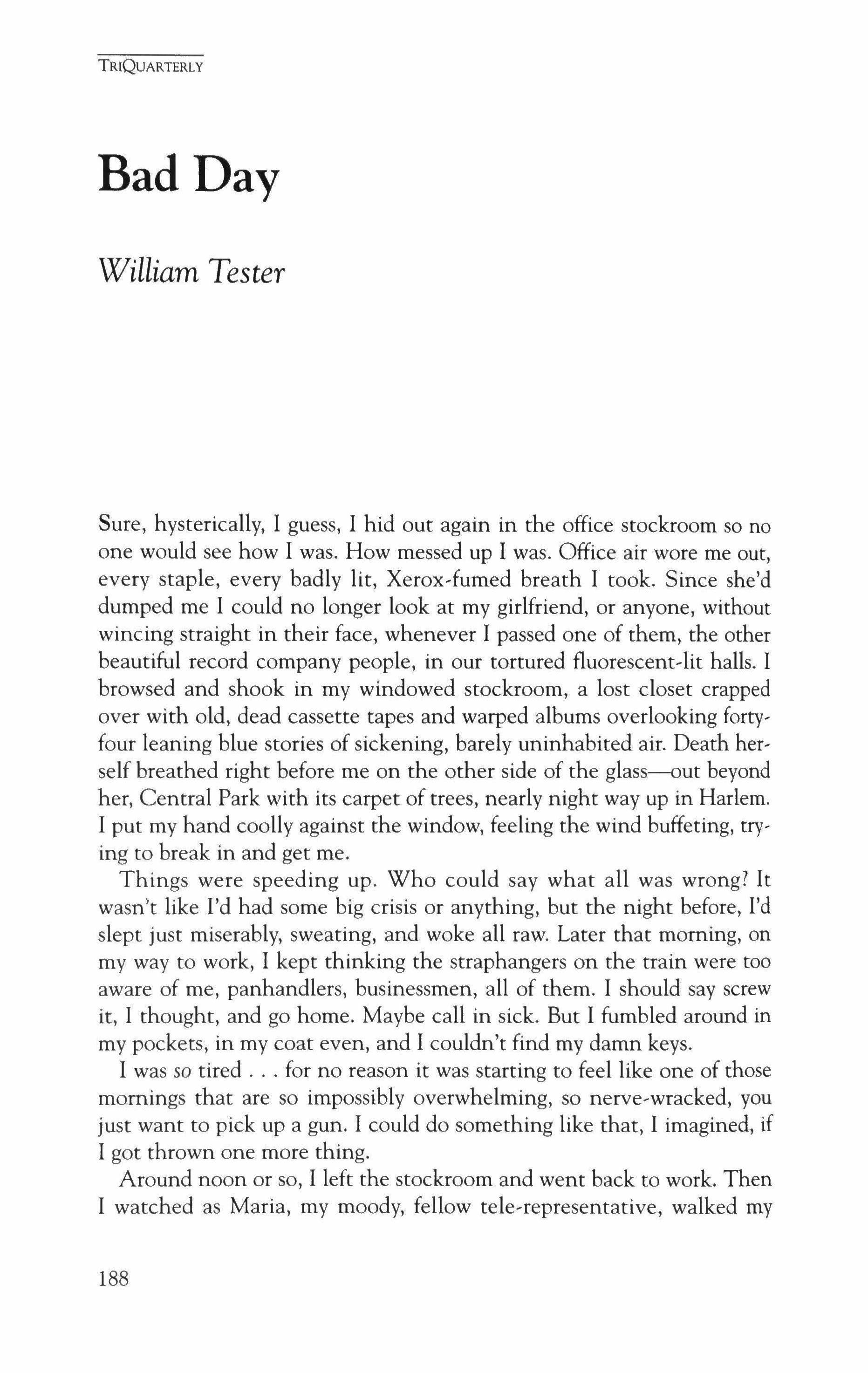
Sure, hysterically, I guess, I hid out again in the office stockroom so no one would see how I was. How messed up I was. Office air wore me out, every staple, every badly lit, Xerox-fumed breath I took. Since she'd dumped me I could no longer look at my girlfriend, or anyone, without wincing straight in their face, whenever I passed one of them, the other beautiful record company people, in our tortured fluorescent-lit halls. I browsed and shook in my windowed stockroom, a lost closet crapped over with old, dead cassette tapes and warped albums overlooking fortyfour leaning blue stories of sickening, barely uninhabited air. Death herself breathed right before me on the other side of the glass--out beyond her, Central Park with its carpet of trees, nearly night way up in Harlem. I put my hand coolly against the window, feeling the wind buffeting, trying to break in and get me.
Things were speeding up. Who could say what all was wrong? It wasn't like I'd had some big crisis or anything, but the night before, I'd slept just miserably, sweating, and woke all raw. Later that morning, on my way to work, I kept thinking the straphangers on the train were too aware of me, panhandlers, businessmen, all of them. I should say screw it, I thought, and go home. Maybe call in sick. But I fumbled around in my pockets, in my coat even, and I couldn't find my damn keys.
I was so tired for no reason it was starting to feel like one of those mornings that are so impossibly overwhelming, so nerve-wracked, you just want to pick up a gun. I could do something like that, I imagined, if I got thrown one more thing.
Around noon or so, I left the stockroom and went back to work. Then I watched as Maria, my moody, fellow tele-representative, walked my
TRIQUARTERLY
188

way down the Xerox hall, rubbing her dark eyes with a tissue wad. We'd had our dramas, but we had never gotten fully together, and so seeing her stung, I copied things, poisoning my skin with the inky fumes. Words crossed her lips as she saw me, and I sensed a surge of telepathized anger vibrating between us down that hall. Once, I even believed she might go so far as to practice acts of magic or evil spells upon me, she being, they said, a witch. Maria and I'd had this half, hearted, sick flirtation, gazing at each other in meetings, or side by side, our arms brushing together in lust. Like me, I suppose she just needed to touch someone.
As she came nearer, one of my eyelids began jittering wildly-I could hear my pulse, and my lips felt the throbbing hot seed of a herpes sore.
My God, I could hardly keep control of my body! I smiled stupidly, and, ignoring her, turned to my work. I shoved the copier's buttons without effect, the machine somehow sensing my dread, refusing me. Maria came over. She poked at the copier once and it ran.
"Sure. Great," I said.
"Stu wants you in the TV room, he said for me to say."
"Yeah. I'm gone already," I said.
"No, he wants you 'now,' he said," she said.
"Wait. I meant like, I'm there. I'm gone I'm going already."
"Huh?" She dabbed her nose with her wad of tissue, sniffling. "No, 'now,' he said. Our commercial's on."
"Right, see?" I clumsily gathered my paperwork up as if done, piling thoughtless stacks. At the edge of things, I could sense something was smoldering, a fear coming. "But I meant it like, 'I'm going. I'm not even here, still,' see?"
"No, not really."
I licked where my lips tasted hot from my herpes sore. "Wait a sec. Hold it a second," I winced.
Like my mother, Maria took hold of my shoulder and I thought I would fall.
"Yeah, sure," she said. "Would it kill you for once to say 'yes?' Is that so tough? Or is it-is it just you always, always, always have to mess with me?" she said.
My voice sounded thin to me, and being almost a solid month single, I was unsure how to talk to her, or how to be. I just wanted to become tiny and to sleep again. I pretended to walk somewhere necessary, and, rounding the corner to marketing I spotted our boss and the payroll guy, head-to-head. They laughed liked conspirators, whispering things.
TRIQUARTERLY
189
TRIQUARTERLY
Nervous sweat soaked me, beading up wet on my face and neck. I was sopped with it! I wiped at the sweat, but it wouldn't come off. Why pretend it would?
I hid. I knew I'd never make it until five.
I didn't know what was going on. For weeks, I had been waking and lying in my bed, still exhausted, denying the hideous white daylight which ruthlessly sucked me back into the world, me putting off opening my eyes again and fully returning to the land of the calm my problems, my ex, Rebecca, tossing plates at me, me tossing them back. Truly, I didn't know what all was wrong
I had been having nightmares in which my stepfather beat me with his fists while I stabbed at him with a knife. Dark people choking and embarrassing me. Dreams where I woke up crying, or muttering things, totally unable to remember what it was that I had just then, shivering, dreamed.
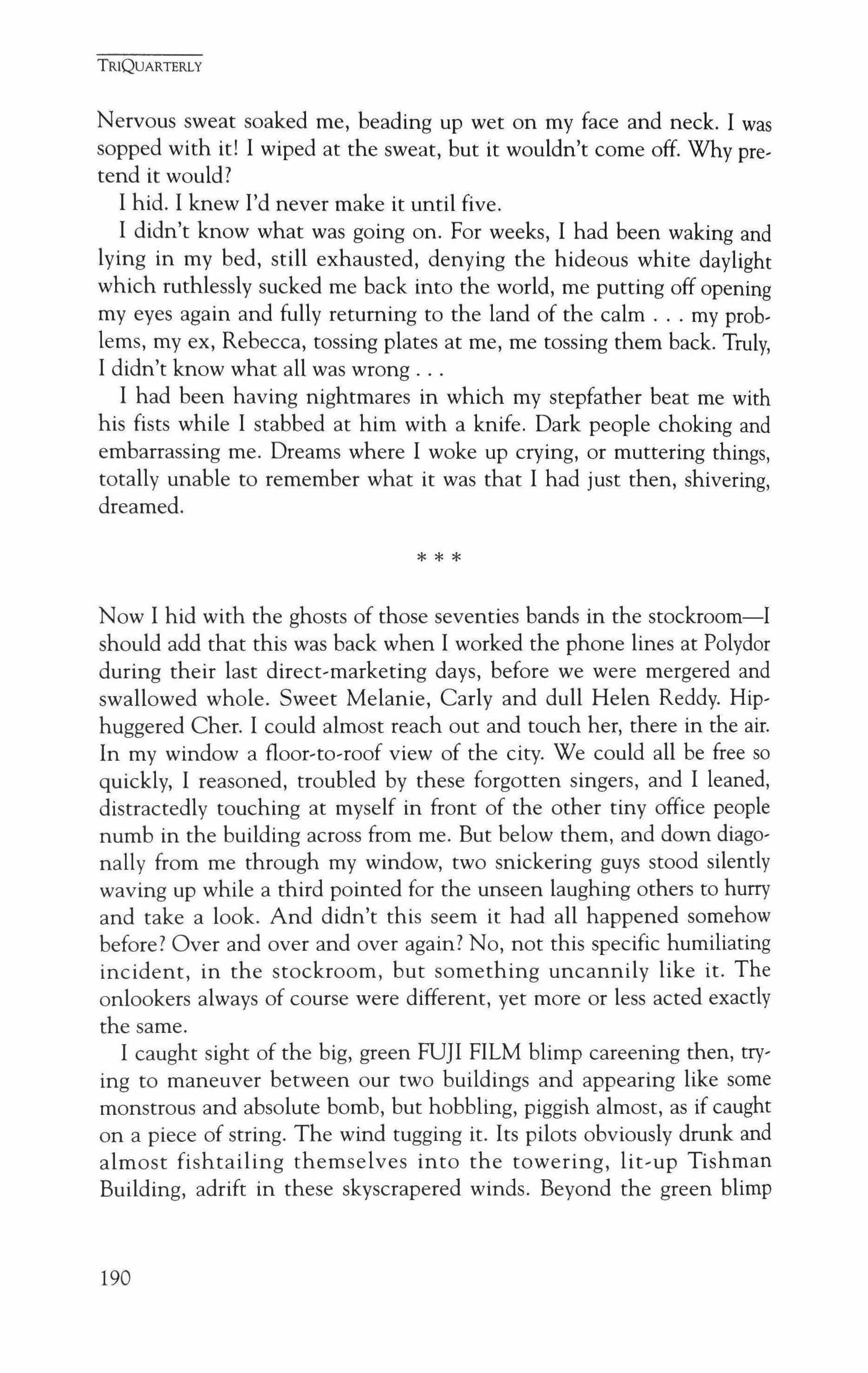
Now I hid with the ghosts of those seventies bands in the stockroom-I should add that this was back when I worked the phone lines at Polydor during their last direct-marketing days, before we were mergered and swallowed whole. Sweet Melanie, Carly and dull Helen Reddy. Hiphuggered Cher. I could almost reach out and touch her, there in the air. In my window a floor-to-roof view of the city. We could all be free so quickly, I reasoned, troubled by these forgotten singers, and I leaned, distractedly touching at myself in front of the other tiny office people numb in the building across from me. But below them, and down diagonally from me through my window, two snickering guys stood silently waving up while a third pointed for the unseen laughing others to hurry and take a look. And didn't this seem it had all happened somehow before? Over and over and over again? No, not this specific humiliating incident, in the stockroom, but something uncannily like it. The onlookers always of course were different, yet more or less acted exactly the same.
I caught sight of the big, green FUJI FILM blimp careening then, trying to maneuver between our two buildings and appearing like some monstrous and absolute bomb, but hobbling, piggish almost, as if caught on a piece of string. The wind tugging it. Its pilots obviously drunk and almost fishtailing themselves into the towering, lit-up Tishman Building, adrift in these skyscrapered winds. Beyond the green blimp
***
190
rose a choir of granite spires, the knife-tipped Helmsley, the cake-like Plaza. All of us-everyone watching-wished the thing would explode. What arrogance! What use was there even in trying in such a world?
I saw, outside and across from my building in a window a story or two down, another dress-suited, lonely worker. An older, unfortunate blonde woman in her own glass office who watched the blimp, or who had started watching it, and no longer actually was, as she thinly sighed. Then she touched her tears. I saw her! She was baring her heartunaware and alone, with this unrehearsed act, standing angly there, nibbling the arms of her glasses her suffering she just took for granted as part of our unending general despair.
You could read it all: she didn't still have a lover, that much was for sure. So what good was it? What use then were all of her objects, that shitty vase?
If only I could be there and touch her, I thought! If only I could reach out and comfort her, whisper it, nuzzle those words in her hair.
I know you. I know where you're hurting, I said.

I thought if I could just come with her once. The doorknob clicked and I crouched by a file of old disco hits. One of my sort-of-friends, Donny, peeked the door open and slipped on in. "Beat me to it, man. Every day, someone's done sneaked in here ahead of me." A handsome and southern-voiced weightlifter, in a lousy band, Donny never seemed to much care.
"Whatever you're doing, you're caught," he said.
"What?" I said.
"God, you look horrible, buddy. No kidding."
"Pretty crappy, huh?"
"Kind of."
"I'm just feeling sort of like, well."
Donny closed us in. "So forget all this noise. What's outside? Hey, whoa," he said.
My eyes wrenched up blurring with tears.
"Whoa, baby. You are really not feeling so good."
"Exactly, yeah. You've hit it right on the nose." My mood flopped around like a tired child's, and when Donny walked over to touch me I flinched at this animal shine in his eyes, like a dog or something. I saw for a split second how he might like to bite me, to rip my throat, like everyone did on my morning train.
TRIQUARTERLY
* * *
191
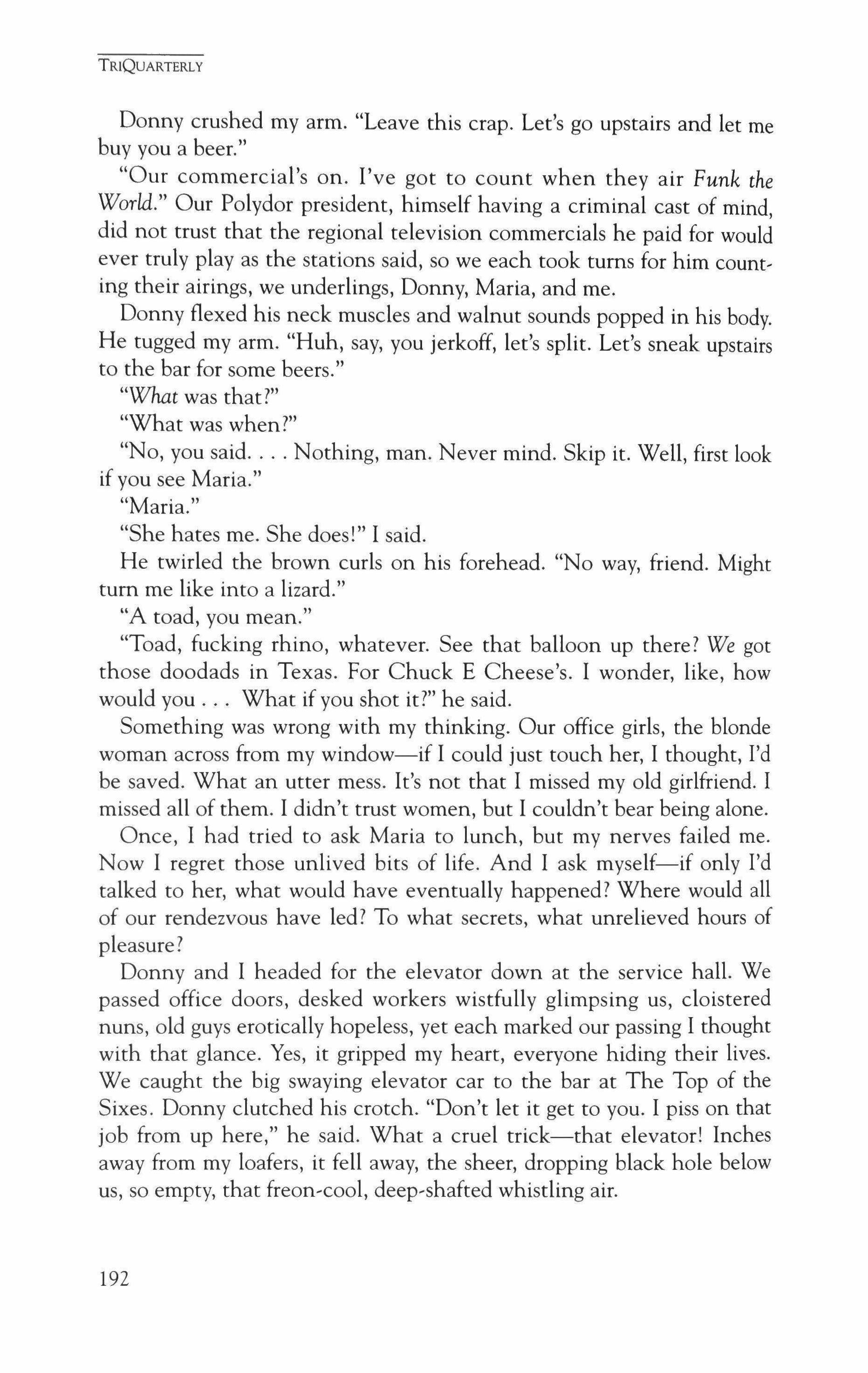
Donny crushed my arm. "Leave this crap. Let's go upstairs and let me buy you a beer."
"Our commercial's on. I've got to count when they air Funk the World." Our Polvdor president, himself having a criminal cast of mind, did not trust that the regional television commercials he paid for would ever truly playas the stations said, so we each took turns for him counting their airings, we underlings, Donny, Maria, and me.
Donny flexed his neck muscles and walnut sounds popped in his body. He tugged my arm. "Huh, say, you jerkoff, let's split. Let's sneak upstairs to the bar for some beers."
"What was that?"
"What was when?"
"No, you said Nothing, man. Never mind. Skip it. Well, first look if you see Maria."
"Maria."
"She hates me. She does!" I said.
He twirled the brown curls on his forehead. "No way, friend. Might turn me like into a lizard."
"A toad, you mean."
"Toad, fucking rhino, whatever. See that balloon up there? We got those doodads in Texas. For Chuck E Cheese's. I wonder, like, how would you What if you shot it?" he said.
Something was wrong with my thinking. Our office girls, the blonde woman across from my window-if I could just touch her, I thought, I'd be saved. What an utter mess. It's not that I missed my old girlfriend. I missed all of them. I didn't trust women, but I couldn't bear being alone. Once, I had tried to ask Maria to lunch, but my nerves failed me. Now I regret those unlived bits of life. And I ask myself-if only I'd talked to her, what would have eventually happened? Where would all of our rendezvous have led? To what secrets, what unrelieved hours of pleasure?
Donny and I headed for the elevator down at the service hall. We passed office doors, desked workers wistfully glimpsing us, cloistered nuns, old guys erotically hopeless, yet each marked our passing I thought with that glance. Yes, it gripped my heart, everyone hiding their lives. We caught the big swaying elevator car to the bar at The Top of the Sixes. Donny clutched his crotch. "Don't let it get to you. I piss on that job from up here," he said. What a cruel trick-that elevator! Inches away from my loafers, it fell away, the sheer, dropping black hole below us, so empty, that freon-cool, deep-shafted whistling air.
TRIQUARTERLY
192
I felt queasy.
"Hey, I hope you're not broke," Donny said. Then a hundred floors. Me, I suspected dark entities chewed through each cable's core. Grimy trolls, beings which squeezed from my consciousness. Yet if our elevator fell through the singing air, it would take only seconds to crush to our death.
Where would my girlfriend be then? I didn't know what was still eating me-my chest trembled. After our fight with the dishes, Rebecca made love to me down on our kitchen floor. She was bleeding, the linoleum petaled with thrown scrambled eggs. Making love to her, I thought we were maybe made-up. We could talk it out. But weirdly, when I spoke to her, all I could make was this screechy slur.
I was obsessing on women at work, and projected these nervous and sex-filled imagined scenes, even now, shakily scouting the bar. The chromy lounge. Another insanely high view of Manhattan. The place was dead. Donny knew our young actor-waitress. They kissed hello, and she headed us off to a booth by the windows. Our first drinks were free.
Donny said, "That girl's Victoria. What a pair of lungs. Go ask who the other girl is, her barmaid friend."
"Are you kidding! Not me, man. I'm way too tense."
"Aw, come on. Cheer up," he said.
I was helpless. There was nowhere to hide. I looked down and away from the girls. "I thought we were just sitting here, anyhow."
"We are," he said. "But we're in the catbird seat I think they've just finished their shift."
"No way," I said. "No! I'm not going."
"O.K., O.K. All right already, then. If I'm not back quick, watch my drink," he said. Then he left, and I never saw Donny again. I mean ever again. He was swallowed up.
While I waited around, hiding, my drinking arm was shaking like a starving pup, spilling gin, and tipping my glass by the window. When I looked down over our gray city, toy buildings, the miniature-golf-sized horizon reeled up, tilting wrong like a carnival ride.
I threw back that blued icy gin.
It was nearly five, yet I couldn't cool down my mind.
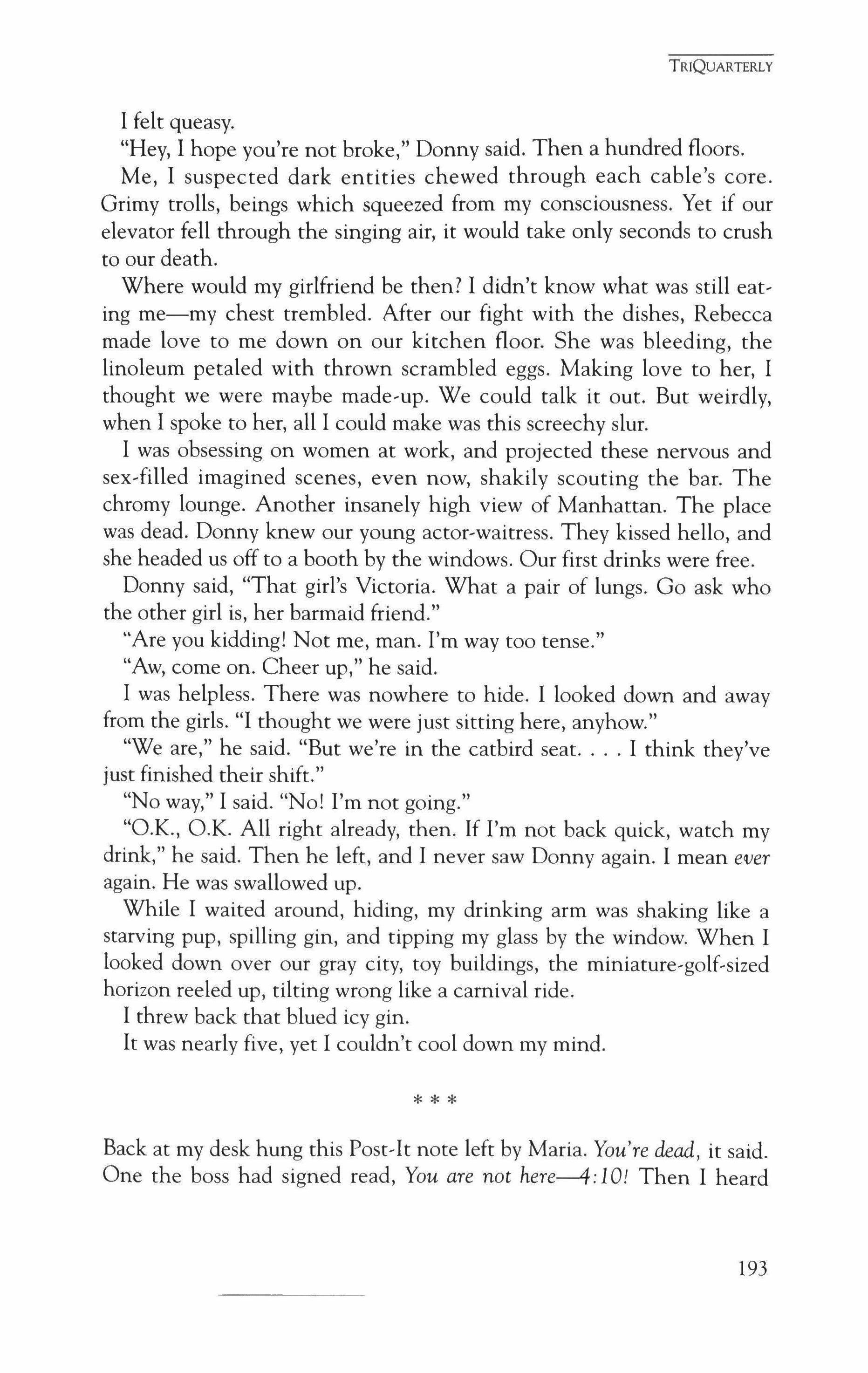
Back at my desk hung this Post-It note left by Maria. You're dead, it said. One the boss had signed read, You are not here-4: 1O! Then I heard
TRIQUARTERLY
* * *
193
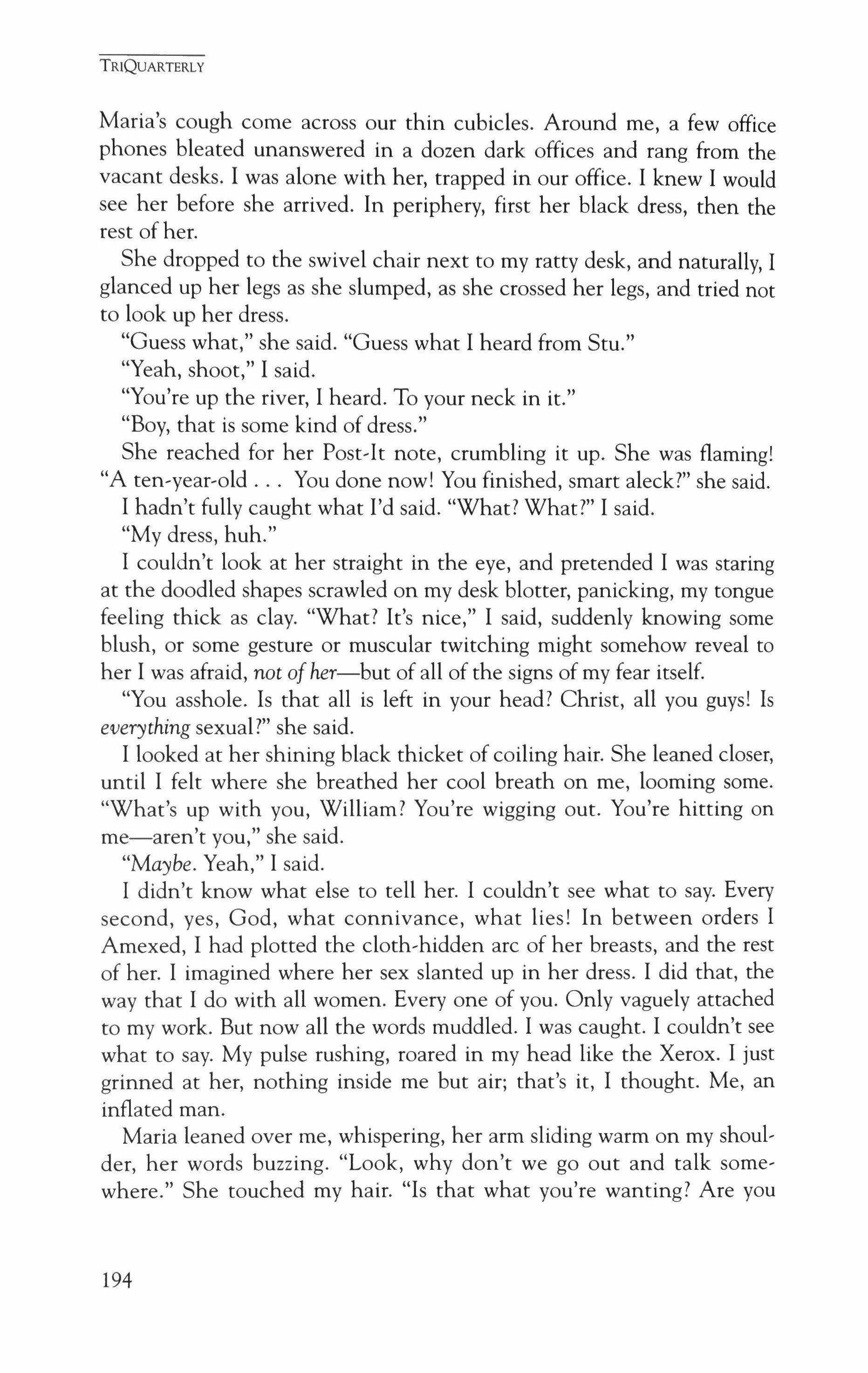
Maria's cough come across our thin cubicles. Around me, a few office phones bleated unanswered in a dozen dark offices and rang from the vacant desks. I was alone with her, trapped in our office. I knew I would see her before she arrived. In periphery, first her black dress, then the rest of her.
She dropped to the swivel chair next to my ratty desk, and naturally, I glanced up her legs as she slumped, as she crossed her legs, and tried not to look up her dress.
"Guess what," she said. "Guess what I heard from Stu."
"Yeah, shoot," I said.
"You're up the river, I heard. To your neck in it."
"Boy, that is some kind of dress."
She reached for her Post-It note, crumbling it up. She was flaming! "A ten-year-old You done now! You finished, smart aleck?" she said.
I hadn't fully caught what I'd said. "What? What?" I said.
"My dress, huh."
I couldn't look at her straight in the eye, and pretended I was staring at the doodled shapes scrawled on my desk blotter, panicking, my tongue feeling thick as clay. "What? It's nice," I said, suddenly knowing some blush, or some gesture or muscular twitching might somehow reveal to her I was afraid, not ofher-but of all of the signs of my fear itself.
"You asshole. Is that all is left in your head? Christ, all you guys! Is everything sexual?" she said.
I looked at her shining black thicket of coiling hair. She leaned closer, until I felt where she breathed her cool breath on me, looming some. "What's up with you, William? You're wigging out. You're hitting on me-aren't you," she said.
"Maybe. Yeah," I said.
I didn't know what else to tell her. I couldn't see what to say. Every second, yes, God, what connivance, what lies! In between orders I Amexed, I had plotted the cloth-hidden arc of her breasts, and the rest of her. I imagined where her sex slanted up in her dress. I did that, the way that I do with all women. Every one of you. Only vaguely attached to my work. But now all the words muddled. I was caught. I couldn't see what to say. My pulse rushing, roared in my head like the Xerox. I just grinned at her, nothing inside me but air; that's it, I thought. Me, an inflated man.
Maria leaned over me, whispering, her arm sliding warm on my shoulder, her words buzzing. "Look, why don't we go out and talk somewhere." She touched my hair. "Is that what you're wanting? Are you
TRIQUARTERLY
194
trying to flirt with me, honey?" she said.
"I-got to run. I'm kind of nauseous," I said, unconnecting us.
"I'm holding you?"
I gathered my briefcase and jacket.
"Wait, hold the elevator! Let me go grab my coat," she said after me.
I told myself, not in a billion years, punching the door button, and every other elevator button that would close the door. I wouldn't have made it alone with her. Alone in the elevator's box with her mind.
I felt as if I'd been gnawed up inside of some giant mouth. Chewing sounds, everything wanting to eat.
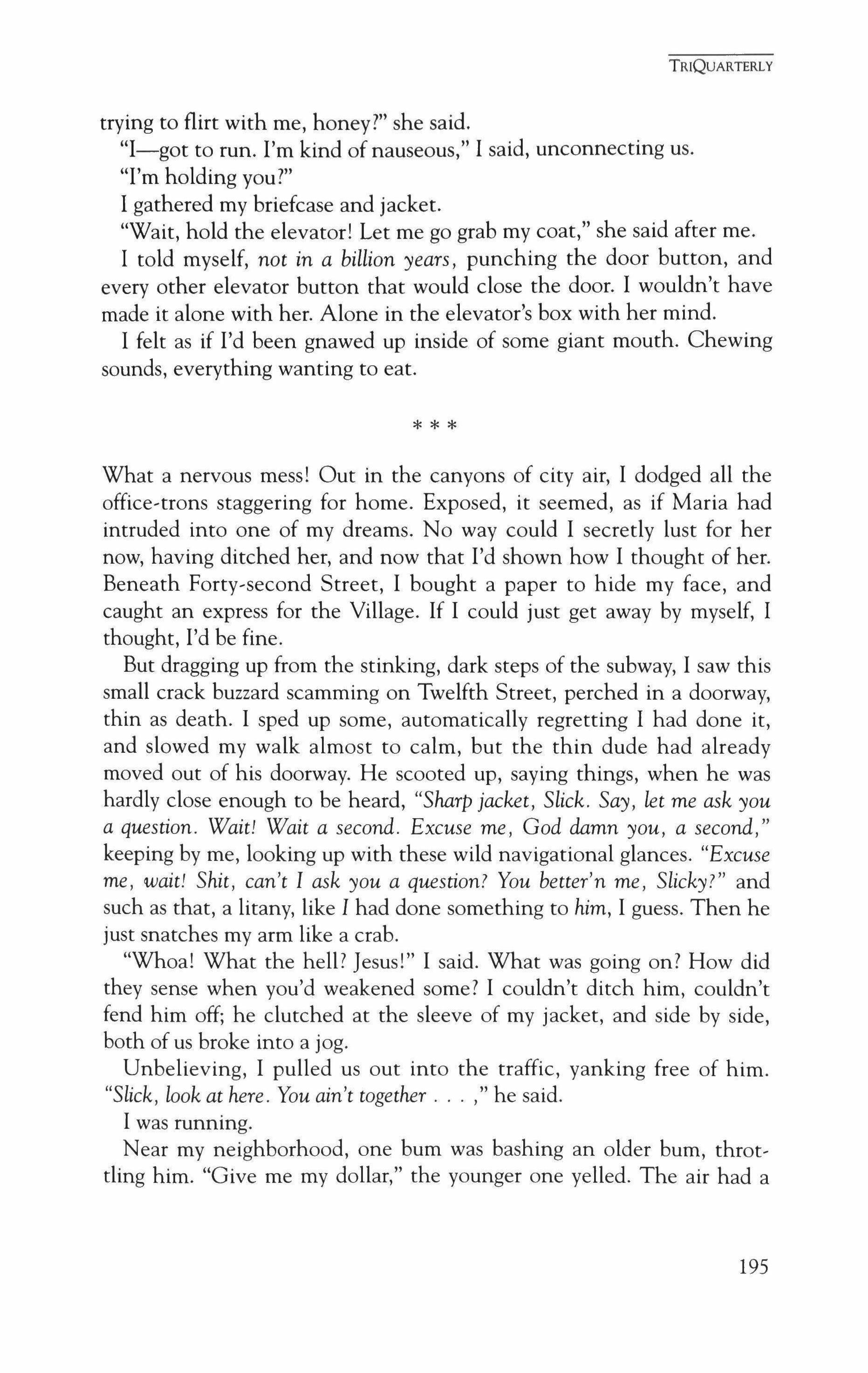
What a nervous mess! Out in the canyons of city air, I dodged all the office-trons staggering for home. Exposed, it seemed, as if Maria had intruded into one of my dreams. No way could I secretly lust for her now, having ditched her, and now that I'd shown how I thought of her. Beneath Forty-second Street, I bought a paper to hide my face, and caught an express for the Village. If I could just get away by myself, I thought, I'd be fine.
But dragging up from the stinking, dark steps of the subway, I saw this small crack buzzard scamming on Twelfth Street, perched in a doorway, thin as death. I sped up some, automatically regretting I had done it, and slowed my walk almost to calm, but the thin dude had already moved out of his doorway. He scooted up, saying things, when he was hardly close enough to be heard, "Sharp jacket, Slick. Say, let me ask you a question. Wait! Wait a second. Excuse me, God damn you, a second," keeping by me, looking up with these wild navigational glances. "Excuse me, wait! Shit, can't I ask you a question? You better'n me, Slicky?" and such as that, a litany, like I had done something to him, I guess. Then he just snatches my arm like a crab.
"Whoa! What the hell? Jesus!" I said. What was going on? How did they sense when you'd weakened some? I couldn't ditch him, couldn't fend him off; he clutched at the sleeve of my jacket, and side by side, both of us broke into a jog.
Unbelieving, I pulled us out into the traffic, yanking free of him. "Slick, look at here. You ain't together ," he said. I was running.
Near my neighborhood, one bum was bashing an older bum, throtding him. "Give me my dollar," the younger one yelled. The air had a 195
TRIQUARTERLY
* * *
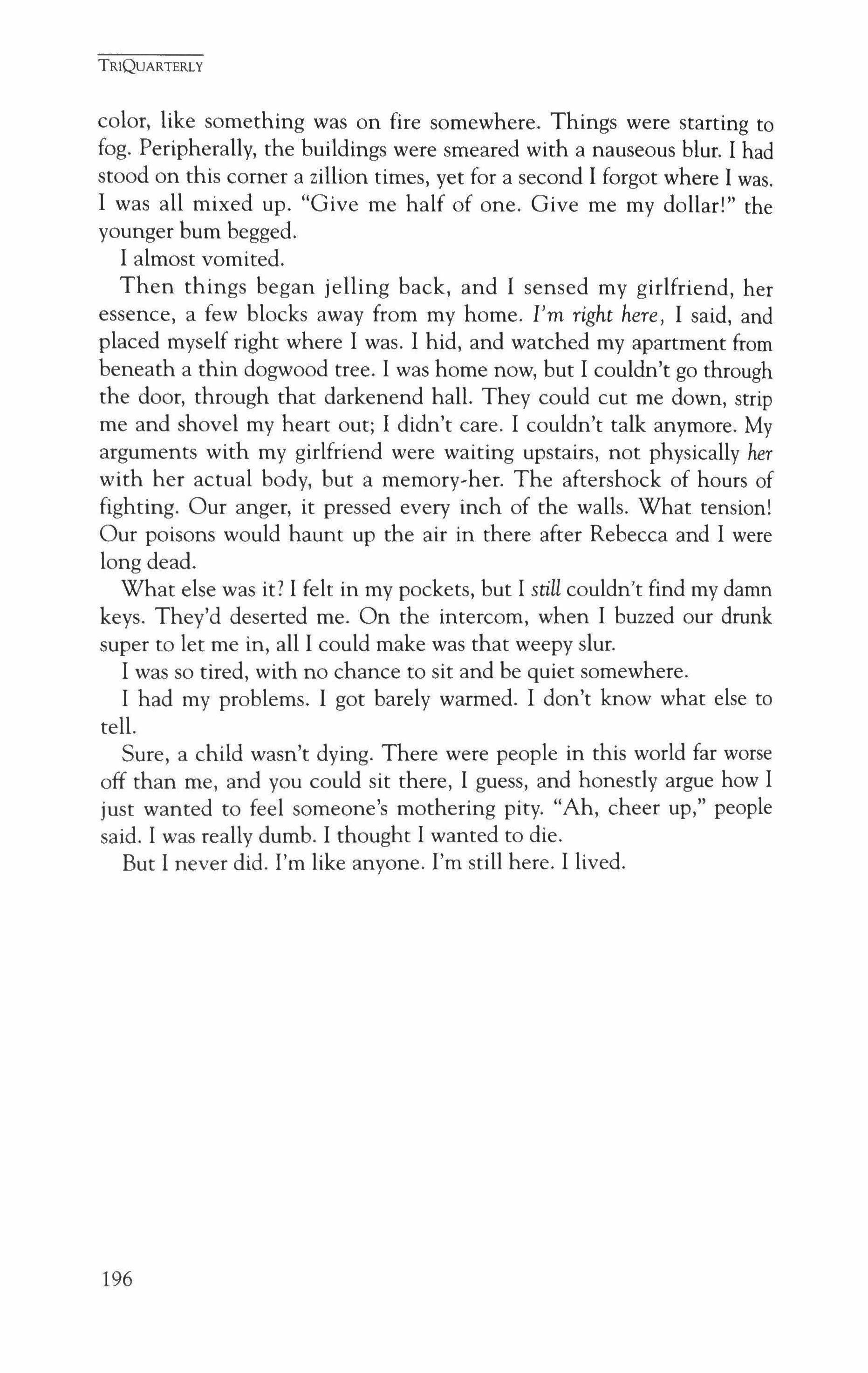
color, like something was on fire somewhere. Things were starting to fog. Peripherally, the buildings were smeared with a nauseous blur. I had stood on this comer a zillion times, yet for a second I forgot where I was. I was all mixed up. "Give me half of one. Give me my dollar!" the younger bum begged. I almost vomited.
Then things began jelling back, and I sensed my girlfriend, her essence, a few blocks away from my home. I'm right here, I said, and placed myself right where I was. I hid, and watched my apartment from beneath a thin dogwood tree. I was home now, but I couldn't go through the door, through that darkenend hall. They could cut me down, strip me and shovel my heart out; I didn't care. I couldn't talk anymore. My arguments with my girlfriend were waiting upstairs, not physically her with her actual body, but a memory-her. The aftershock of hours of fighting. Our anger, it pressed every inch of the walls. What tension! Our poisons would haunt up the air in there after Rebecca and I were long dead.
What else was it? I felt in my pockets, but I still couldn't find my damn keys. They'd deserted me. On the intercom, when I buzzed our drunk super to let me in, all I could make was that weepy slur.
I was so tired, with no chance to sit and be quiet somewhere. I had my problems. I got barely warmed. I don't know what else to telL
Sure, a child wasn't dying. There were people in this world far worse off than me, and you could sit there, I guess, and honestly argue how I just wanted to feel someone's mothering pity. "Ah, cheer up," people said. I was really dumb. I thought I wanted to die.
But I never did. I'm like anyone. I'm still here. I lived.
TRIQUARTERLY
196
A History of Boys
Margot Livesey
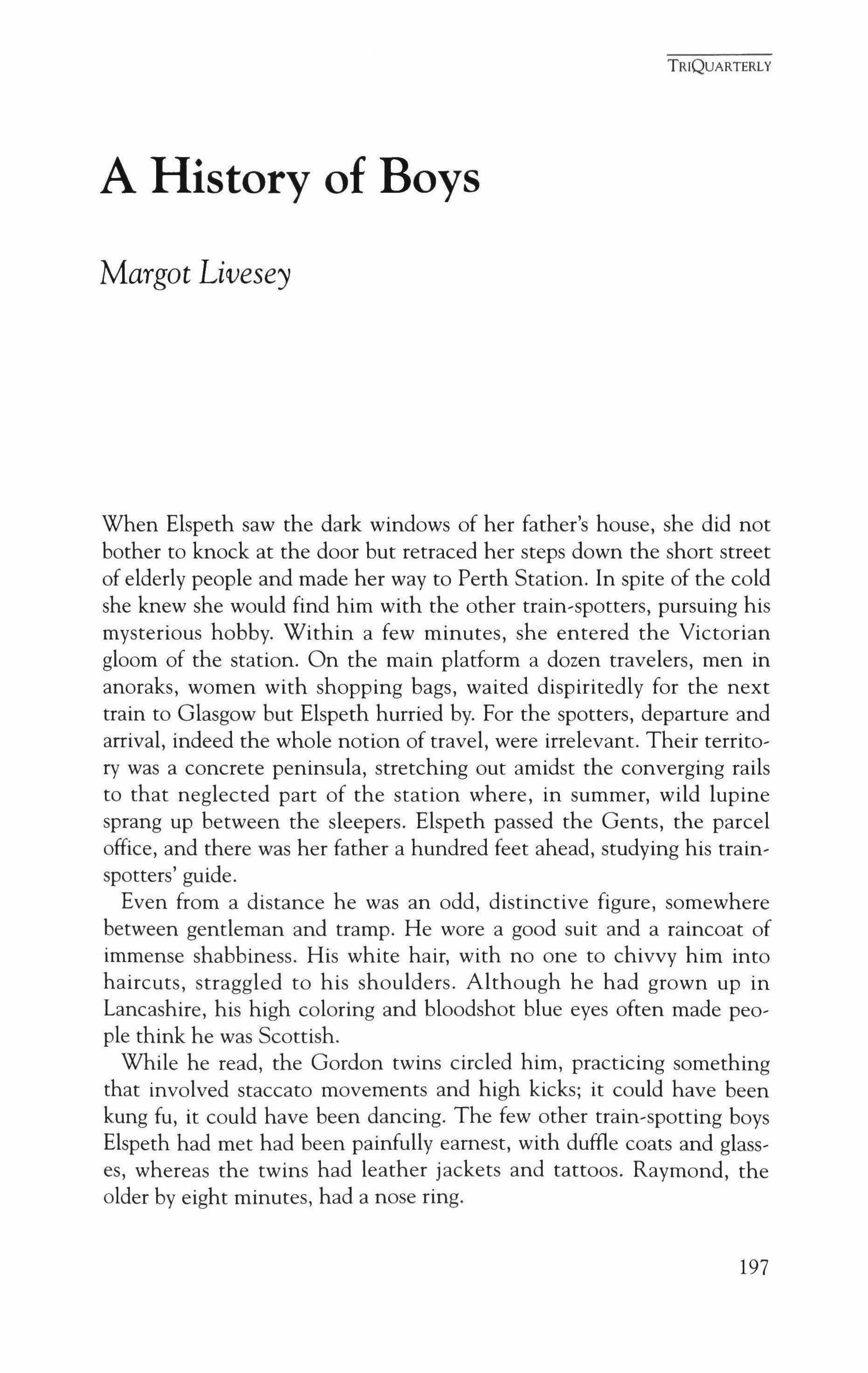
When Elspeth saw the dark windows of her father's house, she did not bother to knock at the door but retraced her steps down the short street of elderly people and made her way to Perth Station. In spite of the cold she knew she would find him with the other train-spotters, pursuing his mysterious hobby. Within a few minutes, she entered the Victorian gloom of the station. On the main platform a dozen travelers, men in anoraks, women with shopping bags, waited dispiritedly for the next train to Glasgow but Elspeth hurried by. For the spotters, departure and arrival, indeed the whole notion of travel, were irrelevant. Their territory was a concrete peninsula, stretching out amidst the converging rails to that neglected part of the station where, in summer, wild lupine sprang up between the sleepers. Elspeth passed the Gents, the parcel office, and there was her father a hundred feet ahead, studying his trainspotters' guide.
Even from a distance he was an odd, distinctive figure, somewhere between gentleman and tramp. He wore a good suit and a raincoat of immense shabbiness. His white hair, with no one to chivvy him into haircuts, straggled to his shoulders. Although he had grown up in Lancashire, his high coloring and bloodshot blue eyes often made people think he was Scottish.
While he read, the Gordon twins circled him, practicing something that involved staccato movements and high kicks; it could have been kung fu, it could have been dancing. The few other train-spotting boys Elspeth had met had been painfully earnest, with duffle coats and glasses, whereas the twins had leather jackets and tattoos. Raymond, the older by eight minutes, had a nose ring.
TRIQUARTERLY
197
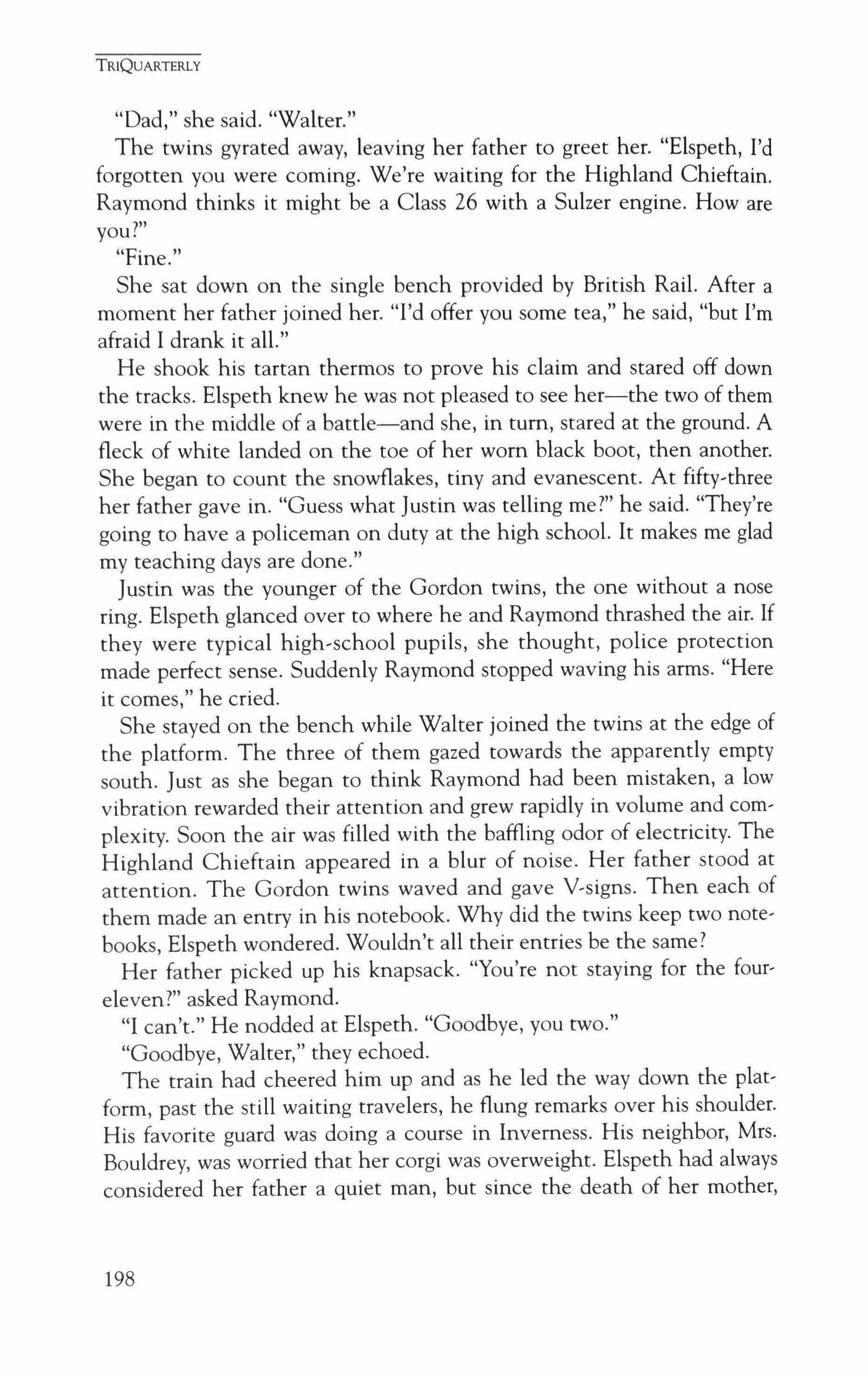
"Dad," she said. "Walter."
The twins gyrated away, leaving her father to greet her. "Elspeth, I'd forgotten you were coming. We're waiting for the Highland Chieftain. Raymond thinks it might be a Class 26 with a Sulzer engine. How are you?"
"Fine."
She sat down on the single bench provided by British Rail. After a moment her father joined her. "I'd offer you some tea," he said, "but I'm afraid I drank it all."
He shook his tartan thermos to prove his claim and stared off down the tracks. Elspeth knew he was not pleased to see her-the two of them were in the middle of a battle-and she, in tum, stared at the ground. A fleck of white landed on the toe of her worn black boot, then another. She began to count the snowflakes, tiny and evanescent. At fifty�three her father gave in. "Guess what Justin was telling me?" he said. "They're going to have a policeman on duty at the high school. It makes me glad my teaching days are done."
Justin was the younger of the Gordon twins, the one without a nose ring. Elspeth glanced over to where he and Raymond thrashed the air. If they were typical high-school pupils, she thought, police protection made perfect sense. Suddenly Raymond stopped waving his arms. "Here it comes," he cried.
She stayed on the bench while Walter joined the twins at the edge of the platform. The three of them gazed towards the apparently empty south. Just as she began to think Raymond had been mistaken, a low vibration rewarded their attention and grew rapidly in volume and complexity. Soon the air was filled with the baffling odor of electricity. The Highland Chieftain appeared in a blur of noise. Her father stood at attention. The Gordon twins waved and gave Vvsigns. Then each of them made an entry in his notebook. Why did the twins keep two notebooks, Elspeth wondered. Wouldn't all their entries be the same?
Her father picked up his knapsack. "You're not staying for the foureleven?" asked Raymond.
"I can't." He nodded at Elspeth. "Goodbye, you two."
"Goodbye, Walter," they echoed.
The train had cheered him up and as he led the way down the platform, past the still waiting travelers, he flung remarks over his shoulder. His favorite guard was doing a course in Inverness. His neighbor, Mrs. Bouldrey, was worried that her corgi was overweight. Elspeth had always considered her father a quiet man, but since the death of her mother,
TRIQUARTERLY
198
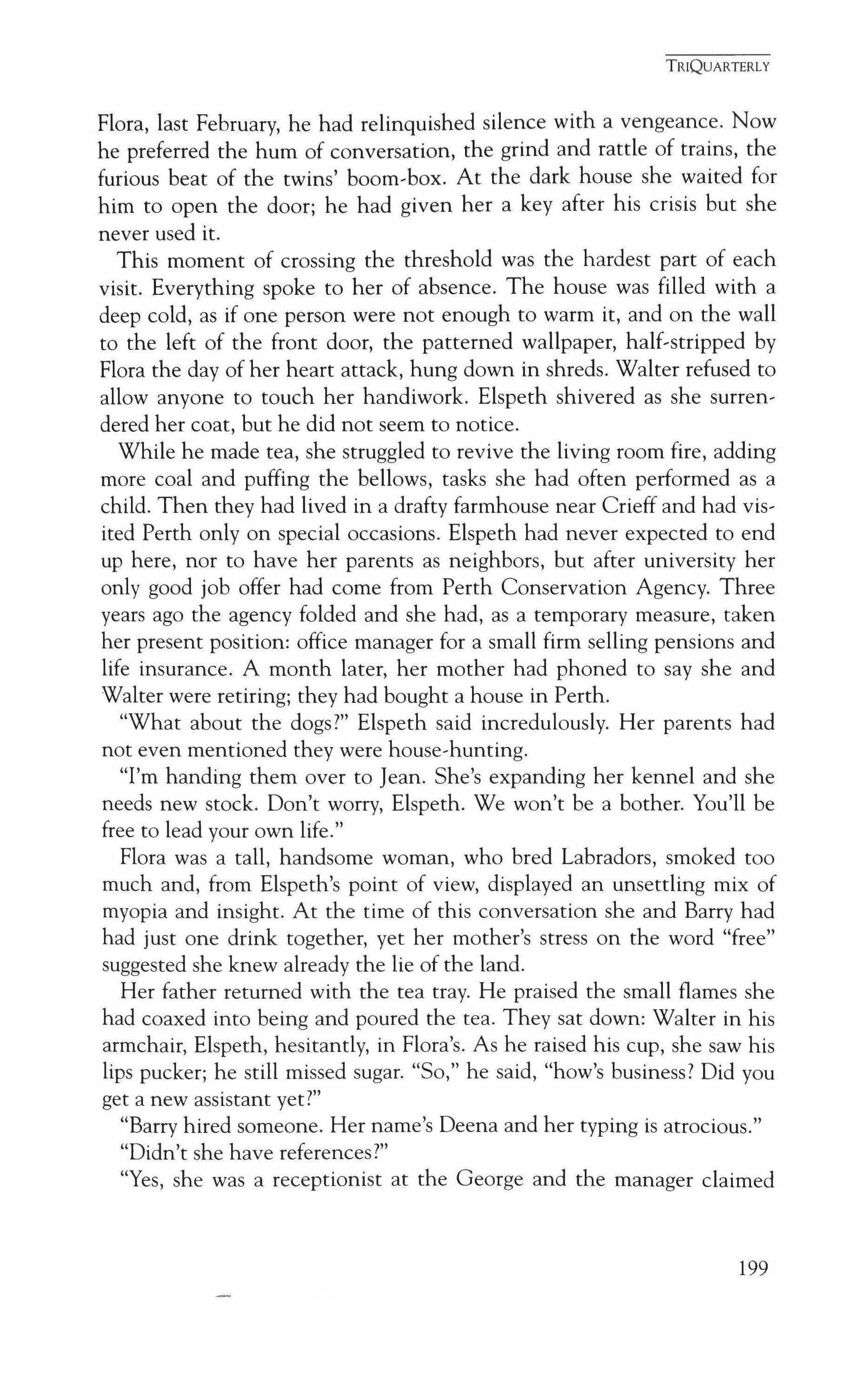
Flora, last February, he had relinquished silence with a vengeance. Now he preferred the hum of conversation, the grind and rattle of trains, the furious beat of the twins' boom-box. At the dark house she waited for him to open the door; he had given her a key after his crisis but she never used it.
This moment of crossing the threshold was the hardest part of each visit. Everything spoke to her of absence. The house was filled with a deep cold, as if one person were not enough to warm it, and on the wall to the left of the front door, the patterned wallpaper, half-stripped by Flora the day of her heart attack, hung down in shreds. Walter refused to allow anyone to touch her handiwork. Elspeth shivered as she surrendered her coat, but he did not seem to notice.
While he made tea, she struggled to revive the living room fire, adding more coal and puffing the bellows, tasks she had often performed as a child. Then they had lived in a drafty farmhouse near Crieff and had visited Perth only on special occasions. Elspeth had never expected to end up here, nor to have her parents as neighbors, but after university her only good job offer had come from Perth Conservation Agency. Three years ago the agency folded and she had, as a temporary measure, taken her present position: office manager for a small firm selling pensions and life insurance. A month later, her mother had phoned to say she and Walter were retiring; they had bought a house in Perth.
"What about the dogs?" Elspeth said incredulously. Her parents had not even mentioned they were house-hunting.
"I'm handing them over to Jean. She's expanding her kennel and she needs new stock. Don't worry, Elspeth. We won't be a bother. You'll be free to lead your own life."
Flora was a tall, handsome woman, who bred Labradors, smoked too much and, from Elspeth's point of view, displayed an unsettling mix of myopia and insight. At the time of this conversation she and Barry had had just one drink together, yet her mother's stress on the word "free" suggested she knew already the lie of the land.
Her father returned with the tea tray. He praised the small flames she had coaxed into being and poured the tea. They sat down: Walter in his armchair, Elspeth, hesitantly, in Flora's. As he raised his cup, she saw his lips pucker; he still missed sugar. "So," he said, "how's business? Did you get a new assistant yet?"
"Barry hired someone. Her name's Deena and her typing is atrocious."
"Didn't she have references?"
"Yes, she was a receptionist at the George and the manager claimed
TRIQUARTERLY
199
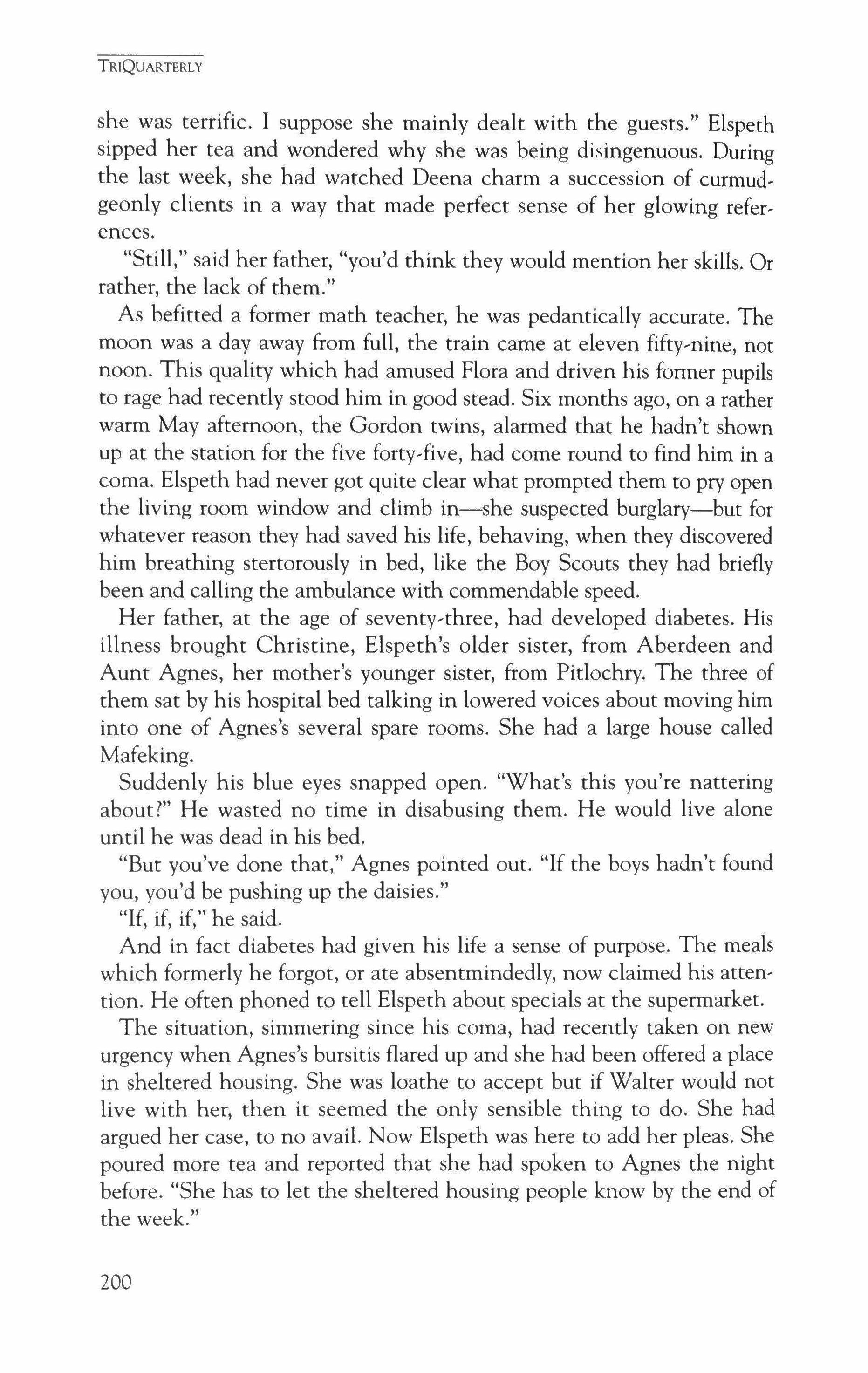
she was terrific. I suppose she mainly dealt with the guests." Elspeth sipped her tea and wondered why she was being disingenuous. During the last week, she had watched Deena charm a succession of curmudgeonly clients in a way that made perfect sense of her glowing references.
"Still," said her father, "you'd think they would mention her skills. Or rather, the lack of them."
As befitted a former math teacher, he was pedantically accurate. The moon was a day away from full, the train came at eleven fifty-nine, not noon. This quality which had amused Flora and driven his former pupils to rage had recently stood him in good stead. Six months ago, on a rather warm May afternoon, the Gordon twins, alarmed that he hadn't shown up at the station for the five forty-five, had come round to find him in a coma. Elspeth had never got quite clear what prompted them to pry open the living room window and climb in-she suspected burglary-but for whatever reason they had saved his life, behaving, when they discovered him breathing stertorously in bed, like the Boy Scouts they had briefly been and calling the ambulance with commendable speed.
Her father, at the age of seventy-three, had developed diabetes. His illness brought Christine, Elspeth's older sister, from Aberdeen and Aunt Agnes, her mother's younger sister, from Pitlochry. The three of them sat by his hospital bed talking in lowered voices about moving him into one of Agnes's several spare rooms. She had a large house called Mafeking.
Suddenly his blue eyes snapped open. "What's this you're nattering about?" He wasted no time in disabusing them. He would live alone until he was dead in his bed.
"But you've done that," Agnes pointed out. "If the boys hadn't found you, you'd be pushing up the daisies."
"If, if, if," he said.
And in fact diabetes had given his life a sense of purpose. The meals which formerly he forgot, or ate absentmindedly, now claimed his attention. He often phoned to tell Elspeth about specials at the supermarket.
The situation, simmering since his coma, had recently taken on new urgency when Agnes's bursitis flared up and she had been offered a place in sheltered housing. She was loathe to accept but if Walter would not live with her, then it seemed the only sensible thing to do. She had argued her case, to no avail. Now Elspeth was here to add her pleas. She poured more tea and reported that she had spoken to Agnes the night before. "She has to let the sheltered housing people know by the end of the week."
TRIQUARTERLY
200

"I don't know why she's waffling."
"She's not waffling, she's waiting for you to make up your mind."
"Elspeth, I'll put up with this kind of lunacy from my sister-in-law but not from you. There's no question of my moving in with Agnes. She would drive me batty in a week."
"But what if something happens to you?" At her father's bedside, jolly Doctor Rintoull had laid out the grim spectrum of deterioration.
"Something will happen," he said. "Amputation, blindness, the whole shebang. Meanwhile I plan to live exactly as I please for as long as I can. When they cut off my legs, then we'll see what's next."
He leaned forward with a gleam in his eye. "If you're so worried, why don't you move in here? I have a nice spare room, the house is quite central, you can come and go as you please. Entertain whom you like."
He saw her face and started to laugh. "Now you know how I feel. Do you think those feelings disappear as you get older?"
It's different, she wanted to say. There's Barry and, even without him, I could more easily walk on water than go back to living with you. "What about Agnes?" she demanded. "She's lived at Mafeking most of her life."
"Frankly I think sheltered housing will suit her. She likes company. Of course moving will be a wrench but better now when it's a choice, than later when she has to."
Elspeth was about to protest-what was sauce for the goose was sauce for the gander-but Walter held up his hand. "I'm not entirely stupid," he went on. "I do understand that I need to be careful. I've decided to take precautions."
She was imagining an alarm system by the bed when he announced he had invited the Gordon twins to move in.
"The twins?" Elspeth exclaimed. "You can't do that."
"Why not? You don't want the room." He crossed his legs, dangling one slippered foot towards the fire, and told her he had already made the arrangements with the boys, their harried mother, the school. Everyone approved. "Except you," he added.
"Dad, they're punks, they're completely untrustworthy."
Her father frowned. "I think you're being a snob," he said. "They saved my life, which from my point of view is significant, and they like the idea of living here. It's all quite businesslike. We've drawn up a contract."
"And Agnes?"
"Agnes," he snorted, and rose to refill his cup.
TRIQUARTERLY
* * * 201

The snort was a sure sign that Walter was in a Bolshy mood. Elspeth gave up any thought of further argument. She finished her tea, put more coal on the fire and hurried away, leaving him to his Saturday night game of canasta with Mrs. Bouldrey and her corgi. When she phoned Agnes to break the news that he was adamant about not moving to Mafeking, Agnes simply said, "Well, that's Walter for you." As for her sister, Elspeth decided to write. Christine was a research chemist at Aberdeen University and sometimes her reasonable tones were more than Elspeth could bear. To neither of them did she mention the Gordon twins; she held onto the faint hope that her father was joking.
Certainly that was Barry's reaction when she confided in him on Monday. They were in his office, ostensibly figuring out the schedule for the coming week. "But why would he joke?" she asked.
"He wants to think he has choices?" Barry suggested. "He wants to wind you up? Really, Elspeth, he can't be serious. Even the best-behaved teenage boys are hard to live with and these two sound like a nightmare. At any rate, it's not your problem."
He smiled, offering a glimpse of his teeth, the lower jaw appealingly crowded, and asked if she had the file on Fisher's Hotel. The personnel manager was coming in that afternoon.
Elspeth went back to her office and turned on the computer. Not her problem was Barry's response to most of her fears about her father. Although he was ten years her senior, his own parents were hale and hearty, not yet hostages to fortune, and he seemed unable to grasp the complex nature of Elspeth's relations with Walter. Even as a joke, the notion of the Gordon twins sleeping in the guest room her mother had decorated was offensive.
As Elspeth scanned the screen, a familiar thought came to her: none of this would be happening if Flora were still alive. Although not a particularly orderly person she had, just by her presence, created order. Now her absence was revealing a side of Walter that Elspeth would much prefer remain hidden.
"Elspeth?" Barry put his head round the office door. "Am I free tomorrow morning?"
Then he caught sight of her watery eyes and came into the room. "I'm sorry," he said, as if he could apologize for every grief. He patted her shoulder and fleetingly, through her blouse and cardigan, she felt his comforting warmth. "Don't be upset. Can we meet after work?"
They made a plan and he left, taking the Fisher file with him. Elspeth went to organize Deena. She found her sitting on the floor playing peek-
TRIQUARTERLY
202
a-boo with a solemn, round-headed baby; the parents had stopped in to ask about life insurance and were studying a brochure.
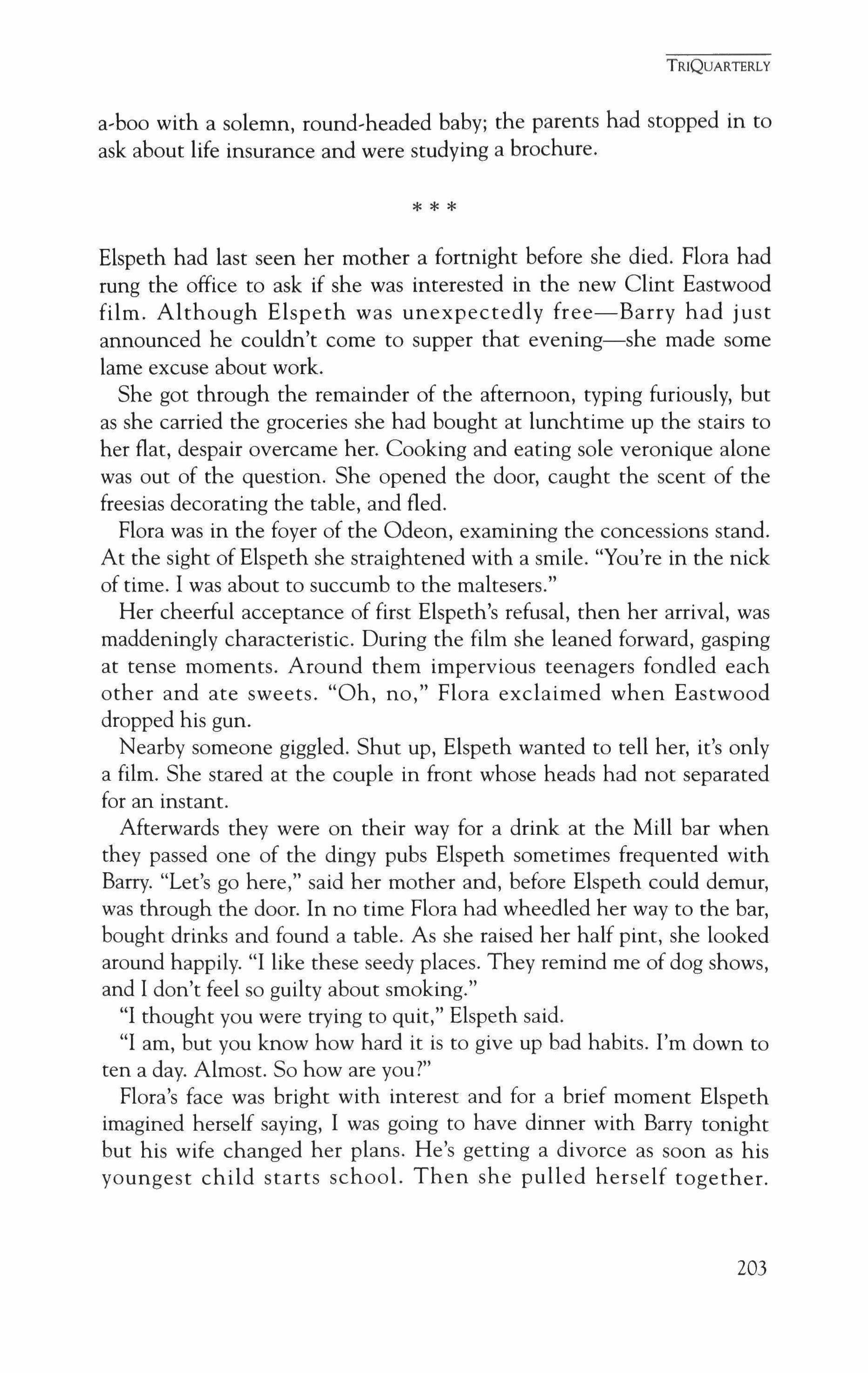
Elspeth had last seen her mother a fortnight before she died. Flora had rung the office to ask if she was interested in the new Clint Eastwood film. Although Elspeth was unexpectedly free-Barry had just announced he couldn't come to supper that evening-she made some lame excuse about work.
She got through the remainder of the afternoon, typing furiously, but as she carried the groceries she had bought at lunchtime up the stairs to her flat, despair overcame her. Cooking and eating sole veronique alone was out of the question. She opened the door, caught the scent of the freesias decorating the table, and fled.
Flora was in the foyer of the Odeon, examining the concessions stand. At the sight of Elspeth she straightened with a smile. "You're in the nick of time. I was about to succumb to the maltesers."
Her cheerful acceptance of first Elspeth's refusal, then her arrival, was maddeningly characteristic. During the film she leaned forward, gasping at tense moments. Around them impervious teenagers fondled each other and ate sweets. "Oh, no," Flora exclaimed when Eastwood dropped his gun.
Nearby someone giggled. Shut up, Elspeth wanted to tell her, it's only a film. She stared at the couple in front whose heads had not separated for an instant.
Afterwards they were on their way for a drink at the Mill bar when they passed one of the dingy pubs Elspeth sometimes frequented with Barry. "Let's go here," said her mother and, before Elspeth could demur, was through the door. In no time Flora had wheedled her way to the bar, bought drinks and found a table. As she raised her half pint, she looked around happily. "I like these seedy places. They remind me of dog shows, and I don't feel so guilty about smoking."
"I thought you were trying to quit," Elspeth said.
"I am, but you know how hard it is to give up bad habits. I'm down to ten a day. Almost. So how are you?"
Flora's face was bright with interest and for a brief moment Elspeth imagined herself saying, I was going to have dinner with Barry tonight but his wife changed her plans. He's getting a divorce as soon as his youngest child starts school. Then she pulled herself together.
TRIQUARTERLY
***
203

"Overworked and underpaid. We're setting up a pension scheme for a weavers' cooperative in Dundee." She described the co-op which had been started by two sisters and was now a dozen strong. This was her favorite part of the job, helping ordinary people, often self-employed, make provision for the future, but her mother was blind to such pleasures.
"Maybe you should plan a holiday," she said when Elspeth finished. "You didn't get away last year, did you?"
"Not really. I did that training course in Edinburgh but it wasn't exactly a holiday." It had, in fact, been something better. Barry had been there and for ten days they had behaved like a normal couple: going to restaurants and films and sleeping in the same bed. Now she asked what her mother would suggest as a destination.
"Malta? Crete?" Flora gestured as if the smoky room were ringed with exotic islands.
"So why don't you go away? Wasn't that the point of retiring?" For as long as Elspeth could recall, her mother's Labradors had made holidays well-nigh impossible.
"We are, didn't I tell you? We're getting fourteen-day rail passes in May and going to take as many trains as possible. I plan to re-read Anna Karenina and forage for sandwiches while your father does his spotting."
"That sounds the exact opposite of an island."
"Yes, but it'll make Walter happy. All those years of living in a place with no station. I'd never realized how deprived he felt."
"Top of the morning to you, ladies."
A red-faced man swayed over their table. Elspeth stared into her beer, willing him to move on.
"And to you." Flora raised her glass and he shuffled off towards the Gents. "Maybe he thought we were Irish." She gestured to her own green pullover, Elspeth's green scarf. "That's a good color for you. By the way, did I tell you Tam died? He caught a cold and never recovered. We went to the funeral last week. It was packed."
Tam was a grubby old man, a frequenter of dog shows, whom Flora regarded as a kind of saint; she claimed he knew instinctively what ailed a dog and could effect a cure simply by laying on his hands. The news of his death was a surprise only because Elspeth had presumed him long dead. "I'm sorry," she said.
Flora shook her head. "I used to think of writing a book about himhe knew so much about dogs, and now it's all gone. When Daisy was ill he had her better in no time."
As her mother lit another cigarette, Elspeth felt again the lure of con-
TRIQUARTERLY
204
fession. Later such feelings would seem like a premonition, but at the time she pushed them aside. How was the redecorating going, she asked. Splendidly, Flora said; she was planning to do the front hall next.
On their way back to the car park they passed Perth Theatre. Flora gestured at the photographs of The Cherry Orchard. "We're going on Tuesday," she said. "Would you like to come?"
"I'm afraid I'll be working late."
"Oh, well, if you change your mind, you're welcome." They continued walking past the various sculptures of the pedestrian precinct. "I used to think you would do something in theater."
"Act?" In her surprise Elspeth stopped walking.
"No, I don't know. Design? Direct? Remember that year you were see� ing so much of those two boys, David and Elsie? The three of you were mad about theater."
By now Flora was twenty, thirty feet ahead. Elspeth had to raise her voice. "I'm learning a lot working for Barry," she called. "Computer stuff, finance. When another conservation job comes along, I'll be much better qualified."
Flora came to a halt beneath a streetlight. "Yes, Perth is such a center for conservation. Elspeth, you're only twenty-eight. You shouldn't be worrying about pensions and security. Walter and I are always here if you need help. So is Christine, you know that."
"Mother, I don't need help. I have a good job. We can't all be chemists and dog breeders."
"That's not what I mean. Oh, forget it. Come and see The Cherry Orchard if you can."
Elspeth kissed Flora's cheek and fumed all the way home. What right had her mother to judge her life? She understood nothing, nothing. The world was already over-run with dogs. Why make more? And look at Walter loitering incessantly on Platform Four. There was a useful activity.
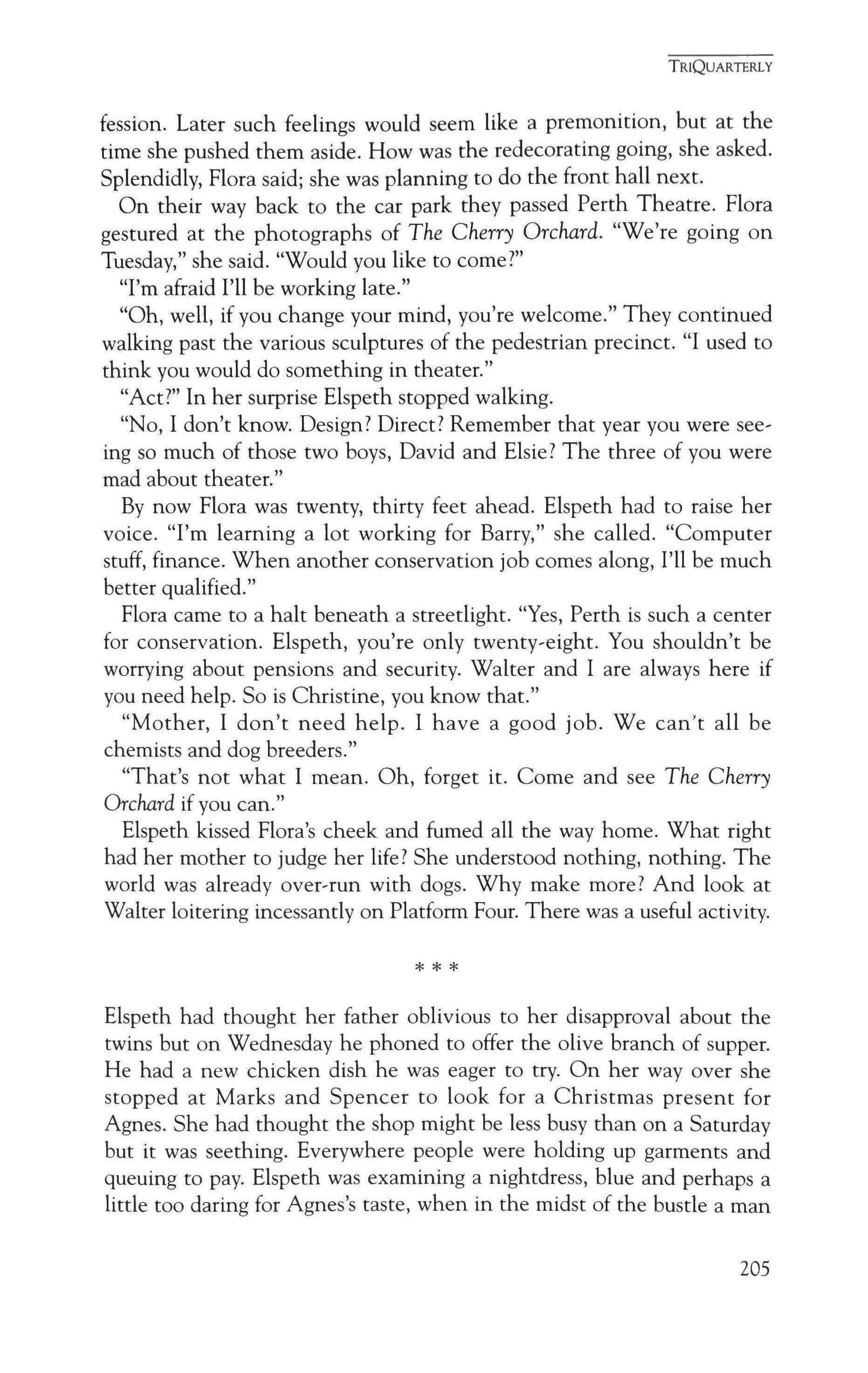
Elspeth had thought her father oblivious to her disapproval about the twins but on Wednesday he phoned to offer the olive branch of supper. He had a new chicken dish he was eager to try. On her way over she stopped at Marks and Spencer to look for a Christmas present for Agnes. She had thought the shop might be less busy than on a Saturday but it was seething. Everywhere people were holding up garments and queuing to pay. Elspeth was examining a nightdress, blue and perhaps a little too daring for Agnes's taste, when in the midst of the bustle a man
TRIQUARTERLY
* * *
205
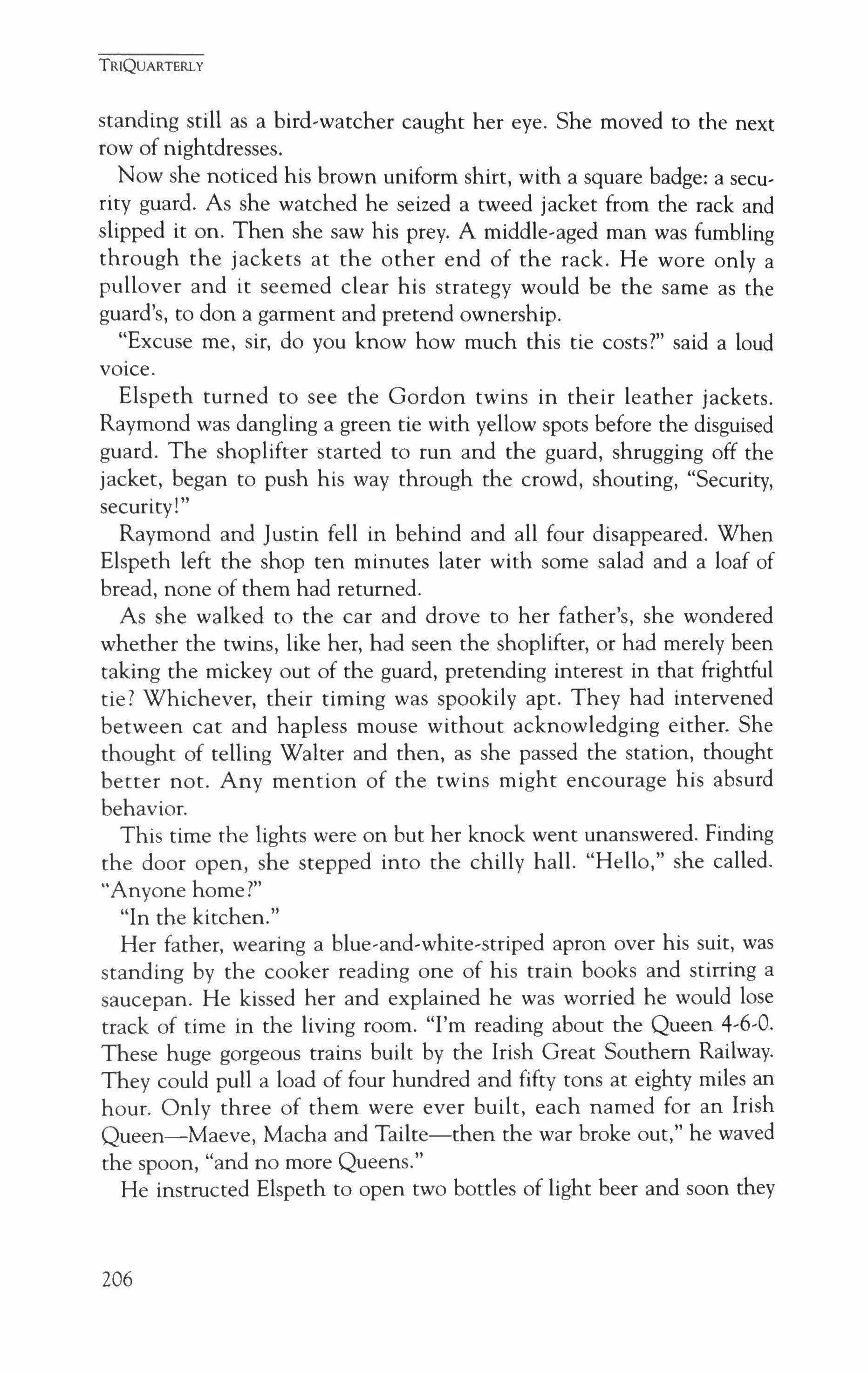
standing still as a bird-watcher caught her eye. She moved to the next row of nightdresses.
Now she noticed his brown uniform shirt, with a square badge: a security guard. As she watched he seized a tweed jacket from the rack and slipped it on. Then she saw his prey. A middle-aged man was fumbling through the jackets at the other end of the rack. He wore only a pullover and it seemed clear his strategy would be the same as the guard's, to don a garment and pretend ownership.
"Excuse me, sir, do you know how much this tie costs?" said a loud voice.
Elspeth turned to see the Gordon twins in their leather jackets. Raymond was dangling a green tie with yellow spots before the disguised guard. The shoplifter started to run and the guard, shrugging off the jacket, began to push his way through the crowd, shouting, "Security, security!"
Raymond and Justin fell in behind and all four disappeared. When Elspeth left the shop ten minutes later with some salad and a loaf of bread, none of them had returned.
As she walked to the car and drove to her father's, she wondered whether the twins, like her, had seen the shoplifter, or had merely been taking the mickey out of the guard, pretending interest in that frightful tie? Whichever, their timing was spookily apt. They had intervened between cat and hapless mouse without acknowledging either. She thought of telling Walter and then, as she passed the station, thought better not. Any mention of the twins might encourage his absurd behavior.
This time the lights were on but her knock went unanswered. Finding the door open, she stepped into the chilly hall. "Hello," she called. "Anyone home?"
"In the kitchen."
Her father, wearing a blue-and-white-striped apron over his suit, was standing by the cooker reading one of his train books and stirring a saucepan. He kissed her and explained he was worried he would lose track of time in the living room. "I'm reading about the Queen 4-6-0. These huge gorgeous trains built by the Irish Great Southern Railway. They could pull a load of four hundred and fifty tons at eighty miles an hour. Only three of them were ever built, each named for an Irish Queen-Maeve, Macha and Tailte-then the war broke out," he waved h "and Q" t e spoon, an no more ueens.
He instructed Elspeth to open two bottles of light beer and soon they
TRIQUARTERLY
206
were seated at the table in the living room. She praised the chicken but Walter was doubtful. "I couldn't find any tarragon. You can tell something's missing. How was your day?"
"All right. People don't tend to think about pensions at this time of year, so we get to catch up."
"But you never know, do you?" said Walter. "I mean I'm a good advertisement for that-one day happily watching trains, the next in hospital with people trying to take my legs away."
He drank some beer and patted his mouth with a napkin. "And look at the Irish Queens-all set for a glorious reign and then along comes Hitler. The war was a massive interruption for dogs and trains. Both were crucial-they were training Labs to parachute, for God's sake-but no one was bothering with breeding or engineering or any of the niceties. Even the King forgot about his kennels."
"You can't call the war an interruption in dog breeding," Elspeth said. "Millions of people died."
"Of course," her father said patiently. "Have some more chicken? Parsnips?" He pushed dishes in her direction. "Do you have any suggestions what I can give Agnes?"
"Well, I was just in Marks and Sparks looking at nightdresses. She's not exactly going to be living communally but still I thought nice night things might be important."
"That's a good idea. Suppose you get a nightdress and I get a dressing gown? This stuff is vile, isn't it?" he said, raising his glass.

A fortnight later they gathered at Agnes's for Christmas. Walter and Elspeth drove up from Perth; Christine and her family came down from Aberdeen. The sale of Mafeking had proceeded with astonishing speed, and it would be their last visit. Agnes, however, was determined that the occasion should not be elegiac. Smaller and less vigorous than Flora, she shared her sister's buoyant humor. Most of the furniture had already been sold, to buy their presents, she joked. On Christmas Eve Elspeth lay in bed in the spare room, staring at the ghostly shape on the wallpaper where the wardrobe had stood on every previous visit, and thought of Barry.
One of their favorite activities when they first got together had been to drive round Perth, picking out houses to buy: this one for the view, Barry suggested; this one for the garden, Elspeth said. The optimism of 207
TRIQUARTERLY
* * *
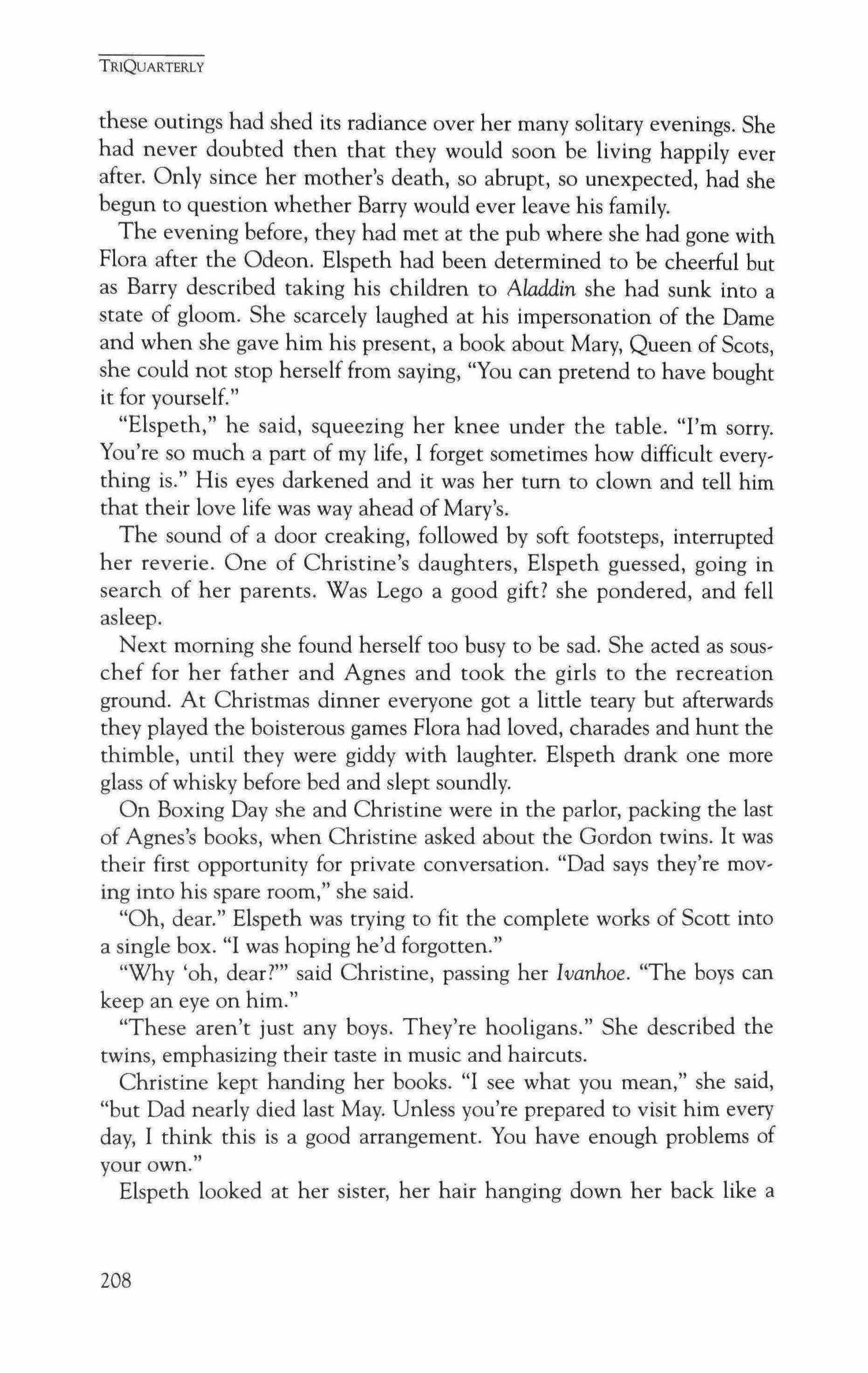
these outings had shed its radiance over her many solitary evenings. She had never doubted then that they would soon be living happily ever after. Only since her mother's death, so abrupt, so unexpected, had she begun to question whether Barry would ever leave his family.
The evening before, they had met at the pub where she had gone with Flora after the Odeon. Elspeth had been determined to be cheerful but as Barry described taking his children to Aladdin she had sunk into a state of gloom. She scarcely laughed at his impersonation of the Dame and when she gave him his present, a book about Mary, Queen of Scots, she could not stop herself from saying, "You can pretend to have bought it for yourself."
"Elspeth," he said, squeezing her knee under the table. "I'm sorry. You're so much a part of my life, I forget sometimes how difficult everything is." His eyes darkened and it was her tum to clown and tell him that their love life was way ahead of Mary's.
The sound of a door creaking, followed by soft footsteps, interrupted her reverie. One of Christine's daughters, Elspeth guessed, going in search of her parents. Was Lego a good gift? she pondered, and fell asleep.
Next morning she found herself too busy to be sad. She acted as souschef for her father and Agnes and took the girls to the recreation ground. At Christmas dinner everyone got a little teary but afterwards they played the boisterous games Flora had loved, charades and hunt the thimble, until they were giddy with laughter. Elspeth drank one more glass of whisky before bed and slept soundly.
On Boxing Day she and Christine were in the parlor, packing the last of Agnes's books, when Christine asked about the Gordon twins. It was their first opportunity for private conversation. "Dad says they're moving into his spare room," she said.
"Oh, dear." Elspeth was trying to fit the complete works of Scott into a single box. "I was hoping he'd forgotten."
"Why 'oh, dear?'" said Christine, passing her Ivanhoe. "The boys can keep an eye on him."
"These aren't just any boys. They're hooligans." She described the twins, emphasizing their taste in music and haircuts.
Christine kept handing her books. "I see what you mean," she said, "but Dad nearly died last May. Unless you're prepared to visit him every day, I think this is a good arrangement. You have enough problems of your own."
Elspeth looked at her sister, her hair hanging down her back like a
TRIQUARTERLY
208
girl's. She had inherited their mother's refusal to fret, and fate in turn had dealt kindly with her; she had an affectionate husband, two spirited daughters, and an excellent job. Sometimes Elspeth longed to tell her about Barry. Everything that seemed stupid in her own life-a dead-end job, neither husband nor children in sight-made sense because of him. But no sooner did she imagine such a speech than she also imagined her sister's easy manner vanishing. All she could hear was Christine calling her a home-wrecker, urging her to give him up.
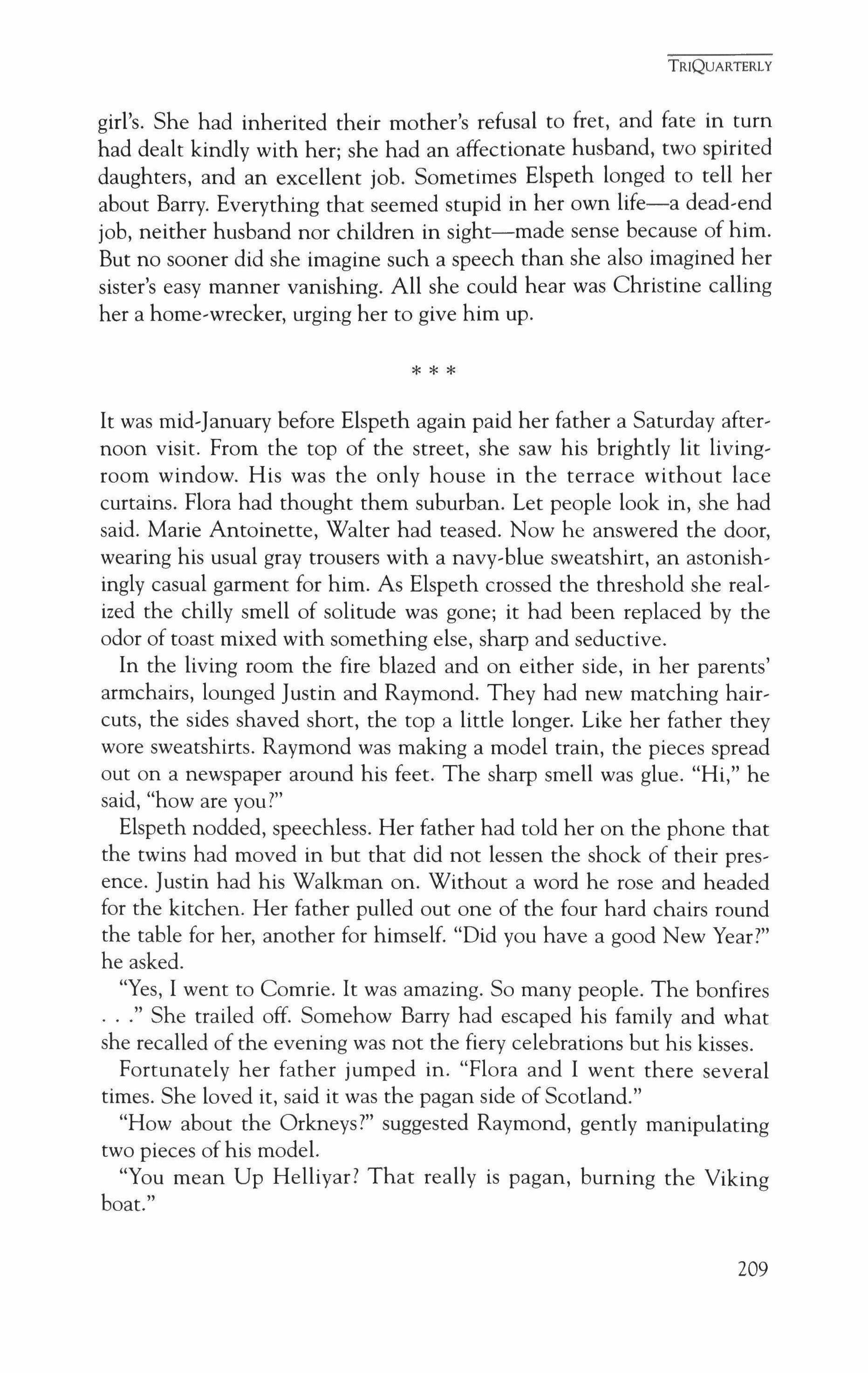
It was mid-January before Elspeth again paid her father a Saturday afternoon visit. From the top of the street, she saw his brightly lit livingroom window. His was the only house in the terrace without lace curtains. Flora had thought them suburban. Let people look in, she had said. Marie Antoinette, Walter had teased. Now he answered the door, wearing his usual gray trousers with a navy-blue sweatshirt, an astonishingly casual garment for him. As Elspeth crossed the threshold she realized the chilly smell of solitude was gone; it had been replaced by the odor of toast mixed with something else, sharp and seductive.
In the living room the fire blazed and on either side, in her parents' armchairs, lounged Justin and Raymond. They had new matching haircuts, the sides shaved short, the top a little longer. Like her father they wore sweatshirts. Raymond was making a model train, the pieces spread out on a newspaper around his feet. The sharp smell was glue. "Hi," he said, "how are you?"
Elspeth nodded, speechless. Her father had told her on the phone that the twins had moved in but that did not lessen the shock of their presence. Justin had his Walkman on. Without a word he rose and headed for the kitchen. Her father pulled out one of the four hard chairs round the table for her, another for himself. "Did you have a good New Year?" he asked.
"Yes, I went to Comrie. It was amazing. So many people. The bonfires She trailed off. Somehow Barry had escaped his family and what she recalled of the evening was not the fiery celebrations but his kisses. Fortunately her father jumped in. "Flora and I went there several times. She loved it, said it was the pagan side of Scotland."
"How about the Orkneys?" suggested Raymond, gently manipulating two pieces of his model.
"You mean Up Helliyar? That really is pagan, burning the Viking boat."
TRIQUARTERLY
* * *
209

He was talking about Skara Brae when Justin returned with tea. "Thank you, Jus," he beamed. He poured the tea, carried mugs over to the two boys and passed one to Elspeth. He resumed his seat and asked how things were at the office.
"Oh, we've been having crises. Remember Deena, the new assistant? Last week I discovered thirty-five pounds missing from the petty cash. We're going to let her go." She was talking to her father but in a slightly artificial way that acknowledged the twins. As part of the process of dismissal, she explained, she had given Deena a warning the day before. "Though I'm not sure she got it."
"Got what?" asked Walter.
"That I was warning her. I listed various problems with her work. She agreed, even volunteered that her typing was lousy. Then she said she and her boyfriend were having difficulties and I ended up sympathizing."
"But you did tell her she was making mistakes?"
Before she could reply, Raymond interrupted. "That's chronic," he burst out. "I mean you're warning her just so you can say you've kept the rules but you're going to give her the boot anyway. How would you like to be treated like that?"
"It does sound a little unfair," her father said. "What if she improves?"
"What about the money?" Elspeth protested. "Even if she turns into the world's most brilliant secretary, there's thirty-five pounds missing." It was on the tip of her tongue to say something about Marks and Spencer. Just because the boys colluded with thieves didn't mean she had to.
"Haven't you ever heard that people are innocent until proven guilty?" Raymond said. "You're believing the worst of her because it's convenient to have one person be all the bad things. Anyone could have taken the money. You could have. Or someone could have made a mistake counting it to begin with." He glared at her and his nose ring flashed. On the other side of the fire Justin took off his earphones.
Her father tugged at the neck of his sweatshirt. "I think Raymond is right. If you believe she took the money, you should tell her and give her a chance to respond."
"I agree," said Justin.
"It's really up to Barry," Elspeth muttered.
"Barry," said her father, "eats out of your hand."
Like the boys, he was watching her fiercely. To avoid their combined scrutiny, she stood up and went over to the window. A notice-board had been hung beside it with several pictures of trains and a typed list. Her eyes fell upon the first item. "We will attend school for all of every
TRIQUARTERLY
210
schoolday and we will do our homework. Walter will be available each evening to help with homework." This must be the contract her father had spoken of, between him and the twins. Quickly she stepped back.
"I spoke to Agnes yesterday," she said. "She seems very happy at the home."
"As I suspected," said her father. "It suits her to a T. Raymond and I took the train up to see her last week. He's thinking of volunteering at Help the Aged."
"He is?" she said, not troubling to hide her incredulity and at the same time wondering why Agnes had failed to mention Raymond's visit.
Raymond held up the model engine and made motions in her direction. "I like older people. They're less judgmental."
Justin offered more tea but Elspeth said she had to go. Nobody tried to stop her. As she walked down the street, Mrs. Bouldrey waved from her window. How horrified she must be to have the twins as neighbors, Elspeth thought, and waved back.
It was after six and in the empty High Street bedraggled garlands of holly and ivy rustled between the lampposts, but she was too busy plotting the twins' departure to notice. Their motives for wanting to live with her father were easy enough to understand-the comforts of home without the constraints-but his eluded her. What else but a minor breakdown could have led him to seek the company of the kind of boys who had made his last years of teaching a misery?
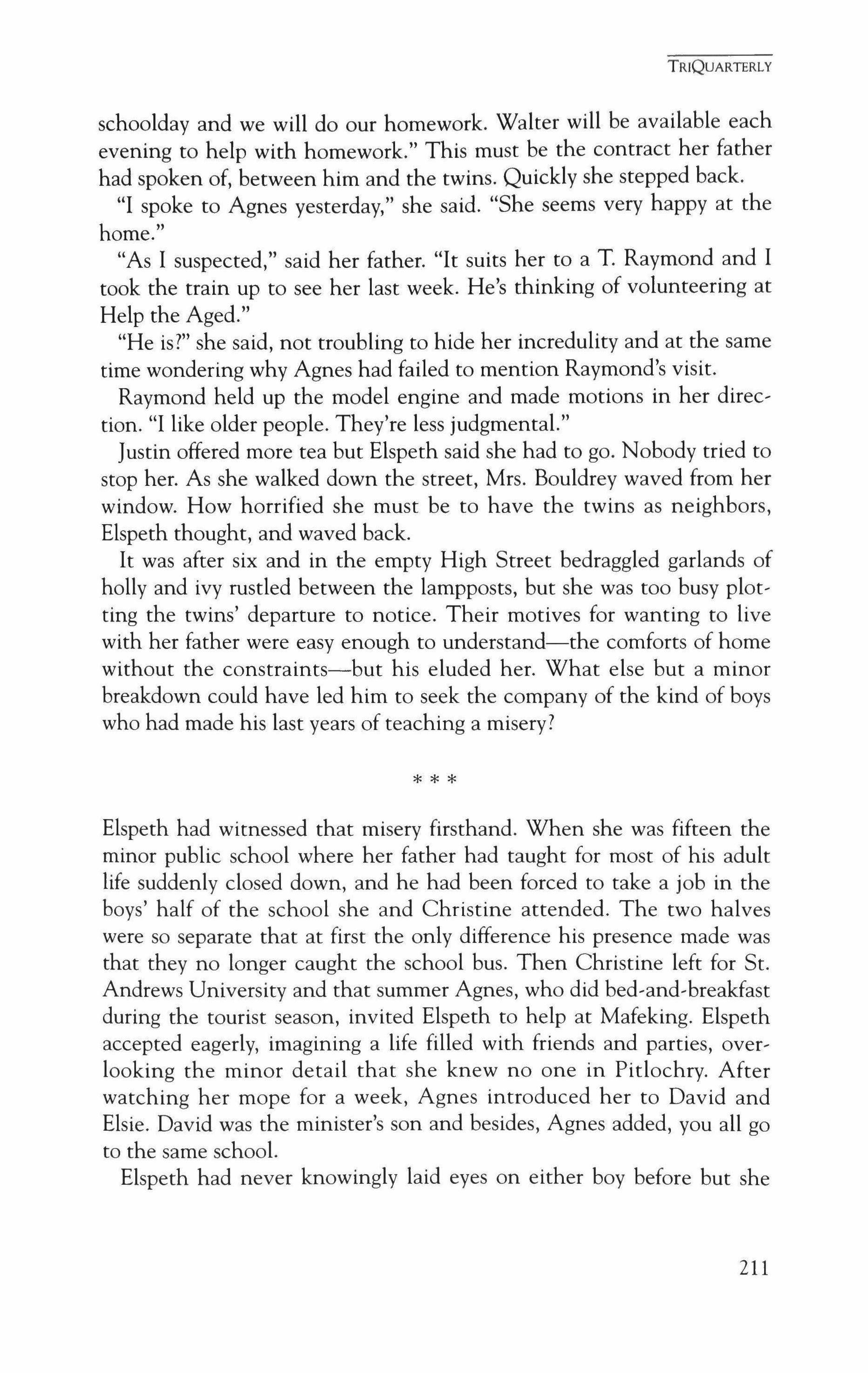
Elspeth had witnessed that misery firsthand. When she was fifteen the minor public school where her father had taught for most of his adult life suddenly closed down, and he had been forced to take a job in the boys' half of the school she and Christine attended. The two halves were so separate that at first the only difference his presence made was that they no longer caught the school bus. Then Christine left for St. Andrews University and that summer Agnes, who did bed-and-breakfast during the tourist season, invited Elspeth to help at Mafeking. Elspeth accepted eagerly, imagining a life filled with friends and parties, overlooking the minor detail that she knew no one in Pitlochry, After watching her mope for a week, Agnes introduced her to David and Elsie. David was the minister's son and besides, Agnes added, you all go to the same school.
Elspeth had never knowingly laid eyes on either boy before but she 211
TRIQUARTERLY
* * *
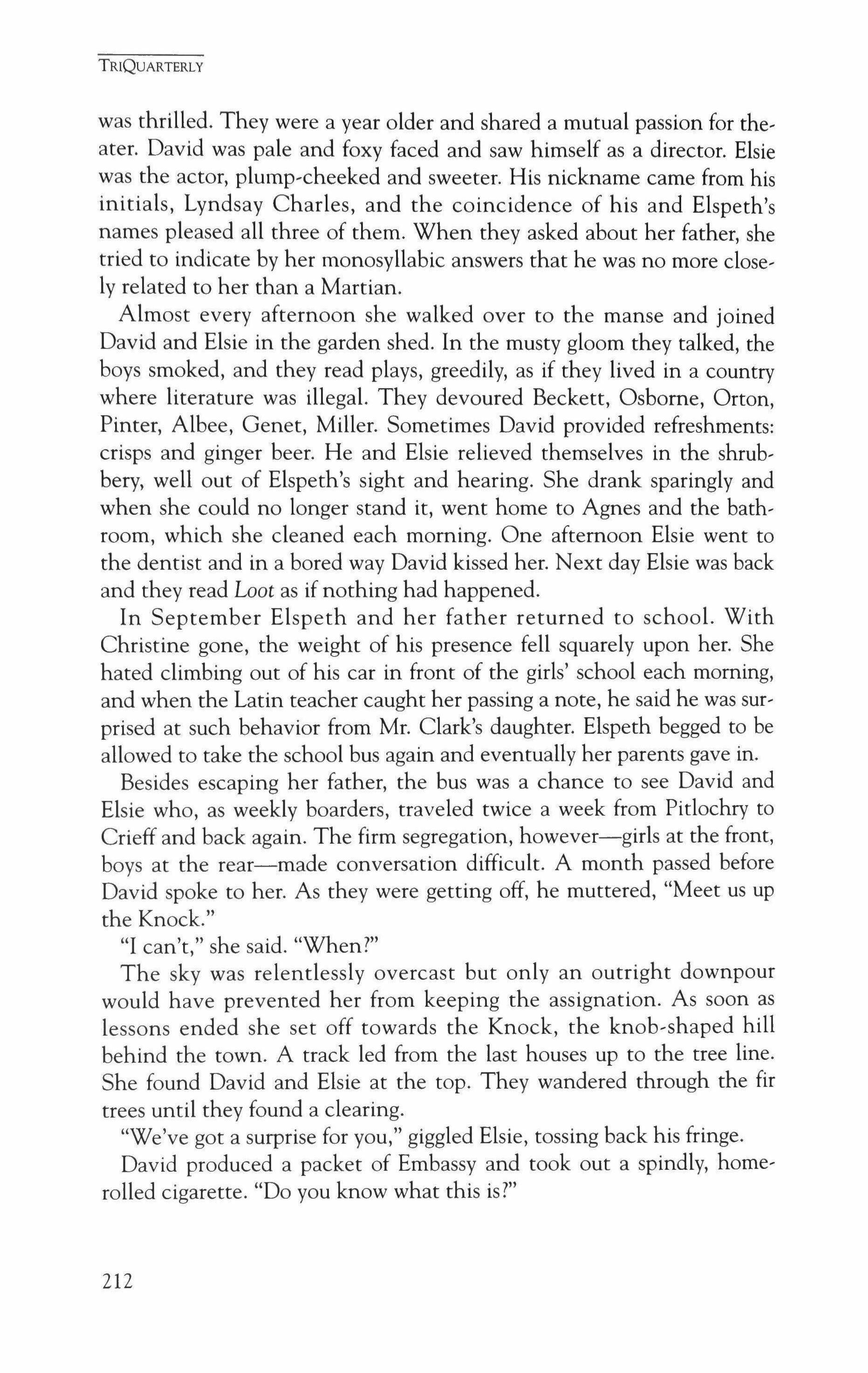
was thrilled. They were a year older and shared a mutual passion for theater. David was pale and foxy faced and saw himself as a director. Elsie was the actor, plump-cheeked and sweeter. His nickname came from his initials, Lyndsay Charles, and the coincidence of his and Elspeth's names pleased all three of them. When they asked about her father, she tried to indicate by her monosyllabic answers that he was no more closely related to her than a Martian.
Almost every afternoon she walked over to the manse and joined David and Elsie in the garden shed. In the musty gloom they talked, the boys smoked, and they read plays, greedily, as if they lived in a country where literature was illegal. They devoured Beckett, Osborne, Orton, Pinter, Albee, Genet, Miller. Sometimes David provided refreshments: crisps and ginger beer. He and Elsie relieved themselves in the shrubbery, well out of Elspeth's sight and hearing. She drank sparingly and when she could no longer stand it, went home to Agnes and the bathroom, which she cleaned each morning. One afternoon Elsie went to the dentist and in a bored way David kissed her. Next day Elsie was back and they read Loot as if nothing had happened.
In September Elspeth and her father returned to school. With Christine gone, the weight of his presence fell squarely upon her. She hated climbing out of his car in front of the girls' school each morning, and when the Latin teacher caught her passing a note, he said he was surprised at such behavior from Mr. Clark's daughter. Elspeth begged to be allowed to take the school bus again and eventually her parents gave in.
Besides escaping her father, the bus was a chance to see David and Elsie who, as weekly boarders, traveled twice a week from Pitlochrv to Crieff and back again. The firm segregation, however-girls at the front, boys at the rear-made conversation difficult. A month passed before David spoke to her. As they were getting off, he muttered, "Meet us up the Knock."
"I can't," she said. "When?"
The sky was relentlessly overcast but only an outright downpour would have prevented her from keeping the assignation. As soon as lessons ended she set off towards the Knock, the knob-shaped hill behind the town. A track led from the last houses up to the tree line. She found David and Elsie at the top. They wandered through the fir trees until they found a clearing.
"We've got a surprise for you," giggled Elsie, tossing back his fringe. David produced a packet of Embassy and took out a spindly, homerolled cigarette. "Do you know what this is?"
TRIQUARTERLY
212
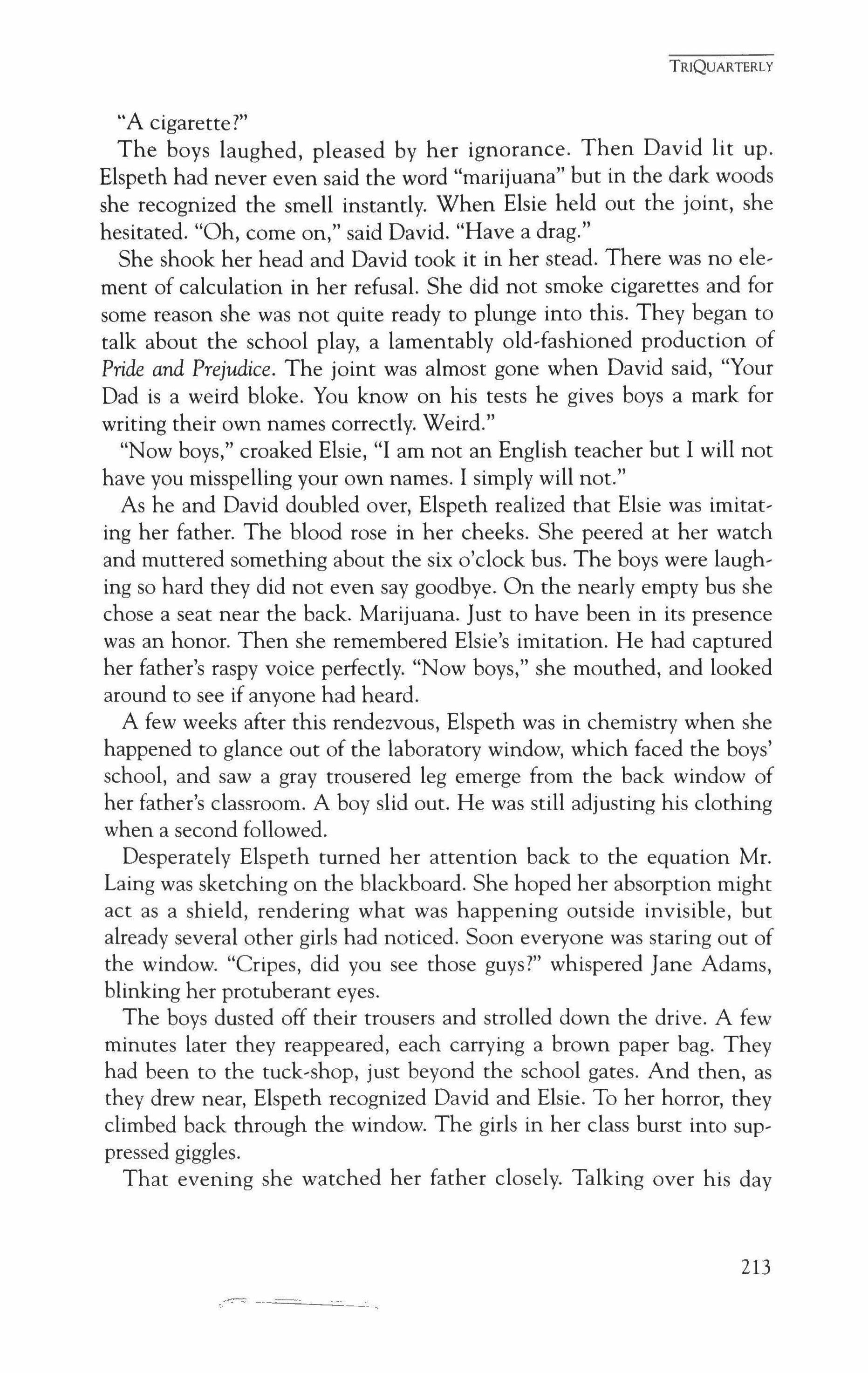
"A cigarette?"
The boys laughed, pleased by her ignorance. Then David lit up. Elspeth had never even said the word "marijuana" but in the dark woods she recognized the smell instantly. When Elsie held out the joint, she hesitated. "Oh, come on," said David. "Have a drag."
She shook her head and David took it in her stead. There was no element of calculation in her refusal. She did not smoke cigarettes and for some reason she was not quite ready to plunge into this. They began to talk about the school play, a lamentably old-fashioned production of Pride and Prejudice. The joint was almost gone when David said, "Your Dad is a weird bloke. You know on his tests he gives boys a mark for writing their own names correctly. Weird."
"Now boys," croaked Elsie, "I am not an English teacher but I will not have you misspelling your own names. I simply will not."
As he and David doubled over, Elspeth realized that Elsie was imitating her father. The blood rose in her cheeks. She peered at her watch and muttered something about the six o'clock bus. The boys were laugh, ing so hard they did not even say goodbye. On the nearly empty bus she chose a seat near the back. Marijuana. Just to have been in its presence was an honor. Then she remembered Elsie's imitation. He had captured her father's raspy voice perfectly. "Now boys," she mouthed, and looked around to see if anyone had heard.
A few weeks after this rendezvous, Elspeth was in chemistry when she happened to glance out of the laboratory window, which faced the boys' school, and saw a gray trousered leg emerge from the back window of her father's classroom. A boy slid out. He was still adjusting his clothing when a second followed.
Desperately Elspeth turned her attention back to the equation Mr. Laing was sketching on the blackboard. She hoped her absorption might act as a shield, rendering what was happening outside invisible, but already several other girls had noticed. Soon everyone was staring out of the window. "Cripes, did you see those guys?" whispered Jane Adams, blinking her protuberant eyes.
The boys dusted off their trousers and strolled down the drive. A few minutes later they reappeared, each carrying a brown paper bag. They had been to the tuck,shop just beyond the school gates. And then, as they drew near, Elspeth recognized David and Elsie. To her horror, they climbed back through the window. The girls in her class burst into sup' pressed giggles.
That evening she watched her father closely. Talking over his day 213
TRIQUARTERLY
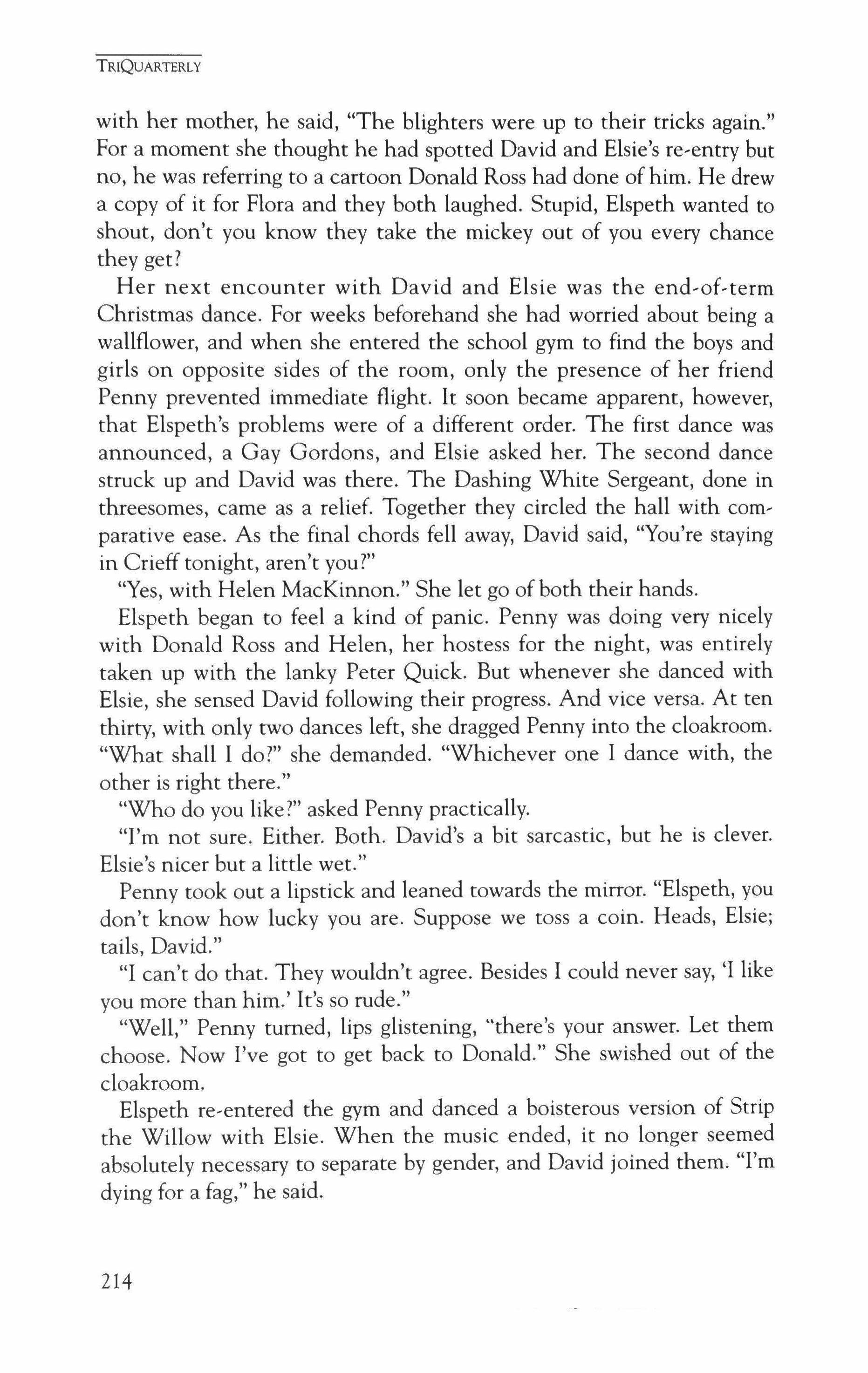
with her mother, he said, "The blighters were up to their tricks again." For a moment she thought he had spotted David and Elsie's re-entry but no, he was referring to a cartoon Donald Ross had done of him. He drew a copy of it for Flora and they both laughed. Stupid, Elspeth wanted to shout, don't you know they take the mickey out of you every chance they get?
Her next encounter with David and Elsie was the end-of-term Christmas dance. For weeks beforehand she had worried about being a wallflower, and when she entered the school gym to find the boys and girls on opposite sides of the room, only the presence of her friend Penny prevented immediate flight. It soon became apparent, however, that Elspeth's problems were of a different order. The first dance was announced, a Gay Gordons, and Elsie asked her. The second dance struck up and David was there. The Dashing White Sergeant, done in threesomes, came as a relief. Together they circled the hall with com' parative ease. As the final chords fell away, David said, "You're staying in Crieff tonight, aren't you?"
"Yes, with Helen MacKinnon." She let go of both their hands. Elspeth began to feel a kind of panic. Penny was doing very nicely with Donald Ross and Helen, her hostess for the night, was entirely taken up with the lanky Peter Quick. But whenever she danced with Elsie, she sensed David following their progress. And vice versa. At ten thirty, with only two dances left, she dragged Penny into the cloakroom. "What shall I do?" she demanded. "Whichever one I dance with, the other is right there."
"Who do you like?" asked Penny practically.
"I'm not sure. Either. Both. David's a bit sarcastic, but he is clever. Elsie's nicer but a little wet."
Penny took out a lipstick and leaned towards the mirror. "Elspeth, you don't know how lucky you are. Suppose we toss a coin. Heads, Elsie; tails, David."
"I can't do that. They wouldn't agree. Besides I could never say, 'I like you more than him.' It's so rude."
"Well," Penny turned, lips glistening, "there's your answer. Let them choose. Now I've got to get back to Donald." She swished out of the cloakroom.
Elspeth re-entered the gym and danced a boisterous version of Strip the Willow with Elsie. When the music ended, it no longer seemed absolutely necessary to separate by gender, and David joined them. "I'm dying for a fag," he said.
TRIQUARTERLY
214
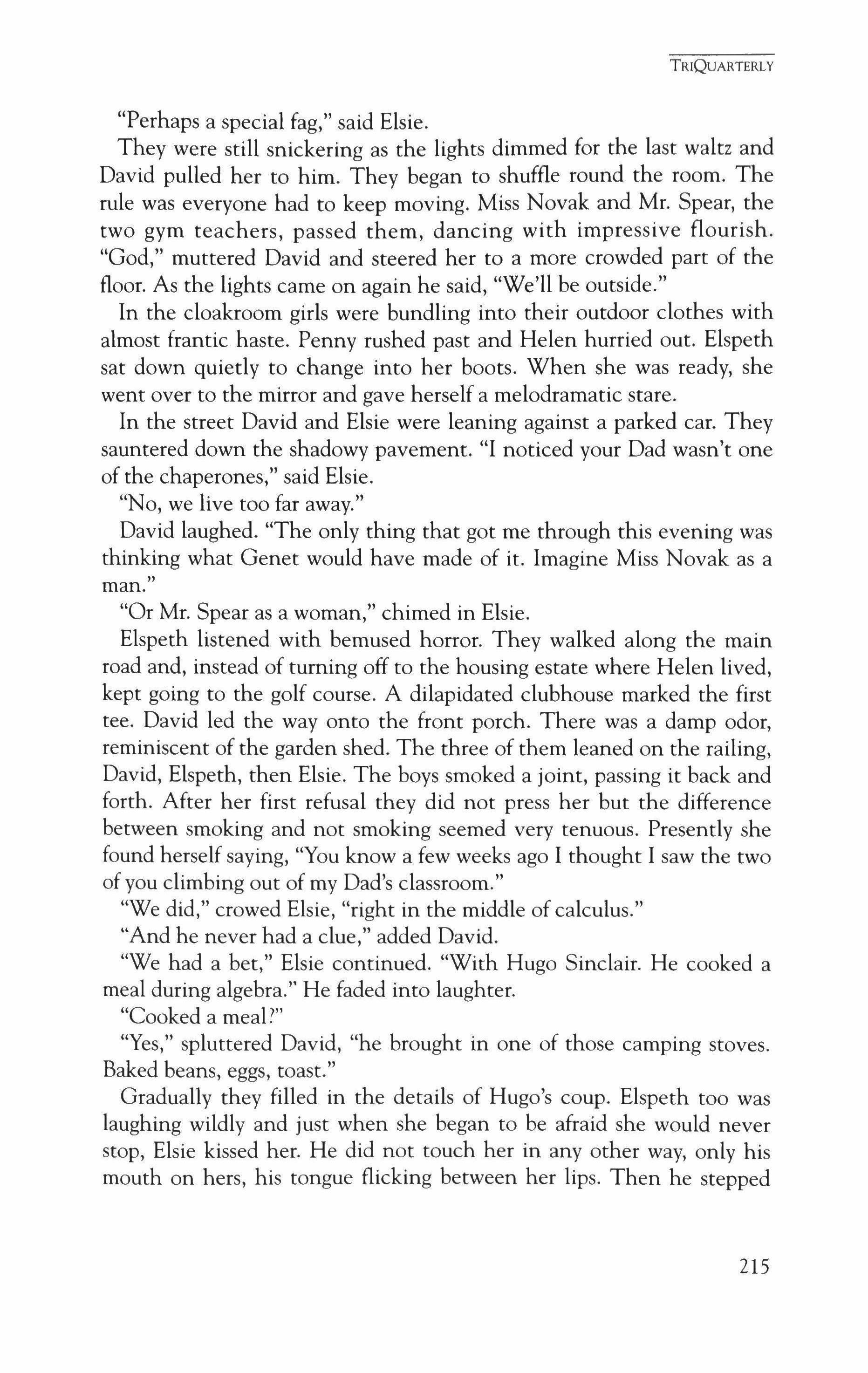
"Perhaps a special fag," said Elsie. They were still snickering as the lights dimmed for the last waltz and David pulled her to him. They began to shuffle round the room. The rule was everyone had to keep moving. Miss Novak and Mr. Spear, the two gym teachers, passed them, dancing with impressive flourish. "God," muttered David and steered her to a more crowded part of the floor. As the lights came on again he said, "We'll be outside."
In the cloakroom girls were bundling into their outdoor clothes with almost frantic haste. Penny rushed past and Helen hurried out. Elspeth sat down quietly to change into her boots. When she was ready, she went over to the mirror and gave herself a melodramatic stare.
In the street David and Elsie were leaning against a parked car. They sauntered down the shadowy pavement. "I noticed your Dad wasn't one of the chaperones," said Elsie.
"No, we live too far away."
David laughed. "The only thing that got me through this evening was thinking what Genet would have made of it. Imagine Miss Novak as a man."
"Or Mr. Spear as a woman," chimed in Elsie.
Elspeth listened with bemused horror. They walked along the main road and, instead of turning off to the housing estate where Helen lived, kept going to the golf course. A dilapidated clubhouse marked the first tee. David led the way onto the front porch. There was a damp odor, reminiscent of the garden shed. The three of them leaned on the railing, David, Elspeth, then Elsie. The boys smoked a joint, passing it back and forth. After her first refusal they did not press her but the difference between smoking and not smoking seemed very tenuous. Presently she found herself saying, "You know a few weeks ago I thought I saw the two of you climbing out of my Dad's classroom."
"We did," crowed Elsie, "right in the middle of calculus."
"And he never had a clue," added David.
"We had a bet," Elsie continued. "With Hugo Sinclair. He cooked a meal during algebra." He faded into laughter.
"Cooked a meal?"
"Yes," spluttered David, "he brought in one of those camping stoves. Baked beans, eggs, toast."
Gradually they filled in the details of Hugo's coup. Elspeth too was laughing wildly and just when she began to be afraid she would never stop, Elsie kissed her. He did not touch her in any other way, only his mouth on hers, his tongue flicking between her lips. Then he stepped
TRIQUARTERLY
215

back and David took his place. He put his hand on the back of her neck, under her hair; she opened her mouth to his deep kiss.
This happened several times before she did pull away, from Elsie, she thought. On the first tee the marker glowed. Elsie let out his breath in a sigh and she heard David fumbling with his cigarettes. "Whew," he said. "This is better than any stunt of Hugo's. Genet would have loved us."
"Mr. Clark, you've got a lovely daughter," sang Elsie. "Mr. Clark, you've
But Elspeth was already running over the damp ground to the golf course gate and the main road. Her mother, thank goodness, had insisted on a full-skirted dress for dancing. Mr. Clark, rapped her boots against the pavement, daughter. Mr. Clark, daughter, Mr. Clark, daughter.
On Monday Elspeth asked her father for a lift home from school. She pretended to study the newspaper until they were safely past the golf course. Then she told him that two boys had been smoking marijuana. His long face seemed to lengthen. "You're certain about this?" he said. "It wasn't just a fancy cigarette?"
In an effort to dispel his doubt, Elspeth did what she had not entirely planned-she named the boys. "David Martin and Elsie Kennard," she said. "They were the ones who smoked it."
They were behind a timber lorry and she stared aghast at the neatly sawn tree trunks, waiting for her father's praise. But he was making a tsk, tsk sound. "Poor boys. Don't tell anyone. I'll have a word with a couple of people and see what's to be done."
Two days later, on the last day of term, Elspeth had an interview with Mr. Strathearn, a local solicitor and school governor. He already knew the names and she had merely to nod as he repeated her story. "And, Elspeth, you'll forgive me asking, but did you smoke? Even by mistake?"
"No, I didn't touch it."
"You're a fine girl," said Mr. Strathearn.
From her point of view that was the end of the matter. Agnes came to them for Christmas and when the new term started she caught a lift with her father on Monday mornings and Friday afternoons. One snowy afternoon in late January she was taking a shortcut down Blacksmith's Lane when she rounded a comer and came face to face with David and Elsie. They stopped. So did she. The snow fell gently on their dull gray uniforms. Elspeth stared at the boys in amazement. She had imagined expulsion or eternal detention but after all her trouble, here they were, unchanged.
"Bitch," hissed David, and she scuttled by.
TRIQUARTERLY
* * * 216
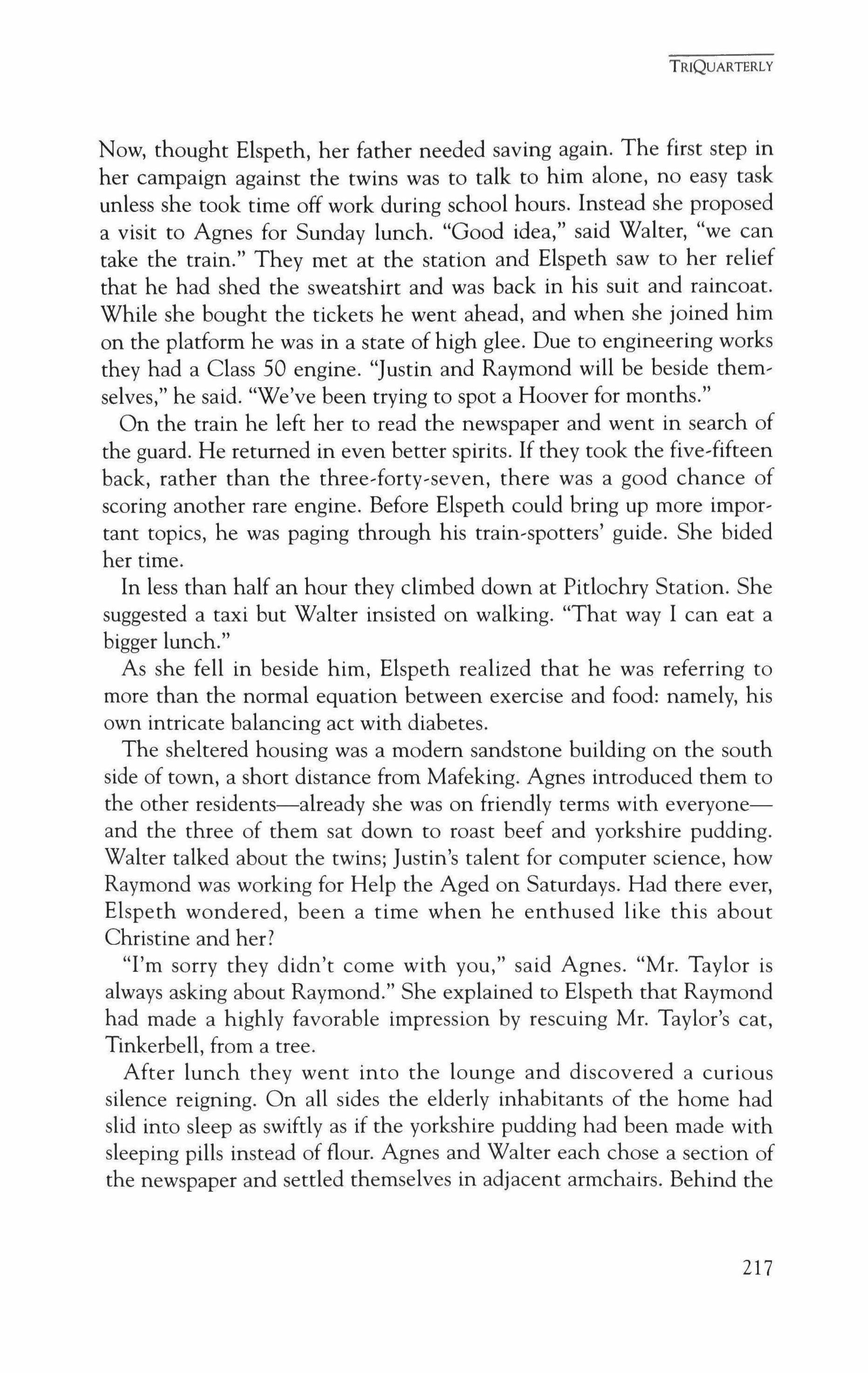
Now, thought Elspeth, her father needed saving again. The first step in her campaign against the twins was to talk to him alone, no easy task unless she took time off work during school hours. Instead she proposed a visit to Agnes for Sunday lunch. "Good idea," said Walter, "we can take the train." They met at the station and Elspeth saw to her relief that he had shed the sweatshirt and was back in his suit and raincoat. While she bought the tickets he went ahead, and when she joined him on the platform he was in a state of high glee. Due to engineering works they had a Class 50 engine. "Justin and Raymond will be beside themselves," he said. "We've been trying to spot a Hoover for months."
On the train he left her to read the newspaper and went in search of the guard. He returned in even better spirits. If they took the five-fifteen back, rather than the three-forty-seven, there was a good chance of scoring another rare engine. Before Elspeth could bring up more important topics, he was paging through his train-spotters' guide. She bided her time.
In less than half an hour they climbed down at Pitlochrv Station. She suggested a taxi but Walter insisted on walking. "That way I can eat a bigger lunch."
As she fell in beside him, Elspeth realized that he was referring to more than the normal equation between exercise and food: namely, his own intricate balancing act with diabetes.
The sheltered housing was a modem sandstone building on the south side of town, a short distance from Mafeking. Agnes introduced them to the other residents-already she was on friendly terms with everyoneand the three of them sat down to roast beef and yorkshire pudding. Walter talked about the twins; Justin's talent for computer science, how Raymond was working for Help the Aged on Saturdays. Had there ever, Elspeth wondered, been a time when he enthused like this about Christine and her?
"I'm sorry they didn't come with you," said Agnes. "Mr. Taylor is always asking about Raymond." She explained to Elspeth that Raymond had made a highly favorable impression by rescuing Mr. Taylor's cat, Tinkerbell, from a tree.
After lunch they went into the lounge and discovered a curious silence reigning. On all sides the elderly inhabitants of the home had slid into sleep as swiftly as if the yorkshire pudding had been made with sleeping pills instead of flour. Agnes and Walter each chose a section of the newspaper and settled themselves in adjacent armchairs. Behind the 217
TRIQUARTERLY
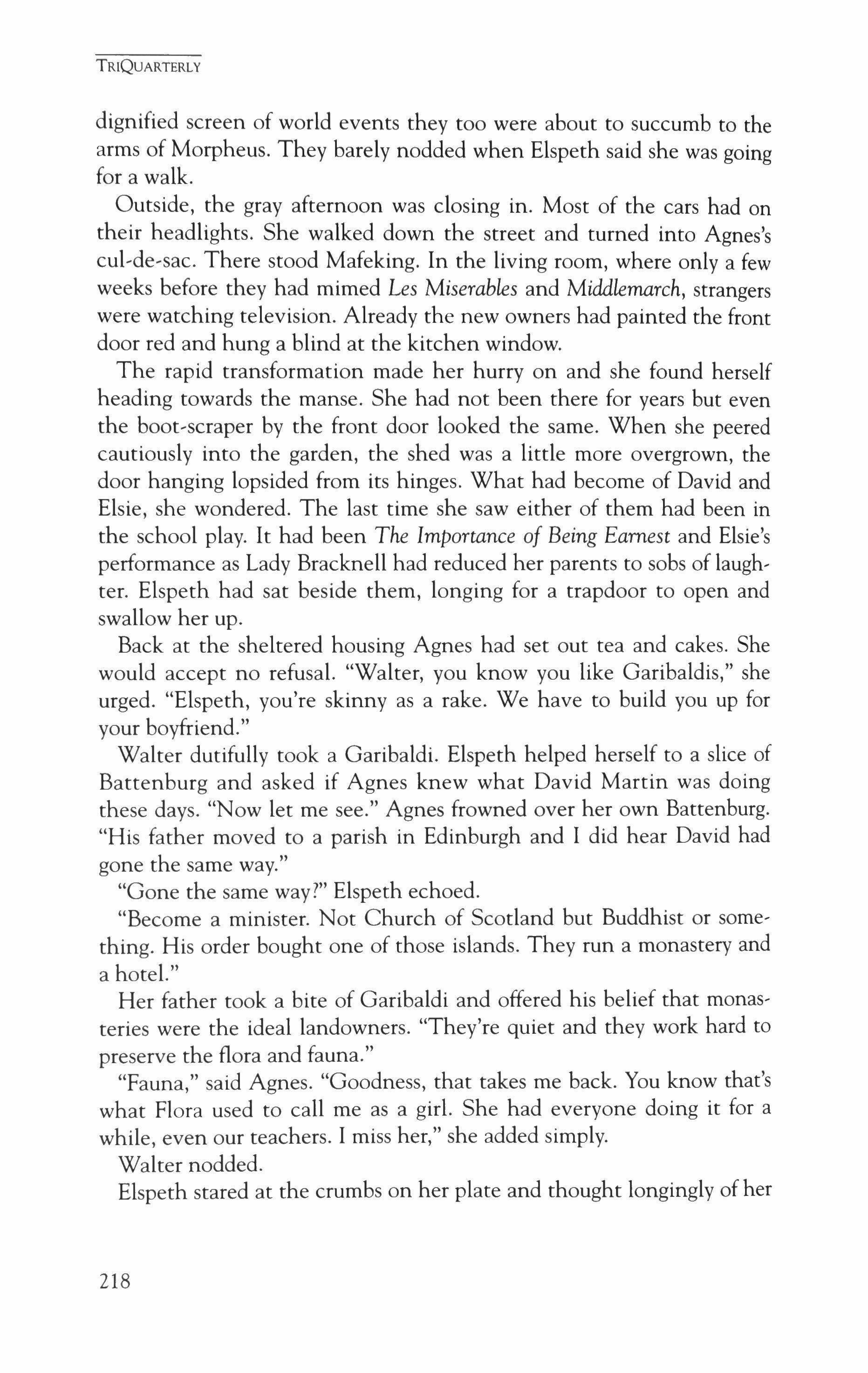
dignified screen of world events they too were about to succumb to the arms of Morpheus. They barely nodded when Elspeth said she was going for a walk.
Outside, the gray afternoon was closing in. Most of the cars had on their headlights. She walked down the street and turned into Agnes's cul-de-sac. There stood Mafeking. In the living room, where only a few weeks before they had mimed Les Miserables and Middlemarch, strangers were watching television. Already the new owners had painted the front door red and hung a blind at the kitchen window.
The rapid transformation made her hurry on and she found herself heading towards the manse. She had not been there for years but even the boot-scraper by the front door looked the same. When she peered cautiously into the garden, the shed was a little more overgrown, the door hanging lopsided from its hinges. What had become of David and Elsie, she wondered. The last time she saw either of them had been in the school play. It had been The Importance of Being Earnest and Elsie's performance as Lady Bracknell had reduced her parents to sobs of laughter. Elspeth had sat beside them, longing for a trapdoor to open and swallow her up.
Back at the sheltered housing Agnes had set out tea and cakes. She would accept no refusal. "Walter, you know you like Garibaldis," she urged. "Elspeth, you're skinny as a rake. We have to build you up for your boyfriend."
Walter dutifully took a Garibaldi. Elspeth helped herself to a slice of Battenburg and asked if Agnes knew what David Martin was doing these days. "Now let me see." Agnes frowned over her own Battenburg. "His father moved to a parish in Edinburgh and I did hear David had gone the same way."
"Gone the same way?" Elspeth echoed.
"Become a minister. Not Church of Scotland but Buddhist or something. His order bought one of those islands. They run a monastery and a hotel."
Her father took a bite of Garibaldi and offered his belief that monasteries were the ideal landowners. "They're quiet and they work hard to preserve the flora and fauna."
"Fauna," said Agnes. "Goodness, that takes me back. You know that's what Flora used to call me as a girl. She had everyone doing it for a while, even our teachers. I miss her," she added simply.
Walter nodded.
Elspeth stared at the crumbs on her plate and thought longingly of her
TRIQUARTERLY
218
mother. When she was training dogs, Flora had often brought them up to Pitlochry to teach them about traffic. Now Elspeth pictured her striding across the checked carpet of the sheltered housing, a pair of wellington boots in one hand, a dog leash in the other. With what gusto she would have eaten lunch and teased Agnes about her waistline before organizing them to walk down to the recreation ground. Her death seemed not merely sad but an affront to the natural order of things.
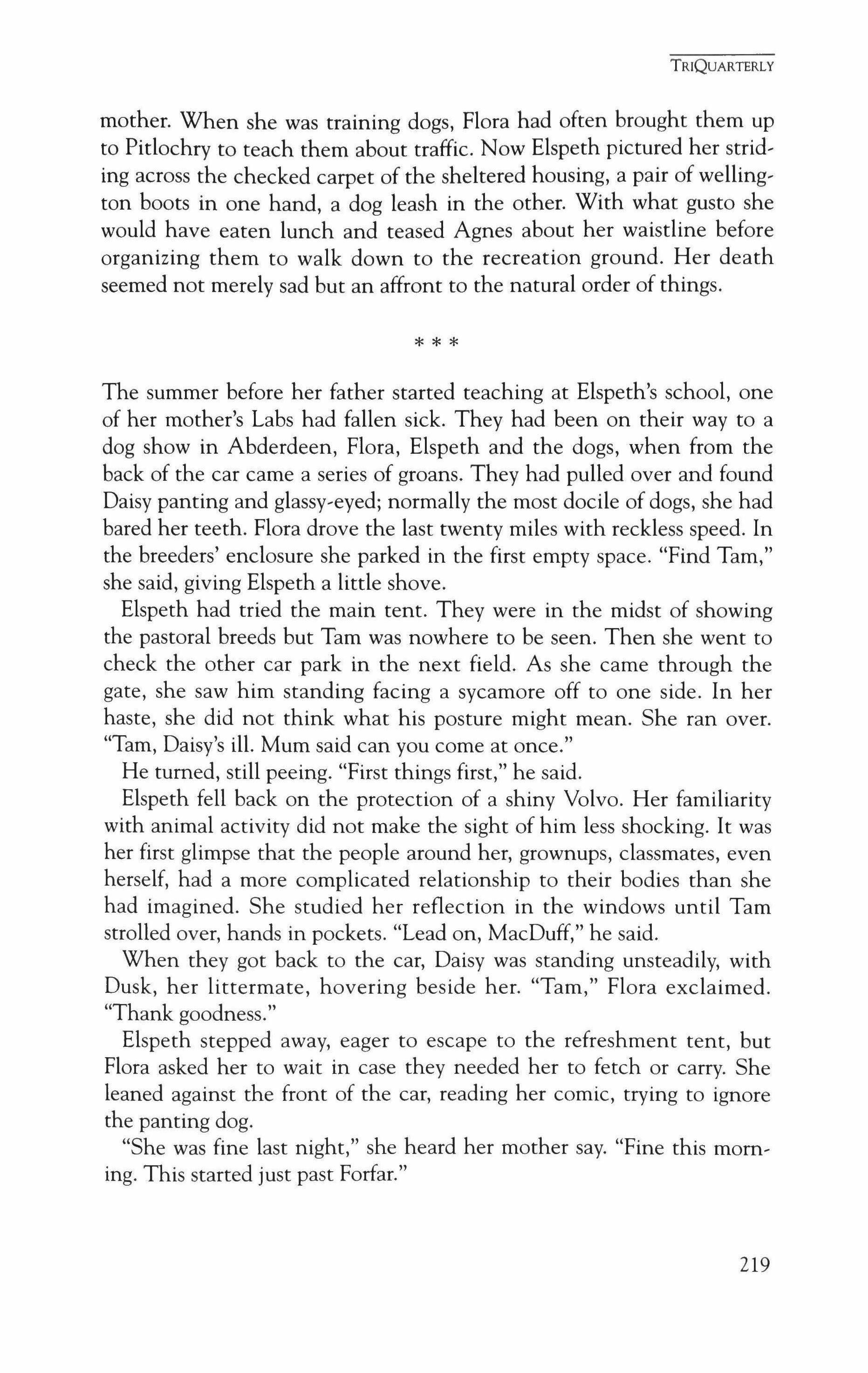
The summer before her father started teaching at Elspeth's school, one of her mother's Labs had fallen sick. They had been on their way to a dog show in Abderdeen, Flora, Elspeth and the dogs, when from the back of the car came a series of groans. They had pulled over and found Daisy panting and glassy-eyed: normally the most docile of dogs, she had bared her teeth. Flora drove the last twenty miles with reckless speed. In the breeders' enclosure she parked in the first empty space. "Find Tam," she said, giving Elspeth a little shove.
Elspeth had tried the main tent. They were in the midst of showing the pastoral breeds but Tam was nowhere to be seen. Then she went to check the other car park in the next field. As she came through the gate, she saw him standing facing a sycamore off to one side. In her haste, she did not think what his posture might mean. She ran over. "Tam, Daisy's ill. Mum said can you come at once."
He turned, still peeing. "First things first," he said.
Elspeth fell back on the protection of a shiny Volvo. Her familiarity with animal activity did not make the sight of him less shocking. It was her first glimpse that the people around her, grownups, classmates, even herself, had a more complicated relationship to their bodies than she had imagined. She studied her reflection in the windows until Tam strolled over, hands in pockets. "Lead on, MacDuff," he said.
When they got back to the car, Daisy was standing unsteadily, with Dusk, her littermate, hovering beside her. "Tam," Flora exclaimed. "Thank goodness."
Elspeth stepped away, eager to escape to the refreshment tent, but Flora asked her to wait in case they needed her to fetch or carry. She leaned against the front of the car, reading her comic, trying to ignore the panting dog.
"She was fine last night," she heard her mother say. "Fine this rnorning. This started just past Forfar."
TRIQUARTERLY
* * *
219
"Och, aye," said Tam. "Doubtless she ate something, poor lass, see her tongue, but she's already on the mend."
Elspeth climbed deeper into her story, about a girl, Fay, whose father falls off a ladder, leaving her to run the family bakery. No one could know, she told herself, that on their walk the night before she had taken Daisy to visit the clump of Deadly Nightshade she had discovered near the old well and that she either had, or had not, allowed Daisy to briefly sniff the bright berries. Read, she told herself. Fay was learning to make cinnamon rolls. Don't listen to the grownups.
True to Tam's prediction, Daisy did recover-she emptied two bowls of water and fell into a peaceful sleep-and Elspeth wrapped the events of the day, all the events, in a huge blanket of forgetfulness which she seldom twitched aside.

By the time Elspeth and Walter said goodbye to Agnes and set off for the station, it was fully dark. The street was empty save for a pack of teenagers loitering outside the off-license. Her father asked about Deena. Had she heeded Elspeth's warning?
"She's doing better. We've only had one complaint in the last week, and she stays late to check through her work."
"So that's good."
"Yes and no. It means we can give her a reference, but Barry plans to let her go at the end of the month."
"I thought you were the office manager."
"Barry has the final say," Elspeth said. "We're not a huge company, there are just five of us."
"Still," said her father, "it's a terrible thing to accuse someone falsely."
They were passing the fishmongers; white trays edged with plastic parsley waited for the next day's catch. Last Friday when she had been too busy to go for lunch Deena had brought her a shrimp-and-cucumber sandwich. She had brushed aside offers of payment and lectured Elspeth on the importance of regular meals. Later that afternoon Elspeth had reminded Barry he must give her notice next week.
"Whatever you say," he had said. In a year his youngest child would start school and he would, he claimed, at last feel free. Meanwhile she had seen him bending over Deena's desk, laughing with an openness she had forgotten.
The train back to Perth was, as predicted, pulled by another old
TRIQUARTERLY
* * *
220

engine. When her father finished his raptures, Elspeth said there was something she wanted to discuss with him. They were sitting facing each other. He folded his arms and said calmly, "You want to talk about Raymond and Jus, don't you? I could see how uncomfortable you were with them last week."
"It's not that I'm uncomfortable. I think the whole business of them moving in with you is wrong."
"Wrong? Tell me how."
"They're just using you, eating you out of house and home, getting you to do their homework and take care of them, and then they're going to bugger off and leave you."
"That doesn't sound so different from my own children. From all children. I left home at seventeen. Couldn't wait and never went back."
He let his eyes close, and when he spoke again his voice was so soft she had to lean forward to hear him. "It may not have occurred to you but I taught boys for forty years because I like them. Your mother liked dogs and I liked boys, even the bad ones who made fun of me. That was how it was. Now Justin and Raymond are a reprieve. They don't treat me as if I'm old, they don't make exceptions for me. Maybe you can't understand that, Elspeth. You've always been such a puritan."
Before she could answer, his breathing deepened and he was asleep. She stared out of the window at the occasional lights of cars and houses, enraged. What did he mean such a puritan? If he knew about Barry, he'd change his mind in a hurry. Then she wondered if he might have been thinking of David and Elsie. After her meeting with Mr. Stratheam her father had never mentioned the marijuana again but somehow she had become aware that he regarded her as a sneak. She could not tell him the one thing that would vindicate her: the way the boys mocked him. You were the one who needed police protection, she thought.
They were nearing Perth when she pulled herself away from the hypnotic darkness and looked back at her father. At once she knew something was awry. His eyes were still closed but no longer in sleep. He was slumped against the window and his face, beneath the stark lighting of the train, was the color of whey. She reached across and tugged his sleeve. "Dad," she said. "Walter."
He grunted faintly.
She jumped up and ran down the nearly empty train. At last she found the guard, a ginger-haired man reading the sports pages of the paper. She stammered out that her father was ill. "What sort of ill?" he said, seizing his walkie-talkie. He seemed pleased by this call to action.
TRIQUARTERLY
221

"He has diabetes. I think he must have missed a shot."
Together they hurried down the train. Walter was as she had left him. All those cakes, she thought. Awkwardly she went through his pockets, hoping to find medicine or instructions. There was only his train-spotters' guide.
The guard spoke into the walkie-talkie and after listening to a crackling response said, "We'll be there in five minutes. We'll get an ambulance and have him at the hospital in ten."
As they rolled into Perth Station he co-opted a young man from the next carriage to help lift her father off the train. Together they maneuvered him onto the platform. A trolley was standing nearby and they made their way towards it, Walter hanging limply between them.
"Where's the ambulance?" Elspeth said. "I thought it would be here."
Her voice was loud and shaky. The twilight of the station made her feel she could easily have overlooked an ambulance or two. Then a hand touched her shoulder. "Elspeth," said Raymond. "We've brought his stuff."
He held out the black pouch containing her father's insulin and needles. "Thank God." She was reaching towards the bag when she realized she had no idea how to give an injection. She stared at Raymond, wideeyed. "I can't do it."
"No," he said comfortably, "but we can. Jus and I made him teach us. We only discovered half an hour ago that he'd left his insulin, else we'd have phoned."
He stepped around her. His brother was already bent over the supine body. Justin unbuttoned Walter's coat, tugged up his shirt, and undid his trousers. She glimpsed the secret white flesh of her father's belly. "Go and get a cup of tea," Raymond said, holding up the syringe to the light. "Plenty of sugar."
By the time she came back her father, once again fully dressed, was talking to Raymond and Jus. "It had the original boiler from 1952," he whispered, "but the engineer told me they'd refurbished the valves."
"Here's the tea," she said.
"Well, drink it," said Raymond.
"Isn't it for Dad?" she asked, bewildered.
Raymond shook his head, smiling slightly. "We'll get him some in a few minutes. No, if he needs insulin, then more sugar is the last thing to give him."
He turned back to her father and Elspeth sank down on the far end of the trolley. As she sipped the sweet, strong, institutional tea, she was
TRIQUARTERLY
222
overwhelmed by her own stupidity and treachery.

Next morning she was locking her car outside her father's when a voice called her name. Mrs. Bouldrey trotted towards her, towed by a panting corgi. "How's Walter?" she asked. "Heel, Rusty."
Elspeth told her the hospital had sent him home with a warning. "Oh, that's grand news," said Mrs. Bouldrey, "just grand. He was so good after Flora died. A week later he came round to ask for a recipe for macaroni and cheese. I've never seen anyone with so little self-pity." She was still nodding emphatically as the inexorable Rusty dragged her away. "Let me know if! can help," she cried.
The twins had left for school and for the first time Elspeth used the key her father had given her. Shyly she climbed the stairs to his bedroom. He was sitting up in bed, wearing rumpled blue pajamas. She noticed he kept to the side where he had always slept with her mother; the newspaper lay abandoned beside him. "Dad," she said, "how are you feeling?"
"Exhausted. As if I'd been swimming the channel."
She was close enough to see the truth of his remark. His face was still pale and the lower rims of his eyes seemed to have slipped slightly, leaving the whites larger and more bloodshot. "I'll make some tea," she said.
As she waited for the kettle to boil, she looked around for something to do, but the breakfast dishes were washed, the plants watered, the coal scuttle full. A note from Raymond on the table told her what to give Walter for lunch and listed the phone number of the school. When she carried the tea upstairs, her father had fallen asleep.
She tiptoed away again and stopped in the hall to phone the office. Deena answered, her warm voice making even the name of the company sound inviting. Elspeth explained she was taking the day off and why. "I'm so sorry," Deena said. "Is there anything I can do? Do you need groceries?"
"No, thanks," Elspeth said, and hung up before she could offer more sympathy.
She stood there, looking at the half-stripped wallpaper. Cold air rushed through the letter box, nipping at her face and hands. If David was a Buddhist priest, what did that make Elsie? An accountant? They had kissed her because they liked her; they had kissed her to make fun of her father. Those were the two banks of the river and the truth lay 223
TRIQUARTERLY
***
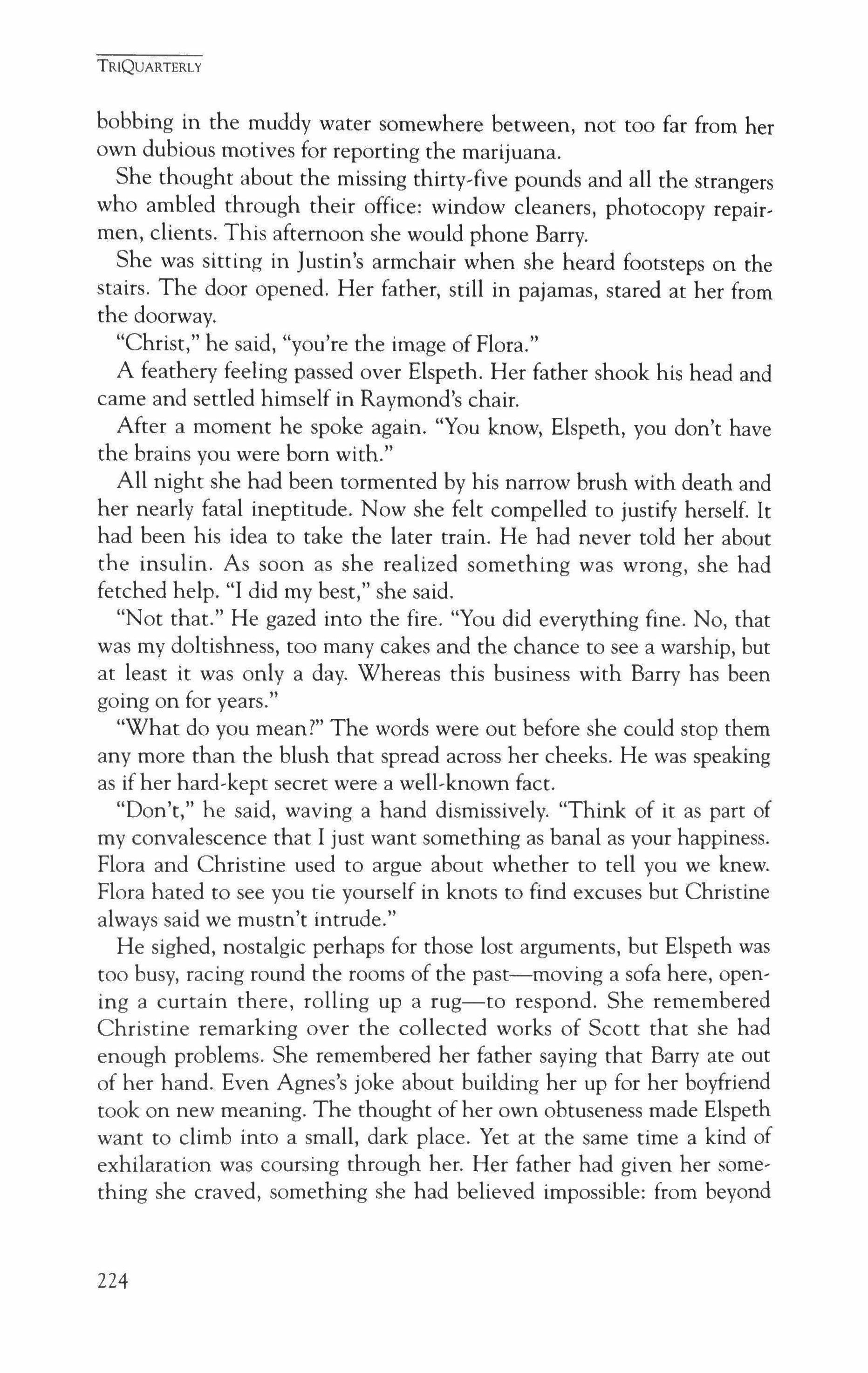
bobbing in the muddy water somewhere between, not too far from her own dubious motives for reporting the marijuana.
She thought about the missing thirty-five pounds and all the strangers who ambled through their office: window cleaners, photocopy repairmen, clients. This afternoon she would phone Barry.
She was sitting in Justin's armchair when she heard footsteps on the stairs. The door opened. Her father, still in pajamas, stared at her from the doorway.
"Christ," he said, "you're the image of Flora."
A feathery feeling passed over Elspeth. Her father shook his head and came and settled himself in Raymond's chair.
After a moment he spoke again. "You know, Elspeth, you don't have the brains you were born with."
All night she had been tormented by his narrow brush with death and her nearly fatal ineptitude. Now she felt compelled to justify herself. It had been his idea to take the later train. He had never told her about the insulin. As soon as she realized something was wrong, she had fetched help. "I did my best," she said.
"Not that." He gazed into the fire. "You did everything fine. No, that was my doltishness, too many cakes and the chance to see a warship, but at least it was only a day. Whereas this business with Barry has been going on for years."
"What do you mean?" The words were out before she could stop them any more than the blush that spread across her cheeks. He was speaking as if her hard-kept secret were a well-known fact.
"Don't," he said, waving a hand dismissively. "Think of it as part of my convalescence that I just want something as banal as your happiness. Flora and Christine used to argue about whether to tell you we knew. Flora hated to see you tie yourself in knots to find excuses but Christine always said we mustn't intrude."
He sighed, nostalgic perhaps for those lost arguments, but Elspeth was too busy, racing round the rooms of the past-moving a sofa here, opening a curtain there, rolling up a rug-to respond. She remembered Christine remarking over the collected works of Scott that she had enough problems. She remembered her father saying that Barry ate out of her hand. Even Agnes's joke about building her up for her boyfriend took on new meaning. The thought of her own obtuseness made Elspeth want to climb into a small, dark place. Yet at the same time a kind of exhilaration was coursing through her. Her father had given her something she craved, something she had believed impossible: from beyond
TRIQUARTERLY
224
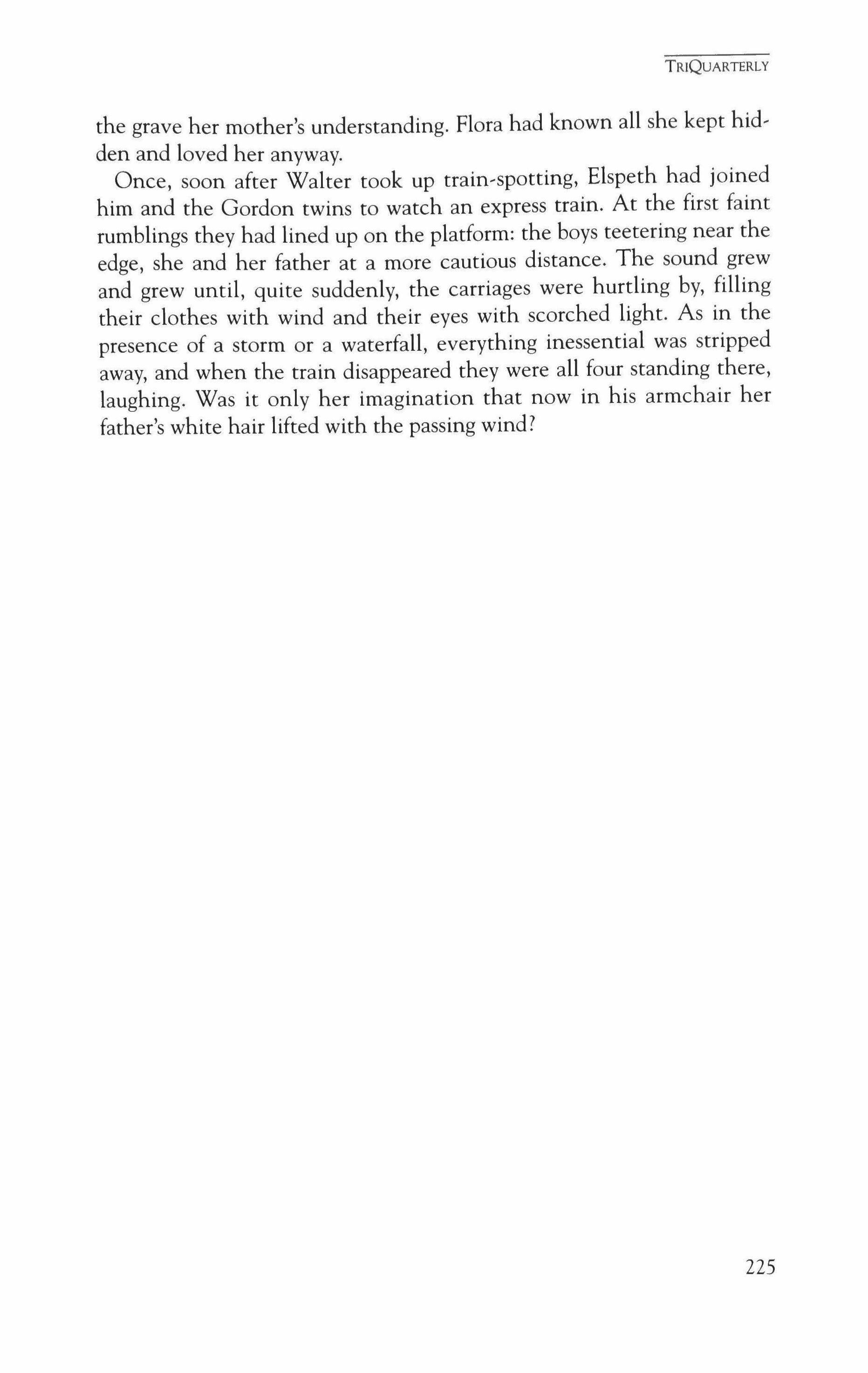
the grave her mother's understanding. Flora had known all she kept hidden and loved her anyway.
Once, soon after Walter took up train-spotting, Elspeth had joined him and the Gordon twins to watch an express train. At the first faint rumblings they had lined up on the platform: the boys teetering near the edge, she and her father at a more cautious distance. The sound grew and grew until, quite suddenly, the carriages were hurtling by, filling their clothes with wind and their eyes with scorched light. As in the presence of a storm or a waterfall, everything inessential was stripped away, and when the train disappeared they were all four standing there, laughing. Was it only her imagination that now in his armchair her father's white hair lifted with the passing wind?
TRIQUARTERLY
225
Transactions
Michelle Cliff
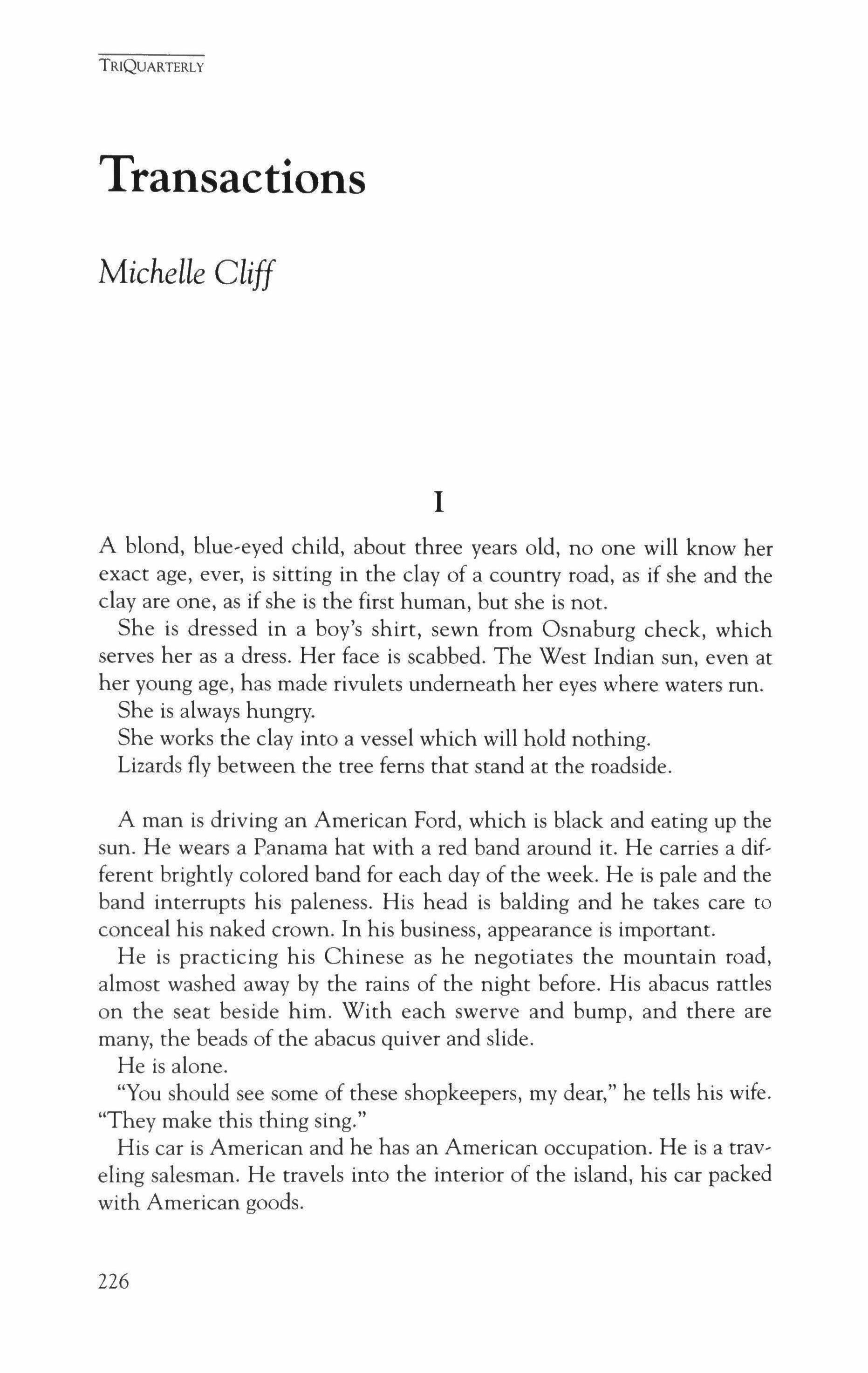
IA blond, blue-eyed child, about three years old, no one will know her exact age, ever, is sitting in the clay of a country road, as if she and the clay are one, as if she is the first human, but she is not.
She is dressed in a boy's shirt, sewn from Osnaburg check, which serves her as a dress. Her face is scabbed. The West Indian sun, even at her young age, has made rivulets underneath her eyes where waters run.
She is always hungry.
She works the clay into a vessel which will hold nothing.
Lizards fly between the tree ferns that stand at the roadside.
A man is driving an American Ford, which is black and eating up the sun. He wears a Panama hat with a red band around it. He carries a different brightly colored band for each day of the week. He is pale and the band interrupts his paleness. His head is balding and he takes care to conceal his naked crown. In his business, appearance is important.
He is practicing his Chinese as he negotiates the mountain road, almost washed away by the rains of the night before. His abacus rattles on the seat beside him. With each swerve and bump, and there are many, the beads of the abacus quiver and slide.
He is alone.
"You should see some of these shopkeepers, my dear," he tells his wife. "They make this thing sing."
His car is American and he has an American occupation. He is a traveling salesman. He travels into the interior of the island, his car packed with American goods.
TRIQUARTERLY
226
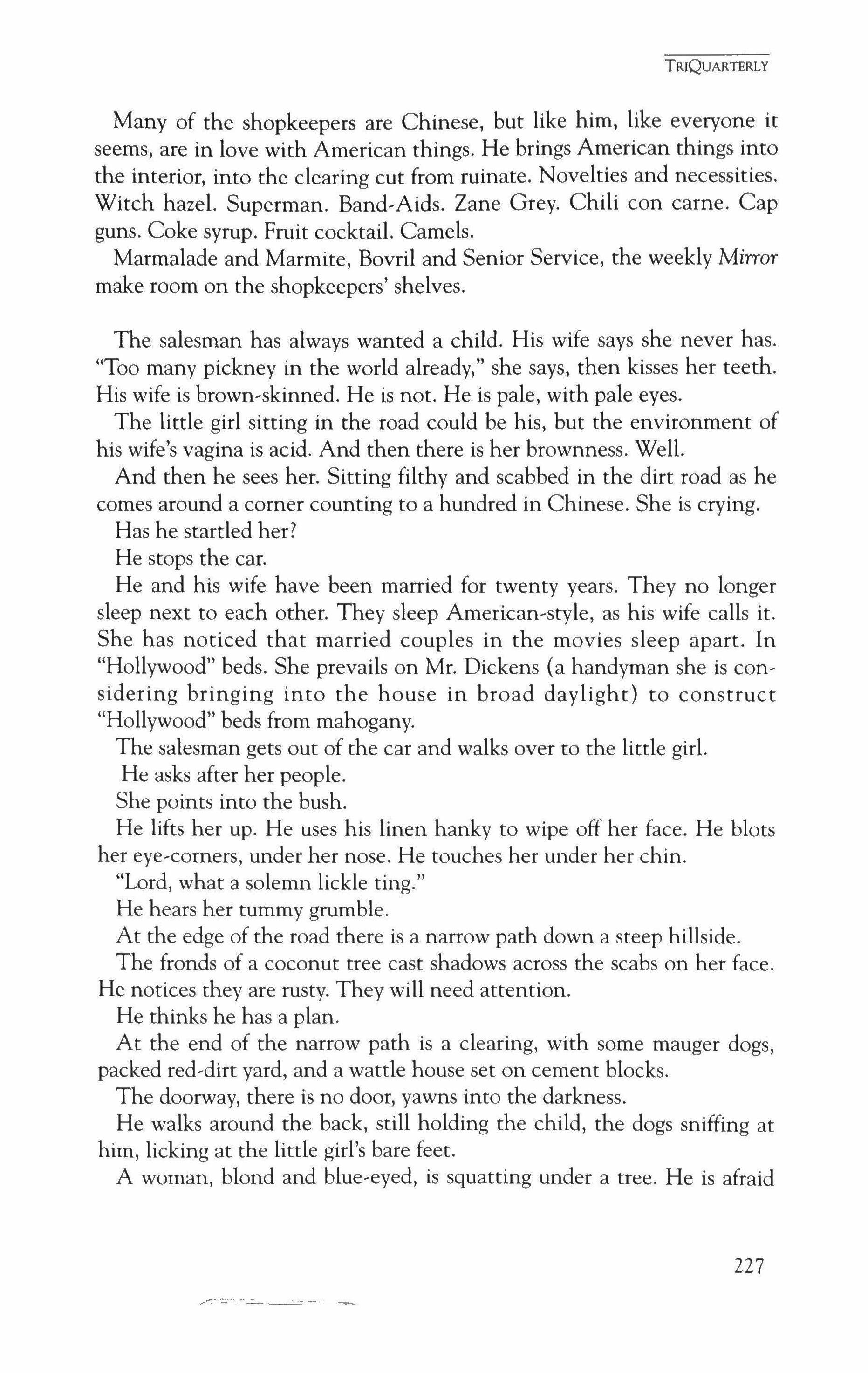
Many of the shopkeepers are Chinese, but like him, like everyone it seems, are in love with American things. He brings American things into the interior, into the clearing cut from ruinate. Novelties and necessities. Witch hazel. Superman. Band-Aids. Zane Grey. Chili con carne. Cap guns. Coke syrup. Fruit cocktail. Camels.
Marmalade and Marmite, Bovril and Senior Service, the weekly Mirror make room on the shopkeepers' shelves.
The salesman has always wanted a child. His wife says she never has. "Too many pickney in the world already," she says, then kisses her teeth. His wife is brown-skinned. He is not. He is pale, with pale eyes.
The little girl sitting in the road could be his, but the environment of his wife's vagina is acid. And then there is her brownness. Well.
And then he sees her. Sitting filthy and scabbed in the dirt road as he comes around a corner counting to a hundred in Chinese. She is crying.
Has he startled her?
He stops the car.
He and his wife have been married for twenty years. They no longer sleep next to each other. They sleep American-style, as his wife calls it. She has noticed that married couples in the movies sleep apart. In "Hollywood" beds. She prevails on Mr. Dickens (a handyman she is considering bringing into the house in broad daylight) to construct "Hollywood" beds from mahogany.
The salesman gets out of the car and walks over to the little girl.
He asks after her people.
She points into the bush.
He lifts her up. He uses his linen hanky to wipe off her face. He blots her eye-comers, under her nose. He touches her under her chin.
"Lord, what a solemn lickle ting."
He hears her tummy grumble.
At the edge of the road there is a narrow path down a steep hillside.
The fronds of a coconut tree cast shadows across the scabs on her face. He notices they are rusty. They will need attention.
He thinks he has a plan.
At the end of the narrow path is a clearing, with some mauger dogs, packed red-dirt yard, and a wattle house set on cement blocks.
The doorway, there is no door, yawns into the darkness.
He walks around the back, still holding the child, the dogs sniffing at him, licking at the little girl's bare feet.
A woman, blond and blue-eyed, is squatting under a tree. He is afraid
TRIQUARTERLY
227

to approach any closer, afraid she is engaged in some intimate activity, but soon enough she gets up, wipes her hand on her dress and walks toward him.
Yes, this is her little girl, the woman says in a strangely accented voice. And the salesman realizes he's stumbled on the descendants of a shipload of Germans, sent here as convicts or cheap labor, he can't recall which. There are to this day pockets of them in the deep bush.
He balances the little girl in one arm, she weighs next to nothing, removes his hat, inclines his balding head toward the blonder woman. She lowers her blue eyes. One eye has a cloud, the start of a cataract from too much sun.
He knows what he wants.
The woman has other children, sure, too many, she says. He offers twenty American dollars, just like that, counting out the single notes, and promises the little girl will have the best of everything, always, and that he loves children and has always wanted one of his own but he and his wife have never been so blessed.
The woman says something he does not understand. She points to a small structure at the side of the house. Under a peaked roof is a statue of the Virgin Mary, a dish of water at her feet. On her head is a coronet of lignum vitae. She is rude but painted brightly, like the Virgins at the roadside in Bavaria, carved along routes of trade and plague. Her shawl is colored indigo.
"Liebfrau," the woman repeats.
He nods.
The Virgin's shawl is flecked with yellow, against indigo, like the Milky Way against the black of space.
The salesman is not Catholic but never mind. He promises the little girl will attend the Convent of the Immaculate Conception at Constant Spring, the very best girls' school on the island. He goes on about their uniforms. Very handsome indeed. Royal blue neckties and white dresses. Panama hats with royal blue hatbands. He points to the band around his own hat by way of explanation.
The royal blue will make his daughter's eyes bright.
This woman could not be more of a wonder to him. She is a stranger in this landscape, this century, she of an indentured status, a petty theft. He wonders at her loneliness. No company but the Virgin Mother.
The woman extends her hand for the money, puts it in the side pocket of her dress. She strokes the head of her daughter, still in the salesman's arms.
TRIQUARTERLY
228

"She can talk?"
"[ah, no mus'?"
A squall comes from inside the darkness of the house, and the woman turns, her dress becoming damp.
"Well, goodbye then," the salesman says.
She turns back. She opens her dress and presses a nipple, dripping, into the mouth of her little girl. "Bye, bye," she says. And she is gone. He does not know what to think.
The little girl makes no fuss, not even a whimper, as he carries her away, and he is suddenly afraid he has purchased damaged goods. What if she's foolish? It will be difficult enough to convince his brown-skinned wife to bring a white-skinned child into the house. If she is fool-fool God help him.
Back at the car he tucks her into the front seat, takes his penknife and opens a small tin of fruit cocktail.
He points to the picture on the label, the glamorous maraschino cherry. "Wait till you taste this, darlin'. It come all the way from America." Does she have the least sense of what America is?
He wipes away the milk at the comers of her mouth.
He takes a spoon from the glove compartment.
"You can feed yourself?"
She says nothing, so he begins to spoon the fruit cocktail into her. Immediately she brightens and opens her mouth wide, tilting her head back like a little bird.
In no time she's finished the tin.
"Mustn't eat too fast, sweetheart. Don't want to get carsick."
"Nein, nein," she says with a voice that's almost a growl.
She closes her eyes against the sun flooding the car.
"Never mind," he says, "we'll be off soon." He wraps the spoon and empty fruit-cocktail tin into a sheet of the Gleaner, putting the package on the floor of the back seat.
Next time he will pour some condensed milk into the tinned fruit, making it even sweeter.
There's a big American woman who runs a restaurant outside Milk River. She caters to the tourists who come to take the famously radioactive waters. And to look at the crocodiles. She also lets rooms. She will let him a room for the night. In turn he will give her the American news she craves. She says she once worked in the movies. He doesn't know if he believes her.
TRIQUARTERLY
229
TRIQUARTERLY

He puts the car in gear and drives away from the clearing. His heart is full. Is this how women feel? he wonders, as he glances at the little girl, now fast asleep.
What has he done? She is his treasure, his newfound thing, and he never even asked her name. What will you call this child? the priest will ask. Now she is yours. He must have her baptized. Catholic or Anglican, he will decide.
He will have to bathe her. He will ask the American woman to help him. He will take a bathroom at the mineral spring and dip her into the famous waters, into the "healing stream," like the old song says.
He will baptize her himself. The activity of the spring, of world renown, will mend her skin. The scabs on her face are crusted over and there are more on her arms and legs. She might well have scurvy, even in the midst of a citrus grove.
But the waters are famous.
As he drives he alternates between making plans and imagining his homecoming and his wife's greeting. You must have taken leave of your senses, busha. She calls him busha when she's angry and wants him to stand back. No, busha. Is who tell you we have room fi pickney? He will say he had no choice. Was he to leave this little girl in the middle of a country road covered with dirt and sores and hungry? Tell me, busha, tell me jus' one ting: Is how many pickney you see this way on your travels, eh? Is why you don't bring one home sooner? Tell me that.
Everybody wants a child that favors them, that's all.
She will kiss her teeth.
If she will let him have his adoption, he will say, she can have the other side of the house for her and Mr. Dickens. It will be simple. Once he plays that card there will be no going back. They will split the house down the middle. That will be that.
Like is drawn to like. Fine to fine. Coarse to coarse.
There are great advantages to being a traveling salesman in this place. He learns the island by heart. Highland and flood plain, sinkhole and plateau. Anywhere a shopkeeper might toss up, fix some shelves inside a zinc-roofed shed, open shop.
He respects the relentlessness of shopkeepers. They will nest anywhere. You can be in the deepest bush and come upon a tin sign advertising Nescafe, and find a group of people gathered as if the shed were a town hall, which it well might be.
Everything is commerce, he cannot live without it.
230
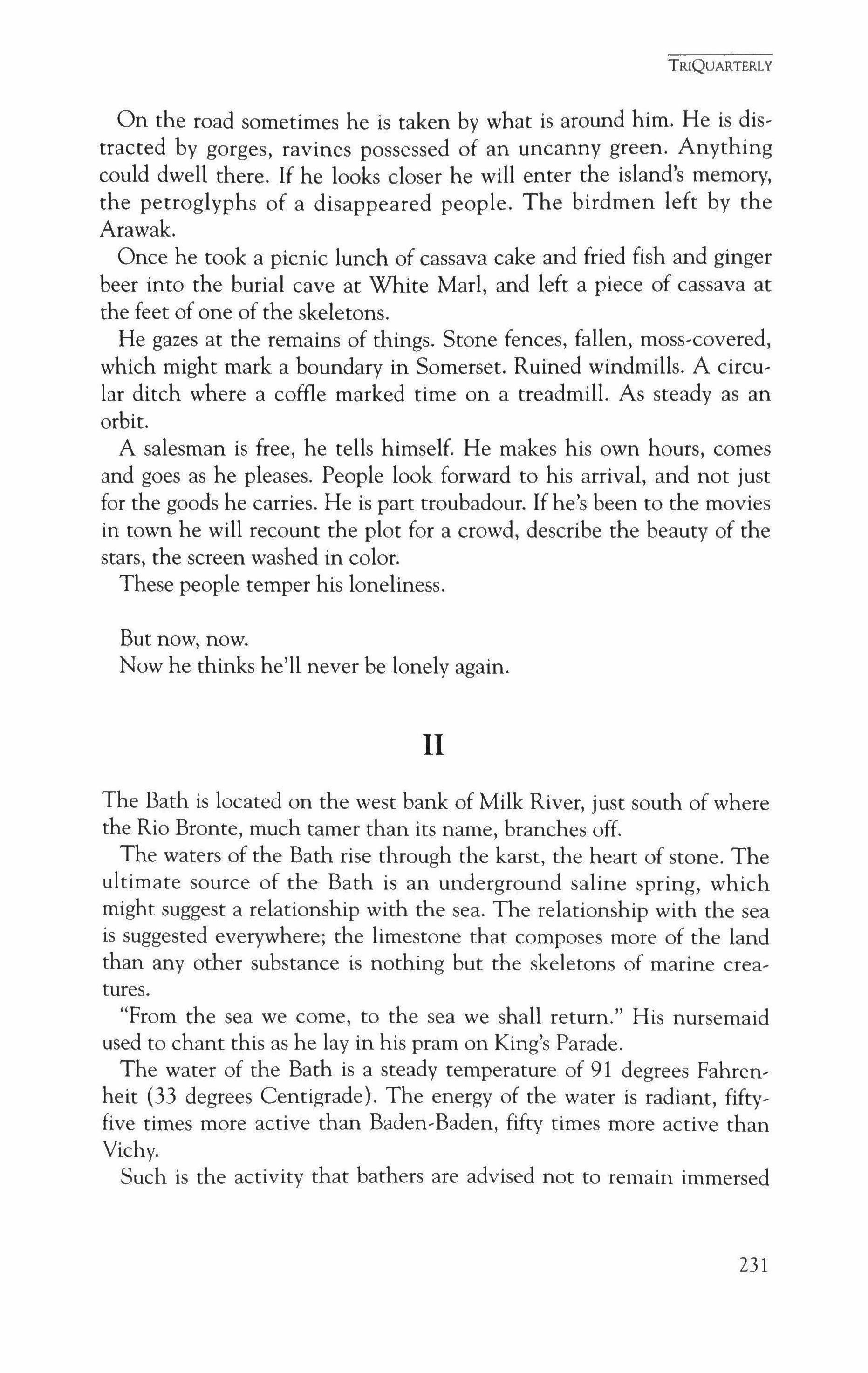
On the road sometimes he is taken by what is around him. He is distracted by gorges, ravines possessed of an uncanny green. Anything could dwell there. If he looks closer he will enter the island's memory, the petroglyphs of a disappeared people. The birdmen left by the Arawak.
Once he took a picnic lunch of cassava cake and fried fish and ginger beer into the burial cave at White Marl, and left a piece of cassava at the feet of one of the skeletons.
He gazes at the remains of things. Stone fences, fallen, moss-covered, which might mark a boundary in Somerset. Ruined windmills. A circular ditch where a coffle marked time on a treadmill. As steady as an orbit.
A salesman is free, he tells himself. He makes his own hours, comes and goes as he pleases. People look forward to his arrival, and not just for the goods he carries. He is part troubadour. If he's been to the movies in town he will recount the plot for a crowd, describe the beauty of the stars, the screen washed in color.
These people temper his loneliness.
But now, now.
Now he thinks he'll never be lonely again.
II
The Bath is located on the west bank of Milk River, just south of where the Rio Bronte, much tamer than its name, branches off.
The waters of the Bath rise through the karst, the heart of stone. The ultimate source of the Bath is an underground saline spring, which might suggest a relationship with the sea. The relationship with the sea is suggested everywhere; the limestone that composes more of the land than any other substance is nothing but the skeletons of marine creatures.
"From the sea we come, to the sea we shall return." His nursemaid used to chant this as he lay in his pram on King's Parade.
The water of the Bath is a steady temperature of 91 degrees Fahrenheit (33 degrees Centigrade). The energy of the water is radiant, fiftyfive times more active than Baden-Baden, fifty times more active than Vichy.
Such is the activity that bathers are advised not to remain immersed
TRIQUARTERLY
231

for more than fifteen minutes a day.
In the main building the bather may read testimonials to the healing faculties of the waters. These date to 1794 when the first bathrooms were opened.
Lord Salisbury was cured of lowness of spirit Hamlet, his slave, escaped depraved apprehensions May 1797, Anno Domini
Mrs. Horne was cured of the hysteria and loss of spleen December 1802, Anno Domini
The Governor's Lady regained her appetites October 1817, Anno Domini
Septimus Hart, Esq., banished his dread July 1835, Anno Domini
The Hon, Catherine Dillon was cured of a mystery February 1900, Anno Domini
The waters bore magical properties. Indeed some thought the power of the Lord was in them.
The salesman's car glides into the gravel parking lot of the Little Hut, the American woman's restaurant. She named it after a movie she made with Ava Gardner and Stewart Granger. "A movie she made" sounds grandiose; she picked up after Miss Gardner, stood in for her during long shots.
She hears the car way back in the kitchen of the restaurant, where she's supervising Hamlet VII in the preparation of dinner. Tonight, pepper-pot soup to start, followed by curried turtle, rice and peas, a Bombay mango cut in half and filled with vanilla ice cream.
The American woman, her head crowned with a thick black braid, comes out of the doorway onto the verandah which runs around the Little Hut, and walks towards the salesman's car.
"Well, well, what have we got here?" She points to the passenger seat in front. "What are you? A kidnapper or something?"
She's wearing a khaki shirt with red-and-black epaulets, the tails knotted at her midsection, and khaki shorts. The kitchen steam has made her clothes limp, and sweat stains bloom on her back and under her arms. Her feet are bare. She wears a silver bangle around one ankle.
"Gone native" is one of her favorite ways of describing herself, whether it means bare feet, a remnant of chain, or swimming in Milk River alongside the crocodiles.
TRIQUARTERLY
232

Still she depends on the salesman to bring her news of home.
"I've got your magazines, your Jets," the salesman says, ignoring her somewhat bumptious remark.
It was late afternoon by now. A quick negotiation about a room for the night and then he would take his little sleepyhead, who has not stirred, to be bathed. He has great faith in the waters from all he has heard.
He asks the American woman about a room.
"There's only one available right now," she tells him. "I've been overrun.
The room is located behind the restaurant next to the room where Hamlet VII sleeps.
The salesman, she remembers his name is Harold (he was called "Prince Hal" at school, he told her), hers is Rosalind, is not crazy about sleeping in what he considers servants' quarters, and tells her so.
"My daughter," he begins.
Rosalind interrupts him. "Look, this is all I have right now. You may as well take it."
He's silent.
"It's clean and spacious," she tells him, "lots of room for you, and for her." She nods in the direction of the little girl. She can't help but be curious, aware from his earlier visits that he said he had no children, that his wife had turned her back on him, or so he said, that he equated being a traveler for an import firm with being a pirate on the Spanish Main, right down to the ribbon on his hat and his galleon of a car.
"Footloose and fancy-free," was how he described himself to her, but Rosalind didn't buy it.
He seemed like a remnant to her. So many of them did. There was something behind the thickness of green, in the crevices of bone; she wore a sign of it on her ankle.
"Very well, then. I'll take it."
"You won't be sorry."
"I need to take her to the Bath presently. Will you come?"
"Me? Why?"
"I need a woman to help me with her."
"I thought you said she was your daughter."
"I did."
"What's wrong with her?"
"Her skin is broken."
"Well, they have attendants at the Bath to help you."
TRIQUARTERLY
233
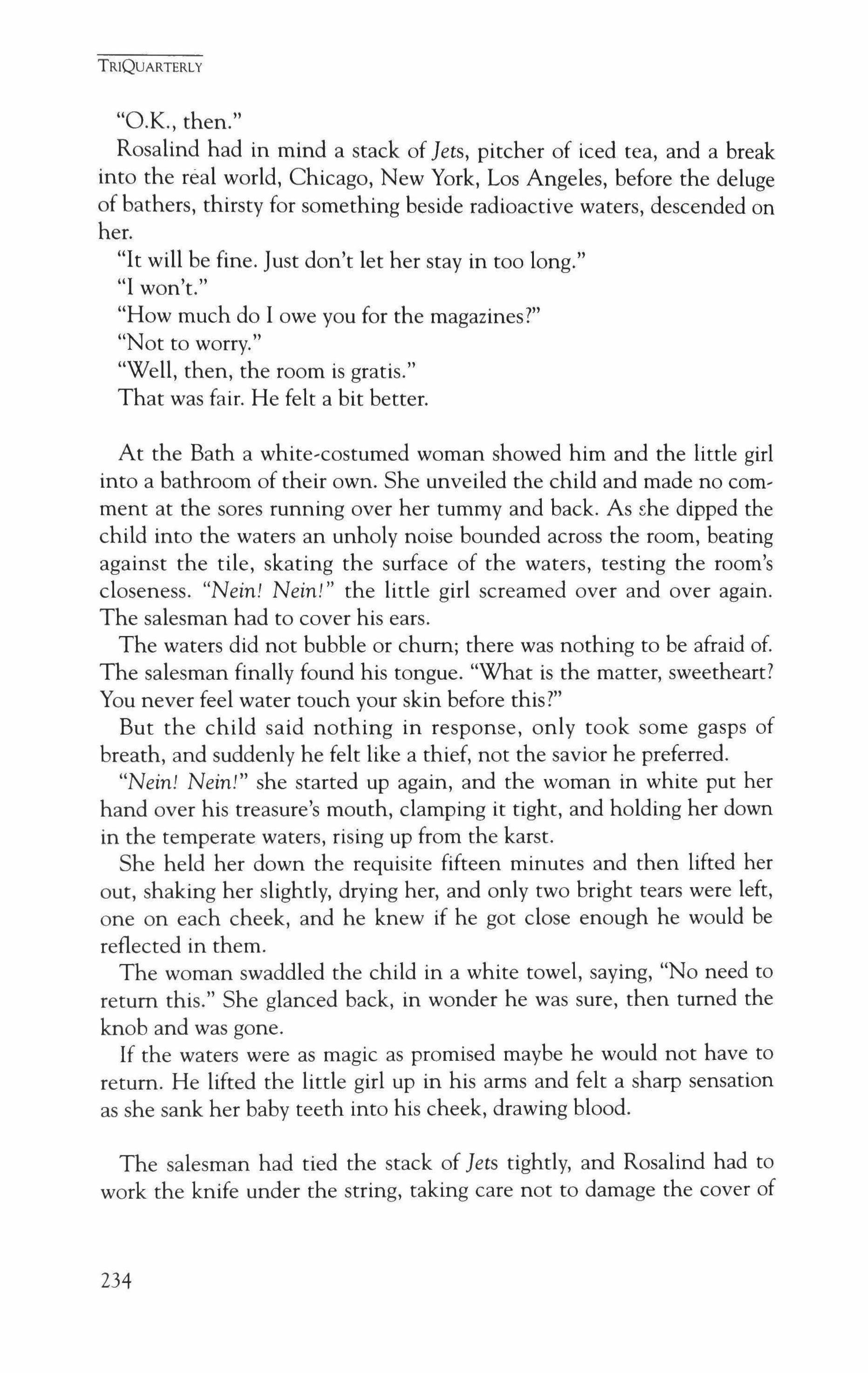
"O.K., then."
Rosalind had in mind a stack of Jets, pitcher of iced tea, and a break into the real world, Chicago, New York, Los Angeles, before the deluge of bathers, thirsty for something beside radioactive waters, descended on her.
"It will be fine. Just don't let her stay in too long." "I won't."
"How much do lowe you for the magazines?"
"Not to worry."
"Well, then, the room is gratis."
That was fair. He felt a bit better.
At the Bath a white-costumed woman showed him and the little girl into a bathroom of their own. She unveiled the child and made no com, ment at the sores running over her tummy and back. As she dipped the child into the waters an unholy noise bounded across the room, beating against the tile, skating the surface of the waters, testing the room's closeness. "Nein! Nein!" the little girl screamed over and over again. The salesman had to cover his ears.
The waters did not bubble or chum; there was nothing to be afraid of. The salesman finally found his tongue. "What is the matter, sweetheart? You never feel water touch your skin before this?"
But the child said nothing in response, only took some gasps of breath, and suddenly he felt like a thief, not the savior he preferred.
"Nein! Nein!" she started up again, and the woman in white put her hand over his treasure's mouth, clamping it tight, and holding her down in the temperate waters, rising up from the karst.
She held her down the requisite fifteen minutes and then lifted her out, shaking her slightly, drying her, and only two bright tears were left, one on each cheek, and he knew if he got close enough he would be reflected in them.
The woman swaddled the child in a white towel, saying, "No need to return this." She glanced back, in wonder he was sure, then turned the knob and was gone.
If the waters were as magic as promised maybe he would not have to return. He lifted the little girl up in his arms and felt a sharp sensation as she sank her baby teeth into his cheek, drawing blood.
The salesman had tied the stack of Jets tightly, and Rosalind had to work the knife under the string, taking care not to damage the cover of
TRIQUARTERLY
234

the magazine on top. The string gave way and the stack slid apart. The faces of Jackie Wilson, Sugar Ray Robinson, and Dorothy Dandridge glanced up at her. A banner across one cover read "Emmett Till, The Story Inside." She arranged herself on a wicker chaise on the verandah and began her return to the world she'd left behind.
She took the photographs-there were photographs-released by his mother-he was an only child-his mother was a widow-he stuttered-badly-these were some details-she took the photographs into her-into herself-and she would never let them go.
She would bum the magazine out back with the kitchen trash---drop it in a steel drum and watch the images curl and melt against turtle shell-she'd give the other magazines to Hamlet as she always did-he had a scrapbook of movie stars and prize fighters and jazz musicians. The mother had insisted on the pictures, so said let.
This is my son. Swollen by the beating-by the waters of the River Pearl-misshapen-unrecognizable-monstrous.
Hamlet heard her soft cries out in the kitchen, over the steam of turtle meat.
"Missis is all right?"
She made no answer to his question, only waved him off with one hand, the other covering the black-and-white likeness of the corpse. She did not want Hamlet to see where she came from.
America's waterways.
She left the verandah and went out back.
Blood trickled from the salesman's cheek.
"Is vampire you vampire, sweetheart?"
"What are you telling me?"
They were sitting on the verandah after dinner, the tourists having strolled to Milk River guided by Hamlet to watch the crocodiles in the moonlight.
"Are they man-eaters? Are they dangerous?" one tourist woman inquired.
"They are more afraid of you than you could possibly be of them," Hamlet told her.
The little sharp,toothed treasure was swaddled in the towel from the Bath and curled up on a chaise next to Rosalind. Tomorrow the sales, 235
TRIQUARTERLY
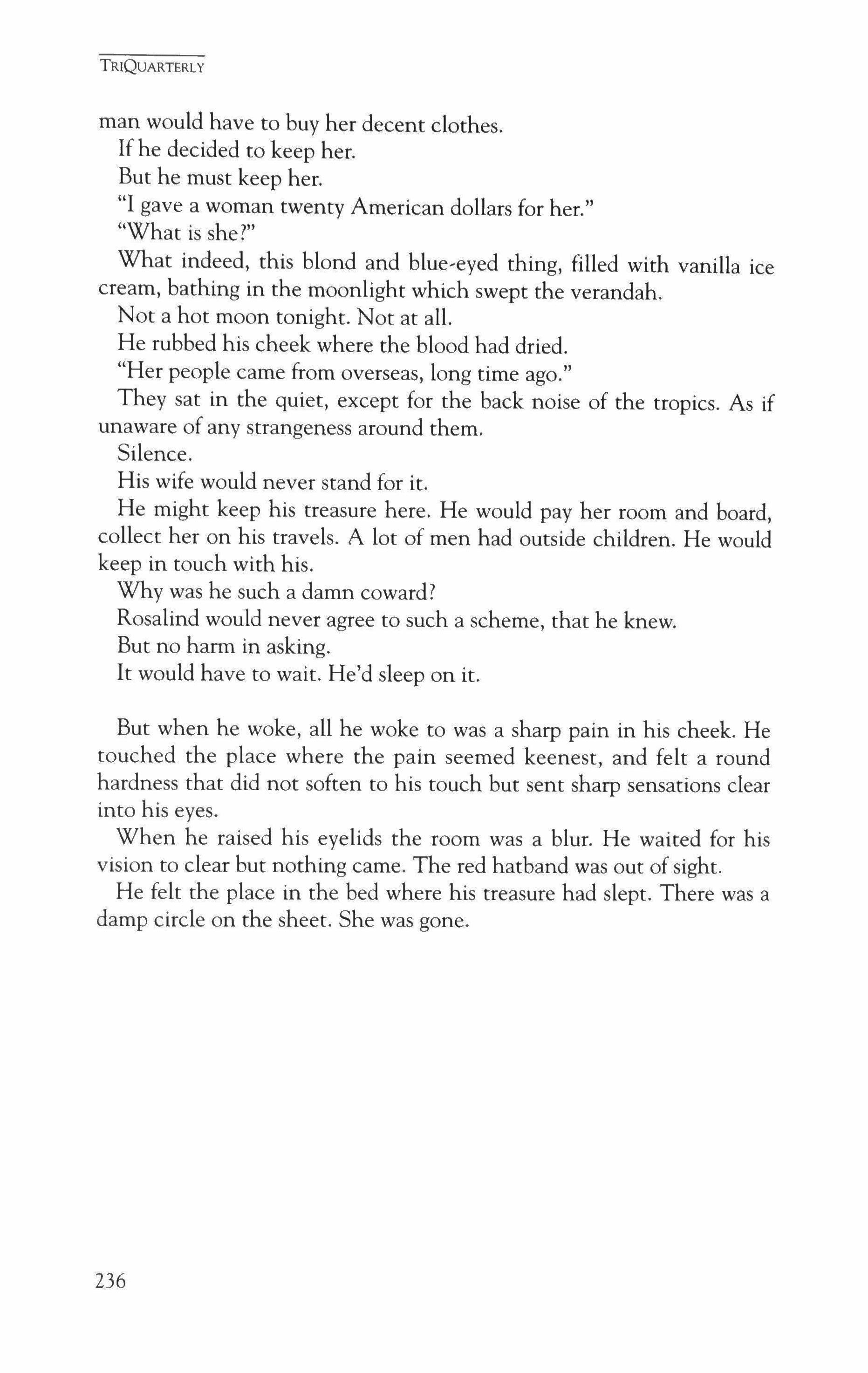
man would have to buy her decent clothes. If he decided to keep her.
But he must keep her.
"I gave a woman twenty American dollars for her."
"What is she?"
What indeed, this blond and blue-eyed thing, filled with vanilla ice cream, bathing in the moonlight which swept the verandah.
Not a hot moon tonight. Not at all.
He rubbed his cheek where the blood had dried.
"Her people came from overseas, long time ago."
They sat in the quiet, except for the back noise of the tropics. As if unaware of any strangeness around them.
Silence.
His wife would never stand for it.
He might keep his treasure here. He would pay her room and board, collect her on his travels. A lot of men had outside children. He would keep in touch with his.
Why was he such a damn coward?
Rosalind would never agree to such a scheme, that he knew.
But no harm in asking.
It would have to wait. He'd sleep on it.
But when he woke, all he woke to was a sharp pain in his cheek. He touched the place where the pain seemed keenest, and felt a round hardness that did not soften to his touch but sent sharp sensations clear into his eyes.
When he raised his eyelids the room was a blur. He waited for his vision to clear but nothing came. The red hatband was out of sight.
He felt the place in the bed where his treasure had slept. There was a damp circle on the sheet. She was gone.
ThIQUARTERLY
236
Portrait of Pancho Villa's Lieutenant, Manuel Hernandez Galvan, Shooting a Peso at Fifty Paces
Kevin McIlvoy

Lieutenant Manuel Hernandez Galvan tapped my shoulder and drew a bead on me with his head. "Red," he said. "Is this fair?"
"No," I said, pleased with myself.
Because she had asked me, I was dancing with his date, Carmelita Rubio, old as a three-finger baseball glove. And beautiful as such a glove is. This was the New Year's Fiesta at Christ Is King Church. The Feast of the Epiphany in Las Almas, New Mexico. 1944. Fifty years ago. These are facts. You must take my word.
Near us, my wife Cecilia danced with Father Velasco. People will say a priest should not dance, and should not dance good if he dances at all. Ignorant people, with no antidote for all the Virtue poisoning them, say that to dance is dangerous for a priest, and to dance good is to break the celibacy vow. Cecilia danced good with him, and they swayed, they hovered. Like branches in wind, their arms swept each other's arms. They danced too good, I admit this. But I loved Francisco Velasco, loved Cecilia, and the two kinds of love I felt were blue and red flame and part of the same fire.
My right hand was opened, and pressed against Carmelita Rubio's hunched back. She cradled my neck with one hand and rested her other bare arm upon my own. She did not look at me, did not speak. The coldness of her flesh excited me.
The fiddle made the good sound of a bad door hinge in the music. That was Liston Potter, the fiddler, who was Cecilia's uncle. When Cecilia was a child, he made kites for her and her friends, Liz Why, Margaret Loving Middleton, Agnes Perea, Libby Tolentino, and the three Sisters Ubeda.
TRIQUARTERLY
237
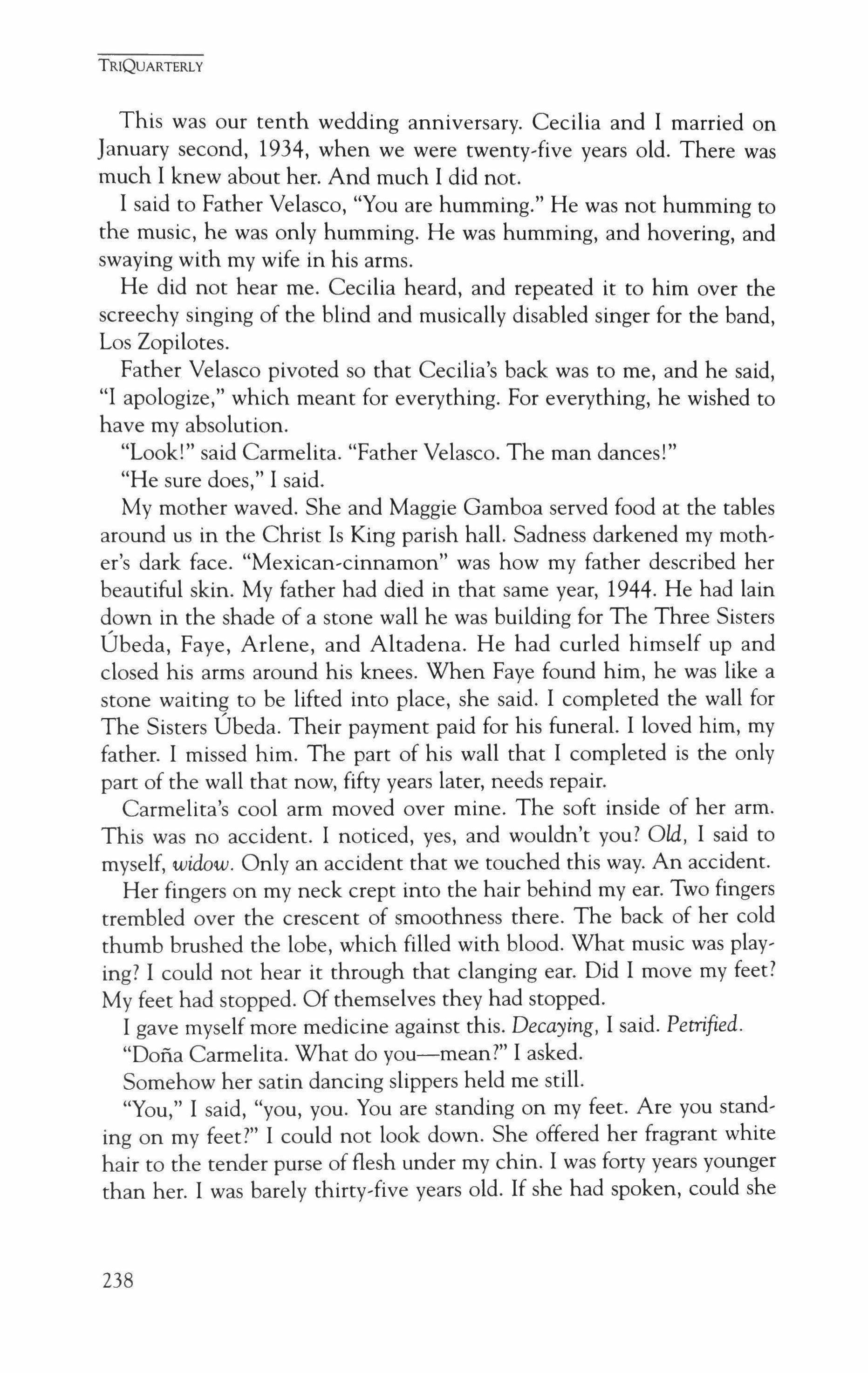
This was our tenth wedding anniversary. Cecilia and I married on January second, 1934, when we were twenty-five years old. There was much I knew about her. And much I did not.
I said to Father Velasco, "You are humming." He was not humming to the music, he was only humming. He was humming, and hovering, and swaying with my wife in his arms.
He did not hear me. Cecilia heard, and repeated it to him over the screechy singing of the blind and musically disabled singer for the band, Los Zopilotes.
Father Velasco pivoted so that Cecilia's back was to me, and he said, "I apologize," which meant for everything. For everything, he wished to have my absolution.
"Look!" said Carrnelita. "Father Velasco. The man dances!"
"He sure does," I said.
My mother waved. She and Maggie Gamboa served food at the tables around us in the Christ Is King parish hall. Sadness darkened my mother's dark face. "Mexican-cinnamon" was how my father described her beautiful skin. My father had died in that same year, 1944. He had lain down in the shade of a stone wall he was building for The Three Sisters Ubeda, Faye, Arlene, and Altadena. He had curled himself up and closed his arms around his knees. When Faye found him, he was like a stone waiting to be lifted into place, she said. I completed the wall for The Sisters Ubeda. Their payment paid for his funeral. I loved him, my father. I missed him. The part of his wall that I completed is the only part of the wall that now, fifty years later, needs repair.
Carrnelita's cool arm moved over mine. The soft inside of her arm. This was no accident. I noticed, yes, and wouldn't you? Old, I said to myself, widow. Only an accident that we touched this way. An accident. Her fingers on my neck crept into the hair behind my ear. Two fingers trembled over the crescent of smoothness there. The back of her cold thumb brushed the lobe, which filled with blood. What music was playing? I could not hear it through that clanging ear. Did I move my feet? My feet had stopped. Of themselves they had stopped. I gave myself more medicine against this. Decaying, I said. Petrified. "Dona Carmelita. What do you-mean?" I asked. Somehow her satin dancing slippers held me still.
"You," I said, "you, you. You are standing on my feet. Are you standing on my feet?" I could not look down. She offered her fragrant white hair to the tender purse of flesh under my chin. I was forty years younger than her. I was barely thirty-five years old. If she had spoken, could she
TRIQUARTERLY
238
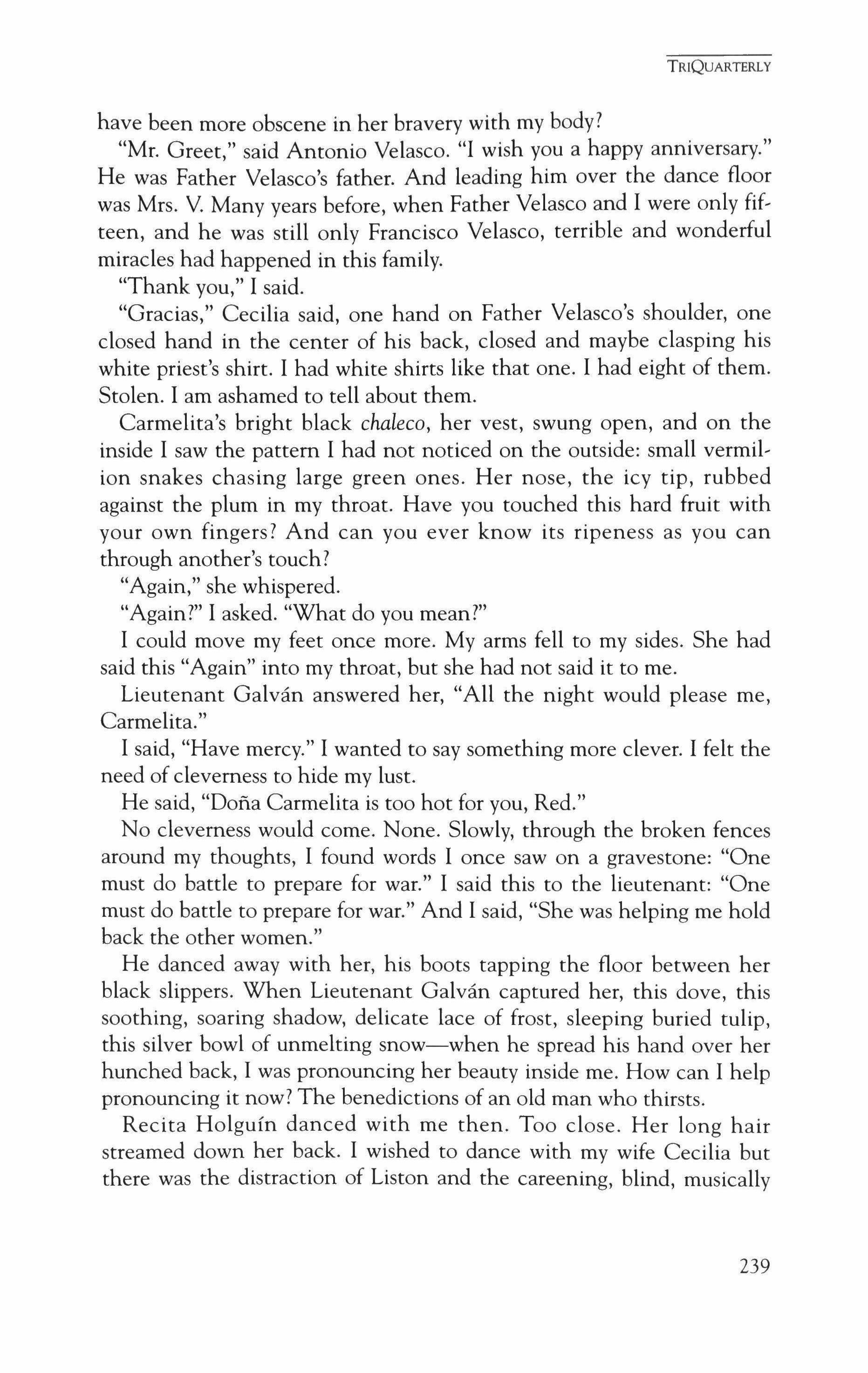
have been more obscene in her bravery with my body?
"Mr. Greet," said Antonio Velasco. "I wish you a happy anniversary." He was Father Velasco's father. And leading him over the dance floor was Mrs. V. Many years before, when Father Velasco and I were only fifteen, and he was still only Francisco Velasco, terrible and wonderful miracles had happened in this family.
"Thank you," I said.
"Gracias," Cecilia said, one hand on Father Velasco's shoulder, one closed hand in the center of his back, closed and maybe clasping his white priest's shirt. I had white shirts like that one. I had eight of them. Stolen. I am ashamed to tell about them.
Carmelita's bright black chaleca, her vest, swung open, and on the inside I saw the pattern I had not noticed on the outside: small vermilion snakes chasing large green ones. Her nose, the icy tip, rubbed against the plum in my throat. Have you touched this hard fruit with your own fingers? And can you ever know its ripeness as you can through another's touch?
"Again," she whispered.
"Again?" I asked. "What do you mean?"
I could move my feet once more. My arms fell to my sides. She had said this "Again" into my throat, but she had not said it to me.
Lieutenant Galvan answered her, "All the night would please me, Carmelita."
I said, "Have mercy." I wanted to say something more clever. I felt the need of cleverness to hide my lust.
He said, "Dona Carmelita is too hot for you, Red."
No cleverness would come. None. Slowly, through the broken fences around my thoughts, I found words I once saw on a gravestone: "One must do battle to prepare for war." I said this to the lieutenant: "One must do battle to prepare for war." And I said, "She was helping me hold back the other women."
He danced away with her, his boots tapping the floor between her black slippers. When Lieutenant Galvan captured her, this dove, this soothing, soaring shadow, delicate lace of frost, sleeping buried tulip, this silver bowl of unmelting snow-when he spread his hand over her hunched back, I was pronouncing her beauty inside me. How can I help pronouncing it now? The benedictions of an old man who thirsts.
Recita Holguin danced with me then. Too close. Her long hair streamed down her back. I wished to dance with my wife Cecilia but there was the distraction of Liston and the careening, blind, musically
TRIQUARTERLY
239
ungifted singer and Los Zopilotes, and my throat burned wonderfully, and Recita's hair was black, coppery red, and silver, and since she was our friend, if she asked me to dance I had The Obligation, did I not?

On the next morning at Dona Carmelita's ranch Father Velasco and I met with Lieutenant Galvan, and the famous photographer who was Dona Carmelita's guest.
Father Velasco had arranged the photographer's visit. He was a priest, and not a bishop yet. The photographer, who had photographed Lieutenant Galvan in Mexico twenty years before, in 1924 (a famous picture), wanted to take the same kind of photograph again. A photo, graph of Lieutenant Galvan shooting a peso at fifty paces.
The photographer would not cross the border into Mexico this time. It was wartime. The border guards annoyed him, he said. He needed Lieutenant Galvan to cross instead. Father Velasco, who said he owed the photographer a favor, hosted the reunion between the two men. Famous men. He recruited me as their guide around Las Almas. My soul knows the reason I said yes. I said yes because I loved him, Father Velasco. He had been my closest friend for thirty years. I would commit any sin in his service. This was my reason. (But I ask you: What favors does a priest owe to anyone except to God and other priests?)
So. We met Lieutenant Galvan at the ranch gate. It had an iron arch fifteen, sixteen feet high, and on the arch: "Aquf la puerta es coraz6n siempre abierta."
He said, "Go ahead."
I said, "I like the words." How is iron made into words?
A path led through Dona Carmelita's small pecan orchard. In his tan long-sleeve shirt and khaki pants, Lieutenant Galvan, over eighty years old at that time, looked like he commanded the uneven ranks of her trees.
Dona Carmelita met us at her door, fitting her hand inside the lieu, tenant's hand when she greeted him. She wore a tan blouse, a colorful jacket and skirt, a white wool stocking cap over her white hair, one snowfall upon another, one blessing blessed, and her wrinkled skin dark, est bronze. Hunched the way she was hunched she was the noblest pinon, the kind that grows from broken boulders in our mountains.
I said, "I like your words. On your gate."
"Me too," said Father Velasco.
TRIQUARTERLY
* * *
240
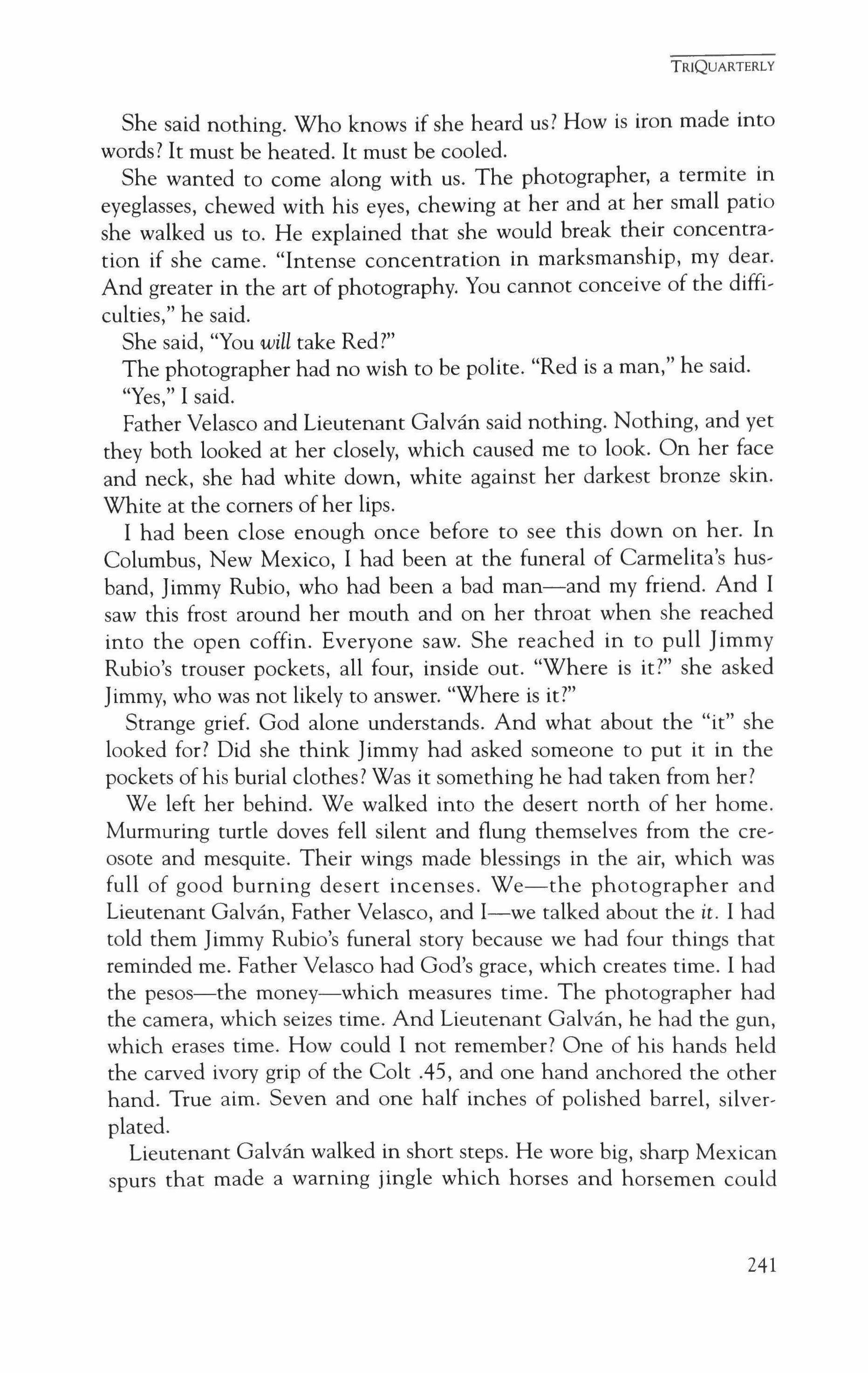
She said nothing. Who knows if she heard us? How is iron made into words? It must be heated. It must be cooled.
She wanted to come along with us. The photographer, a termite in eyeglasses, chewed with his eyes, chewing at her and at her small patio she walked us to. He explained that she would break their concentration if she came. "Intense concentration in marksmanship, my dear. And greater in the art of photography. You cannot conceive of the difficulties," he said.
She said, "You will take Red?"
The photographer had no wish to be polite. "Red is a man," he said.
"Yes," I said.
Father Velasco and Lieutenant Galvan said nothing. Nothing, and yet they both looked at her closely, which caused me to look. On her face and neck, she had white down, white against her darkest bronze skin. White at the comers of her lips.
I had been close enough once before to see this down on her. In Columbus, New Mexico, I had been at the funeral of Carmelita's husband, Jimmy Rubio, who had been a bad man-and my friend. And I saw this frost around her mouth and on her throat when she reached into the open coffin. Everyone saw. She reached in to pull Jimmy Rubio's trouser pockets, all four, inside out. "Where is it?" she asked Jimmy, who was not likely to answer. "Where is it?"
Strange grief. God alone understands. And what about the "it" she looked for? Did she think Jimmy had asked someone to put it in the pockets of his burial clothes? Was it something he had taken from her?
We left her behind. We walked into the desert north of her home. Murmuring turtle doves fell silent and flung themselves from the creosote and mesquite. Their wings made blessings in the air, which was full of good burning desert incenses. We-the photographer and Lieutenant Galvan, Father Velasco, and I-we talked about the it. I had told them Jimmy Rubio's funeral story because we had four things that reminded me. Father Velasco had God's grace, which creates time. I had the pesos-the money-which measures time. The photographer had the camera, which seizes time. And Lieutenant Galvan, he had the gun, which erases time. How could I not remember? One of his hands held the carved ivory grip of the Colt .45, and one hand anchored the other hand. True aim. Seven and one half inches of polished barrel, silverplated.
Lieutenant Galvan walked in short steps. He wore big, sharp Mexican spurs that made a warning jingle which horses and horsemen could
TRIQUARTERLY
241
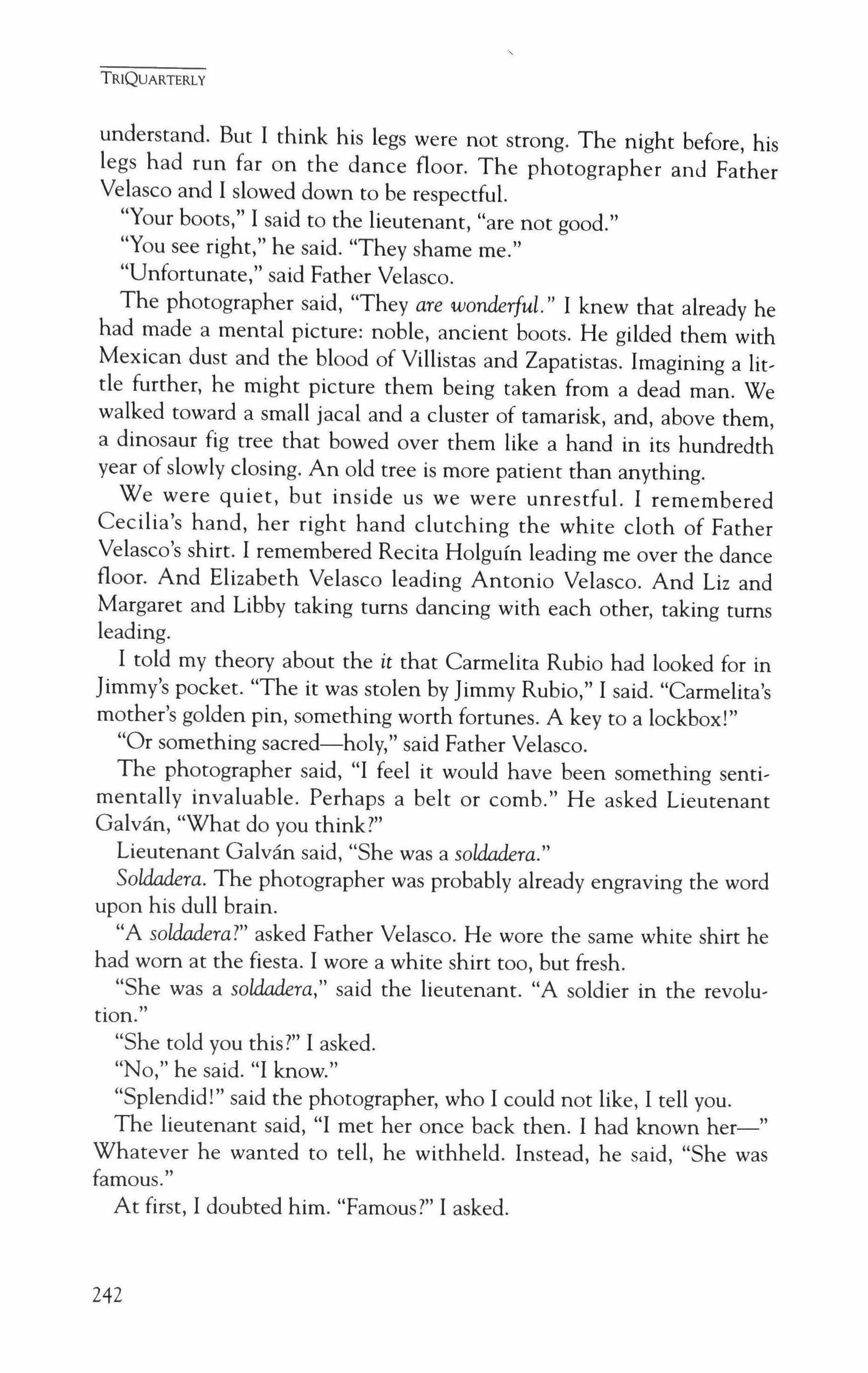
understand. But 1 think his legs were not strong. The night before, his legs had run far on the dance floor. The photographer and Father Velasco and 1 slowed down to be respectful.
"Your boots," 1 said to the lieutenant, "are not good."
"You see right," he said. "They shame me."
"Unfortunate," said Father Velasco.
The photographer said, "They are wonderful." I knew that already he had made a mental picture: noble, ancient boots. He gilded them with Mexican dust and the blood of Villistas and Zapatistas. Imagining a little further, he might picture them being taken from a dead man. We walked toward a small jacal and a cluster of tamarisk, and, above them, a dinosaur fig tree that bowed over them like a hand in its hundredth year of slowly closing. An old tree is more patient than anything.
We were quiet, but inside us we were unrestful. I remembered Cecilia's hand, her right hand clutching the white cloth of Father Velasco's shirt. I remembered Recita Holguin leading me over the dance floor. And Elizabeth Velasco leading Antonio Velasco. And Liz and Margaret and Libby taking turns dancing with each other, taking turns leading.
I told my theory about the it that Carmelita Rubio had looked for in Jimmy's pocket. "The it was stolen by Jimmy Rubio," I said. "Carmelita's mother's golden pin, something worth fortunes. A key to a lockbox!"
"Or something sacred-holy," said Father Velasco.
The photographer said, "I feel it would have been something sentimentally invaluable. Perhaps a belt or comb." He asked Lieutenant Galvan, "What do you think?"
Lieutenant Galvan said, "She was a soldadera."
Soldadera. The photographer was probably already engraving the word upon his dull brain.
"A soldadera?" asked Father Velasco. He wore the same white shirt he had worn at the fiesta. I wore a white shirt too, but fresh.
"She was a soldadera," said the lieutenant. "A soldier in the revolution."
"She told you this?" I asked.
"No," he said. "I know."
"Splendid!" said the photographer, who I could not like, I tell you. The lieutenant said, "I met her once back then. I had known her-" Whatever he wanted to tell, he withheld. Instead, he said, "She was famous."
At first, I doubted him. "Famous?" I asked.
TRIQUARTERLY
242
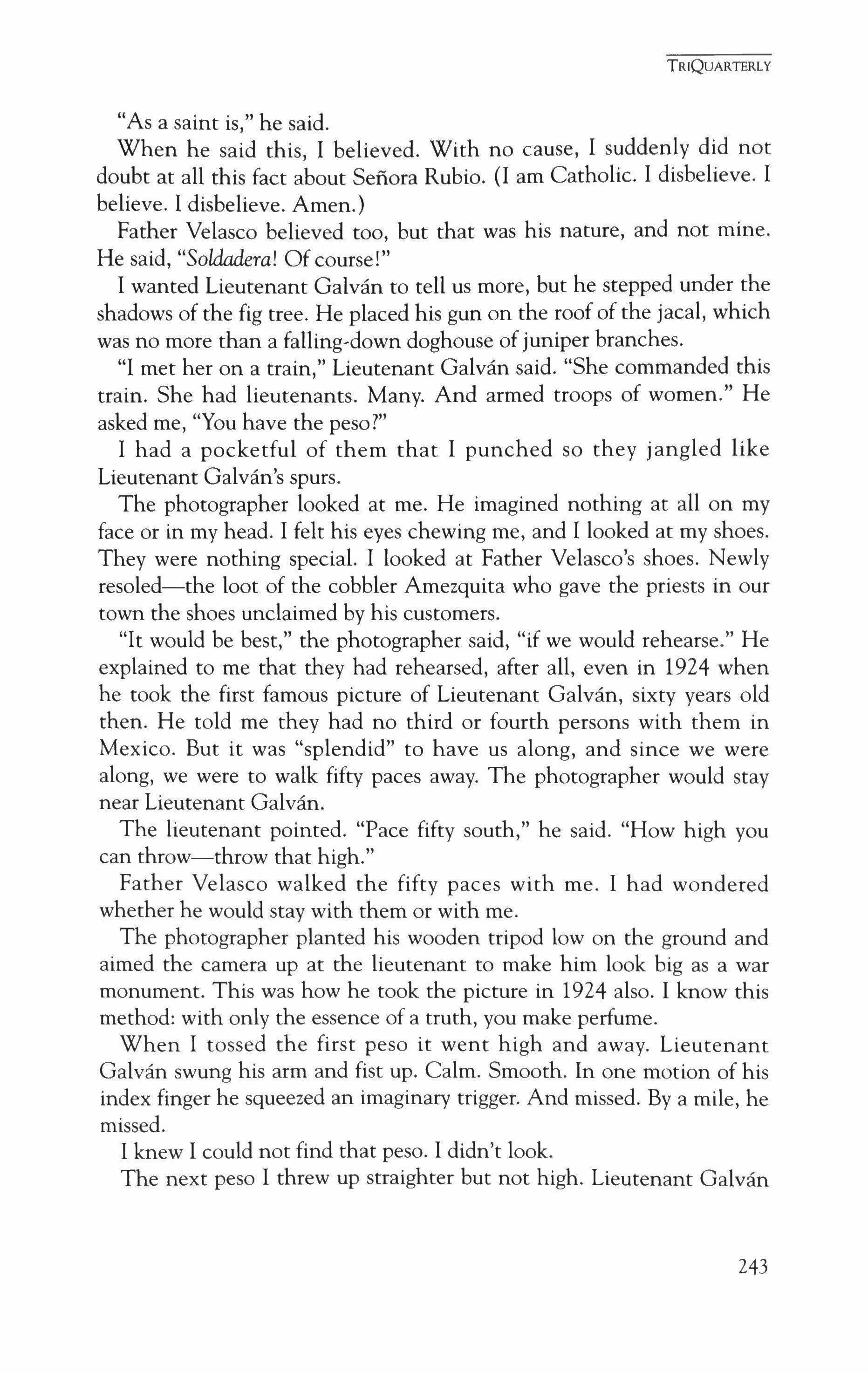
"As a saint is," he said.
When he said this, I believed. With no cause, I suddenly did not doubt at all this fact about Senora Rubio. (I am Catholic. I disbelieve. I believe. I disbelieve. Amen.)
Father Velasco believed too, but that was his nature, and not mine. He said, "Soldadera! Of course!"
I wanted Lieutenant Galvan to tell us more, but he stepped under the shadows of the fig tree. He placed his gun on the roof of the jacal, which was no more than a falling-down doghouse ofjuniper branches.
"I met her on a train," Lieutenant Galvan said. "She commanded this train. She had lieutenants. Many. And armed troops of women." He asked me, "You have the peso?"
I had a pocketful of them that I punched so they jangled like Lieutenant Galvan's spurs.
The photographer looked at me. He imagined nothing at all on my face or in my head. I felt his eyes chewing me, and I looked at my shoes. They were nothing special. I looked at Father Velasco's shoes. Newly resoled-the loot of the cobbler Amezquita who gave the priests in our town the shoes unclaimed by his customers.
"It would be best," the photographer said, "if we would rehearse." He explained to me that they had rehearsed, after all, even in 1924 when he took the first famous picture of Lieutenant Galvan, sixty years old then. He told me they had no third or fourth persons with them in Mexico. But it was "splendid" to have us along, and since we were along, we were to walk fifty paces away. The photographer would stay near Lieutenant Galvan.
The lieutenant pointed. "Pace fifty south," he said. "How high you can throw-throw that high."
Father Velasco walked the fifty paces with me. I had wondered whether he would stay with them or with me.
The photographer planted his wooden tripod low on the ground and aimed the camera up at the lieutenant to make him look big as a war monument. This was how he took the picture in 1924 also. I know this method: with only the essence of a truth, you make perfume.
When I tossed the first peso it went high and away. Lieutenant Galvan swung his arm and fist up. Calm. Smooth. In one motion of his index finger he squeezed an imaginary trigger. And missed. By a mile, he missed.
I knew I could not find that peso. I didn't look.
The next peso I threw up straighter but not high. Lieutenant Galvan 243
TRIQUARTERLY
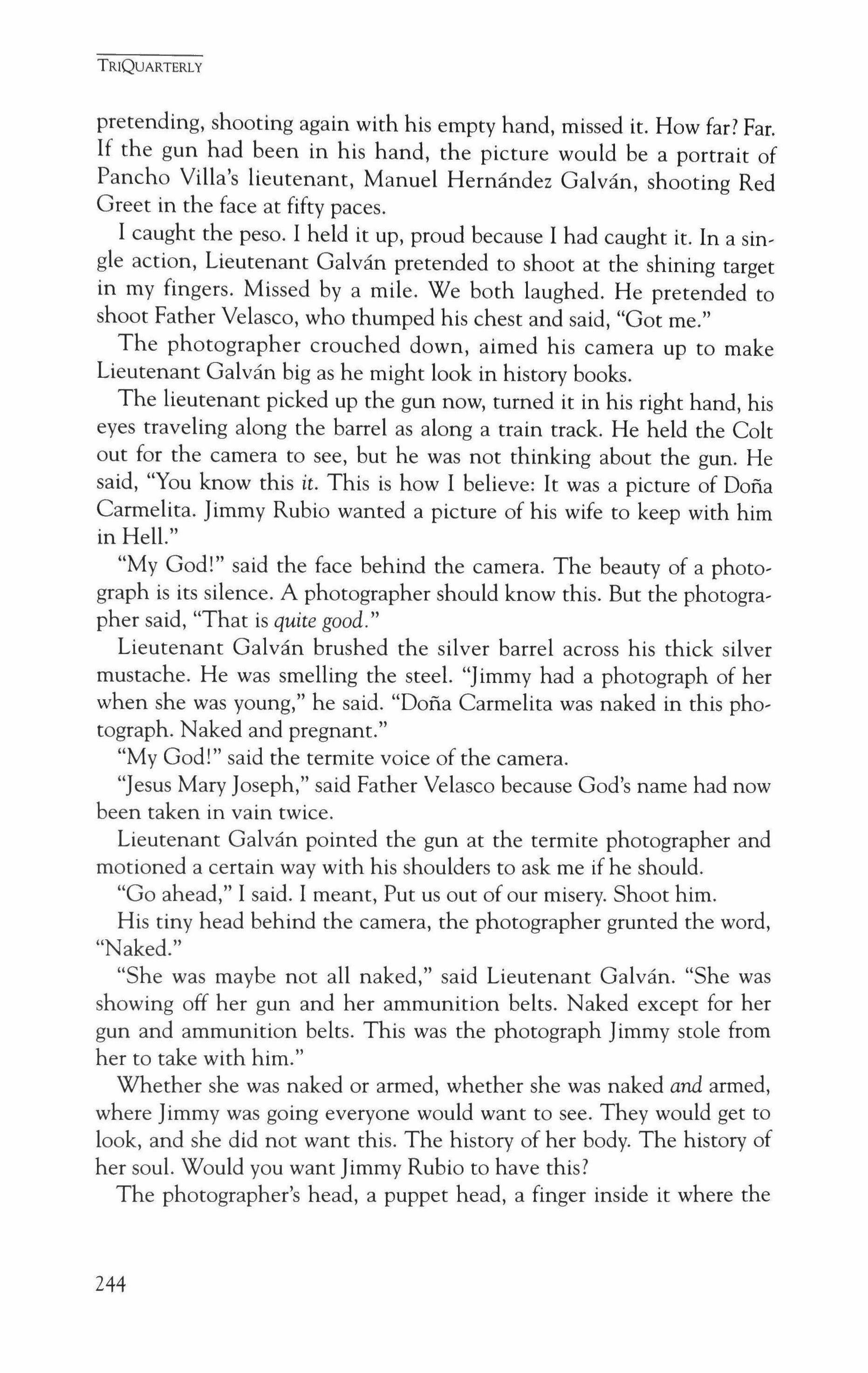
pretending, shooting again with his empty hand, missed it. How far? Far. If the gun had been in his hand, the picture would be a portrait of Pancho Villa's lieutenant, Manuel Hernandez Galvan, shooting Red Greet in the face at fifty paces.
I caught the peso. I held it up, proud because I had caught it. In a single action, Lieutenant Galvan pretended to shoot at the shining target in my fingers. Missed by a mile. We both laughed. He pretended to shoot Father Velasco, who thumped his chest and said, "Got me."
The photographer crouched down, aimed his camera up to make Lieutenant Galvan big as he might look in history books.
The lieutenant picked up the gun now, turned it in his right hand, his eyes traveling along the barrel as along a train track. He held the Colt out for the camera to see, but he was not thinking about the gun. He said, "You know this it. This is how I believe: It was a picture of Dona Carmelita. Jimmy Rubio wanted a picture of his wife to keep with him in Hell."
"My God!" said the face behind the camera. The beauty of a photograph is its silence. A photographer should know this. But the photographer said, "That is quite good."
Lieutenant Galvan brushed the silver barrel across his thick silver mustache. He was smelling the steel. "Jimmy had a photograph of her when she was young," he said. "Dona Carmelita was naked in this photograph. Naked and pregnant."
"My God!" said the termite voice of the camera.
"Jesus Mary Joseph," said Father Velasco because God's name had now been taken in vain twice.
Lieutenant Galvan pointed the gun at the termite photographer and motioned a certain way with his shoulders to ask me if he should.
"Go ahead," I said. I meant, Put us out of our misery. Shoot him.
His tiny head behind the camera, the photographer grunted the word, "Naked."
"She was maybe not all naked," said Lieutenant Galvan. "She was showing off her gun and her ammunition belts. Naked except for her gun and ammunition belts. This was the photograph Jimmy stole from her to take with him."
Whether she was naked or armed, whether she was naked and armed, where Jimmy was going everyone would want to see. They would get to look, and she did not want this. The history of her body. The history of her soul. Would you want Jimmy Rubio to have this?
The photographer's head, a puppet head, a finger inside it where the
TRIQUARTERLY
244

brain should be, popped out from behind the camera. "Everything, all the light, and this breeze, is marvelous," said the photographer. "We must go on." He motioned to us where we should stand. First, he pretended to take a picture of Lieutenant Galvan shooting the gun at nothing. This was the rehearsal. The photographer pretended he was shooting pictures. The lieutenant was shooting real bullets, reloading. "Shoot," he said to Lieutenant Galvan. "Again. Again."
The photographer made him step out of the shadows and bring the Colt near his face. He asked him to shoot the gun in the single action a Model P is made to shoot. Next, he asked the lieutenant to fan the hammer as if killing six.
Father Velasco stood right next to me through this, all of this. Recita Holguin had danced at least as close to me as Father Velasco had with Cecilia. Carmelita Rubio and I had danced with her cool arms moving over my arms.
The lieutenant's left profile was better than his right because his left eye squinted half-closed when he aimed. He shot many bullets. He obliged the photographer. Reloaded.
Afterwards, the photographer said, "There is so much smoke, isn't there." Disappointed. The cordite smelled no different from the air of the desert, no different really.
When the rehearsing was over, it was time to take the real photographs.
I have a donkey's heart. I was afraid. Father Velasco calmed me. "Fountain of Heaven. Mother of God. Ark of Peace," he said. A blessing.
Lieutenant Galvan could see I was afraid, and he said, "High as you can throw."
The photographer said, "Say 'NOW' before you toss it up there."
Father Velasco stood closer. The coin grew cold in my fingers. Colder and colder. Smaller and smaller.
"NOW!" I said.
The picture happened fast.
The photographer took one shot at the instant the lieutenant took one shot.
Missed by a mile.
We all walked to where we thought the peso fell. We walked slow, I think, to not have to look at one another. We knew the peso was unwounded, whole.
"Over here," said Lieutenant Galvan. He dropped his own peso, shiny, fresh from his shirt pocket, onto a patch of sand white as paper. He 245
TRIQUARTERLY
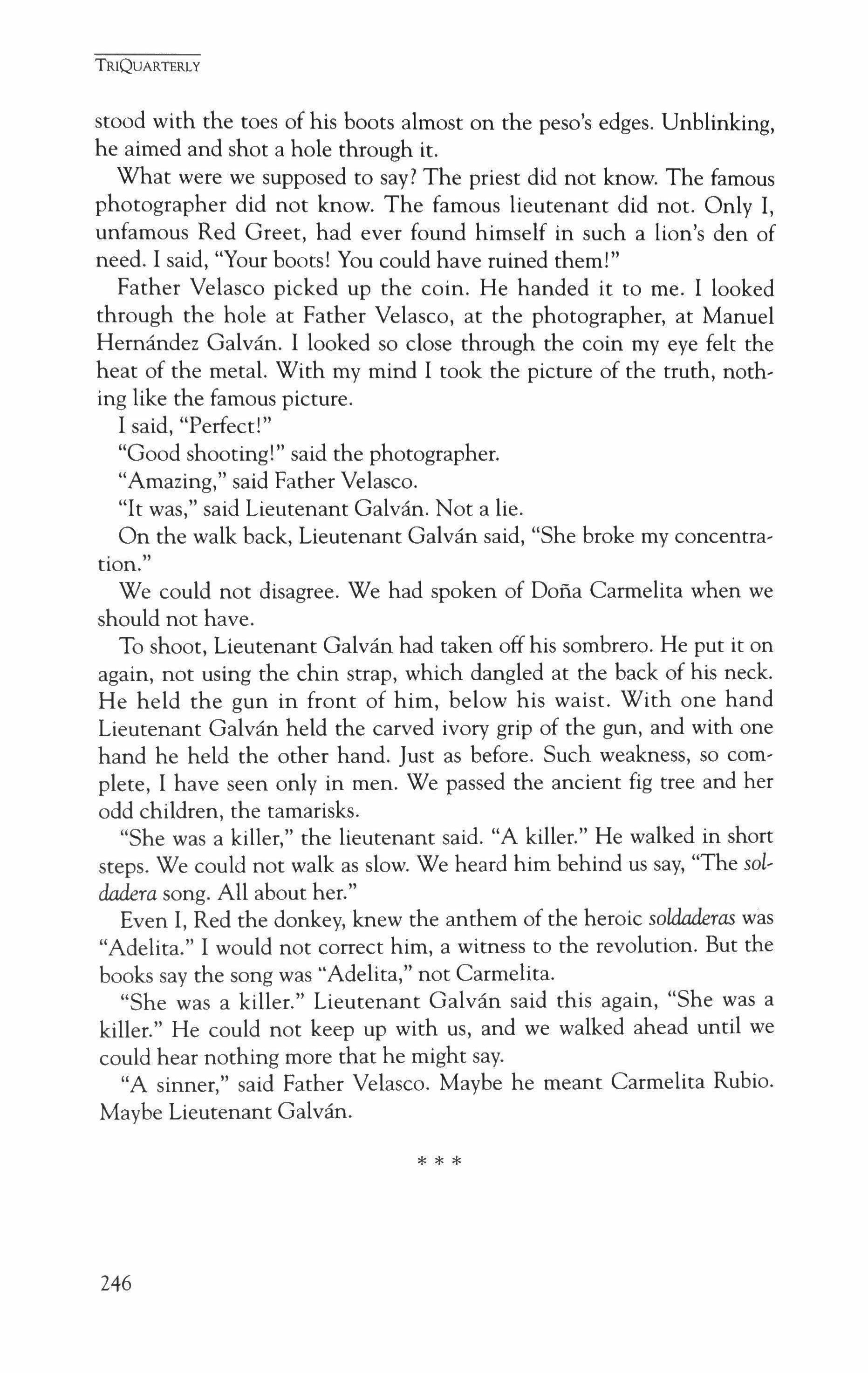
stood with the toes of his boots almost on the peso's edges. Unblinking, he aimed and shot a hole through it.
What were we supposed to say? The priest did not know. The famous photographer did not know. The famous lieutenant did not. Only I, unfamous Red Greet, had ever found himself in such a lion's den of need. I said, "Your boots! You could have ruined them!"
Father Velasco picked up the coin. He handed it to me. I looked through the hole at Father Velasco, at the photographer, at Manuel Hernandez Galvan. I looked so close through the coin my eye felt the heat of the metal. With my mind I took the picture of the truth, nothing like the famous picture.
I said, "Perfect!"
"Good shooting!" said the photographer. "Amazing," said Father Velasco.
"It was," said Lieutenant Galvan. Not a lie.
On the walk back, Lieutenant Galvan said, "She broke my concentration."
We could not disagree. We had spoken of Dona Carmelita when we should not have.
To shoot, Lieutenant Galvan had taken off his sombrero. He put it on again, not using the chin strap, which dangled at the back of his neck. He held the gun in front of him, below his waist. With one hand Lieutenant Galvan held the carved ivory grip of the gun, and with one hand he held the other hand. Just as before. Such weakness, so complete, I have seen only in men. We passed the ancient fig tree and her odd children, the tamarisks.
"She was a killer," the lieutenant said. "A killer." He walked in short steps. We could not walk as slow. We heard him behind us say, "The soldcu1era song. All about her."
Even I, Red the donkey, knew the anthem of the heroic soldaderas was "Adelita." I would not correct him, a witness to the revolution. But the books say the song was "Adelita," not Carrnelita.
"She was a killer." Lieutenant Galvan said this again, "She was a killer." He could not keep up with us, and we walked ahead until we could hear nothing more that he might say.
"A sinner," said Father Velasco. Maybe he meant Carmelita Rubio. Maybe Lieutenant Galvan.
TRIQUARTERLY
* * * 246
On her patio, she had prepared tea for us. Poured it into china cups. The saucers were handpainted with tiny blue crocuses and rose leaves and delicate thorns.
"I have made it weak," she said, "but I have sugar. And fresh lemon."
She served us warm, moist bizcochuos. Dark. Coated in powdered sugar. She had made them that afternoon. It would have been improper for her to ask us anything. She knew this and she waited.
The lieutenant took out the peso to show her. He and the photographer told the story. Slowly, they told the story, feeling their way along the path of it. In the newspapers and magazines their way was how the story was told. In the photographer's books, their words were like carved ivory. Father Velasco said nothing. I said nothing.
Before they found their way to the story's end, she rested her hands on Lieutenant Galvan's shoulders. She caressed his neck, looked down at the gun on the violet tablecloth covering the patio table.
The way they told what they told is as you see it in the famous picture, more famous now than the first picture.
Invincible old man in bright sunlight.
No smoke.
Eyes fixed on a miracle.
The photographer said, in the newspapers and the magazines, he said he tossed the coin himself. He tossed the coin, he pressed the trigger of his camera, and he shot his one picture-a shot as true as the one shot of Manuel Hernandez Galvan, Pancho Villa's lieutenant.
Red Greet was not there, you see? And Father Francisco Velasco. Not there. Erased.
And Senora Carmelita Rubio?
Never mentioned. No one mentions her. The gun, a gift from the lieutenant, she took into the grave with her, so people say. I was there the next year, in '45, at her funeral. I touched the white angel down on her nose and chin and at the corners of her cold lips. Yes, I touched it. Death gives permission. She had given the peso to her son who gave it to his son who will have sons who will want it because it is the peso, the one. It.
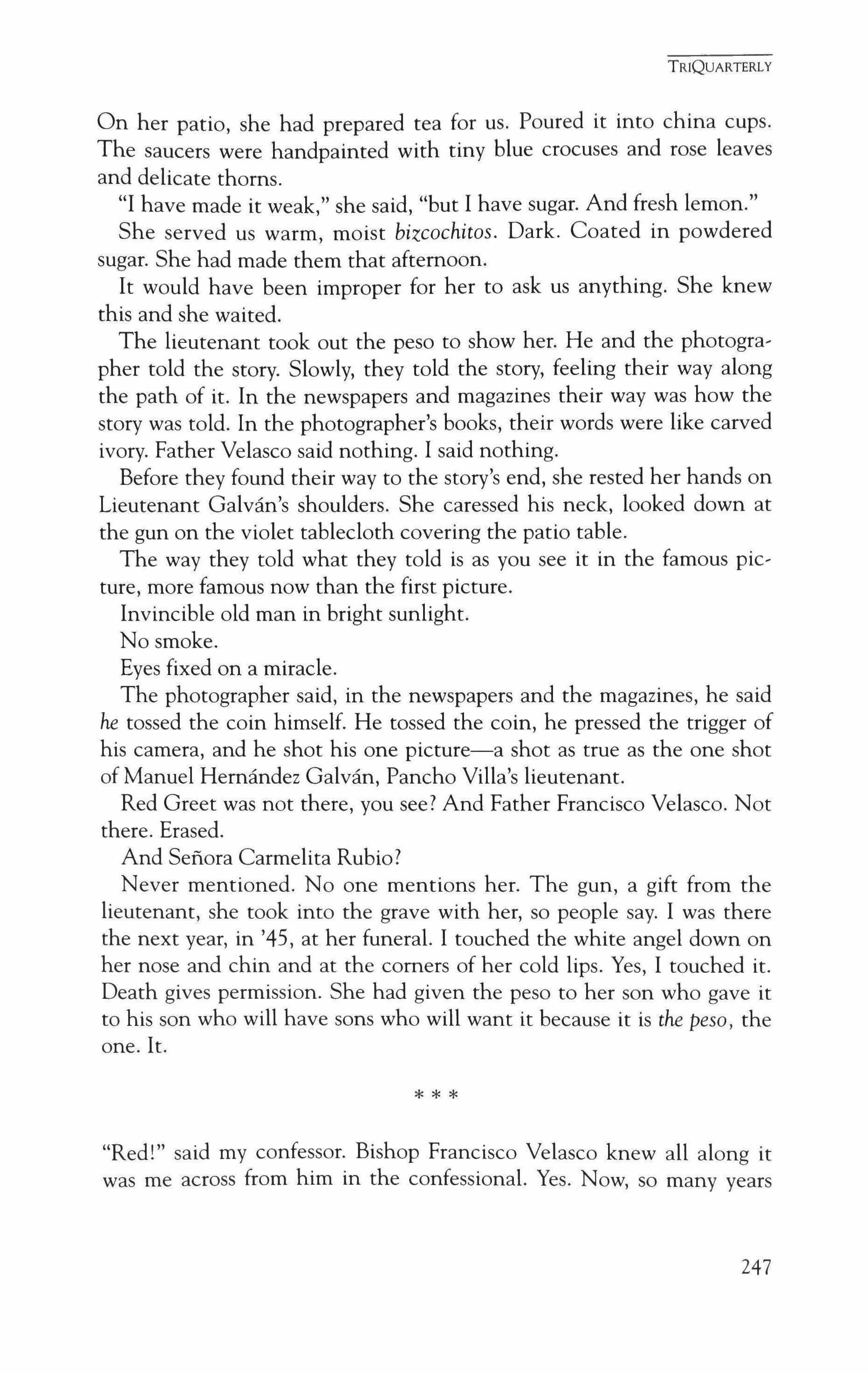
"Red!" said my confessor. Bishop Francisco Velasco knew all along it was me across from him in the confessional. Yes. Now, so many years
TRIQUARTERLY
* * *
247
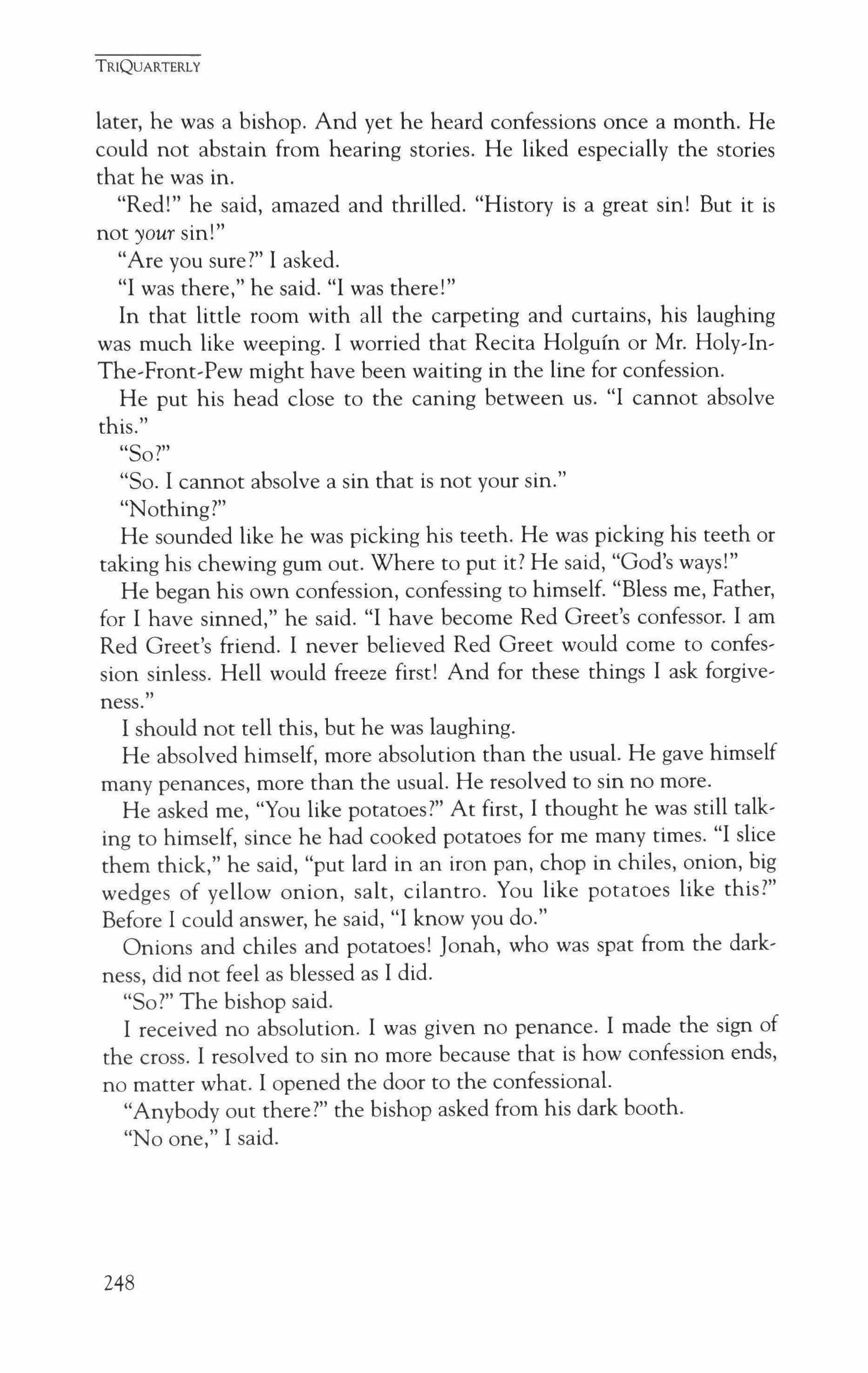
later, he was a bishop. And yet he heard confessions once a month. He could not abstain from hearing stories. He liked especially the stories that he was in.
"Red!" he said, amazed and thrilled. "History is a great sin! But it is not your sin!"
"Are you sure?" I asked.
"I was there," he said. "I was there!"
In that little room with all the carpeting and curtains, his laughing was much like weeping. I worried that Recita Holguin or Mr. Holy-InThe-front-Pew might have been waiting in the line for confession.
He put his head close to the caning between us. "I cannot absolve this."
"So?"
"So. I cannot absolve a sin that is not your sin."
"Nothing?"
He sounded like he was picking his teeth. He was picking his teeth or taking his chewing gum out. Where to put it? He said, "God's ways!"
He began his own confession, confessing to himself. "Bless me, father, for I have sinned," he said. "I have become Red Greet's confessor. I am Red Greet's friend. I never believed Red Greet would come to confession sinless. Hell would freeze first! And for these things I ask forgiveness."
I should not tell this, but he was laughing.
He absolved himself, more absolution than the usual. He gave himself many penances, more than the usual. He resolved to sin no more.
He asked me, "You like potatoes?" At first, I thought he was still talking to himself, since he had cooked potatoes for me many times. "I slice them thick," he said, "put lard in an iron pan, chop in chiles, onion, big wedges of yellow onion, salt, cilantro. You like potatoes like this?" Before I could answer, he said, "I know you do."
Onions and chiles and potatoes! Jonah, who was spat from the darkness, did not feel as blessed as I did.
"So?" The bishop said.
I received no absolution. I was given no penance. I made the sign of the cross. I resolved to sin no more because that is how confession ends, no matter what. I opened the door to the confessional.
"Anybody out there?" the bishop asked from his dark booth.
"No one," I said.
TRIQUARTERLY
248
Contributors

Helene Cixous, one of the principal French feminists, is the author of more than a dozen books of fiction and essays, as well as several plays. Her first novel, Dedans (Inside), received the Prix Medici in 1969, and was translated into English by Carol Barko (Schocken, 1986). Her recent nonfiction books in English include Coming to Writing and Other Essays (translated by Sarah Cornell; Harvard University Press, 1991), The Book of Promethea (translated by Betsy Wing; University of Nebraska Press, 1991), Three Steps on the Ladder of Writing (translated by Susan Sellers and Sarah Cornell; Columbia University Press, 1993) and The Helene Cixous Reader (edited by Susan Sellers; Routledge, 1994). Cixous has taught for many years at the University of Paris, where she founded and directs the Center of Research in Feminine Studies, the only center of its kind in France. * * * Eric Prenowitz is a translator who lives in Paris. * * * Four of Norman Manea's books have been translated into English. The most recent is a novel, The Black Envelope (Farrar, Straus & Giroux, 1995; paperback, Northwestern University Press, 1996). A recipient of Guggenheim and MacArthur awards, he is the Francis Flourney Professor in European Studies and Culture at Bard College. A story of his appeared in TQ #72 and an essay in #93. * * * Marco Cugno is an Italian journalist. * * * Patrick Camiller, a translator from various European languages, lives in London. He is the translator of Manea's The Black Envelope. * * * Tracy Kidder is the author of The Soul of a New Machine (Atlantic-Little Brown, 1981), and of House (1985), Among Schoolchildren (1989) and Old Friends (1993), which were published by Houghton-Mifflin. He has received many awards, including the Pulitzer Prize, the American Book Award, two
TRIQUARTERLY
249
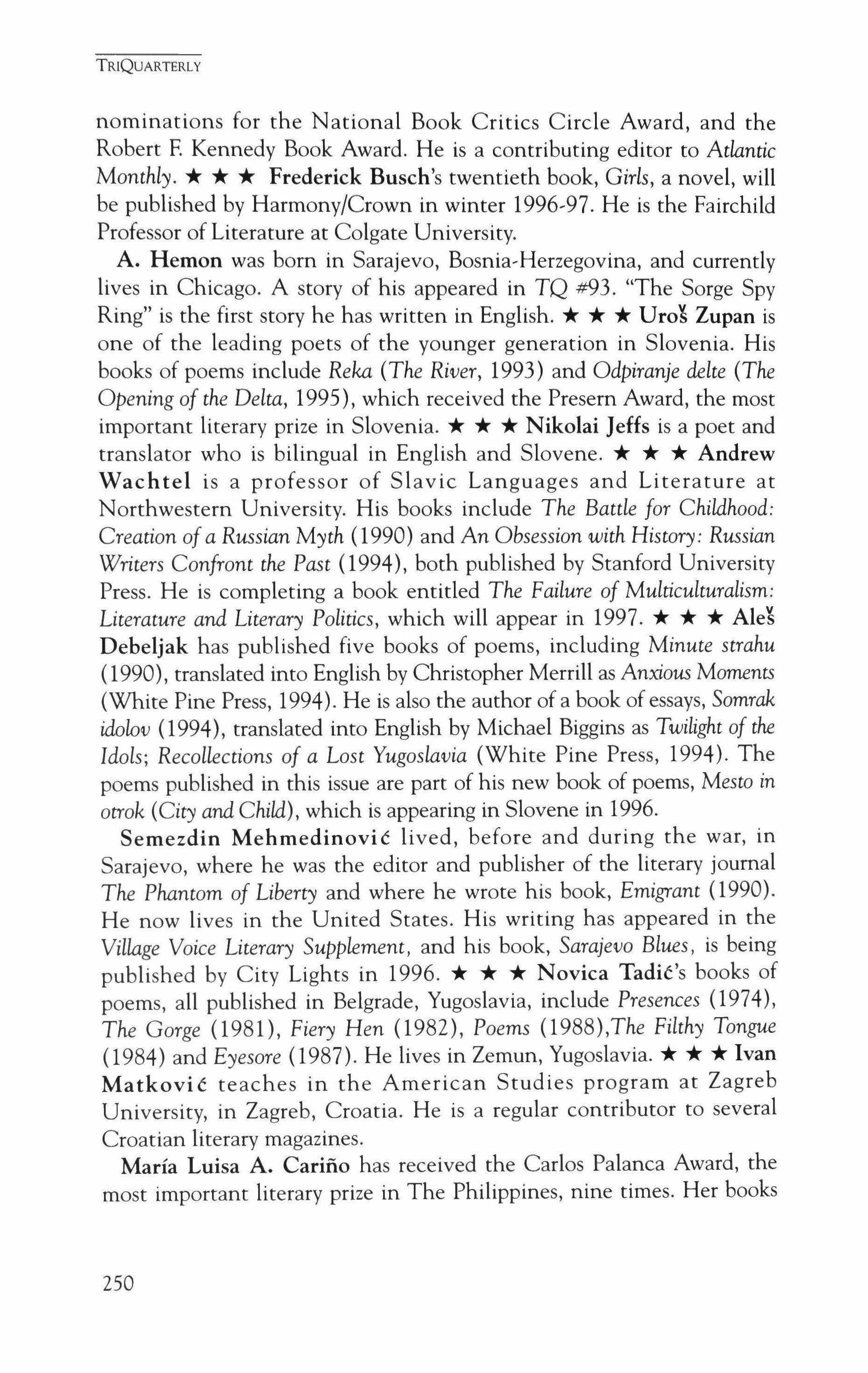
nominations for the National Book Critics Circle Award, and the Robert F. Kennedy Book Award. He is a contributing editor to Atlantic Monthly. * * * Frederick Busch's twentieth book, Girls, a novel, will be published by Harmony/Crown in winter 1996�97. He is the Fairchild Professor of Literature at Colgate University.
A. Hernon was born in Sarajevo, Bosnia-Herzegovina, and currently lives in Chicago. A story of his appeared in TQ #93. "The Sorge Spy Ring" is the first story he has written in English. * * * Uro� Zupan is one of the leading poets of the younger generation in Slovenia. His books of poems include Reka (The River, 1993) and Odpiranje delte (The Opening of the Delta, 1995), which received the Presern Award, the most important literary prize in Slovenia. * * * Nikolai Jeffs is a poet and translator who is bilingual in English and Slovene. * * * Andrew Wachtel is a professor of Slavic Languages and Literature at Northwestern University. His books include The Battle for Childhood: Creation of a Russian Myth (1990) and An Obsession with History: Russian Writers Confront the Past (1994), both published by Stanford University Press. He is completing a book entitled The Failure of Multiculturalism: Literature and Literary Politics, which will appear in 1997. * * * Ale� Debeljak has published five books of poems, including Minute strahu ( 1990), translated into English by Christopher Merrill as Anxious Moments (White Pine Press, 1994). He is also the author of a book of essays, Samrak idolov (1994), translated into English by Michael Biggins as Twilight of the Idols; Recollections of a Lost Yugoslavia (White Pine Press, 1994). The poems published in this issue are part of his new book of poems, Mesto in otrok (City and Child), which is appearing in Slovene in 1996.
Semezdin Mehrnedinovi c lived, before and during the war, in Sarajevo, where he was the editor and publisher of the literary journal The Phantom of Liberty and where he wrote his book, Emigrant (1990). He now lives in the United States. His writing has appeared in the Village Voice Literary Supplement, and his book, Sarajevo Blues, is being published by City Lights in 1996. * * * Novica Tadic's books of poems, all published in Belgrade, Yugoslavia, include Presences (1974), The Gorge (1981), Fiery Hen (1982), Poems (1988),The Filthy Tongue (1984) and Eyesore (1987). He lives in Zemun, Yugoslavia. * * * Ivan Matkovi c teaches in the American Studies program at Zagreb University, in Zagreb, Croatia. He is a regular contributor to several Croatian literary magazines.
Maria Luisa A. Carino has received the Carlos Palanca Award, the most important literary prize in The Philippines, nine times. Her books
TRIQUARTERLY
250
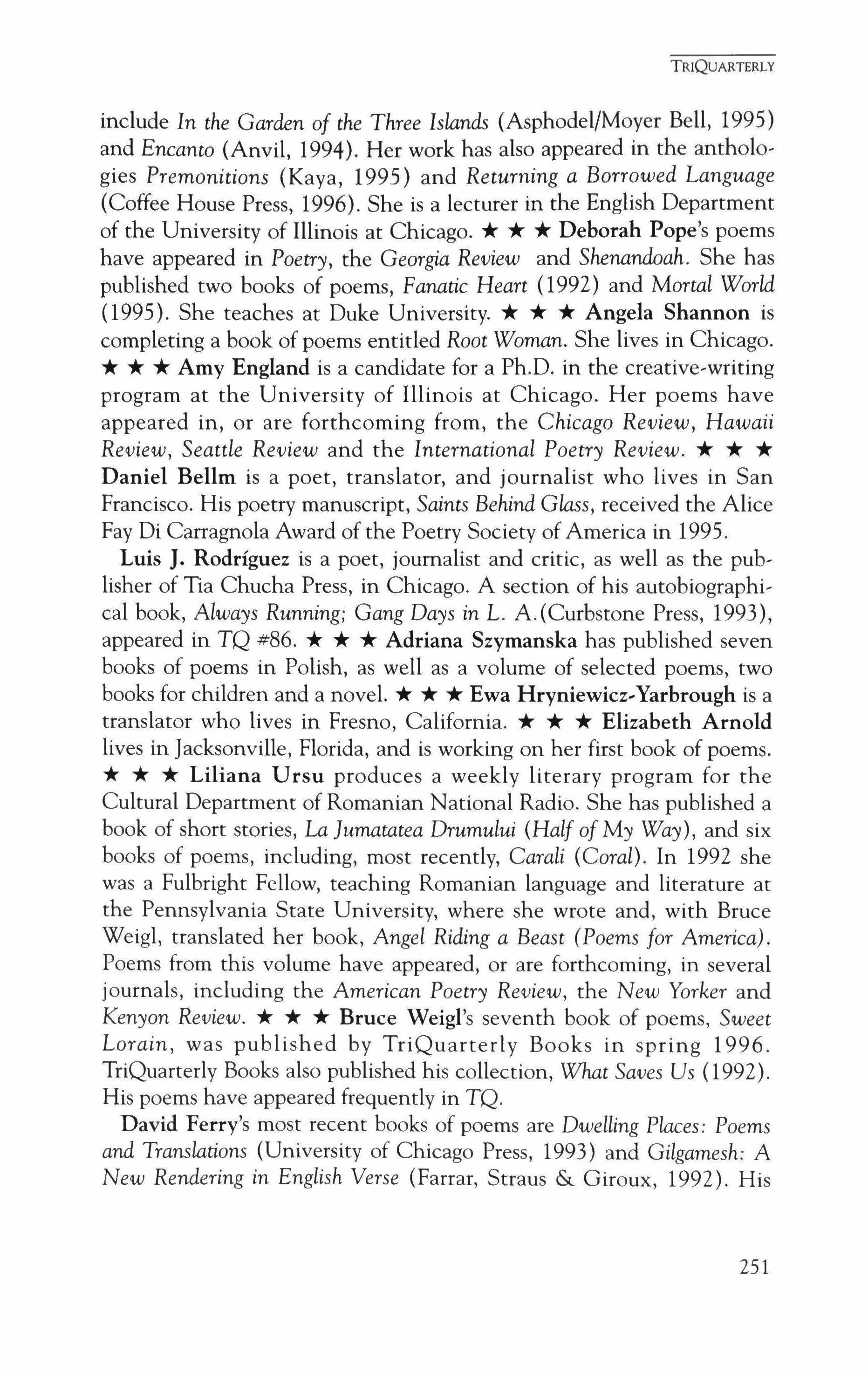
include In the Garden of the Three Islands (Asphodel/Moyer Bell, 1995) and Encanto (Anvil, 1994). Her work has also appeared in the anthologies Premonitions (Kaya, 1995) and Returning a Borrowed Language (Coffee House Press, 1996). She is a lecturer in the English Department of the University of Illinois at Chicago. * * * Deborah Pope's poems have appeared in Poetry, the Georgia Review and Shenandoah. She has published two books of poems, Fanatic Heart (1992) and Mortal World (1995). She teaches at Duke University. * * * Angela Shannon is completing a book of poems entitled Root Woman. She lives in Chicago.
* * * Amy England is a candidate for a Ph.D. in the creative-writing program at the University of Illinois at Chicago. Her poems have appeared in, or are forthcoming from, the Chicago Review, Hawaii Review, Seattle Review and the International Poetry Review. * * *
Daniel Bellm is a poet, translator, and journalist who lives in San Francisco. His poetry manuscript, Saints Behind Glass, received the Alice Fay Di Carragnola Award of the Poetry Society of America in 1995.
Luis J. Rodriguez is a poet, journalist and critic, as well as the publisher of Tia Chucha Press, in Chicago. A section of his autobiographical book, Always Running; Gang Days in L. A.(Curbstone Press, 1993), appeared in TQ #86. * * * Adriana Szymanska has published seven books of poems in Polish, as well as a volume of selected poems, two books for children and a novel. * * * Ewa Hryniewicz-Yarbrough is a translator who lives in Fresno, California. * * * Elizabeth Arnold lives in Jacksonville, Florida, and is working on her first book of poems.
* * * Liliana Ursu produces a weekly literary program for the Cultural Department of Romanian National Radio. She has published a book of short stories, La }umatatea Drumului (Half of My Way), and six books of poems, including, most recently, Carali (Coral). In 1992 she was a Fulbright Fellow, teaching Romanian language and literature at the Pennsylvania State University, where she wrote and, with Bruce Weigl, translated her book, Angel Riding a Beast (Poems for America). Poems from this volume have appeared, or are forthcoming, in several journals, including the American Poetry Review, the New Yorker and Kenyon Review. * * * Bruce Weigl's seventh book of poems, Sweet Lorain, was published by TriQuarterly Books in spring 1996. TriQuarterly Books also published his collection, What Saves Us (1992). His poems have appeared frequently in TQ.
David Ferry's most recent books of poems are Dwelling Places: Poems and Translations (University of Chicago Press, 1993) and Gilgamesh: A New Rendering in English Verse (Farrar, Straus & Giroux, 1992). His 251
TRIQUARTERLY
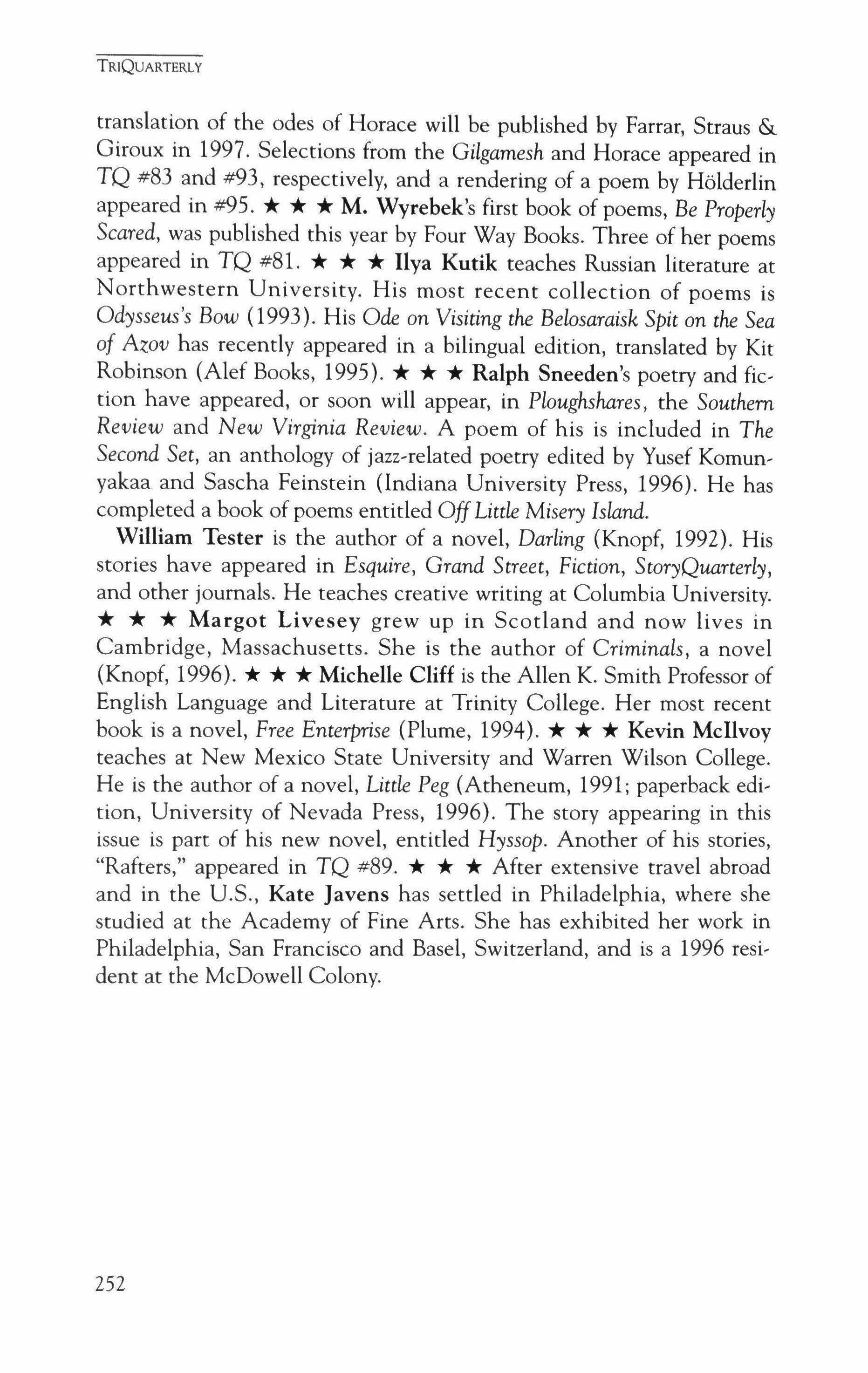
translation of the odes of Horace will be published by Farrar, Straus & Giroux in 1997. Selections from the Gilgamesh and Horace appeared in TQ #83 and #93, respectively, and a rendering of a poem by Holderlin appeared in #95. * * * M. Wvrebek's first book of poems, Be Properly Scared, was published this year by Four Way Books. Three of her poems appeared in TQ #81. * * * Ilya Kutik teaches Russian literature at Northwestern University. His most recent collection of poems is Odysseus's Bow (1993). His Ode on Visiting the Belosaraisk Spit on the Sea of Azov has recently appeared in a bilingual edition, translated by Kit Robinson (Alef Books, 1995). * * * Ralph Sneeden's poetry and fiction have appeared, or soon will appear, in Ploughshares, the Southern Review and New Virginia Review. A poem of his is included in The Second Set, an anthology of jazz-related poetry edited by Yusef Komunyakaa and Sascha Feinstein (Indiana University Press, 1996). He has completed a book of poems entitled OffLittle Misery Island. William Tester is the author of a novel, Darling (Knopf, 1992). His stories have appeared in Esquire, Grand Street, Fiction, StoryQuarterly and other journals. He teaches creative writing at Columbia University. * * * Margot Livesey grew up in Scotland and now lives in Cambridge, Massachusetts. She is the author of Criminals, a novel (Knopf, 1996). * * * Michelle Cliff is the Allen K. Smith Professor of English Language and Literature at Trinity College. Her most recent book is a novel, Free Enterprise (Plume, 1994). * * * Kevin McIlvoy teaches at New Mexico State University and Warren Wilson College. He is the author of a novel, Little Peg (Atheneum, 1991; paperback edition, University of Nevada Press, 1996). The story appearing in this issue is part of his new novel, entitled Hyssop. Another of his stories, "Rafters," appeared in TQ #89. * * * After extensive travel abroad and in the U.S., Kate Javens has settled in Philadelphia, where she studied at the Academy of Fine Arts. She has exhibited her work in Philadelphia, San Francisco and Basel, Switzerland, and is a 1996 resident at the McDowell Colony.
TRIQUARTERLY
252
The Prose Poem
AN INTERNATIONAL JOURNAL

A hand was resting on the table in front of me in a sleepy fist. Suddenly it flipped on its back and opened its fingers as if asking to have its palm read.
But as I looked into its lines it suddenly flew up and slapped me in my face.
I began to cry
Then this same hand, I forget which, began to wipe my tears
A magazine exlusively devoted to "that which is neither poetry nor prose, but both,"THE PROSE POEM offers a lively annual forum for new work by contemporary writers from home and abroad, reviews of recent books ofexceptional interest and significance, and occasional theoretical commentaries on the form. Some recent contributors include:
JackAnderson
Robert Bly
Russell Edson
David Ignatow
Sybil James
Naomi Shihab Nye
Yannis Ritsos
Charles Simic
All correspondence and subscriptions should be directed to Peter Johnson, The Prose Poem:An lnternationalJournal, English Department, Providence College, Providence, RI 02918. Manuscripts will be considered only between January I and April I of each year. Unsolicited work submitted before January I will be returned. While we welcome submissions, we ask that you please include SASE and a two sentence biographical note and that you limit your submission to no more than five poems.
To subscribe or order a copy, please use the form below and send to: The Prose Poem: An lntemational Journal, English Department, Providence College, Providence, RI 02918. Make checks payable to Providence College.
o Please send me copy/copies of The Prose Poem: An International Journal, Volume 5, at $8.00 each.
o Please enter my subscription for two years at $12.00 and begin it with Volume 5.
Name:
Address:
MICHIGAN QUARTERLY REVIEW
PRESENTS A SPECIAL ISSUE
FALL 19961 WINTER 1997
THE POET'S VOICE
EDITED BY LAURENCE GOLDSTEIN
ESSAYS: Louise GlOck, "The Fear of Happiness" (Hopwood Lecture, 1996). Charles Bernstein. Sandra M. Gilbert. John Hollander. Maxine Kumin • Ursula K. Le Guin • Carol Muske. Lucia Perillo. Charles Simic Timothy Steele. Anne Stevenson. Eleanor Wilner (with Nell Altizer and Jean Toyama)
FICTION: Marilyn Chin. Jim Daniels. Tess Gallagher. Donald Hall • Joyce Carol Oates. Gary Soto James Tate
POETRY: Diane Ackerman. Dannie Abse S. Ben-Tov Nicholas Christopher. Peter Davison. George Garrett. Loma Goodison Eamon Grennan. Brigit Pegeen Kelly. Carolyn Kizer. Yusef Komunyakaa • Mekeel McBride. Thylias Moss. Sharon Olds • Mary Oliver. Grace Schulman. Cathy Song. Diane Wakoski C.K. Williams. Alan Williamson. Ray A. Young Bear. Yevgeny Yevtushenko
REVIEWS: Bruce Bond. Lynn Emanuel. Laurence Goldstein. Mark Halliday. Brian Henry
Plus, an interview with Mary Crow, a portfolio of photographs and much more.

For the two volumes of this special issue send a check for $14 (includes postage and handling) to: Michigan Quarterly Review, 3032 Rackham Building, University of Michigan, Ann Arbor, MI 48109-1070
Two New Novels from Llmltzd editiong; pr�g;g;
Introducing Resonant New Voices In Contemporary Fiction
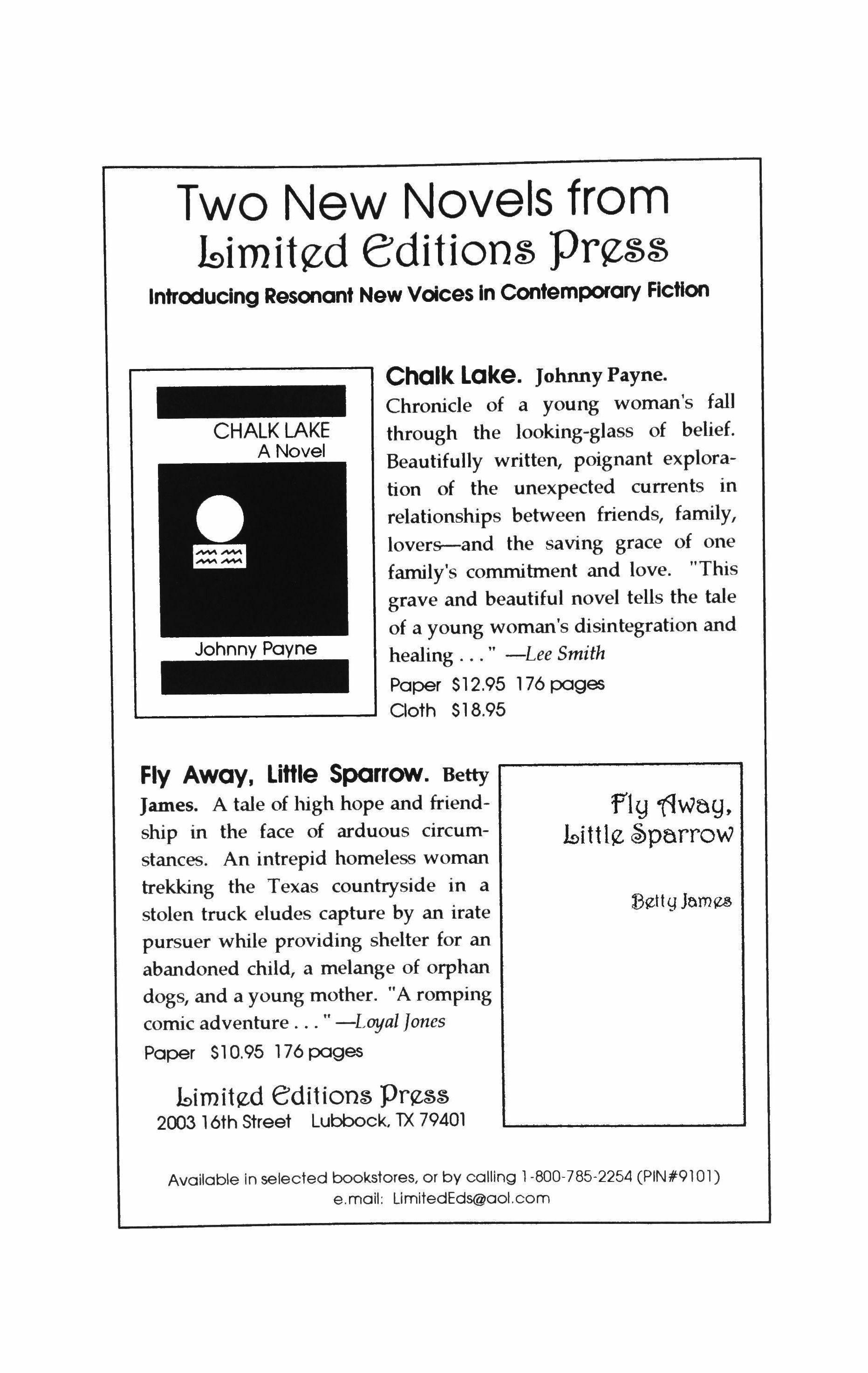
CHALK LAKE A Novel
Chalk Lake. Johnny Payne. Chronicle of a young woman's fall through the looking-glass of belief. Beautifully written, poignant exploration of the unexpected currents in relationships between friends, family, lovers-and the saving grace of one family's commitment and love. "This grave and beautiful novel tells the tale of a young woman's disintegration and healing -Lee Smith
Paper S12.95 176 pages Ooth S18.95
Fly Away, LiHle Sparrow. Betty James. A tale of high hope and friendship in the face of arduous circumstances. An intrepid homeless woman trekking the Texas countryside in a stolen truck eludes capture by an irate pursuer while providing shelter for an abandoned child, a melange of orphan dogs, and a young mother. "A romping comic adventure -LoyalJones
Paper S10.95 176 pages
Limltzd edition$ prfl.$$ 2003 16th Street Lubbock, 1)( 79401
fly rIway. .bittl� �parrow
Available in selected bookstores, or by calling 1-800-785-2254 (PIN#9101) e.mail: LimitedEdS@aoLcom
TriQuarterly thanks the following past donors and life subscribers:
David C. Abercrombie
Mr. and Mrs. Walter L. Adams
Amin Alimard
Lois Ames
Richard H. Anderson
Roger K. Anderson
Sandy Anderson
l. N. C. Aniebo
Anonymous
University of Arizona Poetry Center
Gayle Arnzen
Michael Attas
Asa Baber
Hadassah Baskin
Tom G. Bell
Sandra Berris
Simon J. Blattner, Jr.
Mr. and Mrs. Andrew K. Block
Louise Blosten
Carol Bly
Susan DeWitt Bodemer
Kay Bonetti
Robert Boruch
Mr. and Mrs. Richard S. Brennan
Van K. Brock
Gwendolyn Brooks
Timothy Browne
Paul Bundy
Eric O. Cahn
David Cassak
Stephen Chapman
Anthony Chase
Michael Chwe
Willard Cook
Mr. and Mrs. William Cottle
Robert A. Creamer
Andrew Cyr
Doreen Davie
Kenneth Day
Mark W. DeBree
Elizabeth Des Pres
Anstiss Drake
J. A. Dufresne
Mr. and Mrs. Donald Egan
John B. Elliott
Christopher English
Carol Erickson
Steven Finch
David R. Fine
Mr. and Mrs. H. Bernard Firestone
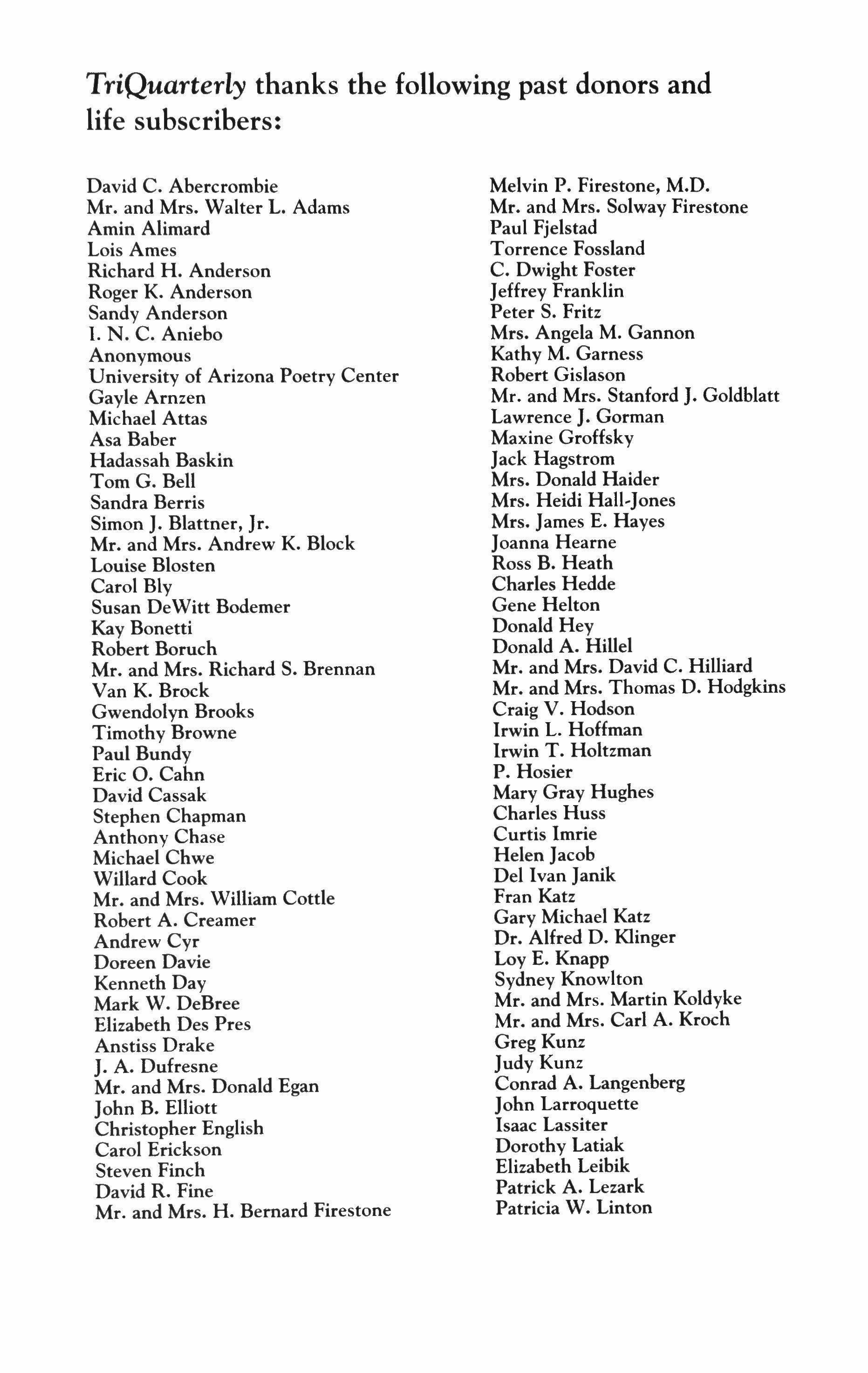
Melvin P. Firestone, M.D.
Mr. and Mrs. Solway Firestone
Paul Fjelstad
Torrence Fossland
C. Dwight Foster
Jeffrey Franklin
Peter S. Fritz
Mrs. Angela M. Gannon
Kathy M. Garness
Robert Gislason
Mr. and Mrs. Stanford J. Goldblatt
Lawrence J. Gorman
Maxine Groffsky
Jack Hagstrom
Mrs. Donald Haider
Mrs. Heidi Hall-Jones
Mrs. James E. Hayes
Joanna Hearne
Ross B. Heath
Charles Hedde
Gene Helton
Donald Hey
Donald A. Hillel
Mr. and Mrs. David C. Hilliard
Mr. and Mrs. Thomas D. Hodgkins
Craig V. Hodson
Irwin L. Hoffman
Irwin T. Holtzman
P. Hosier
Mary Gray Hughes
Charles Huss
Curtis Imrie
Helen Jacob
Del Ivan Janik
Fran Katz
Gary Michael Katz
Dr. Alfred D. Klinger
Loy E. Knapp
Sydney Knowlton
Mr. and Mrs. Martin Koldyke
Mr. and Mrs. Carl A. Kroch
GregKunz
Judy Kunz
Conrad A. Langenberg
John Larroquette
Isaac Lassiter
Dorothy Latiak
Elizabeth Leibik
Patrick A. Lezark
Patricia W. Linton
Philip Lister
Mr. and Mrs. W. J. Lorentz de Haas
Kubet Luchterhand
Ellen 1. Marks
Richard Marmulstein
J ames Marquardt
Charles T. Martin, Jr.
Ms. Jane Mayer
Kevin McCanna
Robert D. McChesney
Charles Gene McDaniel
Martin H. McGrath
Robert McMillan
Mr. and Mrs. Andrew McNally
Michael Meaney
George Meredith
Lois Adele Meyer
Cliff Michel Gallery
University of Michigan Hopwood Room
Michal Miller
Ralph Miller
Kenneth Monroe
William T. Morgan
Max Nathan
Dean Neprud
Fred S. Novy
Catherine Ohs
Lenrie Peters
Paul Peters and Rosemarie Kozdron
Scott Peters
Jane Petro
Lee Phillip
Mrs. Marlene Welsh Phillips
Evelyn Pine
Doyle Pitman
Fran Podulka
Geraldine R. Pratt
Alex T. Primm
Richard Prinz, M.D.
Honora Rankine-Galloway
Anne Katheryn Ream
J. M. Reese
Peter Reich
Susan Reiners
Don Reynolds
Mary Ellen Reynolds
Christopher Richter
Diane Rider
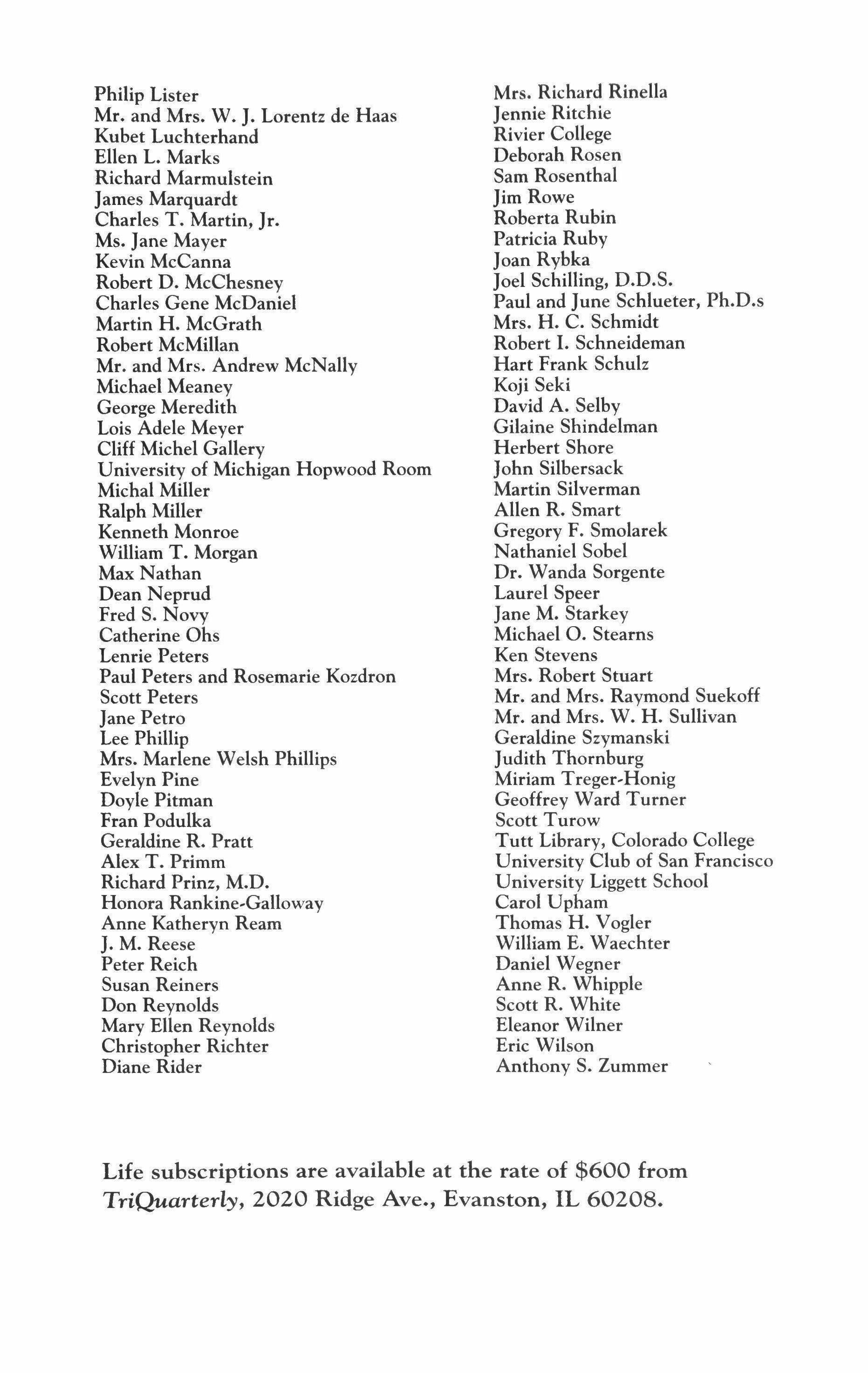
Mrs. Richard Rinella
Jennie Ritchie
Rivier College
Deborah Rosen
Sam Rosenthal
Jim Rowe
Roberta Rubin
Patricia Ruby
Joan Rybka
Joel Schilling, D.D.S.
Paul and June Schlueter, Pb.D.s
Mrs. H. C. Schmidt
Robert 1. Schneideman
Hart Frank Schulz
Koji Seki
David A. Selby
Gilaine Shindelman
Herbert Shore
John Silbersack
Martin Silverman
Allen R. Smart
Gregory F. Smolarek
Nathaniel Sobel
Dr. Wanda Sorgente
Laurel Speer
Jane M. Starkey
Michael o. Steams
Ken Stevens
Mrs. Robert Stuart
Mr. and Mrs. Raymond Suekoff
Mr. and Mrs. W. H. Sullivan
Geraldine Szymanski
Judith Thornburg
Miriam Treger-Honig
Geoffrey Ward Turner
Scott Turow
Tutt Library, Colorado College
University Club of San Francisco
University Liggett School
Carol Upham
Thomas H. Vogler
William E. Waechter
Daniel Wegner
Anne R. Whipple
Scott R. White
Eleanor Wilner
Eric Wilson
Anthony S. Zummer
Life subscriptions are available at the rate of $600 from TriQuarterly, 2020 Ridge Ave., Evanston, IL 60208.



































































































































































































































































